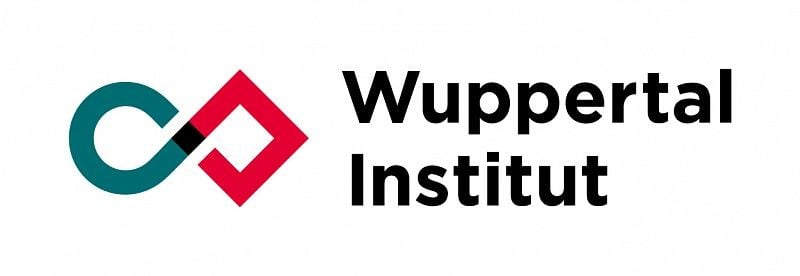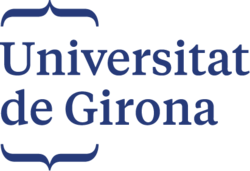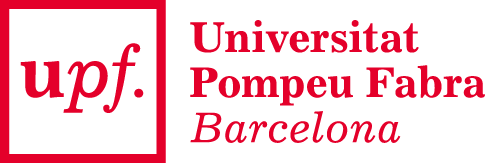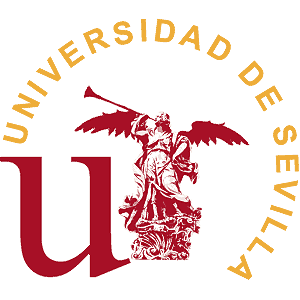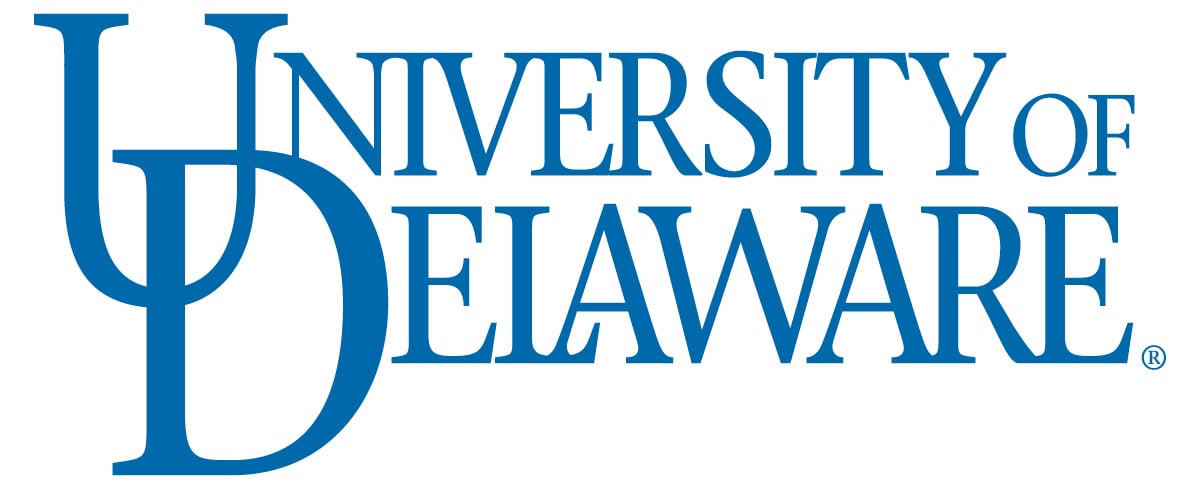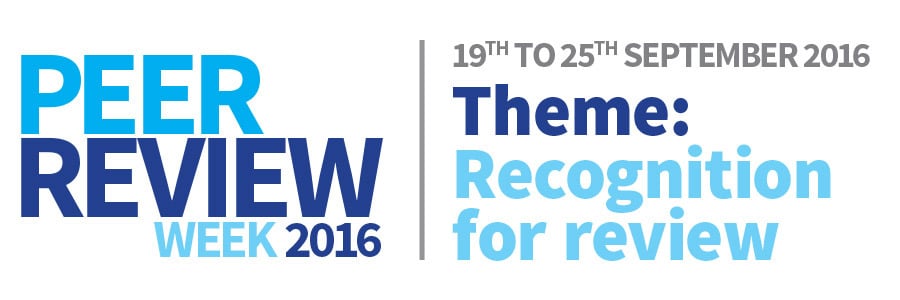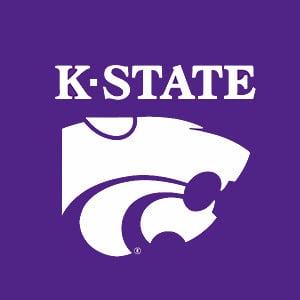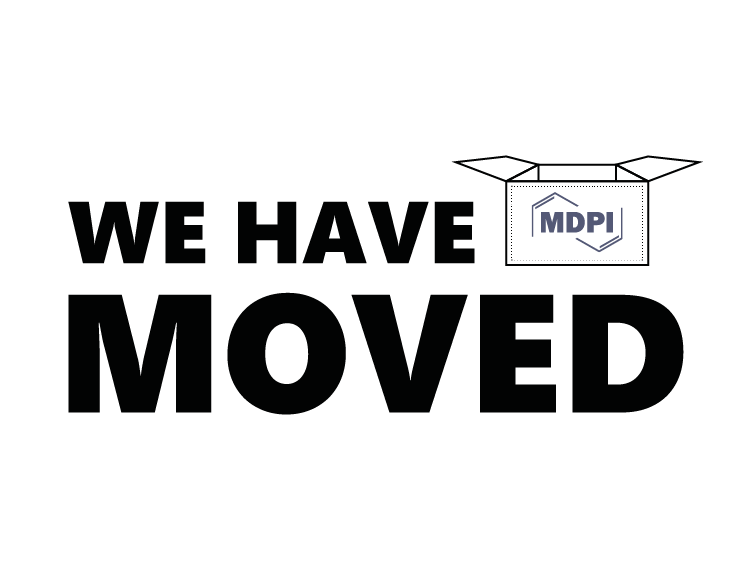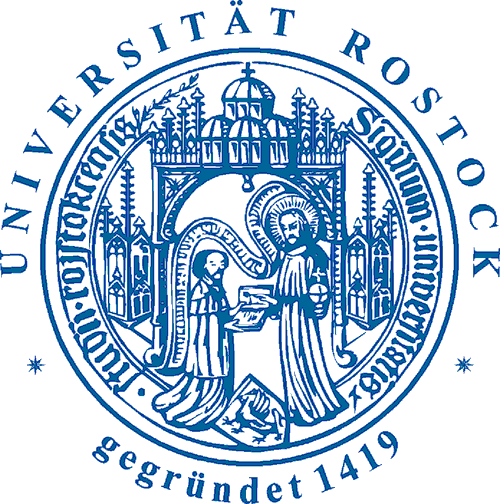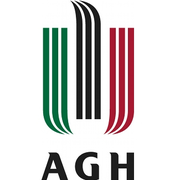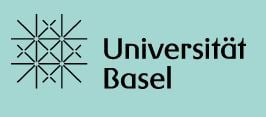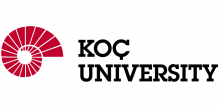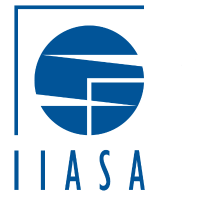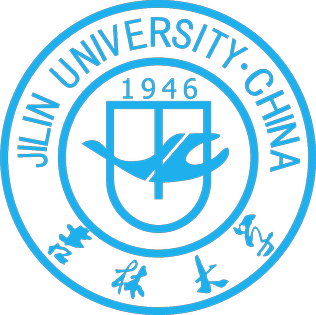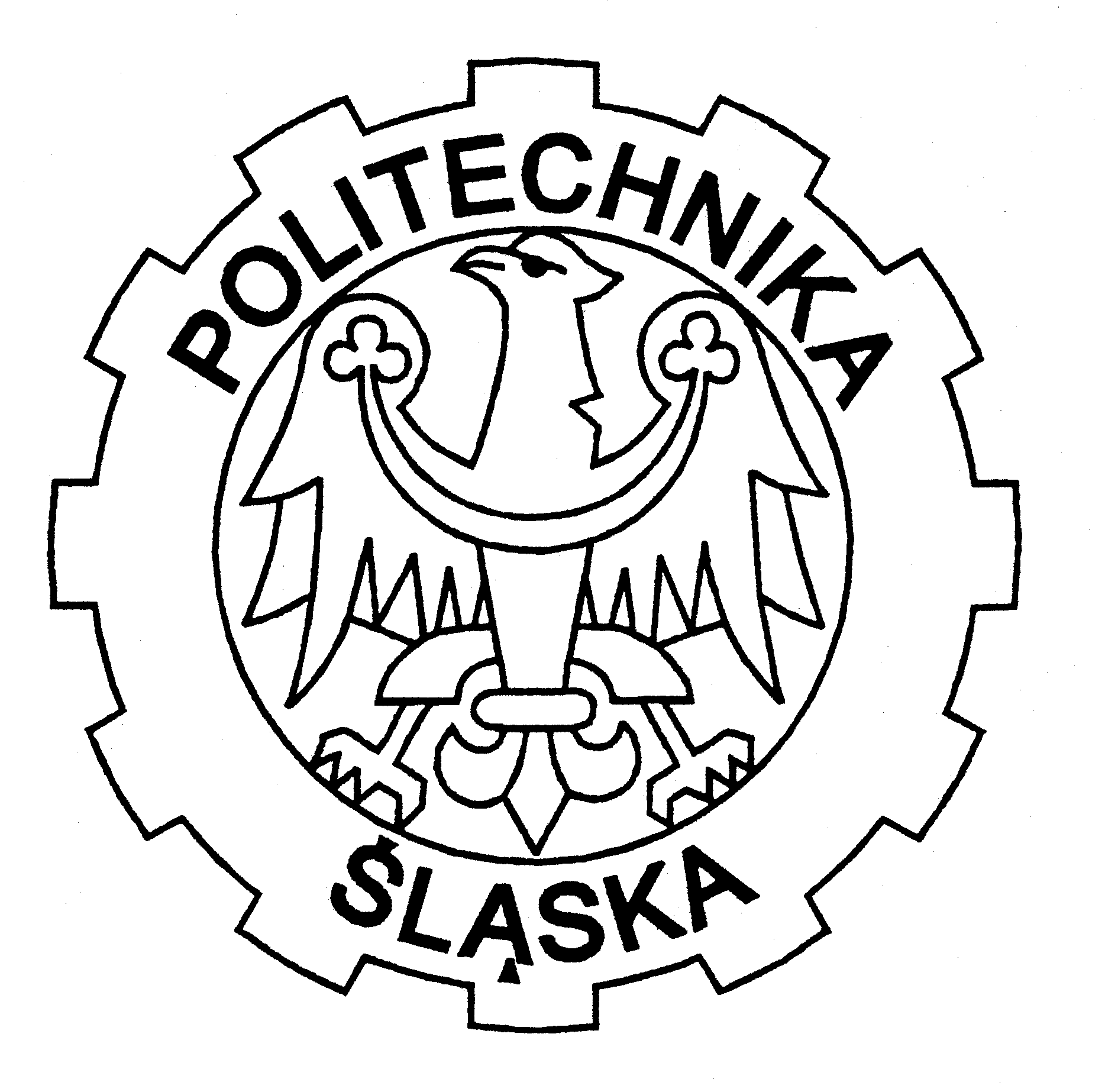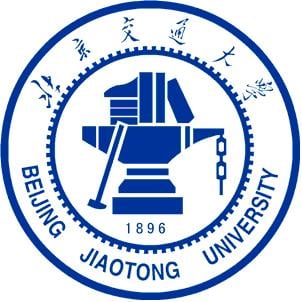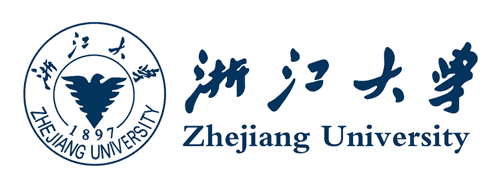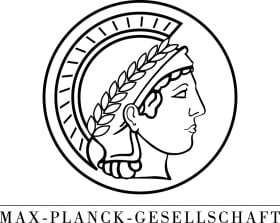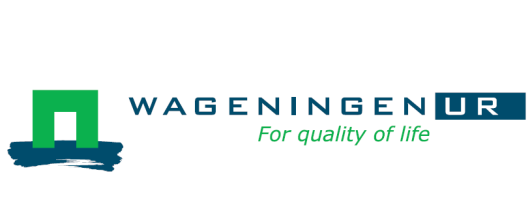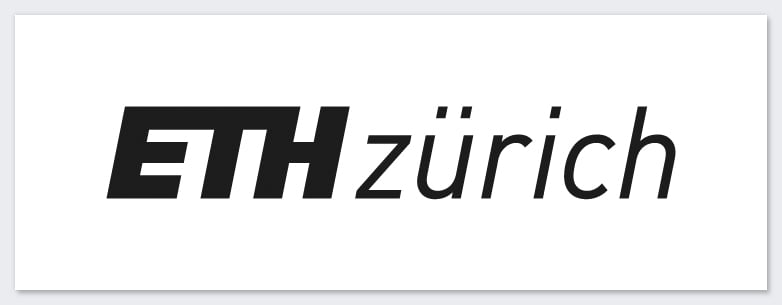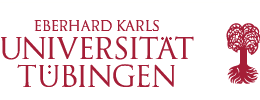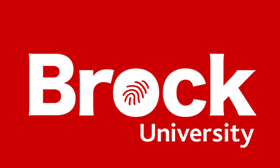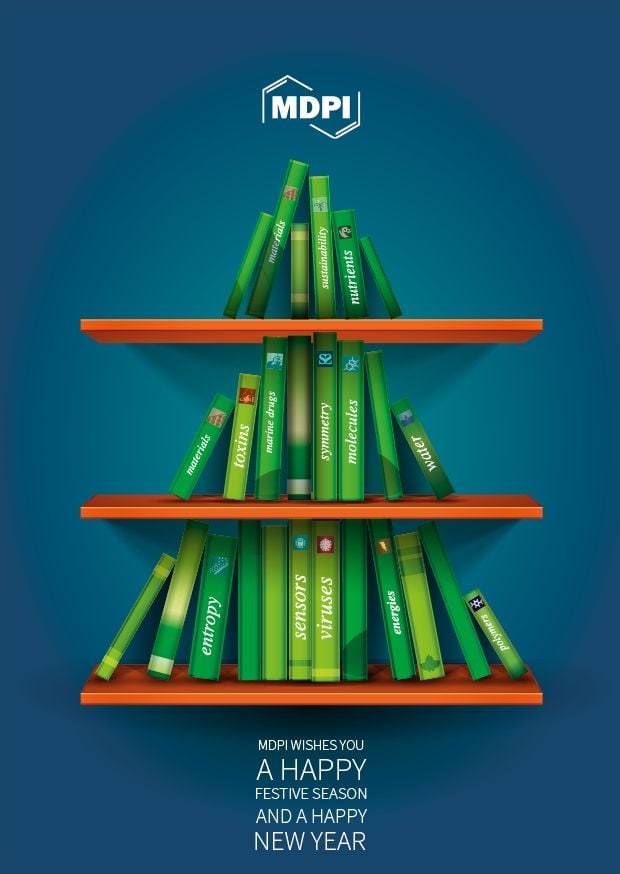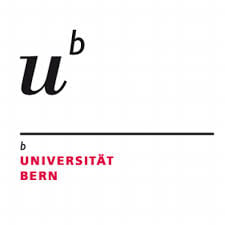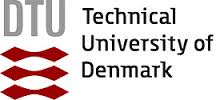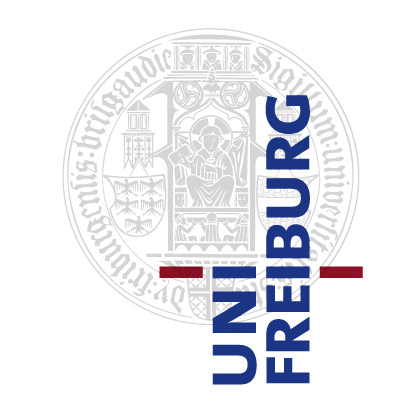
Journal Menu
► ▼ Journal Menu-
- Land Home
- Aims & Scope
- Editorial Board
- Reviewer Board
- Topical Advisory Panel
- Instructions for Authors
- Special Issues
- Topics
- Sections & Collections
- Article Processing Charge
- Indexing & Archiving
- Editor’s Choice Articles
- Most Cited & Viewed
- Journal Statistics
- Journal History
- Journal Awards
- Society Collaborations
- Conferences
- Editorial Office
Journal Browser
► ▼ Journal BrowserNeed Help?
Announcements
8 April 2024
Meet Us at the 9th Youth Geoscience Forum, 17–20 May 2024, Xiamen, China
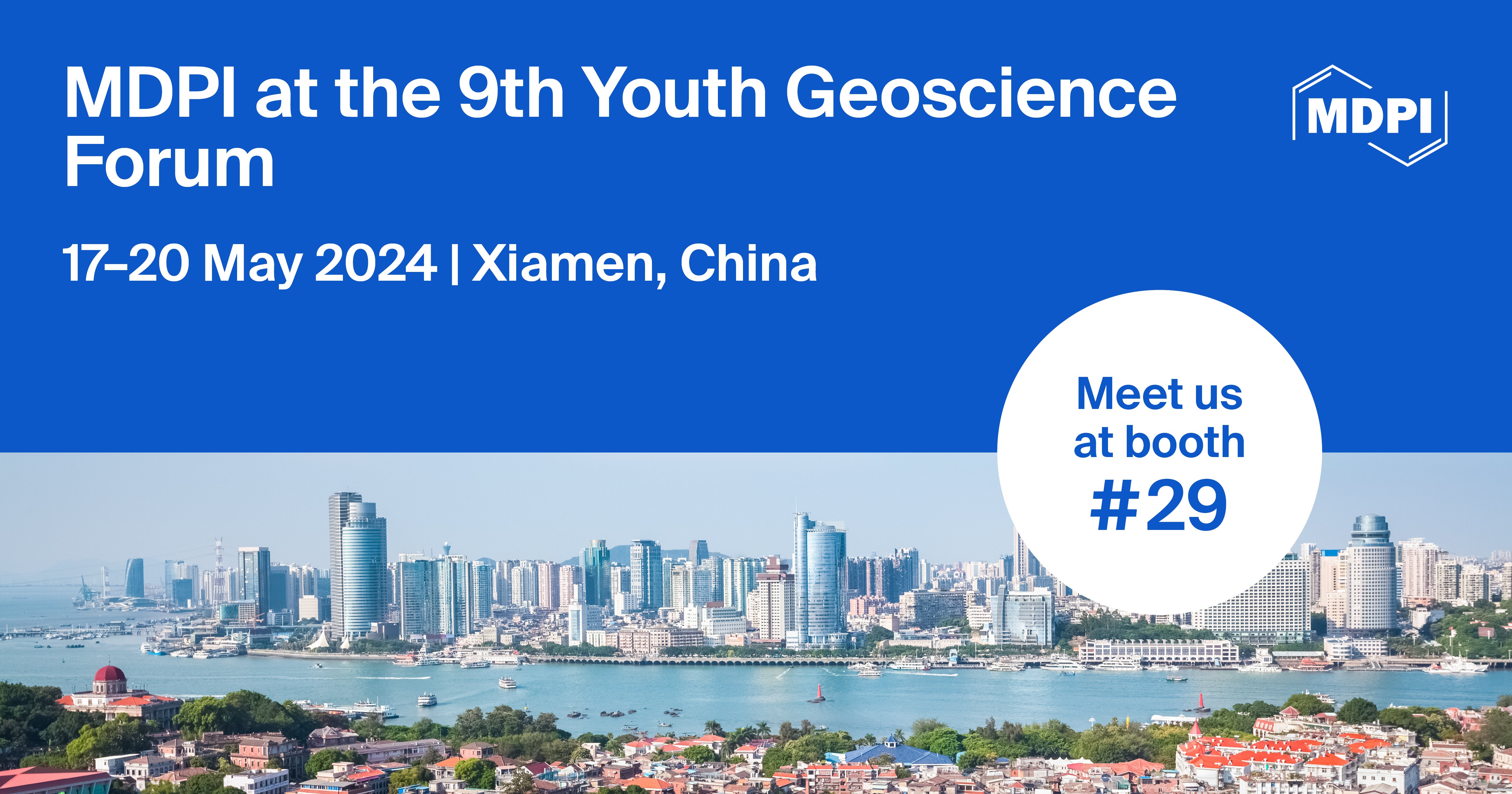
MDPI will be attending the 9th Youth Geoscience Forum, which will be held from 17 to 20 May 2024 in Xiamen, China.
The Young Geoscience Forum is a free, equal and controversial communication platform initiated by young geoscientists in China, with distinguished scientists as advisors and young scholars and postgraduate students as the main participants. Since its inception in 2014, the Forum has been successfully held in Lanzhou (2014), Urumqi (2015), Xi'an (2016), Chengdu (2017), Nanjing (2018), Xining (2019), Guiyang (2021) and Wuhan (2023). Over time, it has gradually developed into a platform for academic exchanges and collision of ideas among young geoscientists in China. The conference has been successfully held eight times.
The Forum will feature 20 themes, with multiple different topics within each, and is expected to comprise about 270 topics. There will be invited presentations, special presentations and exhibition panels.
The following MDPI journals will be represented:
- Atmosphere;
- Earth;
- GeoHazards;
- Geoscience;
- Geotechnics;
- Hydrology;
- Land;
- Minerals;
- Nitrogen;
- Remote Sensing;
- Soil Systems;
- Sustainability;
- Water.
If you plan to attend this conference, please stop by booth #29 and start a conversation with us. Our delegates look forward to meeting you in person and answering any questions you may have. For more information about the conference, please visit the following website: http://www.qndxlt.com/index.html.
2 April 2024
Meet Us at the EGU General Assembly 2024, 14–19 April 2024, Vienna, Austria
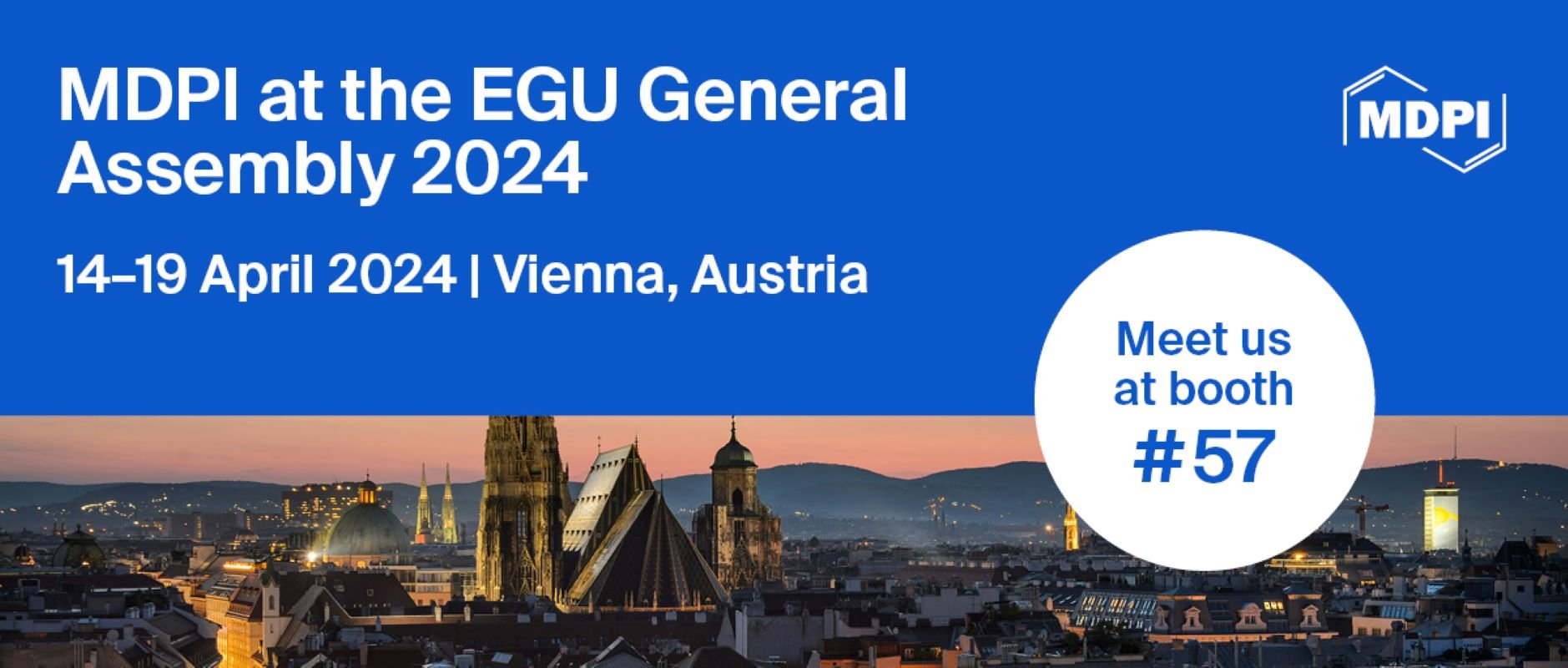
MDPI will be attending the EGU General Assembly 2024 in Vienna, Austria, which will take place from 14 to 19 April 2024 at booth #57. The EGU General Assembly 2024 is organized by the European Geosciences Union, and this is the 22nd conference. It brings together geoscientists from all over the world to one meeting covering all disciplines of the Earth, planetary, and space sciences. The EGU 2024 aims to provide a forum where scientists, especially early-career researchers, can present their work and discuss their ideas with experts in all fields of geoscience.
The following MDPI journals will be represented:
- Remote Sensing;
- Water;
- Hydrology;
- Meteorology;
- Sustainability;
- Atmosphere;
- Climate;
- Earth;
- Land;
- Minerals;
- Geographies;
- IJGI;
- Resources;
- Gases;
- Forests;
- Oceans;
- Quaternary;
- Geotechnics;
- Mining;
- Geomatics;
- Drones;
- Geosciences;
- Nitrogen;
- Soil Systems.
If you are attending the conference, please visit our booth. Our delegates look forward to meeting you in person and answering any questions that you may have. For more information about the conference, please visit the following website: https://www.aag.org/events/aag2024/.
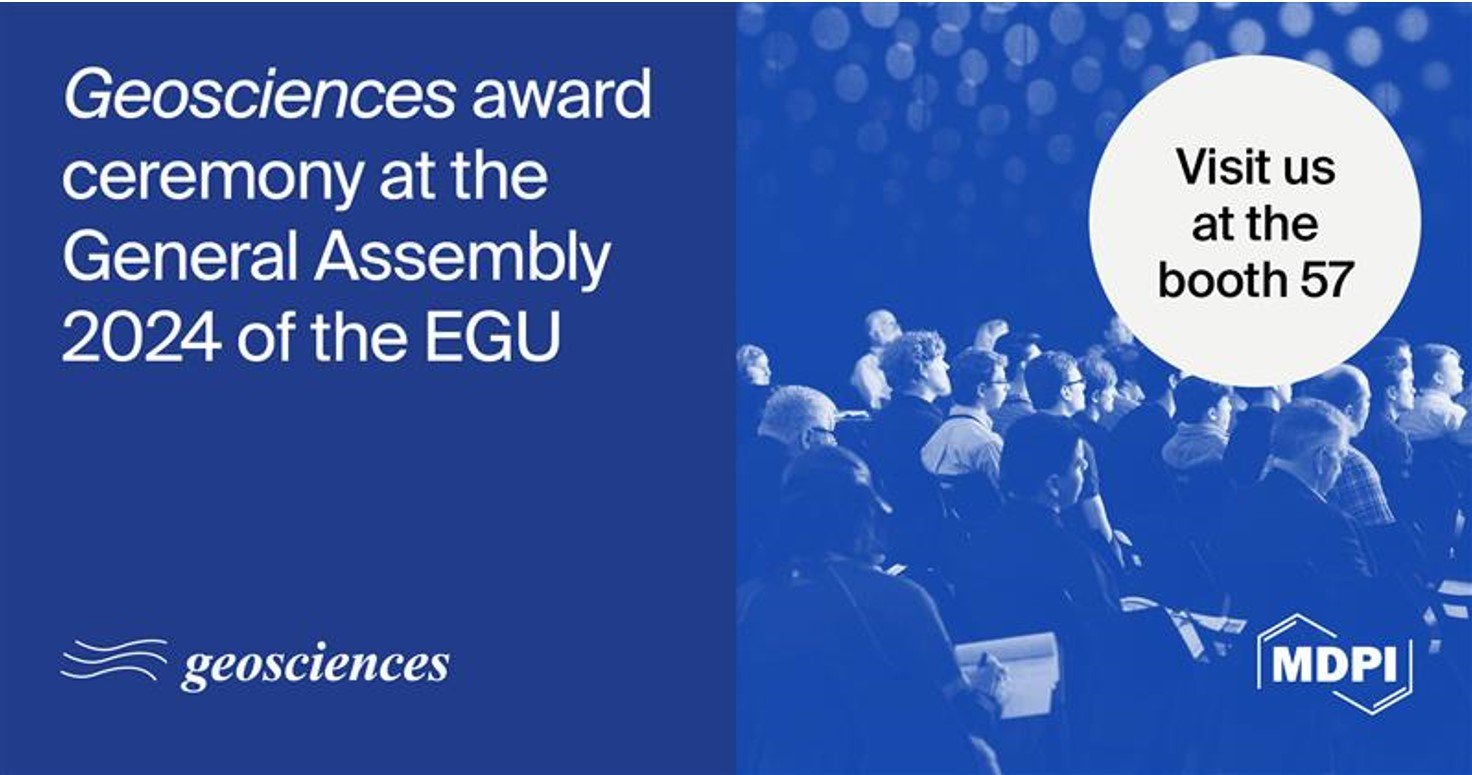
We would also like to congratulate the winners of the Geosciences 2024 Travel Award and the 2023 Outstanding Reviewer Award. Professor Olivier Lacombe, Section Editor-in-Chief of Geosciences, will present prizes on-site to Dr. Andrea Maffeis from Università di Torino, Dr. Simone Bello from University G. d’Annunzio, and Dr. Yuchen Wang from Japan Agency for Marine-Earth Science and Technology.
Join us on 16 April 2024 (17:30–17:45 CET) for the award ceremony at booth #57. If you are interested in travel support or learning about other MDPI awards, please visit our booth during the conference where our conference representatives will be available to assist you.
2 April 2024
Meet Us at the 2024 AAG Annual Meeting, 16–20 April 2024, Hawaii, USA
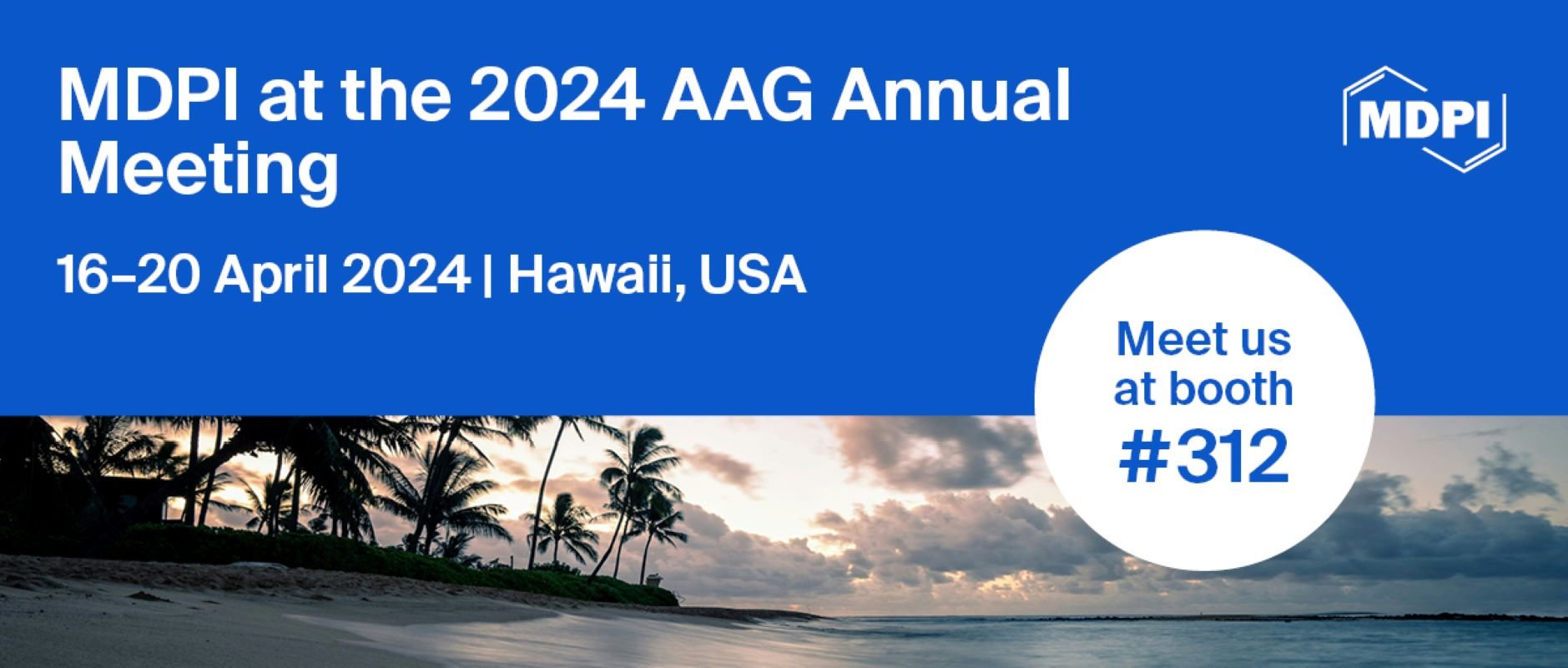
MDPI will be attending the 2024 AAG Annual Meeting in Hawaii, USA, which will take place from 16 to 20 April 2024 at booth #312. The AAG Annual Meeting is held annually by the American Association of Geographers (AAG). The themes of AAG 2024 connect our meeting and academic offerings to the ecologies, history, and cultures of our host location in Hawaii, affirming the interconnectedness of place and beings here and around the world.
The following MDPI journals will be represented:
- Remote Sensing;
- Sustainability;
- Atmosphere;
- Hydrology;
- Land;
- Earth;
- Water;
- Climate;
- IJGI;
- Fire;
- Oceans;
- Geomatics;
- GeoHazards.
If you are attending the conference, please visit our booth. Our delegates look forward to meeting you in person and answering any questions that you may have. For more information about the conference, please visit the following website: https://www.aag.org/events/aag2024/.
2 April 2024
MDPI Insights: The CEO's Letter #10 - South Korea, IWD, U2A, Japan

Welcome to the MDPI Insights: The CEO's Letter.
In these monthly letters, I will showcase two key aspects of our work at MDPI: our commitment to empowering researchers and our determination to facilitating open scientific exchange.
Opening Thoughts

Left to right: Dr. Jisuk Kang (Scientific Officer, MDPI), Stefan Tochev (CEO, MDPI), and Dr. Giulia Stefenelli (Chair of Scientific Office Board, MDPI), during media meetings at Prain Agency office in Seoul, South Korea.
Visit to Seoul, South Korea
During my recent visit to South Korea, I had the privilege of meeting various stakeholders, including representatives of government, research institutions, and academia, to understand their needs and communicate MDPI’s commitment to accessible science. Accompanied by my colleagues Dr. Giulia Stefenelli and Dr. Jisuk Kang, I engaged with the Korean scientific community, which is increasingly embracing open access (OA).
As the leading OA publisher in South Korea, MDPI is trusted by local authors and in 2023 enjoyed an approximately 30% share of the OA market. South Korea ranks sixth globally for MDPI in terms of research papers submitted and published.
MDPI and South Korea by Numbers
As at 30 March, over 76,000 MDPI articles have been authored by individuals affiliated with Korean institutions. We have over 1,800 active editorial board members (EBMs) from South Korea, with more than 880 EBMs having an H-index between 26 and 50, including 10 serving as Chief Editors.
“South Korea is the sixth-largest contributor to our total publications”
Over the past five years (2019–2023), nearly 120,000 authors affiliated with South Korean institutes have published with MDPI. Specifically in 2023, we received approximately 25,000 submissions from South Korean authors, publishing close to 13,000 articles, resulting in a rejection rate of 47.4%, which is not far below MDPI’s overall rejection rate of 56.4% in 2023.
Institutional Partnerships with South Korea
I am pleased to share that MDPI has more than 825 institutional partnerships worldwide, with 12 in South Korea, including Kyunghee University, Chung-Ang University, and Inha University, among others.

Left to right: Dr. Jisuk Kang (Scientific Officer, MDPI), Dr. Giulia Stefenelli (Chair of Scientific Office Board, MDPI), and Stefan Tochev (CEO, MDPI) fielding media questions at Prain PR Agency office in Seoul, South Korea.
Over the past three years (2021–2023), we have had some of the most prestigious academic universities ranked among the top 10 Korean institutions publishing with MDPI. Seoul National University had the highest number of publications with MDPI during those three years, publishing nearly 6,000 papers. Universities such as Korea University and Yonsei University also rank among the top 10 Korean institutions publishing with MDPI.
MDPI Hosts Seminar for Academia and Media
As the world’s leading OA publisher, MDPI is actively democratizing science. This is reflected in the seminars we hosted on 21 March to address questions about our editorial processes and ethical standards. The visit garnered media coverage, reflecting our mission to providing high-quality services and fostering open dialogue in the community.
“MDPI is actively democratizing science”
MDPI in the News

Stefan Tochev (CEO, MDPI) leading a seminar on OA and MDPI at Prain PR Agency office in Seoul, South Korea.
Media coverage generated by our visit to Seoul included the following stories:
“Open access is an unstoppable trend…it will lead the development of the knowledge ecosystem.”
I greatly appreciate the contributions of everyone who took the time to meet with us, share their stories, and hold us accountable for continuing to provide high-quality publishing services while identifying areas for improvement. I am also excited to announce that we have opened an MDPI office in Seoul and will release a press release on MDPI.com, with details, by the end April 2024. The purpose of the office is to establish a local presence to connect with and support the South Korean academic community through institutional partnerships, conferences, author workshops, stakeholder communications, and more.
Impactful Research

Featured Articles on Women’s Leadership and Healthcare
In celebration of International Women’s Day (8 March 2024), MDPI curated a collection of research articles on various topics, including women’s leadership, reproductive health, preventive healthcare, and a selection of articles from our journal Women.
Women’s Leadership
- Women Entrepreneurship and Sustainable Development: Bibliometric Analysis and Emerging Research Trends
Sustainability 2022, 14, 9160. https://doi.org/10.3390/su14159160 - Refugee Women Business Mentors: New Evidence for Women’s Empowerment
Sustainability 2022, 14, 9154. https://doi.org/10.3390/su14159154 - Women and Leadership in Higher Education: A Systematic Review
Soc. Sci. 2023, 12, 555. https://doi.org/10.3390/socsci12100555 - Understanding Needs and Potentials for Gender-Balanced Empowerment and Leadership in Climate Change Adaptation and Mitigation in Africa
Sustainability 2022, 14, 9410. https://doi.org/10.3390/su14159410 - Challenges Women Experience in Leadership Careers: An Integrative Review
Merits 2023, 3, 366-389. https://doi.org/10.3390/merits3020021
Women’s Reproductive Health
- Recreational Female Athletes’ Understanding of and Perceived Impact of the Menstrual Cycle on Physical Performance, Mood, and Sleeping Behaviour
Women 2023, 3, 445-456. https://doi.org/10.3390/women3030034 - Difficulties in Adaptation of the Mother and Newborn via Cesarean Section versus Natural Birth—A Narrative Review
Life 2023, 13, 300. https://doi.org/10.3390/life13020300 - The Main Theories on the Pathogenesis of Endometriosis
Int. J. Mol. Sci. 2023, 24, 4254. https://doi.org/10.3390/ijms24054254
Women’s Preventive Healthcare
- Insulin Metabolism in Polycystic Ovary Syndrome: Secretion, Signaling, and Clearance
Int. J. Mol. Sci. 2023, 24, 3140. https://doi.org/10.3390/ijms24043140 - Assessing Barriers Encountered by Women in Cervical Cancer Screening and Follow-Up Care in Urban Bolivia, Cochabamba
Healthcare 2022, 10, 1604. https://doi.org/10.3390/healthcare10091604 - Updates on HPV Vaccination
Diagnostics 2023, 13, 243. https://doi.org/10.3390/diagnostics13020243
Featured Articles in MDPI Journal Women
Below are a few articles from Women, our journal focused on women’s health, the social determinants of health, and the healthcare system that serves women. The aim of Women is to encourage academics to publish their experimental and theoretical results in detail, to aid reproducibility, and in an engaging style, to aid comprehensibility.
- Premenstrual Syndrome and Exercise: A Narrative Review
Women 2023, 3, 348-364. https://doi.org/10.3390/women3020026 - Increasing Awareness of the Human Papillomavirus (HPV) Vaccine for Women 18–45 Years of Age
Women 2023, 3, 365-373. https://doi.org/10.3390/women3030027 - Addressing Women’s Needs with Human Immunodeficiency Virus (HIV) and Enhancing the Visibility of Pharmacists in the Public Health Arena
Women 2022, 2, 346-352. https://doi.org/10.3390/women2040032
Inside MDPI

Championing Women’s Healthcare and Access to Healthcare Information
MDPI colleagues from our offices joined in celebrating #IWD2024. In doing so, we emphasized key missions that encompass:
- Empowering women to assume leadership and decision-making roles in both business and science.
- Helping women and girls make informed decisions about their health.
- Recruiting and developing female talent and fostering inclusive workplace environments.
“We are thrilled to recognize the accomplishments of women scientists”
I am proud to see our colleagues enthusiastically supporting the International Women’s Day call to ‘Inspire Inclusion!’ The heart-hands in the collage below symbolize our appreciation of the achievements of women researchers and the recognition of the trailblazers who have courageously made a mark on societies past and present.

We are thrilled to recognize the accomplishments of women scientists through our many MDPI awards and by highlighting success stories. As inspirational figures, female scientists are paving the way for the next generation of women aspiring to pursue careers in engineering, life sciences, computing, and various other STEM fields.
“I consider myself lucky because I work with incredibly talented women who inspire me every day.”
– Dr. Alessandra Pasut, Winner of MDPI's ‘Biology 2023 Young Investigator Award’
“It’s really important to find a supportive and enabling environment in which to do your science; it would have a big impact on you as a person and on your scientific outputs.”
– Dr. Rhea Longley, Winner of the ‘Pathogens 2023 Young Investigator Award’
Open-access publishing, in particular, allows early-career women researchers to share their work more widely, potentially attracting mentorship opportunities and collaborations. This support is crucial for career development and advancement.
Coming Together for Science

MDPI Joins United2Act in Collective Fight to Stop Paper Mills
In my February 2024 CEO Letter, I highlighted some of our recent initiatives aimed at bolstering our commitment to research integrity, including joining the STM Integrity Hub and expanding our Research Integrity and Publication Ethics team (RIPE). Continuing our efforts in coming together for science, I am pleased to share our participation in the United2Act initiative.
The text below is taken from our official announcement:
United2Act represents an international group of stakeholders in the publishing industry committed to addressing the collective challenge posed to research integrity by paper mills.
Scientists and academic publishers have increasingly noted the alarming proliferation of paper mills, recognized as fraudulent entities seeking to manipulate the publication process for financial profit. These entities engage in fraudulent practices such as falsifying or fabricating data, selling co-authorship of fake papers, manipulating peer review, and including inappropriate citations. These actions pose a significant threat to the integrity of the scholarly record, prompting widespread concern among those involved in the academic community.
MDPI has been actively contributing to combat the undermining of the scientific record. Our editors employ a set of tools to detect potential ethical breaches within a manuscript and to tackle the issue of fake papers.
United2Act’s consensus statement is the outcome of a virtual summit held in May 2023. It involved the participation of research bodies, publishers, researchers/sleuths, universities, and publishing infrastructure from 15 countries and resulted in a Consensus Statement outlining five key areas of action for all stakeholders:
- Education and awareness
- Improve post-publication corrections
- Facilitate and organise research on paper mills
- Enable the development of trust markers
- Facilitate dialogue between stakeholders
MDPI is committed to promoting transparency and integrity in scholarly publishing and is continuing to work closely with the scientific community toward this goal.
Closing Thoughts

Left to right: Ryo Hirayama (Marketing Specialist, MDPI), Takashi Sasabe (Marketing Specialist, MDPI), Dr. Giulia Stefenelli (Chair of Scientific Office Board, MDPI), Dr. Izumi Yamamoto (Marketing Manager, MDPI), and Stefan Tochev (CEO, MDPI), at MDPI’s office in Tokyo, Japan.
Visit to Tokyo and Kyoto, Japan
In March, I had the opportunity to visit our Tokyo office and engage with stakeholders in Tokyo and Kyoto. During the visit, I also recorded a video message to welcome Japanese scholars working with MDPI and to highlight our operations in Japan.
We held meetings with Editors-in-Chief, librarians, scholars, and external consultants to gather feedback on our efforts to enhance our reputation and explore additional steps we can take in that direction. Japan's rich cultural heritage, characterized by tradition, respect, and formality, provided valuable insights into meeting the publishing needs specific to Japan.
Japan’s Open Access statistics
Over the years, we have seen a shift from subscription-only to gold OA publishing in Japan, despite the lack of an official mandate. Here are some statistics:
- 2012: 68% of articles were subscription-only, 6% were green Open Access, and 8% were gold Open Access.
- 2016: 55% of articles were subscription-only, 6% were green Open Access, and 20% were gold Open Access.
- 2022: 43% of articles were subscription-only, 7% were green Open Access, and 39% were gold Open Access.
To learn more about the history of OA in Japan as well as about future trends, please read this blog post.
“Japan is the ninth-largest contributor to our total publications”

Left to right: Stefan Tochev (CEO, MDPI), Dr. Izumi Yamamoto (Marketing Manager, MDPI), and Dr. Giulia Stefenelli (Chair of Scientific Office Board, MDPI) visiting Kyoto University in Kyoto, Japan.
MDPI and Japan by Numbers
As at 1 April, over 50,000 MDPI articles have been authored by scholars affiliated with Japanese institutions, making the country the ninth-largest contributor to our total publications. Over the past three years (2020–2023), nearly 90,000 authors affiliated with Japanese institutes have published with MDPI, and we have collaborated with over 4,600 Guest Editors from Japan.
In 2023, we published over 8,200 papers from authors associated with Japanese institutions. MDPI collaborates with 41 institutional partnerships in Japan, including the University of Tokyo, Hokkaido University, and Nagoya University. We have over 2,100 active EBMs from Japan, more than 1,050 EBMs having an H-index between 26 and 50, including 13 serving as Editors-in-Chief.
General Feedback – a side note
A general takeaway from our discussions with stakeholders from around the world is that negative perceptions of MDPI often stem from misinformation, misconceptions, or misunderstandings about MDPI and our practices. While we acknowledge our mistakes and work diligently to address them, maintaining a strong editorial procedure and robust peer-review process, I find that educating stakeholders about our how we do what we do and our ongoing improvements tends to help shift opinions.
That said, we recognize the importance of addressing individual concerns. We take feedback seriously and are continuously working to get better while not compromising the core principles that millions of authors appreciate about MDPI.
Chief Executive Officer
MDPI AG
4 March 2024
MDPI Insights: The CEO's Letter #9 - Romania, Research Integrity, Viruses

Welcome to the MDPI Insights: The CEO's Letter.
In these monthly letters, I will showcase two key aspects of our work at MDPI: our commitment to empowering researchers and our determination to facilitating open scientific exchange.
Opening Thoughts

Reka Kovacs (Deputy Office Manager, MDPI), Stefan Tochev (CEO, MDPI), and Sandra Ana Spatariu (Office Manager, MDPI) at the MDPI office in Cluj, Romania.
MDPI’s Impact on Romania
In February, I visited our office in Cluj, Romania. I worked closely with our senior office managers and various teams, including the departments of training, marketing and conferences, as well as our journal relationship specialists, reviewing our service to the local scholarly community. During the visit, I also met with representatives from Babes-Bolyai University and the Technical University of Cluj-Napoca. Our multifunctional Romanian office plays an important role in supporting our collaborations with the local market as well as helping to meet MDPI’s overall business needs.

Feedback and strategy meeting with a group of MDPI’s Journal Relationship Specialists at the MDPI office in Cluj, Romania.
With 22,436 articles, Romania ranks as a top 20 contributing country to MDPI’s total number of papers published as at 28 February 2024. This highlights the importance of our collaboration with Romanian-affiliated authors and the growing opportunity to support their publishing needs. MDPI is one of the few academic publishers with a significant presence in Romania, boasting over 360 colleagues across our offices in Bucharest and Cluj. We are also proud to hire colleagues from local institutions to launch their careers within publishing.
Romania ranks as a top 20 contributing country.
The Numbers: 2019–2023
MDPI has seen a healthy increase in submissions from Romanian authors over the past three years, from 8,439 in 2021 to 11,866 by end of 2023, with most submissions going to journals such as Sustainability, Medicina, Diagnostics, IJMS, Applied Sciences, and JCM. From 2019 to 2023, MDPI published articles from 32,145 authors affiliated with Romanian institutions. Over those years, we have worked with Romanian Guest Editors on nearly 3,000 occasions to support their Special Issue and Topical collections.
With more than 300 Editorial Board Members from Romania, 34 appear on the board of Mathematics, 27 on Materials, 19 on Polymers, 18 on Coatings, and 16 on Molecules, while three serve as Section Editors-in-Chief (SEiC) on our journals Coatings (3.4 IF, 4.6 Citescore), Magnetochemistry (2.7 IF, 3.5 Citescore), and Chemosensors (4.2 IF, 3.9 Citescore).
Institutional Open Access Programs
Our commitment to working with institutions is evident in Romania, where we have established eight Institutional Open Access Programs (IOAP) with esteemed institutions such as the University of Bucharest, the University of Medicine and Pharmacy Cluj-Napoca, and most recently the National Institute for Laser, Plasma and Radiation Physics.
Our growth and presence in Romania are a true testament.
We also have IOAP agreements with Babes-Bolyai University and the Technical University of Cluj-Napoca, where I had the opportunity to meet senior stakeholders during my visit. Below are a few photos capturing our meeting with Prof. Radu Silaghi-Dumitrescu (Head of Faculty of Chemistry, Babes-Bolyai University) at the MDPI office in Cluj, Romania, along with a photo from our meeting with Vice Deans Nicoleta Cobarzan, Nicoleta Ilies, and Hoda Gavril, from the faculty of Civil Engineering at the Technical University of Cluj, Romania.


Our growth and presence in Romania are a true testament to the service we provide to the scholarly community and the relationships we foster in that region. We look forward to continuing to support Romanian scholars and institutions by providing a valuable and trusted experience with MDPI, the leader in open access publishing.
Impactful Research

MDPI Joins the STM Integrity Hub
MDPI has long been a supporter and partner of STM, with our involvement ranging from sponsoring and attending events to helping organize event programs. By joining the STM Integrity Hub, we aim to further our commitment to STM initiatives aimed at safeguarding the integrity of science.
“We are pleased to welcome MDPI as the 35th organisation participating in the Hub. This expansion is critical, as every new member enhances our capacity to prevent fraudulent submissions from entering the academic record.”
Joris van Rossum, Director of Research Integrity, STM
MDPI operates in full alignment with STM Integrity Hub's values of shared data and experiences. We strongly believe in collaboration and open exchange for the purposes of creating a holistic approach to support research integrity at MDPI itself and across the entire academic publishing industry. The Integrity Hub is an excellent example of how publishers can come together to jointly address industry-wide challenges related to research integrity, such as manuscripts that breach research integrity standards and paper-mills.
I look forward to our Research Integrity and Publication Ethics Team (RIPE) team immersing themselves in this initiative, exchanging information, best practices, and tools for the benefit of the entire scholarly ecosystem. We believe that ethical publishing standards should be implemented across the board, and we aim to be rigorous in our approach, addressing research integrity issues and improving the impact of published research.
Inside MDPI

MDPI Expands Research Integrity and Publication Ethics Team (RIPE)
In addition to external collaborations and joint initiatives aimed at further strengthening our commitment to research integrity, we are also enhancing our internal efforts. This includes improving our processes and guidelines and expanding our teams and departments to ensure quality assurance throughout our publishing process.
We are pleased to announce the expansion of our Research Integrity and Publication Ethics Team (RIPE) at MDPI. The RIPE team has recently welcomed new colleagues, each bringing unique skills and a personal commitment to prioritize ethical considerations in all our work.
The demand for research integrity and high ethical standards in academic publishing is steadily rising across our industry. Our expanded RIPE team will work to enhance and align our practices with industry best practices, ensuring excellence in research integrity and publication ethics.

Stefan Tochev (CEO, MDPI) introduces Dr. Tim Tait-Jamieson (Research Integrity Lead, MDPI) for his presentation on MDPI’s Retraction and Approval Process to a group of Journal Relationship Specialists at the MDPI office in Cluj, Romania: “The demand for research integrity and publication ethics is steadily rising across our industry.”
Introducing our Research Integrity and Publication Ethics Team
Led by Dr. Tim Tait-Jamieson (Research Integrity Lead), the RIPE team comprises Dr. Ivana Resanovic (Research Integrity Manager), Dr. Lavinia Rogojina (Research Integrity Manager), Ms. Diana Apodaritei (Research Integrity Specialist), Dr. Zoltan Mihaly (Research Integrity Specialist), Mr. Aleksandar Đukić (Research Integrity Specialist), Ms. Ana Stankovic (Research Integrity Specialist), and Ms. Anna Pena (Publication Ethics Assistant).
Please click here to access everything that you need to know about MDPI’s Research and Publication Ethics.
With this span of complementary roles, the RIPE team collaborates directly with journal editorial teams and works closely with various departments, including our Scientific Office Board and our Journal Relationship Specialists. The team’s primary objectives are to help prevent issues regarding research integrity and publication ethics during peer review, uphold MDPI’s ethics policies, adhere to industry standards, and resolve publication ethics and research integrity issues and complaints.
Quality Updates to Special Issues Oversight
At MDPI, we are committed to reviewing policies pertaining to the quality of research. In this blog post, Shaheena Patel (Communications Associate, MDPI), outlines two recent updates to MDPI journal processes. These updates pertain to Special Issue (SI) quality guidelines, in line with criteria provided by COPE and DOAJ. Alongside the SI updates, details regarding the new minor corrections policy introduced in 2024 are provided in the blog.
The two updates we implemented include greater oversight and the verification of Guest Editor credentials. These guidelines require that Editors-in-Chief (EiCs) and Editorial Board Members (EBMs) take responsibility for overseeing SIs.
PS. Thank you, James Butcher, for featuring this up in your 67th issue of the Journalogy newsletter.
Read more:
Coming Together for Science

Viruses 2024 – A World of Viruses
I am pleased to share the success of our MDPI conference Viruses 2024 – A World of Viruses, held 14-16 February, in Barcelona. With 240 registrations, this event brought together top scientists, researchers, and industry experts from 40 countries to share their findings on the latest developments in viral pathogenesis and immune responses.
Attendees gathered for the 5th edition of the Viruses’ conference, where we hosted influential keynote speeches from Nobel Prize laureate Dr. Charles M. Rice and ‘Distinguished Senior Virologist’ Prof. Luis Enjuanes, along with 14 invited speakers, 47 selected speakers, and nine flash poster presenters, to discuss the most significant issues in virology today.
Recap on the #Viruses2024 Conference
Take a look at the key moments from MDPI’s Viruses event and please join us in commemorating a gathering for global knowledge and cooperation. A heartfelt thank-you to all attendees; their passion and engagement played a crucial role in making this event an engaging success!
Below are calls to action from the keynote speakers encouraging collaboration and communication:
“There’s never been a better time than now to really take the power that we have both in terms of basic research and also in biotech and pharma to develop antiviral agents.” - Dr. Charles M. Rice, The Rockefeller University, New York, USA
“The collaboration between labs is absolutely essential. Improving initial detection and improving communication is a must for all of us working in science.” - Prof. Dr. Luis Enjuanes, National Center of Biotechnology (CNB-CSIC), Madrid, Spain

Our thanks go to our sponsors and partnering societies, our Viruses journal and editorial team, our Barcelona colleagues, and the social media, conference and other MDPI teams for making this event a memorable occasion. View the event gallery here.
Upcoming In-Person Event

24–26 April, 2024
4th MMCS – Harnessing the Power of New Drug Modalities
Location: Barcelona, Spain
Esteemed speakers at MMCS 2024 include Prof. Arun K. Ghosh, the mind behind the Darunavir molecule, and Prof. Paul Brennan, CSO of Alzheimer's Research UK Oxford Drug Discovery Institute.
Find more upcoming MDPI events here.
Organize Your Event with MDPI’s Sciforum
Sciforum is MDPI’s platform dedicated to the organization of scientific events. In line with our mission to promote science, Sciforum supports scholars, societies, research networks, and universities at all stages of organizing in-person events, virtual events and webinars. Our platforms are efficient, user-friendly, and cost-effective. We handle all steps related to event management. Contact us for details.
Closing Thoughts

Researcher to Reader (R2R) Conference
From 20–21 February 2024, I had the pleasure of attending the Researcher to Reader (R2R) conference in London, which MDPI has proudly sponsored over the years. The conference programme offered a variety of session formats, including workshops, panel discussions, debates, interviews, presentations, and lightning talks, with opportunities to discuss relevant topics.
We take pride in supporting the scientific community, bringing researchers across the world together to network, exchange ideas and share the latest in science and publishing. In 2023, MDPI invested close to 2 million CHF in sponsoring over 2,000 scientific and publishing-related conferences worldwide.
R2R Peer Review Innovations Workshop
I found the R2R conference to be engaging, with the workshops being particularly enjoyable. My colleague Giulia Stefenelli (Chair of Scientific Office Board) and I participated in the “Peer Review Innovations” workshop, which spanned four sessions over the two days. These sessions explored the future of peer review and how we can improve the peer review process for everyone involved. Notably, the large majority of attendees expressed their opinion that peer review, as currently practiced, requires significant improvement. Together, we collaborated on potential immediate and long-term improvements and innovative processes, aiming to create an ecosystem beneficial to all stakeholders by strengthening submission systems with the aim of reducing threats and making authors more responsible for their work. We also discussed the opportunity for academic institutions to better scrutinize the quality of the work produced and submitted to journals.
Our group comprised publishers, software providers, librarians, and more, bringing diverse perspectives to the discussions. These interactions were relevant to MDPI’s ongoing conversations, providing insights to our efforts. The session also made me appreciate that MDPI is doing well, as the group discussions included the subject of various quality checks that we have already embedded in our processes, ensuring that we keep abreast of industry standards.
The need for an optimized system to incentivize the activities of editors and reviewers was also a focus of discussion, as well as the support that reviewers need from publishers via the provision of strong reports through fixed forms, questionnaires and training.
At MDPI, we are currently auditing our reviewer program to improve reviewer recognition, guidelines, and methods for identifying suitable reviewers, while maintaining our commitment to quality and timeliness.
Congratulations to Mark Carden, Conference Director, and the R2R team for organizing a productive and successful event. PS: The break times were greatly appreciated as well!
Chief Executive Officer
MDPI AG
31 January 2024
MDPI Insights: The CEO's Letter #8 - Altmetric and Flat Fee Agreement

Welcome to the MDPI Insights: The CEO's Letter.
In these monthly letters, I will showcase two key aspects of our work at MDPI: our commitment to empowering researchers and our determination to facilitating open scientific exchange.
Opening Thoughts

MDPI and Digital Science Meeting
At MDPI, we are committed to providing our authors with the essential tools to publish, promote, and track their research. In line with this commitment, we have established a longstanding collaboration with Digital Science, a company specializing in research data and analytical insights for the research community. Our collaboration integrates their Altmetric tool, offering us and our authors the ability to track a variety of sources that monitor and report attention surrounding publications.
As part of our collaboration, we recently hosted Cathy Holland, Director of Global Publisher Business Development, and Helen Cooke, Managing Director of Publisher Sales, from Digital Science, at our MDPI headquarters in Basel, Switzerland.
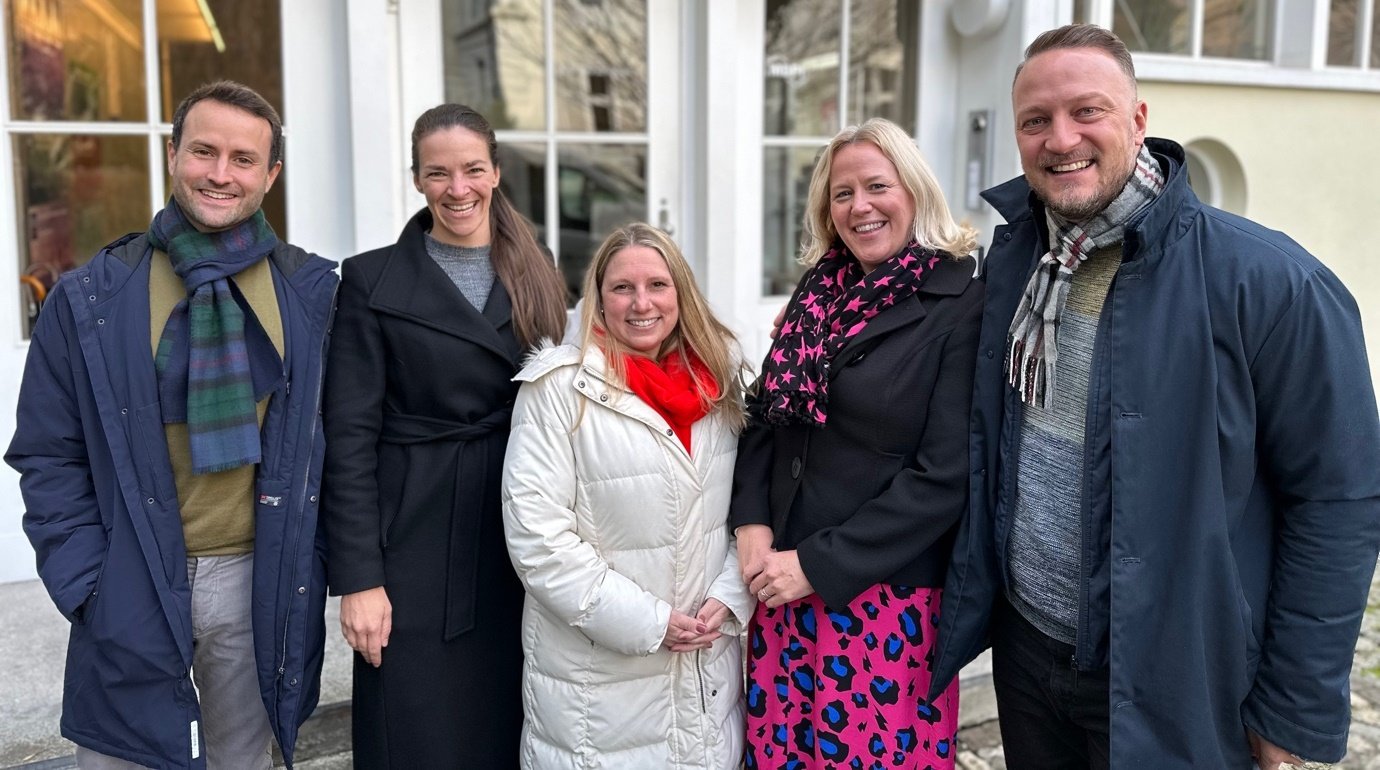
Left to right: Facundo Santomé (Senior Marketing Manager, MDPI), Constanze Shelhorn (Indexing Manager, MDPI), Cathy Holland (Director of Global Publisher Business Development, Digital Science), Helen Cooke (Managing Director of Publisher Sales, Digital Science), and Stefan Tochev (CEO, MDPI) in front of MDPI headquarters in Basel, Switzerland.
During our meeting, we discussed MDPI’s publishing philosophy and explored further avenues for collaboration. We look forward to continuing our partnership with Digital Science, aiming to improve our services yet further and meet the needs of our authors more closely than ever.
What is Altmetric?
You will notice that MDPI articles feature an Altmetric score, a colourful doughnut capturing the score in the upper right corner of the article page. This score represents ‘alternative metrics,’ as distinct from traditional metrics such as Impact Factor, CiteScore, and Scimago Journal Rank.
Altmetrics complement traditional citation-based metrics by capturing online discussions related to a specific research topic. By analyzing both sets of data, we can obtain a comprehensive understanding of the attention a particular research output receives and the sources in which it is mentioned.
“Almetric provides visual insights into where research is being discussed”
Sources Tracked by Altmetric
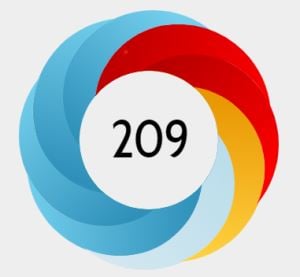
Altmetric badge showing the Altmetric score and colour-coded mention sources.
Altmetric monitors various sources, categorizing them into segments such as policy documents, peer reviews, Wikipedia, news and blogs, and social media, among other sources. Each category is identifiable by a specific colour.
The Altmetric badge provides visual insights into where the research is being discussed. A more colourful badge indicates broader mentions across multiple platforms. Such tracking enables us to gauge the extent of an article’s online dissemination, noting that increased visibility may correlate with higher citation rates.
Read more:
Impactful Research

Ten High-Altmetric Articles Published by MDPI
As at 30 January 2024, Altmetric has tracked 670,500 MDPI research outputs from MDPI, resulting in over 4.3 million mentions. This includes over 71,894 mentions in policy and patents and 294,714 mentions in news and blogs, with some achieving an Altmetric score as high as 28,754.
So, what is a good Altmetric score? There are various ways to put this score into context. You can find out more about the score in context and how to evaluate your work by this means.
Here are ten MDPI papers ranking in the top 5% of all research outputs scored by Altmetric.
|
|
“Accuracy in Wrist-Worn, Sensor-Based Measurements of Heart Rate and Energy Expenditure in a Diverse Cohort” J. Pers. Med. 2017, 7(2), 3; https://doi.org/10.3390/jpm7020003 Altmetric page: https://mdpi.altmetric.com/details/20477344 Altmetric shows that this article appeared in 253 news stories from 209 outlets including Forbes, BBC, and Fox News. |
|
|
“Daylight Saving Time and Acute Myocardial Infarction: A Meta-Analysis” J. Clin. Med. 2019, 8(3), 404; https://doi.org/10.3390/jcm8030404 Altmetric page: https://mdpi.altmetric.com/details/57654628 Altmetric shows that this article appeared in 295 news stories from 207 outlets including Forbes, The Atlantic, and New York Times. |
|
|
“The Preliminary Analysis of Cave Lion Cubs Panthera spelaea (Goldfuss, 1810) from the Permafrost of Siberia” Quaternary 2021, 4(3), 24; https://doi.org/10.3390/quat4030024 Altmetric page: https://mdpi.altmetric.com/details/111086701 Altmetric shows that this article appeared in 182 news stories from 134 outlets including CBC News, CNN, and National Geographic. |
|
|
“Not the Cat’s Meow? The Impact of Posing with Cats on Female Perceptions of Male Dateability” Animals 2020, 10(6), 1007; https://doi.org/10.3390/ani10061007 Altmetric page: https://mdpi.altmetric.com/details/83796184 Altmetric shows that this article appeared in 124 news stories from 98 outlets including VICE, CNN and The Guardian. |
|
|
“Behaviour and Welfare Impacts of Releasing Elephants from Overnight Tethers: A Zimbabwean Case Study” Animals 2022, 12(15), 1933; https://doi.org/10.3390/ani12151933 Altmetric page: https://mdpi.altmetric.com/details/133463915 Altmetric shows that this article appeared in 192 news stories from 186 outlets. |
How do I use altmetrics?
Altmetric Explorer provides a detailed step-by-step guide and instruction video for first-time users of the tool. The guide includes useful diagrams that make it easy to get started.
Sharing Research Online
For research to be tracked across different sources, Altmetric needs a research output with a persistent identifier: a DOI, ISBN, PubMed ID, handle ID, etc. When sharing research, it is important to include a link to the original research output.
|
|
“An Update on Eukaryotic Viruses Revived from Ancient Permafrost” Viruses 2023, 15(2), 564; https://doi.org/10.3390/v15020564 Altmetric page: https://mdpi.altmetric.com/details/142929875 Altmetric shows that this article appeared in 250 news stories from 180 outlets including CTV, Fox News, and CNN. |
|
|
“The Global Problem of Insufficient Sleep and Its Serious Public Health Implications” Healthcare 2019, 7(1), 1; https://doi.org/10.3390/healthcare7010001 Altmetric page: https://mdpi.altmetric.com/details/53406248 Altmetric shows that this article appeared in 252 news stories from 168 outlets including BBC, Harvard Business Review, and Forbes. |
|
|
“A Detailed Review Study on Potential Effects of Microplastics and Additives of Concern on Human Health” Int. J. Environ. Res. Public Health 2020, 17(4), 1212; https://doi.org/10.3390/ijerph17041212 Altmetric page: https://mdpi.altmetric.com/details/86529137 Altmetric shows that this article appeared in 197 news stories from 150 outlets including BBC, The Tribune, and World Economic Forum. |
|
|
“An Empirical Study of Chronic Diseases in the United States: A Visual Analytics Approach to Public Health” Int. J. Environ. Res. Public Health 2018, 15(3), 431; https://doi.org/10.3390/ijerph15030431 Altmetric page: https://mdpi.altmetric.com/details/34714141 Altmetric shows that this article appeared in 232 news stories from 149 outlets including Forbes, New York Times, and Harvard Business Review. |
|
|
“Garden Scraps: Agonistic Interactions between Hedgehogs and Sympatric Mammals in Urban Gardens” Animals 2023, 13(4), 590; https://doi.org/10.3390/ani13040590 Altmetric page: https://mdpi.altmetric.com/details/142934305 Altmetric shows that this article appeared in 172 news stories from 168 outlets including BBC. |
Inside MDPI

MDPI Annual Meeting Celebrations in China
On Thursday 25 January, over 1,300 MDPI colleagues from our two offices in Beijing gathered to kick off MDPI’s traditional ‘Annual Meetings.’ These celebrations take place in MDPI’s offices across China, including Dalian, Tianjin, Wuhan, and Nanjing.
The evenings include performances, informative talks and presentations, awards, and entertainment, providing an ideal platform to recognize our colleagues, celebrate their achievements, and set our sights on the future.
“It is essential that we stay connected and share best practices”

I sent a video congratulating everyone on their work and sharing our vision of building MDPI into the most trusted OA publisher, highlighting the roles each of us has to play in achieving that goal.
Unfortunately I could not join in person, but you may recall my recent trip, when I visited our offices in Beijing and Wuhan, which I look forward to visiting again this year.
Although our headquarters are in Basel, Switzerland, and we are expanding throughout Europe and North America, the majority of MDPI’s workforce is in China and throughout the Asia-Pacific region, including offices in Singapore, Thailand, Japan, and newly opened office in South Korea. It is essential that as a global organization, we stay connected and share best practices in order to grow collectively and continue providing the exceptional service to our authors.
The Annual Meeting is a moment to reflect and enjoy the year’s hard work and dedication.
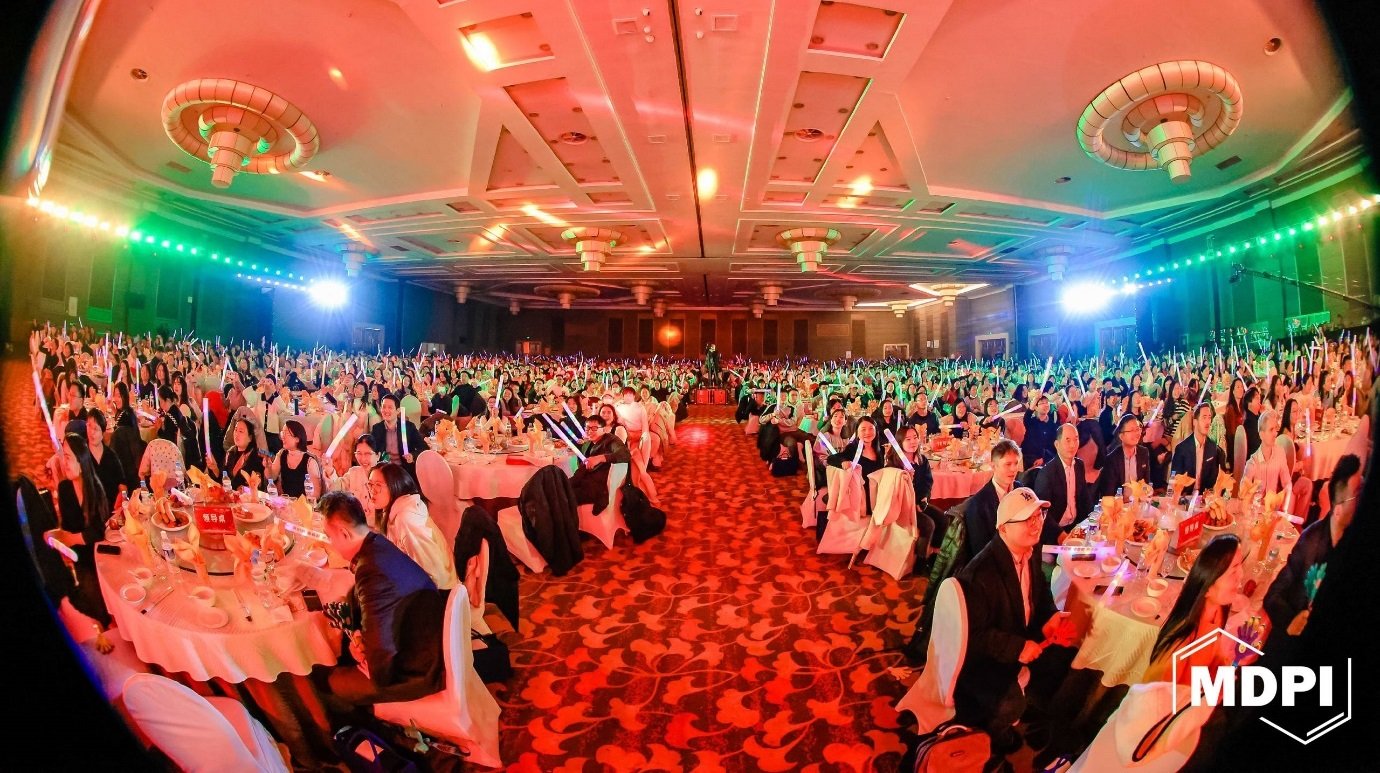
I extend our best wishes to all for the Chinese New Year (Xīnnián kuàilè)!
Coming Together for Science
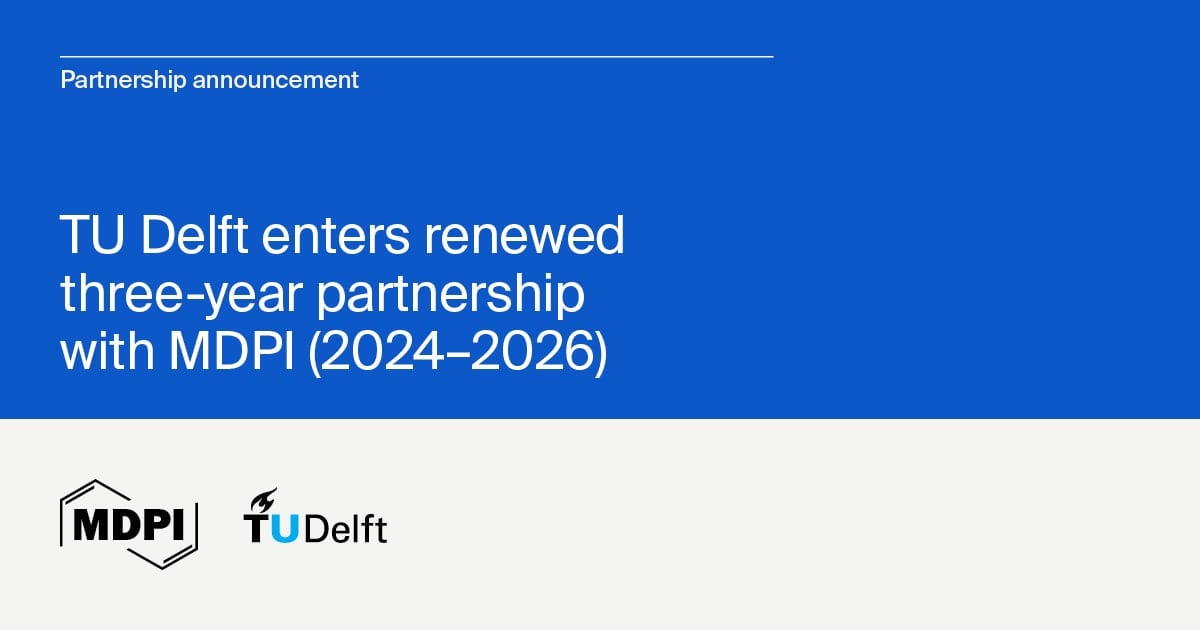
MDPI and TU Delft Adopt Flat Fee Model in Extended Partnership
We are excited to announce a renewed three-year partnership with Delft University of Technology (TU Delft) in the Netherlands. This collaboration introduces a fixed lump-sum fee, covering publishing costs from 2024 to 2026.
“This initiative reflects our dedication to transparent and inclusive publishing”
TU Delft-affiliated authors will enjoy cost-free publishing in any MDPI journal during this period, aligning with our commitment to removing barriers for open access publishing. The agreement supports Plan S compliance and facilitates a seamless publishing process for TU Delft corresponding authors. This initiative reflects our dedication to transparent and inclusive publishing, providing stability and predictability both for authors and for institutions.
For further details on our Institutional Open Access Program (IOAP), please contact us.
Benefits to MDPI’s IOAP
At MDPI we have a long tradition of partnerships, including our Institutional Open Access Program (IOAP). IOAP supports institutions through simplification, access, transparency, APC discounts, and institutional repository deposits. The program simplifies administrative processes, offers central payment, and allows easy opting in and out. Participants gain free access to Susy, MDPI’s online submission system, with extensive article metadata and exportable data. APC discounts and Book Processing Charge discounts are available for affiliated authors. Automated deposits to institutional repositories and streamlined matching of papers to IOAP participants enhance the overall experience.
For further information, see our IOAP FAQ.
Closing Thoughts

Reflections on the 2024 APE Conference
MDPI was proud to co-sponsor the Academic Publishing in Europe (APE) 2024 Conference that took place in Berlin, Germany, from 9–10 January 2024.
The conference theme, ‘Keep the Conversation Going!’, explored the evolving landscape of scholarly communication. APE is one of the key conferences I make a point to attend each year. January offers a valuable opportunity to engage with new contacts, reconnect with familiar faces, and participate in impactful discussions and presentations among professionals, scholars, and practitioners in the field.
“It's fascinating to see how other publishers are leveraging AI”
Highlights
Some of the standout panels for me include: the role of the UN Sustainable Development Goals (SDGs) within the publishing industry. It was encouraging to hear the current status quo, though I was eager also to learn about the exciting projects planned for 2024 and beyond. These will allow us to track progress in subsequent years. At MDPI, we remain committed to promoting Open–Access (OA) content on SDGs through scientific articles and books. Furthermore, we extend our commitment to sustainability by financially supporting researchers through initiatives such as the World Sustainability Award and the Emerging Sustainability Leader Award, as well as waiving the APC for feature papers on each SDG.
In recent years, discussions on AI have become increasingly prominent at such conferences. It’s fascinating to see how other publishers are leveraging AI to meet the evolving needs of their audiences while at the same time using it to safeguard the scientific process. Other engaging panels that I enjoyed included updates on transformation beyond transformative agreements, the principles of lean change, incentive structures related to research integrity, and the panel on reviewer incentives.
“We can share best practices and lessons learned”
Incorporating MDPI’s Insights into Conferences
I must confess that I sometimes feel overlooked when MDPI is not invited to participate in crucial industry discussions. As the leading open access publisher and the third-largest publisher overall, we possess extensive experience in many of these areas and can offer valuable contributions to these discussions. We can share best practices, lessons learned, and our thinking about future trajectories. For instance, in panels discussing reviewer incentives, at MDPI we offer a discount voucher to reviewers for future submissions, reflecting our commitment to fostering a robust peer review process. In 2022 alone, MDPI collected over 1.4 million peer review reports, informing the decision-making processes of our editors. Given our expertise in these areas, it would be natural to include MDPI in such discussions. I therefore extend an invitation to future conference organizers to consider MDPI for speaking engagements and collaborative opportunities.
Chief Executive Officer
MDPI AG
31 January 2024
Land | Selected Special Issue Reprints Published in 2023
We are delighted to share with you 14 reprints of Special Issues published in 2023 in Land (ISSN: 2073-445X). They were selected by the Land Editorial Office, each with 10 or more articles published. You can read more reprints of the Special Issues published by Land here.
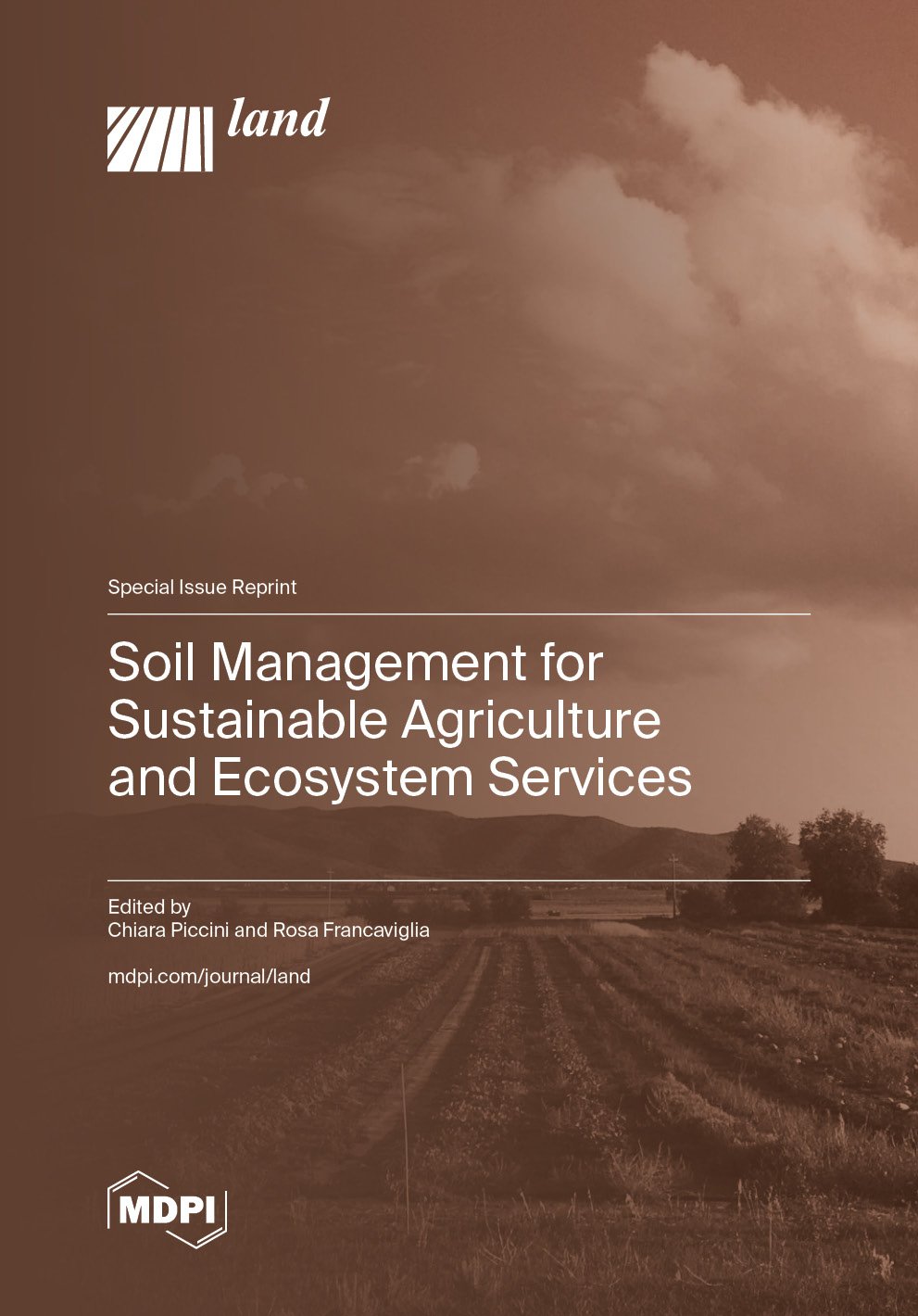 |
“Soil Management for Sustainable Agriculture and Ecosystem Services” Edited by Chiara Piccini and Rosa Francaviglia ISBN 978-3-0365-9574-0 (hardback); ISBN 978-3-0365-9575-7 (PDF) Available online: https://www.mdpi.com/books/book/8419-soil-management-for-sustainable-agriculture-and-ecosystem-services |
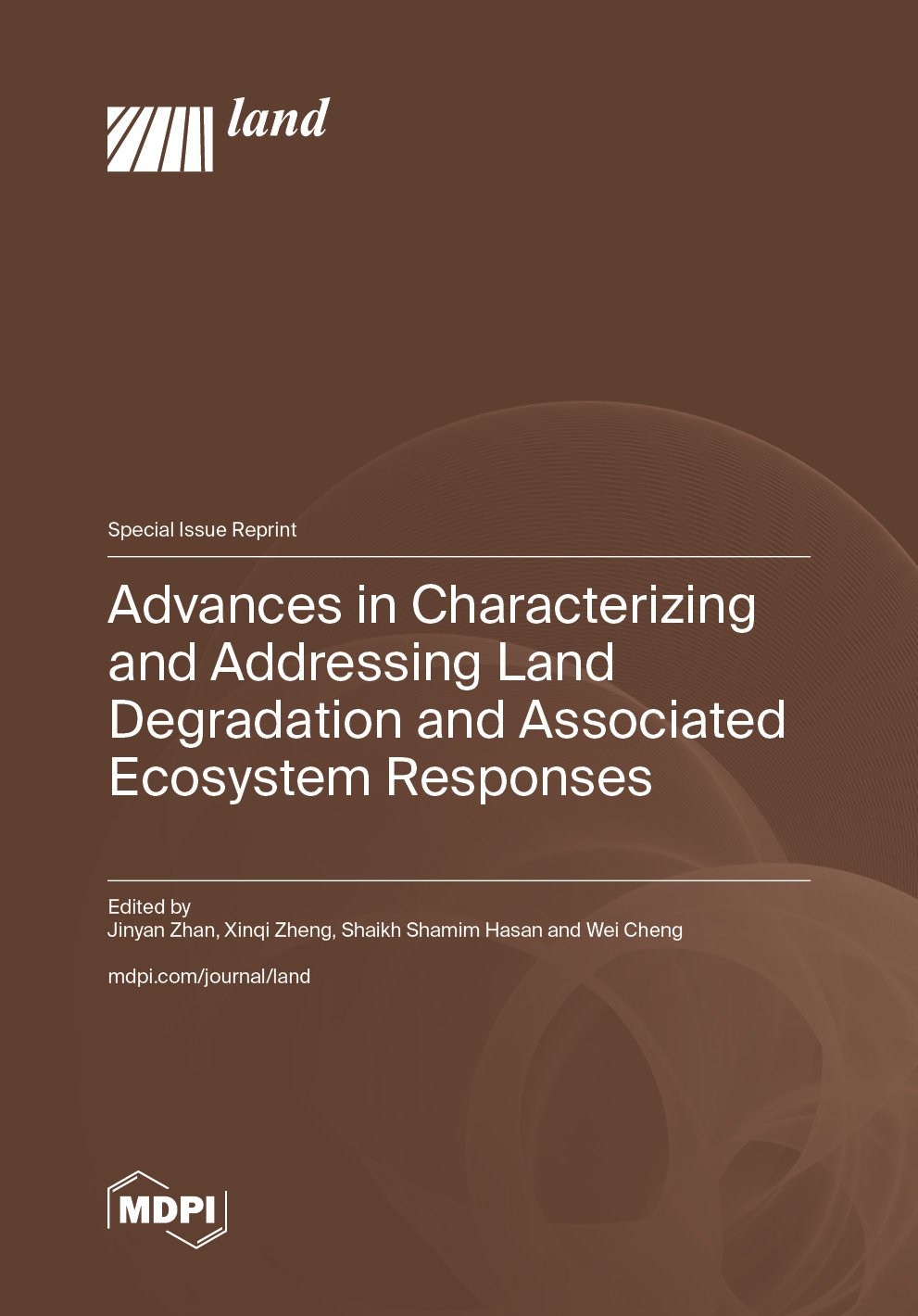 |
“Advances in Characterizing and Addressing Land Degradation and Associated Ecosystem Responses” Edited by Jinyan Zhan, Xinqi Zheng, Shaikh Shamim Hasan and Wei Cheng ISBN 978-3-0365-9596-2 (hardback); ISBN 978-3-0365-9597-9 (PDF) Available online: https://www.mdpi.com/books/book/8388-advances-in-characterizing-and-addressing-land-degradation-and-associated-ecosystem-responses |
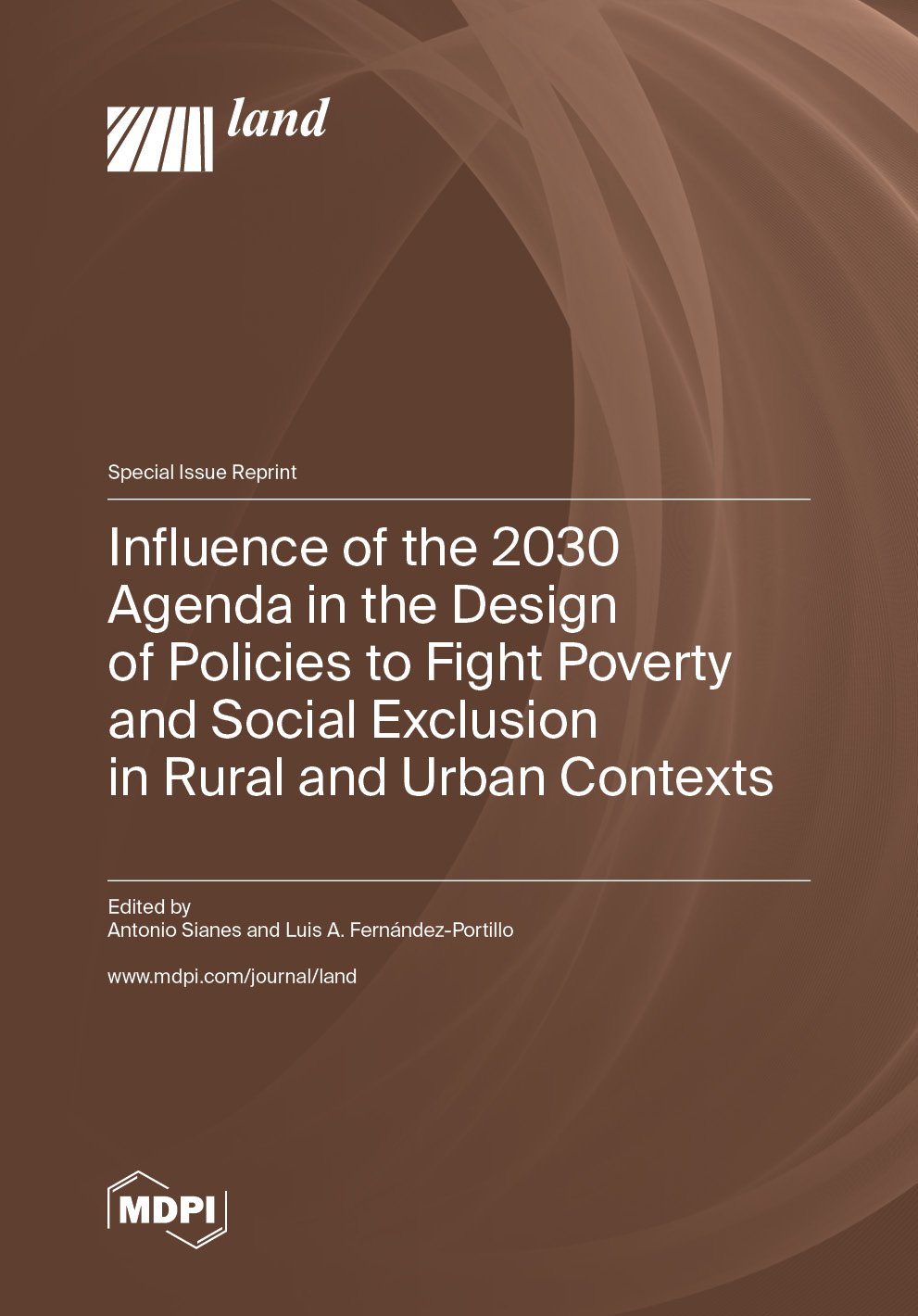 |
“Influence of the 2030 Agenda in the Design of Policies to Fight Poverty and Social Exclusion in Rural and Urban Contexts” Edited by Antonio Sianes and Luis A. Fernández-Portillo ISBN 978-3-0365-8508-6 (hardback); ISBN 978-3-0365-8509-3 (PDF) Available online: https://www.mdpi.com/books/book/8142-influence-of-the-2030-agenda-in-the-design-of-policies-to-fight-poverty-and-social-exclusion-in |
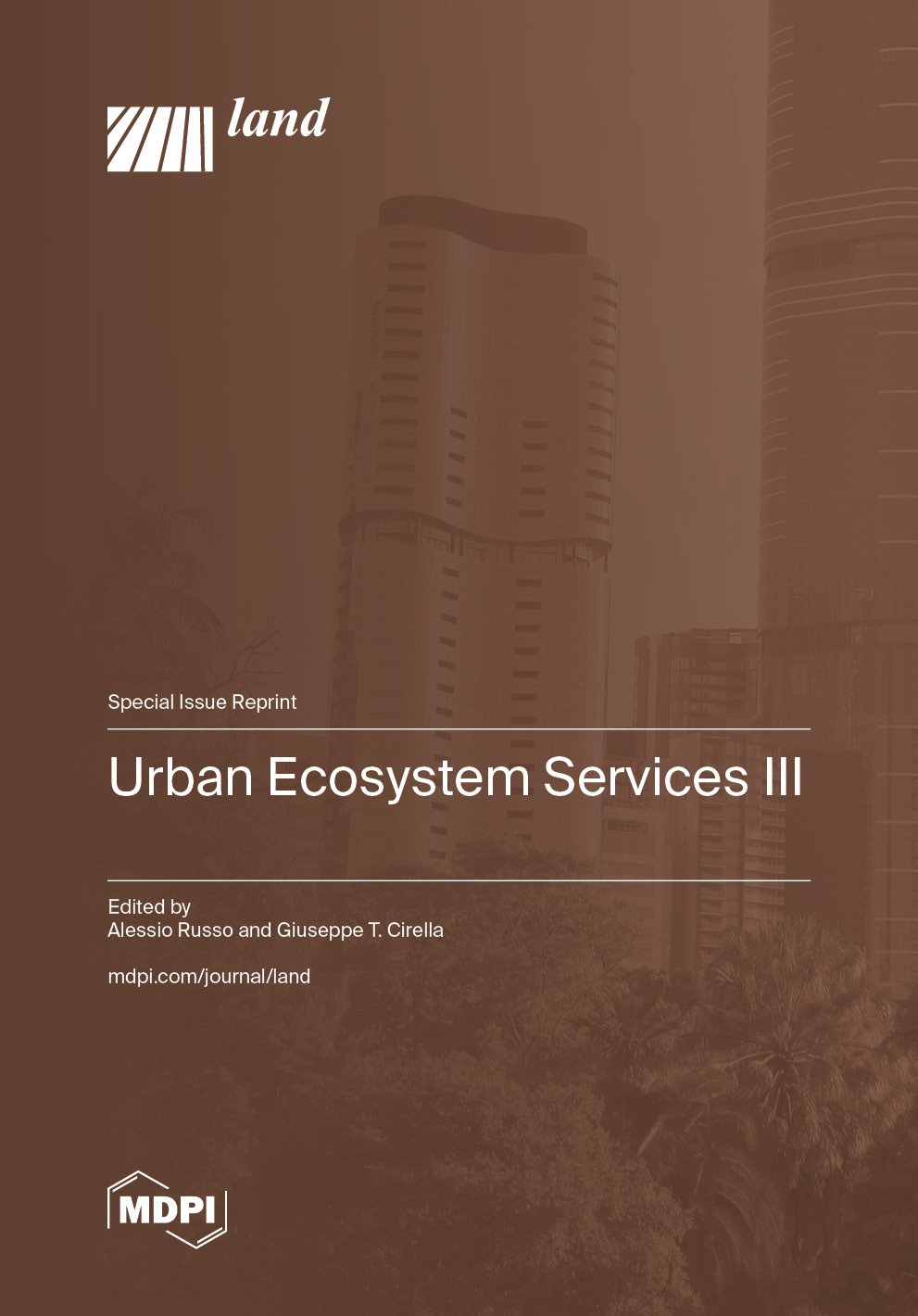 |
“Urban Ecosystem Services III” Edited by Alessio Russo and Giuseppe T. Cirella ISBN 978-3-0365-8747-9 (hardback); ISBN 978-3-0365-8746-2 (PDF) https://doi.org/10.3390/books978-3-0365-8746-2 Available online: https://www.mdpi.com/books/book/7933-urban-ecosystem-services-iii |
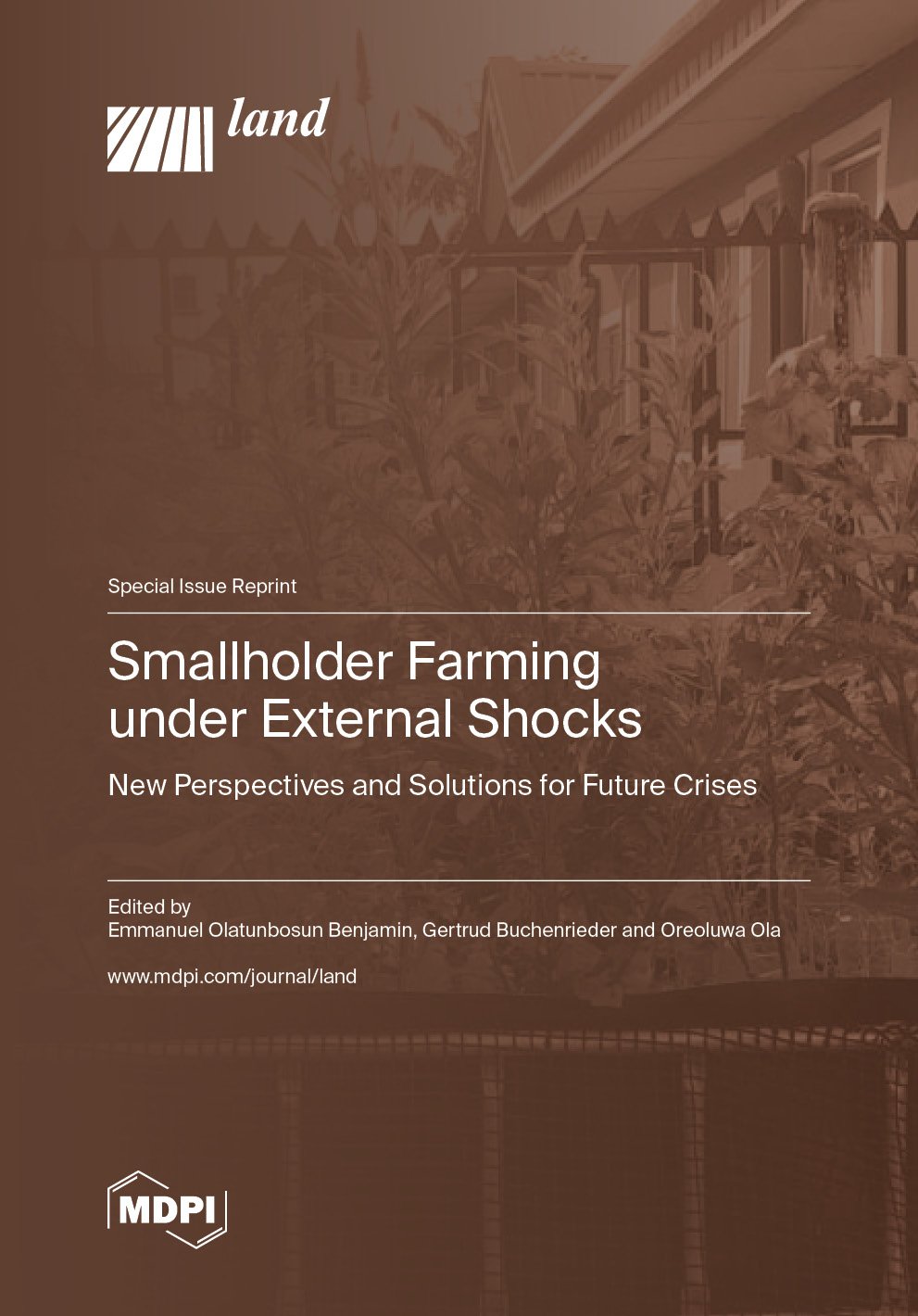 |
“Smallholder Farming under External Shocks: New Perspectives and Solutions for Future Crises” Edited by Emmanuel Olatunbosun Benjamin, Gertrud Buchenrieder and Oreoluwa Ola ISBN 978-3-0365-8294-8 (hardback); ISBN 978-3-0365-8295-5 (PDF) https://doi.org/10.3390/books978-3-0365-8295-5 Available online: https://www.mdpi.com/books/book/7987-smallholder-farming-under-external-shocks-new-perspectives-and-solutions-for-future-crises |
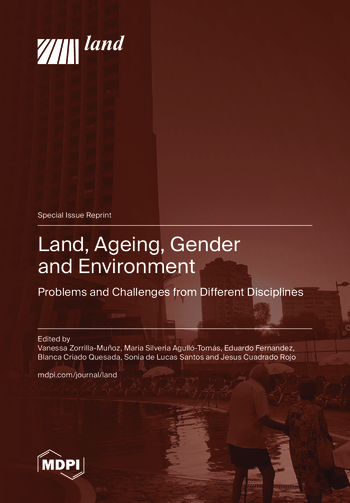 |
“Land, Ageing, Gender and Environment: Problems and Challenges from Different Disciplines” Edited by Vanessa Zorrilla-Muñoz, Maria Silveria Agulló-Tomás, Eduardo Fernandez, Blanca Criado Quesada, Sonia de Lucas Santos and Jesus Cuadrado Rojo ISBN 978-3-0365-8202-3 (hardback); ISBN 978-3-0365-8203-0 (PDF) https://doi.org/10.3390/books978-3-0365-8203-0 Available online: https://www.mdpi.com/books/book/7876-land-ageing-gender-and-environment-problems-and-challenges-from-different-disciplines |
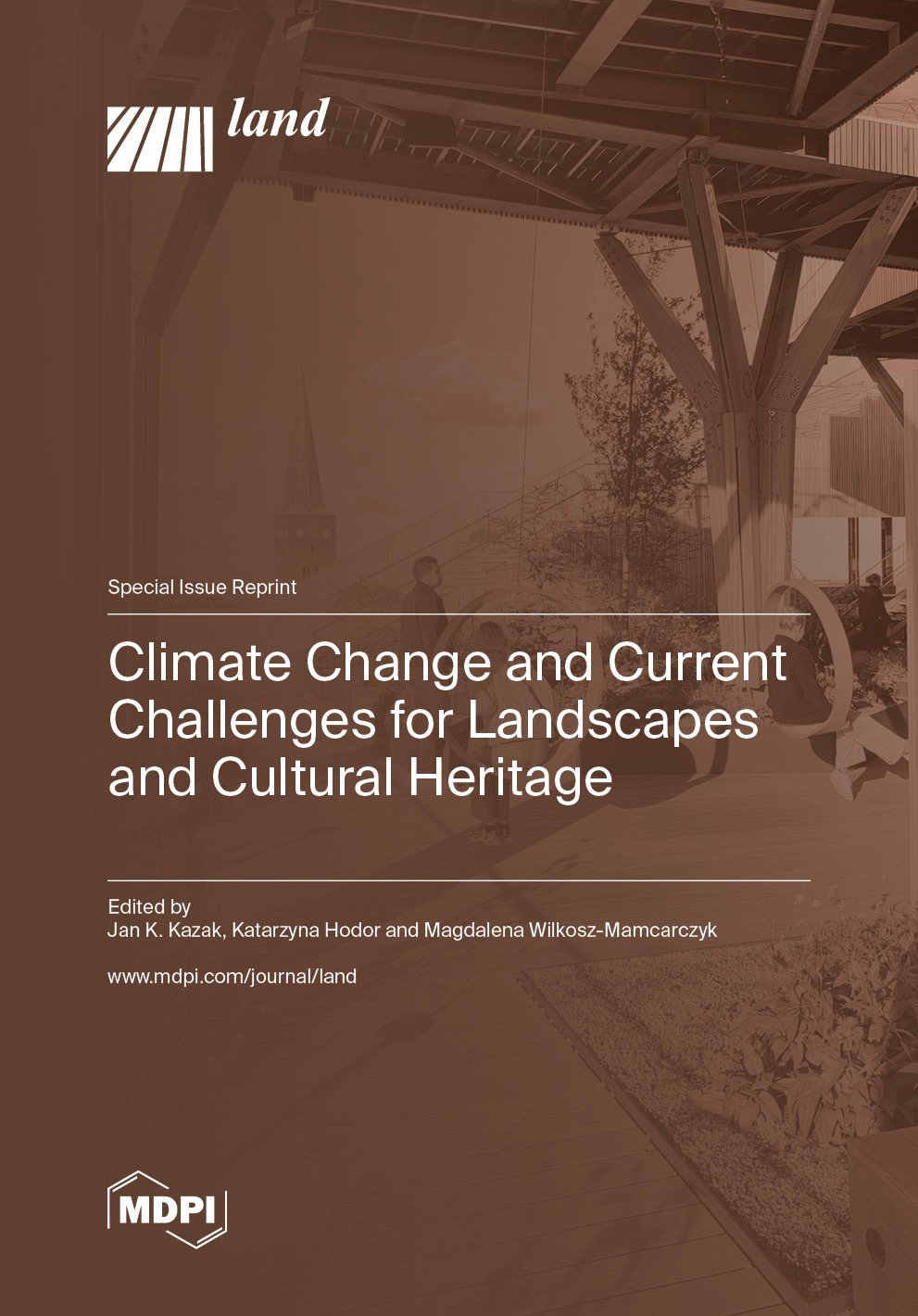 |
“Climate Change and Current Challenges for Landscapes and Cultural Heritage” Edited by Jan K. Kazak, Katarzyna Hodor and Magdalena Wilkosz-Mamcarczyk ISBN 978-3-0365-8504-8 (hardback); ISBN 978-3-0365-8505-5 (PDF) https://doi.org/10.3390/books978-3-0365-8505-5 Available online: https://www.mdpi.com/books/book/7767-climate-change-and-current-challenges-for-landscapes-and-cultural-heritage |
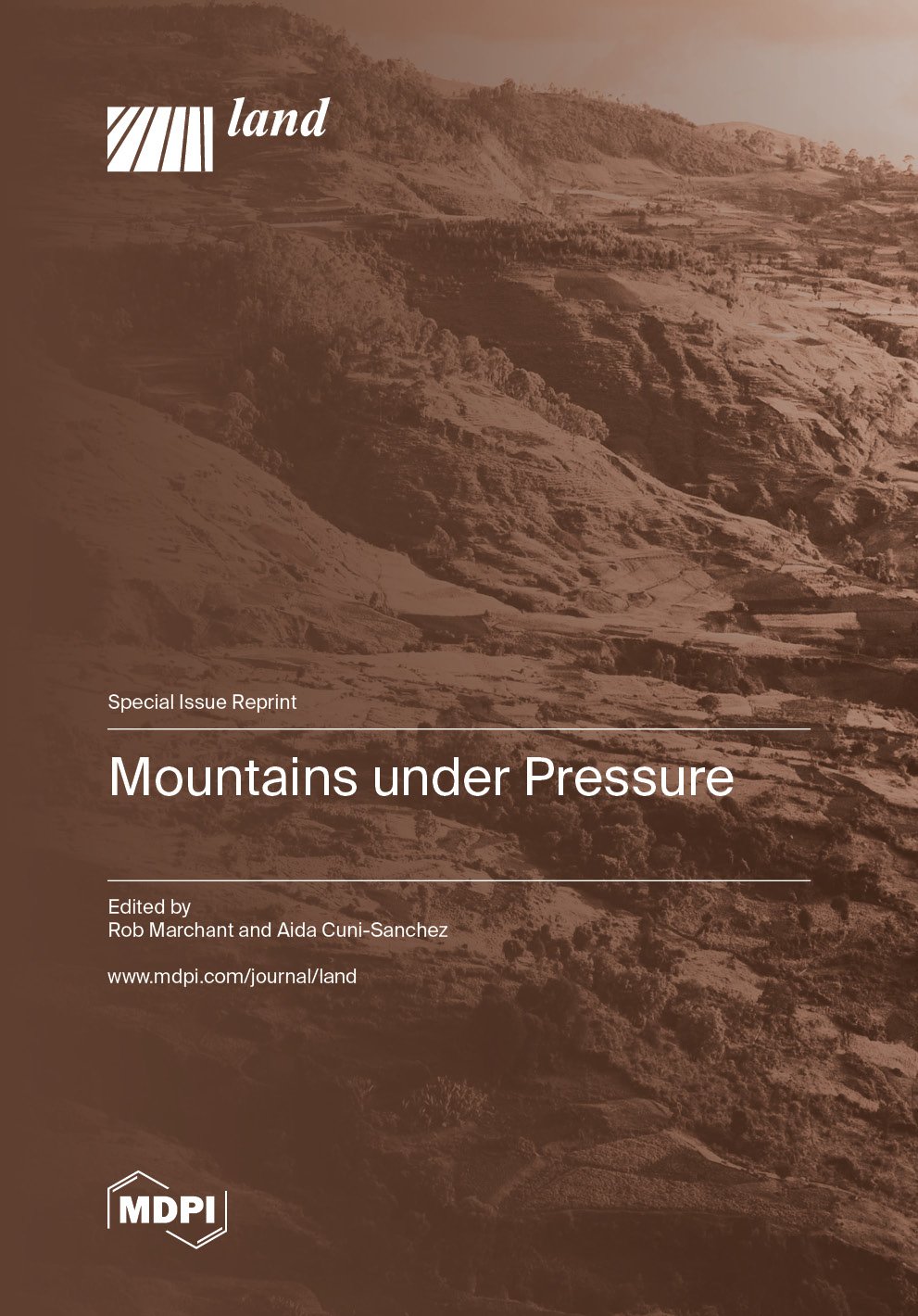 |
“Mountains under Pressure” Edited by Rob Marchant and Aida Cuni-Sanchez ISBN 978-3-0365-8174-3 (hardback); ISBN 978-3-0365-8175-0 (PDF) https://doi.org/10.3390/books978-3-0365-8175-0 Available online: https://www.mdpi.com/books/book/7730-mountains-under-pressure |
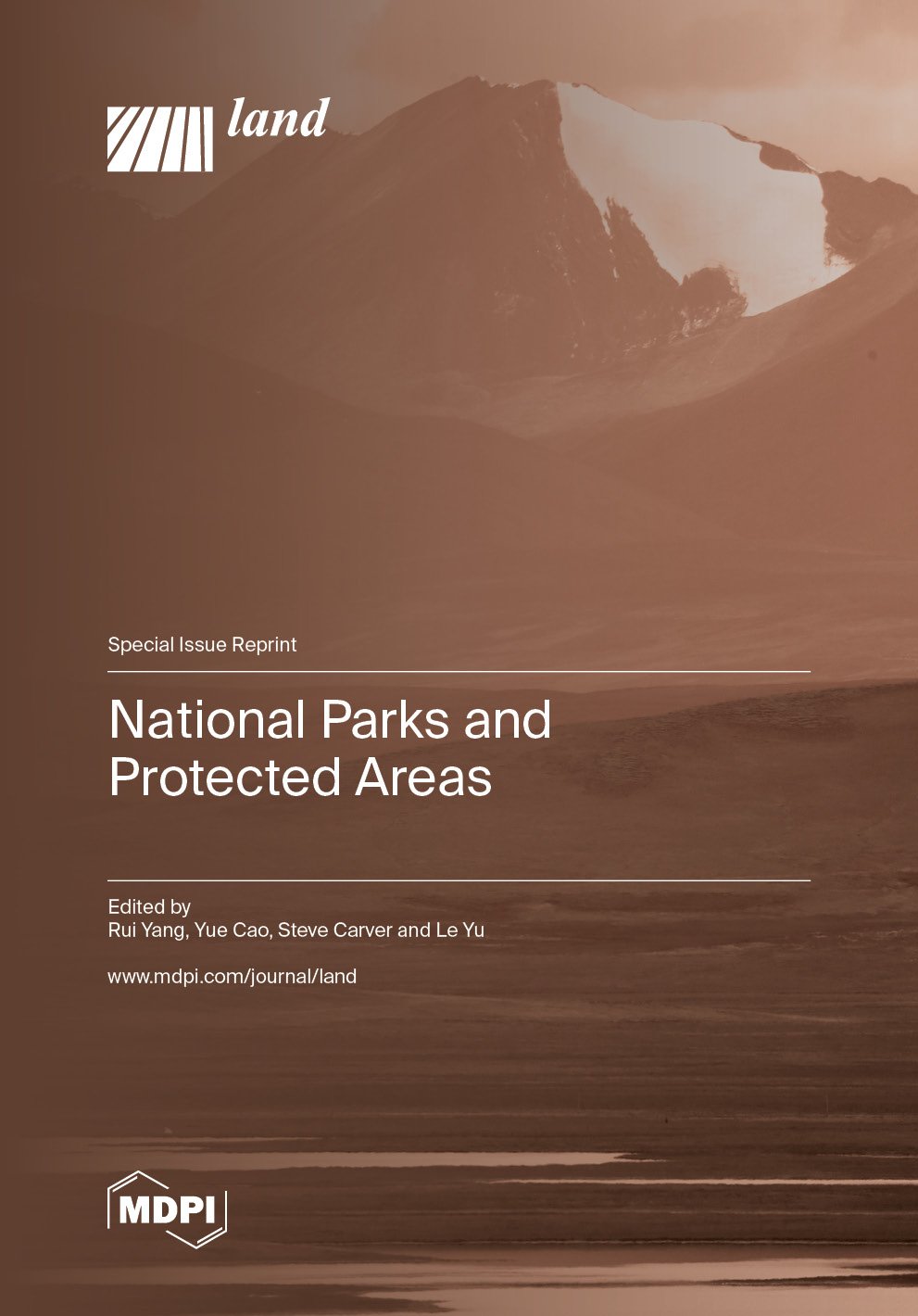 |
“National Parks and Protected Areas” Edited by Rui Yang, Yue Cao, Steve Carver and Le Yu ISBN 978-3-0365-8312-9 (hardback); ISBN 978-3-0365-8313-6 (PDF) https://doi.org/10.3390/books978-3-0365-8313-6 Available online: https://www.mdpi.com/books/book/7670-national-parks-and-protected-areas |
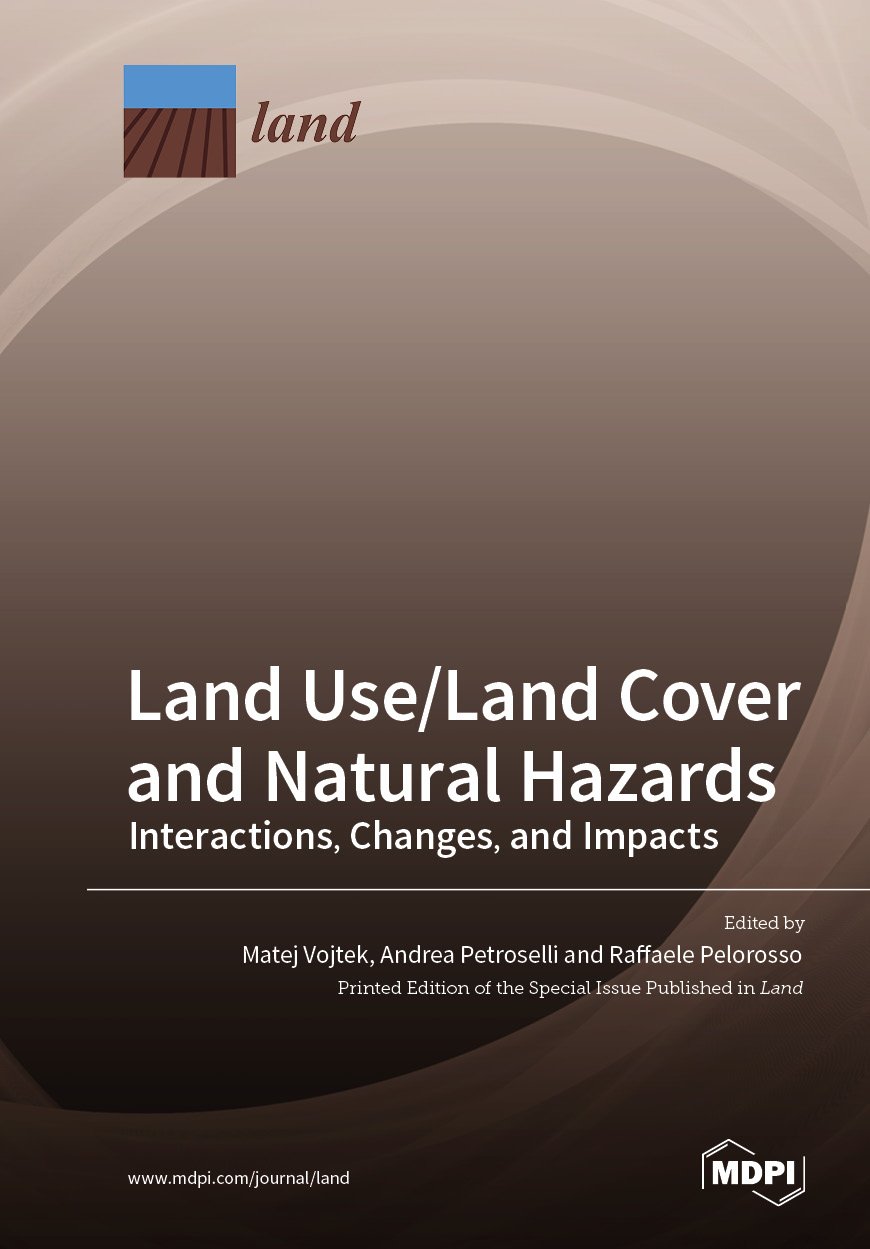 |
“Land Use/Land Cover and Natural Hazards: Interactions, Changes, and Impacts” Edited by Matej Vojtek, Andrea Petroselli and Raffaele Pelorosso ISBN 978-3-0365-6738-9 (hardback); ISBN 978-3-0365-6739-6 (PDF) https://doi.org/10.3390/books978-3-0365-6739-6 Available online: https://www.mdpi.com/books/book/6906-land-use-land-cover-and-natural-hazards-interactions-changes-and-impacts |
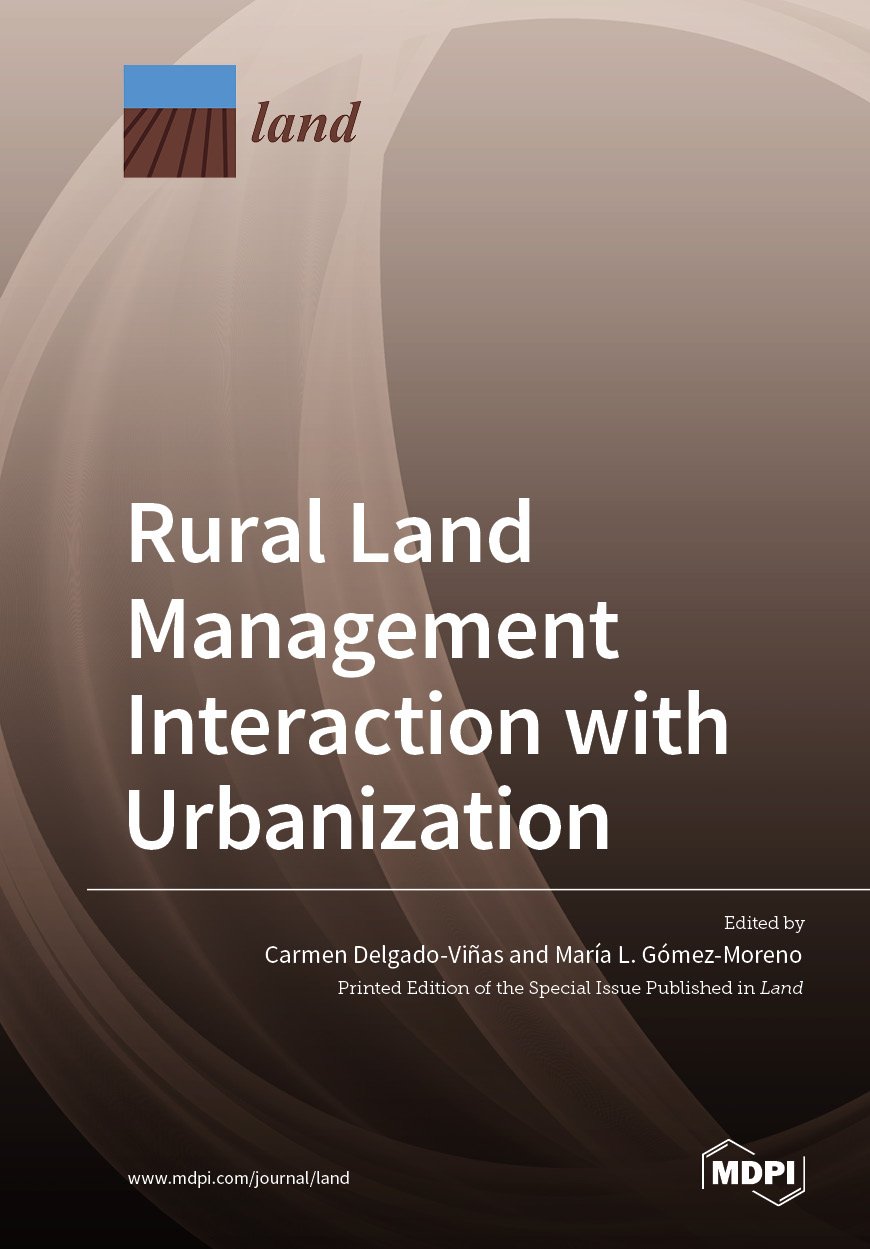 |
“Rural Land Management Interaction with Urbanization” Edited by Carmen Delgado-Viñas and María L. Gómez-Moreno ISBN 978-3-0365-6552-1 (hardback); ISBN 978-3-0365-6553-8 (PDF) https://doi.org/10.3390/books978-3-0365-6553-8 Available online: https://www.mdpi.com/books/book/6899-rural-land-management-interaction-with-urbanization |
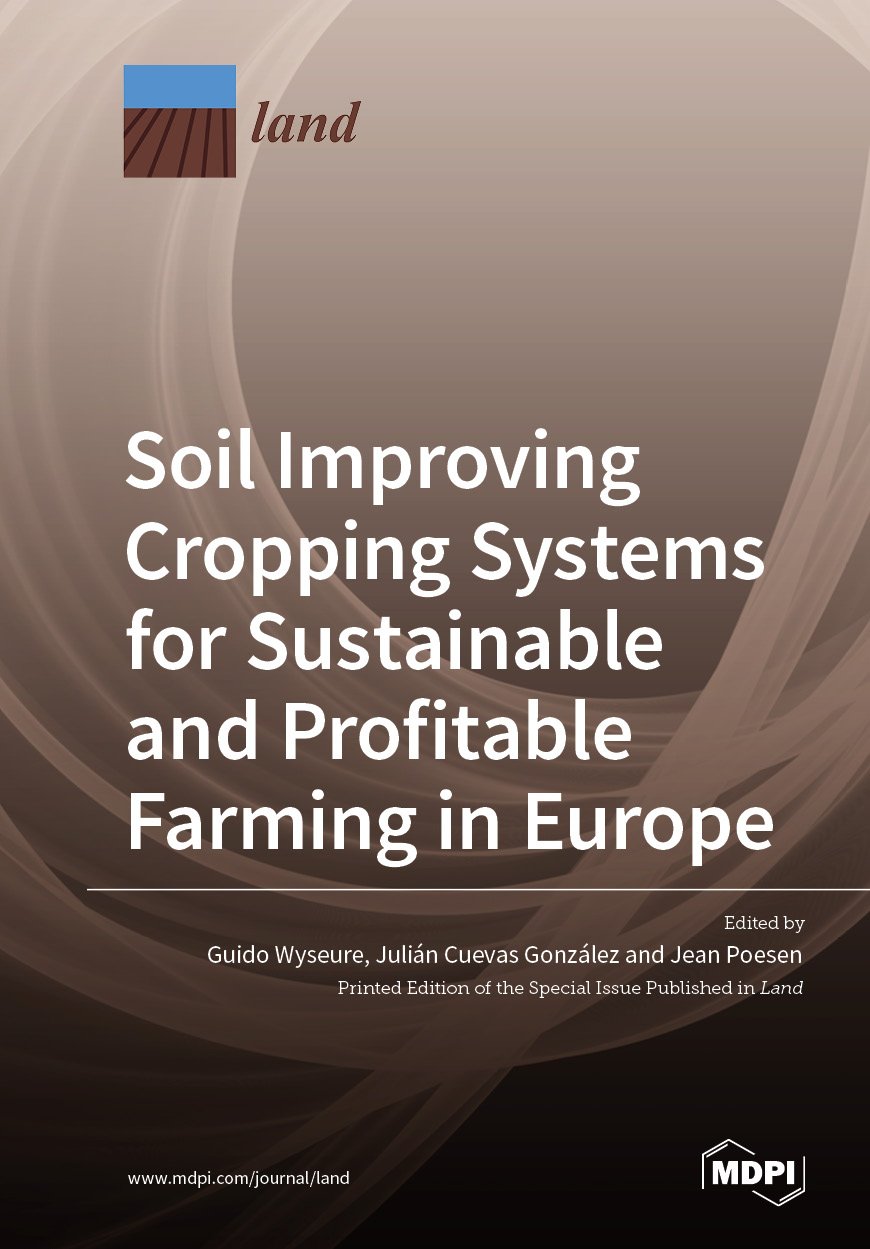 |
“Soil Improving Cropping Systems for Sustainable and Profitable Farming in Europe” Edited by Guido Wyseure, Julián Cuevas González and Jean Poesen ISBN 978-3-0365-6253-7 (hardback); ISBN 978-3-0365-6254-4 (PDF) https://doi.org/10.3390/books978-3-0365-6254-4 Available online: https://www.mdpi.com/books/book/6660-soil-improving-cropping-systems-for-sustainable-and-profitable-farming-in-europe |
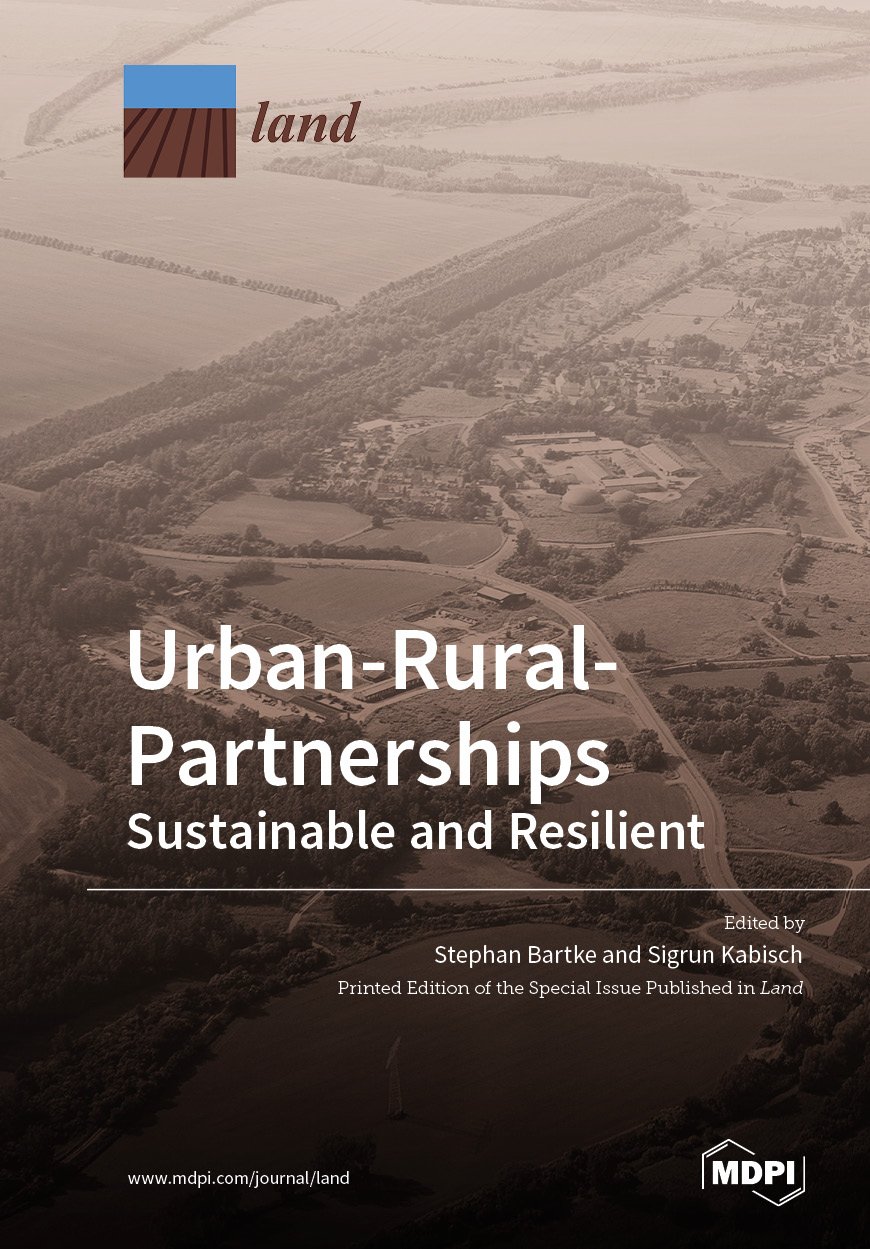 |
“Urban-Rural-Partnerships Sustainable and Resilient” Edited by Stephan Bartke and Sigrun Kabisch ISBN 978-3-0365-5141-8 (hardback); ISBN 978-3-0365-5142-5 (PDF) https://doi.org/10.3390/books978-3-0365-5142-5 Available online: https://www.mdpi.com/books/book/6594-urban-rural-partnerships |
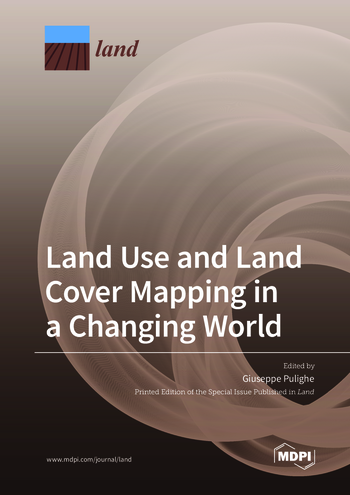 |
“Land Use and Land Cover Mapping in a Changing World” Edited by Giuseppe Pulighe ISBN 978-3-0365-6108-0 (hardback); ISBN 978-3-0365-6107-3 (PDF) https://doi.org/10.3390/books978-3-0365-6107-3 Available online: https://www.mdpi.com/books/book/6552-land-use-and-land-cover-mapping-in-a-changing-world |
29 January 2024
Meet Us at the MDPI World Wetlands Day 2024 Webinar, 2 February 2024

MDPI would like to invite all experts recognized in their fields to attend the MDPI World Wetlands Day 2024 Webinar, which will be held on 2 February 2024. The aim of this webinar is to encourage researchers to join together, take action, and raise awareness as to how the exchange of findings facilitates efforts to stop wetland loss.
We are looking forward to seeing you at the MDPI World Wetlands Day 2024 Webinar.
Title: MDPI World Wetlands Day 2024 Webinar
Date: 02 February 2024
Time: 10:00 a.m.–12:00 a.m. (CET) | 5:00 p.m.–7:00 p.m. (EST)
More Information: https://sciforum.net/event/WWD2024
This is a free webinar. After registering, you will receive a confirmation email containing information on how to join the webinar. Registrations with academic institutional email addresses will be prioritized.
Unable to attend? Register anyway and we will let you know when the recording is available to watch.
Register for free:
Program:
| Speaker/Presentation | Time in CET | Time in EST |
| Introduction | 10:00 a.m.–10.10 a.m. | 5:00 p.m.–5:10 p.m. |
| Professor Stephen Tooth “Wetlands in Drylands: ‘Hotspots’ of Ecosystem Services in Marginal Environments” |
10:10 a.m.– 10:40 a.m. | 5:10 p.m.–5:40 p.m. |
| Prof. Dr. Miklas Scholz “Sustainable Treatment Wetland Systems” |
10:40 a.m.– 11:10 a.m. | 5:40 p.m.–6:10 p.m. |
| Dr. Krish Jayachandran “Wetland Soils Health” |
11:10 a.m.–11:40 a.m. | 6:10 p.m.–6:40 p.m. |
| Q&A | 11:40 a.m.–11:55 a.m. | 6:40 p.m.–6:55 p.m. |
| Closing of Webinar | 11:55 a.m.–12:00 p.m. | 6:55 p.m.–7:00 p.m. |
Relevant Special Issues:
Applied Sciences
“River and Lake Catchments: Ecological Challenges, Hydrological Changes, Environmental Problems”
Guest Editors: Prof. Dr. Christian Opp and Dr. Tom Lotz
Deadline for manuscript submissions: 20 February 2024
Environments
“Monitoring and Assessment of Environmental Quality in Coastal Ecosystems Volume III“
Guest Editor: Dr. Sílvia C. Gonçalves
Deadline for manuscript submissions: 20 May 2024
Hydrobiology
“Ecosystem Disturbance in Small Stream“
Guest Editor: Prof. Dr. Baik-Ho Kim
Deadline for manuscript submissions: 30 June 2024
Forests
“Research on Vegetation Change in Forest Wetlands“
Guest Editor: Dr. Jasmin Mantilla-Contreras
Deadline for manuscript submissions: 15 August 2024
Remote Sensing
“Remote Sensing for Mapping and Monitoring Wetlands and Their Ecosystems“
Guest Editor: Dr. Andy Hardy
Deadline for manuscript submissions: 31 May 2024
“Remote Sensing of Forest and Wetland Hydrology“
Guest Editor: Prof. Dr. Sudhanshu Sekhar Panda
Deadline for manuscript submissions: 31 March 2024
“Future of the Wetlands in Megacities under Rapid Urbanization: Geospatial Analysis and Modeling of the Land-Use Changes Using Remotely Sensed Data and GIS“
Guest Editors: Dr. Darshana Athukorala and Prof. Dr. Yuji Murayama
Deadline for manuscript submissions: 26 June 2024
“Remote Sensing for Wetland Restoration“
Guest Editors: Prof. Dr. Xiyong Hou, Prof. Dr. Weiwei Sun, Prof. Dr. Dehua Mao, Dr. Chao Chen and Dr. Dong Li
Deadline for manuscript submissions: 31 May 2024
Diversity
“Knowledge and Conservation of Peatlands and Their Biodiversity“
Guest Editors: Prof. Dr. Xabier Pontevedra Pombal and Dr. Martín Souto
Deadline for manuscript submissions: 15 November 2024
“Ecology, Diversity and Conservation of Aquatic and Helophytic Plants, Plant Communities and Their Environments“
Guest Editor: Prof. Dr. Jarosław Proćków
Deadline for manuscript submissions: 30 November 2024
“Biodiversity Conservation in Metacommunities“
Guest Editor: Dr. Alessandro Ferrarini
Deadline for manuscript submissions: 30 April 2024
Land
“Ecosystem Services and Coastal Management: Tools to Counteract Sediment Losses“
Guest Editors: Prof. Dr. Margherita Palmieri, Prof. Marucci Angelo and Prof. Dr. Marcello Di Risio
Deadline: 31 July 2024
“Recent Advances in the Ecological Conservation of Coastal Landscapes“
Guest Editor: Prof. Dr. Augusto Pérez-Alberti
Deadline: 30 April 2024
“Soil Security of Peatland Ecosystems: Risk Assessment, Pollution Prevention and Restoration“
Guest Editors: Dr. Oskars Purmalis and Dr. Marios Drosos
Deadline: 26 April 2024
“Surface Runoff and Soil Erosion in the Mediterranean Region“
Guest Editors: Prof. Dr. Hanoch Lavee and Dr. Lea Wittenberg
Deadline: 30 April 2024
“Ecological and Cultural Ecosystem Services in Coastal Areas“
Guest Editors: Dr. Mita Drius, Prof. Maria Laura Carranza and Prof. Dr. Robert Philipp Wagensommer
Deadline: 30 April 2024
“Global Change in Mediterranean Regions: Potential Impact of Climate Drift and Land Use on Soil Erosion and Land Degradation“
Guest Editors: Dr. Rossano Ciampalini, Dr. Feliciana Licciardello, Dr. Damien Raclot and Dr. Armand Crabit
Deadline: 26 June 2024
“Effects of Land Use on the Ecohydrology of River Basin in Accordance with Climate Change II“
Guest Editors: Dr. Wiktor Halecki, Dr. Dawid Bedla, Dr. Marek Ryczek and Prof. Dr. Artur Radecki-Pawlik
Deadline: 15 March 2024
“Monitoring and Simulation of Wetland Ecological Processes“
Guest Editors: Prof. Dr. Zhenguo Niu, Prof. Dr. Bin Zhao, Prof. Dr. Zhaoqing Luan and Dr. Bo Guan
Deadline: 25 June 2024
Water
“ Microbial Transformation and Transport of Organic Pollutants within Paddy-Ditch-Pond Water “
Guest Editors: Dr. Jing Chen and Dr. Xiang Gao
Deadline: 25 May 2024
“Internal Nutrient Cycling in Lakes and Reservoirs“
Guest Editors: Dr. Xiaolong Yao and Dr. Xingyu Jiang
Deadline: 28 February 2024
“Wetland Ecosystems—Functions and Use in a Changing Climate“
Guest Editor: Prof. Dr. Jianghua Wu
Deadline: 29 February 2024
“Ecohydrological Processes, Environmental Effects, and Integrated Regulation of Wetland Ecosystems, Volume II“
Guest Editors: Prof. Dr. Junhong Bai, Dr. Tian Xie and Dr. Laibin Huang
Deadline: 31 July 2024
25 January 2024
Acknowledgment of the Reviewers of Land in 2023
In recognizing the exceptional efforts of our reviewers in 2023, we express our sincere gratitude for upholding the high standards of Land. Their commitment ensured the rigorous peer review that is integral to quality academic publishing.
In 2023, Land received 8133 review reports, from 4934 reviewers. This past year, we worked with reviewers from 120 countries and regions, reflecting the diversity in our collaboration with research communities. Their dedication shapes scholarly discourse and advances global research. The editorial team expresses gratitude for the vital role played by each reviewer in the Land family throughout 2023, and we look forward to their continued support in 2024.
The following are the reviewers who have consented to show their names:
| Abbasali Sadeghi | Lorena Parra |
| Abdelkader Hamlat | Lorenzo De Vidovich |
| Abdulaziz Alghamdi | Lu Wang |
| Abdullah Addas | Luambo Jeffrey Ramarumo |
| Abdurrahman Eymen | Lubna Anjum |
| Abeer Elshater | Luca Maria Olivieri |
| Abhik Patra | Lucia Rita Pacifico |
| Achim A. Beylich | Lucia Saganeiti |
| Adam Krajewski | Lucian Roșu |
| Adam Łukowski | Luciana Xavier |
| Adam Rajsz | Luciano Bosso |
| Adam Ryszko | Luciano Varela |
| Ádám Szalai | Lucija Azman Momirski |
| Adarsh Sankaran | Lucyna Nyka |
| Adel Surour | Luis Antonio Fernández Portillo |
| Adelina Dumitras | Luis Carlos Sandoval Herazo |
| Adib Kurnia | Luis Conceição |
| Adina Dornean | Luis Da Costa |
| Adis Puška | Luis Diaz-Balteiro |
| Admir Avdagić | Luis Eduardo Akiyoshi Sanches Suzuki |
| Adnan Ahmad | Luis Zambrano |
| Adriaan De Man | Luísa Lucchese |
| Adrian Sadłowski | Luisa Nicoletti |
| Adrianos Retalis | Luz Angela Rocha Salamanca |
| Afed Khan | Lyudmyla Zahvoyska |
| Agita Livina | M. M. Yagoub |
| Agnieszka Jakubowska | Mabrouk Sami |
| Agnieszka Starzyk | Maciej Kruszyna |
| Agnieszka Szmelter-Jarosz | Magdalena Cyrek |
| Agnieszka Wojewódzka-Wiewiórska | Magdalena Piekutowska |
| Agung Sugiri | Magdalena Ryżak |
| Ahmed Abouaiana | Magdalena Rzeszotarska-Pałka |
| Ahmed Abou-Shady | Magdalena Wojarska |
| Ahmed Al Mansur | Magdalena Wróżyńska |
| Ahmed Elbeltagi | Maha Elbana |
| Ahmed Gad | Mahdi Maleki |
| Ahmed Hassan | Mahmood Zoghi |
| Ahmed Jaber | Mahmoud Bayat |
| Ahmed Kayad | Mahmoud F. Seleiman |
| Ahmed Osama Daoud | Mahyar Arefi |
| Ahmed Zaeen | Maierdang Keyimu |
| Ahmet Torun | Maksym Łaszewski |
| Aikaterini Gkoltsiou | Małgorzata Holka |
| Ajaz Ahmad Lone | Manfredo Manfredini |
| Akira Ishida | Maninder Singh Dhillon |
| Albert Casas Ponsati | Manuel Ferrández-Villena |
| Alberto Celani | Manuela Pires Rosa |
| Alejandro Jimenéz Rios | Maomao Zhang |
| Alejandro López González | Marcio Laurini |
| Alejandro Monterroso-Rivas | Marco Cruz-Sandoval |
| Alejandro Prera | Marco Loche |
| Aleksandar Ašonja | Marco Locurcio |
| Aleksandr Shikhov | Marco Maretto |
| Aleksandra Jezierska-Thöle | Marco Mulas |
| Aleksandra Nikolic | Marco Spada |
| Alemu O. Aga | Marek Brennensthul |
| Alena Harbiankova | Marek Ogryzek |
| Alenka Fikfak | Maren Schnieder |
| Alessandra Piccoli | Maria Amelia Martins-Loução |
| Alessandro Corsi | Maria Da Conceição Freitas |
| Alessandro De Paula | Maria De Fátima Oliveira |
| Alessandro Venerandi | María Del Cisne Aguirre Ullauri |
| Alessia Pica | Maria Francesca Ferrario |
| Alex Sendrós | Maria Giulia Cantiani |
| Alex Vinicio Gavilanes Montoya | Maria Górska-Zabielska |
| Alexandra Solomou | Maria Hernandez Hernández |
| Alexandre Jardim | Maria Isabel Delgado |
| Alexandru Bănică | Maria Livia Olivetti |
| Alexandru Olar | Maria Luisa Fernandez-Marcos |
| Alexis Papathanassis | Maria Perez-Lopez |
| Alfredo Fernández-Enríquez | Maria Ragosta |
| Ali Akbar Barati | Maria Rosaria Sessa |
| Ali Akbar Moosavi | Maria Teresa Baquero Larriva |
| Ali Asghar Naghipour | Maria Teresa Ceccherini |
| Alicia López-Rodríguez | Maria Ventura |
| Alicja Pecio | María Verónica Alderete |
| Alina Lato | Maria Zuba-Ciszewska |
| Alireza Koochakzaei | Maria-Francisca Cespedes-Lopez |
| Aliya Naz | Mariagrazia D'Emilio |
| Alma Netzahuatl-Muñoz | Marialessandra Secchi |
| Alma Zavodnik Lamovšek | Mariana Hristova |
| Almasdi Syahza | Maricar Aguilos |
| Alok Kumar | Marii Rasva |
| Alper Serdar Anli | Marijenka Tabaković |
| Álvaro Corrales Álvarez | Marina Kurnikova |
| Alvaro Lopez-Escamilla | Marina Moreno |
| Amar Razzaq | Marina Nikolić Topalović |
| Amarender Reddy | Marinela Istrate |
| Amin Naboureh | Mario Burgui-Burgui |
| Aminreza Iranmanesh | Mario Del Roble Pensado-Leglise |
| Amir Molajou | Mario Velasco |
| Amir Tayyebi | Marioara Nicoleta Filimon |
| Amit Kumar | Mariola Michałowska |
| Amit Singh | Mariola Staniak |
| Amitesh Gupta | Marios Dominikos Kremantzis |
| Ana Fernandes De Oliveira | Marios Spiliotopoulos |
| Ana Ispas | Marius Constantin |
| Ana Luisa Rodrigues | Mariusz Maciejczak |
| Ana Maria Tavares Martins-Nepomuceno | Mariya Zlatkova Stankova |
| Ana Petrović | Marko D. Petrovic |
| Anastasia Blouchoutzi | Marko Joksimović |
| Anastasia Nikologianni | Marlon Vasconcelos |
| Anastasiya Popova | Marsia Marino |
| Anbes Tenaye Kidane | Marta Dziechciarz |
| Anđelija Ivkov Džigurski | Marta Gross |
| Ando Fahda Aulia | Marta Kiraga |
| André Eduardo Biscaia Lacerda | Marta Magadán-Díaz |
| André Luis Azevedo Guedes | Marta Nalej |
| André Samora-Arvela | Marta Pieczara |
| André Vaz-Dos-Santos | Marta Terrados-Cristos |
| Andrea Peirano | Martin Beer |
| Andrea Pravitasari | Martin Evans |
| Andrea Rosario Proto | Martina Bosone |
| Andrea Vacca | Martina Gaglioti |
| Andreas Koch | Martina Štěrbová |
| Andrei Shepelev | Martino Pavignano |
| Andrew Clark | Maruška Šubic Kovač |
| Andrew Lothian | Marwa M. Ragaey |
| Andrey Abramov | Masoud Masoudi |
| Andrey Lavrinenko | Massimo Fabris |
| Andrey Zhidkin | Matevž Juvančič |
| Andrzej Gałaś | Matthias Ripp |
| Andrzej Raszkowski | Maurício Mantoani |
| Angel Burov | Mauricio Quintero-Angel |
| Angel Paniagua Mazorra | Mauricio Ruiz Pérez |
| Anjana J. Atapattu | Mauro Fois |
| Anna Krakowiak-Bal | Max Stephenson, Jr. |
| Anna Maria Visilia | May Ebaid |
| Anna Murawska | Maythm Al-Bakri |
| Anna Przewięźlikowska | Md. Mostafizur Rahman |
| Anna Richiedei | Mehmet Ozdes |
| Anna Rita Cammerino | Mehrdad Bijandi |
| Anna Źróbek-Sokolnik | Meimei Wang |
| Anne Kurjenoja Lounassaari | Meine Pieter Van Dijk |
| Annemie Elsen | Meinolf Kossmann |
| Anselme Muzirafuti | Meng Wang |
| António Almeida | Mengmeng Du |
| Antonio De Pin | Meredith Dobbie |
| Antonio Ganga | Meredith Root-Bernstein |
| Antonio Giménez-Morera | Mesenbet Yibeltal |
| Antonio Miguel Linares-Luján | Mesut Demircan |
| Antonio Nesticò | Michael Deary |
| Antonio Pedro Santos | Michael Dougherty |
| Antonio Santoro | Michael Loupis |
| António Santos | Michael Nones |
| António Xavier | Michael Richter |
| Antonis A. Zorpas | Michael Sergeev |
| Anu Printsmann | Michael Vrahnakis |
| Apoorva Nisal | Michail Georgiou |
| Arian Correa-Díaz | Michał Dudek |
| Armand Kasztelan | Michał Gąsiorek |
| Artur Ferreira | Michał Stępień |
| Artur Gafurov | Michele Campagna |
| Arturo Sánchez-González | Michele Grimaldi |
| Asad Rokhzadi | Michele Staiano |
| Ashita Allamraju | Miguel Amado |
| Ashwani Vasishth | Miguel Segura-Castruita |
| Asif Sajjad | Miha Curk |
| Asma Mehan | Mihaela Popa |
| Athanasios Mogias | Mikhail Filimonov |
| Audrius Aleknavičius | Mikhail Komissarov |
| Aura Rusca | Mikio Ishiwatari |
| Aurel Maxim | Mila Atanasova-Zlatareva |
| Aureliano Malheiro | Milad Janalipour |
| Aureliu-Florin Hălălișan | Milena Krklješ |
| Ayad Al-Quraishi | Milena Tasheva-Petrova |
| Ayman Al-Quraan | Milena Vukmirovic |
| Azita Farashi | Milica Kasanin-Grubin |
| Aziz Ballouche | Minh Tuan Le |
| Aznarul Islam | Minzhe Du |
| Babak Vaheddoost | Miodrag Roić |
| Babar Iqbal | Mir Aftab Hussain Talpur |
| Baclayon Sundo | Mireille Biraro |
| Bahman Jabbarian Amiri | Mirela Stanciu |
| Bao-Jie He | Mirjana Horvat |
| Barbara Aldighieri | Mirnajaf Mousavi |
| Barbara Gherri | Miroslaw Kaminski |
| Barbara Jagosz | Moaaz Kabil |
| Barbara Wieliczko | Mohamed Abdallah |
| Barbara Żarska | Mohamed Abdelrahman |
| Barjeece Bashir | Mohamed Abou Liela |
| Bartłomiej Szypuła | Mohamed Anli |
| Beatriz Perez | Mohamed Babiker Ibrahim |
| Ben Ingram | Mohamed Ouessar |
| Beniamino Russo | Mohammad Arif |
| Benjamin Bergerot | Mohammad Khosroshahi |
| Bernhard Müller | Mohammad Mehdizadeh |
| Bhupendra Singh | Mohammad Nazeri Tahroudi |
| Bhuvan Varugu | Mohammad Paydar |
| Bijay Halder | Mohammad Reza Rezvani |
| Bijay Shakya | Mohammad Saleh Ali-Taleshi |
| Bikarma Singh | Mohammed Abdul-Rahman |
| Bing Guo | Mohammed Alnaim |
| Birgit Schmook | Mohammed Ben Ali |
| Biser Hristov | Mohand Bersi |
| Bishnu Bhattarai | Mohd Johari Mohd Yusof |
| Bishnu Hari Poudyal | Mohd Khairi Ismail |
| Bixia Hu | Mohd Remy Rozainy Mohd Arif Zainol |
| Bo Liu | Mojtaba Parsaee |
| Bogaert Jan | Monica Alcindor |
| Bojan Đerčan | Monika Balawejder |
| Bojan Đurin | Monika Trojanowska |
| Bonginkosi E. Mthembu | Morella Briceño-Avila |
| Bonoua Faye | Moreno Begoña |
| Branden Born | Mousa Pazhuhan |
| Branislav Olah | Muhammad Anwar |
| Brenda Chaves Coelho Leite | Muhammad Arfan |
| Brian Fath | Muhammad Arshad |
| Bulat Usmanov | Muhammad Faheem Adil |
| Cappai Francesco | Muhammad Irfan Ahamad |
| Carla Antunes | Muhammad Ishaq Asif Rehmani |
| Carlo Genova | Muhammad Khalid Bashir |
| Carlo Rindi Nuzzolo | Muhammad Luqman |
| Carlos Aguirre-Nuñez | Muhammad Mannan Afzal |
| Carlos Balsas | Muhammad Mehran Bashir |
| Carlos Diaz Delgado | Muhammad Muddassir |
| Carmen Castañeda | Muhammad Nasar-u-Minallah |
| Carmen Delgado-Viñas | Muhammad Rokhis Khomarudin |
| Carmine Massarelli | Muhammad Safdar |
| Carsten Paul | Muhammad Uzair Yousuf |
| Catarina Patoilo Teixeira | Muhammad Waheed |
| Catherine Benamou | Mukta Chandra Das |
| Cesar Augusto Ruiz Agudelo | Mukti Subedi |
| César Parcero-Oubiña | Mulugeta Belete |
| Chaitanya Pande | Munemasa Teramoto |
| Chaminda Pathirage | Muniappan Ayyanar |
| Chang Xu | Munkhbaatar Buuveibaatar |
| Chao Gao | Murat Ataol |
| Chao Liu | Mustafa Tolga Esetlili |
| Chaofan Xian | Mykola Kharytonov |
| Charalampos Doulgeris | Mykola Malashevskyi |
| Charalampos Skoulikaris | Nada Toueir |
| Chau Phat | Nadia Abbaszadeh Tehrani |
| Chen Yang | Nagwa El-Ashmawy |
| Cheng Li | Nanabhau Kudnar |
| Cheng Sun | Nancy Serwint |
| Chenyu Lu | Naoki Masuhara |
| Chiara Piccini | Nasir Mahmood |
| Chng Saun Fong | Nasrullah Khan |
| Cholho Song | Natalia Lebedeva |
| Chris Bradley | Natalya Ivanova |
| Chris Cavalaris | Nathan Moore |
| Christine Chinelli | Nemanja Tomić |
| Christoph Gollob | Nematollah Khorasani |
| Christopher Ling | Néstor Montalván-Burbano |
| Christos Staboulis | Neveen Talaat |
| Chunbo Huang | Ngadisih Ngadisih |
| Chun-Kai Chen | Niels Hellwig |
| Chunpeng Chen | Nij Tontisirin |
| Ciro José Jardim De Figueiredo | Nikola Krunić |
| Claire Kelly | Nikolaos Tsakiridis |
| Clara Pereira | Nikolay Baranovskiy |
| Concetta Cardillo | Nikolay Kanev |
| Constancio Asis | Nikolay Neykov |
| Constantin Nistor | Nini Song |
| Corina Radulescu | Nitin Goyal |
| Corrado Zoppi | Nívea Adriana Pons |
| Cosmas Wacal | Noelia Soledad Bedoya-Perales |
| Cristian Moreno García | Nor Akmar Abdul Aziz |
| Cristiana Vîlcea | Nuria Rodríguez-López |
| Cristina Coscia | Oana Luca |
| Csaba Horváth | Octavian Groza |
| Csaba Patkós | Odra Saucedo |
| Czesław Adamiak | Olaf Kühne |
| Daikun Wang | Olalekan Onilude |
| Dakota Mccarty | Ole Sorensen |
| Dani Sarsekova | Olga Christopoulou |
| Daniel Noe Coaguila Nuñez | Olga Nesterova |
| Daniela Antonescu | Olga Rogova |
| Daniela Avetisyan | Oluwatoyin Kolawole |
| Daniela Gogoase Nistoran | Omar Belhaj |
| Daniela Jelincic | Orlando Cimino |
| Daniela Soldić Frleta | Otakar Holuša |
| Daniela Tavano | Ouafi Ameur-Zaimeche |
| Daniela Zamfir | Pamela Durán-Díaz |
| Danijela Vukoicic | Panayiotis G. Dimitriadis |
| Danuta Szpilko | Pankaj Kumar |
| Dario Baričević | Panteleimon Xofis |
| Dariusz Gozdowski | Paola Coratza |
| Darko Božanić | Paolo Allasia |
| Darshana Athukorala | Paolo Biagi |
| Darshana Rajapaksa | Paolo Mulè |
| Daulat R. Bhardwaj | Paolo Rosasco |
| David González-Álvarez | Parameswari Ettiyagounder |
| David Gray | Paraskevas Nikolaou |
| David Matamoros | Paraskevi Karanikola |
| David Rivas-Tabares | Parsa Arbab |
| David Vico | Pasquale De Toro |
| Davide Settembre-Blundo | Pasquale Napoletano |
| Davide Stefano | Patricia Iweka |
| Davide Visentin | Patricia Mckay |
| Dawid Kudas | Patrick Miller |
| Debora Sotto | Patrizia Borsotto |
| Deep Raj | Paul Armstrong |
| Deepa Rawat | Paul Osmond |
| Deepranjan Sarkar | Paula María Triviño-Tarradas |
| Dejan Vasović | Paulette Steeves |
| Demetrios Tsesmelis | Paulo Carvalho |
| Deng Qinghai | Paulo Escandón |
| Denis Krivoguz | Paulo Miguel De Bodas Terassi |
| Deqiang Cheng | Paulo Pereira |
| Derk Jan Stobbelaar | Paunita Boanca |
| Desimir Knežević | Pavel Kishcha |
| Desouza Blaise | Pavel Ukrainskiy |
| Despina Dimelli | Pawel Chmielinski |
| Despina-Maria Bordean | Paweł Ćwiąkała |
| Dhirender Kumar | Pawel Wolniewicz |
| Diana Dushkova | Pedro Camilo Alcantara Concepcion |
| Diána Koponicsné Györke | Pedro Chamusca |
| Diana Moanga | Pedro Cisneros-Saguilán |
| Didier G. Leibovici | Pedro Soares |
| Diego Portalanza | Pedro Vicente Mauri |
| Diego Trevisan | Peiheng Yu |
| Diep Dao | Pelin Alaboz |
| Dieter Rink | Peng Cui |
| Dietrich Schroeder | Pengtao Wang |
| Dimitrios Kaltsas | Peplinski Benedykt |
| Dimitris Skuras | Peter Josef Stauvermann |
| Dingde Xu | Péter Miklós Kőmíves |
| Diogo Vidal | Peter Ragalyi |
| Diosey Ramon Lugo-Morin | Peter Watson |
| Dirk Landgraf | Petlovanyi Mykhailo |
| Dmitrii Vlasov | Petr Dvořák |
| Dmitry Ruban | Petr Pyszko |
| Dmslb Dissanayake | Petra Pereković |
| Domenico D'Uva | Petra Schneider |
| Domenico Morrone | Pieranna Servadio |
| Dominika Dąbrowska | Pietro Parisi |
| Dominique Arrouays | Piotr Gibas |
| Domonkos Varga | Piotr Stachowski |
| Donald Cole | Pir Mohammad |
| Donald Okeke | Polixeni Iliopoulou |
| Donatella Privitera | Pouria Ataei |
| Dong Zhao | Pradeep Panda |
| Dongchan Kim | Pradip Bhattacharrya |
| Donghwa Shon | Prashant Sharma |
| Dorotea Kovačević | Przemyslaw Mroczek |
| Dorothy Queiros | Pulakesh Das |
| Dragana Čavlović | Purevtseren Myagmartseren |
| Drago Sever | Qazi Umar Farooq |
| Dragos Dinca | Qi Fu |
| Dulce Flores-Rentería | Qi Wang |
| Dündar Dağlı | Qian-Cheng Wang |
| Ebode Valentin Brice | Qiangqiang Sun |
| Edinéia Galvanin | Qingfeng Wang |
| Edoardo Bucchignani | Qinglei Zhao |
| Édson Bolfe | Qiuyue Zhao |
| Eduardo Gomes | Qiwen Dai |
| Eduardo Gutiérrez | Quang Truong |
| Eduardo Mosquera Adell | Quentin Fiacre Togbévi |
| Eduardo Stefani | Qunfeng Ji |
| Edward Laws | Qunxi Gong |
| Eeswaran Rasu | R. B. Radin Firdaus |
| Egidijus Šarauskis | Rachele Venanzi |
| Ehsan Mohammadi Zahrani | Radu Racovita |
| Ekaterina Ershova | Radu-Daniel Pintilii |
| Elchin Suleymanov | Rafael García-Quesada |
| Eldiiar Duulatov | Rafael Ubaldo Gosálvez Rey |
| Elena Bogan | Raghavendra Singh |
| Elena Bukvareva | Rajeev Padbhushan |
| Elena Dimitrova | Rajendra Yadav |
| Elena García Campos | Ralf-Uwe Syrbe |
| Elena Klyuchnikova | Ramona Huzum |
| Elena Marrocchino | Ran Tao |
| Elena Mazzola | Rana Aslam |
| Elena Shcherbina | Rana Waqar Aslam |
| Elgar Barboza | Raoof Mostafazadeh |
| Elham Farahani | Raquel Faria De Deus |
| Eliã Botelho | Rashed Karim |
| Elif Sertel | Rattanawat Chaiyarat |
| Elina Oksanen | Raul Matsushita |
| Elisabetta Salvatori | Raularian Rusu |
| Elisabetta Venco | Raul-David Șerban |
| Elizaveta Konstantinova | Raymond Hintz |
| Elnaz Amirahmadi | Renata Marks-Bielska |
| Eloy Conde Barajas | Renata Valente |
| Elzbieta Bielecka | Renfeng Ma |
| Emad Noaime | Reza Askarizad |
| Emanuel Lekakis | Ricardo Andrade |
| Emanuele Zamperini | Ricardo Klein |
| Emiliano Gallaga | Riccardo Testa |
| Emilija Nikolić | Richard Butler |
| Emilio Chiodo | Ricky Kemarau |
| Emilio Ortega | Rifaat Abdalla |
| Emna Medhioub | Rinaldo Genevois |
| Ena E. Mata-Zayas | Rita Marcia Vieira |
| Enrico Marone | Rita Ochoa |
| Enrique Cabanilla | Rita Tufano |
| Eranga M. Wimalasiri | Rob Kim Marjerison |
| Erdem Küçüktopcu | Robert Czubaszek |
| Eresanya Emmanuel | Robert Guzik |
| Erginbay Uğurlu | Robert Jung |
| Erianto Putra | Robert Kalbarczyk |
| Erika D. Ursic | Robert Onyeneke |
| Ermias Demessie | Robert Pietrzykowski |
| Ernan Rustiadi | Robert Špaček |
| Ernst Drewes | Robert Szczepanek |
| Ertan Ates | Roberto De Lotto |
| Esmat Ali | Rodrigo Silva |
| Esperanza Fernandez-Martinez | Rogério Marinho |
| Eugeniusz Pronin | Rohan Bennett |
| Eunkyu Lee | Rohinton Emmanuel |
| Eusebio Cano Carmona | Roland Linck |
| Éva Salamon-Albert | Rolf Bergs |
| Eva-Maria Unger | Roman Gorbunov |
| Evangelia Karasmanaki | Romanos Ioannidis |
| Evgeny Bojko | Romina D'Ascanio |
| Ewa Referowska-Chodak | Ronald Roopnarine |
| Fabiana Battistin | Ronghua Zhong |
| Fabio Angeoletto | Rosa María Regueiro-Ferreira |
| Fabio Naselli | Rose Luiza Moraes Tavares |
| Fabricio Daniel Dos Santos Silva | Rubina Canesi |
| Fabrizio Aimar | Rudra Mohan Pradhan |
| Fabrizio Finucci | Rudy Pramono |
| Fahim Khan | Rueiyuan Wang |
| Fahmi Mustofa | Rui Li |
| Fateh Mamine | Ryan Ramirez |
| Fatemeh Tabib Mahmoudi | S. Bister |
| Fatih Eren | S. L. Borana |
| Fátima Silva | Saad Ibrahim |
| Fausto Sarmiento | Sabab Ali Shah |
| Fay Al-Khalifa | Sabri Kanzari |
| Federico Galacho-Jiménez | Saeed Esfandi |
| Fei Zhang | Saeid Amini |
| Feleke Sishu | Saeid Niazmardi |
| Felix Arion | Saeid Norouzian-Maleki |
| Feng Chen | Safdar Bashir |
| Ferdinando Trapani | Sagar Godar Chhetri |
| Fernando Mazarron | Sai Siddhartha Nudurupati |
| Fernando Puente-Sotomayor | Said Lahssini |
| Ferréol Berendt | Sait Sarr |
| Filip Suchoń | Saja Kosanovic |
| Florentina Merciu | Salahuddin Jaber |
| Florian Bodescu | Salem Issa |
| Florin Nenciu | Salim Heddam |
| Fotios Chatzitheodoridis | Sally Stone |
| Fouad El Mansouri | Salvador Garcia-Ayllon |
| Fousseni Folega | Salvatore Giuffrida |
| Foyez Ahmed Prodhan | Samuele De Petris |
| Francesca Dal Cin | Sana Arshad |
| Francesca Giaré | Sandeep K. Malyan |
| Francesca Picchio | Sandeep Panchal |
| Francesca Sabatini | Sándor Frey |
| Francesco Busca | Sandra Martins |
| Francesco Cerasoli | Sandra Wajchman-Świtalska |
| Francesco Ciani | Sang-Woo Lee |
| Francesco Rotondo | Sanjit Kumar Mondal |
| Francesco Tajani | Sarfraz Hashim |
| Francis Oloo | Saúl Torres-Ortega |
| Francis Roy | Saulius Vasarevičius |
| Francisco Ballina | Saulo Folharini |
| Francisco Bautista | Şaziye Özge Atik |
| Francisco Da Silva Costa | Sean Gordon |
| Francisco Entrena-Duran | Sebastian Bernat |
| Francisco Javier Castellano Álvarez | Sebastiano Carbonara |
| Francisco Jesús | Selvakumar Radhakrishnan |
| Francisco Vázquez Pardo | Serena Ciabò |
| Franz Grossauer | Sergey Vasin |
| Fred Bidandi | Sergio Espinoza |
| Friederike Well | Sergio Reyes |
| Fuat Kaya | Sergio Serra |
| Gábor Mélypataki | Sergiy Lavrenko |
| Gábor Pozsgai | Seung Gyu Kim |
| Gabriela Muñoz | Sevda Akyürek |
| Gabriele Broll | Seyed Mohammad Hojjati |
| Gabriella Esposito De Vita | Seyed Mohammad Moein Sadeghi |
| Gabriella Graziuso | Seyed Mohsen Hosseini |
| Gana Gecheva | Seyedeh Kosar Hamidi |
| Gang Liu (Institute of Soil and Water Conservation, Chinese Academy of Sciences) | Seyit Hayran |
| Gang Liu (Key Laboratory of Land Surface Pattern and Simulation, Institute of Geographic Sciences and Natural Resources Research, Chinese Academy of Sciences) | Shah Fahad |
| Gang Liu (Tianjin University) | Shahbaz Khan |
| Gaofeng Xu | Shahid Nawaz Khan |
| Gayane Tovmasyan | Shahidul Islam |
| Gema Ramírez Guerrero | Shahira Abdel-Razek |
| Gema Sanchis Soler | Shaikh Shamim Hasan |
| Georg Neugebauer | Shandong Niu |
| George Bariamis | Shangmin Zhao |
| Georgios Karakatsanis | Shangrong Lin |
| Georgios Maris | Shankar Panthi |
| Gerardo Semprebon | Shaohua Lei |
| Gerardo Ubilla-Bravo | Shaoyao Zhang |
| Gerónimo Quiñonez–Barraza | Shashi Mesapam |
| Gheorghe Cristian Popescu | Shi Manjiang |
| Giandomenico Foti | Shianghau Wu |
| Gianluigi Gallenti | Shichong Yuan |
| Giedre Keen | Shidong Ge |
| Gilberto Vaz | Shilong Li |
| Gintarė Vaznonienė | Shinya Ikeda |
| Giorgio Anfuso | Shirish Singh |
| Giovana Espindola | Shiv Vendra Singh |
| Giovanni Avila-Flores | Shiwei Dong |
| Giovanni Belletti | Shiyi Song |
| Giovanni Fusco | Shu Wang |
| Giulia Guerri | Shuaifeng Li |
| Giuliano Ramat | Shuang Li |
| Giulio Senes | Shuang Liu |
| Giuseppe Casula | Shun Hongo |
| Giuseppe Ottria | Sidong Zhao |
| Giuseppe Pulighe | Siliang Yang |
| Giuseppe Russo | Silivan Valentin Moldovan |
| Giuseppe Tagarelli | Silvia Mazzetto |
| Gleb Zaitsev | Silvia Puiu |
| Göker Aksoy | Silvio Cristiano |
| Gonçalo Fernandes | Silviu Beciu |
| Gonzalo Espinoza-Dávalos | Simbarashe Jombo |
| Gopal Shukla | Simon Hull |
| Gösta Baganz | Simona Barbaro |
| Grazia Napoli | Simona Giordano |
| Graziella Trovato | Sina Keller |
| Gregor Čok | Sinan Li |
| Gregorio Garcia | Sinisa Polovina |
| Grzegorz Ginda | Siniša Srečec |
| Guadalupe Esteban Vazquez Becerra | Sisi Yu |
| Gudrun Hillebrand | Sisira Ediriweera |
| Guerrero Francisco | Siyu Miao |
| Guido Paliaga | Sk Ajim Ali |
| Guillaume Debaene | Slaven Gasparovic |
| Guillermo José Martínez Pastur | Sławomir Ligęza |
| Gunilla Lindholm | Snežana Štetić |
| Guolei Zhou | Snezhana Dineva |
| Gustavo De Almeida Coelho | Snezhana Gocheva-Ilieva |
| György Csomós | Sobia Baig |
| Gyula Nagy | Soheil Sabri |
| Habib Ahmari | Sohrab Mirassi |
| Habib Saidi | Sol García-Germán |
| Hadi Alizadeh | Somaye Vaissi |
| Hadi Farhadi | Song Zhengna |
| Hai Yan | Songbo Wu |
| Haifeng Gao | Sookuk Park |
| Hamdan Omar | Soowoong Noh |
| Hamid Mirzahossein | Sören Köpke |
| Hamid Moghaddam | Spyridon Galatsidas |
| Hamid Motieyan | Sreelash Krishnan Kutty |
| Hamideh Beigi | Sreetheran Maruthaveeran |
| Hamidreza Balouchi | Sridhar Patra |
| Hamza Gabriel | Stavros Kalogiannidis |
| Han Yue | Stefania Bilardi |
| Hang Liu | Stefania Maria Lorenza Rimoldi |
| Hanuman Jatav | Stefano Bertoldi |
| Haoming Chen | Stefanos Stefanou |
| Harshit Shukla | Stella Manika |
| Harun Tanrıvermiş | Stephan Mäs |
| Hasan Bilgehan Makineci | Stephen Jones |
| Hasan Öztürk | Steven Steinberg |
| Hasim Altan | Stjepan Posavec |
| Hazım Tenikecier | Subham Mukherjee |
| He Jin | Subhanil Guha |
| Héctor Saldaña-Márquez | Subrata Ghosh |
| Helen Avery | Sumit Chakravarty |
| Helena Maria Fernandez | Sumudu Senanayake |
| Hennie Fisher | Suraj Mallick |
| Hideki Takebayashi | Suzan Benedick |
| Hiranya Sritart | Svetlana Kondrateva |
| Hiroaki Ikeuchi | Svetlana Perović |
| Hisham Abusaada | Svjetlana Radmanović |
| Hongwei Pei | Sylwester Grajewski |
| Hourakhsh Ahmad Nia | T. Mitchell Aide |
| Hrvoje Grofelnik | Tajana Čop |
| Hrvoje Tomic | Takuo Nagaike |
| Hsing-Fu Kuo | Tamara Gajić |
| Huang Li | Tamara Lukić |
| Hubert Hirwa | Tammo Steenhuis |
| Hugo Wai Leung Mak | Tao Wang |
| Hui Xiao | Taskin Kavzoglu |
| Huiran Han | Taslima Zahan |
| Hung-Pin Huang | Tatiana Canata |
| Huwei Wen | Tatiana Gorbunova |
| Hyungkyoo Kim | Tatjana Pivac |
| Iain Scott | Tayyebeh Mesbahzadeh |
| Ignacio Melendez-Pastor | Teodor Rusu |
| Igor Dekemati | Teodoro Georgiadis |
| Ihor Savchyn | Teodosio Lacava |
| Ihsan Oluç | Teresa Brzezińska-Wójcik |
| Ilias Lazos | Teresa Marat-Mendes |
| Imran Bodlah | Tesfa Andualem |
| Imran Lakhiar | Thanh Ho |
| Ines Grigorescu | Theodor Friedrich |
| Inga Reich | Therese Atallah |
| Ioan Ianos | Thomas A. Monaco |
| Ioana Daniela Dulama | Thomas De Pree |
| Ioana Moldovan | Thomas Dimopoulos |
| Ioana-Simona Ivasciuc | Thomas Fickert |
| Ioannis Tsiripidis | Thomas Göttert |
| Ioan-Sebastian Brumă | Thomas Hilger |
| Ionut Cristi Nicu | Thomas Koutsos |
| Ionut Laurentiu Petre | Thomas Panagopoulos |
| Irfan Memon | Thomas Sanchez |
| Irina Adriana Chiurciu | Thomas Vicino |
| Irina Bushueva | Thomas Wilkes |
| Isabel Dinis | Tian Zhang |
| Isabel Martinho Da Silva | Tiande Wen |
| I-Shian (Ivan) Suen | Tiberiu Iancu |
| Islam Elghonaimy | Tijana Crnčević |
| Ismael Baierle | Timuçin Everest |
| Ismail Ercument Ayazli | Tina Sever |
| Iuliana Gabriela Breaban | Tingting Chang |
| Iva Apostolova | Tingying Xu |
| Ivan Julio Apolonio Callejas | Tinting Zhang |
| Ivan Secerov | Tom Blaine |
| Ivan Vasenev | Tom Daniels |
| Ivaylo Ivanov | Tomasz Dysarz |
| Ivica Milevski | Tomasz Napierala |
| Ivo Kostov | Tomasz Stoch |
| Izabela Dembińska | Tomasz Wójcik |
| Izabella Parowicz | Tomasz Zaborowski |
| J. Robert Sirrine | Tong Guo |
| Jacek Majcher | Tong Wang |
| Jack Kurki-Fox | Tung Pham |
| Jacky Bowring | Uchendu Eugene Chigbu |
| Jacob Lisuma | Ujjwal Layek |
| Jader Lugon Junior | Umair Iqbal |
| Jaime Manning | Umberto Bernardo |
| Jamal Alnsour | Ursula Zich |
| James Gambiza | Usama Konbr |
| James Tsz Fung Wong | Usama Nassar |
| Jan Cudzik | Usman Zulfiqar |
| Jan Polcyn | Uwe Strotmann |
| Jarosław Bydłosz | Uzay Karahalil |
| Jasna Grabić | Uznir Ujang |
| Jaume Boixadera | Václav Novák |
| Javier Iñañez | Valentino Demurtas |
| Jean Claude Ndayishimiye | Van Quy Khuc |
| Jelana Malenovic Nikolic | Vasco Barbosa Brandão |
| Jelea Gabriela | Vasilica Istrate |
| Jelena Ćalić | Veber Costa |
| Jelena Čukanović | Venkataramana Sridhar |
| Jelena Maric | Venkatesh Kolluru |
| Jelena Nedeljkovic | Vera Sequeira |
| Jennifer Chan | Vera Yurak |
| Jennifer M. Bousselot | Veraldo Liesenberg |
| Jennifer Pomeroy | Victor Atuchin |
| Jenő Zsolt Farkas | Victor Fernandez Nascimento |
| Jens Lowitzsch | Victor Hugo Guerra Cobián |
| Jessica Mendoza Moheno | Victor Mose |
| Jesús A. Prieto-Amparán | Victor Mukhin |
| Jesús Daniel Grande-Cano | Víctor Rincón Herráez |
| Jesus Solorzano-Telechea | Victor Squires |
| Ji Li | Victoria Kolupaeva |
| Jian Li | Vida Atashi |
| Jianbo Shen | Vincenzo Amato |
| Jiang Chen | Viorel Nelu Bellmondo Blujdea |
| Jian-Ping Suen | Viorel-Costin Banta |
| Jianye Li | Vitalii Pichura |
| Jiawei Wu | Vitalija Simonaitytė |
| Jie Zhu | Vito Armando Laudicina |
| Jiefei Mao | Vito Imbrenda |
| Jiguang Zhu | Vittoria Vandelli |
| Jin Zuo | Vlada Vitunskienė |
| Jincheng Liu | Vladimir Bocharnikov |
| Jing Cheng | Volker Beckmann |
| Jing Xu | Vukašin Rončević |
| Jinghu Pan | Wacław Jarecki |
| Jingyi Liu | Waleed Asghar |
| Jinyao Lin | Walid Oueslati |
| Jitka Fialova | Walter Chen |
| Jiubo Pei | Walter Dachaga |
| Jiwei Zhu | Wei Hou |
| Joana Maria Seguí Pons | Wei Shan |
| Joana Quintela | Wei Wan |
| João Everthon Da Silva Ribeiro | Wei Yan |
| João Monteiro | Weidong Cao |
| Johannes Schmidt | Weiming Cheng |
| John Leake | Weiwei Li |
| Johnbosco Egbueri | Weiyang Zhang |
| Jolanta Bojarszczuk | Wen Wu |
| Jolanta Valčiukienė | Wenbing Yu |
| Jorge Alberto Suarez | Wenfu Peng |
| Jorge Cristian Joo Nagata | Wenhai Shi |
| Jorge Delgado | Wenjian Pan |
| Jorge Gonçalves | Wenjie Zhang |
| Jorge Mongil-Manso | Wenying Yu |
| Jorge Ramírez-Albores | Wieslaw Alejziak |
| Jörn Harfst | Wiktor Halecki |
| Jose Javier Gorgoso-Varela | Wilgince Apollon |
| José Lourenço | William Ballesteros |
| Jose Malaquias | William Baumgarth |
| Jose Navarro Pedreño | William Buck |
| José Pablo Abeal Vázquez | William Critchley |
| Jose Pedro Tenreiro | William Stephen Morton |
| Jose Sánchez-Cortez | Wisam Al-Shohani |
| Josef Botlík | Wojciech Kisiała |
| José-Francisco Jiménez-Díaz | Wondimagegn Mengist |
| José-Manuel Sánchez-Martín | Wu Dafang |
| Josept David Revuelta-Acosta | Wu Yang |
| Jose-Santos Lopez-Gutierrez | Xiang Li |
| Josily Samuel | Xiangjin Shen |
| Jossam Potel | Xiangjun Liu |
| Josue Briones | Xiangwei Sun |
| Jouni Paavola | Xiaobo Hua |
| József Lennert | Xiaodong Zhang |
| József Zsembeli | Xiaofang Sun |
| Juan Colazo | Xiaoguang Zhang |
| Juan Manuel Nuñez | Xiaojun Wang |
| Juan-José Villanueva-Álvaro | Xiaolu Tang |
| Judit Házi | Xiaoyu Gan |
| Judit Lisanyi | Xiaozhe Ma |
| Judith Müller | Xilin Zhou |
| Julia Dubrovskaya | Xin Li |
| Julia Nerantzia Tzortzi | Xin Lyu |
| Julio Hernández Blanco | Xinchen Gu |
| Julio Romero-Noguera | Xing Liu |
| Junaidi Junaidi | Xingwei Li |
| Juncheng Lei | Xinyang Yu |
| Justyna Bagińska | Xinyue Mo |
| Justyna Kleszcz | Xiong He |
| K. M. Aarif | Xiu-Juan Qiao |
| Kaan Kalkan | Xose Anton Armesto-López |
| Kai Liu | Xuesong Gu |
| Kai Su | Xuezhen Wang |
| Kaja Pogačar | Xufeng Cui |
| Kamila Turečková | Xuning Qiao |
| Kang Liu | Yakup Emre Coruhlu |
| Kang Wang | Yamilé Pérez-Guilarte |
| Kapil Kumar Sharma | Yan Li |
| Karel Charvat | Ya-Nan Fang |
| Karol Dawid Mrozik | Yanbin Chen |
| Karoly Nemeth | Yanbing Qi |
| Kasiapillai S. Kasiviswanathan | Yanfeng Jiang |
| Katarina Kristianova | Yang Cai |
| Katarzyna Sutkowska | Yaning Yi |
| Katarzyna Wiatrowska | Yanlin Li |
| Katerina Melfou | Yannis Mouzakitis |
| Katsuo Sasahara | Yannis Paraskevopoulos |
| Kazi Kamrul Islam | Yanqing Liang |
| Kazuhiro Aruga | Yaobo Shi |
| Kelly Tonello | Yeting Fan |
| Kevin Mcdougall | Yi Lu |
| Khaled Obaideen | Yihang Zhao |
| Khawla Kawther | Yilinuer Alifujiang |
| Khwanchai Duangsathaporn | Yi-Lung Yeh |
| Kikuko Shoyama | Ying Liu |
| Kinga Kimic | Ying Wang |
| Kirill Zhichkin | Ying Zhang |
| Kiss Márton | Yinghui Liu |
| Kleomenis Kalogeropoulos | Yiyi Sulaeman |
| Komathi Wasudawan | Yog Aryal |
| Komla Ganyo | Yong Zhou |
| Konstantina Salata | Yongfu Li |
| Konstantinos Ioannou | Yongming Xu |
| Konstantinos Poirazidis | Yongsheng Yao |
| Krista Hiser | Yongyong Song |
| Kristijan Franin | Youjia Liang |
| Krisztián Kis | Youssef Diab |
| Krystian Heffner | Yu Chang |
| Krzysztof Goniewicz | Yu Chen |
| Kseniia Nepeina | Yuanjie Deng |
| Kshama Gupta | Yuan-Tong Jiang |
| Kun Fang | Yuanyuan Yang |
| Kyoungren Kim | Yue Ying |
| Laia Mojica | Yue Zhang |
| Laiyou Zhou | Yuefen Li |
| Larry Hughes | Yuhao Zhao |
| László Mucsi | Yuke Wang |
| Laurentiu Cristea | Yukihiro Chiba |
| Leela Kaur | Yung Yau |
| Lei Gui | Yunus Kaya (Harran University) |
| Lei Yao | Yunus Kaya (Osmaniye Korkut Ata University) |
| Leo Ordinez | Yuqing Miao |
| Leonardo Mercatanti | Yuri Kopylov |
| Leonel Fadigas | Yusuf Aina |
| Leonid Rasran | Yuxin Zhang |
| Leonidas Sotirios Kyrgiakos | Zabih-Allah Torabi |
| Leonides Guireli Netto | Zaijun Li |
| Leopold Slotta-Bachmayr | Zainab Ahmed Alkaissi |
| Leszek Sieczko | Zaw Min Thant |
| Letícia Hardt | Zbigniew Floriańczyk |
| Hengkai Li | Zeinab Hazbavi |
| Li Tao | Zengli Wang |
| Liang Jiao | Zeqiang Shao |
| Liang Yang | Zhanghua Xu |
| Liang Yuan | Zhe Feng |
| Lijian Zheng | Zhengfa Chen |
| Lijun Xing | Zhenguo Zhang |
| Liliana Dumitrache | Zhibao Wang |
| Lin Zhao | Zhihua Tu |
| Linas Balčiauskas | Zhilu Sun |
| Linda See | Zhiqiang Gao |
| Lingli Qing | Zhongkang Yang |
| Lingyan Huang | Zhongmei Wan |
| Lingyun Liao | Zhoudong Zhang |
| Linjun Yao | Zhuonan Wang |
| Liu Yang | Zlata Vuksanović-Macura |
| Liyun Zeng | Zofia Koloszko-Chomentowska |
| Ljiljana Vasilevska | Zulfiqar Saqib |
| Ljubica Ivanovic Bibic | Zuzana Šimková |
| Lombart M. Maurice Kouakou | Zuzanna Kłos-Adamkiewicz |
16 January 2024
Land | Season’s Greetings from Editorial Board Members
As we enter 2024, we reflect on the exciting developments and achievements of the past year for Land (ISSN: 2073-445X). The Land Editorial Office would like to extend gratitude to all of those who have contributed to the journal's success.
We look forward to another year of collaboration and innovation in the field, and we thank you for your continued support and engagement with Land. Here's to a prosperous 2024!
Land is an international and cross-disciplinary, peer-reviewed, open access journal on land system science, landscape, soil–sediment–water systems, urban study, land–climate interactions, water–energy–land–food (WELF) nexus, biodiversity research and health nexus, land modelling and data processing, ecosystem services, and multifunctionality and sustainability etc., published monthly online by MDPI. The International Association for Landscape Ecology (IALE), European Land-use Institute (ELI), Landscape Institute (LI) and Urban Land Institute (ULI) are affiliated with Land, and their members receive discounts on the article processing charges.
2 January 2024
MDPI Insights: The CEO’s Letter #7 - Nobel Laureates Entrust MDPI with Their Research

Welcome to the MDPI Insights: The CEO's Letter.
In these monthly letters, I will showcase two key aspects of our work at MDPI: our commitment to empowering researchers and our determination to facilitating open scientific exchange.
Opening Thoughts

Nobel Prize Laureates Entrust MDPI with Their Research
The Nobel Prize stands as a hallmark of distinction, honouring ground-breaking research across disciplines. Annually, the Nobel Prizes are awarded in six categories: Physics, Chemistry, Medicine or Physiology, Literature, Peace, and Economic Sciences.
Through the years, renowned scholars have entrusted MDPI with their work. As at December 2023, 26 Nobel laureates have contributed to more than 75 articles across 25 MDPI journals, including: Antibiotics, Applied Sciences, Biology, Biomedicines, Cancers, Catalysts, Cells, Crystals, Entropy, Games, IJMS, Life, Materials, Micromachines, Molecules, Pharmaceuticals, Pharmaceutics, Photonics, Quantum Beam Science, Remote Sensing, Sensors, Solids, Universe, Vaccines, and Viruses.
The best of the best trust us with their work.
Nobel Prize Laureates Who Have Published with MDPI
We are proud to list the names of Pierre Agostini, Hiroshi Amano, Werner Arber, Aaron Ciechanover, Robert H. Grubbs, Oliver Hart, Gerard ‘t Hooft, Michael Houghton, Harald zur Hausen, Katalin Karikó, Jean-Marie Lehn, Gérard Mourou, Ferid Murad, Shuji Nakamura, William Nordhaus, Kostya S. Novoselov, Giorgio Parisi, Charles M. Rice, Alvin E. Roth, Donna Strickland, K. Barry Sharpless, George F. Smoot, Anne L’Huillier, Drew Weissman, Kurt Wüthrich, Ada Yonath.
The privilege of hosting such contributors resonates deeply with our editorial teams. For instance, in this interview, the Editor-in-Chief (EiC) of Universe speaks on the significance of publishing a paper by Nobel laureate Gerard ’t Hooft within the journal.
2023 Nobel Prize Winners Published by MDPI

Nobel Prize Winners, 2023: Katalin Karikó, Drew Weissman, Anne L’Huillier (Ill. Niklas Elmehed © Nobel Prize Outreach)
Three laureates from the 2023 Nobel Prize cohort have trusted MDPI as their publishing platform. Notably, in a 2022 Pharmaceutics paper, molecular biologist Katalin Karikó and her team presented a methodology for evaluating mRNA capping efficiency, pivotal for therapeutic applications. Pharmaceutics had previously dedicated a Special Issue to “mRNA Therapeutics: A Themed Issue in Honor of Professor Katalin Karikó”, spotlighting ten articles from August 2021 to February 2022.
In the journal Vaccines, Professor Drew Weissman, collaborating with scholars from Pennsylvania University and George Mason University, contributed an influential review titled “Nanomaterial Delivery Systems for mRNA Vaccines”. His collaborative efforts spanned five papers across MDPI journals between 2021 and 2023.
Furthermore, Anne L'Huillier of Lund University, only the fifth female recipient of the Physics Prize, co-authored an article in Applied Sciences focusing on "Advanced EUV and X-Ray Optics". Similarly, Pierre Agostini, an Emeritus Professor from Ohio State University, co-authored an article featured in the special issue "Attosecond Science and Technology: Principles and Applications".
We extend heartfelt congratulations to all Nobel Prize laureates and express sincere gratitude for their confidence in MDPI as a platform for their scholarly contributions.
Read more:
Impactful Research

MDPI Journals Newly Indexed in 2023
The aim of indexing is to enhance the quality and credibility of published research, ensuring that researchers access the most credible resources available. While the principle behind citation indexing is straightforward, it remains one of the most dependable methods for tracking an idea's evolution across various scientific disciplines.
Throughout the year, MDPI works to expand the reach of our publications across premier multidisciplinary databases like Web of Science, Scopus, EBSCO, and ProQuest. This initiative is spearheaded by MDPI's Indexing team, under the leadership of Dr. Constanze Schelhorn.
In 2023, MDPI achieved 54 new acceptances in Scopus, 29 in Web of Science, 52 in EBSCO, and 83 in DOAJ: Directory of Open Access Journals.
The team prioritizes ensuring that our journals feature in numerous specialized databases, including PMC, PubMed, MEDLINE, Inspec, CAS, and FSTA, among others. Currently, MDPI collaborates with over 65 renowned international databases, consistently enhancing our database affiliations annually.
MDPI’s journals are indexed in all major global databases.
Furthermore, we collaborate with universities and government organizations to list our journals in country-specific ranking lists and relevant institutional repositories. This ensures compliance with requirements often set by funders or institutions for authors to publish in specific journals.
Web of Science Adds 24 MDPI Journals to Emerging Sources Citation Index (ESCI)
Clarivate recently analysed MDPI’s new journals, resulting in 24 journals, mainly established in 2020, being added to the ESCI in November and December 2023. Additionally, five journals passed this assessment earlier in the year. For a complete list of our journals in Web of Science, refer here. Journals in the ESCI meet 24 quality criteria, ensuring editorial rigor. They may be considered for inclusion in broader indices like the Science Citation Index Expanded (SCIE), the Social Sciences Citation Index (SSCI), or the Arts and Humanities Citation Index (AHCI), based on four impact criteria.
Read more:
Inside MDPI

MDPI Appoints New Chief Operating Officer (COO)

Alistair Freeland returned to MDPI and assumed the role of Chief Operating Officer in November 2023, a position he previously held from 2013 to 2019. He succeeds Dr. Yu Lin, who will remain a member of MDPI’s Board of Directors, overseeing significant financial decisions for the company. I would like to express my sincere thanks to Dr. Yu Lin for his service as COO.
Alistair brings extensive experience not only in scholarly publishing but also in technology and business management. Prior to rejoining MDPI, he was associated with SIX Group, the entity responsible for Switzerland's financial market infrastructure. There, he played a pivotal role in developing the blockchain-based platform SDX (SIX Digital Exchange), which has gained traction among major Swiss banks and the Swiss National Bank.
As COO, Alistair will collaborate with the MDPI management team to improve the practices and services we offer to scholarly communities. I am pleased to welcome Alistair back to MDPI and look forward to his contributions going forward.
Coming Together for Science

MDPI’s 2024 In-Person Academic Events Schedule
MDPI's Conference Team is dedicated to organizing and hosting in-person academic events across Europe, Asia-Pacific, and North America. We recognize conferences as invaluable platforms for scientific collaboration, scholarly exchange, discussions on contemporary topics, networking, and forging collaborations.
Here's a glimpse of the notable events we currently have scheduled for 2024:
|
|
14–16 February, 2024 |
|
|
24–26 April, 2024 |
|
|
28–31 May, 2024 |
|
|
1–4 August, 2024 |
Upcoming events with details to be announced:
- September 2024, Materials 2024 – Basel, Switzerland
- 19–21 September 2024, International Conference on Nanomaterials Sciences 2024 – Beijing, China
- October 2024, ncRNA 2024 – Basel, Switzerland
- November 2024, Pharmaceuticals 2024 – Barcelona, Spain
- 22–26 November 2024, International Conference on Science of Electronics – Wuhan, China
- Stay tuned for more details on the Sustainable Publishing Forum 2024.
Click here for all upcoming MDPI events.
Organize Your Event with MDPI’s Sciforum
Sciforum is MDPI’s platform dedicated to the organization of scientific events. In line with our mission to promote science, Sciforum supports scholars, societies, research networks, and universities at all stages of organizing in-person events, virtual events and webinars. Our platforms are efficient, user-friendly, and cost-effective. We handle all steps related to event management. Contact us for details.
Closing Thoughts

Reflecting on 2023 and Looking Ahead to 2024
As we approach 2024, I reflect on the incredible journey we’ve had together at MDPI this year. The past 12 months have been marked by ambitious projects and initiatives to improve our internal processes, and a commitment to continue delivering top-notch services to our stakeholders. I’d like to thank each and every one of our staff members for contributing to the positive experiences our stakeholders have reported in our surveys. Your dedication to speed, efficiency, and effective communication with our stakeholders is very much recognized and appreciated.
Becoming a stronger organisation
While we have encountered challenges in 2023, it’s important to understand that these are a part of our growth process. Difficulties provide us with opportunities to reflect, address problems at their roots, and ultimately evolve into a stronger organization. Our stakeholders expect us to overcome tough times, and it’s an expectation that we have for ourselves.
I extend my sincere appreciation to every MDPI employee, from our editorial office and IT department to marketing, indexing, IOAP, societies, Scientific Office board, products, production, conferences, finance, operations, admin, and beyond. To our newest team members, a warm welcome; to our longstanding colleagues, your dedication is invaluable.
“I am committed to taking MDPI to a new level of excellence.”
Interacting with many of you during my visits to our offices and representing MDPI at external events has been a personal highlight. I am deeply grateful to Dr. Lin for entrusting me with the role of CEO of MDPI. Looking forward, I am committed to working closely with our management team to lead MDPI and take it to a new level of excellence, aiming to establish it as the most trusted publisher in open access worldwide. This is a collective endeavour, with each of us shaping MDPI’s reputation. I therefore encourage us to take pride in our work, as it represents not only our craft but also MDPI as a whole.
Accountability and communication
As we look forward to 2024, there’s a lot to be excited about. Together, we’ll navigate challenges, seize growth opportunities, and refine our practices. To solidify MDPI’s position as the premier open access publisher globally, we must bolster accountability, improve stakeholder communication, share MDPI’s best practices, champion the open access philosophy, and educate stakeholders about our mission, methodologies, and motivations.
Thank you for engaging with the CEO Letter over the past six months of 2023. I will continue to release this newsletter as a method of sharing the great work being done at MDPI. Please feel free to connect directly with any insights or questions.
Here’s to a joyous and prosperous 2024!
Chief Executive Officer
MDPI AG
28 December 2023
Land | Issue Cover Articles in 2023
The articles below have been selected as 2023 issue cover articles by the Editorial Office of Land (ISSN: 2073-445X). These articles came from multiple fields within the scope of Land, and we hope they can provide insights and references for scholars in related fields.
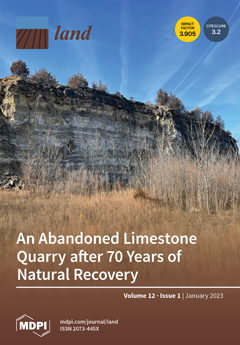 |
1. “Plant Community, Soil and Microclimate Attributes after 70 Years of Natural Recovery of an Abandoned Limestone Quarry”
by Kirsten Stephan and Jason A. Hubbart Land 2023, 12(1), 117; https://doi.org/10.3390/land12010117 Available online: https://www.mdpi.com/2073-445X/12/1/117 |
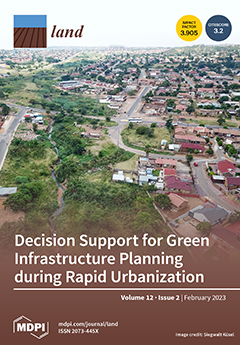 |
2. “A Decision Support Tool for Green Infrastructure Planning in the Face of Rapid Urbanization”
by Peta Brom, Kristine Engemann, Christina Breed, Maya Pasgaard, Titilope Onaolapo and Jens-Christian Svenning Land 2023, 12(2), 415; https://doi.org/10.3390/land12020415 Available online: https://www.mdpi.com/2073-445X/12/2/415 |
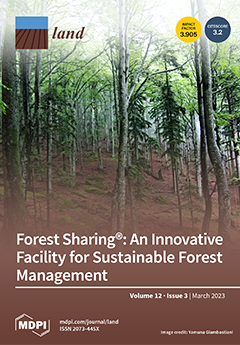 |
3. “Forest Sharing® as an Innovative Facility for Sustainable Forest Management of Fragmented Forest Properties: First Results of Its Implementation”
by Francesca Giannetti, Andrea Laschi, Ilaria Zorzi, Cristiano Foderi, Enrico Cenni, Cristiano Guadagnino, Giacomo Pinzani, Francesco Ermini, Francesca Bottalico, Guido Milazzo et al. Land 2023, 12(3), 521; https://doi.org/10.3390/land12030521 Available online: https://www.mdpi.com/2073-445X/12/3/521 |
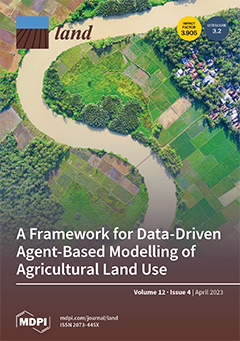 |
4. “A Framework for Data-Driven Agent-Based Modelling of Agricultural Land Use”
by Giacomo Ravaioli, Tiago Domingos and Ricardo F. M. Teixeira Land 2023, 12(4), 756; https://doi.org/10.3390/land12040756 Available online: https://www.mdpi.com/2073-445X/12/4/756 |
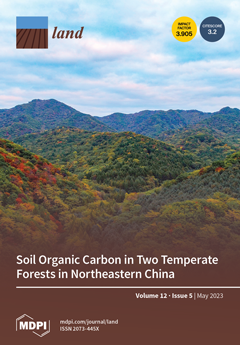 |
5. “Storage and Stability of Soil Organic Carbon in Two Temperate Forests in Northeastern China”
by Dongwei Liu, Shanlong Li, Weixing Zhu, Yongyang Wang, Shasha Zhang and Yunting Fang Land 2023, 12(5), 1019; https://doi.org/10.3390/land12051019 Available online: https://www.mdpi.com/2073-445X/12/5/1019 |
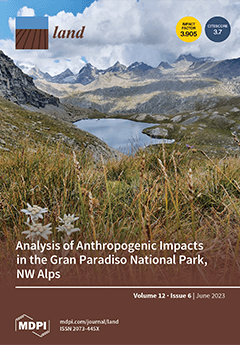 |
6. “Cumulative Spatial and Temporal Analysis of Anthropogenic Impacts in the Protected Area of the Gran Paradiso National Park in the NW Alps, Italy”
by Chiara Richiardi, Maria Rita Minciardi, Consolata Siniscalco and Maria Adamo Land 2023, 12(6), 1124; https://doi.org/10.3390/land12061124 Available online: https://www.mdpi.com/2073-445X/12/6/1124 |
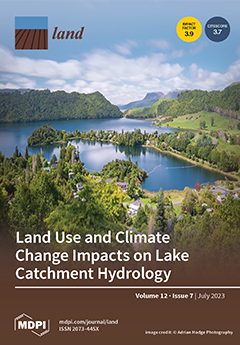 |
7. “Land Use and Climate Change Effects on Streamflow and Nutrient Loads in a Temperate Catchment: A Simulation Study”
by Gebiaw T. Ayele, Bofu Yu and David P. Hamilton Land 2023, 12(7), 1326; https://doi.org/10.3390/land12071326 Available online: https://www.mdpi.com/2073-445X/12/7/1326 |
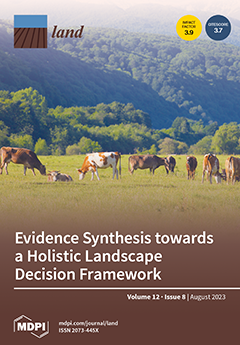 |
8. “Evidence Synthesis towards a Holistic Landscape Decision Framework: Insight from the Landscape Decisions Programme”
by Chidiebere Ofoegbu, Heiko Balzter and Martin Phillips Land 2023, 12(8), 1543; https://doi.org/10.3390/land12081543 Available online: https://www.mdpi.com/2073-445X/12/8/1543 |
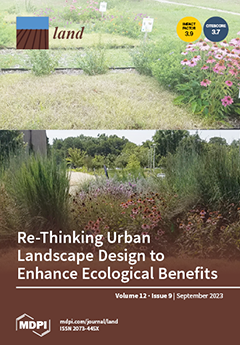 |
9. “High-Performance Landscapes: Re-Thinking Design and Management Choices to Enhance Ecological Benefits in Urban Environments”
by J. Amy Belaire, Heather Bass, Heather Venhaus, Keri Barfield, Tim Pannkuk, Katherine Lieberknecht and Shalene Jha Land 2023, 12(9), 1689; https://doi.org/10.3390/land12091689 Available online: https://www.mdpi.com/2073-445X/12/9/1689 |
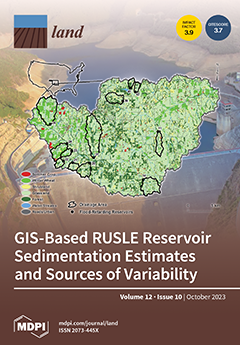 |
10. “GIS-Based RUSLE Reservoir Sedimentation Estimates: Temporally Variable C-Factors, Sediment Delivery Ratio, and Adjustment for Stream Channel and Bank Sediment Sources”
by Patrick J. Starks, Daniel N. Moriasi and Ann-Marie Fortuna Land 2023, 12(10), 1913; https://doi.org/10.3390/land12101913 Available online: https://www.mdpi.com/2073-445X/12/10/1913 |
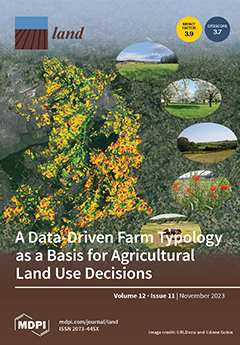 |
11. “A Data-Driven Farm Typology as a Basis for Agricultural Land Use Decisions”
by Anne Gobin and Ann Van Herzele Land 2023, 12(11), 2032; https://doi.org/10.3390/land12112032 Available online: https://www.mdpi.com/2073-445X/12/11/2032 |
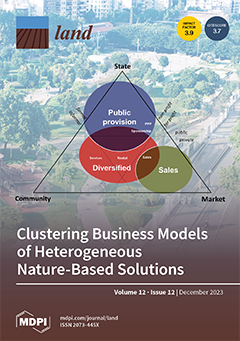 |
12. “Clustering Business Models of Heterogeneous Nature-Based Solutions Implementing Innovative Governance and Financing Concepts”
by Simon Stork, Bernd Pölling, Wolf Lorleberg, Rolf Morgenstern and Jan-Henning Feil Land 2023, 12(12), 2116; https://doi.org/10.3390/land12122116 Available online: https://www.mdpi.com/2073-445X/12/12/2116 |
18 December 2023
Editorial Board Members from Land Featured among the World’s Top 2% Scientists in 2023
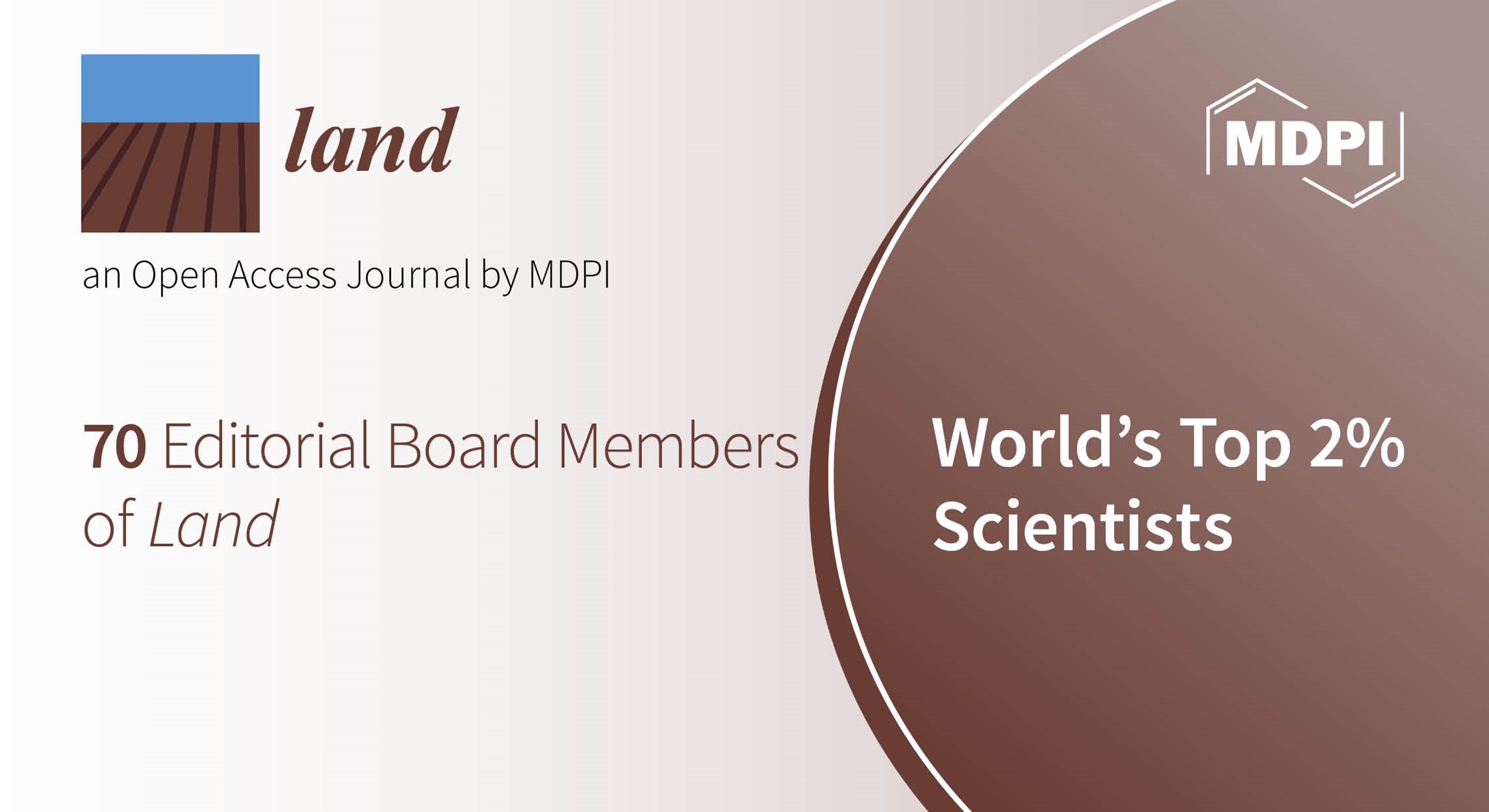
Scientists at Stanford University have recently published an update of the list of the top 2% most widely cited scientists—the World’s Top 2% Scientists.
The time node of the statistical data of this list is from 1960 to 2023, and it is divided into two lists: “Lifetime Scientific Influence Ranking” and “2023 Annual Scientific Influence Ranking”. The “Lifetime Scientific Influence Ranking” counts the comprehensive influence performance of scientists during their careers, and the “2023 Annual Influence Ranking” focuses on highlighting the academic influence of scientists in the previous year. This ranking, considered the most prestigious worldwide, is based on the bibliometric information contained in the Scopus database and includes more than 200,000 researchers from the more than 10 million scientists considered to be active worldwide, with 22 scientific fields and 174 subfields taken into account.
We are pleased to share that 70 Editorial Board Members from Land (ISSN: 2073-445X) were featured in the World’s Top 2% Scientists list in 2023.
|
Name |
Category |
Affiliation |
|
Dr. Abhilash, Purushothaman Chirakkuzhyil |
Environmental Sciences |
Banaras Hindu University, India |
|
Dr. Angelakis, Andreas N. |
Environmental Engineering |
Agricultural Research Institution of Crete, Greece |
|
Dr. Arsanjani, Jamal Jokar |
Geological & Geomatics Engineering |
Aalborg University, Denmark |
|
Prof. Dr. Balzter, Heiko |
Geological & Geomatics Engineering |
University of Leicester, UK |
|
Prof. Dr. Berke, Philip |
Urban & Regional Planning |
The University of North Carolina at Chapel Hill, USA |
|
Dr. Bintliff, John |
Archaeology |
The University of Edinburgh, the Netherlands |
|
Prof. Dr. Bourque, Charles |
Neurology & Neurosurgery |
University of New Brunswick, Canada |
|
Prof. Dr. Capello, Roberta |
Urban & Regional Planning |
Politecnico di Milano, Italy |
|
Dr. Chaplot, Vincent |
Agronomy & Agriculture |
University of KwaZulu-Natal, South Africa |
|
Prof. Dr. Chau, Kwong Wing |
Urban & Regional Planning |
The University of Hong Kong, Hong Kong |
|
Prof. Dr. Chen, Fahu |
Paleontology |
Chinese Academy of Sciences, China |
|
Prof. Dr. Chen, Guoqian |
Energy |
Peking University, China |
|
Dr. Chen, Xi |
Applied Physics |
Xinjiang Institute of Ecology and Geography Chinese Academy of Sciences, China |
|
Prof. Dr. Comber, Alexis |
Geological & Geomatics Engineering |
University of Leeds, UK |
|
Dr. Costache, Romulus |
Geological & Geomatics Engineering |
Universitatea Transilvania din Brașov, Romania |
|
Prof. Dr. Albuquerque, Ulysses Paulino |
Medicinal & Biomolecular Chemistry |
Universidade Federal de Pernambuco, Brazil |
|
Prof. Dr. Della Spina, Lucia |
Electrical & Electronic Engineering |
Università degli Studi di Reggio Calabria, Italy |
|
Prof. Dr. Deng, Xiangzheng |
Environmental Sciences |
Chinese Academy of Sciences ,China |
|
Prof. Dr. Denham, Tim |
Archaeology |
The Australian National University, Australia |
|
Dr. Escobedo, Francisco J. |
Forestry |
USDA Forest Service Pacific Southwest Research Station, USA |
|
Prof. Dr. Fang, Chuanglin |
Geography |
Chinese Academy of Sciences, China |
|
Prof. Dr. Fedorov, Alexander |
Energy |
Moscow Institute of Physics and Technology, Russia |
|
Dr. Frappart, Frédéric |
Geological & Geomatics Engineering |
Interaction Sol Plante Atmosphère, France |
|
Dr. Goldewijk, Kees Klein |
Meteorology & Atmospheric Sciences |
Utrecht University, the Netherlands |
|
Prof. Dr. Gong, Peng |
Geological & Geomatics Engineering |
The University of Hong Kong, Hong Kong |
|
Prof. Dr. Gou, Zhonghua |
Building & Construction |
Wuhan University, China |
|
Dr. Grainger, Alan |
Environmental Sciences |
University of Leeds, UK |
|
Prof. Dr. Grau, H. Ricardo |
Ecology |
Universidad Nacional de Tucuman (UNT), Argentina |
|
Prof. Dr. Haase, Dagmar |
Ecology |
Humboldt-Universität zu Berlin, Germany |
|
Dr. Halfacree, Keith |
Geography |
Swansea University, UK |
|
Prof. Dr. Han, Heesup |
Sport, Leisure & Tourism |
Sejong University, Republic of Korea |
|
Prof. Dr. Hensel, Michael |
Architecture |
Technische Universität Wien, Austria |
|
Prof. Dr. Ho, Peter |
Urban & Regional Planning |
Zhejiang University, China |
|
Prof. Dr. Holden, Stein T. |
Agricultural Economics & Policy |
Norges Miljø- og Biovitenskapelige Universitet, Norway |
|
Prof. Dr. Hornborg, Alf |
Anthropology |
Lunds Universitet, Sweden |
|
Prof. Dr. Huang, Jikun |
Agricultural Economics & Policy |
Peking University, China |
|
Prof. Dr. Jankowski, Piotr |
Geological & Geomatics Engineering |
San Diego State University, USA |
|
Prof. Dr. Jones, Julia |
Environmental Engineering |
Oregon State University, USA |
|
Prof. Dr. Kabala, Cezary |
Environmental Sciences |
Wrocław University of Environmental and Life Sciences, Poland |
|
Dr. Kapos, Val |
Ecology |
United Nations Environment Programme World Conservation Monitoring Centre, UK |
|
Dr. Keesstra, Saskia |
Environmental Sciences |
Wageningen University & Research, the Netherlands |
|
Prof. Dr. Logan, John |
Sociology |
Brown University, USA |
|
Prof. Dr. Long, Hualou |
Geography |
Guangxi University, China |
|
Prof. Dr. Lucchi, Elena |
Building & Construction |
Politecnico di Milano, Italy |
|
Prof. Dr. Mackey, Bernard |
Microbiology |
University of Reading, Australia |
|
Prof. Dr. Madu, Christian |
Business & Management |
Pace University, USA |
|
Prof. Dr. Manzano-Agugliaro, Francisco |
Energy |
Universidad de Almería, Spain |
|
Prof. Dr. McCarthy, James |
Geography |
Clark University, USA |
|
Prof. Dr. Oechel, Walter |
Ecology |
San Diego State University, USA |
|
Prof. Dr. Pereira, José M.C. |
Geological & Geomatics Engineering |
Universidade de Lisboa, Portugal |
|
Prof. Dr. Pijanowski, Bryan C. |
Ecology |
Purdue University, USA |
|
Prof. Dr. Pontius, Robert Gilmore |
Geological & Geomatics Engineering |
Clark University, USA |
|
Prof. Dr. Ren, Guoyu |
Meteorology & Atmospheric Sciences |
China University of Geosciences, China |
|
Dr. Sałabun, Wojciech |
Artificial Intelligence & Image Processing |
West Pomeranian University of Technology, Poland |
|
Prof. Dr. Salvati, Luca |
Urban & Regional Planning |
Sapienza Università di Roma, Italy |
|
Dr. See, Linda |
Geological & Geomatics Engineering |
International Institute for Applied Systems Analysis, Austria |
|
Dr. Semeniuk, Vic |
Ecology |
Murdoch University, Australia |
|
Prof. Dr. Shackleton, Charlie M. |
Ecology |
Rhodes University, South Africa |
|
Prof. Dr. Shao, Shuai |
Energy |
East China University of Science and Technology, China |
|
Dr. Spangenberg, Joachim H. |
Environmental Sciences |
Sustainable Europe Research Institute SERI Germany, Germany |
|
Prof. Dr. Stavi, Ilan |
Agronomy & Agriculture |
Dead Sea-Arava Science Center, Israel |
|
Prof. Dr. Turner, B. L. |
Ecology |
Arizona State University, USA |
|
Prof. Dr. Wang, Lizhe |
Geological & Geomatics Engineering |
China University of Geosciences, China |
|
Prof. Dr. Wang, Shaojian |
Environmental Sciences |
Sun Yat-Sen University, China |
|
Prof. Dr. Zhou, Weiqi |
Ecology |
Chinese Academy of Sciences, China |
|
Prof. Dr. Zimmerer, Karl S. |
Geography |
Pennsylvania State University, USA |
|
Dr. Koutsias, Nikos |
Geological & Geomatics Engineering |
University of Patras, Greece |
|
Dr. Shafique, Muhammad |
Computer Hardware & Architecture |
Brunel University London, UK |
|
Dr. Yamagata, Yoshiki |
Energy |
Keio University, Japan |
|
Prof. Dr. Fath, Brian D. |
Ecology |
Towson University, USA |
The latest rankings reflect the significant influence and research excellence of scientists who are committed to furthering their knowledge for the benefit of the world.
We would like to congratulate our Editorial Board Members on their excellent achievement and thank them for their immense contribution to the scientific progression and development of Land.
1 December 2023
Editorial Board Members from Land Featured in the 2023 Highly Cited Researchers List Published by Clarivate
Recently, Clarivate™ revealed its 2023 list of Highly Cited Researchers™—individuals at universities, research institutes, and commercial organizations.
The scientists who were selected for this year’s list of Highly Cited Researchers published highly cited papers in the 11-year period from January 2012 to December 2022, with citation frequencies in the top 1% of academic subjects and the same year of publication in the Web of ScienceTM database. This year, 7,125 Highly Cited Researcher 2023 designations were issued to 6,849 individuals, representing just 1 in 1,000 researchers worldwide. This means that these researchers have demonstrated an incredible level of significant and broad influence in their chosen field or fields over the last decade. The list is truly global, spanning 67 countries or regions and spread across a diverse range of research sciences and social sciences.
According to our statistics, 13 members of the Editorial Board of Land (ISSN: 2073-445X) were selected for the list of Highly Cited Researchers by ClarivateTM in 2023. They are being recognized for their high-quality scientific research achievements and outstanding contributions to their professional fields. The Land Editorial Office sincerely congratulates all elected editorial members and hopes that they continue to have an academically productive relationship with the journal.

30 November 2023
MDPI Insights: The CEO’s Letter #6 - MDPI Spain Summit and ResearchGate

Welcome to the MDPI Insights: The CEO's Letter.
In these monthly letters, I will showcase two key aspects of our work at MDPI: our commitment to empowering researchers and our determination to facilitating open scientific exchange.
Opening Thoughts

MDPI Spain Summit

Stefan Tochev (CEO, MDPI) gives the opening speech at the MDPI Spain Summit.
On Friday 10 November 2023 I was in Barcelona, Spain, to deliver the opening presentation and participate in a panel at MDPI’s Spain Summit, a two-day event, inspired by our salon events in China.
With 16 Editors-in-Chief (EiCs) and 20 Editorial Board Members (EBMs) in attendance, the event, organized by our conference team and Barcelona office, featured presentations on open access (OA), MDPI, and publishing market trends in Spain.
The event provided a great opportunity to engage with stakeholders from various MDPI journals, including Nutrients, Vaccines, Buildings, IJMS, and others. We were able to gather feedback and have open conversations around manuscript quality, the peer-review process, and journal development, as well as accreditation agencies.
The main objective of this Summit was to bring together Editors representing MDPI journals across various disciplines within Spanish universities and research centers, primarily from the Barcelona area. The aim was to facilitate an open and fruitful discussion regarding the development of their journals, the future of OA in Spain, and to provide meaningful interactions and networking opportunities.
Connecting with Editorial Board Members

Stefan Tochev in conversation with Summit participants: "Our EBMs are passionate about the journals they serve."
Interacting with our EBMs in person provides a valuable opportunity to show how important it is to us to connect with them, hear their perspectives on their journals and learn more about their own experience collaborating with MDPI.
From my conversations, it was clear that our EBMs are passionate about the journals they serve. I know the advice they provide may sometimes involve just small tweaks, but these can lead to important improvements. As the saying goes, small hinges swing open big doors.
As at November 2023, MDPI has over 6,300 EBMs affiliated with Spanish institutions, with more than 30 of them serving as EiCs or section EiCs. Furthermore, over 68,000 Spanish scholars have contributed as reviewers in MDPI journals.
Open Access in Spain
In 2023, Spain implemented legislation mandating immediate OA for all publicly funded research, aligning with the EU’s Plan S initiative to expedite the transition to OA. The Spanish government also approved a four-year, €23.8 million annual budget for the first national OA strategy, aiming to make publicly funded research freely accessible upon publication. This strategy aims to strengthen the quality and transparency of research in Spain, and to help promote movement towards a digital, low-carbon economy.
For further details of Spain's OA policy and the history of government mandates, click here.
Spain has already seen a notable decline in subscription-only articles, decreasing by 62% over a 10-year period, while gold OA increased by 42%. Green OA slightly decreased, suggesting a shift towards publishing in gold OA journals rather than traditional subscription-based ones. Here are some statistics from Scopus.
A big thank-you to the various MDPI teams, including our conference team and the Barcelona office, for organizing this very successful event!

MDPI colleagues from various offices gathered to host and support the first MDPI Spain Summit, in Barcelona, Spain.
I think this type of gathering has the potential to become an annual event in various locations. For example, Manchester could be an option, as we have over 30 EiCs and over 3,000 EBMs in the UK, a top market for MDPI that publishes high-quality research.
Impactful Research

769 Editorial Board Members of MDPI Journals Recognized as Highly Cited Researchers in 2023
Congratulations to our 769 Editorial Board Members from 40 countries/territories who have been awarded Highly Cited Researcher status for 2023 by Clarivate. This recognition is based on their outstanding scientific research contributions and significant influence in various fields, as evidenced by Web of Science data.
Click here to view the full list of 769 Editorial Board Members.
Clarivate's Highly Cited ResearchersTM list identifies individuals with exceptional impact in scientific and social science domains over the past decade. Their papers rank in the top 1% of citations in 21 fields analysed in ‘Essential Science Indicators,’ showcasing their substantial influence.
This year, 7,125 Highly Cited Researcher 2023 designations were issued to 6,849 individuals from 67 countries, representing just 1 in 1,000 researchers worldwide.
These researchers demonstrate exceptional influence, representing a small fraction of contributors pushing the boundaries of knowledge, contributing to global well-being, sustainability, and security.
Congratulations to these scholars for their remarkable achievement: we are honoured to have them on board with our journals!
Inside MDPI

Corporate Marketing and Communications Strategy Session

Members of MDPI’s Corporate Marketing & Communications team.
For the past few years, I have led the Corporate Marketing & Communications department in our annual strategy session.
This typically involves 2–3 days of focused sessions covering key topics including budgeting, hiring targets, campaign reviews, and planning for the upcoming year, department strategy, and structure.
We are constantly exploring ways to optimize the Corporate Marketing & Communications department to support MDPI’s primary objectives and better convey the MDPI story while serving the scholarly community.
The strategy session also serves as a team-building activity, during which the team voted on bowling!
Strategy Session
In this strategy session, we looked at how to align our teams in order to better streamline our content with our campaigns, build a dedicated marketing team to strategically support our core MDPI products, expand our communications teams and functionalities to focus on company-critical campaigns and press releases, align our new brand design system with our marketing initiatives, set up a community and engagement team to support various teams with their outreach and communication efforts, and increase our use of data in the evaluation of campaign performance.
To grow in these areas, we will be hiring for various positions, including those of Public Relations Manager, Communications Manager, Internal Communications Manager, Campaign Manager, Marketing Associate, and Editorial Engagement Manager.
I am grateful for the way our Corporate Marketing & Communications department has grown and gelled over the years, and I look forward to supporting the department teams and their ideas for the future.
Coming Together for Science

ResearchGate and MDPI Partner to Boost the Visibility of Open Access Content through Journal Home

Stefan Tochev (CEO, MDPI) and Sören Hofmayer (Co-Founder and Chief Strategy Officer, ResearchGate) meet in Berlin, Germany to take their ongoing discussion further.
When I assumed the role of CEO at MDPI, my primary focus was to initiate the building of essential partnerships and collaborations within our industry. After all, I am a firm believer in achieving our goals by helping others achieve theirs and focusing on co-opetition wherever there is an opportunity. I first touched on the notion of co-opetition in MDPI Insights: The CEO's Letter #3, particularly when discussing collaborations with Elsevier.
In light of this, Sören Hofmayer (Co-Founder and Chief Strategy Officer at ResearchGate) and I connected recently to continue a discussion that had been ongoing for months. I was quickly brought up to speed and felt there was an opportunity for MDPI journals to pilot the Journal Home service that ResearchGate had launched. This would provide a new way for MDPI to engage with authors and readers and amplify the visibility of our journals.
While I receive many offers and opportunities for discussions with vendors, I am a firm believer that timing is everything, and in this case, the time for us is now. Sören and I met in person during my recent visit to Berlin and decided to proceed with piloting ten MDPI journals with the Journal Home service.
The press release below provides further details.
Press Release: Berlin (Germany) and Basel (Switzerland), 15 November 2023
ResearchGate, the professional network for researchers, and MDPI, the largest open access publisher in the world and a pioneer in open access publishing, today announced a partnership that will see ten of MDPI’s open access journals benefit from an enhanced presence on ResearchGate through its innovative Journal Home offering.
This new partnership will expand the reach and visibility of MDPI’s participating flagship journals with ResearchGate’s highly relevant community of more than 25 million researchers globally.
Around 210,000 version-of-record articles from these 10 titles will be readily available on ResearchGate, including the full archive material and all new articles as they are published. These journals also benefit from enhanced brand visibility, with dedicated journal profiles, prominent representation on all associated article pages and all relevant touchpoints across the ResearchGate network – keeping the journals top-of-mind with their reader and author audiences. All articles covered by the new partnership will automatically be added to the authors’ publication records in ResearchGate. This not only reduces MDPI authors’ needs for direct management but also offers them valuable insights into the impact of their work, including data about readership and citations.
Closing Thoughts

November is Men’s Health Awareness Month

Stefan Tochev (CEO, MDPI) listening to music as he writes at a coffee shop in Basel, Switzerland.
November is dedicated to raising awareness of various men’s health issues. I have been fortunate to have positive male role models in my life, and I strive to share my experiences with others.
I used to take part in Movember, growing my moustache throughout November to raise awareness and funds and to help “change the face of men’s health.” With male family and friends impacted by physical and mental health issues, I have recently become more interested in men’s overall well-being.
Men often face stigma involving the perceived need always to be strong and have things figured out. Recently, I’ve had meaningful conversations with male friends and colleagues about issues we rarely discuss, and it was a positive experience.
Various factors impact men’s health and well-being, all too easily leading to risky health behaviours including a lack of health awareness, poor health education, and negative, culturally induced, behaviour patterns in our work and personal lives. I hope we can break down these barriers in our work environment.
Healthy men help build healthy families and a healthy society
Men are less likely than women to seek help with their physical and mental health struggles. This is a reminder to prioritize your overall well-being. I hope that as men, we will continue to open up to one another, becoming vulnerable in order to share what we are going through. By sharing and by supporting each other, we can learn and grow together. You are not alone, and when you fall, you can still get up and stand tall.
From one broski to another, you are loved and appreciated. I hope this mindset carries into December and beyond.
Mindfulness
Our content team recently released a handful of articles on mindfulness, a practice that I believe provides a good opportunity for stress release and self-reflection:
Chief Executive Officer
MDPI AG
21 November 2023
769 Editorial Board Members of MDPI Journals Achieve Highly Cited Researcher Recognition in 2023

We extend our sincere congratulations to the 769 Editorial Board Members of our journals – from 40 different countries/territories – who have been recognized as Highly Cited Researchers for the year 2023 by Clarivate. They are being recognized for their high-quality scientific research achievements and outstanding contributions to their professional fields, as indicated by Web of Science data.
Clarivate's annual list of Highly Cited ResearchersTM identifies the most highly cited scientists for the past decade who stand out for their significant and broad influence in various scientific and social science domains. Their impactful papers are among the top 1 per cent in the citation distribution of one or more of 21 fields analyzed in the "Essential Science Indicators", distinguishing them as hugely influential among their peers.
This year, 7,125 Highly Cited Researcher 2023 designations were issued to 6,849 individuals from 67 countries, representing just 1 in 1,000 researchers worldwide.
This means that these researchers have demonstrated an incredible level of significant and broad influence in their chosen field or fields over the last decade. They represent a small fraction of the researcher population whose contributions disproportionately push the boundaries of knowledge, enhancing global well-being, sustainability, and security.
Congratulations to the scholars for their noteworthy achievement – we are honored to have them on board with our journals!
|
Abate, Antonio |
Jaiswal, Amit K. |
Shen, Zexiang |
13 November 2023
Meet Us at the British Ecological Society Annual Meeting 2023 (BES 2023), 12–15 December 2023, Belfast, UK
加载中~
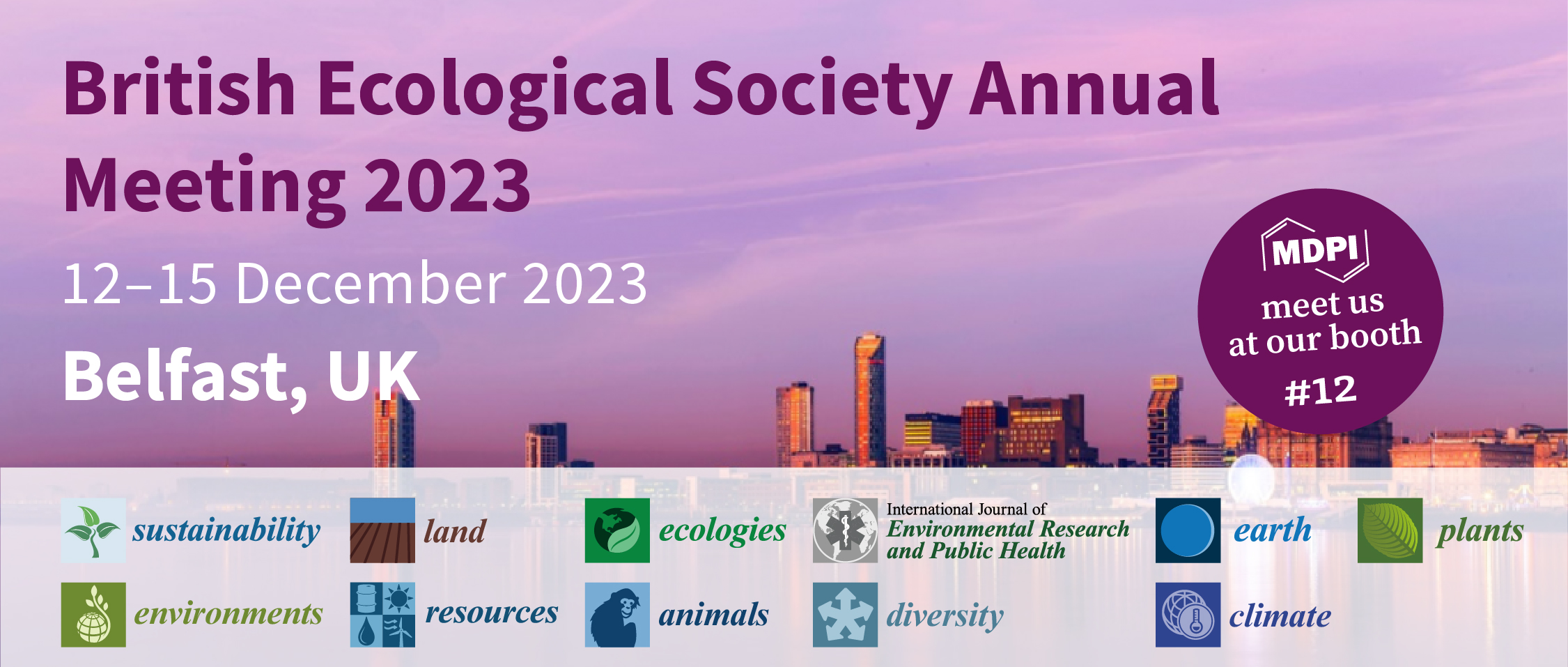
MDPI will attend the British Ecological Society Annual Meeting 2023 (BES 2023) as an exhibitor. This meeting will be held in Belfast, UK, from 12 to 15 December 2023.
The British Ecological Society was established in 1913 and has been fostering the science of ecology ever since. The society has 7,000 members around the world and brings people together across regional, national and global scales to advance ecological science. Membership is open to anyone, anywhere. The British Ecological Society is the oldest ecological society in the world and its annual meeting is Europe’s largest conference dedicated to ecology. More than 1,500 delegates from over 50 countries across six continents attended the 2022 meeting in person or online.
The following MDPI journals will be represented:
- Sustainability;
- Land;
- Ecologies;
- IJERPH;
- Earth;
- Plants;
- Environments;
- Resources;
- Animals;
- Diversity;
- Climate.
If you are attending this conference, please feel free to start a conversation with us at our booth #12. Our delegates look forward to meeting you in person and answering any questions that you may have.
For more information about the conference, please visit https://www.britishecologicalsociety.org/events/bes-annual-meeting-2023/.
9 November 2023
Land Accepted for Coverage in GEOBASE
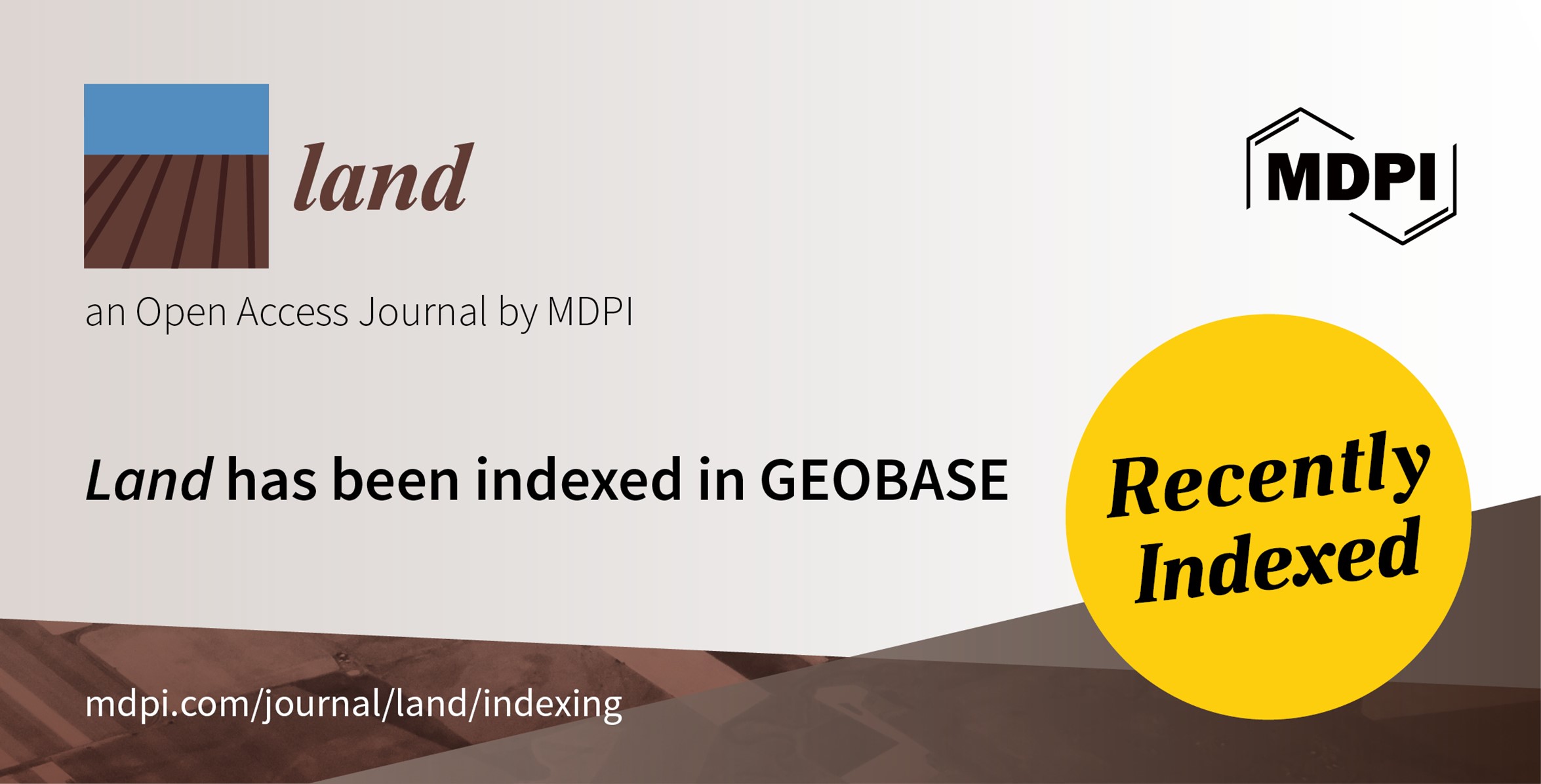
We are pleased to inform you that the open access journal Land (ISSN: 2073-445X, IF: 3.9) has been indexed in GEOBASE. We would like to extend our sincerest gratitude to all authors, reviewers, and editors who have contributed to this journal and enabled this achievement.
Land is an international and cross-disciplinary, peer-reviewed, open access journal on land system science, landscape, soil–sediment–water systems, urban study, land–climate interactions, water–energy–land–food (WELF) nexus, biodiversity research and health nexus, land modelling and data processing, ecosystem services, multifunctionality and sustainability, etc., published monthly online by MDPI. The International Association for Landscape Ecology (IALE), European Land-use Institute (ELI), Landscape Institute (LI) and Urban Land Institute (ULI) are affiliated with Land, and their members receive discounts on the article processing charges.
We warmly welcome you to consider Land as the platform for publishing your work.
Land Editorial Office
1 November 2023
MDPI Insights: The CEO’s Letter #5 - OA Week, UK, and Strategy

Welcome to the MDPI Insights: The CEO's Letter.
In these monthly letters, I will showcase two key aspects of our work at MDPI: our commitment to empowering researchers and our determination to facilitating open scientific exchange.
Opening Thoughts

Open Access Week 2023 – the Global Drive to Open Continues
As the world's largest open-access (OA) publisher, we believe that unrestricted access to research findings is the cornerstone of transparency, efficiency, and quality control across scientific disciplines. At MDPI, we provide free, immediate access to scientific papers, empowering scientists to examine, validate, replicate, and build upon existing results. This minimizes redundancy, optimizes resources, and fosters innovative approaches.
International OA Week, held from 23 to 29 October 2023, provided a unique opportunity to link the global movement toward open sharing and open science with the progress of policy changes at the local level. Our mission, during OA Week and all the year round, is to offer educational resources highlighting the benefits of open-access publishing. The MDPI Blog is a valuable resource for information on open access and open science.
Core principles of OA publishing
Accessibility, transparency, and collaboration are core principles of OA publishing. OA aims to break down barriers that have traditionally restricted research access, ensuring that knowledge is available to all, regardless of financial situation or institutional affiliations. Our commitment to diverse pathways for OA publishing worldwide includes discounts for researchers. You can learn more about how MDPI supports scientific communities here.
One of the key strengths of OA publishing is its ability to facilitate interdisciplinary research. By removing paywalls and promoting knowledge-sharing across disciplines, OA encourages collaboration and innovation. Researchers from various fields can access and build upon each others’ work, fostering a holistic approach to addressing complex global challenges.
OA holds the potential to democratize knowledge, advance science, and drive positive societal change.
Policy driving change
Governments, institutions, and funding agencies have recognized the transformative potential of OA and have implemented policies to promote it. These policies often require publicly funded research to be made openly accessible, accelerating the growth of OA repositories and journals. Check out our spotlights on OA policies in the US, EU and China.
OA publishing is continuously evolving, with community-driven models and technologies shaping its future. Initiatives such as “Plan S” and “cOAlition S” promote OA publishing from the perspective of national funders, requiring grantees to publish their research openly. A new policy announced by the US administration last year mandates that, with effect from January 2026, all US federally funded research should be freely and immediately available after publication.
Additionally, preprint servers such as MDPI's Preprints.org, which allow researchers to share their findings before formal peer review, have gained popularity, enhancing the speed at which new knowledge is disseminated. The rise of blockchain technology is also being explored to ensure transparency and authenticity in scholarly publishing.
For more than two decades, OA publishing has been revolutionizing academic publishing by promoting accessibility, transparency, and collaboration. Its support for interdisciplinary research, evolving policies, and innovative practices all contribute to its growing influence in the global research community. As OA continues to expand, it holds the potential to democratize knowledge, advance science, and drive positive societal change.
MDPI is proud to lead the transition to open access.
Read more:
Impactful Research

Spotlight on Smart Cities
Smart cities will serve as a cornerstone for future human development. Their implementation will help us tackle many of the significant challenges we are facing – climate change, ageing populations, waste management, public safety, travel, and so on. Recognising the importance of this multifaceted field, MDPI launched the inaugural issue of Smart Cities in 2018 to provide an advanced forum for research into smart technology and society. Here we take a look at how this journal has developed, and its impact in this exciting field.
As at 30 October, 2023, Smart Cities has published 421 papers and has an Impact Factor of 6.4. It also has a CiteScore of 8.5, and more than one quarter of its published papers – 124 – have been cited 10 times or more.
Highly cited papers in Smart Cities
Below are several highly cited papers recently published in Smart Cities. Citation metrics are current as at 31 October 2023.
1. “Introducing the “15-Minute City”: Sustainability, Resilience and Place Identity in Future Post-Pandemic Cities”
Authors: Carlos Moreno, Zaheer Allam, Didier Chabaud, Catherine Gall and Florent Pratlong
Smart Cities 2021, 4(1), 93-111; https://doi.org/10.3390/smartcities4010006
Citations: Crossref (338), Scopus (366), Web of Science (270), Google Scholar (710)
The paper discusses the socio-economic impacts of the COVID-19 on cities, including increasing inequalities and rising unemployment. It introduces the concept of the "15-Minute City," a form of "chrono-urbanism," as a response to the challenges posed by the pandemic.
2. “A Review on Electric Vehicles: Technologies and Challenges”
Authors: Julio A. Sanguesa, Vicente Torres-Sanz, Piedad Garrido, Francisco J. Martinez and Johann M. Marquez-Barja
Smart Cities 2021, 4(1), 372-404; https://doi.org/10.3390/smartcities4010022
Citations: Crossref (359), Scopus (363), Web of Science (268), Google Scholar (558)
This paper provides an overview of the progress in Electric Vehicles (EVs), focusing on battery technology, charging methods, and emerging research challenges. It also analyzes the global EV market and its future outlook.
3. “IoT in Smart Cities: A Survey of Technologies, Practices and Challenges”
Authors: Abbas Shah Syed, Daniel Sierra-Sosa, Anup Kumar and Adel Elmaghraby
Smart Cities 2021, 4(2), 429-475; https://doi.org/10.3390/smartcities4020024
Citations: Crossref (121), Scopus (151), Web of Science (91), Google Scholar (215)
This paper gives an overview of the Internet of Things (IoT) in the context of Smart Cities, discussing the fundamental components, technologies, architectures, networking technologies, and artificial algorithms that underpin IoT-based Smart City systems.
4. “Artificial Intelligence Techniques in Smart Grid: A Survey”
Authors: Olufemi A. Omitaomu and Haoran Niu
Smart Cities 2021, 4(2), 548-568; https://doi.org/10.3390/smartcities4020029
Citations: Crossref (76), Scopus (94), Web of Science (57), Google Scholar (120)
This survey paper reviews the utilization of artificial intelligence (AI) techniques in the context of the smart grid. It covers various applications of AI in load forecasting, power grid stability assessment, fault detection, and security issues in the smart grid and power systems.
5. “The Metaverse as a Virtual Form of Smart Cities: Opportunities and Challenges for Environmental, Economic, and Social Sustainability in Urban Futures”
Authors: Zaheer Allam, Ayyoob Sharifi, Simon Elias Bibri, David Sydney Jones and John Krogstie
Smart Cities 2022, 5(3), 771-801; https://doi.org/10.3390/smartcities5030040
Citations: Crossref (72), Scopus (75), Web of Science (43), Google Scholar (176)
This paper discusses the concept of the Metaverse, a virtual world introduced by Meta (formerly Facebook), and its potential impact on urban life. It explores how emerging technologies such as AI, Big Data, IoT, and Digital Twins could reshape urban design and services in the context of the Metaverse.
Testimonial
“It was indeed a great and pleasant experience with MDPI regarding our recent publication. The submission process was very straightforward and less time-consuming than the norm. The review process was very fast compared to many other open access journals, which is praiseworthy. The support from the Editorial Office during the revision process was highly useful as well. We look forward to publishing with MDPI in the future, and I will most definitely recommend MDPI to my colleagues and collaborators.” – Dr. Luís Rosa, University of Minho
Article in Smart Cities: Mobile Networks and Internet of Things Infrastructures to Characterize Smart Human Mobility
Inside MDPI

MDPI Manchester office, UK Visit

Allie Shi (Editorial Director, MDPI), Stefan Tochev (CEO, MDPI), Jamie Anderson (Manchester Office Manager, MDPI), Michael O’Sullivan (Senior Scientific Officer, MDPI), Hushneara Akhtar, and Becky Castellon (IOAP Team Lead, MDPI), dining out in Manchester, UK.
In October, I visited MDPI’s new office in Manchester. During the visit, I connected with our English Editing (EE) managers, Scientific Officer, members of the Editorial team, the Marketing team, and IOAP Team Lead.
Our Manchester office focuses primarily on EE services and provides local support for the UK market. Additionally, we regularly visit Editorial Board members and participate in local conferences.
I would like to thank Jamie Anderson, Manchester Office Manager, and her team, for their deep commitment to our Manchester staff and to MDPI’s impact on the UK market.
The UK by numbers
The UK is a hub for the world’s top universities, making it a key market for MDPI and the publishing world in general. It is home to two of the top-five-ranked universities globally, 11 in the top 100, and 15 in the top 200.
As a result, the UK plays a key role in MDPI’s global market. As at October 2023, it ranks as the seventh-largest contributor to the total number of papers published by MDPI. We have 3,500 Editorial Board members affiliated with UK institutions, including 34 serving as Editors-in-Chief (EiCs). Our commitment to collaboration with institutions is evident in the UK, where we have successfully established some 60 Institutional Open Access Program (IOAP) agreements with esteemed institutions, such as the University of Oxford, the University of Cambridge, Imperial College London, the University of Edinburgh, and more.
According to InCites Dataset + ESCI for the period 2018–2022, as at October 2023, nearly 65% of UK papers are now published as OA. Just over 10% of total OA publications are by UK authors. UK papers are known for their high quality, with an average of 11 citations per paper. Furthermore, 2.16% of UK papers are in the top 1% of cited papers, and 14.61% are in the top 10% of cited papers, showcasing their impact.
We are currently hiring EEs in various locations worldwide.
English Editing at MDPI
Our English Editing (EE) department consists of two main branches, Quality Control and Learning and Development, reflecting our priorities. We are continuously enhancing the quality of our English Editing services and have raised the relevant standards, which now extend to company-wide communications. English editors participate in international interviews, conduct English assessments, and provide colleagues with presentations on ways to improve their use of written and spoken English.
While expanding, the EE department has proactively refocused its efforts on the quality of our work and how the English Editing department can benefit the company more broadly. We currently have approximately 140 full-time English Editors based across five offices worldwide, supplemented by over 700 freelance English editors.
Our Manchester office serves as the hub for the EE Department, with EE Managers situated there, except for Kurtis Jackson, who serves as the Head of EE and is located in our Basel office. Manchester EEs play a critical role in establishing and developing EE teams in our other offices, overseeing management and recruitment. The EE department plays a vital role in MDPI’s operations, as it is the department that touches every published paper. If this work interests you, I encourage you to explore our available EE positions, whether you are seeking full-time or freelance opportunities.
Testimonials
“MDPI provides an excellent service compared to any other previously used services. It delivers fast and high-quality results but at an affordable price.” – Ardha Apriyanto, University of Potsdam
“In my role as a professor, I consider that MDPI Author Services offer an excellent quality in the editing of Western academic writing while maintaining the required standards of clarity, precision and rigor. Additionally, delivery times are fast compared to other available services.” – Jesus Insuasti, University of Nariño
Read more:
Coming Together for Science

STM and Frankfurt Book Fair
Attending STM
MDPI has been a proud sponsor of the STM Conference for several years. The STM Conference is a dynamic event featuring interactive sessions, expert panellists, idea-sharing, and ample networking opportunities. On 16 October, the event kicked off with arrival drinks, sponsored by MDPI, followed by a welcoming dinner, providing a great chance to connect and network with industry professionals. The following day was filled with speakers, sessions, and further opportunities to connect. STM exemplifies the collaborative spirit of the scientific community, with session topics including achieving open, visible, and impactful research at scale; maintaining research integrity in a rapidly changing world; and exploring the impact of ever-evolving technology in the scholarly community.
Meeting with Web of Science
On a personal note, one of the highlights of STM was a candid and productive conversation with Nandita Quaderi, Editor-in-Chief and SVP at Web of Science. During our discussion, we talked about MDPI, Web of Science, the IJERPH delisting, and ways of moving forward. This open conversation aimed at fostering better collaboration for the future.
“We discussed ways to improve our communication and collaboration.”
I appreciated our frank discussion and felt that Nandita wholeheartedly supports open access. She also expressed her appreciation for the monthly CEO Letter, which she sees as a way to add personality to the MDPI brand and provide insight into the great work we do at MDPI. While we highlighted the positives, we also discussed ways to improve our communication and collaboration moving forward. This meeting alone made the trip worthwhile, and I hope Nandita doesn’t mind my sharing that she found our chat to be “the most honest and constructive discussion” she’s had with someone from MDPI in recent years.
75th Frankfurt Book Fair

Jelena Milojevic (Book Editor, MDPI), Jovana Dubajic (Book Editor, MDPI), Evan Escamilla (Project Manager, MDPI), Laura Wagner (Head of Books, MDPI), and Jenny Knowles (Commissioning Editor, MDPI), at the Frankfurt Book Fair in Frankfurt am Main, Germany.
For the 75th time, the Frankfurter Buchmesse opened its doors in October to celebrate exciting stories and their authors. If you haven’t yet had the chance to visit the Frankfurt Book Fair, I highly recommend it. It’s the largest book fair in the world, attracting thousands of visitors from around the globe. This is the place to gain valuable industry insights from top-class publishing professionals, connect with publishers directly, and learn about the latest trends in publishing.
MDPI Books
Our Books team was also present at the Frankfurt Book Fair, networking and learning from various panels. Did you know that our MDPI Books department publishes OA Books?
The book publishing program includes monographs, book series, edited books and reprints of special issues and topical collections, among other book types.
If you have a book proposal you would like to discuss, please feel free to contact our Books team to understand the benefits and methods of publishing your next book with the OA model.
Closing Thoughts

MDPI Strategy Meeting
As the newly appointed CEO, this is my first year leading the MDPI Senior Management Strategy session. I saw it as an opportunity to explore what MDPI has the potential to become in the next five years. Guided by the vision of its founder and President, Dr. Shu-kun Lin, the company has accomplished remarkable feats over the past 27 years and currently holds the position as the world’s third-largest academic publisher, following Springer Nature and Elsevier.
Our primary objective is to build upon the milestones of the past decades and consolidate MDPI’s position as well-established publishing brand. The two-day meeting emphasized the importance of communicating MDPI’s values more actively via its brand and adopting a straightforward yet impactful approach to managing MDPI as a mature academic publisher.
“Our primary objective is to consolidate MDPI’s position as well-established publishing brand”
As the world’s number one open-access publisher, MDPI has long been a game-changer in the scholarly community, serving millions of authors. The challenge in being a trailblazer is the need to continuously improve and at the same time explore the next blue-ocean strategy, while also maintaining the smooth operation of the business. Our collection model, featuring guest-curated thematic topics in the form of Special Issues, has disrupted the industry. Other publishers closely study us and attempt to replicate our models. The future of this collection model is something we are actively addressing – while, of course, looking ahead to what comes next!
Chief Executive Officer
MDPI AG
19 October 2023
Open Access Week 2023 – the Global Drive to Open Continues

MDPI has been a strong proponent of the open access publishing model right from the beginning. As one of the pioneering fully open access publishers, we firmly believe that unrestricted access to research findings forms the foundation for better transparency, efficiency, and quality control across all scientific disciplines.
In December 2022, we reached a significant milestone by surpassing one million articles published. That is one million articles freely available to all, to circulate and build upon!
Offering free and immediate access to scientific papers empowers scientists to examine, validate, replicate, and expand upon existing results. This not only helps prevent redundancy and optimizes how resources are used but also paves the way for innovative new approaches.
The International Open Access Week takes place from 23 to 29 October 2023, providing a unique opportunity to connect the global movement towards open sharing and open science with the progress of policy transformations at the local level.
Our goal, during Open Access Week as well as throughout the year, is to offer resources for educating people about the benefits of open access publishing. The MDPI Blog offers a wealth of information around open access and open science.
Promoting the values of accessibility, transparency, and collaboration
Open access publishing embodies the fundamental values of democratizing knowledge and fostering global accessibility. It aims to break down barriers that have traditionally limited access to scholarly work, ensuring that knowledge is available to all, regardless of their financial or institutional affiliations.
Discounts are part of our commitment to ensuring there are diverse pathways to Open Access publishing for researchers worldwide. MDPI supports scientific communities in several different ways.
One of the key strengths of open access publishing lies in its ability to facilitate interdisciplinary research. By removing paywalls and promoting the sharing of knowledge across disciplines, OA encourages collaboration and innovation. Researchers from diverse fields can access and build upon each other's work, fostering a holistic approach to addressing complex global challenges.
Funders' policies are getting aligned with open science
Governments, institutions, and funding agencies have recognized the transformative potential of open access and have implemented policies to promote it. These policies often mandate that publicly funded research should be made openly accessible. Such initiatives have accelerated the growth of open access repositories and journals, reinforcing the commitment to open access principles. Check our spotlights on OA policies in the US, EU and China.
Open access publishing is continually evolving, with innovative and community-driven models and technologies shaping its future. Initiatives like "Plan S" and "cOAlition S" promote the adoption of OA publishing from the national funders’ perspective by requiring grantees to publish their research openly. A new policy announced by the US administration last year requires that, as of January 2026, all US federally funded research be made freely and immediately available after publication.
Additionally, preprint servers such as MDPI's Preprints.org, which allow researchers to share their findings before formal peer review, have gained popularity, enhancing the speed at which new knowledge is disseminated. The rise of blockchain technology is also being explored to ensure transparency and authenticity in scholarly publishing.
For more than twenty years, open access scholarly publishing has been revolutionizing academia by promoting the values of accessibility, transparency, and collaboration. Its support for interdisciplinary research, evolving policies, and innovative practices all contribute to its growing influence in the global research community. As open access continues to expand, it holds the potential to democratize knowledge, advance science, and drive positive societal change.
MDPI is proud to be a leader in the transition to open access.
2 October 2023
MDPI Insights: The CEO’s Letter #4 - MDPI Presence in China

Welcome to the MDPI Insights: The CEO's Letter.
In these monthly letters, I will showcase two key aspects of our work at MDPI: our commitment to empowering researchers and our determination to facilitating open scientific exchange.
Opening Thoughts

Open Access in China
It is Saturday, 23 September, and I have just returned from an unforgettable 12-day trip to China, visiting our main offices in Beijing and Wuhan. In the wake of a packed and very enjoyable agenda of internal and external meetings, I would like to use this edition of the CEO Letter to showcase how MDPI supports the scholarly community in China.
Coincidentally, Jack McKenna, Communications Associate from MDPI’s corporate content team, has just released a blog article discussing China’s open access (OA) policy. It is a timely read, providing a concise overview of the development of the OA movement in China and reflecting on its future. I shall draw some content from Jack’s piece and use this edition of the CEO Letter to highlight the various ways in which MDPI is involved in this market. And it would be remiss of me not to include some pictures and highlights from my travels!
Open Access Policy in China
As per Jack’s post, in 2020, China became the world’s leading producer of research articles. Today, China is experiencing a “substantial growth rate in OA [Open Access] publication”. This growth is supported by the State’s commitment to research & development and its policy “requiring the promotion of open science”.
Over the past two decades, there have been gradual developments in China’s OA framework, with repositories and platforms being developed in a consistent manner. Currently, key institutions across China – including the National Science Library, the National Science and Technology Library, and the Natural Science Foundation of China – support OA. The State aims to establish consistent policies across government agencies – a framework for a more encompassing embrace of OA across institutions.
In China, the number of subscription-only articles decreased by nearly 30% over the 10-year period of 2011–2021, while gold OA increased by 22%. Between 2017 and 2020 alone, China published 800,921 academic papers in an OA format.
In 2023, as the leading publisher of academic research, China is pursuing “self-reliance”. Therefore, the State will be establishing consistent policies across government agencies, including those related to OA. Additionally, it will want to ensure that Chinese people can access the research that is supported by Chinese funding and produced by Chinese academics. For this reason, “Open Access is a matter of priority in China”.
MDPI Offices in China
While the history of MDPI begins in Basel, Switzerland, the story of MDPI’s founder is very much rooted in China. Dr. Shu-kun Lin, Founder and President of MDPI, graduated with a BSc from Wuhan University in 1982. He also studied physical chemistry at the Lanzhou Institute of Chemical Physics, Chinese Academy of Sciences (1982–1986; MSc in 1985), and at the University of Louisville, USA (1987–1989). Dr. Lin completed his doctorate in organic chemistry at the Swiss Federal Institute of Technology (ETH-Zürich) in 1992.

Stefan Tochev (CEO, MDPI) at MDPI’s Wuhan office.
In 2002, MDPI’s Basel headquarters moved to Matthäusstrasse 11, 4052 Basel, and Dr. Lin opened an editorial office in Qingdao, China, which launched the journal Marine Drugs in the following year. Below is a list of MDPI’s current offices in China and their respective dates of inauguration:
- 2008: Beijing (Tongzhou, Haidian)
- 2013: Wuhan (Hankou, Guanggu)
- 2019: Tianjin
- 2021: Dalian
- 2021: Nanjing
Our Strength is in Our People
With over 6,000 MDPI staff, across 20 offices in 11 countries, MDPI is able to offer authors responsive and efficient round-the-clock support, enabling a rapid publication process.
In my experience, stakeholders are genuinely surprised when they realize the extent of our global operations. My response is to reiterate that our people are our strength. This is why we have fast and efficient processes and top-notch responsiveness. Our global presence ensures that your manuscript is constantly attended to, rather than sitting on someone’s desk. We prioritize our authors’ needs and act quickly to move things through the various stages of publication. MDPI is built on speed, convenience, and competence, which I believe are core pillars for success in any industry. We continually strive to improve our systems and processes on the basis of these core strengths. We literally have over 6,000 staff worldwide dedicated to serving your needs. It’s not magic: it’s people; it’s real.
Impactful Research

MDPI Awards
To support the academic community, and especially young researchers, and also to enhance communication among scientists, MDPI journals offer various awards in specific fields. We serve the scientific community by funding research to facilitate the development of sustainable global solutions through our annual World Sustainability Award and Emerging Sustainability Leader Award.
In 2022, MDPI made awards totalling over US$1 million in recognition and support of researchers worldwide.
Across our journal catalogue, we have granted over 2,000 awards to recognize and support researchers from all disciplines. Since 2016, these awards have served as a source of recognition, acknowledging the impact of research by heightening the influence of talented individuals. The award types mainly include the Young Investigator Award, the Best PhD Thesis Award, the Best Paper Award, and the Outstanding Reviewer Award.
To learn more about MDPI Awards and to find out which are currently available, please click here.
MDPI Awards to Scholars from China
Since 2021, there have been 23 Best Paper Awards granted to authors affiliated with Chinese institutions, identifying their papers as having high-quality scientific impact. A total of 45 Chinese scholars have received awards such as the Young Investigator Award, the Best PhD Thesis Award, the Outstanding Reviewer Award, and the Tu Youyou Award, among others. Prizes for these awards include MDPI grants for paid publications, totalling over CHF 70,000 for scholars affiliated with Chinese institutions.
MDPI’s Tu Youyou Award

Prof. Tu Youyou (left), Dr. Shu-Kun Lin (President, MDPI).
In 2015, Professor Tu Youyou was awarded the Nobel Prize in Physiology or Medicine “for her discoveries concerning a novel therapy against Malaria.” In order to commemorate Professor Tu’s contributions to human health and to promote the passion and spirit conveyed by her experiences, MDPI in 2016 established the ‘Tu Youyou Award’, which runs biennially to recognize outstanding scholars dedicated to the research of natural products and medicinal chemistry.
The 2022 Tu Youyou Award was granted to Prof. Dr. Xiaoguang Lei of Peking University. Click here to access the interview with the winner.
2015 Nobel Prize for Medicine Awarded to Professor Youyou Tu
Professor Tu’s work was celebrated in a Special Issue from Molecules on the occasion of her 80th birthday. The Special Issue: 'Artemisinin (Qinghaosu): Commemorative Issue in Honor of Professor Youyou Tu on the Occasion of her 80th Anniversary” was created five years before she won the Nobel Prize, highlighting the visibility MDPI provides researchers and their work.
Highly Cited Articles by Chinese Scholars Published in MDPI
Click here to access the most cited MDPI papers published by scholars affiliated with Chinese institutions. This list presents the most influential research from the more than 287,000 MDPI papers published by Chinese scholars. With over 9 million total citations, I encourage you to maximize your visibility and impact by publishing with MDPI, the number one most cited open access publisher.
Read more:
- Tu Youyou Award
- World Sustainability Awards
- Available Awards
Inside MDPI
 Stefan Tochev (CEO, MDPI) with the Beijing Marketing team.
Stefan Tochev (CEO, MDPI) with the Beijing Marketing team.
Marketing Department in China
During my visit to our offices in Beijing and Wuhan, I had the opportunity to meet with, and to present to, our local marketing teams. These teams are responsible for various journal-related and corporate promotional activities, including newsletters, conferences, seminars, author training, journal awards, content creation, digital marketing, and social media.
I was pleased by the ambition and curiosity of our marketing colleagues. They showed a strong desire to collaborate and acquire knowledge and tactics to effectively market and promote MDPI-journal-related activities. I presented some of the principles and objectives that we apply in the Corporate Marketing and Communications department, and used the opportunity to strengthen our collaborative communications across offices.
 Stefan Tochev (CEO, MDPI) with the Wuhan Marketing team.
Stefan Tochev (CEO, MDPI) with the Wuhan Marketing team.
Coming Together for Science

Collaborations, Scholarships and Meetings
MDPI maintains partnerships with nearly 190 learned societies and over 800 institutions and consortia, helping to facilitate the transition to OA publishing. Our commitment to working with institutions is evident in China, where we have successfully established over 35 Institutional Open Access Programs (IOAP) with esteemed institutions such as the Tsinghua University, Huazhong University of Science and Technology, and Shanghai Jiao Tong University.
Our institutional partnerships, waiver programs, and article processing cost discounts create diverse pathways to OA publishing for researchers worldwide.
Scholarships in China
Since 2021, several MDPI journals (Sensors, Photonics, Coatings, Materials, Energies, and Journal of Fungi) have funded full scholarships for four Master’s and five Ph.D. projects in China. These scholarships align with Tianjin University, Wuhan University of Technology, Central South University, the Chinese Academy of Sciences, and the China University of Petroleum (Beijing).
Meeting with the Society of Chinese University Journals (CUJS)

Prof. Tieming Zhang (President of CUJS, centre) and MDPI colleagues at CUJS office.
I am pleased to have participated in some highly productive meetings during my visit to China, including one with the Society of Chinese University Journals (CUJS). The meeting involved Prof. Tieming Zhang (President of CUJS), Assoc. Prof. Xin Zhang (Vice President and Secretary General), and Dr. Fei Gao (Executive Member of CUJS). Alongside my colleagues Dr. Guoshi Liu, Dr. Giulia Stefenelli, and Anita Sun, I represented MDPI and held an open discussion to address any questions regarding OA and MDPI.
We discussed several methods for collaboration, including a workshop on the future of peer review, MDPI sponsoring a funding grant for early-career researchers, and transitioning journals from diamond to gold OA. I am thankful for the opportunity to have met our colleagues at CUJS in person and feel very confident about our future collaborations in support of OA publishing in China.
MDPI hosts free academic seminars, author training sessions, and academic conferences as part of its commitment to enrich and support the scholarly community. CUJS often stages academic events (e.g., conferences, editor training, and editor competitions), and I believe there are great opportunities for CUJS and MDPI to collaborate accordingly.
Meeting with National Science Library, Chinese Academy of Sciences (NSLC)

Stefan Tochev (CEO, MDPI), Dr. Giulia Stefenelli (Chair of Scientific Officers, MDPI), Anita Sun (PR Manager, MDPI) and Dr. Guoshi Liu (Managing Director, MDPI) at the National Science Library, Chinese Academy of Sciences.
We also visited the NSLC Director, Xiwen Liu, and colleagues Ying Jin, Zhesi Shen, and Sichao Tong. Following our introductions, we gave a presentation on the history and editorial process at MDPI, discussing specific details related to MDPI’s business and data. We highlighted the status of our IOAP collaborations in China and the makeup of our author base, specifically in China, and drew attention to the fact that MDPI has published research by authors from every country in the world. We then discussed the design indicators, calculation methods and implementation purposes of the ‘Early Warning Journal List’ and how we can have open communication to provide any data regarding MDPI journals. I am pleased to report that we reached a consensus on future communications, and am grateful to NSLC for hosting us in their offices.
In-person meetings with stakeholders provide an invaluable opportunity to communicate what MDPI is about and the various ways in which we serve the scholarly community. While digital marketing and online communication are essential, they are no replacement for the understanding and trust that come about through in-person interactions.
The Numbers
As at September 2023, China holds the largest position in MDPI’s global market, ranking as the largest contributor to the total number of papers published by MDPI.
At this point in time, there were more than 847,000 China mainland scholars who have published with MDPI, 51 of whom are Section-Editors-in-Chief (SEiC) of MDPI journals, with seven serving as Editors-in-Chief (EiCs) for journals such as Air, Big Data and Cognitive Computing, Blockchains, Future, Nanoenergy Advances, and Targets.
Our growth and presence in China are a true testament to the service we provide to the scholarly community, and to the relationships we foster through collaborative activities. We look forward to continuing to support the growth of the scholarly community in China, providing a valuable and trusted experience with MDPI.
Closing Thoughts
Final Reflections on our MDPI Offices in Beijing and Wuhan

Stefan Tochev (CEO, MDPI), Dr. Constanze Schelhorn (Indexing Manager, MDPI), Jiale Shang (Admin, Tongzhou, MDPI) at Beijing Capital International Airport, Beijing.
I spent approximately two weeks visiting some of our offices in China, and the first word that comes to mind when describing my experience is ‘hospitality.’ My colleagues and I were met with enthusiasm and delight at the airport by the Tongzhou Admin team (thank you, Jiale Shang, and thank you, Eric Wang, for keeping us organized on this trip!) and were taken care of with great attention. From hotels to transportation, dinners, and meetings, our stay was catered for perfectly.
Perhaps this is where MDPI’s focus on customers and service originates. At our core, we are a service company that provides a publishing platform for its authors. It’s therefore no surprise that authors consistently rate their experience with MDPI very highly.
95% of submitting authors rate their overall experience with the MDPI publication process as Excellent or Good (Springer Nature report 90%).
91% of submitting authors rate their overall experience with the MDPI peer review process as Excellent or Good.
Speed/Efficiency and Editorial Relationship are two key reasons underlying this high satisfaction score. ‘Editorial Relationship’ can be further explored, but in the past month, the most commonly noted aspects were the professionalism, kindness, availability, communicativeness, and personalized assistance provided by our editorial staff throughout the process. These attributes are at the core of our work across all our offices and continents.
Hospitality and Service
Just as our Chinese colleagues strove to keep us engaged by showing us the city sights (thank you, Thea Pan, and Jason Wu from the Wuhan Marketing team!) and sharing a variety of wonderful meals, our editorial staff are committed to serving our authors throughout their publishing journey. Our aim is to place the author at the centre of everything we do, eager to welcome our ‘guests’ and provide them with a pleasant publishing experience.
I asked my colleague Francis Wu (Senior Publisher, Wuhan office) where this hospitality originates. He responded that it is part of Chinese culture. I reflected long and deep on this answer. China is a vast country, and when visitors arrive, hosts want to ensure they feel welcomed and taken care of in order to maximize their time and visit. I can’t think of a better analogy for how I would want our authors to feel when they visit MDPI for their publishing needs. A company culture that prioritizes service, something that goes beyond products and productivity, and focuses on the overall experience. Over 6,000 people, across all MDPI offices, are ready, willing and able to go the extra mile for their colleagues and their customers. This is something I am truly proud of.
Chief Executive Officer
MDPI AG
25 September 2023
Meet Us at the 22nd China Conference on Ecology, 27–30 October 2023, Beijing, China

MDPI journals will be attending the 22nd China Conference on Ecology as exhibitors. This meeting will be held in Beijing, China, from 27 to 30 October 2023.
The conference is being organized by the Ecological Society of China and will be held at the China National Convention Center. Domestic and overseas experts, scholars, and outstanding young scientists who have made outstanding contributions to ecology and related fields will be invited to give academic reports.
The following MDPI journals will be represented:
- Diversity;
- Land;
- Plants;
- Forests;
- Environments;
- Water;
- Ecologies;
- World;
- Sustainability;
- Earth.
If you are planning to attend this conference, please feel free to start a conversation with us. Our delegates look forward to meeting you in person and answering any questions that you may have. For more information about the conference and our booth, please visit the following webpage: https://esc2023.scimeeting.cn/cn/web/index/17981.
22 September 2023
2023 ISPRS International Journal of Geo-Information Editorial Board Meeting at the ISPRS Geospatial Week (GSW 2023), Held in September 2023, in Cairo, Egypt
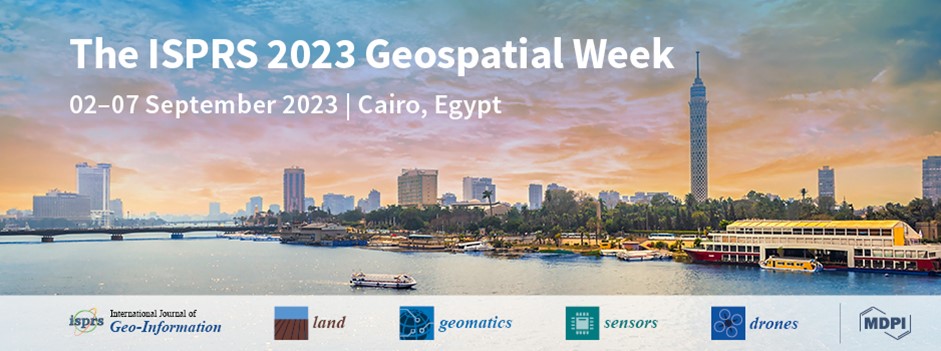
ISPRS International Journal of Geo-Information (IJGI, ISSN: 2220-9964) attended the ISPRS 2023 Geospatial Week (GSW 2023) from 2 to 7 September 2023 in Cairo, Egypt, and held the 2023 Editorial Board meeting on 5 September 2023. We greatly appreciate that Editor-in-Chief Prof. Wolfgang Kainz hosted this meeting and that there were four Editorial Board Member (EBM) attendees.
At this Editorial Board meeting, the EBMs had a positive discussion about the peer-review process, communication with Guest Editors, balancing the Associate Editor’s work, and the Associate Editor candidate in the scope area of “Spatial Data Management” and other journal development issues.
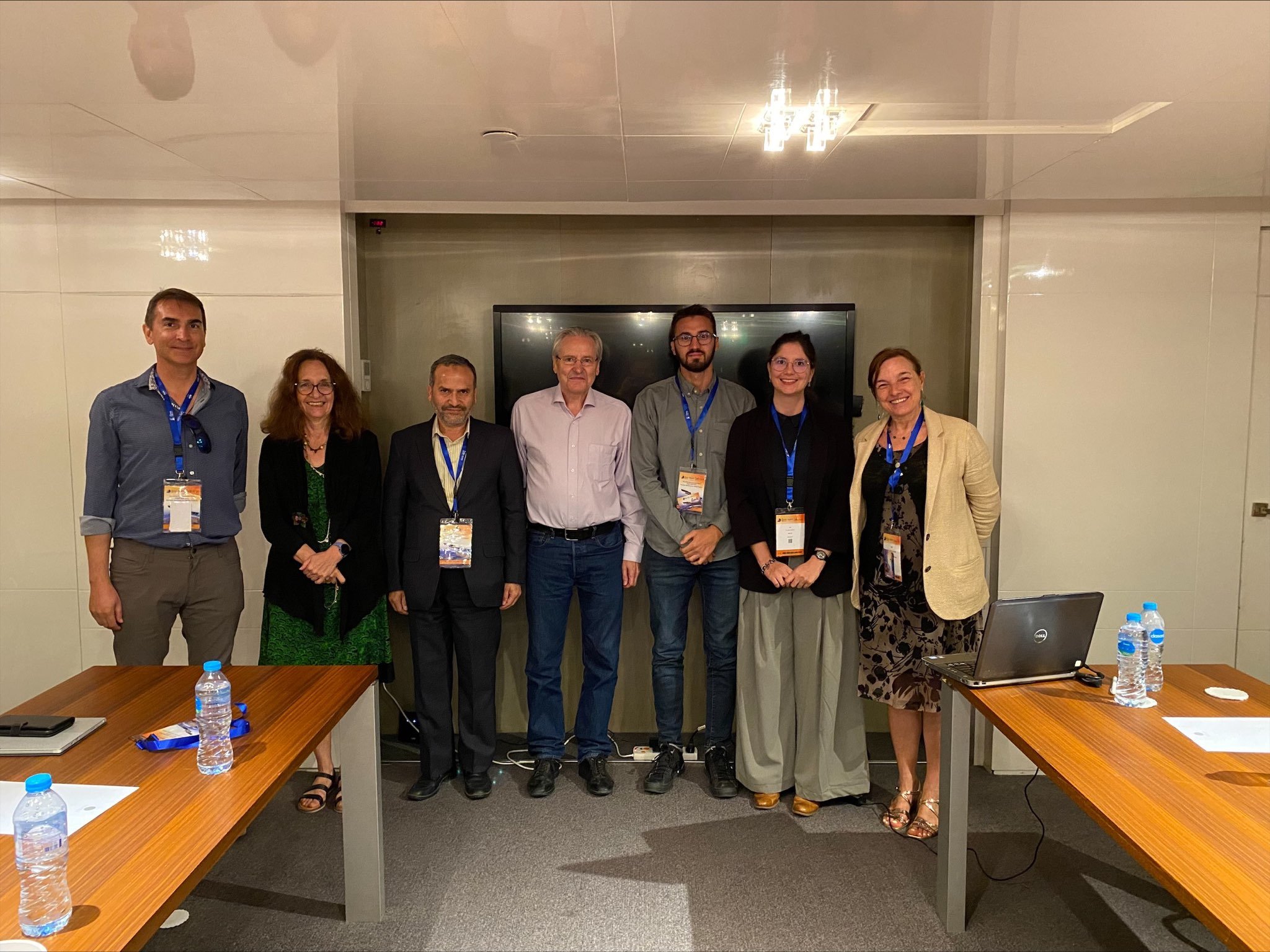
Attendees (from left to right): Partsinevelos Panagiotis (EBM), Sisi Zlatanova (Associate Editor), Mahmoud Reza Delavar (EBM), Wolfgang Kainz (Editor-in-Chief), Petar Jeremić (JRS IJGI MDPI), Liliane Auwerter (SOB MDPI) and Maria Brovelli (Associate Editor)
13 September 2023
Meet Us at the AGU Fall Meeting 2023, 11–15 December 2023, Online or On-Site in San Francisco, CA, USA
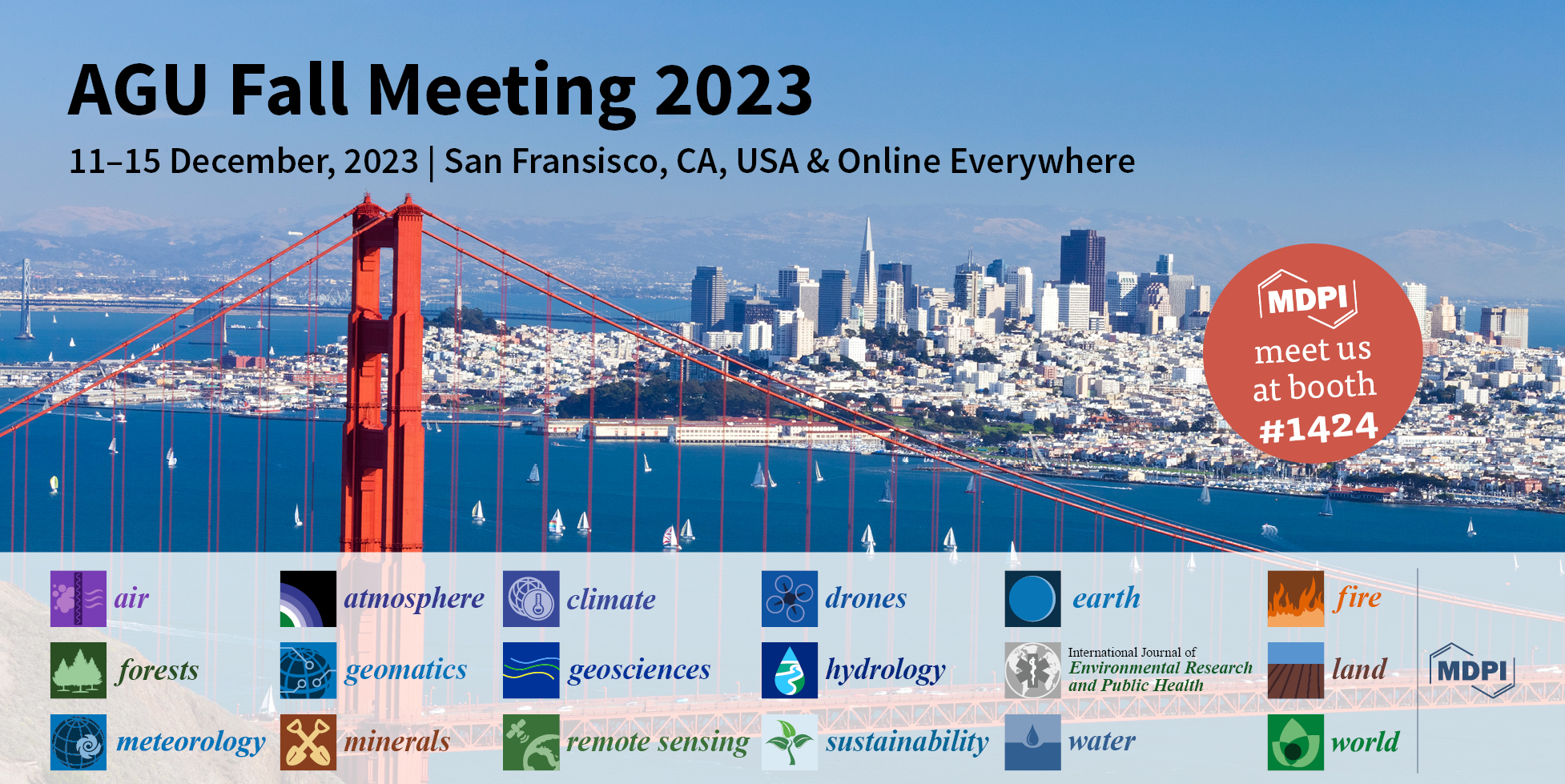
MDPI will be attending the AGU Fall Meeting 2023, which will be held from 11 to 15 December 2023 in San Francisco, CA, USA.
For more than 100 years, AGU has been opening science—opening pathways to discovery, opening greater awareness to address climate change, opening greater collaborations that lead to solutions and opening the fields and professions of science to a whole new age of justice, equity, diversity, inclusion and belonging.
2023 might be the official year of Open Science, but we also see it as an opportunity to affirm AGU’s overarching values and beliefs. It is a message for all of us to carry as we come together to share, inspire, collaborate, engage and most of all rededicate ourselves as a united community grounded in wide open science.
The following MDPI journals will be represented:
- Air;
- Atmosphere;
- Climate;
- Drones;
- Earth;
- Fire;
- Forests;
- Geomatics;
- Geosciences;
- Hydrology;
- IJERPH;
- Land;
- Meteorology;
- Minerals;
- Remote Sensing;
- Sustainability;
- Water;
- World.
If you are planning to attend this conference, please feel free to stop by our booth #1424 and start a conversation with us. Our delegates look forward to meeting you in person and answering any questions that you may have. For more information about the conference, please visit the following website: https://www.agu.org/fall-meeting.
6 September 2023
Recap of Awards Granted to Scholars in 2022
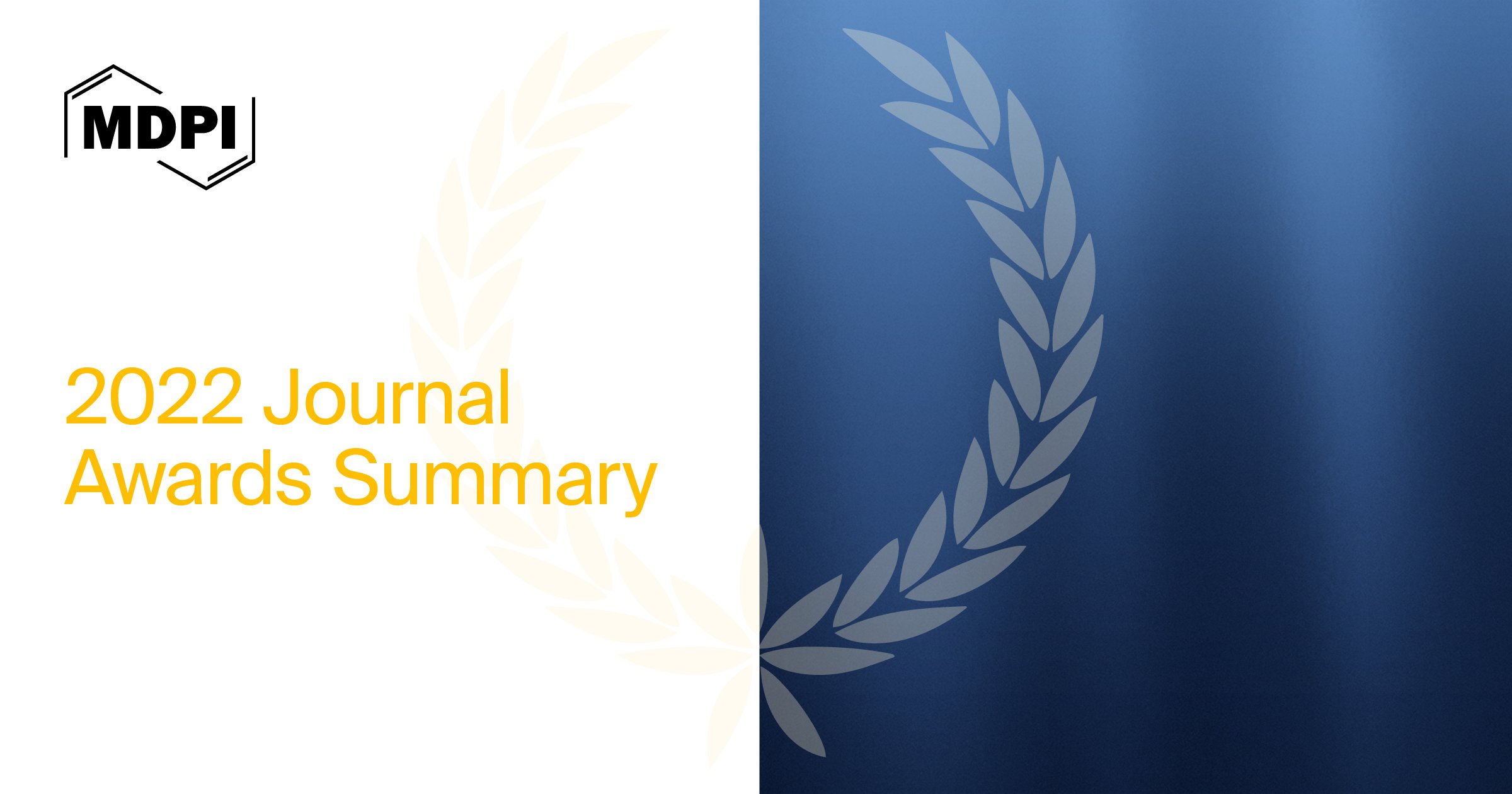
MDPI is committed to supporting the academic community, nurturing talent and advancing science. Awards are an important part of the research landscape and play a vital role in helping academics gain recognition, especially young researchers as they embark on new research avenues.
In 2022, our journals presented a total number of 394 Awards, including Travel Awards, Young Investigator Awards, Best PhD Thesis Awards, Best Paper Awards, and Outstanding Reviewer Awards, with several winners announced for some of the awards. The total prize sum amounted to just under 580,000 Swiss francs (CHF), or approximately 650,000 US dollars. Overall, more than 720 scholars were awarded.
The majority of the awards were dedicated to young researchers in relatively early stages of their careers. This encompassed 66 of the afore-mentioned Travel Awards, 60 Young Investigator Awards, supporting research projects and conference attendance, as well as 51 Best PhD Thesis Awards. Additionally, 113 Best Paper Awards were given by our journals. The selection committees were entrusted with identifying the most impactful and novel research and review articles published in their journal within a given year.
MDPI will continue its support and recognition for the academic community moving forward, sponsoring new awards across disciplines. To learn more about all the awardees and their research projects in your field of study, please visit the following pages:
To explore more MDPI awards, please click here.
31 August 2023
Meet Us at the XVIII World Water Congress, 11–15 September 2023, Beijing, China
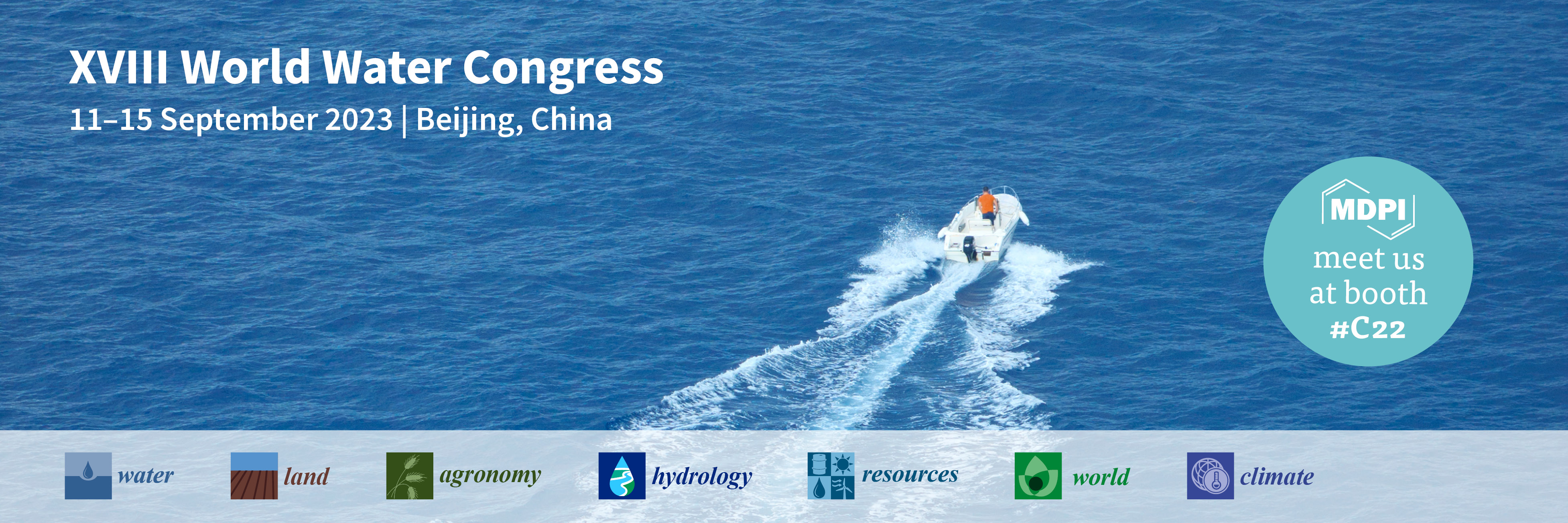
Conference: XVIII World Water Congress
Date: 11–15 September 2023
Location: Beijing China-Germany International Convention and Exhibition Center (Beijing Guoce International Convention and Exhibition), Beijing, China
The World Water Congress is one of the world's largest congresses linking water policy makers, researchers and policy practitioners. Since 1973, the International Water Resources Association (IWRA) has held a World Water Congress every three years in various locations around the world. This influential event has been successfully held 17 times. During the Congress, heads of international organizations, high-level government officials, experts, scholars, entrepreneurs and economists from all over the world share their knowledge, experience and practice regarding a wide range of topics related to water.
With the theme of “Water for All: Harmony between Humans and Nature”, the XVIII World Water Congress aims to promote coordination and balance between the water needs of humans and nature. The Congress will facilitate knowledge and experience sharing, focusing on investigating the relationship between water, humans and nature, identifying and reconciling all water-related factors in a coordinated manner, and making and implementing water management strategies and polices using systematic approaches.
MDPI will be attending the XVIII World Water Congress as an exhibitor (booth #C22). We welcome researchers from different backgrounds to visit and share their latest ideas with us.
The following MDPI journals will be represented:
- Water;
- Land;
- Agronomy;
- Hydrology;
- Resources;
- World;
- Climate.
If you plan to attend this conference, please feel free to stop by our booth at #C22. Our delegates look forward to meeting you in person to answer any questions you may have. For more information about the conference, please visit the following link: https://www.worldwatercongress.com/.
30 August 2023
MDPI Insights: The CEO’s Letter #3 - Sustainability and Co-opetition

Welcome to the MDPI Insights: The CEO's Letter.
In these monthly letters, I will showcase two key aspects of our work at MDPI: our commitment to empowering researchers and our determination to facilitating open scientific exchange.
Opening Thoughts

Our Commitment to Sustainability
As a pioneer in academic open access publishing since 1996, MDPI has always been dedicated to facilitating scientific exchange across all disciplines. Our approach to open science is guided by principles such as Open Access (OA), Timeliness and Efficiency, Simplicity, High-Quality Service, Flexibility, and a commitment to Sustainability. This commitment involves preserving published papers for the long term and supporting the future of science through partnerships, sponsorships, and awards.
In this edition of the CEO Letter, I will delve into MDPI’s various sustainability initiatives. As a leader in OA publishing, we are able to provide the public with a significant amount of environment-related content at no cost.
MDPI and the Sustainable Development Goals (SDGs)
In 2020, the SDG Publishers Compact was launched to accelerate implementation of the SDGs by promoting content that informs, develops, and inspires action. MDPI joined this initiative in 2021 and subsequently launched the MDPI SDG Hub in 2022, offering free access to recent research within the scope of each of the 17 SDGs. We also support authors from underrepresented communities by waiving publication charges for selected SDG-related papers. Detailed sustainability practices and supported publications are available in the report under each Goal page.
“More than 80% of MDPI articles and reviews published in 2022 relate to the Sustainable Development Goals.” [source: InCites, Accessed on 21.08.2023]
As at August 2023, MDPI boasts 14 journals dedicated to sustainability-related topics. Our first journal in this area, Sustainability, has published over 29,000 articles on the SDGs, accumulating over 240,000 citations (source: InCites, as at 1 January 2023). These journals serve as vital platforms for researchers to share insights and address environmental challenges. In addition:
MDPI journals specializing in sustainability-related topics:
- 2009: Sustainability
- 2012: Resources
- 2013: Climate
- 2014: Environments
- 2016: Recycling
- 2019: Clean Technologies
- 2020: Sustainable Chemistry
- 2021: Wind, Biomass, Conservation, Pollutants, Solar
- 2022: Waste, Microplastics
Read more:
Impactful Research

Highly Cited Articles in Sustainability
In 2022, content published in Sustainability and indexed in Journal Citation Reports (JCR) received nearly 190,000 citations. This highlights the fact that Sustainability publishes highly cited research articles related to environmental sciences and SDG-related topics such as climate action.
We are pleased to share that Sustainability received a 2022 CiteScore of 5.8, marking a 16% increase from the 2021 metric. Specifically, the CiteScore positions Sustainability as follows: Q1 (27 out of 163) in the “Environmental Science (miscellaneous)” category, and Q1 (101 out of 779) in the “Geography Planning and Development” category. For additional journal statistics, please visit here.
“Sustainability received a 2022 CiteScore of 5.8”
While MDPI journals such as Climate and Atmosphere have a distinct focus on atmosphere pollution and its impact on climate processes, journals like Sustainability, Environments, Water, Remote Sensing, and IJERPH publish content related to climate change. These journals have published over 32,300 articles related to SDG 13: Climate Action.
Highly Cited Papers in Sustainability
Below are several highly cited papers published in Sustainability over the past three years. Citation metrics are current as at 15 August 2023.
1. “A Global Assessment: Can Renewable Energy Replace Fossil Fuels by 2050?”Authors: Jerry L. Holechek, Hatim M. E. Geli, Mohammed N. Sawalhah, and Raul Valdez
Sustainability 2022, 14(8), 4792; https://doi.org/10.3390/su14084792
Citations: Crossref (97), Scopus (91), Web of Science (82), Google Scholar (125)
This paper addresses one of the most significant challenges of climate change – achieving Net Zero Carbon by 2050. The meta-analysis suggests that while difficult, this transition is possible through the concerted application of pathways, lifestyle changes, and global cooperation.
2. “Anxiety and the Ecological Crisis: An Analysis of Eco-Anxiety and Climate Anxiety”Author: Panu Pihkala
Sustainability 2020, 12(19), 7836; https://doi.org/10.3390/su12197836
Citations: Crossref (144), Scopus (121), Web of Science (159), Google Scholar (382)
This paper has received substantial media attention, including coverage by The Guardian, BBC, Vice, and CNBC. An interview with Dr. Panu Pihkala, a leading interdisciplinary researcher on the topic, can be found on MDPI’s podcast: Insight Faster, Episode 1.
3. “Impact of Climate Change on Agriculture and Its Mitigation Strategies: A Review”Authors: Gurdeep Singh Malhi, Manpreet Kaur, and Prashant Kaushik
Sustainability 2021, 13(3), 1318; https://doi.org/10.3390/su13031318
Citations: Crossref (207), Scopus (221), Web of Science (186), Google Scholar (355)
This paper reviews literature on climate change, addressing its causes, future projections, impact on agriculture, including plant physiology, growth, productivity, pest infestation, and the economic implications of mitigation strategies.
4. “Impacts of Plastic Pollution on Ecosystem Services, Sustainable Development Goals, and Need to Focus on Circular Economy and Policy Interventions”Authors: Rakesh Kumar, Anurag Verma, Arkajyoti Shome, Rama Sinha, Srishti Sinha, Prakash Kumar Jha, Ritesh Kumar, Pawan Kumar, Shubham, Shreyas Das, Prabhakar Sharma, and P. V. Vara Prasad
Sustainability 2021, 13(17), 9963; https://doi.org/10.3390/su13179963
Citations: Crossref (134), Scopus (136), Web of Science (113), Google Scholar (184)
This review aims to assess the adverse effects of plastic pollution on ecosystems, link the management of plastic with the SDGs, and propose policy measures using transdisciplinary approaches. Empowering communities to reduce plastic use is crucial. Addressing global plastic pollution is a priority.
Sustainability is an international, cross-disciplinary, open access journal that explores environmental, cultural, economic, and social sustainability of human beings. It provides a forward-looking platform for research on sustainability and sustainable development, and is published semi-monthly online by MDPI. Sustainability is affiliated with The Canadian Urban Transit Research & Innovation Consortium (CUTRIC) and The International Council for Research and Innovation in Building and Construction (CIB).
Read more:
- Testimonials: See what our editors and authors say about Sustainability.
Inside MDPI

President of Ireland Authors Editorial in MDPI Journal Sustainability
It’s a very special occasion when the president of a country takes the initiative to write an editorial for a journal. Michael D. Higgins, President of the Republic of Ireland, has contributed his insights to a forthcoming Special Issue in Sustainability:

This Special Issue, focusing on “making sustainable development happen” at grassroots levels, allows for perspectives from, and on, the major world faiths, exploring how challenges have been conceptualised and addressed, in addition to case studies of faith-based sustainability initiatives in practice.
The experience of faith institutions and communities in translating theological and moral commitments to sustainable development into action is now a topic we must examine with urgency; one on which I am so glad this Special Issue focuses.
As President of Ireland, I very much support this Special Issue of Sustainability. It is my great hope that the contents of the papers contained herein will assist in making sustainable development happen at grassroots levels across the world so that we can cooperate together, people of faith and of none, to ensure a just, inclusive and sustainable future for all on our fragile planet.
Read the completed editorial here:
Special Issue “Faith and Sustainable Development: Exploring Practice, Progress and Challenges among Faith Communities and Institutions”: Foreword by the President of Ireland
Author: Michael D. Higgins
Sustainability 2023, 15(12), 9683; https://doi.org/10.3390/su15129683
Coming Together for Science

The World Sustainability Forum 2023
The World Sustainability Forum (WSF) is a biennial MDPI event focused on sustainability. WSF 2023 marks the tenth anniversary of the conference series, taking place on 14 September. For the first time, the event will be hosted as a 24-hour conference across three locations – Singapore, Basel in Switzerland, and Toronto in Canada – alongside virtual streaming.
This unique format allows us to span three time zones, providing live coverage of critical sustainability-related topics throughout the day:
- The Singapore Hub, chaired by Professor Horn Mun Cheah and Associate Professor Renee Tan, will explore “Sustainability for Social and Community Impact”.
- The Basel Hub, chaired by Prof. Dr. Anet Režek Jambrak and Dr. Lela Mélon, will delve into “Sustainability in the industry, and at university and corporate settings”.
- The Toronto Hub, led by Dr. Umberto Berardi, will discuss “The Sustainable Built Environment”.
MDPI Sustainability Foundation: Recognizing Excellence in Sustainability Research
The MDPI Sustainability Foundation supports researchers through two sustainability-focused awards:
- The World Sustainability Award, amounting to USD 100,000, is given to senior researchers.
- The Emerging Sustainability Leader Award, valued at USD 20,000, sponsored by the journal Sustainability, is presented to early-career researchers.
The winners of the Sustainability Foundation will be formally awarded during the WSF2023 on 14 September. Interviews with the award winners and finalists are available below.
2023 World Sustainability Award Winners
Interviews with 2023 Emerging Sustainability Leader Award Finalists
- Dr. Bahareh Kamranzad
- Dr. Youjin Kim
- Dr. Julia Lohmann
As a hybrid event, WSF23 provides scholars with the option to attend in person at one of the conference sites or, for a more sustainable approach, virtually. All sessions will be recorded and archived for future access. Registration is open until 3 September 2023, with in-person and virtual tickets available here.
Read more:
Closing Thoughts
“Co-opetition”: Collaboration Plus Healthy Competition – A Visit to Elsevier
I firmly believe in fostering collaboration and at the same time promoting healthy competition within the academic publishing industry. The market offers ample room for publishers and related companies to provide valuable services and products that enrich the academic community. While MDPI is recognized for its efficient and streamlined processes –thanks to our over 6,000 colleagues, in-house tools, and initiatives that support the author journey – our ethos has always involved learning from and collaborating with other organizations.
MDPI’s Interaction with Elsevier
In January 2023, I had a brief conversation with Judy Verses, President of Global Academic and Government Markets at Elsevier, following her participation in a panel discussion at the Academic Publishers Europe event in Berlin. One of the highlights for me was Judy’s insight into the impact of research, particularly her emphasis on the role of collaboration, including policy and showing the impact of research to influence on funding decisions.
“Such collaborations drive forward-looking strategies to elevate our support for the scholarly community”

Judy and I resumed our discussion in August, when I visited Elsevier's office to review current projects, such as our recent agreement with Science Direct and the continued indexing of MDPI journals in Scopus (indexing database owned by Elsevier). We also explored possible opportunities for the future, including a potential collaboration to expand MDPI’s Scilit data infrastructure. This endeavour aims to aggregate and provide access to scholarly metadata encompassing journal articles, conference papers, books, preprints, and more. While these discussions are ongoing, the underlying principle remains that such collaborations drive forward-looking strategies to elevate our services and support for the scholarly community.
It was great that Judy and I acknowledged the merits of 'co-opetition,' a concept based of the belief that fostering cooperation alongside healthy competition can lead to shared advancements for both individual companies and the industry at large.
‘Fully OA’ Organizations Dedicated to Open Access

MDPI proudly aligns with the ‘Fully OA’ group, a collaborative initiative comprising nine organizations dedicated to Open Access. Our monthly meetings, including an OASPA representative, serve as platforms to share non-confidential information, resources, and projects. These gatherings also facilitate discussions on topics relevant to fully OA organizations. Occasionally, joint actions spring from these interactions, such as collaborative blog posts on pertinent subjects and joint statements, such as a recent response to the House Appropriations Committee.
This display of cooperation among competing entities forms a strategic alliance focused on nurturing the best interests of the OA publishing model.
As I wrap up this third edition of the CEO Letter, I encourage you to seize opportunities for collaboration and contribute to advancing our shared academic culture. As the African proverb has it, “If you want to go fast, go alone; if you want to go far, go together.”
Chief Executive Officer
MDPI AG
28 August 2023
Meet Us at the ISPRS 2023 Geospatial Week (GSW 2023), 2–7 September 2023, Cairo, Egypt
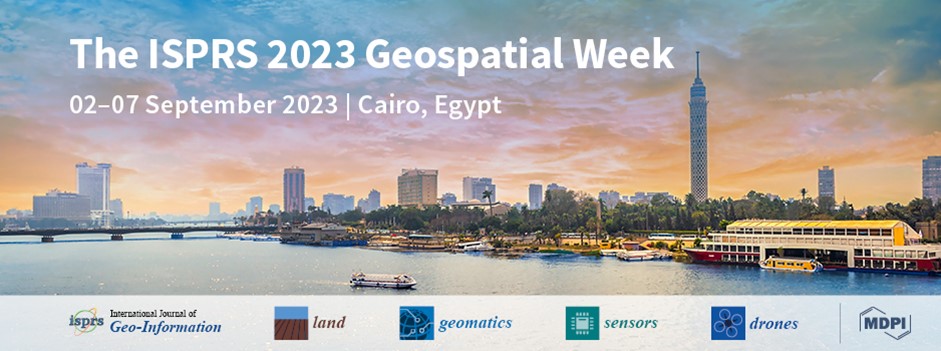
MDPI will attend the ISPRS 2023 Geospatial Week (GSW 2023) from 2 to 7 September 2023 in Cairo, Egypt. The Geospatial Week is an internationally renowned scientific event held once every two years. The event is organized by the International Society of Photogrammetry and Remote Sensing (ISPRS) to bring together experts in the fields of photogrammetry, remote sensing, and geospatial information science. Between 1000 and 2000 researchers and professionals from around the world gather for an entire week to share new findings and experiences through a series of dedicated workshops. The 2023 Geospatial Week will be hosted by the Arab Academy for Science, Technology, and Maritime Transport (AASTMT) and it will be held under the auspices of H.E Secretary General of the League of Arab States. The conference will be held in September 2023, at the InterContinental Citystars Cairo, Egypt. AASTMT strongly believes that science is the key to the future and the cornerstone for the progress and prosperity of nations.
The following MDPI journals will be represented:
If you plan on attending this conference, please feel free to stop by our booth and start a conversation with us. Our delegates look forward to meeting you in person and answering any questions that you may have. For more information about the conference, please visit https://gsw2023.com.
23 August 2023
Meet Us at the 2023 Annual Meeting of the Geographical Society of China—Commission on Urban Geography, 15–18 September 2023, Wuhan, China
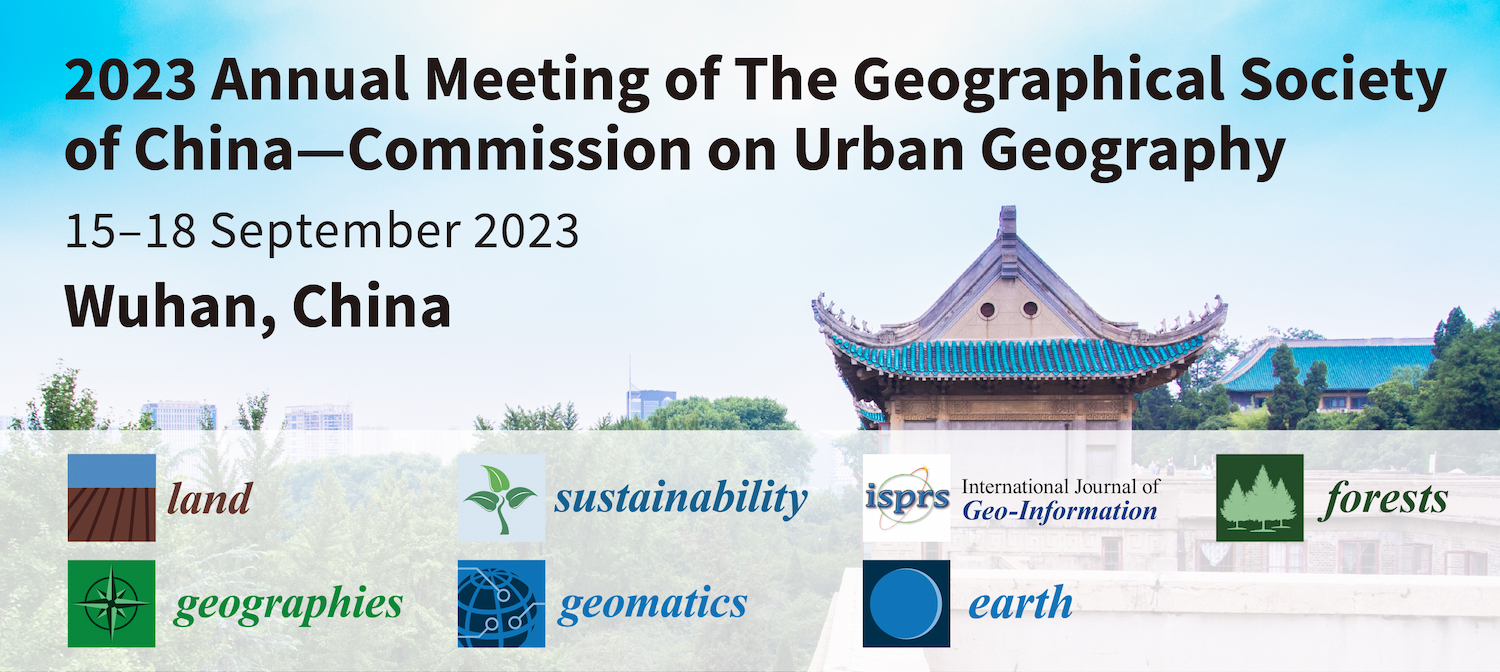
MDPI is attending the 2023 Annual Meeting of the Geographical Society of China—Commission on Urban Geography. The event will be held at Wuhan University, China, from 15 to 18 September 2023, and it is organized by the Geographical Society of China. This conference will focus on the theme "Innovative Development of Urban Geography for Chinese Modernization"; it will exchange new ideas, new trends, new methods and new practices of urban geography, explore new opportunities, new positioning and new paradigms for the development of urban geography in the context of disciplinary integration, and jointly promote the prosperity and development of urban geography in China.
Representatives of the following MDPI journals will be attending:
- Land (leading journal);
- Sustainability;
- IJGI;
- Forests;
- Geomatics;
- Geographies;
- Earth.
If you are also attending this conference, please feel free to stop by our booth. Our delegates look forward to meeting you in person to answer any questions you may have. For more information about the conference, please visit: http://www.gsc.org.cn/web/#/meeting/2fea355b-6e53-412e-8119-797535909665.
15 August 2023
Meet Us at the 14th National Conference on Biodiversity—1st International Conference on Mediterranean Biodiversity, 13–15 September 2023, Lecce, Italy
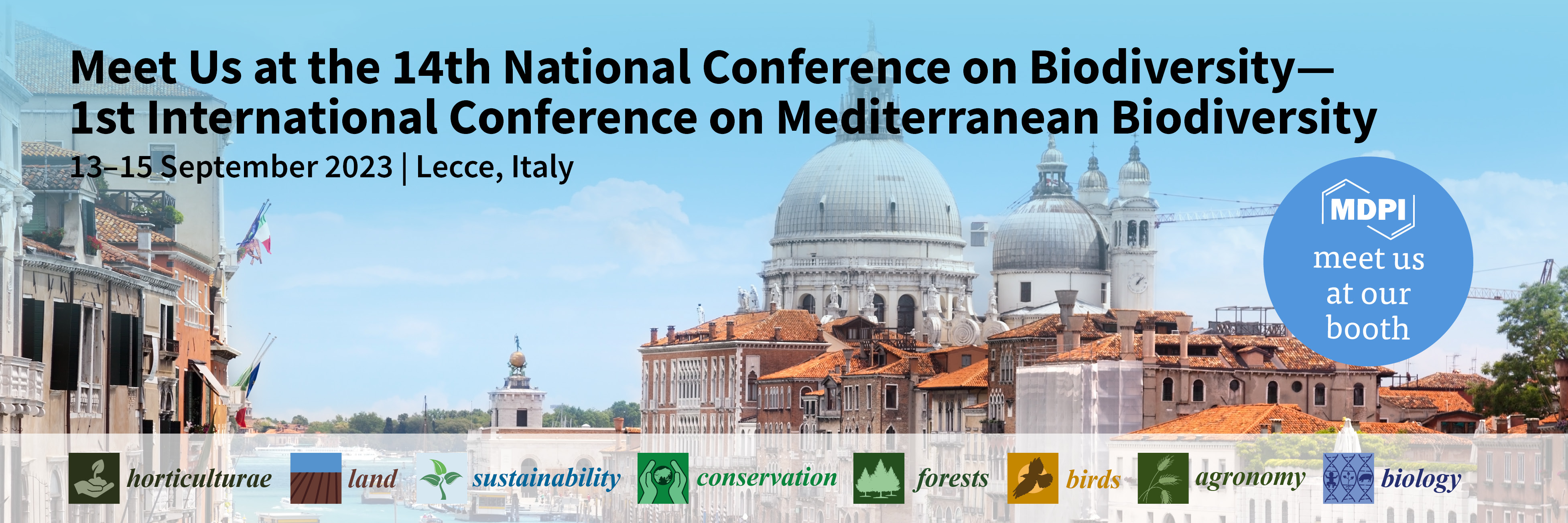
MDPI journals will be attending the 14th National Conference on Biodiversity 1st International Conference on Mediterranean Biodiversity as an exhibitor. This meeting will be held in Lecce, Italy from 13 to 15 September 2023.
The 14th National Conference on Biodiversity will be organized by the Department of Biological and Environmental Sciences and Technologies (DiSTeBA) of the University of Salento in collaboration with the Academy of Mediterranean Biodiversity Sciences (ASBM) in order to continue the discussion and dialogue initiated more than 25 years ago, among scientists, institutional and policymakers, on issues related to the mutually complementary domains of the biodiversity: biodiversity at the intraspecific level, at the interspecific level, and at the entire ecosystem level. The aim is to help promote the advancement of knowledge based on the rigor of the scientific method. In particular, the 14th National Biodiversity Conference will be a showcase for studies and research focusing on “Biodiversity, Resilience and Climate Change”.
The following MDPI journals will be represented:
If you are attending this conference, please feel free to start a conversation with us. Our delegates look forward to meeting you in person and answering any questions you may have. For more information about the conference and our booth, please visit https://leccebiodiversity2023.com/.
31 July 2023
MDPI’s 2022 Best PhD Thesis Awards in Environmental and Earth Sciences—Winners Announced
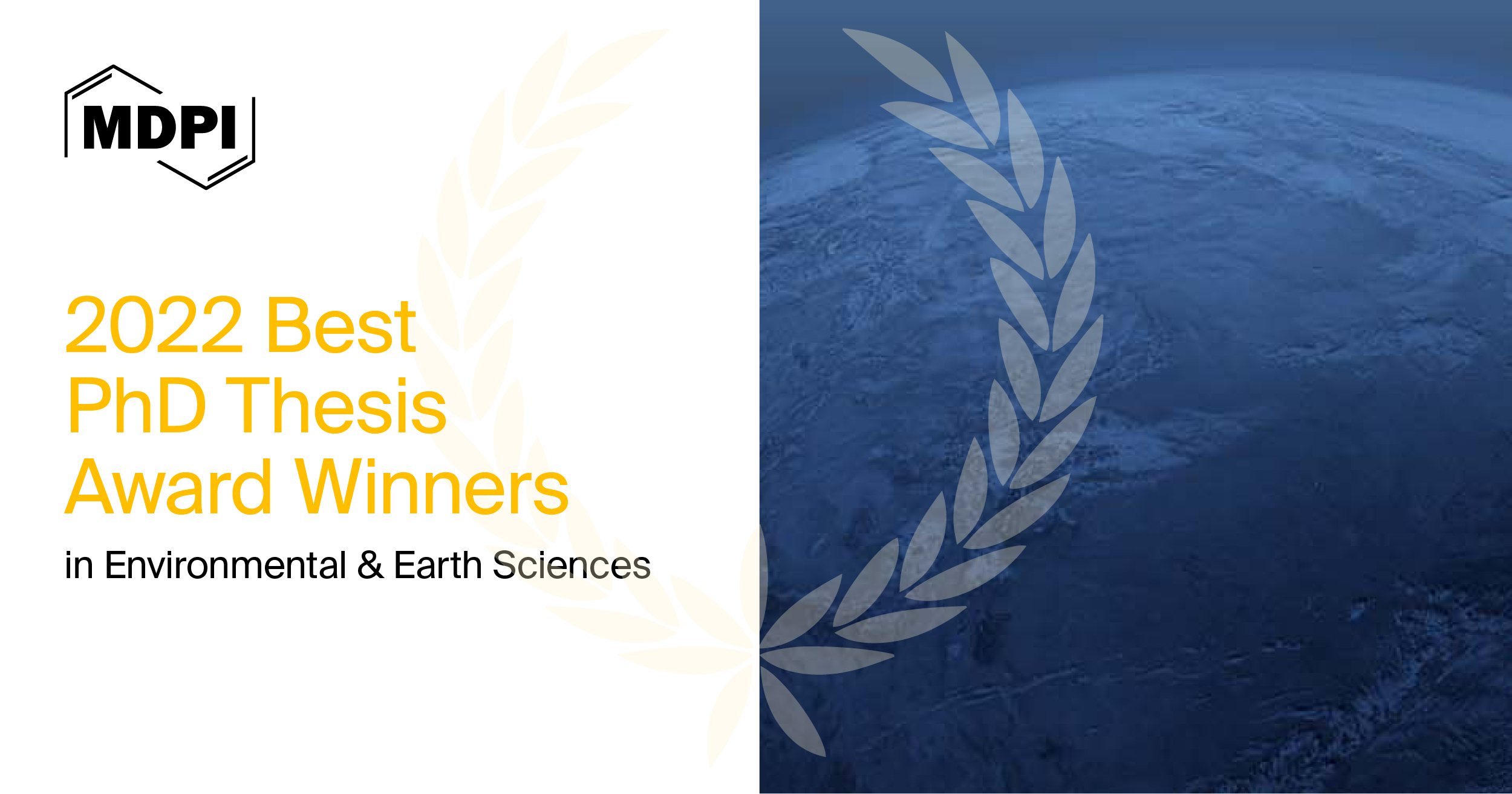
MDPI’s Best PhD Thesis Awards are presented to recognize the young scholars who are deemed to have completed the most outstanding PhD thesis in their field of research and to encourage them to continue their outstanding work and make further contributions to their field.
We would like to warmly congratulate the winners of the 2022 Best PhD Thesis Awards and wish them success with their future research endeavors.
- “Variability of Ocean Dynamics and Associated Mechanisms Over the Tropical Indian Ocean”
by Sartaj Khan, Harbin Engineering University, China
- “Nanofluid Impingement Jet Heat Transfer”
by Javad Mohammadpour, Macquarie University, Australia
- “Abiotic Sedimentary Dolomite Formation: from Nano- to Macro-Scale”
by Yihang Fang, Washington University, USA
- “Effects of Rare Earth Elements on Aquatic Organisms under a Changing Environment”
by Catia Figueiredo, CIIMAR—Interdisciplinary Centre of Marine and Environmental Research, Portugal
- “Green-Gray Coupled Runoff Control Infrastructure Adaptive Multi-Objective Optimization Method”
by Zijing Liu, Tsinghua University, China
About MDPI Awards:
In order to reward the academic community, especially young researchers and enhance communication among scientists, MDPI journals regularly offer various awards to researchers in specific fields. These awards, serving as a source of inspiration and recognition, help raise the influence of talented individuals who have been credited with outstanding achievements and are making a significant contribution to the advancement of their fields.
To explore more MDPI awards, please click here.
31 July 2023
MDPI’s 2022 Best Paper Awards in Environmental and Earth Sciences—Winners Announced
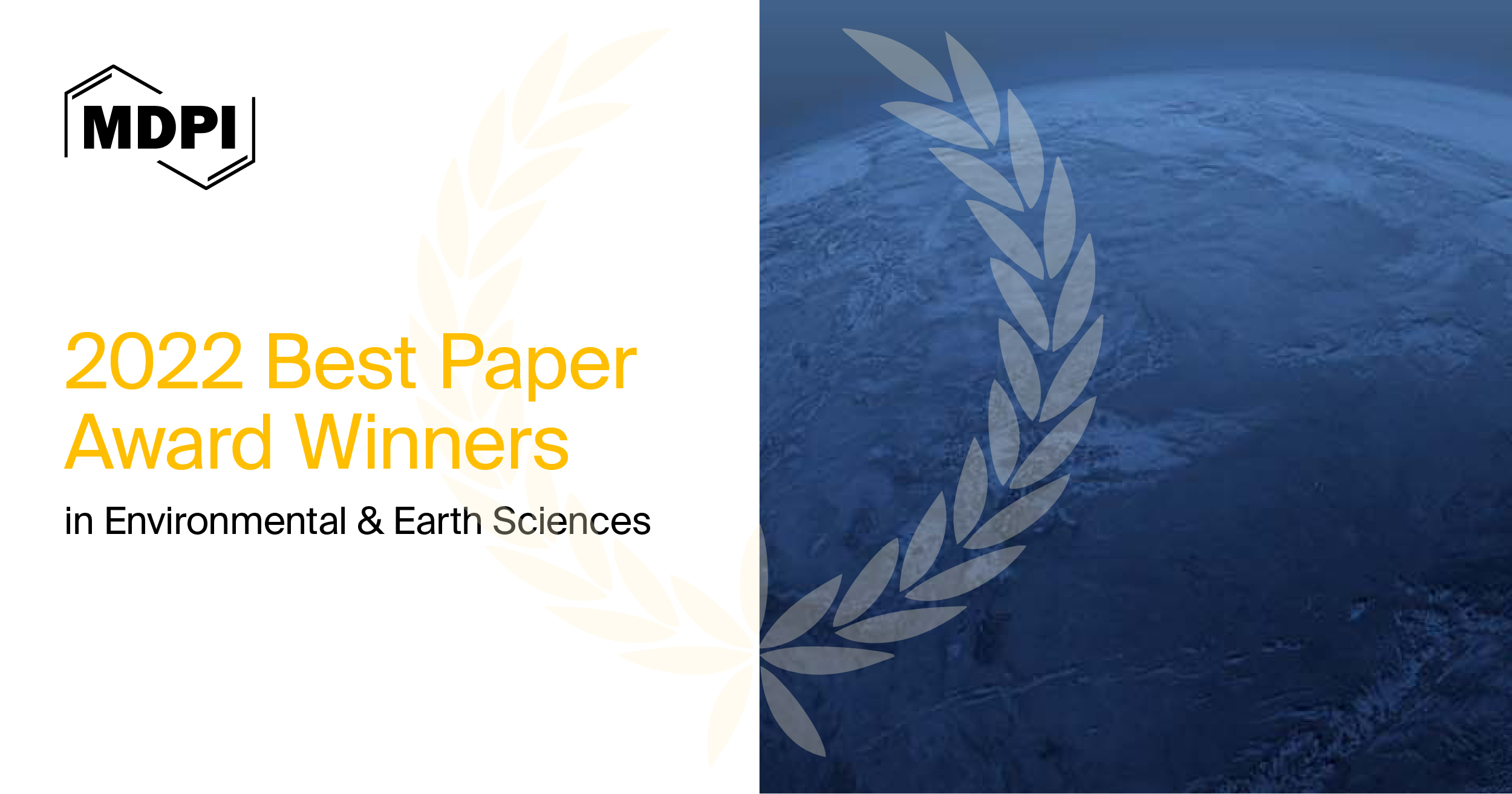
The purpose of our Best Paper Awards is to promote and recognize the most impactful contributions published within MDPI journals.
The editors of each journal carefully selected reviews and research papers through a rigorous judging process based on criteria such as the scientific merit, overall impact, and the quality of presentation of the papers published in the journal.
We are honored to present the winners for the year 2022 in environmental and earth sciences, who were selected amongst the extensive competition, and congratulate the authors for their outstanding scientific publications.
- “Covid-19 Airborne Transmission and Its Prevention: Waiting for Evidence or Applying the Precautionary Principle?”
by Annalaura Carducci, Ileana Federigi and Marco Verani
Atmosphere 2020, 11(7), 710; https://doi.org/10.3390/atmos11070710
- “The Heat Health Warning System in Germany—Application and Warnings for 2005 to 2019”
by Andreas Matzarakis, Gudrun Laschewski and Stefan Muthers
Atmosphere 2020, 11(2), 170; https://doi.org/10.3390/atmos11020170
- “Temporal Hydrological Drought Index Forecasting for New South Wales, Australia Using Machine Learning Approaches”
by Abhirup Dikshit, Biswajeet Pradhan and Abdullah M. Alamri
Atmosphere 2020, 11(6), 585; https://doi.org/10.3390/atmos11060585
- “Lignocellulosic Biomass Mild Alkaline Fractionation and Resulting Extract Purification Processes: Conditions, Yields, and Purities”
by Vincent Oriez, Jérôme Peydecastaing and Pierre-Yves Pontalier
Clean Technol. 2020, 2(1), 91-115; https://doi.org/10.3390/cleantechnol2010007
- “Environmental and Economic Evaluation of Fuel Choices for Short Sea Shipping”
by Kirsi Spoof-Tuomi and Seppo Niemi
Clean Technol. 2020, 2(1), 34-52; https://doi.org/10.3390/cleantechnol2010004
- “Analyzing Similarities between the European Union Countries in Terms of the Structure and Volume of Energy Production from Renewable Energy Sources”
by Jarosław Brodny and Magdalena Tutak
Energies 2020, 13(4), 913; https://doi.org/10.3390/en13040913
- “High Reynold’s Number Turbulent Model for Micro-Channel Cold Plate Using Reverse Engineering Approach for Water-Cooled Battery in Electric Vehicles”
by Satyam Panchal, Krishna Gudlanarva, Manh-Kien Tran, Roydon Fraser and Michael Fowler
Energies 2020, 13(7), 1638; https://doi.org/10.3390/en13071638 - “Investigation of Inorganic Phase Change Material for a Semi-Transparent Photovoltaic (STPV) Module”
by Alagar Karthick, Muthu Manokar Athikesavan, Manoj Kumar Pasupathi, Nallapaneni Manoj Kumar, Shauhrat S. Chopra and Aritra Ghosh
Energies 2020, 13(14), 3582; https://doi.org/10.3390/en13143582
- “Considerations on Potentials, Greenhouse Gas, and Energy Performance of Biofuels Based on Forest Residues for Heavy-Duty Road Transport in Sweden”
by Shveta Soam and Pål Börjesson
Energies 2020, 13(24), 6701; https://doi.org/10.3390/en13246701
- “Characterization of Hybrid-nano/Paraffin Organic Phase Change Material for Thermal Energy Storage Applications in Solar Thermal Systems”
by Manoj Kumar Pasupathi, Karthick Alagar, Michael Joseph Stalin P, Matheswaran M. M and Ghosh Aritra
Energies 2020, 13(19), 5079; https://doi.org/10.3390/en13195079
- “Snapshot of Photovoltaics—February 2020”
by Arnulf Jäger-Waldau
Energies 2020, 13(4), 930; https://doi.org/10.3390/en13040930
- “The Importance of Renewable Energy Sources in Poland’s Energy Mix”
by Renata Marks-Bielska, Stanisław Bielski, Katarzyna Pik and Krystyna Kurowska
Energies 2020, 13(18), 4624; https://doi.org/10.3390/en13184624
- “Infectious Diseases, Market Uncertainty and Oil Market Volatility”
by Elie Bouri, Riza Demirer, Rangan Gupta and Christian Pierdzioch
Energies 2020, 13(16), 4090; https://doi.org/10.3390/en13164090
- “Cost of Equity of Coal-Fired Power Generation Projects in Poland: Its Importance for the Management of Decision-Making Process”
by Piotr W. Saługa, Katarzyna Szczepańska-Woszczyna, Radosław Miśkiewicz and Mateusz Chłąd
Energies 2020, 13(18), 4833; https://doi.org/10.3390/en13184833
- “Internet of Things (IoT) and the Energy Sector”
by Naser Hossein Motlagh, Mahsa Mohammadrezaei, Julian Hunt and Behnam Zakeri
Energies 2020, 13(2), 494; https://doi.org/10.3390/en13020494
- “A Review on Thermoelectric Generators: Progress and Applications”
by Mohamed Amine Zoui, Saïd Bentouba, John G. Stocholm and Mahmoud Bourouis
Energies 2020, 13(14), 3606; https://doi.org/10.3390/en13143606
- “Contributions and Risks of Artificial Intelligence (AI) in Building Smarter Cities: Insights from a Systematic Review of the Literature”
by Tan Yigitcanlar, Kevin C. Desouza, Luke Butler and Farnoosh Roozkhosh
Energies 2020, 13(6), 1473; https://doi.org/10.3390/en13061473
- “Possibilities and Challenges for the Inclusion of the Electric Vehicle (EV) to Reduce the Carbon Footprint in the Transport Sector: A Review”
by Aritra Ghosh
Energies 2020, 13(10), 2602; https://doi.org/10.3390/en13102602
- “Energy and Climate Policy—An Evaluation of Global Climate Change Expenditure 2011–2018”
by Coilín ÓhAiseadha, Gerré Quinn, Ronan Connolly, Michael Connolly and Willie Soon
Energies 2020, 13(18), 4839; https://doi.org/10.3390/en13184839 - “A Review of The Methanol Economy: The Fuel Cell Route”
by Samuel Simon Araya, Vincenzo Liso, Xiaoti Cui, Na Li, Jimin Zhu, Simon Lennart Sahlin, Søren Højgaard Jensen, Mads Pagh Nielsen and Søren Knudsen Kær
Energies 2020, 13(3), 596; https://doi.org/10.3390/en13030596
- “Microplastic Contamination in Freshwater Environments: A Review, Focusing on Interactions with Sediments and Benthic Organisms”
by Arianna Bellasi, Gilberto Binda, Andrea Pozzi, Silvia Galafassi, Pietro Volta and Roberta Bettinetti
Environments 2020, 7(4), 30; https://doi.org/10.3390/environments7040030
- “Biogas Production from Food Residues—The Role of Trace Metals and Co-Digestion with Primary Sludge”
by Moshe Habagil, Alexander Keucken and Ilona Sárvári Horváth
Environments 2020, 7(6), 42; https://doi.org/10.3390/environments7060042
- “Coastal Pine-Oak Glacial Refugia in the Mediterranean Basin: A Biogeographic Approach Based on Charcoal Analysis and Spatial Modelling”
by Gaetano Di Pasquale, Antonio Saracino, Luciano Bosso, Danilo Russo, Adriana Moroni, Giuliano Bonanomi and Emilia Allevato
Forests 2020, 11(6), 673; https://doi.org/10.3390/f11060673
- “A Survey in Natural Forest Ecosystems of Vietnam Reveals High Diversity of both New and Described Phytophthora Taxa including ramorum”
by Thomas Jung, Bruno Scanu, Clive M. Brasier, Joan Webber, Ivan Milenković, Tamara Corcobado, Michal Tomšovský, Matěj Pánek, József Bakonyi, Cristiana Maia et al.
Forests 2020, 11(1), 93; https://doi.org/10.3390/f11010093
- “Living in Drylands: Functional Adaptations of Trees and Shrubs to Cope with High Temperatures and Water Scarcity”
by José Javier Peguero-Pina, Alberto Vilagrosa, David Alonso-Forn, Juan Pedro Ferrio, Domingo Sancho-Knapik and Eustaquio Gil-Pelegrín
Forests 2020, 11(10), 1028; https://doi.org/10.3390/f11101028
- “Advances and Promises of Epigenetics for Forest Trees”
by Joana Amaral, Zoé Ribeyre, Julien Vigneaud, Mamadou Dia Sow, Régis Fichot, Christian Messier, Gloria Pinto, Philippe Nolet and Stéphane Maury
Forests 2020, 11(9), 976; https://doi.org/10.3390/f11090976
- “Cartographic Vandalism in the Era of Location-Based Games—The Case of OpenStreetMap and Pokémon GO”
by Levente Juhász, Tessio Novack, Hartwig H. Hochmair and Sen Qiao
ISPRS Int. J. Geo-Inf. 2020, 9(4), 197; https://doi.org/10.3390/ijgi9040197
- “A Comprehensive Review of Rare Earth Elements Recovery from Coal-Related Materials”
by Wencai Zhang, Aaron Noble, Xinbo Yang and Rick Honaker
Minerals 2020, 10(5), 451; https://doi.org/10.3390/min10050451 - “SEM-Based Automated Mineralogy and Its Application in Geo- and Material Sciences”
by Bernhard Schulz, Dirk Sandmann and Sabine Gilbricht
Minerals 2020, 10(11), 1004; https://doi.org/10.3390/min10111004
- “Characteristics of Precipitation of Rare Earth Elements with Various Precipitants”
by Kenneth N. Han
Minerals 2020, 10(2), 178; https://doi.org/10.3390/min10020178
- “Lithium-Rich Claystone in the McDermitt Caldera, Nevada, USA: Geologic, Mineralogical, and Geochemical Characteristics and Possible Origin”
by Stephen B. Castor and Christopher D. Henry
Minerals 2020, 10(1), 68; https://doi.org/10.3390/min10010068
- “Using Complementary Methods of Synchrotron Radiation Powder Diffraction and Pair Distribution Function to Refine Crystal Structures with High Quality Parameters—A Review”
by Seungyeol Lee and Huifang Xu
Minerals 2020, 10(2), 124; https://doi.org/10.3390/min10020124
- “Erosive Response of Non-Glaciated Pyrenean Headwater Catchments to the Last Major Climate Transition and Establishing Interglacial Conditions”
by Kurt Martin Stange, Ivar Midtkandal, Johan Petter Nystuen, Andrew Murray, Reza Sohbati, Warren Thompson, Cornelia Spiegel and Hans-Joachim Kuss
Quaternary 2019, 2(2), 17; https://doi.org/10.3390/quat2020017
- “Last Interglacial Climate in Northern Sweden—Insights from a Speleothem Record”
by Martin Finné, Sakari Salonen, Norbert Frank, Karin F. Helmens, Andrea Schröder-Ritzrau, Michael Deininger and Steffen Holzkämper
Quaternary 2019, 2(3), 29; https://doi.org/10.3390/quat2030029
- “Climatically Controlled River Terraces in Eastern Australia”
by James S. Daley and Tim J. Cohen
Quaternary 2018, 1(3), 23; https://doi.org/10.3390/quat1030023
- “Dropstones in Lacustrine Sediments as a Record of Snow Avalanches—A Validation of the Proxy by Combining Satellite Imagery and Varve Chronology at Kenai Lake (South-Central Alaska)”
by Sien Thys, Maarten Van Daele, Nore Praet, Britta J. L. Jensen, Thomas Van Dyck, Peter J. Haeussler, Elke Vandekerkhove, Veerle Cnudde and Marc De Batist
Quaternary 2019, 2(1), 11; https://doi.org/10.3390/quat2010011
- “From Climatic to Anthropogenic Drivers: A Multi-Proxy Reconstruction of Vegetation and Peatland Development in the French Jura Mountains”
by Emilie Gauthier, Vincent E. J. Jassey, Edward A. D. Mitchell, Mariusz Lamentowicz, Richard Payne, Frédéric Delarue, Fatima Laggoun-Defarge, Daniel Gilbert and Hervé Richard
Quaternary 2019, 2(4), 38; https://doi.org/10.3390/quat2040038
- “Current Practices in UAS-based Environmental Monitoring”
by Goran Tmušić, Salvatore Manfreda, Helge Aasen, Mike R. James, Gil Gonçalves, Eyal Ben-Dor, Anna Brook, Maria Polinova, Jose Juan Arranz, János Mészáros et al.
Remote Sens. 2020, 12(6), 1001; https://doi.org/10.3390/rs12061001
- “Change Detection Based on Artificial Intelligence: State-of-the-Art and Challenges”
by Wenzhong Shi, Min Zhang, Rui Zhang, Shanxiong Chen and Zhao Zhan
Remote Sens. 2020, 12(10), 1688; https://doi.org/10.3390/rs12101688 - “A Spatial-Temporal Attention-Based Method and a New Dataset for Remote Sensing Image Change Detection”
by Hao Chen and Zhenwei Shi
Remote Sens. 2020, 12(10), 1662; https://doi.org/10.3390/rs12101662
- “Mapping Landslides on EO Data: Performance of Deep Learning Models vs. Traditional Machine Learning Models”
by Nikhil Prakash, Andrea Manconi and Simon Loew
Remote Sens. 2020, 12(3), 346; https://doi.org/10.3390/rs12030346
- “LiCSBAS: An Open-Source InSAR Time Series Analysis Package Integrated with the LiCSAR Automated Sentinel-1 InSAR Processor”
by Yu Morishita, Milan Lazecky, Tim J. Wright, Jonathan R. Weiss, John R. Elliott and Andy Hooper
Remote Sens. 2020, 12(3), 424; https://doi.org/10.3390/rs12030424
- “A Novel Method for Safety Analysis of Cyber-Physical Systems—Application to a Ship Exhaust Gas Scrubber System”
by Victor Bolbot, Gerasimos Theotokatos, Evangelos Boulougouris, George Psarros and Rainer Hamann
Safety 2020, 6(2), 26; https://doi.org/10.3390/safety6020026
- “Characteristics of Commuters’ Single-Bicycle Crashes in Insurance Data”
by Roni Utriainen
Safety 2020, 6(1), 13; https://doi.org/10.3390/safety6010013
- “Effect of Road Markings and Traffic Signs Presence on Young Driver Stress Level, Eye Movement and Behaviour in Night-Time Conditions: A Driving Simulator Study”
by Darko Babić, Dario Babić, Hrvoje Cajner, Ana Sruk and Mario Fiolić
Safety 2020, 6(2), 24; https://doi.org/10.3390/safety6020024
- “COVID-19 Could Leverage a Sustainable Built Environment”
by Manuel Duarte Pinheiro and Nuno Cardoso Luís
Sustainability 2020, 12(14), 5863; https://doi.org/10.3390/su12145863
- “Mapping the Sustainable Development Goals Relationships”
by Luis Miguel Fonseca, José Pedro Domingues and Alina Mihaela Dima
Sustainability 2020, 12(8), 3359; https://doi.org/10.3390/su12083359
- “The Impact of COVID-19 Pandemic on the Resilience of Sustainable Mobility in Sicily”
by Tiziana Campisi, Socrates Basbas, Anastasios Skoufas, Nurten Akgün, Dario Ticali and Giovanni Tesoriere
Sustainability 2020, 12(21), 8829; https://doi.org/10.3390/su12218829
- “Artificial Intelligence in the Agri-Food System: Rethinking Sustainable Business Models in the COVID-19 Scenario”
by Assunta Di Vaio, Flavio Boccia, Loris Landriani and Rosa Palladino
Sustainability 2020, 12(12), 4851; https://doi.org/10.3390/su12124851
- “Interaction of Environmental Pollutants with Microplastics: A Critical Review of Sorption Factors, Bioaccumulation and Ecotoxicological Effects”
by Albert Menéndez-Pedriza and Joaquim Jaumot
Toxics 2020, 8(2), 40; https://doi.org/10.3390/toxics8020040
- “Analysis of Cannabinoid-Containing Fluids in Illicit Vaping Cartridges Recovered from Pulmonary Injury Patients: Identification of Vitamin E Acetate as a Major Diluent”
by Bryan Duffy, Lingyun Li, Shijun Lu, Lorie Durocher, Mark Dittmar, Emily Delaney-Baldwin, Deepika Panawennage, David LeMaster, Kristen Navarette and David Spink
Toxics 2020, 8(1), 8; https://doi.org/10.3390/toxics8010008
- “Assessing the Benefits of Forested Riparian Zones: A Qualitative Index of Riparian Integrity Is Positively Associated with Ecological Status in European Streams”
by Francis J. Burdon, Ellinor Ramberg, Jasmina Sargac, Marie Anne Eurie Forio, Nancy de Saeyer, Petra Thea Mutinova, Therese Fosholt Moe, Mihaela Oprina Pavelescu, Valentin Dinu, Constantin Cazacu et al.
Water 2020, 12(4), 1178; https://doi.org/10.3390/w12041178
- “Worldwide Regulations and Guidelines for Agricultural Water Reuse: A Critical Review”
by Farshid Shoushtarian and Masoud Negahban-Azar
Water 2020, 12(4), 971; https://doi.org/10.3390/w12040971
- “Adsorption of Methylene Blue in Water onto Activated Carbon by Surfactant Modification”
by Yu Kuang, Xiaoping Zhang and Shaoqi Zhou
Water 2020, 12(2), 587; https://doi.org/10.3390/w12020587
- “Antimicrobials and Antibiotic-Resistant Bacteria: A Risk to the Environment and to Public Health”
by Liliana Serwecińska
Water 2020, 12(12), 3313; https://doi.org/10.3390/w12123313
About MDPI Awards:
In order to reward the academic community, especially young researchers and enhance communication among scientists, MDPI journals regularly offer various awards to researchers in specific fields. These awards, serving as a source of inspiration and recognition, help raise the influence of talented individuals who have been credited with outstanding achievements and are making a significant contribution to the advancement of their fields.
To explore more MDPI awards, please click here.
31 July 2023
MDPI’s 2022 Young Investigator Awards in Environmental and Earth Sciences—Winners Announced
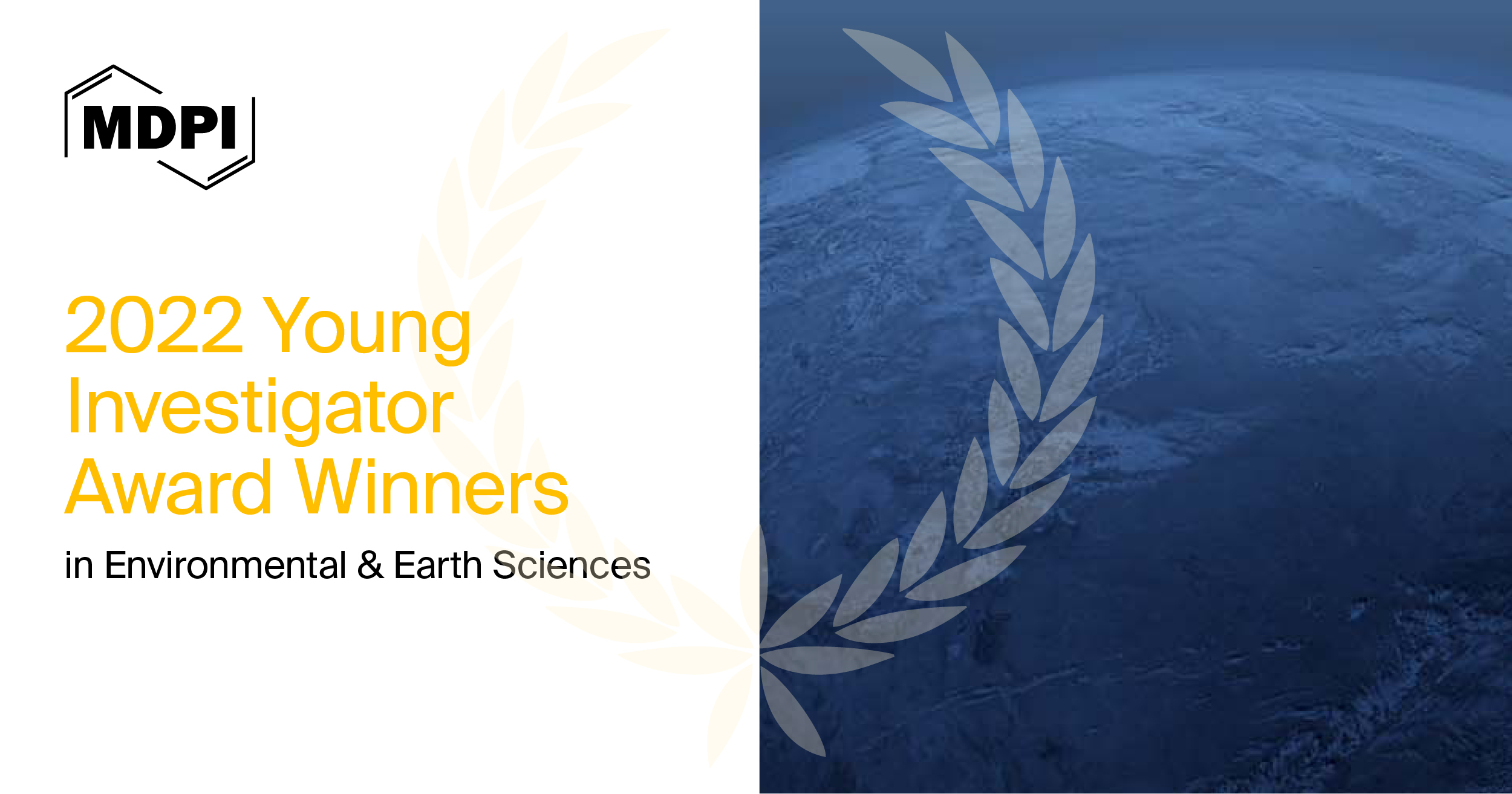
MDPI’s Young Investigator Awards recognize promising junior researchers, acknowledge their contributions, and enhance communication among scientists. We are proud to present the winners for the year 2022 in environmental and earth sciences. The winners were selected by the journals’ Award Evaluation Committee.
We warmly congratulate the awarded young investigators for their outstanding contributions. MDPI will continue to provide support and recognition to the academic community.
- Jianhuai Ye, Southern University of Science and Technology, China
- Saeed Golestan, Aalborg University (AAU), Denmark
- Michael Bertram, Swedish University of Agricultural Sciences, Sweden
- Shaunna M. Morrison, Carnegie Institution for Science, USA
- Danfeng Hong, Qingdao University, China
- Xiaolei Yuan, Aalto University, Finland
- Minjian Chen, Nanjing Medical University, China
- Sergi Garcia-Segura, Arizona State University, USA
About MDPI Awards:
In order to reward the academic community, especially young researchers and enhance communication among scientists, MDPI journals regularly offer various awards to researchers in specific fields. These awards, serving as a source of inspiration and recognition, help raise the influence of talented individuals who have been credited with outstanding achievements and are making a significant contribution to the advancement of their fields.
To explore more MDPI awards, please click here.
31 July 2023
MDPI’s 2022 Travel Awards in Environmental and Earth Sciences—Winners Announced
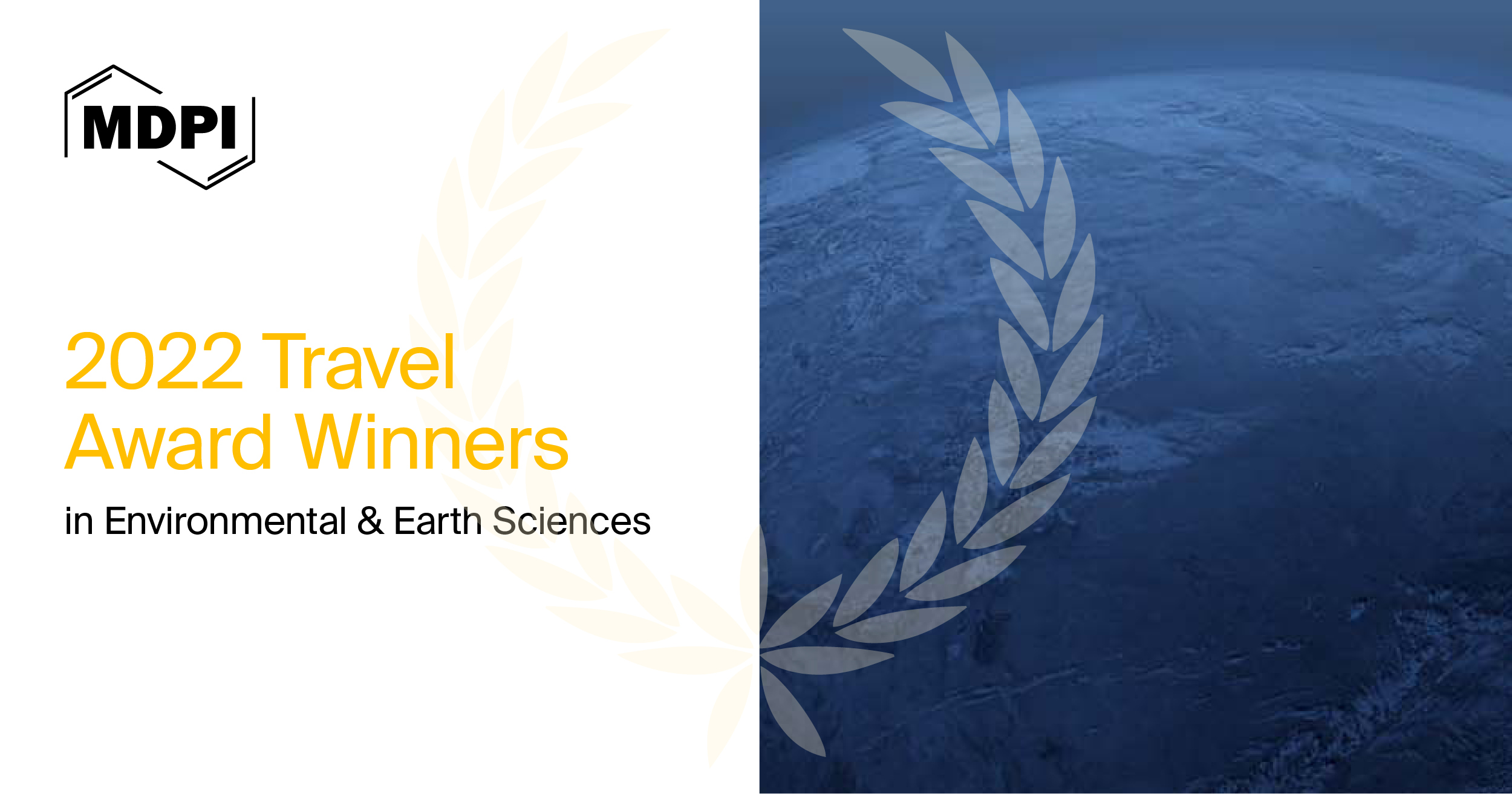
We are proud to recognize the winners of MDPI’s 2022 Travel Awards in environmental and earth sciences for their outstanding presentations and to present them with the prize.
MDPI journals regularly offer travel awards to encourage junior scientists to present their latest research at academic conferences in specific fields, which helps to increase their influence.
The winners mentioned below were carefully selected by the journal editors based on an outline of their research and the work to be presented at an academic conference.
We would like to warmly congratulate the winners of the 2022 Travel Awards and wish them the greatest success with their future research endeavors.
- Pavani Misra, Indian Institute of Technology Kanpur, India
- Runxia Cai, North Carolina State University, USA
- Lukasz Niedzwiecki, Wrocław University of Science and Technology, Poland
- Michael Eze, 1Macquarie University, Australia; 2University of Goettingen, Germany
- Murillo Vetroni Barros, Federal University of Technology—Paraná, Brazil
- Ana Novo, University of Vigo, Spain
- Eko Setio Wibowo, Kyungpook National University, Republic of Korea
- Esmaiil Mokarighahroodi, Texas A&M University, USA
- Roseane F. De Fátima Guimarães, Université de Montréal, Canada
- Phillips E. Obasohan, University of Sheffield, UK
- Katarina Baralić, University of Belgrade, Serbia
- Xianglong Xu, Monash University, Australia
- Jianwei Huang, The Chinese University of Hong Kong, China
- Sevim Sezi Karayazi, Eindhoven University of Technology, the Netherlands
- Rocky Talchabhadel, Texas A&M AgriLife Research, USA
- Leah Renwick, University of Chile, Chile
- Ana Novo, University of Vigo, Spain
- Renée Mie Fredensborg Hansen, 1Technical University of Denmark; 2Norwegian University of Science and Technology (in collaboration with The University Centre in Svalbard), Norway
- Aida Hosseinian, Oulu University, Finland
- Morteza Nazari-Heris, Pennsylvania State University, USA
- Domenico Mazzeo, University of Calabria, Italy
- Yuan Chen, The University of Sydney, Australia
- Sonia Khadija Maïté Gueroun, Tecnologia e Inovação (ARDITI), Portugal
- Konstantina Tsigkou, University of Patras, Greece
- Sabolc Pap, University of the Highlands and Islands, UK
- Xuexiu Jia, Brno University of Technology, Czech Republic
- Angelos Alamanos, Dundalk Institute of Technology, Ireland
About MDPI Awards:
In order to reward the academic community, especially young researchers and enhance communication among scientists, MDPI journals regularly offer various awards to researchers in specific fields. These awards, serving as a source of inspiration and recognition, help raise the influence of talented individuals who have been credited with outstanding achievements and are making a significant contribution to the advancement of their fields.
To explore more MDPI awards, please click here.
31 July 2023
MDPI’s 2022 Outstanding Reviewer Awards in Environmental and Earth Sciences—Winners Announced
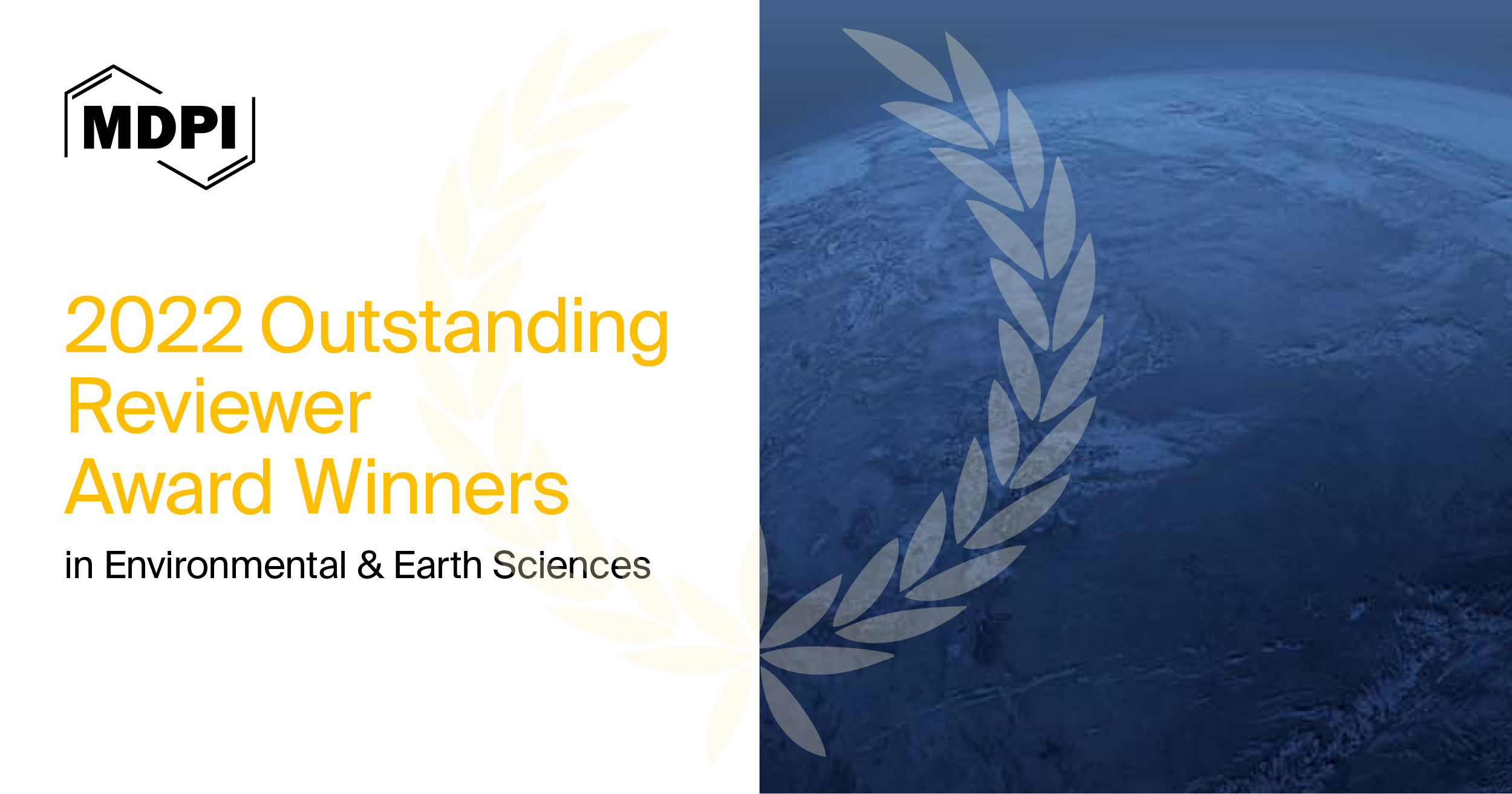
In order to acknowledge our reviewers, who so generously dedicate their time to reviewing papers and demonstrate diligence, professionalism, and timeliness when reviewing manuscripts, MDPI journals regularly offer outstanding reviewer awards to scholars who participate in the peer-review process.
We are proud to recognize the winners for the year 2022 in environmental and earth sciences for their outstanding contributions among the extensive competition by presenting them with an Outstanding Reviewer Award.
We would like to take this opportunity to congratulate all the winners on their achievements. MDPI will continue to provide support and recognition to the academic community.
- Stanislav Juráň, Global Change Research Institute CAS, Czech Republic
- Sandro W. Lubis, Pacific Northwest National Laboratory (PNNL), USA
- Eliza Kalbarczyk, Adam Mickiewicz University in Poznan, Poland
- Raffaele Carli, Polytechnic of Bari, Italy
- Marcos Tostado-Véliz, University of Jaén, Spain
- Andrea Mariscotti, University of Genova, Italy
- Xuejun Qian, Morgan State University, USA
- Dominik Zimon, Rzeszow University of Technology, Poland
- Petr Pyszko, University of Ostrava, Czech Republic
- Narayan Bhusal, Seoul National University, Republic of Korea
- Vasiliki Kamperidou, Aristotle University of Thessaloniki, Greece
- Muhammad Adnan Akram, Lanzhou University, China
- Jelena T. Petrović, Institute for Technology of Nuclear and Other Mineral Raw Materials, Serbia
- Martina Zucchi, University of Bari, Italy
- Theodore M. Present, California Institute of Technology, United States
- Anuli Njoku, Southern Connecticut State University, USA
- Álvaro Francisco Lopes De Sousa, Institute of Hygiene and Tropical Medicine, Portugal
- Carol Nash, University of Toronto, Canada
- Geovani Lopez-Ortiz, Universidad Nacional Autónoma de México, Mexico
- Jorge Velázquez Saornil, Universidad Católica de Ávila, Spain
- Naser Alsharairi, Menzies Health Institute Qld- Griffith University, Australia
- Salvador Baena-Morales, University of Alicante, Spain
- Shirley Wyver, Macquarie University, Australia
- Akihiko Katayama, Shikoku Gakuin University, Japan
- Alessandro Sapienza, Institute of Cognitive Sciences and Technologies (ISTC - CNR), Italy
- Alexandr Ceasovschih, “St. Spiridon” Emergency Hospital, Romania
- Alina Cernasev, University of Tennessee Health Science Center, USA
- Amelia Beata Staszowska, Lublin University of Technology, Poland
- Andreia Lima, Fernando Pessoa University, Portugal
- Anna Lipert, Medical University of Lodz, Poland
- Anson Kai Chun Chau, The Chinese University of Hong Kong, China
- Bianca Hanganu, “Grigore T. Popa” University of Medicine and Pharmacy of Iasi, Romania
- Bocong Yuan, Sun Yat-sen University, China
- Chee-Seng Tan, Universiti Tunku Abdul Rahman, Malaysia
- Christine Manlai Kwan,The University of Hong Kong, China
- Cristina Mendoza-Holgado, University of Extremadura, Spain
- Denise Dillon, James Cook University, Singapore
- Hiroyuki Noda, Graduate School of Medicine, Japan
- Isaac Rampedi, University of Johannesburg, South Africa
- Jan Domaradzki, Poznań University of Medical Sciences, Poland
- Joel Nitzkin, JLN, MD Associates, L.L.C., USA
- Kyung-Hyun Suh, Sahmyook University, Republic of Korea
- Lorenzo Gianquintieri, Polytechnic University of Milan, Italy
- Mariusz Duplaga, Jagiellonian University Medical College, Poland
- Matteo Riccò, Unità Operativa di Prevenzione e Sicurezza degli Ambienti di Lavoro, Italy
- Olga Czerwińska-Ledwig, University of Physical Education in Kraków, Poland
- Petra Marková, Slovak University of Technology in Bratislava, Slovakia
- Piyapong Janmaimool, Kochi University of Technology, Japan
- Rafał Gerymski, Opole University, Poland
- Rasa Jankauskiene, Lithuanian Sports University, Lithuania
- Ruben Lopez-Bueno, University of Zaragoza, Spain
- Siu Shing Man, City University of Hong Kong, China
- Tomasz Sobierajski, University of Warsaw, Poland
- Wang-Kin Oscar Chiu, Hong Kong Polytechnic University, China
- Yang Wu, Huazhong University of Science and Technology, China
- Fernando P. Fonseca, Universidade do Minho, Portugal
- Polina Lemenkova, Université Libre de Bruxelles, Belgium
- Alexandre B. Gonçalves, University of Lisbon, Portugal
- Marcin Kulawiak, Gdansk University of Technology, Poland
- Dennis Edler, Ruhr-University Bochum, Germany
- Concetta Cardillo, Center for Agricultural Policies and Bioeconomy, Italy
- Elisabetta Maria Venco, University of Pavia, Italy
- Małgorzata Dudzińska, University of Warmia and Mazury in Olsztyn, Poland
- Lubomir Strba, Technical University of Kosice, Slovakia
- Naresh Duvva, University of Texas at San Antonio, USA
- Aleksandra Jezierska-Thöle, Kazimierz Wielki University, Poland
- Piotr Borowski, Vistula University, Poland
- Elżbieta Szaruga, University of Szczecin, Poland
- Raffaele Carli, Polytechnic of Bari, Italy
- Joana Costa, University of Szczecin, Portugal
- Silvia Puiu, University of Craiova, Romania
- Miguel Afonso Sellitto, School of Unisinos, Brazil
- Tiago F. A. C. Sigahi, University of São Paulo, Brazil
- Abdalwali Lutfi, King Faisal University, Saudi Arabia
- Jarosław Uglis, Poznań University of Life Sciences, Poland
- Ágnes Csiszárik-Kocsir, Óbuda University, Hungary
- Jianwan Ji, Suzhou University of Science and Technology, China
- Aldona Zawojska, Warsaw University of Life Sciences, Poland
- Jianwei Qian, Hangzhou Normal University, China
- Ali Saleh Alshebami, King Faisal University, Saudi Arabia
- José Belda-Medina, University of Alicante, Spain
- Ana Dias, University of Aveiro, Portugal
- Krzysztof Rząsa, University of Warmia and Mazury in Olsztyn Poland, Poland
- Andreea-Ionela Puiu, The Bucharest University of Economic Studies, Romania
- Krzysztof Skrzypkowski, AGH University of Science and Technology, Poland
- Andrés Velástegui-Montoya, Escuela Superior Politécnica del Litoral (ESPOL), Ecuador
- Louis S. H. Lee, University of Hong Kong, Hong Kong
- Anita Silvana Ilak Peršurić, Institute of Agriculture and Tourism, Croatia
- Marek Gaworski, Warsaw University of Life Sciences, Poland
- Brett Bligh, Lancaster University, UK
- Meike Rombach, Lincoln University, New Zealand
- Catarina Fernandes, Instituto Politécnico de Bragança, Portugal
- Ming-Lang Tseng, Asia University, Taiwan
- Charitha Dias, Qatar University, Qatar
- Nicoleta Dospinescu, Alexandru Ioan Cuza University, Romania
- Daniel Badulescu, University of Oradea, Romania
- Roman Trach, Warsaw University of Life Sciences, Poland
- Darko Božanić, University of Defense in Belgrade, Serbia
- Romina D’Ascanio, Roma Tre University, Italy
- Donatella Privitera, University of Catania, Italy
- Sol García-Germán, Universidad Politécnica de Madrid, Spain
- Eleonora Santos, Polytechnic Institute of Leiria, Portugal
- Valentina Vasile, Romanian Academy, Romania
- Francis Boadu, Kumasi Technical University, Ghana
- Yir-Hueih Luh, National Taiwan University, Taiwan
- Chris Douvris, New York Institute of Technology, USA
- Meysam Vadiati, University of California, USA
- Carmine Apollaro, University of Calabria (UniCAL), Italy
- Giacomo Medici, University of Guelph, Canada
- Katarzyna Pietrucha-Urbanik, Rzeszow University of Technology, Poland
- Dobrochna Ginter-Kramarczyk, Poznan University of Technology, Poland
- Vladimir Dvoretsky, Murmansk Marine Biological Institute, Russia
- Chengcheng Xia, University of Padova, Italy
- Aristeidis Kastridis, Aristotle University of Thessaloniki, Greece
- Majid Niazkar, University of Milan, Italy
- Yuliia Trach, Szkoła Główna Gospodarstwa Wiejskiego w Warszawie, Poland
About MDPI Awards:
In order to reward the academic community, especially young researchers, and enhance communication among scientists, MDPI journals regularly offer various awards to researchers in specific fields. These awards serve as a source of inspiration and recognition, and help promote the influence of talented individuals who have been credited with outstanding achievements and who are making a significant contributions to the advancement of their field.
To explore more MDPI awards, please click here.
27 July 2023
MDPI Insights: The CEO’s Letter #2 - Open Peer-Review and IJERPH

Welcome to the MDPI Insights: The CEO's Letter.
In these monthly letters, I will showcase two key aspects of our work at MDPI: our commitment to empowering researchers and our determination to facilitating open scientific exchange.
Opening Thoughts

Open Peer Review Reports
Continuing the topic of openness from my inaugural monthly CEO letter, in these Opening Thoughts, I highlight the growth and importance of open peer-review reports at MDPI. Open peer reports align with the principles of open science, making the publishing process more transparent and facilitating rigorous peer review.
MDPI journals operate an open peer-review option by default, allowing authors to publish review reports and author responses (often referred to as open reports) together with the published paper. Publishing the reviewer reports and author responses together with the article provides greater transparency and trust for readers, as this allows them to track the editorial decision-making process. Open peer-review also encourages reviewers and editors to provide high-quality comments, as these will be made public if the article is accepted for publication.
Start and Growth of Open Peer Review at MDPI
The MDPI journal Life was a pioneer in offering this opportunity to its authors in 2014. The first MDPI article with peer-review reports openly published was a review by the Nobel Laureate Werner Arber, in which the review reports were published as supplementary material. By 2018, open peer-review was available across all MDPI journals. As such, MDPI authors have embraced the open peer-review model, providing a steady increase in the number of MDPI articles. As of 2023, approximately one-third (34.0%) of MDPI articles were published with open review reports.
As at July 2023, the percentage of MDPI articles published with open peer review has increased to 36.2% of the total papers published in 2023 so far, indicating ongoing growth in adoption.
Open peer review continues to play a critical role in the assessment of the peer-review process in Life. For further insights, please see the recent editorial by Dr. Pabulo Henrique Rampelotto, the former Editor-in-Chief of Life, who spearheaded the implementation of the open peer-review process.
Benefits of Open Peer Review
The benefits of open peer review include increased transparency, trust and constructive feedback. To promote open communication further and increase the robustness of the peer-review process, we encourage reviewers to sign their reports so that their name appears on the review report (this process is referred to as open identity). The default option is for reviewers to remain anonymous; however, by signing the reports, reviewers receive direct credit for their contribution to the peer-review process and show their commitment towards open science.
As the leading open access publisher, MDPI remains committed to promoting open peer-review and encourages authors to choose this approach. Our goal is to provide a rigorous and transparent peer-review process that benefits the scientific community, and we believe that open peer-review is a vital step in fostering openness and collaboration in scientific communication.
Impactful Research

MDPI Papers Cited in the News – IJERPH edition
Every month, our corporate marketing team compiles data from Altmetrics to create a list of MDPI papers that have been cited in the news. This list continues to grow as renowned news outlets regularly reference research published by MDPI in their articles.
During 2022, a total of 111,965 MDPI research papers were mentioned in prominent news outlets such as National Geographic, The Washington Post, Forbes, The Guardian, the BBC, CNN, Time, and Harvard Business Review.
Highly Cited Journal Publications
IJERPH, known for publishing impactful research, received the most news mentions among all MDPI journals in 2022, based on Altmetrics data:
- International Journal of Environmental Research and Public Health: 3509 mentions
- Nutrients: 2698 mentions
- International Journal of Molecular Sciences: 1701 mentions
- Journal of Clinical Medicine: 1131 mentions
- Viruses: 1111 mentions
These numbers show the recognition and impact of the articles published in IJERPH. For a more detailed view of the journal’s most cited and viewed papers, you can visit here. In total, IJERPH has garnered over 28,000 mentions in prominent news outlets, and as at July 2023, an impressive count of over 17,000 papers cited 10 times or more. These figures highlight the impactful contribution of IJERPH publications to the scientific community.
Example of Recent Mentions
During May and June 2023, a noteworthy selection of articles from IJERPH was cited in news articles, including:
The Washington Post: “Bringing nature inside can improve your health. Here’s how to do it.”
IJERPH paper: “Physiological Benefits of Viewing Nature: A Systematic Review of Indoor Experiments”
Harvard Business Review: “How to Take Better Breaks at Work, According to Research”
IJERPH paper: “Canine-Assisted Therapy Improves Well-Being in Nurses”
National Geographic: “Lyme disease is spreading fast—but a vaccine may be on the way”
IJERPH paper: “Range Expansion of Tick Disease Vectors in North America: Implications for Spread of Tick-Borne Disease”
Inside MDPI

MDPI Develops an Artificial Intelligence Tool to Enhance the Peer-Review Process
At MDPI, we believe that rigorous peer-review is the corner-stone of high-quality academic publishing. We are grateful to the scholars who generously dedicate their time to peer-review articles submitted to MDPI journals. Their contributions are invaluable to the advancement of science.
Peer-review is a critical part of the publication process, ensuring that MDPI upholds the highest quality standards for the papers we publish. Every manuscript submitted to our journals undergoes a comprehensive peer-review process conducted by subject-matter experts.
To further enhance our peer-review process, our Data Analytics team has developed an Artificial Intelligence (AI) tool designed to support the selection of reviewers. This proprietary tool utilizes Natural Language Processing (NLP), a specially designed AI language model, to extract information from the title and abstract of submitted papers. It then searches our database for similar manuscripts and suggests potential reviewers based on this analysis. Integrated with MDPI's submission system (SuSy), the AI tool cross-references the suggested candidates with our reviewer database to verify their invitation status and availability.
The goal of this tool is to provide better targeted peer-review invitations, reducing the number of emails sent for each paper and increasing the efficiency of our editorial staff.
In the near future, our Data Analytics team plans to deploy similar AI projects to improve other critical aspects of our services, offering an enhanced experience to our authors and readers.
Click here to learn about MDPI’s review process, including procedures, responsibilities, and benefits.
Read more:
Coming Together for Science
The Future of IJERPH

On 5 July 2023, Prof. Dr. Paul B. Tchounwou, the founding Editor-in-Chief of IJERPH, along with five Section Editors in Chief (Prof. Dr. Germán Vicente-Rodríguez, Prof. Dr. Karl Goodkin, Prof. Dr. William A. Toscano, Prof. Dr. Jimmy T. Efird, and Prof. Dr. William Douglas Evans), gathered in Basel to discuss the future of the journal. The meeting provided an opportunity to address the recent decision by The Web of Science to delist IJERPH due to the journal failing the Content Relevance criterion, and propose best strategies that will ensure high scientific rigor as well as a clear scope and aim of IJERPH, going forward.
While the delisting is disappointing for IJERPH, as well as for our authors, academic editors, and the entire scientific community supporting our journal, we see it as an opportunity to reflect and prepare for the future direction of the journal.
Since its launch in 2004, IJERPH’s vision and mission have evolved to be more complete and comprehensive in engaging scientific communities. In light of this, we will refresh the journal’s aims and scope, ensuring they align with the organic expansion of IJERPH. Additionally, we will restructure the journal sections into broader categories, encouraging collaborative research and transdisciplinary approaches for authors. This is designed to foster collaboration and knowledge exchange among diverse fields, contributing to a holistic understanding of health promotion and disease prevention. We are confident that these next steps will enhance the scientific strength and societal impact of our journal.

Journal Achievements
In addition to the productive discussions, we took the time to celebrate some of the remarkable achievements of IJERPH, which I highlight below:
- Founded by Prof. Dr. Paul B. Tchounwou in 2004
- Indexed in PubMed in 2008
- Received its first Impact Factor in 2012
- Published its 5000th paper in 2017
- Over 60,000 papers published as at June 30, 2023
- 131,628,173 paper views in 2018–2022
- Over 28,000 mentions in prominent news outlets
- 17,000 papers cited 10 times or more as at June 30, 2023
- No.1 journal in the 2022 Google Scholar Metrics in the category of Public Health
- Awarded several editions of Young Investigator Awards, Travel Awards, and Outstanding Reviewer Awards since 2018.
These achievements showcase the journal’s significant contributions to the field and its impact on global health. We are proud of the exceptional work accomplished by the IJERPH team and look forward to building upon this success in the years to come.
Closing Thoughts
MDPI’s Impact in Spain

During the past month, I had the opportunity to visit our new office building in Barcelona, where I met with our local colleagues to discuss the ways we serve the scholarly community, particularly in Spain. The multi-functional office plays a vital role in supporting various business needs, including editorial, design, conference management, data analytics, journal relationship management, publishing partnerships, and collaborations with societies.
Spain holds a significant position in MDPI’s global market, ranking as the fourth-largest contributor to the total number of papers published by MDPI as at July 2023, ranking next to Italy, the USA, and China, with Germany completing the top five.
The Numbers
Out of the 1,680,000 total MDPI articles published as at 25 July, almost 80,000 articles are contributed by Spanish authors, representing nearly 40,000 unique authors affiliated with Spanish institutions. Remarkably, over 6,300 of these authors hold editorial board member (EBM) positions within MDPI journals, with 30 of them serving as Editors-in-Chief (EiCs).
Our commitment to working with institutions is very evident in Spain, where we have successfully established over 40 Institutional Open Access Programs (IOAP) with esteemed institutions such as the University of Barcelona, the Autonomous University of Barcelona, Pompeu Fabra University, the University of Navarre, and Complutense University of Madrid.
Over the past five years, we have successfully organized eight in-person conferences in Barcelona, attracting over 1,150 registrations, with two forthcoming events scheduled for 2024. Barcelona's excellent connectivity to international airports makes it easily accessible to participants from around the world. Its welcoming atmosphere provides us with the perfect environment for knowledge-sharing, networking, and contributing to the local economy.
Our growth and presence in Spain are a true testament to the incredible service we provide to the scholarly community and the relationships we foster through responsive and collaborative communication. We look forward to continuing to support Spanish scholars, providing them a valuable and trusted experience with MDPI, the leader in open access publishing.
Testimonials
I close this letter as I did in the first edition, by sharing testimonials from our stakeholders. Here are a few IJERPH testimonials from a Spanish guest editor and an author:
Guest Editor
“I want to thank the kindness, attention and professionalism of the MDPI team throughout the editorial process of the Special Issue. I believe that it is a very professional and quality editorial process.”
- Professor Víctor Arufe-Giráldez, University of A Coruña
Special Issue in International Journal of Environmental Research and Public Health: Physical Activity in Childhood and Adolescence
Special Issue in International Journal of Environmental Research and Public Health: Physical Education: Present and Future
__
Author
“I want to thank the rigor of the revisions made to the manuscripts to improve their quality, the support to the authors for the editor assignment system they have and the follow-up they carry out, for the speed in answering and in carrying out the entire process of the revision, and for doing all this at an affordable price.”
- Dr. María Paz García-Caro, University of Granada
Article in International Journal of Environmental Research and Public Health: Factors Associated with Suicide Attempts and Suicides in the General Population of Andalusia (Spain)
Chief Executive Officer
MDPI AG
27 July 2023
Land | Highly Viewed Papers in 2022
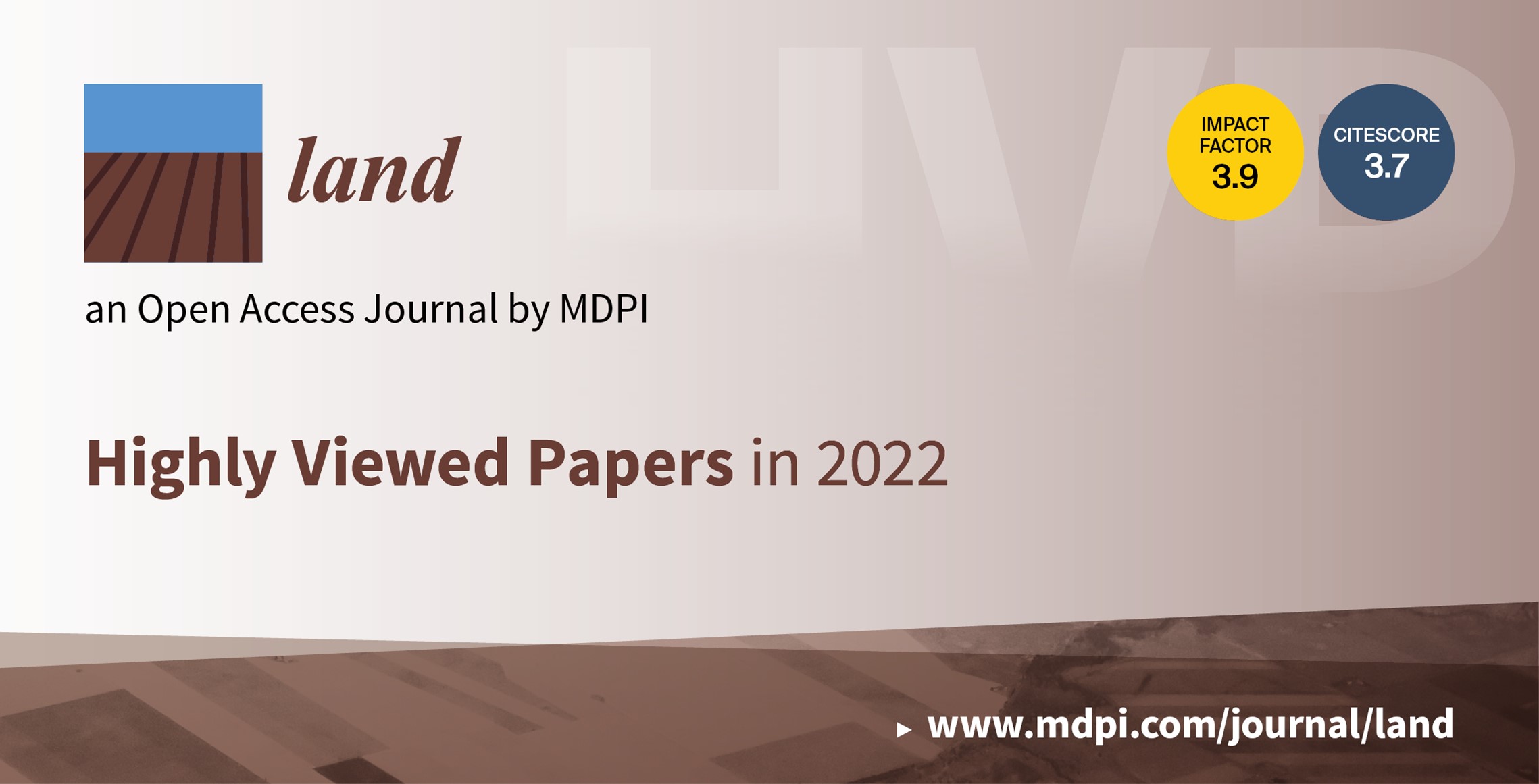
Land (ISSN: 2073-445X) is an international and cross-disciplinary, peer-reviewed, open access journal of land system science, landscape, soil–sediment–water systems, urban study, land–climate interactions, water–energy–land–food (WELF) nexus, biodiversity research and health nexus, land modeling and data processing, ecosystem services, multifunctionality and sustainability, etc., published monthly online by MDPI. The International Association for Landscape Ecology (IALE), European Land-use Institute (ELI), Landscape Institute (LI), and Urban Land Institute (ULI) are affiliated with Land, and their members receive a discount on the Article Processing Charge.
We welcome you to read our highly viewed papers in 2022, listed below:
- “Landscapes of Mobility and Movement in North-West Arabia: A Remote Sensing Study of the Neom Impact Zone”
by Michael Fradley and Sarah Gyngell
Land 2022, 11(11), 1941; https://doi.org/10.3390/land11111941
Available online: https://www.mdpi.com/2073-445X/11/11/1941
- “Effects of the COVID-19 Pandemic on Farmers and Their Responses: A Study of Three Farming Systems in Kerala, South India”
by Anamika Menon and Dietrich Schmidt-Vogt
Land 2022, 11(1), 144; https://doi.org/10.3390/land11010144
Available online: https://www.mdpi.com/2073-445X/11/1/144
- “Spatiotemporal Change Analysis and Prediction of Future Land Use and Land Cover Changes Using QGIS MOLUSCE Plugin and Remote Sensing Big Data: A Case Study of Linyi, China”
by Rizwan Muhammad, Wenyin Zhang, Zaheer Abbas, Feng Guo and Luc Gwiazdzinski
Land 2022, 11(3), 419; https://doi.org/10.3390/land11030419
Available online: https://www.mdpi.com/2073-445X/11/3/419
- “The Historical Development of Constructed Wetlands for Wastewater Treatment”
by Jan Vymazal
Land 2022, 11(2), 174; https://doi.org/10.3390/land11020174
Available online: https://www.mdpi.com/2073-445X/11/2/174
- “Mapping Agricultural Lands: From Conventional to Regenerative”
by Luke Bergmann, Luis Fernando Chaves, Carolyn R. Betz, Serena Stein, Brian Wiedenfeld, Ann Wolf and Robert G. Wallace
Land 2022, 11(3), 437; https://doi.org/10.3390/land11030437
Available online: https://www.mdpi.com/2073-445X/11/3/437
- “The Socio-Cultural Benefits of Urban Agriculture: A Review of the Literature”
by Rositsa T. Ilieva, Nevin Cohen, Maggie Israel, Kathrin Specht, Runrid Fox-Kämper, Agnès Fargue-Lelièvre, Lidia Poniży, Victoria Schoen, Silvio Caputo, Caitlin K. Kirby et al.
Land 2022, 11(5), 622; https://doi.org/10.3390/land11050622
Available online: https://www.mdpi.com/2073-445X/11/5/622
- “Factors Affecting Wetland Loss: A Review”
by Gastón Antonio Ballut-Dajud, Luis Carlos Sandoval Herazo, Gregorio Fernández-Lambert, José Luis Marín-Muñiz, María Cristina López Méndez and Erick Arturo Betanzo-Torres
Land 2022, 11(3), 434; https://doi.org/10.3390/land11030434
Available online: https://www.mdpi.com/2073-445X/11/3/434
- “Gold Mining in the Amazon Region of Ecuador: History and a Review of Its Socio-Environmental Impacts”
by Carlos Mestanza-Ramón, Jefferson Cuenca-Cumbicus, Giovanni D’Orio, Jeniffer Flores-Toala, Susana Segovia-Cáceres, Amanda Bonilla-Bonilla and Salvatore Straface
Land 2022, 11(2), 221; https://doi.org/10.3390/land11020221
Available online: https://www.mdpi.com/2073-445X/11/2/221
- “Housing Price Prediction Using Machine Learning Algorithms in COVID-19 Times”
by Raul-Tomas Mora-Garcia, Maria-Francisca Cespedes-Lopez and V. Raul Perez-Sanchez
Land 2022, 11(11), 2100; https://doi.org/10.3390/land11112100
Available online: https://www.mdpi.com/2073-445X/11/11/2100
- “Deforestation in Continental Ecuador with a Focus on Protected Areas”
by Janina Kleemann, Camilo Zamora, Alexandra Belen Villacis-Chiluisa, Pablo Cuenca, Hongmi Koo, Jin Kyoung Noh, Christine Fürst and Michael Thiel
Land 2022, 11(2), 268; https://doi.org/10.3390/land11020268
Available online: https://www.mdpi.com/2073-445X/11/2/268
For more articles, please refer to the following link: https://www.mdpi.com/journal/land/most_cited. We welcome you to read and consider submitting articles in Land.
12 July 2023
Land | Top 10 Most Cited Papers in 2022
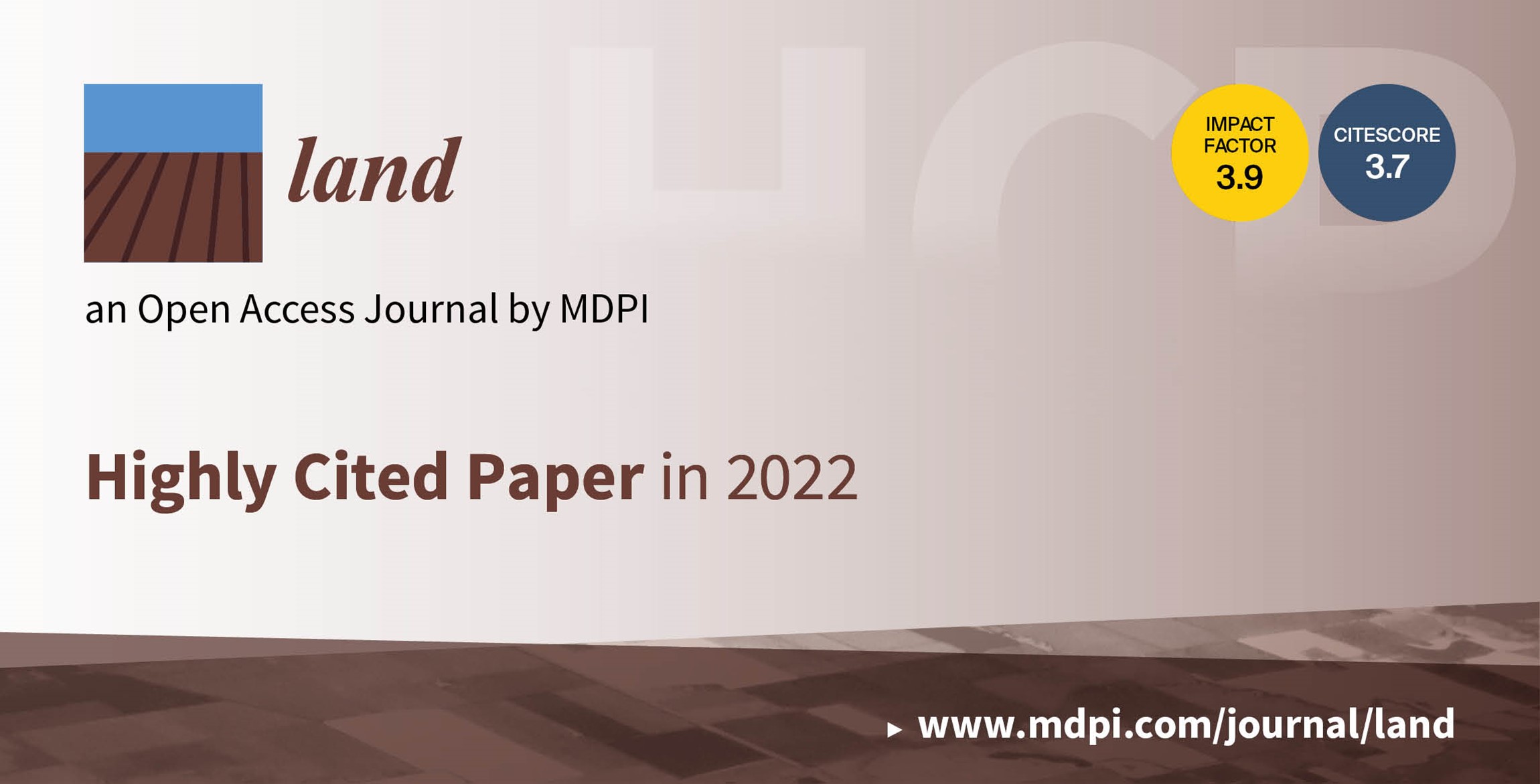
Land (ISSN: 2073-445X) is an international and cross-disciplinary, peer-reviewed, open access journal of land system science, landscape, soil–sediment–water systems, urban study, land–climate interactions, water–energy–land–food (WELF) nexus, biodiversity research and health nexus, land modeling and data processing, ecosystem services, multifunctionality and sustainability, etc., published monthly online by MDPI. The International Association for Landscape Ecology (IALE), European Land-use Institute (ELI), Landscape Institute (LI), and Urban Land Institute (ULI) are affiliated with Land, and their members receive a discount on the Article Processing Charge.
We invite you to read our most cited papers published in 2022 below:
1. “Impact of Power on Uneven Development: Evaluating Built-Up Area Changes in Chengdu Based on NPP-VIIRS Images (2015–2019)”
by Long Liu, Zhichao Li, Xinyi Fu, Xuan Liu, Zehao Li and Wenfeng Zheng
Land 2022, 11(4), 489; https://doi.org/10.3390/land11040489
Full text available online: https://www.mdpi.com/2073-445X/11/4/489
2. “Forecasting Urban Land Use Change Based on Cellular Automata and the PLUS Model”
by Linfeng Xu, Xuan Liu, De Tong, Zhixin Liu, Lirong Yin and Wenfeng Zheng
Land 2022, 11(5), 652; https://doi.org/10.3390/land11050652
Full text available online: https://www.mdpi.com/2073-445X/11/5/652
3. “Spatiotemporal Variation in Land Use Land Cover in the Response to Local Climate Change Using Multispectral Remote Sensing Data”
by Sajjad Hussain, Linlin Lu, Muhammad Mubeen, Wajid Nasim, Shankar Karuppannan, Shah Fahad, Aqil Tariq, B. G. Mousa, Faisal Mumtaz and Muhammad Aslam
Land 2022, 11(5), 595; https://doi.org/10.3390/land11050595
Full text available online: https://www.mdpi.com/2073-445X/11/5/595
4. “How Land Finance Drives Urban Expansion under Fiscal Pressure: Evidence from Chinese Cities”
by De Tong, Jun Chu, Qing Han and Xuan Liu
Land 2022, 11(2), 253; https://doi.org/10.3390/land11020253
Full text available online: https://www.mdpi.com/2073-445X/11/2/253
5. “Managing Land Carrying Capacity: Key to Achieving Sustainable Production Systems for Food Security”
by Xiukang Wang
Land 2022, 11(4), 484; https://doi.org/10.3390/land11040484
Full text available online: https://www.mdpi.com/2073-445X/11/4/484
6. “Spatial Responses of Ecosystem Service Value during the Development of Urban Agglomerations”
by Huisheng Yu, Jun Yang, Dongqi Sun, Tong Li and Yanjun Liu
Land 2022, 11(2), 165; https://doi.org/10.3390/land11020165
Full text available online: https://www.mdpi.com/2073-445X/11/2/165
7. “Exploring the Role of Agricultural Services in Production Efficiency in Chinese Agriculture: A Case of the Socialized Agricultural Service System”
by Tao Chen, Muhammad Rizwan and Azhar Abbas
Land 2022, 11(3), 347; https://doi.org/10.3390/land11030347
Full text available online: https://www.mdpi.com/2073-445X/11/3/347
8. “Combining MSPA-MCR Model to Evaluate the Ecological Network in Wuhan, China”
by Chunguang Hu, Ziyi Wang, Yu Wang, Dongqi Sun and Jingxiang Zhang
Land 2022, 11(2), 213; https://doi.org/10.3390/land11020213
Full text available online: https://www.mdpi.com/2073-445X/11/2/213
9. “Application of the Optimal Parameter Geographic Detector Model in the Identification of Influencing Factors of Ecological Quality in Guangzhou, China”
by Maomao Zhang, Abdulla-Al Kafy, Bing Ren, Yanwei Zhang, Shukui Tan and Jianxing Li
Land 2022, 11(8), 1303; https://doi.org/10.3390/land11081303
Full text available online: https://www.mdpi.com/2073-445X/11/8/1303
10. “Insect Outbreak and Long-Term Post-Fire Effects on Soil Erosion in Mediterranean Suburban Forest”
by Aristeidis Kastridis, Dimitrios Stathis, Marios Sapountzis and Georgios Theodosiou
Land 2022, 11(6), 911; https://doi.org/10.3390/land11060911
Full text available online: https://www.mdpi.com/2073-445X/11/6/911
For more articles, please refer to the following link: https://www.mdpi.com/journal/land/most_cited. We welcome you to read and consider submitting articles in Land.
11 July 2023
MDPI’s Newly Launched Journals in June 2023
With the first issue released in June 2023, five new MDPI journals disseminating multi-disciplinary science are due to launch, which will cover the subjects of medicine & pharmacology, biology and physical sciences.
The newly launched journals will be overseen by professional Editorial Board Members and Editors to ensure an accurate and rapid publication, rigorous peer review and broad visibility.
Please feel free to browse and discover more about the new journals below.
| Journal | Founding Editor-in-Chief | Journal topics (selected) |
| Prof. Dr. Jun Ma, Peking University, China| Editorial | view inaugural issue | growth and development; diet and nutrients; school health promotion policies and practices; child health and care; adolescent health and wellbeing | view journal scope | submit an article |
|
| Prof. Dr. Bernd Rehm, Griffith University, Australia | Editorial | view inaugural issue | DNA and gene synthesis; synthetic transcription factors; protein engineering; viral engineering; metabolic engineering | view journal scope | submit an article | |
| Prof. Dr. Varsha Gandhi, University of Texas MD Anderson Cancer Center, USA | Editorial | view inaugural issue | lymphatics; cancers associated with lymphocytes and lymphoblasts; lymphatic tissues; lymphoma; lymphoid leukemia | view journal scope | submit an article | |
| Dr. Bradley Turner, University of Melbourne, Australia | Editorial | view inaugural issue | multiple sclerosis; amyotrophic lateral sclerosis; primary lateral sclerosis; atherosclerosis; systemic sclerosis | view journal scope | submit an article | |
 |
Prof. Dr. Clemens Burda, Case Western Reserve University, USA | Editorial | view inaugural issue | Gamma ray, X-ray, and UV–Vis spectroscopies; NIR/mid-infrared/Raman spectroscopy; microwave and THz spectroscopy; high-resolution gas-phase atomic, molecular, and cluster spectroscopy; MS, NMR, and EPR spectroscopy | view journal scope | submit an article |
We wish to thank everyone who has supported the development of open access publishing. You are welcome to submit an application to the New Journal Committee (newjournal-committee@mdpi.com) if you would like to create more new journals.
4 July 2023
Land Receives an Updated Impact Factor of 3.9 and an Improved Category Ranking
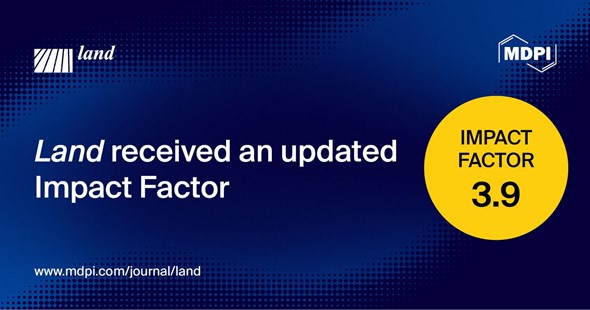
We are pleased to inform you that Land’s 2022 Impact Factor is 3.9. Land (ISSN: 2073-445X) now ranks in Q2 (48 among 127 titles) in the “Environmental Studies (SSCI)” category. Our journal continues to build momentum in land system science.
For more journal statistics, please visit https://www.mdpi.com/journal/land/stats.
The Land Editorial Office would like to thank all authors, reviewers, and editors who have contributed to the journal.
4 July 2023
Meet Us at the Asia Oceania Geosciences Society 20th Annual Meeting (AOGS 2023), 30 July–4 August 2023, Suntec, Singapore
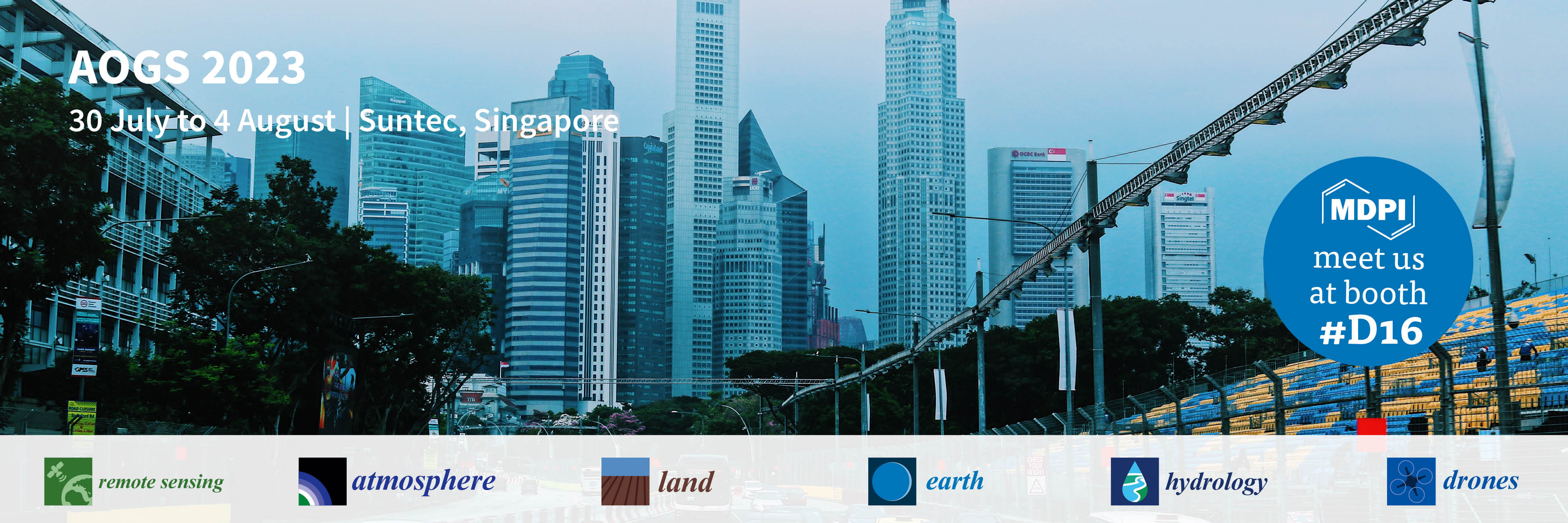
MDPI will attend the Asia Oceania Geosciences Society 20th Annual Meeting (AOGS 2023) as an exhibitor. This meeting will be held in Suntec, Singapore, from 30 July to 4 August 2023.
The Asia Oceania Geosciences Society (AOGS) Annual Meeting aims to promote geosciences and its application for the benefit of humanity, specifically in Asia and Oceania and with an overarching approach to global issues. The AOGS’s field is deeply involved in addressing hazard-related issues through improving our understanding of the genesis of hazards through scientific, social, and technical approaches.
The following MDPI journals will be represented:
If you are attending this conference, please feel free to start a conversation with us at our booth #D16. Our delegates look forward to meeting you in person and answering any questions that you may have.
For more information about the conference, please visit https://www.asiaoceania.org/aogs2023/public.asp?page=home.asp.
3 July 2023
MDPI Insights: The CEO’s Letter #1 - Open Access and Impactful Research

Welcome to the MDPI Insights: The CEO's Letter.
In these monthly letters, I will showcase two key aspects of our work at MDPI: our commitment to empowering researchers and our determination to facilitating open scientific exchange.
Opening Thoughts
The Future is Open, and MDPI is Leading the Way
I strongly believe in a future that embraces openness, where open source, open information, and open access (OA) take center stage. This belief that led me to join MDPI in 2020, and I am honored to have recently been appointed as Chief Executive Officer (CEO). In this capacity, and operating in close liaison with Dr. Lin and MDPI’s senior management, I shall work to build on Dr. Lin’s achievements of the past quarter-century. In this role, I will focus on communication initiatives to promote MDPI's remarkable work and continue to build our company as a trusted leader in OA publishing. For over two decades, MDPI has been at the forefront of reshaping the academic publishing landscape, with OA surpassing subscription-based publishing in 2020. This trajectory is deeply rooted in our history and reflects our unwavering commitment and vision for an open future.
1 Million Published Articles
2023 began with a remarkable achievement for MDPI, as we became the first OA publisher to reach the milestone of 1 million published articles. This represents 2.7 million unique authors who have trusted us with their work, or about a third of all researchers worldwide. As the world's most cited OA publisher, we are proud in sharing these significant milestones.
Our mission remains unchanged: to make science open and accessible to all. We understand the importance of knowledge access, empowering researchers to stay at the forefront of a rapidly changing world. Our diverse range of journals covers a wide spectrum of disciplines, offering cutting-edge insights, trusted tools, and crucial knowledge to address global challenges.
Liberating Science
As the world’s leading OA publisher, MDPI is actively liberating science. We are committed to eliminating the frustrations researchers and the general public face when accessing information, ensuring it is not locked behind paywalls. We firmly believe that everyone has a right to information, and our commitment to open access publishing drives our work.
In this inaugural edition of Insights: The CEO's Letter, I draw inspiration from the upcoming 20th anniversary of the Berlin Declaration on Open Access. Its stated mission reminds us that true impact is achieved when knowledge is widely and readily available to society:
"Our mission of disseminating knowledge is only half complete if the information is not made widely and readily available to society”
Impactful Research

MDPI Publishes Impactful Research: Recognized by Leading Indexing Databases
MDPI journals are indexed in every single top database in the world.
As of June 2023, we have 214 journals indexed within Web of Science, 223 indexed within Scopus, 87 indexed within PubMed and PMC, and 17 indexed within MEDLINE, and these numbers increase every month. We constantly strive to expand the coverage of our journals within leading multi-disciplinary and scope-specific databases, resulting in an incredibly broad range of journals that are indexed within a variety of databases. MDPI has active relationships with approximately 65 well-known databases around the world, and we continue to expand our portfolio every year so that your work can be found, cited, and referenced with ease.
Continued Growth of MDPI Journals
The 2022 Scopus and Web of Science journal citation metrics were officially released in June, and I am pleased to report that 31 MDPI journals received their first CiteScore, taking the total number of journals with a CiteScore to 216. The number of MDPI journals receiving an Impact Factor (IF) also continues to grow with 111 receiving their first, by being covered in the ESCI, bringing our total number of journals with an IF to 208 of which 41 journals received an IF above 4.0. Looking at 2022 CiteScores in the Scopus database, 80% of MDPI journals have a score that ranks them in Q1 or Q2 in at least one subject category.
Publishing impactful science would not be possible without all of our authors, editors and reviewers. Thank you for your contribution and continued support! Together we share the latest scientific insights faster and ensure that your work is accessible to all.
Read more
Inside MDPI

Preprints.org: Clarivate adds the Preprint Citation Index to the Web of Science
At MDPI, we are dedicated to driving the advancement of science. Through our initiative, Preprints.org, researchers can publish their work and gain valuable feedback from the broader research community, ensuring rapid progress in their respective fields. This is particularly crucial during times of health and climate challenges, where timely dissemination of findings is essential.
Increased Visibility for Preprints
I am pleased to share that Clarivate recognizes the significance of preprints and has taken a crucial step to enhance their visibility. Clarivate has added the Preprint Citation Index to the Web of Science, encompassing preprints published not only on Preprints.org but also on other reputable repositories.
Looking ahead, the future of preprints appears promising, bolstered by the recent indexing announcement from the Web of Science. As a result, preprints will receive increased visibility, serving as a valuable resource for staying informed about the latest research developments.
Read more
What are Preprints?
The Pros and Cons of Preprints
Preprints and COVID-19
Preprints—The Future of Open Access Publishing?
Coming Together for Science

The First International Conference on Antioxidants: Sources, Methods, Health Benefits and Industrial Applications
In this edition of ‘Coming Together for Science,’ I am pleased to highlight the First International Conference on Antioxidants organized by our conference team in the beautiful city of Barcelona, Spain. The conference attracted over 130 attendees, who engaged in 42 talks, and 89 poster presentations spread across several sessions.
Working Together
Under the leadership of Prof. Dr. Alessandra Napolitano (Department of Chemical Sciences, University of Naples ‘Federico II’, Naples, Italy) and Prof. Dr. Rosa M. Lamuela Raventos (Department of Nutrition, Food Sciences and Gastronomy, University of Barcelona, Spain) as chairs, and supported by the committee members, 10 invited keynote speakers, poster presenters, and all the attendees, this dedicated group of academics came together to discuss the natural sources, methodologies, health benefits, and industrial applications of antioxidants.
Especially noteworthy is the positive feedback received from attendees, with 94% rating the overall organization of the conference as good or excellent. I particularly love the picture above, capturing the gathering of some of the participants. You can browse through more photos in the event gallery located here.
Managing Events With Sciforum
If you are considering hosting your own academic event, I highly recommend checking out Sciforum, MDPI's event management platform. Sciforum simplifies the entire process, making it easy to host your own event by allowing you to focus on what really matters: Science!
Read more
Closing Thoughts
 Stefan Tochev, Dr. Shu-Kun Lin, Dr. Eric O. Freed, Peter Roth, Wynne Wang, Allison Yang
Stefan Tochev, Dr. Shu-Kun Lin, Dr. Eric O. Freed, Peter Roth, Wynne Wang, Allison Yang
Viruses and Editorial Quality: Acknowledging the Dedication of our Viruses Journal Team
During a June meeting with Dr. Eric O. Freed, the founding and current Editor-in-Chief of our journal Viruses, I was reminded of the exceptional dedication of our editorial board. Meeting with Eric is a pleasure, as he has a strong commitment and clear vision for the journal. Over the course of two days, we gained a deep understanding of the journal’s expectations and focus on strategic growth, editorial board representation, and engagement.
I am pleased to share that Viruses holds a CiteScore of 7.1 (an increase of 7.57% versus the 2021 metric) and an Impact Factor of 4.7. You can view the journal statistics here. Viruses publishes highly cited papers, and is indexed in renowned databases such as Scopus, SCIE (Web of Science), PubMed, and others, and maintains affiliations with prestigious societies. Moreover, the Viruses team has recently announced an exciting upcoming event titled ‘Viruses 2024 – A World of Viruses,’ scheduled to take place in Barcelona, Spain, from 14–16 February 2024.
Testimonials
If you notice my enthusiasm regarding our editorial service, it’s because the surveys and testimonials we receive speak volumes about the experiences of our authors, reviewers, and guest editors who collaborate with MDPI. The purpose of these letters is to highlight the exceptional work that we do and the experiences we create for the scholars – thus, let me end with this testimonial from an author:
“It was a great pleasure to publish in Viruses Special Issue [Emerging Viruses in Aquaculture]. The submission process was easy. Guest editors were very helpful and provided all the guidance and support as needed. The handling of the manuscript by the Editorial Team was very fast, efficient, and professional. The reviewer’s comments were insightful, and the publication processes were remarkably rapid.”
– Ms. Magdalena Stachnik, Państwowy Instytut Weterynaryjny | PIWet
Article in Viruses: Emerging Viral Pathogens in Sturgeon Aquaculture in Poland: Focus on Herpesviruses and Mimivirus Detection
Chief Executive Officer
MDPI AG
29 June 2023
Interview with Prof. Dr. Adrienne Grêt-Regamey—Winner of the Land 2022 Influential Female Research in Land System Science Award
Female scholars have contributed enormously to shaping the advances in the field of land science, and they are continuing to develop this emerging discipline. We created this award in order to encourage female scholars to continue to advance this field and to recognize those female scholars who have made noteworthy contributions to it, as we acknowledge that scientific progress is a collaborative and inclusive effort that necessitates gender equality and equity in access to publishing across the Global North and South.
We consider it a great honour to hold this conversation about women in the field of land science with Prof. Dr. Adrienne Grêt-Regamey, who is one of the winners of the Land 2022 Influential Female Research in Land System Science award.
28 June 2023
2022 Impact Factors for MDPI Journals
The 2022 citation metrics have been released in the Journal Citation Reports (JCR), and we’re pleased to announce the following results for MDPI journals:

We are thrilled to announce that 90% of our ranked MDPI journals, specifically 86 out of 96 (captured in the table below), are performing above average in Q1 or Q2. This year, Clarivate has expanded its Impact Factor (IF) awards to include journals in the Emerging Sources Citation Index (ESCI) and the Arts and Humanities Citation Index (AHCI), providing greater transparency for the full set of journals indexed in the Web of Science Core Collection. As a result, 111 of MDPI journals have received their first IF in 2023, with 37 journals surpassing an IF of 3.0. In total, 208 MDPI journals have been honored with an IF.
Clarivate explains that by "expanding the coverage but holding to highly selective standards, the [Impact Factor] is now a reliable indicator of trustworthiness, as well as a measure of scholarly impact, at the journal level."
Please visit our blog post where we discuss the release of the latest citation metrics with our Indexing Manager, Dr. Constanze Schelhorn, to find out what's different this time around and how to make use of different metrics available.
| Journal | Impact Factor | Rank Quartile | Category |
| Vaccines | 7.8 | Q1 | Immunology |
| Medicine, Research & Experimental | |||
| Antioxidants | 7.0 | Q1 | Food Science & Technology |
| Biochemistry & Molecular Biology | |||
| Chemistry, Medicinal | |||
| Cells | 6.0 | Q2 | Cell Biology |
| Nutrients | 5.9 | Q1 | Nutrition & Dietetics |
| International Journal of Molecular Sciences | 5.6 | Q1 | Biochemistry & Molecular Biology |
| Q2 | Chemistry, Multidisciplinary | ||
| Journal of Theoretical and Applied Electronic Commerce Research | 5.6 | Q2 | Business |
| Biomolecules | 5.5 | Q1 | Biochemistry & Molecular Biology |
| Biosensors | 5.4 | Q1 | Chemistry, Analytical |
| Instruments & Instrumentation | |||
| Q2 | Nanoscience & Nanotechnology | ||
| Fractal and Fractional | 5.4 | Q1 | Mathematics, Interdisciplinary Applications |
| Marine Drugs | 5.4 | Q1 | Chemistry, Medicinal |
| Pharmacology & Pharmacy | |||
| Pharmaceutics | 5.4 | Q1 | Pharmacology & Pharmacy |
| Nanomaterials | 5.3 | Q1 | Physics, Applied |
| Q2 | Chemistry, Multidisciplinary | ||
| Materials Science, Multidisciplinary | |||
| Nanoscience & Nanotechnology | |||
| Cancers | 5.2 | Q2 | Oncology |
| Foods | 5.2 | Q1 | Food Science & Technology |
| Polymers | 5.0 | Q1 | Polymer Science |
| Remote Sensing | 5.0 | Q1 | Geosciences, Multidisciplinary |
| Q2 | Remote Sensing | ||
| Imaging Science & Photographic Technology | |||
| Environmental Sciences | |||
| Antibiotics | 4.8 | Q1 | Pharmacology & Pharmacy |
| Q2 | Infectious Diseases | ||
| Drones | 4.8 | Q2 | Remote Sensing |
| Journal of Functional Biomaterials | 4.8 | Q2 | Engineering, Biomedical |
| Materials Science, Biomaterials | |||
| Biomedicines | 4.7 | Q1 | Pharmacology & Pharmacy |
| Q2 | Biochemistry & Molecular Biology | ||
| Medicine, Research & Experimental | |||
| Journal of Fungi | 4.7 | Q2 | Mycology |
| Microbiology | |||
| Viruses | 4.7 | Q2 | Virology |
| Bioengineering | 4.6 | Q2 | Engineering, Biomedical |
| Gels | 4.6 | Q1 | Polymer Science |
| Molecules | 4.6 | Q2 | Chemistry, Multidisciplinary |
| Biochemistry & Molecular Biology | |||
| Pharmaceuticals | 4.6 | Q2 | Pharmacology & Pharmacy |
| Chemistry, Medicinal | |||
| Toxics | 4.6 | Q1 | Toxicology |
| Q2 | Environmental Sciences | ||
| Biomimetics | 4.5 | Q1 | Engineering, Multidisciplinary |
| Q2 | Materials Science, Biomaterials | ||
| Microorganisms | 4.5 | Q2 | Microbiology |
| Plants | 4.5 | Q1 | Plant Sciences |
| Biology | 4.2 | Q2 | Biology |
| Chemosensors | 4.2 | Q2 | Instruments & Instrumentation |
| Chemistry, Analytical | |||
| Electrochemistry | |||
| Membranes | 4.2 | Q2 | Engineering, Chemical |
| Materials Science, Multidisciplinary | |||
| Chemistry, Physical | |||
| Polymer Science | |||
| Toxins | 4.2 | Q1 | Toxicology |
| Q2 | Food Science & Technology | ||
| Metabolites | 4.2 | Q2 | Biochemistry & Molecular Biology |
| Batteries | 4.0 | Q2 | Electrochemistry |
| Materials Science, Multidisciplinary | |||
| Q3 | Energy & Fuels | ||
| Catalysts | 3.9 | Q2 | Chemistry, Physical |
| Journal of Clinical Medicine | 3.9 | Q2 | Medicine, General & Internal |
| Land | 3.9 | Q2 | Environmental Studies |
| Sensors | 3.9 | Q2 | Instruments & Instrumentation |
| Chemistry, Analytical | |||
| Engineering, Electrical & Electronic | |||
| Sustainability | 3.9 | Q2 | Environmental Sciences (SCIE) |
| Environmental Studies (SSCI) | |||
| Q3 | Green & Sustainable Science & Technology (SCIE) | ||
| Green & Sustainable Science & Technology (SSCI) | |||
| Buildings | 3.8 | Q2 | Construction & Building Technology |
| Engineering, Civil | |||
| Agronomy | 3.7 | Q1 | Agronomy |
| Q2 | Plant Sciences | ||
| Fermentation | 3.7 | Q2 | Biotechnology & Applied Microbiology |
| Pathogens | 3.7 | Q2 | Microbiology |
| Agriculture | 3.6 | Q1 | Agronomy |
| Diagnostics | 3.6 | Q2 | Medicine, General & Internal |
| Genes | 3.5 | Q2 | Genetics & Heredity |
| Journal of Intelligence | 3.5 | Q2 | Psychology, Multidisciplinary |
| Lubricants | 3.5 | Q2 | Engineering, Mechanical |
| Processes | 3.5 | Q2 | Engineering, Chemical |
| Coatings | 3.4 | Q2 | Materials Science, Coatings & Films |
| Physics, Applied | |||
| Q3 | Materials Science, Multidisciplinary | ||
| ISPRS International Journal of Geo-Information | 3.4 | Q2 | Geography, Physical |
| Q3 | Computer Science, Information Systems | ||
| Remote Sensing | |||
| Materials | 3.4 | Q2 | Metallurgy & Metallurgical Engineering |
| Physics, Applied | |||
| Physics, Condensed Matter | |||
| Q3 | Materials Science, Multidisciplinary | ||
| Chemistry, Physical | |||
| Micromachines | 3.4 | Q2 | Instruments & Instrumentation |
| Physics, Applied | |||
| Chemistry, Analytical | |||
| Q3 | Nanoscience & Nanotechnology | ||
| Water | 3.4 | Q2 | Water Resources |
| Environmental Sciences | |||
| Brain Sciences | 3.3 | Q3 | Neurosciences |
| Energies | 3.2 | Q3 | Energy & Fuels |
| Fire | 3.2 | Q1 | Forestry |
| Q2 | Ecology | ||
| Life | 3.2 | Q2 | Biology |
| Current Issues in Molecular Biology | 3.1 | Q3 | Biochemistry & Molecular Biology |
| Horticulturae | 3.1 | Q1 | Horticulture |
| Animals | 3.0 | Q1 | Agriculture, Dairy & Animal Science |
| Veterinary Sciences | |||
| Insects | 3.0 | Q1 | Entomology |
| Atmosphere | 2.9 | Q3 | Meteorology & Atmospheric Sciences |
| Environmental Sciences | |||
| Electronics | 2.9 | Q2 | Engineering, Electrical & Electronic |
| Physics, Applied | |||
| Q3 | Computer Science, Information Systems | ||
| Forests | 2.9 | Q1 | Forestry |
| Inorganics | 2.9 | Q2 | Chemistry, Inorganic & Nuclear |
| Journal of Marine Science and Engineering | 2.9 | Q1 | Engineering, Marine |
| Q2 | Oceanography | ||
| Engineering, Ocean | |||
| Metals | 2.9 | Q2 | Metallurgy & Metallurgical Engineering |
| Q3 | Materials Science, Multidisciplinary | ||
| Tropical Medicine and Infectious Disease | 2.9 | Q2 | Tropical Medicine |
| Parasitology | |||
| Q3 | Infectious Diseases | ||
| Universe | 2.9 | Q2 | Astronomy & Astrophysics |
| Physics, Particles & Fields | |||
| Healthcare | 2.8 | Q2 | Health Policy & Services (SSCI) |
| Q3 | Health Care Sciences & Services (SCIE) | ||
| Applied Sciences | 2.7 | Q2 | Engineering, Multidisciplinary |
| Physics, Applied | |||
| Q3 | Chemistry, Multidisciplinary | ||
| Materials Science, Multidisciplinary | |||
| Crystals | 2.7 | Q2 | Crystallography |
| Q3 | Materials Science, Multidisciplinary | ||
| Entropy | 2.7 | Q2 | Physics, Multidisciplinary |
| Magnetochemistry | 2.7 | Q2 | Chemistry, Inorganic & Nuclear |
| Q3 | Chemistry, Physical | ||
| Materials Science, Multidisciplinary | |||
| Symmetry | 2.7 | Q2 | Multidisciplinary Sciences |
| Actuators | 2.6 | Q2 | Instruments & Instrumentation |
| Engineering, Mechanical | |||
| Aerospace | 2.6 | Q1 | Engineering, Aerospace |
| Behavioral Sciences | 2.6 | Q2 | Psychology, Multidisciplinary |
| Current Oncology | 2.6 | Q3 | Oncology |
| Machines | 2.6 | Q2 | Engineering, Mechanical |
| Q3 | Engineering, Electrical & Electronic | ||
| Medicina | 2.6 | Q3 | Medicine, General & Internal |
| Separations | 2.6 | Q3 | Chemistry, Analytical |
| Minerals | 2.5 | Q2 | Mining & Mineral Processing |
| Mineralogy | |||
| Geochemistry & Geophysics | |||
| Children | 2.4 | Q2 | Pediatrics |
| Diversity | 2.4 | Q2 | Biodiversity Conservation |
| Q3 | Ecology | ||
| Journal of Cardiovascular Development and Disease | 2.4 | Q3 | Cardiac & Cardiovascular Systems |
| Mathematics | 2.4 | Q1 | Mathematics |
| Photonics | 2.4 | Q3 | Optics |
| Veterinary Sciences | 2.4 | Q1 | Veterinary Sciences |
| Fishes | 2.3 | Q2 | Marine & Freshwater Biology |
| Fisheries | |||
| Axioms | 2.0 | Q2 | Mathematics, Applied |
| Systems | 1.9 | Q2 | Social Sciences, Interdisciplinary |
| Tomography | 1.9 | Q3 | Radiology, Nuclear Medicine & Medical Imaging |
Note: The Journal of Personalized Medicine's Impact Factor was omitted in the original release and will be assigned separately. Please find the data on the journal webpage in due course.
Source: 2022 Journal Impact Factors, Journal Citation Reports TM (Clarivate, 2023)
28 June 2023
Recruiting Reviewer Board Members for Land
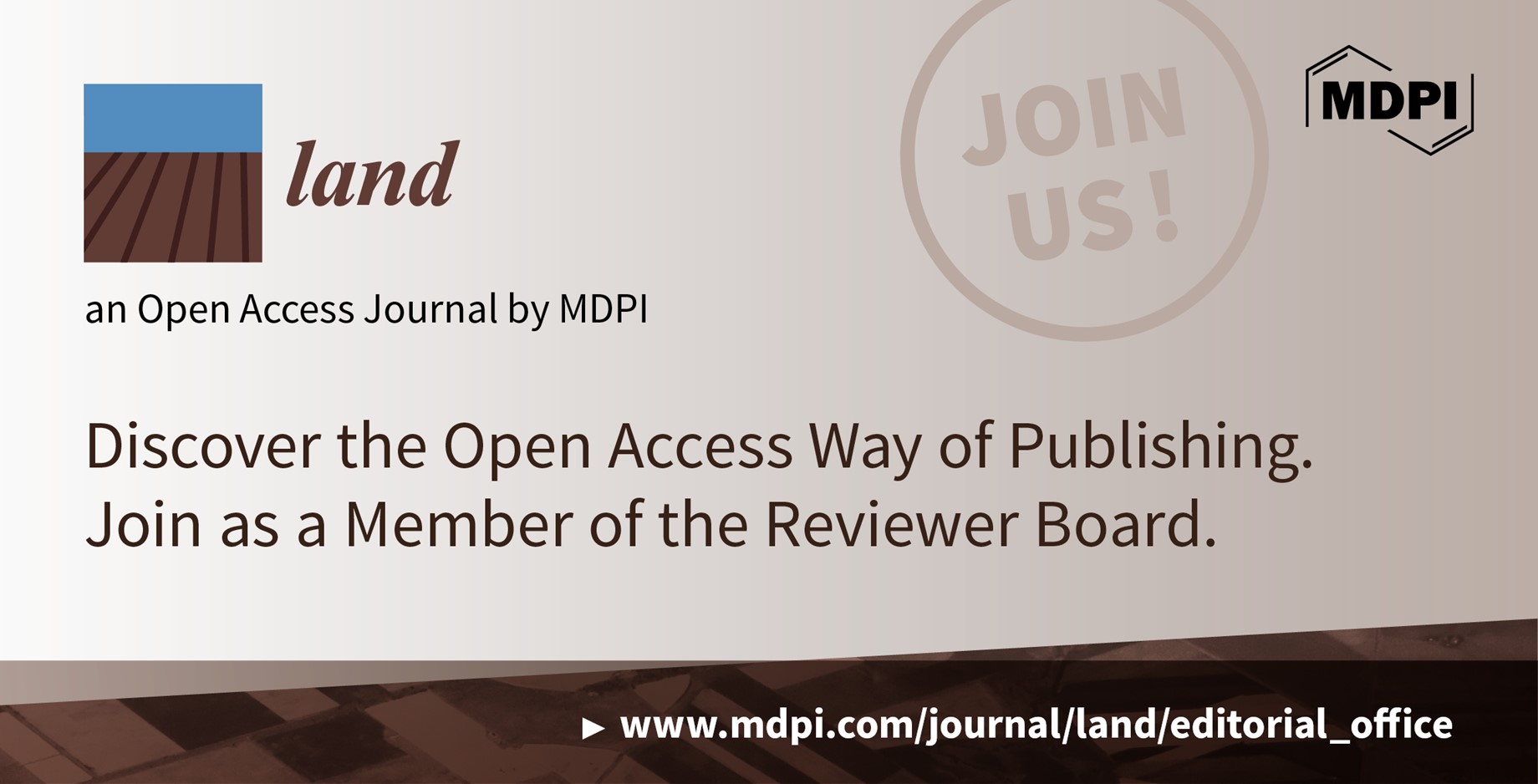
The journal Land (ISSN: 2073-445X) is recruiting Reviewer Board Members. The main responsibility of the new members of the Reviewer Board is to provide timely, high-quality reports on submitted manuscripts. To qualify as a reviewer, applicants must have published approximately eight papers related to land science in the last 5 years and hold a Ph.D. degree. More information on reviewer responsibilities is available at https://www.mdpi.com/reviewers.
The Reviewer Board consists of experienced researchers whose main responsibility is regularly and actively supporting journals by providing high-quality, rigorous, and transparent review reports for submitted manuscripts within their area of expertise. The initial term is 1 year, which can be renewed or terminated. Membership involves the same responsibilities and benefits as regular reviewers, with the addition of the following:
- Reviewer Board Members (RBMs) must review a minimum of six manuscripts per year. Should the reviewer be unable to provide a report when invited, they are expected to suggest potential alternative reviewers (the proposed candidates must meet the reviewers’ requirements (https://www.mdpi.com/reviewers#_bookmark2));
- RBMs have the opportunity to publish one paper per year with a discount of CHF 200 (once accepted for publication after peer review);
- RBMs are entitled to receive an RB certificate;
- RBMs are announced on the journal website;
- Active RBMs may be promoted to the Topical Advisory Panel (subject to approval by the Editor-in-Chief).
If you are interested in this role or have any recommendations, please email us at land@mdpi.com. We hope to hear from you soon.
For more information about Land, please visit the website: https://www.mdpi.com/journal/land.
21 June 2023
Recruiting Editorial Board Members for Land
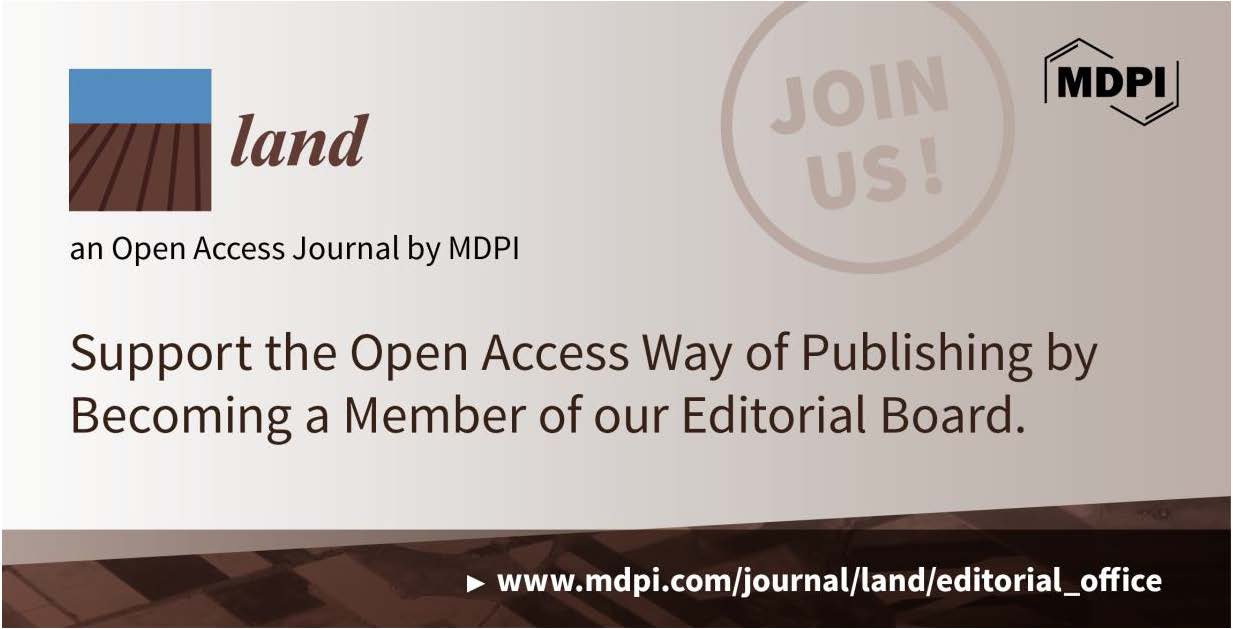
Land (ISSN: 2073-445X) is currently recruiting prestigious scholars from around the world to join our Editorial Board for the following 13 Sections:
- “Land Systems and Global Change”;
- “Landscape Ecology”;
- “Soil–Sediment–Water Systems”;
- “Land Socio-Economic and Political Issues”;
- “Urban Contexts and Urban–Rural Interactions”;
- “Land–Climate Interactions”;
- “Landscape Archaeology”;
- “Land, Biodiversity, and Human Wellbeing”;
- “Land Environmental and Policy Impact Assessment”;
- “Land Innovations—Data and Machine Learning”;
- “Water, Energy, Land and Food (WELF) Nexus”;
- “Land—Observation and Monitoring”;
- “Land Planning and Architecture”.
Land is an international and cross-disciplinary, peer-reviewed, open access journal of land system science, landscape, soil–sediment–water systems, urban study, land–climate interactions, water–energy–land–food (WELF) nexus, biodiversity research and health nexus, land modeling and data processing, ecosystem services, and multifunctionality and sustainability, etc., published monthly online by MDPI. The International Association for Landscape Ecology (IALE), European Land-use Institute (ELI), Landscape Institute (LI) and Urban Land Institute (ULI) are affiliated with Land, and their members receive a discount on the Article Processing Charge.
The main responsibilities of Editorial Board Members are as follows:
- Pre-screening and taking decisions on new submissions related to their research interests;
- Setting up at least one Special Issue during their term on a topic related to their research interests (or supervising Special Issues related to their research field);
- Helping to attract suitable expert authors and inviting young scholars to join the topical advisory panel;
- Providing input or feedback regarding journal policies;
- Helping to promote the journal among their peers or at conferences;
- Attending Board meetings to suggest journal development strategies;
- Reviewing manuscripts.
The benefits of becoming an Editorial Board Member include the following:
- The opportunity to publish one paper, free of charge, per year in Land, as well as receiving certain discounts for papers invited from your scientific network;
- A certificate recognizing you as an Editorial Board Member of Land;
- Land may offer sponsorship for conferences organized by you;
- Land may offer travel grants of CHF 300–500 per year for conferences that you attend or organize.
To apply for this position (in one of our Sections), recommend potential candidates, or request further information, please contact the Land Editorial Office (land@mdpi.com) with the following two files attached:
- A full academic CV;
- A short cover letter that details your interest and enthusiasm for the position.
We look forward to hearing from you.
Land Editorial Office
13 June 2023
Land Receives an Increased CiteScore of 3.7
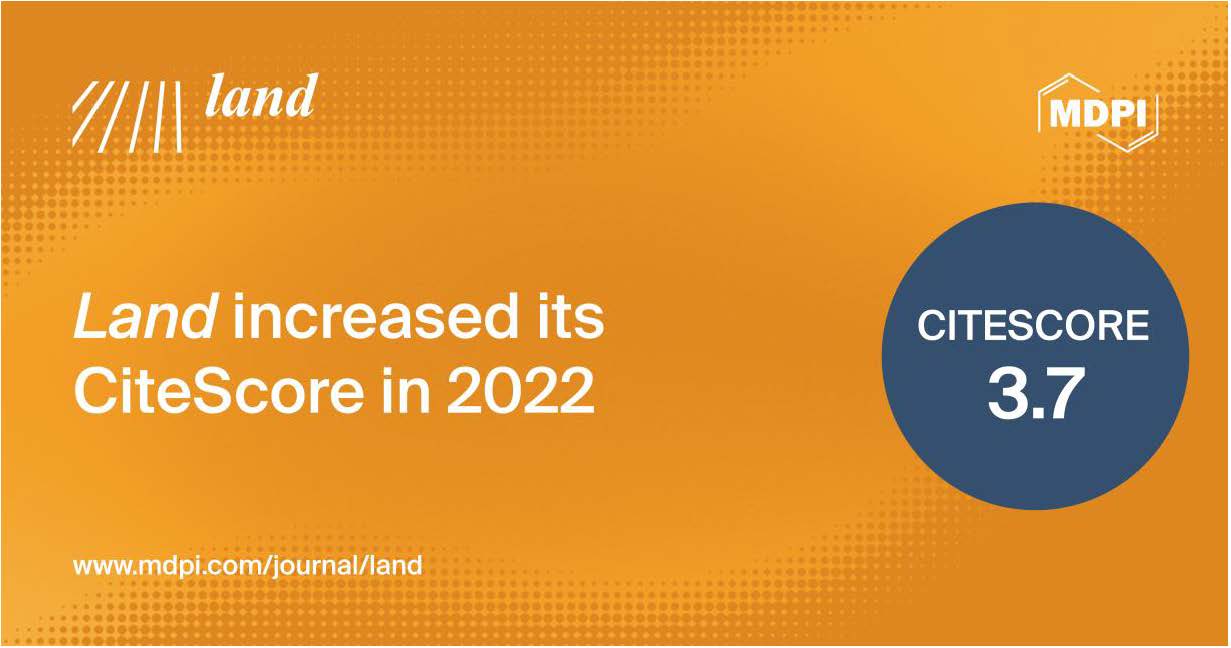
We are pleased to inform you that Land (ISSN: 2073-445X) has received an updated CiteScore of 3.7, an increase of 15.6% compared with the 2021 metric. The 2022 CiteScore™ was released recently, making an assessment of the scientific influence of journals in the 2019 to 2022 period.
For more journal statistics, please visit https://www.mdpi.com/journal/land/stats.
Excellent performance is inseparable from the support and dedication of all journal editors, reviewers, authors, and readers. We would like to take this opportunity to thank all of you who have contributed to the journal.
8 June 2023
Topics Webinar | EO&GEO Series: UAV Remote Sensing for LULC, Landscape, Citizen Sciences, 13 July 2023
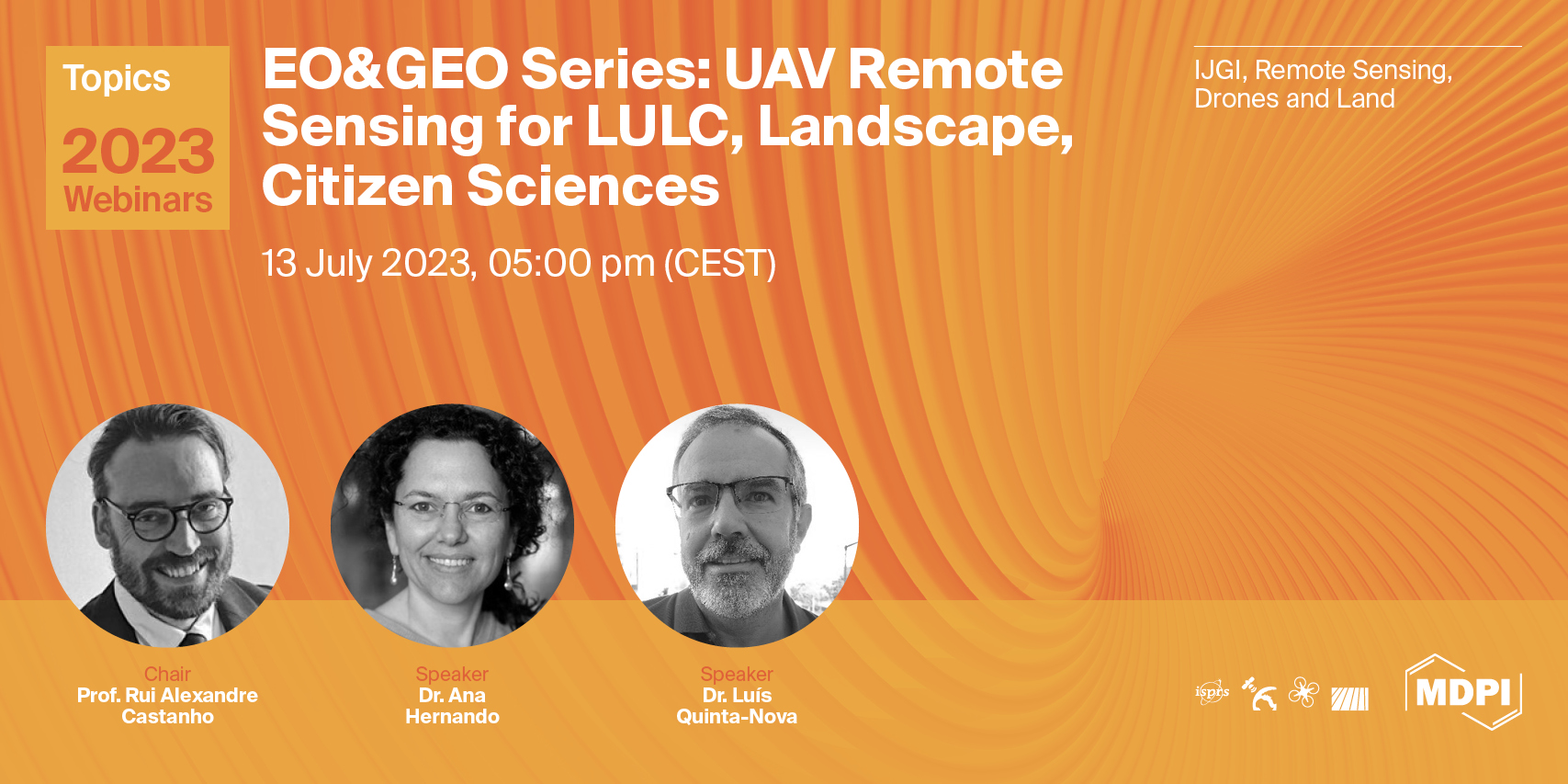
A message from Prof. Rui Alexandre Castanho, the webinar chair:
Throughout the webinar, we will have the opportunity to hear from leading experts in their fields, engage in productive discussions, and participate in hands-on workshops and activities. We aim to foster new partnerships through collaboration and innovation, providing a platform where a range of ideas can be shared.
Unmanned aerial vehicles (UAVs) have revolutionized remote sensing for land use and land cover (LULC) mapping and landscape analysis. The ability to capture high-resolution aerial imagery and create 3D landscape models has allowed for more accurate and detailed mapping of LULC patterns, changes, and trends over time.
Furthermore, using UAVs for citizen science initiatives has enabled communities to participate in monitoring and managing their local environments. This approach allows for a more collaborative and inclusive approach to environmental management and can help to build community awareness and engagement in environmental issues.
UAVs have also been used for mapping vegetation, soil erosion, and water quality monitoring. These applications have provided researchers and managers with new tools to better understand and manage natural resources. UAVs can collect data quickly and at a high resolution, allowing for more detailed analysis of small-scale features such as vegetation canopy cover, plant height, and soil erosion patterns.
Using UAVs for remote sensing and citizen science initiatives has opened up new opportunities for more efficient and effective environmental monitoring and management. As technology continues to improve, we can expect to see even more innovative applications of UAVs in environmental research and management.
At this webinar, we hope you will gain new insights, make valuable connections, and leave feeling inspired and motivated to drive positive change in your respective fields.
Date: 13 July 2023 at 5:00 p.m. CEST | 11:00 a.m. EDT | 11:00 p.m. CST Asia
Webinar ID: 870 9667 3555
Register now for free!
|
Speaker/Presentation |
Time in CEST |
Time in EDT |
|
Prof. Rui Alexandre Castanho |
5:00–5:10 p.m. |
11:00–11:10 a.m. |
|
Dr. Ana Hernando |
5:10–5:50 p.m. |
11:10–11:50 a.m. |
|
Dr. Luís Quinta-Nova |
5:50–6:30 p.m. |
11:50 a.m.–12:30 p.m. |
|
Q&A Session |
6:30–6:55 p.m. |
12:30–12:55 p.m. |
|
Prof. Rui Alexandre Castanho |
6:55–7:00 p.m. |
12:55–01:00 p.m. |
After registering, you will receive a confirmation email containing information on how to join the webinar. Registrations with academic institutional email addresses will be prioritized.
Unable to attend? Register as normal to be notified when the recording is available to watch.
Webinar Chair and Keynote Speakers
- Rui Alexandre Castanho, Department of Management, WSB University, Dabrowa Górnicza, Poland;
- Ana Hernando, Departamento de Ingeniería y Gestión Forestal y Ambiental Department of Forestry and Environmental Engineering and Management, Universidad Politécnica de Madrid, Spain;
- Luís Quinta-Nova, Agrarian Higher School, Polytechnic Institute of Castelo Branco, Castelo Branco, Portugal.
Relevant Topic:
“Advances in Earth Observation and Geosciences”
Edited by: Prof. Dr. Diego González-Aguilera and Dr. Pablo Rodríguez-Gonzálvez
Abstract submission deadline: 31 December 2023
Relevant Special Issues:
"Land-Use Planning in Borderlands and Ultra-Peripheral Regions"
Edited by: Dr. Rui Alexandre Castanho, Dr. José Manuel Naranjo Gómez, Prof. Dr. José Martín Gallardo, Dr. José Cabezas Fernández and Prof. Dr. Luís Quinta-Nova
"Planning Peripheral and Ultra-Peripheral Infrastructures"
Edited by: Prof. Dr. Rui Alexandre Castanho, Prof. Dr. Ana Vulevic, Prof. Dr. Gualter Couto and Prof. Dr. José Manuel Naranjo Gómez
"Sustainability in Tourism Activities and the Low-Density and Peripheral Territories"
Edited by: Prof. Dr. Rui Alexandre Castanho and Prof. Dr. Gualter Couto
"Remote Sensing Applications in Land Use, Land-Use Change and Forestry (LULUCF)"
Edited by: Dr. Ali Nadir Arslan, Prof. Dr. Katarzyna Dabrowska-Zielinska and Dr. Jose Manuel Álvarez-Martínez
"Resilient UAV Autonomy and Remote Sensing"
Edited by: Dr. Chi Chen, Dr. San Jiang, Dr. Xijiang Chen, Dr. Mao Tian, Dr. Jianping Li and Dr. Jian Zhou
"Advances on Land Cover/Land Use Ontologies for Innovative Production/Utilization of Land Information"
Edited by: Dr. Antonio Di Gregorio, Dr. Matieu Henry, Chris T. Hill, Prof. John Latham, Prof. Dr. Mohammed Abed Hossain, Dr. Khalid Mahmood and Dr. Foster Mensah
Relevant feature paper:
“The Land Use Mapping Techniques (Including the Areas Used by Pedestrians) Based on Low-Level Aerial Imagery”
by Maciej Smaczyński, Beata Medyńska-Gulij and Łukasz Halik
ISPRS Int. J. Geo-Inf. 2020, 9(12), 754; https://doi.org/10.3390/ijgi9120754
31 May 2023
Interview with Prof. Dr. Harini Nagendra—Winner of the Land 2022 Influential Female Research in Land System Science Award
We are pleased to announce the winner of the Land 2022 Influential Female Research in Land System Science Award—Prof. Dr. Harini Nagendra.
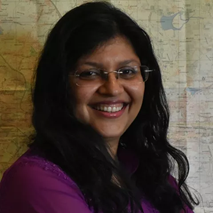
Name: Prof. Dr. Harini Nagendra
Affiliation: Azim Premji University, India
Research interests: urban ecology and sustainability; land change science; remote sensing for ecology and conservation
We acknowledge that scientific progress is a collaborative and inclusive effort that necessitates gender equality and equity in access to publishing across the Global North and South. This award aims to encourage female scholars to continue to advance the field of land science, and we will continue to reward those female scholars who have made noteworthy contributions to it. We wish them every success in their careers.
We hope you enjoy the interview.
1. Can you provide a brief summary of your current research activities?
I'm the director of the Research Centre at the Azim Premji University in Bangalore in India, which is equivalent to a dean or coordinator of research activities at the university. And I also directly lead the Center for Climate Change and Sustainability at the university, which means that we are a larger center looking at issues of climate change and sustainability that are largely affecting India, but also affecting the world.
As part of this, my own research is on cities in environmental change and land change in cities, and how India should adapt to the climate crisis. My teaching also revolves around these areas. I teach and have created courses on GIS, remote sensing, land change science, sustainability and planetary boundaries; of course, land change is one of the very important planetary boundaries that we're dealing with.
I also do a lot of work on biodiversity and the interconnection between land cover change, landscape ecology and biodiversity.
2. What sparked your initial interest in land science and which aspects of research do you find most satisfying?
I started with my undergraduate degree in microbiology, chemistry and zoology, and my master's degree was in biological sciences, but largely molecular biology. I came into land change science relatively late, during my master’s, just prior to my Ph.D. That is because I did not find molecular biology very appealing, but I loved looking at landscapes and the spatial connections that influence ecology, people and sustainability.
I did my Ph.D. at the Center for Ecological Sciences at the Indian Institute of Science, and my focus was on understanding ecological patterns at a large scale in the Western Ghats (India), and for that you need to understand how these landscapes related to each other in terms of spatial pattern and movements between them. So I started using remote sensing satellite image data—that was my introduction to the world of land change science.
What I find most fascinating is understanding the pattern, process and interplay between patterns of land change and the human processes that drive these changes. It's a feedback process. People influence landscapes—and landscapes influence, in turn, the way people think and behave, shaping landscapes again. I find these feedback loops very interesting to understand, especially to compare cases to see how people in different parts of the world interact with landscapes differently. In India you might have a different way of interacting with landscapes; in mountain areas people think differently from the coast, and in cities people think and behave differently with landscapes as compared to people in rural areas. That kind of comparison is something that fascinates me.
3. As a woman working in the field of land science, how do you perceive your role and what were the main challenges you faced?
I didn't realize it when I started working in the field of landscape ecology and land change science in 1993, but I was actually one of the first few people to use digital and computer methods for land change science in India. Later I realized that I was one of the few women globally too who was doing this at that time. In 1993, there weren't too many women in this field. There were many researchers doing this, but they were mostly men.
I didn't come in with that understanding, I just came in as somebody who liked this and started work.
So, I would say I've been fortunate not to have faced too many obstacles for being a woman in the field myself. But a lot of my Ph.D. students, and master’s and undergraduate students have been women who do a great deal of fieldwork. While it depends on the landscape you select, safety is always a preoccupation. When you go into the field and do field research, whether I do it myself or plan for my students, it's something we must be very aware of and plan very carefully.
But I would say that there is also quite a bit of unstated bias that women have to fight, especially the presumption that women can't do well at certain kinds of things, such as computer processing, digital processing, the kinds of mathematical or engineering understanding of the big data challenges.
Then again, I've been very pleased to always work with women, younger women and to mentor them. So I would also say that while I witness how challenging it is for them in multiple ways, I am also deeply satisfied to see how much the field has advanced. Now you find as many women in the field of land change science as men, even in leadership positions. If you look at the cutting-edge research in land change science, a lot of it is being done by women. So, I would say that this aspect really feels satisfying to me, looking back at the last 30 years in the field.
4. What are the current opportunities and challenges facing women in science, and what message would you like to convey to young women pursuing a career in this field?
I think the world is open like never before. It's not equal yet, but we're much closer to an equal footing than we were before. So, my one message would be to embrace the opportunity.
I think what happens is that women are sometimes very sensitive to unspoken societal expectations. If society, or their lab environment, or their home environment is disapproving, not all women, but some women do tend to give in to that pressure and agree to select another field of work, or even quit science altogether.
My message to women would be to just push ahead and persist, because at some point the boundaries will give way. Take the support from as many women mentors as you can find, whether in your direct area or an allied area, and find supportive male mentors and colleagues as well. But do always look for supportive women mentorship. If you don't find it at your place of work, you can find it elsewhere. I've had a lot of women reach out to me from different parts of the world, and with the increasing inter-connectedness of the world, you can now be connected to mentors and find collaborations online, which can also be of great help.
So, I would say push ahead, find your mentors, find your tribe and keep working as a community.
5. What is your aspiration for gender equality in science in the future?
My aspiration would be for a world where the unspoken bias in school environments—where young women are often told to stay away from STEM subjects and move towards social science subjects—changes across the world.
A time when women can be encouraged to take up professional careers in mathematics and science as often as they are in biology and social science, where essentially, they can do what they want to do without feeling that these are subjects suited for women, and those are subjects more suited for men. Unfortunately, you still find areas like engineering, physics and mathematics that are really male-dominated. I would like to see those societal barriers dissolve and break down. That has to be done, like I said, at an earlier level, at the high school and undergraduate levels, which is when many girls and young women drop out of STEM subjects.
6. Can you share your thoughts on the development of open access in the publishing industry?
Speaking as a researcher from the Global South, open access has many benefits, but it also has a lot of potential disadvantages. I'd like to speak of both. The big benefit for us is that open access allows people from the Global South who may not have money to access the publications of journals that you otherwise might not have because they're behind a paywall, and that kind of access to data is really important.
The challenge is the publication costs. Because at most open access journals you pay for publication, and the costs are steep and that sets up another disparity—some people have grants to support these publications, and benefit from them, others lack grants to support this research, especially academics in the Global South. Even if journals offer discounts, the amount to be paid remains very high. I see many young early career researchers who want to publish in an open access journal putting their own money into paying the Article Processing Charges. Sometimes, this could be as much as their salary for a year, because the salary disparities in the Global South are so high. So this is something that I really wonder about, because if you can't afford to publish in the open access journals, where does that leave you as a young scholar? I can also see it from the journals’ point of view, that each journal must sustain its finances. I don't really know what the solution is. But we must find a way to support more scholars from the Global South, especially young scholars, with complete waivers.
Overall, open access is both a blessing and a challenge, especially since it is setting up a different kind of inequity—and we have to find ways to deal with that.
7. What are your long-term research goals?
I want to start a systematic study of cities across the world. The world is going to see a huge growth in cities—people who live in cities are supposed to increase from 50% to about 80% in the next 30 years or so. This means that a lot of the future urban areas of the world are yet to be built. How can we build them more sustainably? And how are they being built now? I’m especially interested in the pattern-process linkage that I was talking about earlier. What are the spatial patterns of these cities that will be built? How will those patterns of urban growth impact water, biodiversity, other kinds of land change parameters, and how can we use this knowledge to design future cities in a better way? That's something that I really want to study in the next few years, looking specifically for insights that can hopefully drive policy.
8. Do you have any recommendations for the Land journal?
I think it is important to have a greater focus on promoting participation from the Global South on an equal footing, encouraging ways in which people can contribute without these payments. It would be especially useful to have a specific program for early career researchers, which could include possibilities for full waivers for their papers. Those kinds of grants would be very helpful for academics at the early stages of their career, especially for Ph.D. students and postdocs, because that's the stage at which they need to really publish and also the stage at which they often face strong financial constraints of different kinds. An expansion of grants and fee waivers for these researchers would be especially important and useful.
In terms of areas to focus on, I think studies of urbanization in the Global South would be something that Land could emphasize, as it remains a knowledge gap.
9 May 2023
Meet Us at the Japan Geoscience Union Meeting 2023 (JpGU 2023), 21–26 May 2023, Chiba, Japan
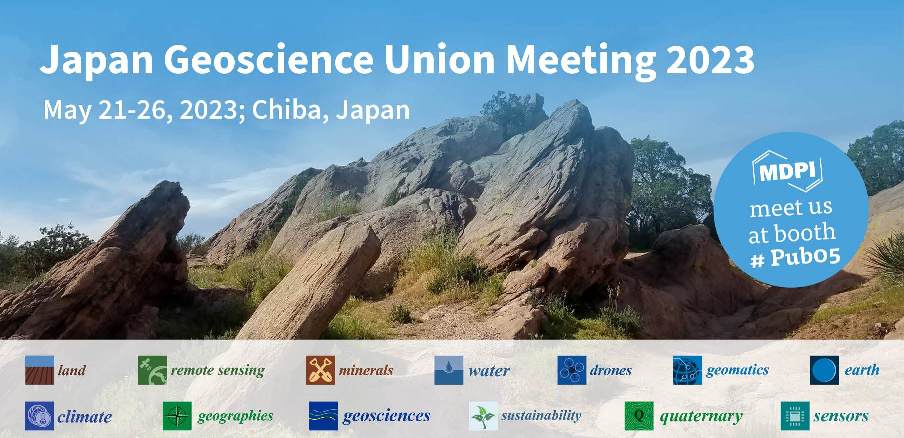
MDPI is attending the Japan Geoscience Union Meeting 2023 (JpGU 2023). The event will be held at the Makuhari Messe in Chiba, Japan, from 21 to 26 May 2023, and it is organized by the Japan Geoscience Union (JpGU). JpGU is an academic union that encompasses all the Earth and planetary science disciplines and related fields; additionally, it has been organizing annual meetings since 2005. JpGU 2023 will cover a wide range of Earth and planetary sciences, including space and planetary sciences, atmospheric and hydrospheric sciences, human geosciences, solid Earth sciences, and biogeosciences. The JpGU annual meeting provides participants with a good opportunity to become familiar with cutting-edge research and unique approaches to research objects within their own special field and beyond. Representatives of the following MDPI journals will be attending:
- Land;
- Remote Sensing;
- Minerals;
- Sustainability;
- Drones;
- Geographies;
- Climate;
- Geomatics;
- Geosciences;
- Water;
- Quaternary;
- Sensors;
- Earth.
If you are also attending this conference, please feel free to stop by our booth (#Pub05). Our delegates look forward to meeting you in person to answer any questions you may have. For more information about the conference, please visit: https://www.jpgu.org/meeting_e2023/.
21 April 2023
Topics Webinar | EO&GEO Series: Remote Sensing for Flood Risk and Hazard Management, Held on 11 May 2023

On 11 May 2023, MDPI and the journals Remote Sensing, Drones, Land and IJGI organized the webinar Remote Sensing for Flood Risk and Hazard Management.
The introduction was held by the Chair of the webinar, Dr. Guy Schumann, who holds academic research positions at the University of Colorado Boulder and the University of Bristol. He is also the Founder of RSS-Hydro, a European R&D company active in the areas of EO and computer modeling of water risks.
The first speaker to kick off this webinar was Dr. Laurence Hawker, who is a Senior Research Associate at the University of Bristol, specializing in global flood models and Digital Elevation Model data. He develops flood simulations and advances global datasets to support our understanding of current and future flood risks. Dr Hawker’s presentation was entitled “Generating a 30m Global Terrain Map and using them in Global Flood Models”.
The second presentation entitled “Satellite Monitoring of River Discharge and Its Use in Hydrological Applications” was held by Dr. Angelica Tarpanelli. Her research activities mainly regard the development and implementation of algorithms for hydrological and hydraulic applications through the leveraging of satellite sensors data. She is currently a Senior Researcher at the National Research Council, Research Institute for Geo-Hydrological Protection of (CNR-IRPI) in Perugia.
Dr. Patrick Matgen from the Luxembourg Institute of Science and Technology (LIST) was the third speaker, and his presentation was entitled “The Sentinel-1 Global Flood Monitoring system of the Copernicus Emergency Management Service”. His personal research interests include the assimilation of remote sensing-derived observations into hydrodynamic models and the assessment of flood hazard and risk at a large scale.
The webinar ended with a Q&A and discussion, moderated by the Chair.
Please note that this webinar is associated with the Topic titled “Advances in Earth Observation and Geosciences”. The deadline is 31 December 2023.
You can watch the recorded webinar below:
Webinar Chair and Keynote Speakers:
- Dr. Guy Schumann, School of Geographical Sciences, University of Bristol, Bristol, United Kingdom; Research and Education Department, RSS-Hydro, Dudelange, Luxembourg;
- Dr. Laurence Hawker, School of Geographical Sciences, University of Bristol, Bristol, United Kingdom;
- Dr. Angelica Tarpanelli, National Research Council, Research Institute for Geo-Hydrological Protection of (CNR-IRPI), Italy;
- Dr. Patrick Matgen, Luxembourg Institute of Science and Technology (LIST), Esch-Belval Esch-sur-Alzette, Luxembourg.
11 April 2023
Topics Webinar | EO&GEO Series: New Milestones in Drones—From New Drones Designs to Real-Time and Artificial Intelligence Applications, Held on 25 April 2023
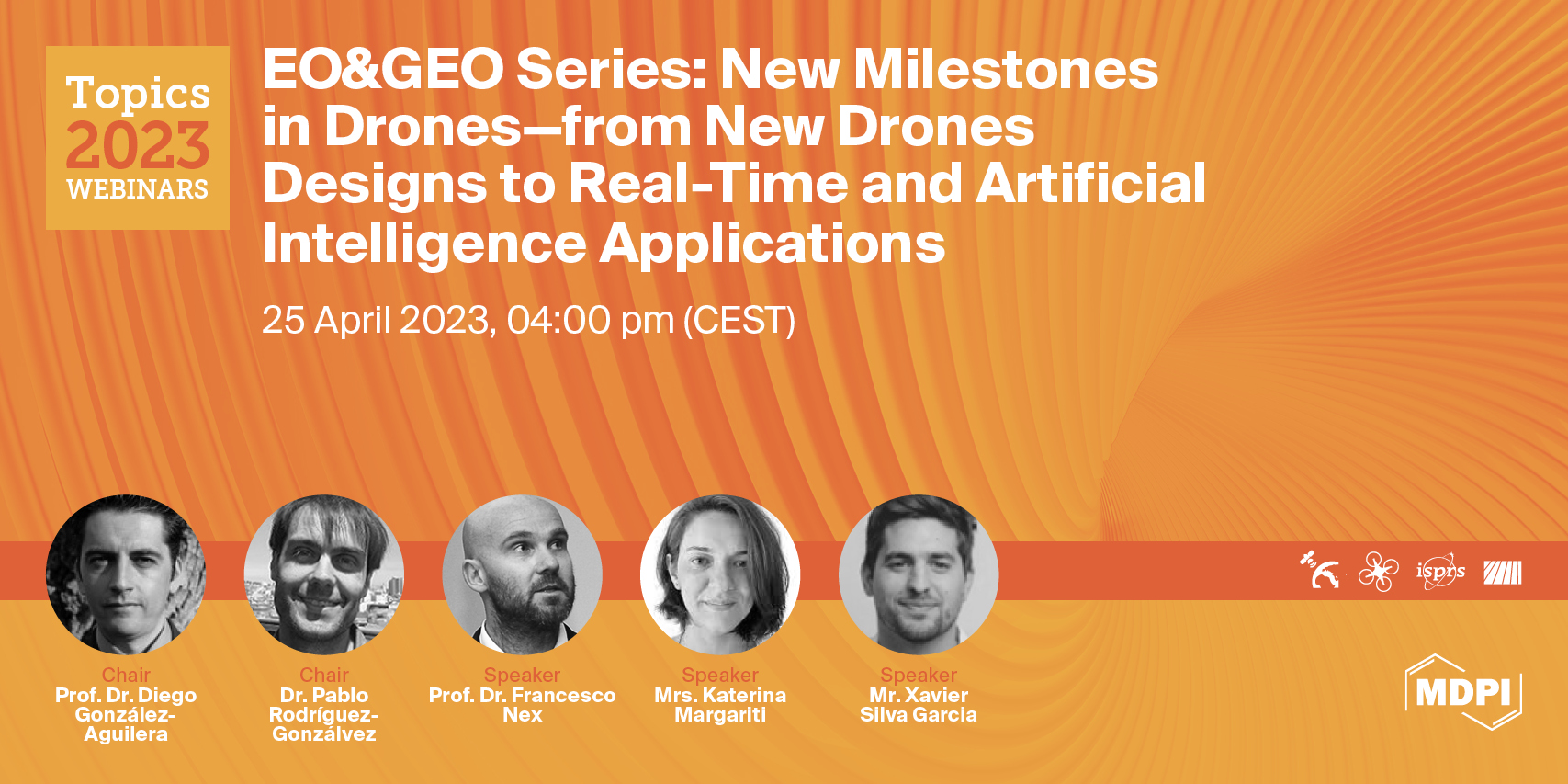
On Tuesday, 25 April 2023, MDPI and the journals Remote Sensing, Drones, Land and IJGI organized the webinar entitled EO&GEO Series: New Milestones in Drones—from New Drones Designs to Real-Time and Artificial Intelligence Applications.
It is clear that drones have become an increasingly popular tool for mapping and surveying, with their ability to capture high-resolution and multi-sensor imagery. However, traditional mapping techniques often require significant time and effort to process the collected data before it can be used; therefore, real-time drone mapping offers a game-changing solution that is going to transform various application fields, such as emergency response or agriculture.
Thanks to our recognized speakers, we had the opportunity to share with the audience novel insights into drone technology, from real-time mapping applications and novel drone designs to close to market vertical solutions in agriculture.
Please note that this webinar is associated with the Topic titled “Advances in Earth Observation and Geosciences”. The deadline is 31 December 2023.
You can watch the recorded webinar here:
Webinar Chairs and Keynote Speakers:
- Dr. Diego González-Aguilera (Chair), Cartographic and Land Engineering Department, Higher Polytechnic School of Avila, University of Salamanca, Salamanca, Spain;
- Pablo Rodríguez-Gonzálvez (Chair), Department of Mining Technology, Topography and Structures, University of León, Ponferrada, Spain;
- Dr. Francesco Nex, Earth Observation Science (ESO) Department, ITC Faculty, University of Twente, Enschede, the Netherlands;
- Katerina Margarita, Acceligence Hellas Ltd, Greece;
- Mr. Xavier Silva Garcia, Hemav Technology SL., Spain
11 April 2023
Meet Us at the 2023 Science and Technology Annual Meeting of Chinese Society for Environmental Sciences, 22–23 April 2023, Nanchang, China
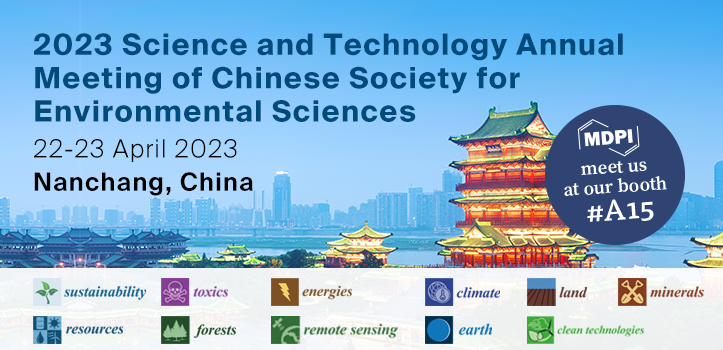
MDPI will be attending the 2023 Science and Technology Annual Meeting of Chinese Society for Environmental Sciences, which will be held from 22 to 23 April 2023, in Nanchang, China. The theme of the annual meeting is “Develop green and low-carbon, build a beautiful China”.
The annual meeting has arranged for an opening ceremony and specially invited keynote speeches, subsession seminars, high-end forums, special sessions for young scientists, poster exchanges, environmental protection science and technology achievement exhibitions, special events, etc. A total of 1800 delegates are expected to attend. Four academicians and other well-known experts are expected to deliver keynote speeches on climate change, the prevention and control of atmospheric, water, and soil environmental pollution, and environmental management science as well as technology. The invited keynote speeches touch on fields such as achievements in transformation.
The following MDPI journals will be represented:
- Sustainability;
- Toxics;
- Energies;
- Climate;
- Land;
- Minerals;
- Resources;
- Forests;
- Remote Sensing;
- Earth;
- Clean Technologies.
23 March 2023
Join Us at the 8th International Wildland Fire Conference (IWFC), 16–19 May 2023, Porto, Portugal
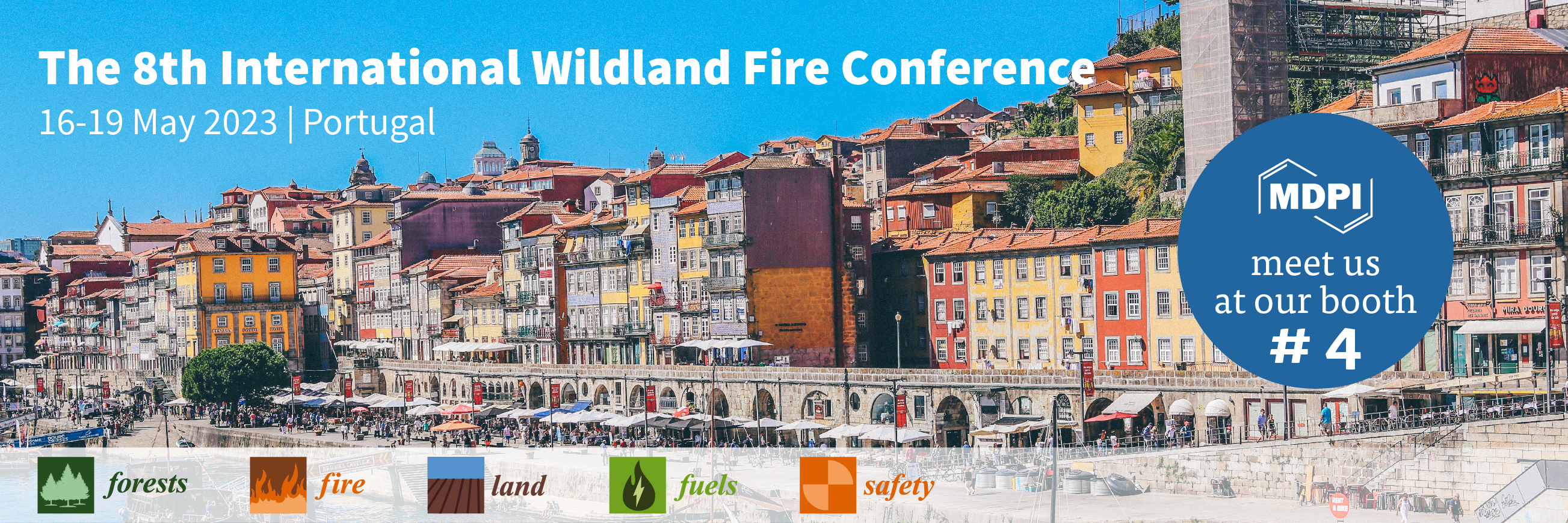
MDPI will be attending the 8th International Wildland Fire Conference (IWFC), which will take place in Porto, Portugal, from 16 to 19 May 2023. The first IWFC meeting was held in Boston, Massachusetts, in 1989. Since then, a series of conferences have been initiated to promote the exchange of expertise and international cooperation in wildland fire management. Previous conferences have helped organizations and professionals from over 70 countries develop common firefighting vocabulary, theory, training manuals, techniques, and operational standards. The 8th IWFC aims to create a space for researchers to present their latest work in the field of wildland fire. The conference welcomes institutional or professional case studies, scientific work, and papers detailing operational successes or failures in dealing with complexity and uncertainty when governing or managing wildfire risk.
MDPI invites researchers from different backgrounds to attend this conference to share their latest views and research with us.
The following MDPI journals will be represented:
- Forests;
- Land;
- Safety;
- Fire;
- Fuels.
If you plan on attending this conference, please feel free to stop by our booth and start a conversation with us. Our delegates look forward to meeting you in person and answering any questions that you may have.
21 March 2023
2023 International Day of Forests

We hope you will join us in celebrating and further protecting the planet’s forests this International Day of Forests, which takes place on the 21st of March. The theme for the 2023 International Day of Forests is "Forests and Health”. Forests give so much to our health, they purify the water, clean the air, capture carbon to fight climate change, provide food and life-saving medicines, and improve our well-being. It is up to us to safeguard these precious natural resources. At MDPI, our open access journals are primarily available online, reducing the company’s impact on deforestation and helping to protect the world’s forests.

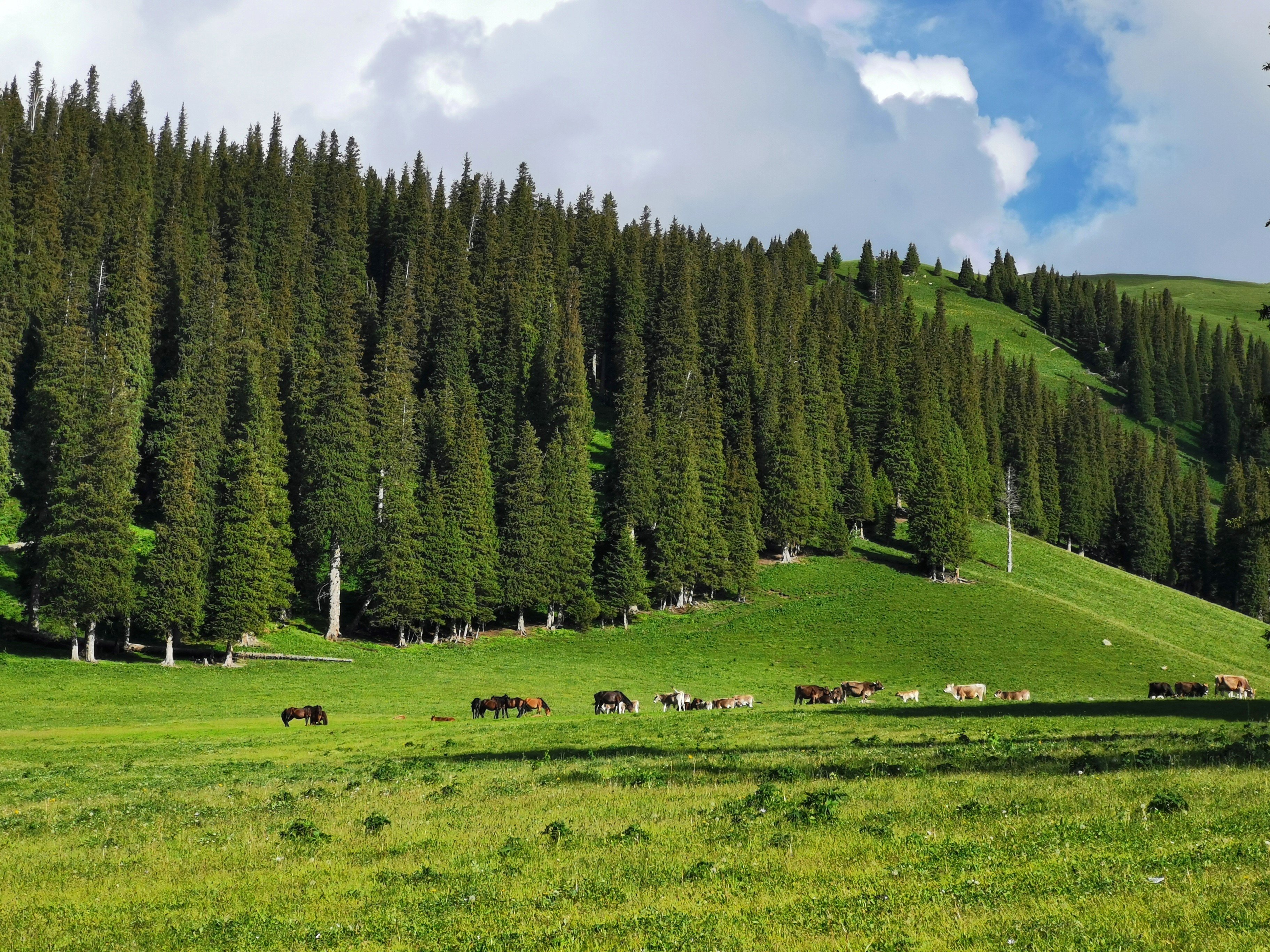 |
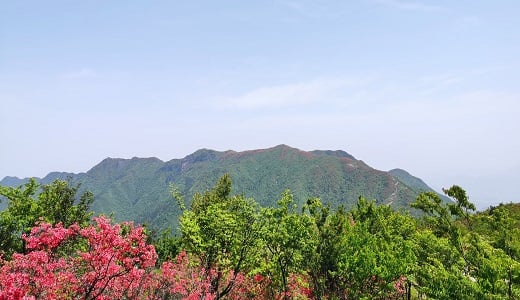 |
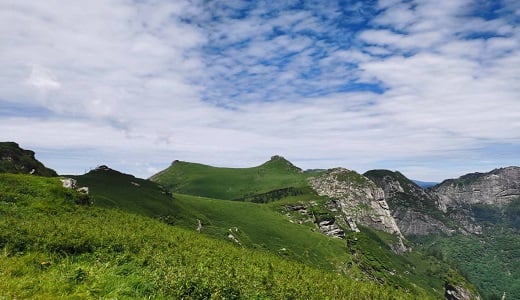 |
| Location: Nalati Grassland, Xinjiang, China Photo by Carolyn Chen, Sydney University |
Location: Jiangshan, Zhejiang, China Photo by Pengcheng Ye, Nanjing Institute of Environmental Science |
Location: Qinling, Shanxi, China Photo by Yuan Li, Shaanxi Normal University |
To access more content about Nature Photography Campaign and other related series activities, please click here.

 |
 |
 |
 |
 |
 |
 |
 |

- “Facilitating Prescribed Fire in Northern California through Indigenous Governance and Interagency Partnerships”
Fire 2021, 4, 37; https://doi.org/10.3390/fire4030037 - “Capitalization and Capital Return in Boreal Carbon Forestry”
Earth 2022, 3, 204-227; https://doi.org/10.3390/earth3010014 - “A Knowledge Review on Integrated Landscape Approaches”
Forests 2022, 13, 312; https://doi.org/10.3390/f13020312 - “National Implementation of the Forest Europe Indicators for Sustainable Forest Management”
Forests 2022, 13, 191; https://doi.org/10.3390/f13020191 - “Carbon Footprint and Feedstock Quality of a Real Biomass Power Plant Fed with Forestry and Agricultural Residues”
Resources 2022, 11, 7; https://doi.org/10.3390/resources11020007 - “The Necrobiome of Deadwood: The Life after Death”
Ecologies 2023, 4, 20-38; https://doi.org/10.3390/ecologies4010003

|
Special Issue: “Plant Communities: Identification, Monitoring and Evaluation of Temporal Dynamics” |
Special Issue: “The Use of Fire in Forest Ecosystem Restoration and Management” |
|
Special Issue: “Forest Therapy and Health” |
Special Issue: “Forest, Trees, Human Health and Wellbeing” |

|
International Day of Forests Webinar 2023 21 March 2023, 09:00 (CET) Free to register for the two sessions. Recordings will be available on Sciforum shortly afterward. |

|
|
|
|
13 March 2023
MDPI’s Newly Launched Journals in December 2022
As a leading open access publisher, MDPI provides scholars with a high-quality and rich academic exchange platform by continuously expanding into new and exciting research areas.
In December 2022, MDPI launched five new journals, covering multiple subjects such as life sciences, biology, medicine and pharmacology, social sciences and humanities. These new journals are being edited by established scholars across the world.
|
Journal |
Founding Editor-in-Chief |
Journal Topics (Selected) |
|
Prof. Dr. Fabio Gresta, University of Messina, Italy| Editorial | view inaugural issue |
grass/forage/turf production; grassland management; pasture monitoring; grazing and livestock; grass agro-ecosystems| view journal scope | submit an article |
|
|
Prof. Dr. Christos G. Athanassiou, University of Thessaly, Greece| Editorial | view inaugural issue |
pesticides; fungicides; herbicides; fertilizers; soil conditioners| view journal scope | submit an article |
|
|
Prof. Dr. Stephen H. Safe, Texas A&M University, USA| Editorial | view inaugural issue |
receptor structure; receptor function; receptor signaling; receptor expression and regulation; receptor interactions with drugs| view journal scope | submit an article |
|
|
Dr. Jean Jacques Vanden Eynde, University of Mons-UMONS, Belgium| Editorial | view inaugural issue |
drug discovery; medicinal chemistry; preclinical and clinical research; marketed drugs; intellectual property and regulatory affairs| view journal scope | submit an article |
|
|
Prof. Dr. Heather Kanuka, University of Alberta, Canada| Editorial | view inaugural issue |
higher education; tertiary education; policy and practice in higher education; educational leadership in higher education; educational administration and management in higher education| view journal scope | submit an article |
If you are interested in creating more open access journals with us to publish cutting-edge research, please send your journal proposal application to newjournal-committee@mdpi.com.
8 March 2023
Land | Congratulations to the Advisory Board Member Prof. Dr. Hualou Long on the Appointment as an AcSS Fellow

We would like to congratulate Prof. Dr. Hualou Long, Advisory Board Member of Land (ISSN: 2073-445X), who has been elected to the prestigious Fellowship of the Academy of Social Sciences for his achievements in the fields of human geography focusing on land-use transition and rural restructuring. This is an award granted by the Academy of Social Sciences to leading academics, policymakers, and practitioners of the social sciences. New fellows are elected each year by the Academy of Social Sciences from among outstanding scholars in the UK and international humanities and social sciences.
Full AcSS press release and Spring 2023 fellow list can be found at the following link: https://acss.org.uk/news/academy-of-social-sciences-confers-fellowship-to-fifty-six-leading-social-sciences/.
7 March 2023
Displaying Co-Authors’ Email Addresses on the Webpage of Published Papers
MDPI is pleased to announce that we now display the co-authors’ email addresses in addition to the corresponding author’s email address on the webpage of published papers, protected by Captcha. For more information about this change, please visit the journal’s instructions for authors page.
We believe this change will facilitate academic discussions and advance our cause of open science and research. The corresponding authors are responsible for communicating with their co-authors and indicating in our system (https://susy.mdpi.com/) if co-authors would prefer for their email addresses not to be displayed.
22 February 2023
Meet Us at the 2023 AAG Annual Meeting, 23–27 March 2023, Denver, USA
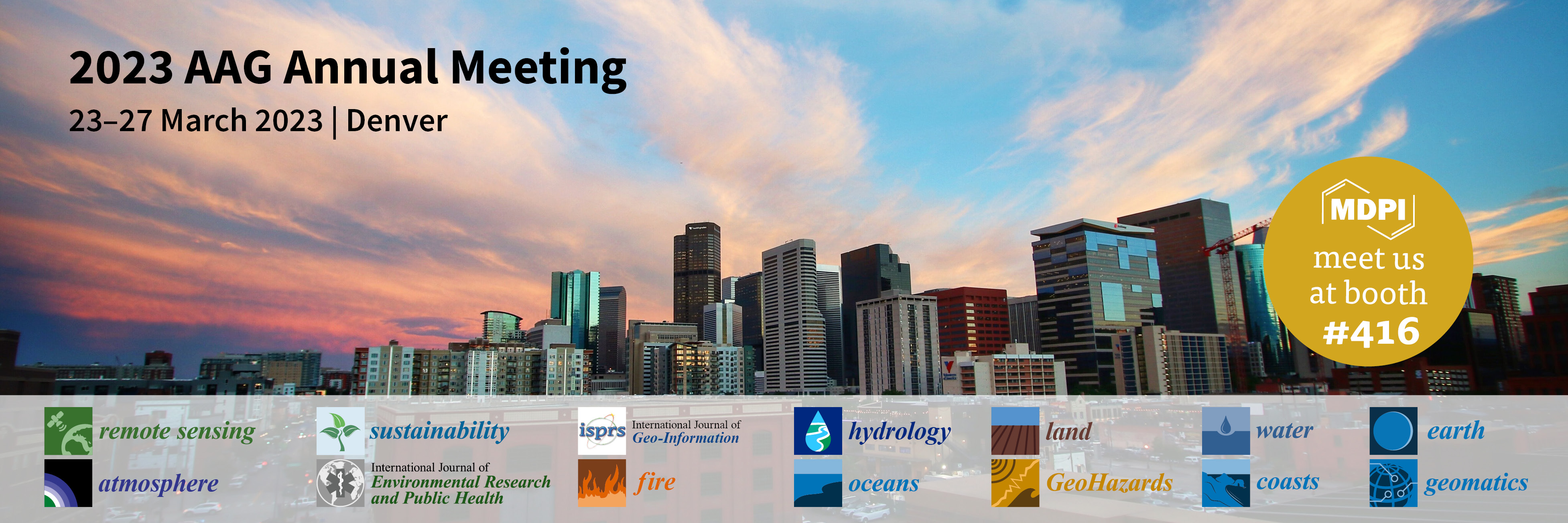
Conference: 2023 AAG Annual Meeting
Date: 23–27 April 2023
Location: Denver, USA
MDPI will be attending the 2023 AAG Annual Meeting as an exhibitor, and we welcome researchers from different backgrounds to visit and share their latest ideas with us.
This conference is organized by the American Association of Geographers (AAG). The theme of the meeting is “Toward More Just Geographies”. At the meeting, specialists will share and discuss the latest in research and applications in geography, sustainability, and GIScience.
The following MDPI journals will be represented:
- Remote Sensing (leading journal);
- Sustainability (leading journal);
- IJGI;
- Hydrology;
- Land;
- Water;
- Earth;
- Atmosphere;
- IJERPH;
- Fire;
- Oceans;
- GeoHazards;
- Coasts;
- Geomatics.
Remote Sensing (ISSN: 2072-4292, IF: 5.349) publishes regular research papers, reviews, technical notes and communications covering all aspects of remote sensing science, from sensor design and validation/calibration to its application in geosciences, environmental sciences, ecology, and civil engineering. The aim is to publish novel/improved methods/approaches and/or algorithms of remote sensing to benefit the community, open to everyone in need of them.
Sustainability (ISSN: 2071-1050, IF: 3.889) encourages experts to publish their experimental, computational and theoretical research on sustainability. This encompasses topics related to social sciences, natural and applied science and engineering, in order to enable the application and development of sustainability.
If you are planning to attend this conference, please do not hesitate to start an online conversation with us. Our delegates look forward to meeting you in person and answering any questions that you may have. For more information about the conference, please visit the following website: https://www.aag.org/events/aag2023/.
16 February 2023
Increasing Visibility for Preprints.org – Clarivate adds the Preprint Citation Index to the Web of Science
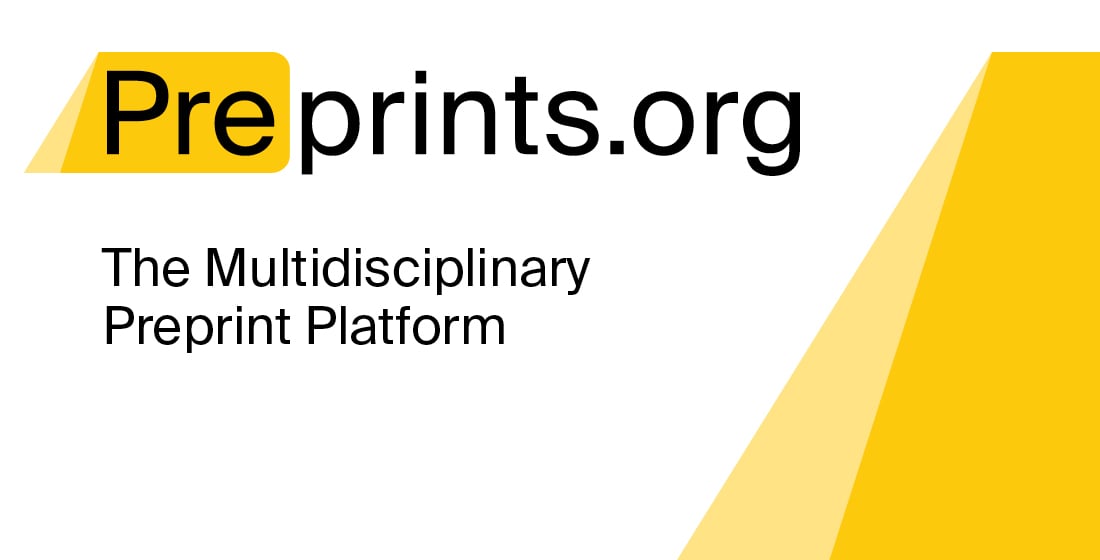
On 9 February 2023, Clarivate, a global leader in providing trusted insights and analytics, added the Preprint Citation Index to the Web of Science platform, streamlining the research process by allowing researchers to locate and link to preprints alongside other trusted content in the database.
The Preprint Citation Index will act as a bridge to connect cutting-edge preprints with peer-reviewed journal articles published within the Web of Science Core Collection. Alerts can be easily set to monitor new research across several repositories and authors will also be able to include preprints on their Web of Science Research Profile to more accurately display their various research outputs.
As of its launch, the Preprint Citation Index will provide nearly two million preprints from various repositories, including MDPI’s own Preprints.org.
MDPI's Preprints Platform – Preprints.org
To advance Open Science and the fast dissemination of research, MDPI offers researchers a free multidisciplinary preprint platform. Preprints.org accepts submissions from all research areas and offers authors high visibility, permanent archiving, article-level Metrics and immediately citable content by assigning a Digital Object Identifier (DOI) to all preprints.
During submission to any MDPI journal, authors have the option to share their research as a preprint. After an initial screening, the manuscript is available online in 48 hours or less. Once online, preprints can be downloaded, shared, commented on, and cited, providing authors maximum visibility.
We invite you to join the ranks of the over 100k researchers using Preprints.org and share your research.
For more information, please visit Preprints.org.
1 February 2023
Land | Special Issue Reprints Published in 2022
We are delighted to share with you 13 reprints of Special Issues published in 2022 in Land (ISSN: 2073-445X). They were selected by the Land Editorial Office, each with 10 or more articles published. You can read more reprints of the Special Issues published by Land here. If you are interested in editing a Special Issue, you are welcome to check out our new initiative—the Special Issue Mentor Program.
|
|
“Celebrating 25 Years of World Wetlands Day” |
|
|
“Wildlife Protection and Habitat Management: Practice and Perspectives” |
|
|
“Land Use Change from Non-urban to Urban Areas: Problems, Challenges and Opportunities” |
|
|
“Recent Progress in Urbanisation Dynamics Research” |
|
|
“Rural Space Modeling” |
|
|
“Multiple Roles for Landscape Ecology in Future Farming Systems” |
|
|
“Land Use Conflict Detection and Multi-Objective Optimization Based on the Productivity, Sustainability, and Livability Perspective” |
|
|
“Socio-Economic Impacts of Carbon Sequestration on Livelihoods and Future Climate” |
|
|
“Land Perspectives: People, Tenure, Planning, Tools, Space, and Health” |
|
|
“Land Surface Monitoring Based on Satellite Imagery” |
|
|
“Sustainable Land Management and Ecosystem Services in Agroforestry Systems” |
|
|
“Effects of Land Use on the Ecohydrology of River Basin in Accordance with Climate Change” |
|
|
“Landslide Hazard and Environment Risk Assessment” |
19 January 2023
Land | Issue Cover Articles in 2022
The articles below have been selected as 2022 Issue Cover Articles by the Editorial Office of Land (ISSN: 2073-445X). These articles came from multiple fields within the scope of Land and we hope they can provide insights and references for scholars in related fields.
|
|
1. “Using the Ecosystem Services Concept to Assess Transformation of Agricultural Landscapes in the European Alps” |
|
|
2. “A Review of Crop Husbandry and Soil Management Practices Using Meta-Analysis Studies: Towards Soil-Improving Cropping Systems” |
|
|
3. “Multisource and Multilevel Investigations on a Historical Landslide: The 1907 Servigliano Earth Flow in Montemurro (Basilicata, Southern Italy)” |
|
|
4. “An Overview of Fractal Geometry Applied to Urban Planning” |
|
|
5. “Geomatic Techniques Applied to the Dynamic Study (2001–2019) of the Rock Glacier in the Veleta Cirque (Sierra Nevada, Spain)” |
|
|
6. “Herd It in the Gobi: Deserting Pastoralism?” |
|
|
7. “High-Mountain Landscape Classification to Analyze Patterns of Land Use and Potential Natural Vegetation” |
|
|
8. “Updating Distribution, Ecology and Hotspots for Three Amphibian Species to Set Conservation Priorities in a European Glacial Refugium” |
|
|
9. “Evaluation of MODIS, Climate Change Initiative and CORINE Land Cover Products Based on a Ground Truth Dataset in a Mediterranean Landscape” |
|
|
10. “Digital Tools for Quantifying the Natural Capital Benefits of Agroforestry: A Review” |
|
|
11. “Review of Urban Land Management Based on Bibliometrics” |
|
|
12. “Are Wildfires in the Wildland-Urban Interface Increasing Temperatures? A Land Surface Temperature Assessment in a Semi-Arid Mexican City” |
31 December 2022
Land | Season’s Greetings from Editorial Board Members
As we reflect on the past year, the Editor-in-Chief Prof. Christine Fürst and all the staff from the Land Editorial Office extend great thanks to all who have contributed to the development of Land. We wish you all a joyful holiday season and a happy New Year filled with outstanding achievements. Let us welcome a few of our Editorial Board Members to express our gratitude and best wishes for the coming year.
Land (ISSN: 2073-445X, IF: 3.905) is an international and cross-disciplinary, peer-reviewed, open access journal of land system science, landscape, soil sediment–water systems, urban study, land–climate interactions, water–energy–land–food (WELF) nexus, biodiversity research and health nexus, land modeling and data processing, ecosystem services, and multifunctionality and sustainability, etc., published monthly online by MDPI. The International Association for Landscape Ecology (IALE), European Land-use Institute (ELI), Landscape Institute (LI), and Urban Land Institute (ULI) are affiliated with Land, and their members receive a discount on the Article Processing Charge.
22 December 2022
Special Issue Mentor Program
We are pleased to announce the launch of a new initiative—the MDPI Special Issue Mentor Program.
This program will enable early career researchers (who must hold a Ph.D. in a related field) to experience editing a Special Issue in MDPI journals, under the mentorship of our experienced Editorial Board Members or other experienced scientists. The mentor program will provide an excellent opportunity for early career scientists to gain editorial experience, and to cultivate their ability to edit scientific research.
The mentee’s responsibilities include:
- Proposing a Special Issue title and assisting the mentor in preparing a summary (around 200–400 words) and 3–10 keywords describing the background, importance, and goal of the Issue;
- Writing a brief promotion plan for the Special Issue;
- Preparing a list of scholars who may be interested in the Issue and personally e-mailing invitations on behalf of Guest Editors;
- Writing an editorial for the online Special Issue together with the mentor.
The mentor’s responsibilities include:
- Conducting a final check before the Special Issue is published online;
- Performing editorial control of the Special Issue and quality control of the publications, both of which must be carried out in a timely manner;
- Providing suggestions to younger scholars if they have any doubts or concerns regarding submissions;
- Organizing video calls with young scholars and the Editorial Office regularly to discuss problems and improvement suggestions for the Special Issue;
- Making and submitting decisions regarding submissions with the assistance of mentees.
Certificates and awards:
After the Special Issue closes, the Editorial Office will provide official certificates for all the mentors and early career researchers.
If you are interested in this opportunity, please send your Special Issue proposal to the Editorial Office of a journal you choose, and we will discuss the process (i.e., mentor collaboration, Special Issue topic feasibility analysis, etc.) in further detail. The full list of MDPI journals is as follows: https://www.mdpi.com/about/journals.
In addition to the new Special Issue Mentor Program, we will continue to welcome all Special Issue proposals focusing on hot research topics.
14 December 2022
"Thanks a Million!" – One Million Articles Published in MDPI Journals
MDPI has just become the first open access (OA) publisher to reach the milestone of one million articles published. That is one million articles freely available to all, to circulate and build upon! We are proud to share this special moment with the global scientific community.
This landmark has been reached thanks to the immeasurable support of more than 600,000 expert reviewers, 66,000 editorial board members and 6700 hard-working colleagues across MDPI’s global offices.
Within more than 25 years of publishing, our journals received 2.1 million manuscripts and generated 4.6 million peer review reports to get to one million papers published.
Reaching the milestone of one million articles published reinforces our mission to remove any existing barriers and to make scientific research accessible to all. Since its inception, MDPI’s goal has been to create reliable processes to make science open. This is a path towards facilitating the dissemination of novel insights in scientific communities.
Regular feedback from authors and reviewers shows that our service is greatly appreciated and needed. At the same time, the feedback helps us identify areas for further improvement.
As it stands, a significant share of published research findings remain closed access. More than half of the content published with the most well-known legacy publishers stays behind a paywall, and that is not including articles published in hybrid OA journals, or made available months or years after publication.
A new policy announced by the US administration in August 2022 requires that, as of January 2026, all US federally funded research be made freely and immediately available after publication. While the new policy does not mandate articles be published under an open access license, it is aligned with the open access movement in removing all barriers to research. Similarly, some of the most advanced research institutions in the world intend to have all funded research articles published in open access by 2025.
MDPI is proud to be the leading agent of the transition to open access.
"Thanks a Million" to all the contributors!
8 December 2022
MDPI Sustainability Foundation: New Look and Nominations for the 2023 Sustainability Awards Now Open

We are pleased to announce that the website of the MDPI Sustainability Foundation has been revamped! For the past couple of months, our UX UI team and front-end developers have been working hard to launch the website in time for the opening of the Sustainability Awards nominations.
The website is not the only thing that has had a remodeling. Indeed, the format of the Emerging Sustainability Leader Award (ESLA) has been updated. ESLA is now a competition open to individual researchers or start-ups founded by researchers under the age of 35. Nominee applications will go through 2 rounds of selection until the final 3 are decided. The finalists will then be invited to give pitch presentations during the Award Ceremony to win either first place (10,000 USD) or runner-up (2 x 5000 USD).
The World Sustainability Award, on the other hand, remains the same: a total prize money of 100,000 USD is up for grabs by senior individual researchers or groups of researchers from the international research community.
Nominations for both the World Sustainability Award and the Emerging Sustainability Leader award are now open! Check out our new website for more information on how to nominate.
2 December 2022
Editorial Board Members from Land Featured in the 2022 Highly Cited Researchers List Published by Clarivate
Recently, Clarivate™ revealed its 2022 list of Highly Cited Researchers™—individuals at universities, research institutes and commercial organizations.
The scientists who were selected for this year’s list of Highly Cited Researchers have published highly cited papers in the 11-year period from January 2011 to December 2021, with citation frequency in the top 1% of academic subjects and the same year of publication in the Web of ScienceTM database. Based on the Web of Science Citation data, 6,938 researchers from across the globe who have demonstrated a disproportionate level of significant and broad influence in their chosen field or fields over the last decade have been awarded Highly Cited Researcher 2022 designations. The list is truly global, spanning 69 countries or regions and spread across a diverse range of research sciences and social sciences.
According to statistics, 13 Editorial Board Members of Land (ISSN: 2073-445X) have been featured on the list of Highly Cited Researchers of Clarivate in 2022. They are being recognized for their high-quality scientific research achievements and outstanding contributions to professional fields. The Land journal office sincerely congratulates all elected Editorial Board Members and hopes that they continue to have an academically productive relationship with the journal.
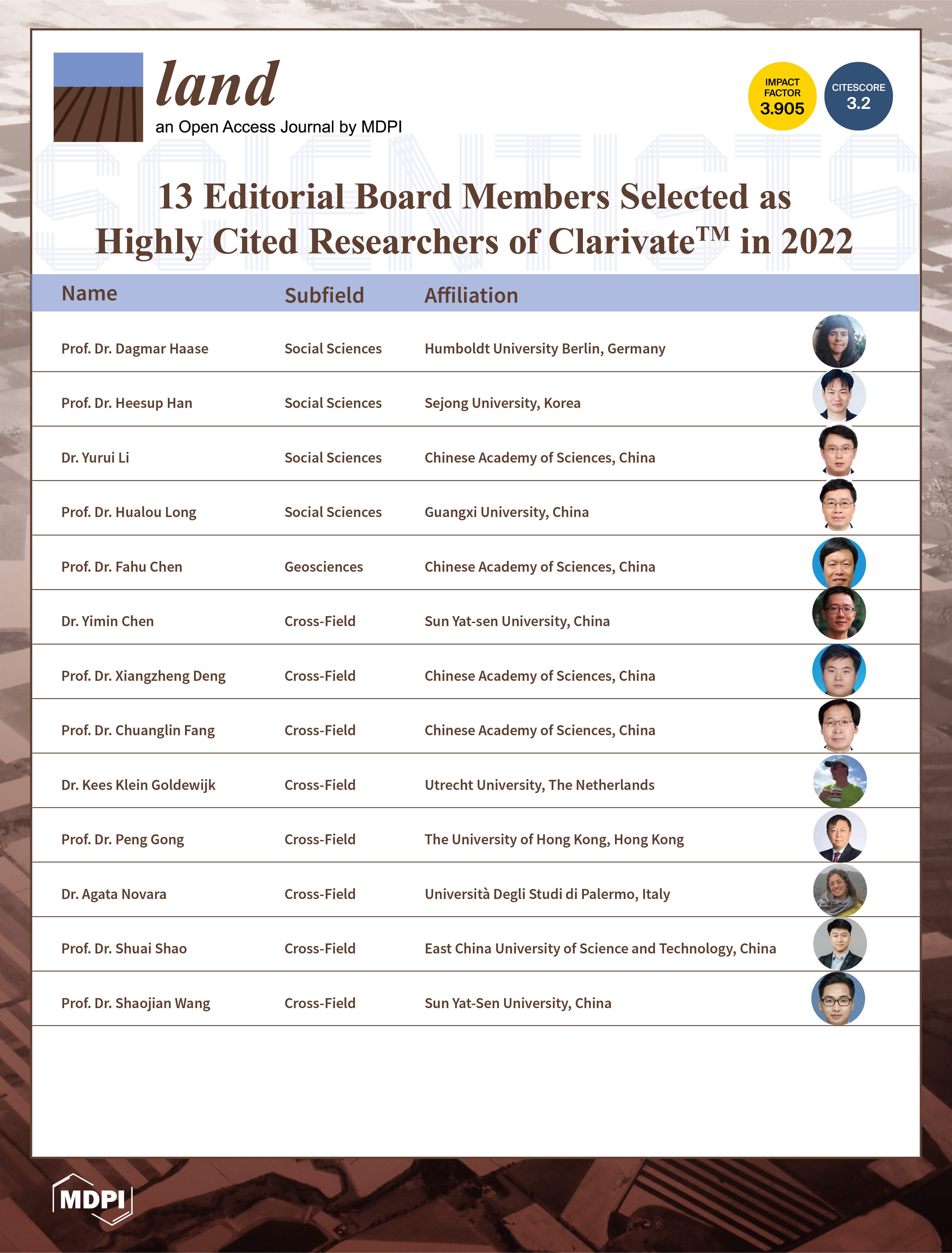
11 November 2022
Land Accepted for Coverage in ANVUR
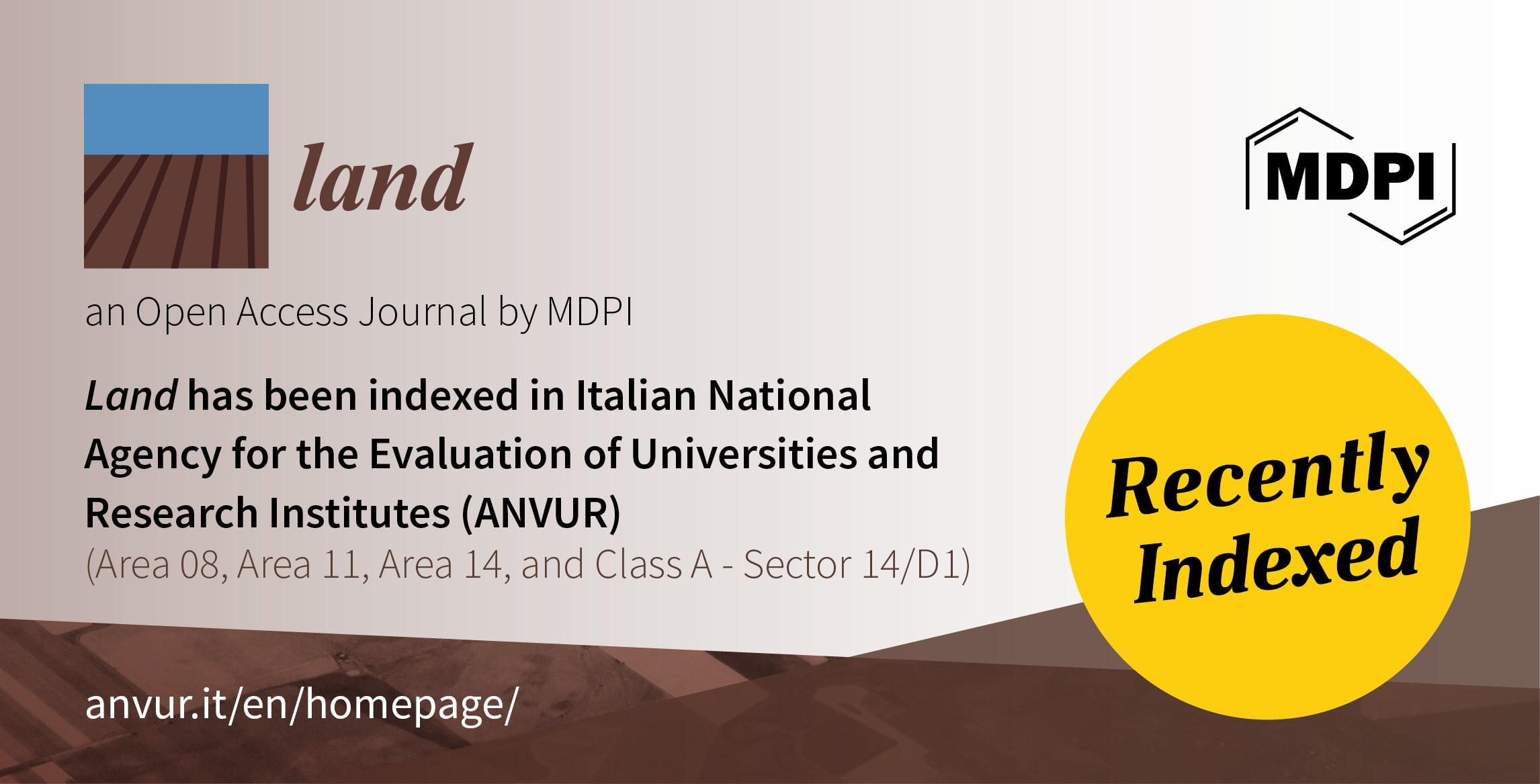
We are pleased to inform you that the open access journal Land (ISSN: 2073-445X, IF: 3.905) has been indexed in the Italian National Agency for the Evaluation of Universities and Research Institutes (ANVUR): Area 08, Area 11, Area 14, and Class A - Sector 14/D1. We would like to extend our sincerest gratitude to all authors, reviewers, and editors who have contributed to this journal and enabled this achievement.
Land is an international and cross-disciplinary, peer-reviewed, open access journal of land system science, landscape, soil–sediment–water systems, urban study, land–climate interactions, water–energy–land–food (WELF) nexus, biodiversity research and health nexus, land modelling and data processing, ecosystem services, and multifunctionality and sustainability, etc., published monthly online by MDPI. The International Association for Landscape Ecology (IALE), European Land-use Institute (ELI), Landscape Institute (LI), and Urban Land Institute (ULI) are affiliated with Land, and their members receive a discount on the Article Processing Charge.
We warmly welcome you to consider Land as the platform for publishing your work.
Land Editorial Office
7 November 2022
Meet Us at the 2022 BES Annual Meeting, 18–21 December 2022, Edinburgh, UK
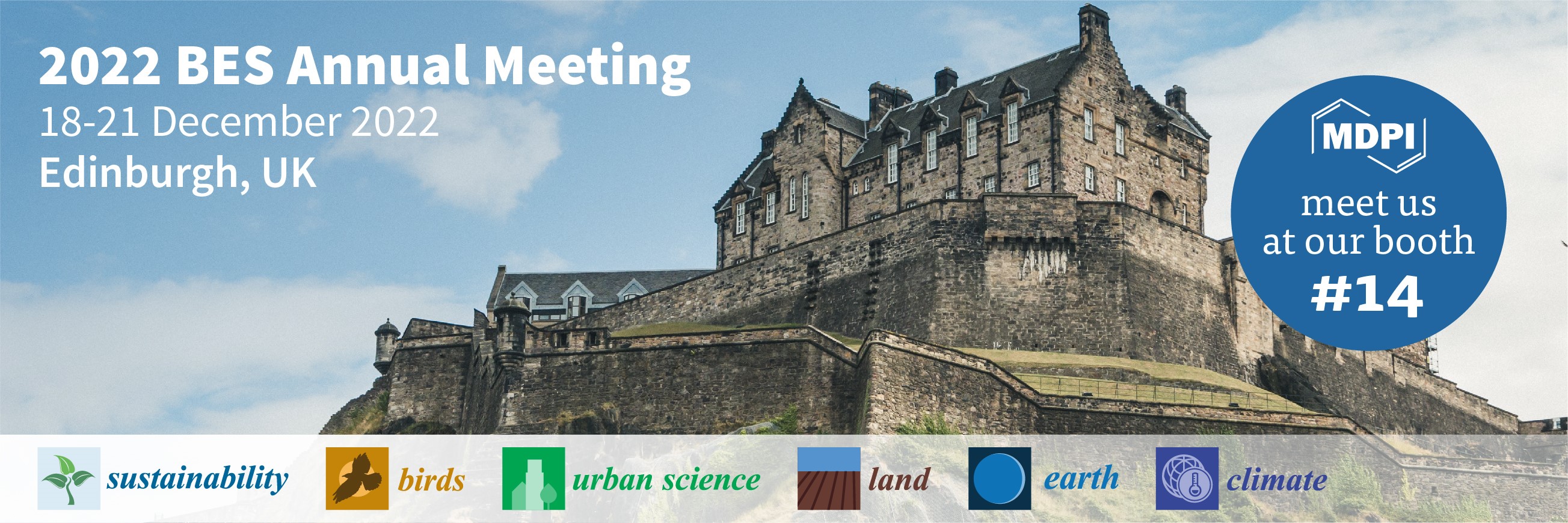
MDPI will be attending the 2022 BES Annual Meeting, held in Edinburgh, UK, from 18 to 21 December 2022. Throughout the conference, prominent researchers and government officials will give keynote speeches on pressing issues of ecology. The 2022 BES Annual Meeting provides an excellent opportunity for participants from industry and academia to keep up to date with the latest trends in ecology.
During this conference, MDPI will welcome researchers from different backgrounds to visit and share their latest views and research with us.
The following MDPI journals will be represented:
If you plan on attending this conference, feel free to stop by our booth. Our delegates look forward to meeting you in person to answer any questions that you may have.
For more information about the conference, please see the following link: https://www.britishecologicalsociety.org/events/bes-annual-meeting-2022.
7 November 2022
Land | Editor’s Choice Articles in 2020–2021 in the Section “Land Socio-Economic and Political Issues”
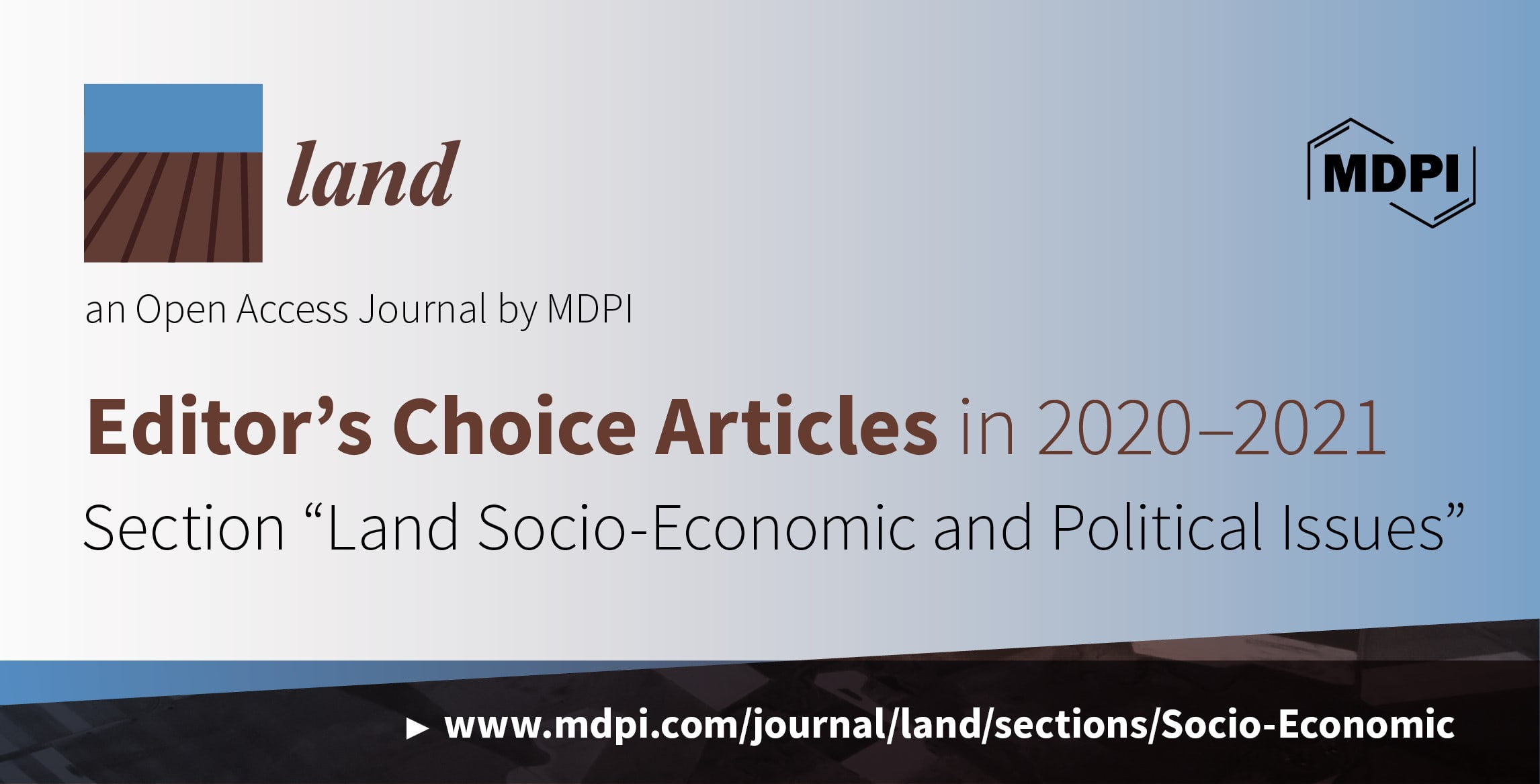
Land (ISSN: 2073-445X, IF 3.905) has launched the Section “Land Socio-Economic and Political Issues” in November 2019, for which Prof. Dr. Hossein Azadi serves as Editor-in-Chief. This Section welcomes contributions concerning different land policies and the nexus of human–land–environment tied with contemporary and historical land issues.
We are pleased to present the Editor’s Choice Articles of the Section “Land Socio-Economic and Political Issues” in 2020–2021, for which a snapshot of high-quality papers from the Section "Land Socio-Economic and Political Issues" is listed below:
1. “Quantifying the Economic Value of Ecosystem Services in Oil-Palm-Dominated Landscapes in Riau Province in Sumatra, Indonesia”
by Aulia, Ando Fahda, Harpinder Sandhu and Andrew C. Millington
Land 2020, 9(6), 194; https://doi.org/10.3390/land9060194
Available online: https://www.mdpi.com/2073-445X/9/6/194
2. “Challenges of Food Waste Governance”
by Garske, Beatrice, Katharine Heyl, Felix Ekardt, Lea Moana Weber and Wiktoria Gradzka
Land 2020, 9(7), 231; https://doi.org/10.3390/land9070231
Available online: https://www.mdpi.com/2073-445X/9/7/231
3. “3D Property Research from a Legal Perspective Revisited”
by Paasch, Jesper M. and Jenny Paulsson
Land 2021, 10(5), 494; https://doi.org/10.3390/land10050494
Available online: https://www.mdpi.com/2073-445X/10/5/494?type=check_update&version=2
4. “Spatial Targeting of Agricultural Support Measures: Indicator-Based Assessment of Coverages and Leakages”
by LaFevor, Matthew C., Alexandra G. Ponette-González, Rebecca Larson and Leah M. Mungai
Land 2021, 10(7), 740; https://doi.org/10.3390/land10070740
Available online: https://www.mdpi.com/2073-445X/10/7/740
5. “An Effectiveness Study on the Use of Different Types of LID for Water Cycle Recovery in a Small Catchment”
by Kim, Heenyun and Gunwoo Kim
Land 2021, 10(10), 1055; https://doi.org/10.3390/land10101055
Available online: https://www.mdpi.com/2073-445X/10/10/1055
Submitting a manuscript:
This Section is currently open for submissions. Papers may be submitted via the following link: https://www.mdpi.com/user/manuscripts/upload/?journal=land.
Launching a Special Issue:
You have the opportunity to propose hot topics and edit a Special Issue together with experts in the field: https://www.mdpi.com/journalproposal/sendproposalspecialissue/land.
Joining the Editorial Board:
If you are an active researcher in the field of land and are interested in joining the Editorial Board, please do not hesitate to contact the Land Editorial Office (land@mdpi.com) with the following two files attached:
- A full academic CV;
- A short cover letter that details your interest and enthusiasm for the position.
Land Editorial Office
4 November 2022
Recruiting Volunteer Reviewers for Land
Peer reviewing constitutes an essential part of the publication process, ensuring that Land (ISSN: 2073-445X) maintains its high standards for the quality of its published papers. We are looking to recruit expert reviewers to help uphold the quality and efficiency of Land.
To qualify as a reviewer, applicants must have published around eight papers related to land science in the last 5 years and hold a Ph.D. degree.
We will extend the following benefits to reviewers:
- Reviewers will receive a discount voucher code based on the review quality;
- Reviewers will be included in the journal’s annual acknowledgment of reviewers; more details can be found at https://www.mdpi.com/2073-445X/11/2/215 ;
- Reviewers will be considered for the journal’s outstanding reviewer award; details can be found at https://www.mdpi.com/journal/land/awards;
- Reviewers may be invited to join the Reviewer Board; see https://www.mdpi.com/journal/land/submission_reviewers for more information;
- Reviewers can build their profile on Publons and have their reviewing activity automatically added for participating journals. Publons profiles can also be integrated into ORCID.
For more information about the role, please visit the following link: https://www.mdpi.com/reviewers.
If you are interested in this position, please submit your application at https://susy.mdpi.com/volunteer/journals/review. We hope you will join us on our team of reviewers.
After your registration is approved, you will be able to see a list of manuscripts for which reviewers are needed.
If you have any other questions, please contact the Land Editorial Office (land@mdpi.com). We look forward to hearing from you.
Land Editorial Office
3 November 2022
Recruiting Editorial Board Members for Land
Land (ISSN: 2073-445X, Impact Factor 3.905) is currently recruiting prestigious scholars from around the world to join our Editorial Board for the following 13 Sections:
- “Land Systems and Global Change”;
- “Landscape Ecology”;
- “Soil–Sediment–Water Systems”;
- “Land Socio-Economic and Political Issues”;
- “Urban Contexts and Urban–Rural Interactions”;
- “Land–Climate Interactions”;
- “Landscape Archaeology”;
- “Land, Biodiversity, and Human Wellbeing”;
- “Land Environmental and Policy Impact Assessment”;
- “Land Innovations—Data and Machine Learning”;
- “Water, Energy, Land and Food (WELF) Nexus”;
- “Land—Observation and Monitoring”;
- “Land Planning and Architecture”.
Land is an international and cross-disciplinary, peer-reviewed, open access journal of land system science, landscape, soil–sediment–water systems, urban study, land–climate interactions, water–energy–land–food (WELF) nexus, biodiversity research and health nexus, land modelling and data processing, ecosystem services, and multifunctionality and sustainability etc., published monthly online by MDPI. The International Association for Landscape Ecology (IALE), European Land-use Institute (ELI), Landscape Institute (LI) and Urban Land Institute (ULI) are affiliated with Land, and their members receive a discount on the Article Processing Charge.
The main responsibilities of Editorial Board Members are as follows:
- Pre-checking and making decisions for several manuscripts, based on your area of expertise;
- Acting as, or recommending, a Guest Editor for a Special Issue on a topic related to your research interests;
- Promoting Land and increasing its visibility on related academic social media.
The benefits of becoming an Editorial Board Member include the following:
- The opportunity to publish one paper, free of charge, per year in Land, as well as receiving certain discounts for papers invited from your scientific network;
- A certificate recognizing you as an Editorial Board Member of Land;
- Land may offer sponsorship for conferences organized by you;
- Land may offer travel grants of CHF 300–500 per year for conferences that you attend or organize.
To apply for this position (in one of our Sections), recommend potential candidates, or request further information, please contact the Land Editorial Office (land@mdpi.com) with the following two files attached:
- A full academic CV;
- A short cover letter that details your interest and enthusiasm for the position.
Land Editorial Office
3 November 2022
Recruiting Section Editors-in-Chief for Land
Land is currently recruiting Editors-in-Chief for the following Sections:
- “Soil–Sediment–Water Systems”;
- “Land Environmental and Policy Impact Assessment”;
- “Water, Energy, Land and Food (WELF) Nexus”.
Land (ISSN: 2073-445X, IF: 3.905) is an international and cross-disciplinary, peer-reviewed, open access journal of land system science, landscape, soil–sediment–water systems, urban study, land–climate interactions, water–energy–land–food (WELF) nexus, biodiversity research and health nexus, land modelling and data processing, ecosystem services, and multifunctionality and sustainability etc., published monthly online by MDPI. The International Association for Landscape Ecology (IALE), European Land-use Institute (ELI), Landscape Institute (LI) and Urban Land Institute (ULI) are affiliated with Land, and their members receive a discount on the Article Processing Charge.
The Section Editor-in-Chief is a leader in their particular field of research, and is responsible for maintaining the scientific quality of a particular section of a journal. The Section Editor-in-Chief is expected to oversee the growth and development of the journal Sections and its Board members. The initial term is for 2 years, which entails the following:
- Acting as an ambassador for the journal, MDPI and Open Access publishing;
- Making scientific decisions about the scope of their Section;
- Inviting distinguished scientists to join the Editorial Board;
- Suggesting topics for Special Issues;
- Providing support and guidance to Editorial Board Members and editorial staff when required;
- Maintaining oversight of the editorial process for individual manuscripts in their Section (mainly by making the final decision regarding whether or not a paper can be published after peer-review and revisions);
- Understanding, leading, and upholding MDPI’s peer review guidelines and ethics guidelines.
To apply for this position (in one of our Sections), recommend potential candidates, or request further information, please contact the Land Editorial Office (land@mdpi.com) with the following two files attached:
- A full academic CV;
- A short cover letter that details your interest and enthusiasm for the position.
Land Editorial Office
3 November 2022
Editorial Board Members from Land Featured in Stanford’s List of the World’s Top 2% Scientists
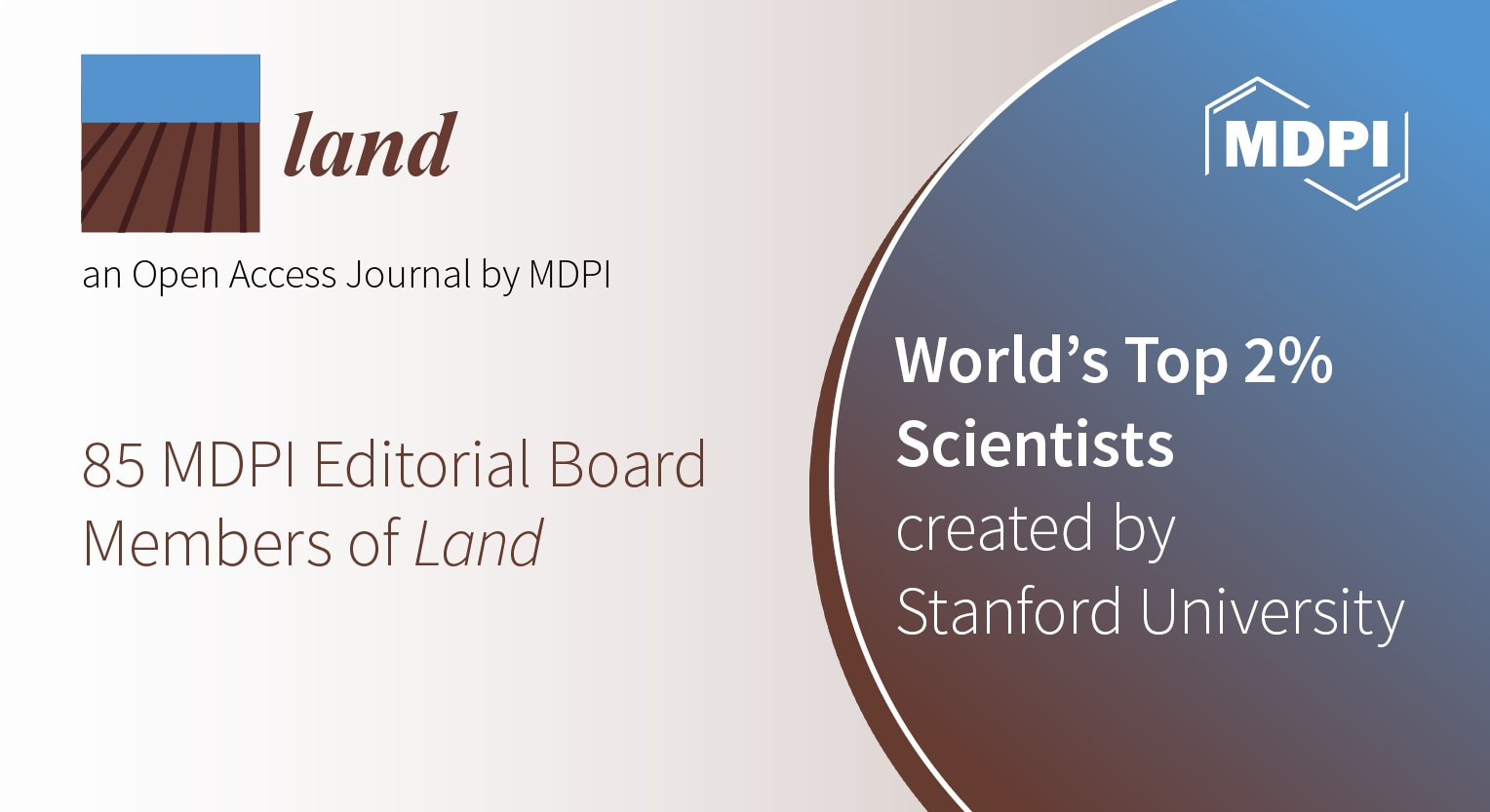
Stanford University has recently published an update of the list of the top 2% most widely cited scientists. The time node of the statistical data of this list is from 1960 to 2022, and it is divided into two lists: "Lifetime Scientific Influence Ranking" and "2022 Annual Scientific Influence Ranking". The "Lifetime Scientific Influence Ranking" counts the comprehensive influence performance of scientists during their careers, and the "2022 Annual Influence Ranking" focuses on highlighting the academic influence of scientists in the previous year. This ranking, considered the most prestigious worldwide, is based on the bibliometric information contained in the Scopus database and includes more than 200,000 researchers from the more than 10 million scientists considered to be active worldwide, with 22 scientific fields and 176 subfields taken into account.
We are pleased to share that 85 Editorial Board Members from MDPI’s Land (ISSN: 2073-445X) were featured in Stanford University World’s Top 2% Scientists list in 2022.
|
Name |
Affiliation |
|
Dr. Agata Novara |
University of Palermo |
|
Dr. Alan Grainger |
University of Leeds |
|
Prof. Dr. Alexis Comber |
University of Leeds |
|
Prof. Dr. Alf Hornborg |
Lund University |
|
Prof. Dr. Anna Lawrence |
University of the Highlands and Islands |
|
Prof. Dr. Benjamin Burkhard |
Leibniz University Hannover |
|
Prof. Dr. Brendan Mackey |
Griffith University |
|
Prof. Dr. Brian D. Fath |
Towson University |
|
Dr. Bruno Marino |
Planetary Emissions Management (PEM) |
|
Prof. Dr. Bryan C. Pijanowski |
Purdue University |
|
Prof. Dr. Catherine M. Tucker |
University of Florida |
|
Prof. Dr. Cezary Kabala |
Wrocław University of Environmental and Life Sciences |
|
Prof. Dr. Chinwe Ifejika Speranza |
University of Bern |
|
Prof. Dr. Chuanglin Fang |
Chinese Academy of Sciences |
|
Prof. Dr. Dagmar Haase |
Humboldt University of Berlin |
|
Prof. Dr. Daniel W. Schneider |
University of Illinois |
|
Prof. Dr. David J. Abson |
Leuphana University |
|
Prof. Dr. David Simon |
University of London |
|
Dr. Dingde Xu |
Sichuan Agricultural University |
|
Prof. Dr. Dong Jiang |
Chinese Academy of Sciences |
|
Prof. Dr. Eckart Lange |
The University of Sheffield |
|
Prof. Dr. Eike Luedeling |
University of Bonn |
|
Prof. Dr. Fahu Chen |
Chinese Academy of Sciences |
|
Dr. Francisco J. Escobedo |
United States Department of Agriculture (USDA) |
|
Prof. Dr. Giuseppe Modica |
Mediterranea University of Reggio Calabria |
|
Dr. Guangju Zhao |
Northwest A & F University |
|
Prof. Dr. Guangqing Chi |
The Pennsylvania State University |
|
Prof. Dr. Guoyong Leng |
Chinese Academy of Sciences |
|
Prof. Dr. Guoyu Ren |
China University of Geosciences |
|
Prof. Dr. Heesup Han |
Sejong University |
|
Prof. Dr. Hualou Long |
Guangxi University |
|
Prof. Dr. Ilan Stavi |
Tamar Regional Council |
|
Dr. Jamal Jokar Arsanjani |
Aalborg University Copenhagen |
|
Prof. Dr. James McCarthy |
Clark University |
|
Prof. Dr. Jianjun Zhang |
China University of Geosciences (Beijing) |
|
Prof. Dr. Jikun Huang |
Peking University |
|
Prof. Dr. Jiquan Chen |
Michigan State University |
|
Prof. Dr. Julia Jones |
Oregon State University |
|
Dr. Kees Klein Goldewijk |
Utrecht University |
|
Dr. Keith Halfacree |
Swansea University |
|
Dr. Kirsten de Beurs |
The University of Oklahoma |
|
Dr. Le Yu |
Tsinghua University |
|
Dr. Linda See |
International Institute for Applied Systems Analysis (IIASA) |
|
Prof. Dr. Lizhe Wang |
China University of Geosciences |
|
Prof. Dr. Luca Salvati |
University of Macerata |
|
Dr. Maria Rosa Trovato |
University of Catania |
|
Dr. Mark A. Chappell |
U.S. Army Engineer Research and Development Center |
|
Prof. Dr. Meine Van Noordwijk |
Brawijaya University |
|
Prof. Dr. Michael U. Hensel |
Vienna University of Technology |
|
Dr. Muhammad Shafique |
City University of Hong Kong |
|
Prof. Dr. Nicole Boivin |
Max Planck Institute for the Science of Human History |
|
Dr. Nigussie Haregeweyn |
Tottori University |
|
Dr. Nikos Koutsias |
University of Patras |
|
Dr. Paulo M. Fernandes |
University of Trás-os-Montes and Alto Douro |
|
Prof. Dr. Peng Gong |
The University of Hong Kong |
|
Prof. Dr. Peter Ho |
Zhejiang University |
|
Prof. Dr. Philip Berke |
Texas A&M University |
|
Prof. Dr. Piotr Jankowski |
San Diego State University |
|
Prof. Dr. Richard Aspinall |
James Hutton Institute |
|
Prof. Dr. Robert Baldwin |
Clemson University |
|
Prof. Dr. Roberta Capello |
Politecnico di Milano |
|
Dr. Roger White |
Memorial University of Newfoundland |
|
Dr. Romy Greiner |
James Cook University |
|
Dr. Saskia Keesstra |
Wageningen University |
|
Dr. Sean Sloan |
Vancouver Island University |
|
Prof. Dr. Shaojian Wang |
Sun Yat-Sen University |
|
Prof. Dr. Shiliang Liu |
Beijing Normal University |
|
Prof. Dr. Shiliang Su |
Wuhan University |
|
Dr. Stephen Blake |
Saint Louis University |
|
Prof. Dr. Tao Liu |
Peking University |
|
Prof. Dr. Thomas Koellner |
University of Bayreuth |
|
Prof. Dr. Tim Denham |
Australian National University |
|
Dr. Troy Sternberg |
University of Oxford |
|
Dr. Valerie Kapos |
United Nations Environment Programme World Conservation Monitoring Centre |
|
Prof. Dr. Wei Wei |
Chinese Academy of Sciences |
|
Prof. Dr. Weidong Liu |
Chinese Academy of Sciences |
|
Dr. Xi Chen |
Chinese Academy of Sciences |
|
Prof. Dr. Xiangzheng Deng |
Chinese Academy of Sciences |
|
Dr. Yang Xiao |
Tongji University |
|
Dr. Yimin Chen |
Sun Yat-sen University |
|
Dr. Yiyun Chen |
Wuhan University |
|
Dr. Yoshiki Yamagata |
National Institute for Environmental Studies (NIES) |
|
Dr. Yurui Li |
Chinese Academy of Sciences |
|
Prof. Dr. Zhigang Li |
Wuhan University |
|
Prof. Dr. Zhonghua Gou |
Wuhan University |
The latest Stanford rankings reflect the significant influence and research excellence of the scientists, who are committed to furthering their knowledge for the benefit of the world.
We would like to congratulate our Editorial Board Members on their excellent achievement and thank them for their immense contribution to the scientific progression and development of Land.
1 November 2022
Land | Editor’s Choice Articles in 2020–2021 in the Section “Land Systems and Global Change”
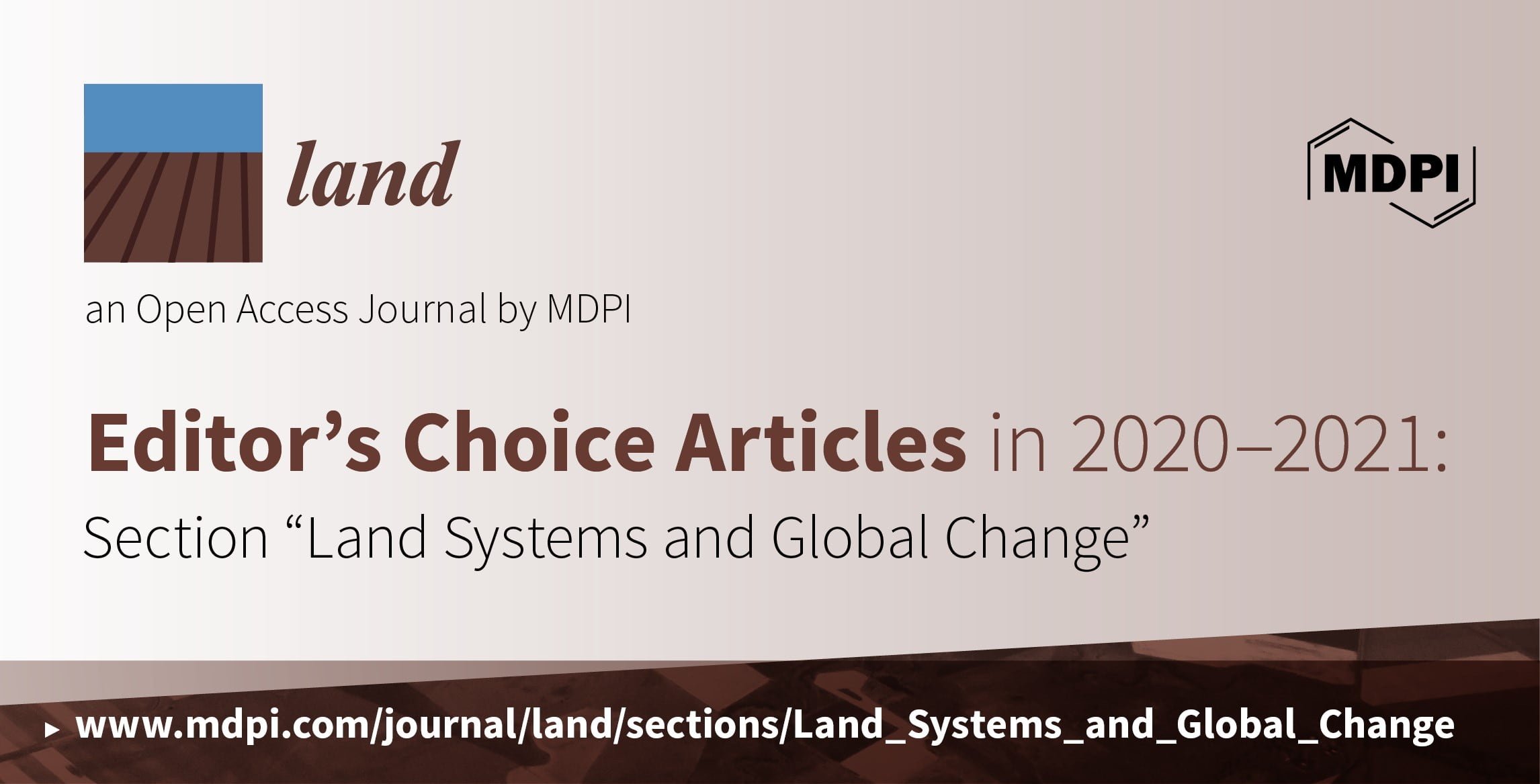
Land (ISSN: 2073-445X, IF 3.905) launched the “Land Systems and Global Change” Section in November 2019. Dr. Le Yu is currently serving as the Editor-in-Chief of this Section. This Section welcomes contributions concerning the functioning and dynamics of land systems from local to global scales.
We are pleased to present the Editor’s Choice Articles of the “Land Systems and Global Change” Section in 2020–2021, a snapshot of some of the most exciting work from the Section.
1. “Using a Social-ecological Regime Shift Approach to Understand the Transition from Livestock to Game Farming in the Eastern Cape, South Africa”
by Therezah Achieng, Kristine Maciejewski, Michelle Dyer and Reinette Biggs
Land 2020, 9(4), 97; https://doi.org/10.3390/land9040097
Available online: https://www.mdpi.com/2073-445X/9/4/97
2. “Anthropogenic Biomes: 10,000 BCE to 2015 CE”
by Erle C. Ellis, Arthur H.W. Beusen and Kees Klein Goldewijk
Land 2020, 9(5), 129; https://doi.org/10.3390/land9050129
Available online: https://www.mdpi.com/2073-445X/9/5/129
3. “Monitoring of Changes in Land Use/Land Cover in Syria from 2010 to 2018 Using Multitemporal Landsat Imagery and GIS”
by Mohamed Ali Mohamed, Julian Anders and Christoph Schneider
Land 2020, 9(7), 226; https://doi.org/10.3390/land9070226
Available online: https://www.mdpi.com/2073-445X/9/7/226
4. “Aboveground Biomass Distribution in a Multi-Use Savannah Landscape in Southeastern Kenya: Impact of Land Use and Fences”
by Edward Amara, Hari Adhikari, Janne Heiskanen, Mika Siljander, Martha Munyao, Patrick Omond and Petri Pellikka
Land 2020, 9(10), 381; https://doi.org/10.3390/land9100381
Available online: https://www.mdpi.com/2073-445X/9/10/381
5. “Toward Best Management Practices for Ecological Corridors”
by Andrew Gregory, Emma Spence, Paul Beier and Emily Garding
Land 2021, 10(2), 140; https://doi.org/10.3390/land10020140
Available online: https://www.mdpi.com/2073-445X/10/2/140
6. “Land Abandonment in Mountain Areas of the EU: An Inevitable Side Effect of Farming Modernization and Neglected Threat to Sustainable Land Use”
by Thomas Dax, Karin Schroll, Ingrid Machold, Martyna Derszniak-Noirjean, Bernd Schuh and Mailin Gaupp-Berghausen
Land 2021, 10(6), 591; https://doi.org/10.3390/land10060591
Available online: https://www.mdpi.com/2073-445X/10/6/591
7. “Multispectral Sentinel-2 and SAR Sentinel-1 Integration for Automatic Land Cover Classification”
by Paolo De Fioravante, Tania Luti, Alice Cavalli, Chiara Giuliani, Pasquale Dichicco, Marco Marchetti, Gherardo Chirici, Luca Congedo and Michele Munafò
Land 2021, 10(6), 611; https://doi.org/10.3390/land10060611
Available online: https://www.mdpi.com/2073-445X/10/6/611
8. “A Synthesis of Land Use/Land Cover Studies: Definitions, Classification Systems, Meta-Studies, Challenges and Knowledge Gaps on a Global Landscape”
by Ryan Nedd, Katie Light, Marcia Owens, Neil James, Elijah Johnson and Aavudai Anandhi
Land 2021, 10(9), 994; https://doi.org/10.3390/land10090994
Available online: https://www.mdpi.com/2073-445X/10/9/994
9. “Dynamic Amazonia: The EU–Mercosur Trade Agreement and Deforestation”
by Eugenio Arima, Paulo Barreto, Farzad Taheripour and Angel Aguiar
Land 2021, 10(11), 1243; https://doi.org/10.3390/land10111243
Available online: https://www.mdpi.com/2073-445X/10/11/1243
Submitting a manuscript:
This Section is currently open for submissions. Papers may be submitted via the following link: https://www.mdpi.com/user/manuscripts/upload/?journal=land.
Launching a Special Issue:
You have the opportunity to propose hot topics and edit a Special Issue together with experts in the field: https://www.mdpi.com/journalproposal/sendproposalspecialissue/land.
Joining the Editorial Board:
If you are an active researcher in the field of land and are interested in joining the Editorial Board, please do not hesitate to contact the Land Editorial Office (land@mdpi.com) with the following two files attached:
- A full academic CV;
- A short cover letter that details your interest and enthusiasm for the position.
Land Editorial Office
28 October 2022
Land | Editor’s Choice Articles in 2020–2021 in the Section “Landscape Ecology”
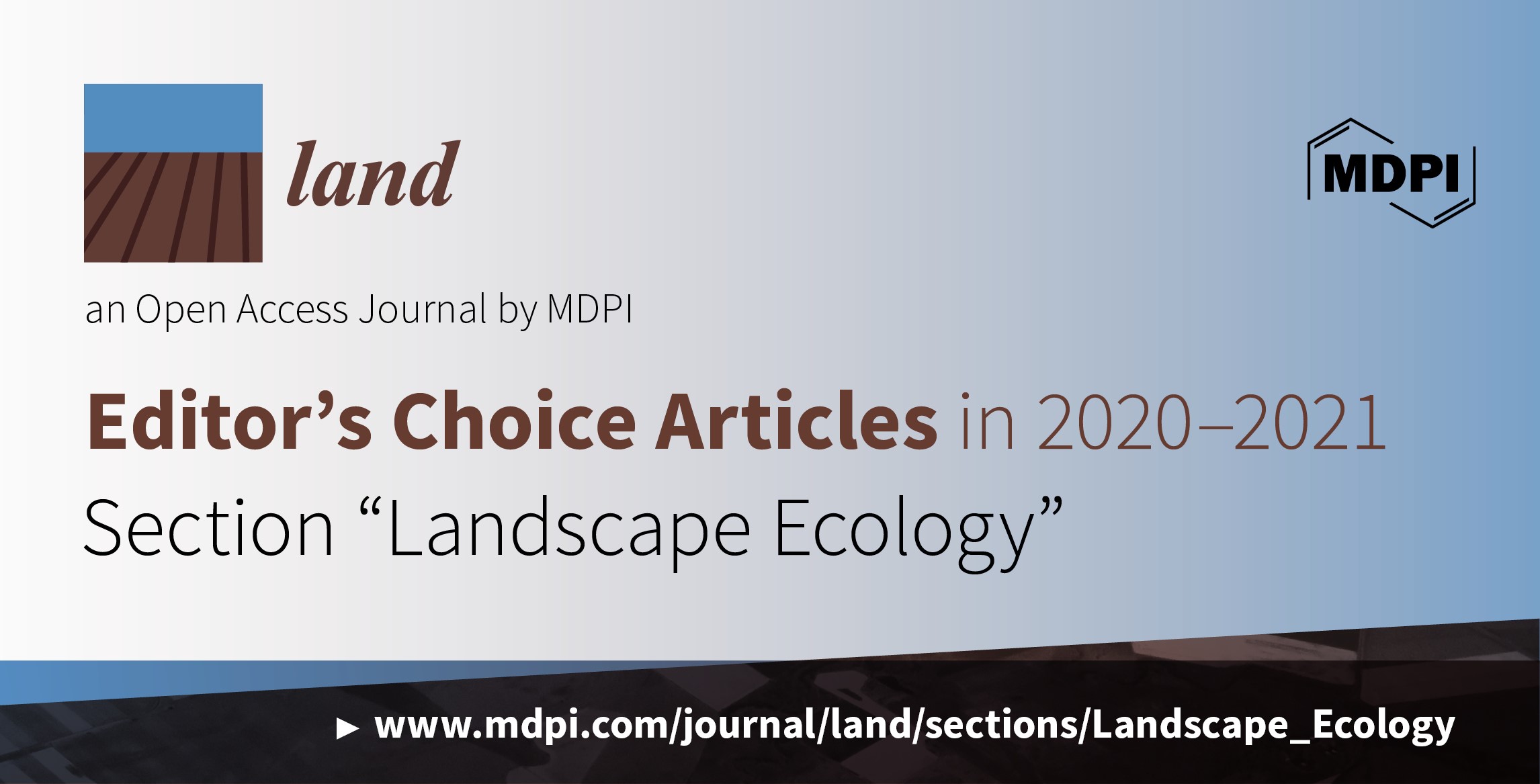
Land (ISSN: 2073-445X, Impact Factor 3.905) launched the Section “Landscape Ecology” in November 2019. Prof. Dr. Benjamin Burkhard is currently serving as Editor-in-Chief of this Section.
The Section “Landscape Ecology” welcomes contributions concerning the dynamics of patterns and processes at landscape scales concerning any type of landscape, land use or land cover, including aquatic, coastal, and marine systems. Manuscripts can be theoretical, applied, or “state of the science” reviews but should explicitly address the spatial and/or temporal scale. Interdisciplinary manuscripts focusing on social–ecological systems, sustainability, or global change issues are particularly welcome, as are manuscripts from fields adjacent to landscape ecology, such as geography, macroecology, spatial science, and modeling.
We are pleased to present the Editor’s Choice Articles of Section “Landscape Ecology” in 2020 and 2021, a snapshot of some of the most exciting work from the Section.
1. “Contextualizing Landscape-Scale Forest Cover Loss in the Democratic Republic of Congo (DRC) between 2000 and 2015”
by Giuseppe Molinario, Matthew Hansen, Peter Potapov, Alexandra Tyukavina and Stephen Stehman
Land 2020, 9(1), 23; https://doi.org/10.3390/land9010023
Available online: https://www.mdpi.com/2073-445X/9/1/23
2. “Measuring Multifunctional Agricultural Landscapes”
by Bingjie Song, Guy M. Robinson and Douglas K. Bardsley
Land 2020, 9(8), 260; https://doi.org/10.3390/land9080260
Available online: https://www.mdpi.com/2073-445X/9/8/260
3. “Local Perceptions of Ecosystem Services Across Multiple Ecosystem Types in Spain”
by Marina García-Llorente et al.
Land 2020, 9(9), 330; https://doi.org/10.3390/land9090330
Available online: https://www.mdpi.com/2073-445X/9/9/330
4. “A Transparent and Intuitive Modeling Framework and Software for Efficient Land Allocation”
by John A. Gallo, Gregory H. Aplet, Randal Greene, Janice L. Thomson and Amanda T. Lombard
Land 2020, 9(11), 444; https://doi.org/10.3390/land9110444
Available online: https://www.mdpi.com/2073-445X/9/11/444
5. “Cultural Ecosystem Services in the Natura 2000 Network: Introducing Proxy Indicators and Conflict Risk in Greece”
by Vassiliki Vlami, Ioannis P. Kokkoris, Stamatis Zogaris, George Kehayias and Panayotis Dimopoulos
Land 2021, 10(1), 4; https://doi.org/10.3390/land10010004
Available online: https://www.mdpi.com/2073-445X/10/1/4
6. “Remote Sensing Analysis to Quantify Change in Woodland Canopy Cover on the San Carlos Apache Reservation, Arizona, USA (1935 vs. 2017)”
by Barry Middleton and Laura Norman
Land 2021, 10(4), 393; https://doi.org/10.3390/land10040393
Available online: https://www.mdpi.com/2073-445X/10/4/393
7. “Effects of Forestry Intensification and Conservation on Green Infrastructures: A Spatio-Temporal Evaluation in Sweden”
by Per Angelstam and Michael Manton
Land 2021, 10(5), 531; https://doi.org/10.3390/land10050531
Available online: https://www.mdpi.com/2073-445X/10/5/531
8. “Plant Diversity in the Dynamic Mosaic Landscape of an Agricultural Heritage System: The Minabe-Tanabe Ume System”
by Yuji Hara, Shinji Oki, Yoshiyuki Uchiyama, Kyuichi Ito, Yuto Tani, Asako Naito and Yuki Sampei
Land 2021, 10(6), 559; https://doi.org/10.3390/land10060559
Available online: https://www.mdpi.com/2073-445X/10/6/559
9. “Assessing the Role of Kettle Holes for Providing and Connecting Amphibian Habitats in Agricultural Landscapes”
by Biljana Savić, Alevtina Evgrafova, Cenk Donmez, Filip Vasić, Michael Glemnitz and Carsten Paul
Land 2021, 10(7), 692; https://doi.org/10.3390/land10070692
Available online: https://www.mdpi.com/2073-445X/10/7/692
Submitting a manuscript:
This Section is currently open for submissions. Papers may be submitted via the following link: https://www.mdpi.com/user/manuscripts/upload/?journal=land.
Launching a Special Issue:
You have the opportunity to propose hot topics and edit a Special Issue together with experts in the field: https://www.mdpi.com/journalproposal/sendproposalspecialissue/land.
Joining the Editorial Board:
If you are an active researcher in the field of land and are interested in joining the Editorial Board, please do not hesitate to contact the Land Editorial Office (land@mdpi.com) with the following two files attached:
- A full academic CV;
- A short cover letter that details your interest and enthusiasm for the position.
Land Editorial Office
25 October 2022
Land | Editor’s Choice Articles in 2020–2021 in the Section “Urban Contexts and Urban-Rural Interactions”
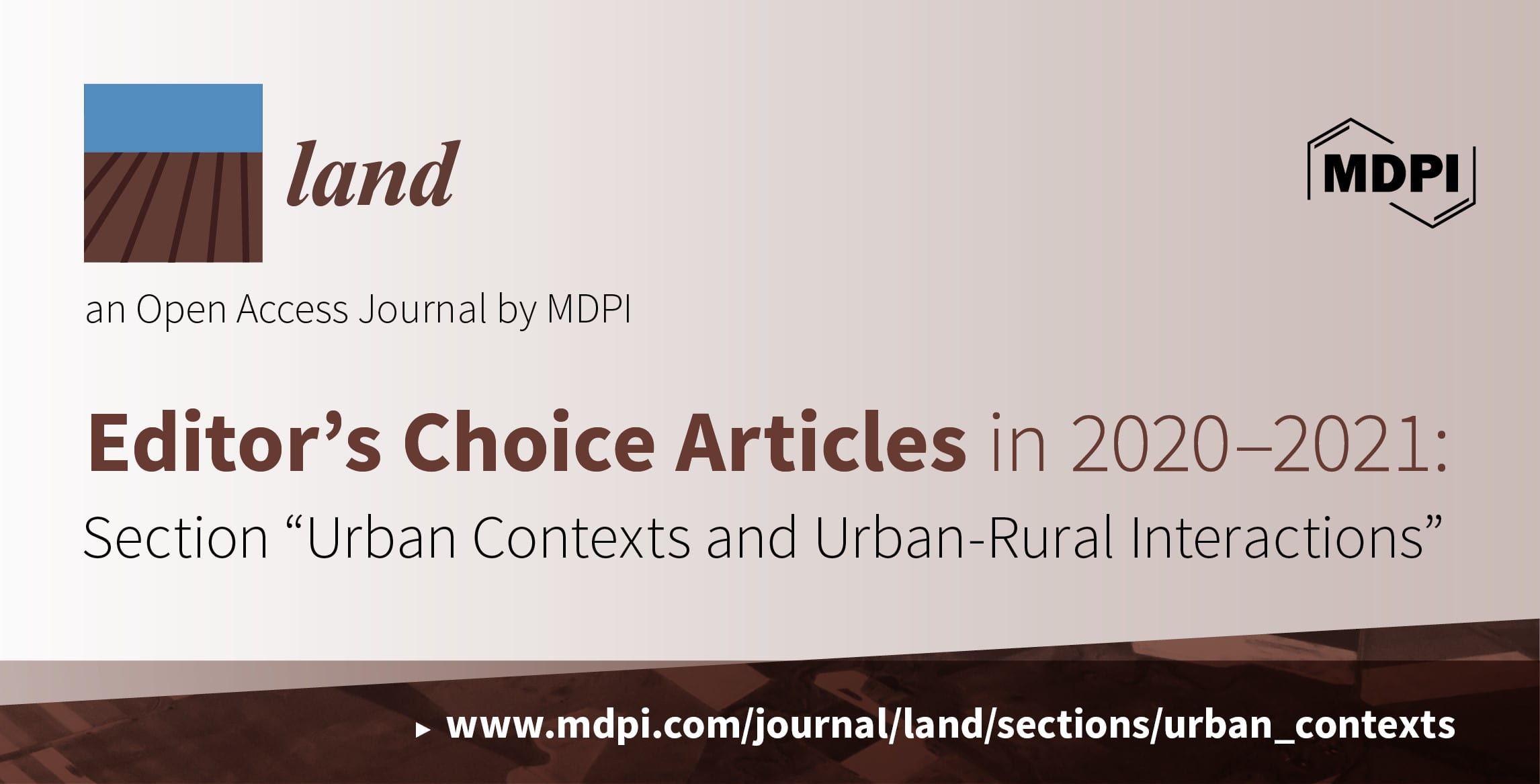
Land (ISSN: 2073-445X, IF: 3.905) launched the “Urban Contexts and Urban-Rural Interactions” Section in November 2019. Prof. Dr. Dagmar Haase is now serving as the Section Editor-in-Chief. This Section welcomes contributions concerning both patterns and processes in urban landscapes and cities, as well as along the urban-rural gradient.
The Section is open to submissions dealing with urban land-use change, urbanization impacts on ecosystems and their services in cities, the future of peri-urbanization, the urban heat island, biodiversity aspects, wildlife and nature conservation in urban ecosystems and along urban boundaries, urban planning and governance of green infrastructure and nature-based solutions, sustainable cities, and the role of big data in urban social-ecological land research.
We are pleased to present the Editor’s Choice Articles of the Section “Urban Contexts and Urban-Rural Interactions” in 2020–2021, a carefully curated list of high-quality articles listed below:
1. “The Potential Supply and Demand of Farmers' Land Contract Rights Based on 697 Households in Four Provinces of China”
by Wujing Wang and Xingqing Ye
Land 2020, 9(3), 80; https://doi.org/10.3390/land9030080
Available online: https://www.mdpi.com/2073-445X/9/3/80
2. “Effects of Urbanization on Farmland Size and Diversified Farm Activities in Japan: an Analysis Based on the Land Parcel Database”
by Shingo Yoshida
Land 2020, 9(9), 315; https://doi.org/10.3390/land9090315
Available online: https://www.mdpi.com/2073-445X/9/9/315
3. “Ejidos, Urbanization, and the Production of Inequality in Formerly Agricultural Lands, Guadalajara, Mexico, 1975-2020”
by Leonardo Barleta, Mateo Carrillo, Zephyr Frank and Erik Steiner
Land 2020, 9(12), 526; https://doi.org/10.3390/land9120526
Available online: https://www.mdpi.com/2073-445X/9/12/526
4. “A Review of Urban Ecosystem Services Research in Southeast Asia”
by Karen T. Lourdes, Chris N. Gibbins, Perrine Hamel, Ruzana Sanusi, Badrul Azhar and Alex M. Lechner
Land 2021, 10(1), 40; https://doi.org/10.3390/land10010040
Available online: https://www.mdpi.com/2073-445X/10/1/40
5. “Linking Urban Tree Cover Change and Local History in a Post-Industrial City”
by Lara A. Roman, Indigo J. Catton, Eric J. Greenfield, Hamil Pearsall, Theodore S. Eisenman and Jason G. Henning
Land 2021, 10(4), 403; https://doi.org/10.3390/land10040403
Available online: https://www.mdpi.com/2073-445X/10/4/403
6. “Ecological Connectivity in Agricultural Green Infrastructure: Suggested Criteria for Fine Scale Assessment and Planning”
by Simone Valeri, Laura Zavattero and Giulia Capotorti
Land 2021, 10(8), 807; https://doi.org/10.3390/land10080807
Available online: https://www.mdpi.com/2073-445X/10/8/807
7. “Urban Naturalization For Green Spaces Using Soil Tillage, Herbicide Application, Compost Amendment And Native Vegetation”
by Jaime Aguilar Rojas, Amalesh Dhar and M. Anne Naeth
Land 2021, 10(8), 854; https://doi.org/10.3390/land10080854
Available online: https://www.mdpi.com/2073-445X/10/8/854
8. “Research on Tourism, Indigenous Peoples and Economic Development: A Missing Component”
by Richard Butler
Land 2021, 10(12), 1329; https://doi.org/10.3390/land10121329
Available online: https://www.mdpi.com/2073-445X/10/12/1329
We would like to take this opportunity to thank all of the research groups that submitted to Land (ISSN: 2073-445X). We would appreciate it if you could circulate this document among your colleagues and network. Furthermore, the following opportunities for collaboration may be of interest:
Submitting a manuscript:
This Section is currently open for submissions. Papers may be submitted via the following link: https://www.mdpi.com/user/manuscripts/upload/?journal=land.
Launching a Special Issue:
You have the opportunity to propose hot topics and edit a Special Issue together with experts in the field: https://www.mdpi.com/journalproposal/sendproposalspecialissue/land.
Joining the Editorial Board:
If you are an active researcher in the field of land and are interested in joining the Editorial Board, please do not hesitate to contact the Land Editorial Office (land@mdpi.com) with the following two files provided:
- A full academic CV;
- A short cover letter that details your interest in and enthusiasm for the position.
Land Editorial Office
4 October 2022
Welcoming New Editorial Board Members of Land
We are pleased to announce that twenty-four new scholars have recently been appointed Editorial Board Members (EBMs) of the journal Land (ISSN: 2073-445X).
| New EBMs | Affiliations |
| Prof. Dr. Yung Yau | Lingnan University, China |
| Dr. Himlal Baral | Center for International Forestry Research (CIFOR), Indonesia |
| Prof. Dr. Zhigang Li | Wuhan University, China |
| Dr. Antonio César González-García | Incipit–Consejo Superior de Investigaciones Científicas, Spain |
| Prof. Dr. Rui Alexandre Castanho | 1. WSB University, Poland; 2. Universidad International de la Rioja, Spain |
| Dr. Laurent Marquer | University of Innsbruck, Austria |
| Prof. Dr. Chengbang An | Lanzhou University, China |
| Dr. Chang Liang | Environment and Climate Change Canada, Canada |
| Dr. Baolin Li | 1. Chinese Academy of Sciences, China; 2. University of Chinese Academy of Sciences, China; 3. Jiangsu Center of Collaborative Innovation in Geographical Information Resource Development and Application, China |
| Dr. James T. Anderson | Clemson University, Georgetown, USA |
| Prof. Dr. Jianjun Zhang | China University of Geosciences (Beijing), China |
| Dr. Bao-Luo Ma | Ottawa Research and Development Centre, Canada |
| Prof. Dr. Meine Van Noordwijk | 1. Universitas Brawijaya, Indonesia; 2. Centre for International Forestry Research and World Agroforestry (CIFOR-ICRAF), Indonesia; 3. Wageningen University and Research, the Netherlands |
| Dr. Dionisios Gasparatos | Agricultural University of Athens, Greece |
| Dr. Hector A. Orengo | Catalan Institute of Classical Archaeology, Spain |
| Dr. Pedro Berliner | Ben-Gurion University of the Negev, Israel |
| Prof. Dr. Dong Jiang | Chinese Academy of Sciences, China |
| Prof. Dr. Ulysses Paulino Albuquerque | Universidade Federal de Pernambuco, Brazil |
| Prof. Dr. Guangqing Chi | The Pennsylvania State University, University Park, USA |
| Dr. Yang Xiao | Tongji University, China |
| Dr. Francisco J. Escobedo | USDA Forest Service, USA |
| Prof. Dr. Xuesong Kong | Wuhan University, China |
| Dr. Lulseged D. Tamene | International Center for Tropical Agriculture (CIAT), Ethiopia |
| Prof. Dr. Zhenshan Yang | Chinese Academy of Sciences, China |
Further details about the Editorial Board can be found at https://www.mdpi.com/journal/land/editors.
We wish them every success in both their research and in the development of the journal.
Additionally, Land is recruiting prestigious scholars from around the world to join our Editorial Board. To apply for this position, recommend potential candidates, or request further information, please contact the Land Editorial Office (land@mdpi.com) with the following two files attached:
- A full academic CV;
- A short cover letter that details your interest in and enthusiasm for the position.
Land Editorial Office
28 September 2022
Peer Review Week 2022 – Research Integrity: Creating and Supporting Trust in Research
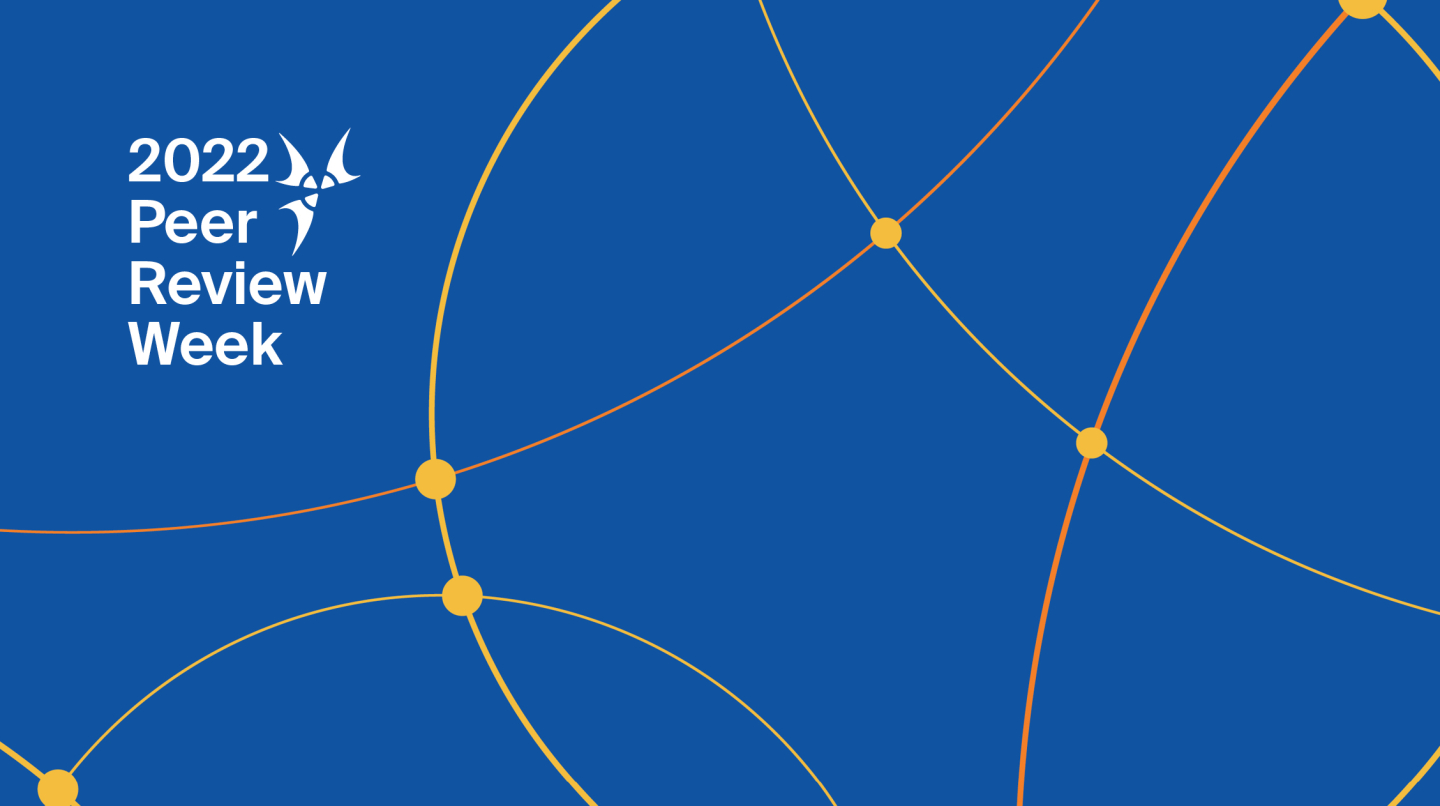
Peer Review Week began 19 September 2022 under the theme of “Research Integrity: Creating and Supporting Trust in Research”. Through various blog articles, podcast, and webinar, we discussed this crucial subject throughout the week, celebrating the essential role peer review plays in maintaining research quality.
To begin, we held a Webinar on the topic. Professor Peter W. Choate and Dr. Emmanuel Obeng-Gyasi joined Dr. Ioana Craciun, one of MDPI’s scientific officers, for an in-depth discussion.
We invite you to view the event recording:
During the week, the MDPI Blog in a series articles highlighted how good Peer Review safeguards research integrity. The following topics were covered:
- Peer Review Week 2022
- Research Integrity
- What We’ve Learned About Peer Review Reports
- 4 Steps to the Perfect Peer Review Report
- How to Write the Perfect Peer Review Report: An Interview
- Inviting Great Peer Reviewers
In a new edition of Insight Faster, an MDPI podcast, we were delighted to talk to the co-chairs of the Peer Review Week committee, Jayashree Rajagopalan (Senior Manager of Global Community Engagement for CACTUS) and Danielle Padula (Head of Marketing and Community Development at Scholastica) to get their take on this year’s event and its related topics.
You can find the Podcast here.
We hope you enjoy the contents!
23 September 2022
Meet Us at the AGU Fall Meeting 2022 (AGU22), 12–16 December 2022, Online or On-Site in Chicago, IL, USA
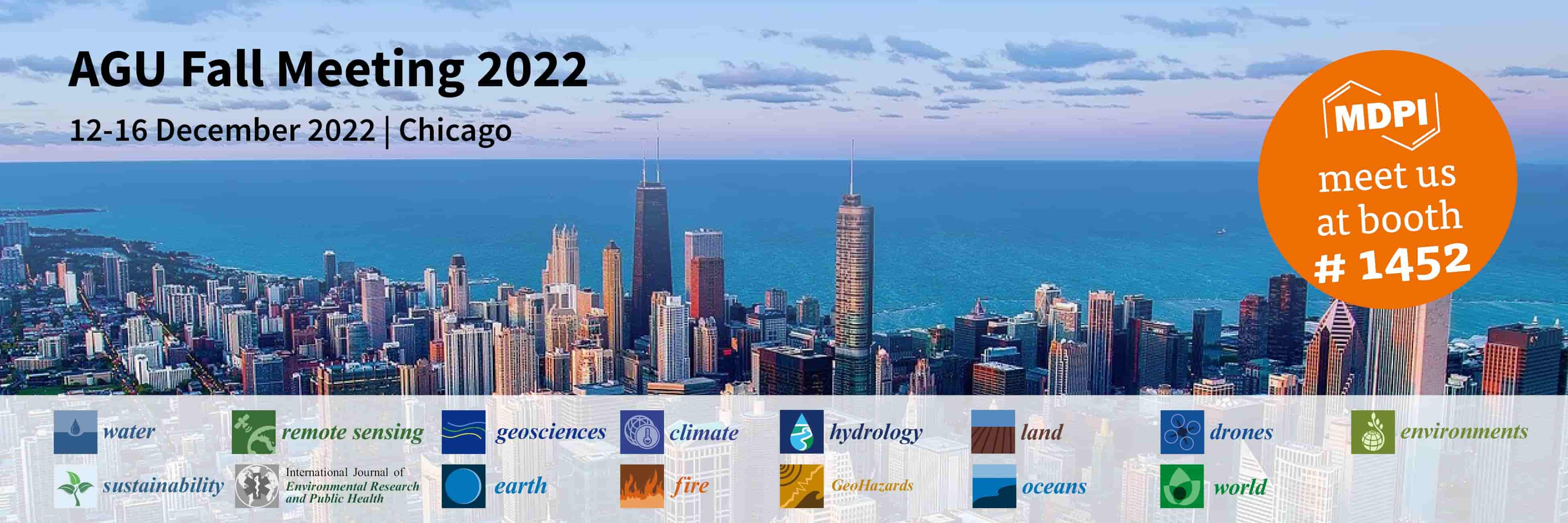
MDPI will be attending the AGU Fall Meeting 2022 (AGU22), held in Chicago and online, from 12 to 16 December 2022. The AGU Fall Meeting is the most influential event in the world dedicated to the advancement of Earth and space sciences. The conference unites the Earth and space science community to share findings, connect like-minded scientists from around the world, and advance our profession and shared passion for the impact of science. Researchers, scientists, educators, students, policymakers, enthusiasts, journalists, and communicators attend the AGU Fall Meeting to better understand our planet and environment, and our role in preserving its future.
During this conference, MDPI (at booth #1452) will welcome researchers from different backgrounds to visit and share their latest views and research with us.
The following MDPI journals will be represented:
- Water (leading journal);
- Remote Sensing (leading journal);
- Geosciences;
- Climate;
- Hydrology;
- Land;
- Drones;
- Environments;
- Sustainability;
- IJERPH;
- Earth;
- Fire;
- GeoHazards;
- Oceans;
- World.
If you plan on attending this conference, feel free to stop by our booth at #1452. Our delegates look forward to meeting you in person to answer any questions you may have.
For more information about the conference, please see the following link: https://igs.org/event/agu22/.
28 June 2022
2021 Impact Factors - Released
The 2021 citation metrics have been released in the Journal Citation Reports (JCR), and we’re pleased to announce the following results for MDPI journals:

| Journal | Impact Factor | Rank | Category |
| Antioxidants | 7.675 | Q1 | Food Science & Technology |
| Biochemistry & Molecular Biology | |||
| Chemistry, Medicinal | |||
| Cells | 7.666 | Q2 | Cell Biology |
| Nutrients | 6.706 | Q1 | Nutrition & Dietetics |
| Cancers | 6.575 | Q1 | Oncology |
| Pharmaceutics | 6.525 | Q1 | Pharmacology & Pharmacy |
| International Journal of Molecular Sciences | 6.208 | Q1 | Biochemistry & Molecular Biology |
| Q2 | Chemistry, Multidisciplinary | ||
| Marine Drugs | 6.085 | Q1 | Chemistry, Medicinal |
| Pharmacology & Pharmacy | |||
| Biomolecules | 6.064 | Q2 | Biochemistry & Molecular Biology |
| Batteries * | 5.938 | Q2 | Electrochemistry |
| Energy & Fuels | |||
| Materials Science, Multidisciplinary | |||
| Viruses | 5.818 | Q2 | Virology |
| Biosensors | 5.743 | Q1 | Chemistry, Analytical |
| Instruments & Instrumentation | |||
| Q2 | Nanoscience & Nanotechnology | ||
| Journal of Fungi | 5.724 | Q1 | Mycology |
| Q2 | Microbiology | ||
| Nanomaterials | 5.719 | Q1 | Physics, Applied |
| Q2 | Chemistry, Multidisciplinary | ||
| Materials Science, Multidisciplinary | |||
| Nanoscience & Nanotechnology | |||
| Metabolites | 5.581 | Q2 | Biochemistry & Molecular Biology |
| Foods | 5.561 | Q1 | Food Science & Technology |
| Drones * | 5.532 | Q2 | Remote Sensing |
| Remote Sensing | 5.349 | Q1 | Geosciences, Multidisciplinary |
| Imaging Science & Photographic Technology | |||
| Q2 | Remote Sensing | ||
| Environmental Sciences | |||
| Journal of Theoretical and Applied Electronic Commerce Research | 5.318 | Q2 | Business |
| Antibiotics | 5.222 | Q1 | Pharmacology & Pharmacy |
| Q2 | Infectious Diseases | ||
| Pharmaceuticals | 5.215 | Q1 | Pharmacology & Pharmacy |
| Q2 | Chemistry, Medicinal | ||
| Biology | 5.168 | Q1 | Biology |
| Fermentation | 5.123 | Q2 | Biotechnology & Applied Microbiology |
| Toxins | 5.075 | Q1 | Toxicology |
| Q2 | Food Science & Technology | ||
| Bioengineering * | 5.046 | Q2 | Engineering, Biomedical |
| Polymers | 4.967 | Q1 | Polymer Science |
| Journal of Clinical Medicine | 4.964 | Q2 | Medicine, General & Internal |
| Vaccines | 4.961 | Q2 | Immunology |
| Medicine, Research & Experimental | |||
| Molecules | 4.927 | Q2 | Chemistry, Multidisciplinary |
| Biochemistry & Molecular Biology | |||
| Microorganisms | 4.926 | Q2 | Microbiology |
| Journal of Functional Biomaterials * | 4.901 | Q2 | Engineering, Biomedical |
| Materials Science, Biomaterials | |||
| Biomedicines | 4.757 | Q2 | Medicine, Research & Experimental |
| Pharmacology & Pharmacy | |||
| Biochemistry & Molecular Biology | |||
| Plants | 4.658 | Q1 | Plant Sciences |
| International Journal of Environmental Research and Public Health | 4.614 | Q1 | Public, Environmental & Occupational Health (SSCI) |
| Q2 | Public, Environmental & Occupational Health (SCIE) | ||
| Environmental Sciences (SCIE) | |||
| Membranes | 4.562 | Q1 | Polymer Science |
| Q2 | Engineering, Chemical | ||
| Materials Science, Multidisciplinary | |||
| Chemistry, Physical | |||
| Pathogens | 4.531 | Q2 | Microbiology |
| Catalysts | 4.501 | Q2 | Chemistry, Physical |
| Toxics | 4.472 | Q2 | Toxicology |
| Environmental Sciences | |||
| Gels | 4.432 | Q1 | Polymer Science |
| Journal of Cardiovascular Development and Disease | 4.415 | Q2 | Cardiac & Cardiovascular Systems |
| Chemosensors | 4.229 | Q1 | Instruments & Instrumentation |
| Q2 | Chemistry, Analytical | ||
| Q3 | Electrochemistry | ||
| Genes | 4.141 | Q2 | Genetics & Heredity |
| Diagnostics | 3.992 | Q2 | Medicine, General & Internal |
| Agronomy | 3.949 | Q1 | Agronomy |
| Plant Sciences | |||
| Land | 3.905 | Q2 | Environmental Studies |
| Sustainability | 3.889 | Q2 | Environmental Sciences (SCIE) |
| Environmental Studies (SSCI) | |||
| Q3 | Green & Sustainable Science & Technology (SCIE) | ||
| Q4 | Green & Sustainable Science & Technology (SSCI) | ||
| Sensors | 3.847 | Q2 | Instruments & Instrumentation |
| Chemistry, Analytical | |||
| Engineering, Electrical & Electronic | |||
| Materials | 3.748 | Q1 | Metallurgy & Metallurgical Engineering |
| Q2 | Physics, Applied | ||
| Physics, Condensed Matter | |||
| Q3 | Materials Science, Multidisciplinary | ||
| Chemistry, Physical | |||
| Biomimetics * | 3.743 | Q2 | Engineering, Multidisciplinary |
| Q3 | Materials Science, Biomaterials | ||
| Tropical Medicine and Infectious Disease * | 3.711 | Q1 | Tropical Medicine |
| Q2 | Parasitology | ||
| Q3 | Infectious Diseases | ||
| Lubricants * | 3.584 | Q2 | Engineering, Mechanical |
| Fractal and Fractional | 3.577 | Q1 | Mathematics, Interdisciplinary Applications |
| Water | 3.530 | Q2 | Water Resources |
| Q3 | Environmental Sciences | ||
| Micromachines | 3.523 | Q2 | Instruments & Instrumentation |
| Physics, Applied | |||
| Chemistry, Analytical | |||
| Q3 | Nanoscience & Nanotechnology | ||
| Journal of Personalized Medicine | 3.508 | Q2 | Medicine, General & Internal |
| Health Care Sciences & Services | |||
| Agriculture | 3.408 | Q1 | Agronomy |
| Processes | 3.352 | Q2 | Engineering, Chemical |
| Separations | 3.344 | Q2 | Chemistry, Analytical |
| Magnetochemistry | 3.336 | Q2 | Chemistry, Inorganic & Nuclear |
| Q3 | Chemistry, Physical | ||
| Materials Science, Multidisciplinary | |||
| Brain Sciences | 3.333 | Q3 | Neurosciences |
| Buildings | 3.324 | Q2 | Construction & Building Technology |
| Engineering, Civil | |||
| Forests | 3.282 | Q1 | Forestry |
| Energies | 3.252 | Q3 | Energy & Fuels |
| Life | 3.251 | Q2 | Biology |
| Coatings | 3.236 | Q2 | Materials Science, Coatings & Films |
| Physics, Applied | |||
| Q3 | Materials Science, Multidisciplinary | ||
| Animals | 3.231 | Q1 | Agriculture, Dairy & Animal Science |
| Veterinary Sciences | |||
| Journal of Intelligence * | 3.176 | Q2 | Psychology, Multidisciplinary |
| Fishes | 3.170 | Q1 | Marine & Freshwater Biology |
| Q2 | Fisheries | ||
| Healthcare | 3.160 | Q2 | Health Policy & Services (SSCI) |
| Health Care Sciences & Services (SCIE) | |||
| Inorganics * | 3.149 | Q2 | Chemistry, Inorganic & Nuclear |
| Insects | 3.139 | Q1 | Entomology |
| Atmosphere | 3.110 | Q3 | Meteorology & Atmospheric Sciences |
| Environmental Sciences | |||
| Current Oncology | 3.109 | Q3 | Oncology |
| ISPRS International Journal of Geo-Information | 3.099 | Q2 | Geography, Physical |
| Q3 | Computer Science, Information Systems | ||
| Remote Sensing | |||
| Diversity | 3.029 | Q2 | Biodiversity Conservation |
| Ecology | |||
| Tomography | 3.000 | Q3 | Radiology, Nuclear Medicine & Medical Imaging |
| Current Issues in Molecular Biology | 2.976 | Q3 | Biochemistry & Molecular Biology |
| Medicina | 2.948 | Q3 | Medicine, General & Internal |
| Symmetry | 2.940 | Q2 | Multidisciplinary Sciences |
| Horticulturae | 2.923 | Q1 | Horticulture |
| Machines | 2.899 | Q2 | Engineering, Mechanical |
| Engineering, Electrical & Electronic | |||
| Systems * | 2.895 | Q2 | Social Sciences, Interdisciplinary |
| Applied Sciences | 2.838 | Q2 | Engineering, Multidisciplinary |
| Physics, Applied | |||
| Q3 | Chemistry, Multidisciplinary | ||
| Materials Science, Multidisciplinary | |||
| Children | 2.835 | Q2 | Pediatrics |
| Minerals | 2.818 | Q2 | Mining & Mineral Processing |
| Mineralogy | |||
| Geochemistry & Geophysics | |||
| Universe | 2.813 | Q2 | Astronomy & Astrophysics |
| Q3 | Physics, Particles & Fields | ||
| Journal of Marine Science and Engineering | 2.744 | Q1 | Engineering, Marine |
| Q2 | Oceanography | ||
| Engineering, Ocean | |||
| Entropy | 2.738 | Q2 | Physics, Multidisciplinary |
| Fire * | 2.726 | Q2 | Forestry |
| Q3 | Ecology | ||
| Metals | 2.695 | Q2 | Metallurgy & Metallurgical Engineering |
| Q3 | Materials Science, Multidisciplinary | ||
| Electronics | 2.690 | Q3 | Engineering, Electrical & Electronic |
| Computer Science, Information Systems | |||
| Physics, Applied | |||
| Crystals | 2.670 | Q2 | Crystallography |
| Q3 | Materials Science, Multidisciplinary | ||
| Aerospace | 2.660 | Q1 | Engineering, Aerospace |
| Mathematics | 2.592 | Q1 | Mathematics |
| Photonics | 2.536 | Q3 | Optics |
| Actuators | 2.523 | Q2 | Instruments & Instrumentation |
| Q3 | Engineering, Mechanical | ||
| Veterinary Sciences | 2.518 | Q2 | Veterinary Sciences |
| Behavioral Sciences * | 2.286 | Q3 | Psychology, Multidisciplinary |
| Axioms * | 1.824 | Q2 | Mathematics, Applied |
For more information on Impact Factors and what it means to index academic journals, please visit our related blog posts.
* Journals given their first Impact Factor in 2022
Source: 2021 Journal Impact Factors, Journal Citation Reports TM (Clarivate, 2022)
13 June 2022
MDPI’s 2021 Young Investigator Awards in “Environmental & Earth Sciences”—Winners Announced
MDPI’s Young Investigator Awards recognize promising junior researchers, acknowledge their contributions, and enhance communication among scientists. We are proud to present the winners for the year 2021 in the “Environmental & Earth Sciences” category. The winners were selected by the journals’ editors.
We warmly congratulate the awarded young investigators for their outstanding contributions. MDPI will continue to provide support and recognition to the academic community.
- Shaojie Song, Harvard University, USA
- Francesco Galiano, Institute on Membrane Technology of the National Research Council, Italy
- Qilin Wang, University of Technology Sydney, Australia
- Christopher H. T. Lee, Nanyang Technological University, Singapore
International Journal of Environmental Research and Public Health:
- Grace Vincent, Central Queensland University, Australia
- Antony Burnham, Australian National University, Australia
- Celso Henrique Leite Silva Junior, National Institute for Space Research – INPE, Brasil; Agricultural Engineering Department of the State University of Maranhão – UEMA, Brazil
- Baojie He, Chongqing University, China
- Stefanos Giannakis, Polytechnic University of Madrid, Spain
13 June 2022
MDPI’s 2021 Outstanding Reviewer Awards in “Environmental & Earth Sciences”—Winners Announced
In order to acknowledge our reviewers, who so generously dedicate their time to reviewing papers and demonstrate diligence, professionalism, and timeliness when reviewing manuscripts, MDPI journals regularly offer outstanding reviewer awards to scholars who participate in the peer-review process.
We are proud to recognize winners for the year 2021 in the “Environmental & Earth Sciences” category for their outstanding contributions among extensive competition by presenting them with an Outstanding Reviewer Award.
We would like to take this opportunity to congratulate all the winners on their achievement. MDPI will continue to provide support and recognition to the academic community.
- Hristo Chervenkov, National Institute of Meteorology and Hydrology, Bulgaria
- Jouni Räisänen, University of Helsinki, Finland
- Piotr F. Borowski, Warsaw University of Life Sciences, Poland
- Elena Lucchi, Institute for Renewable Energy, Italy
- Marcin Dębowski, University of Warmia and Mazury in Olsztyn, Poland
- Miroslav Variny, Slovak University of Technology in Bratislava, Slovakia
- Piotr F. Borowski, Warsaw University of Life Sciences, Poland
- Vedran Mrzljak, University of Rijeka, Croatia
- Tomasz Oszako, Forest Research Institute, Poland
- Stelian Alexandru Borz, Transilvania University of Brasov, Romania
- Maricar Aguilos, North Carolina State University, USA
- Narayan Bhusal, Seoul National University, South Korea
- Dave Waters, University of Oxford, UK
International Journal of Environmental Research and Public Health:
- Anuli Njoku, Southern Connecticut State University, USA
- Haruna Musa Moda, Manchester Metropolitan University, UK
- Jesús Molina-Mula, University of BalearicIsland, Spain
- Katharina Diehl, Friedrich-Alexander-University of Erlangen-Nuremberg, Germany
- Katarzyna Tomaszek, Pedagogical University of Kracow, Poland
- Matteo Nioi, University of Cagliari, Italy
- Pablo A. Cantero-Garlito, Universidad de Castilla La Mancha, Spain
- Seoyong Kim, Ajou University, South Korea
- Andrzej Adamski, University of Information Technology and Management, Poland
- Adrian Curto, Faculty of Medicine, University of Salamanca, Spain
- Arkaitz Castañeda Babarro, University of Deusto, Spain
- Álvaro Francisco Lopes De Sousa, Universidade Nova de Lisboa, Portugal
- Agata Gabryelska, Medical University of Lodz, Poland
- Ana Reyes Menéndez, Rey Juan Carlos University, Spain
- Bartosz Dalewski, Pomeranian Medical University in Szczecin, Poland
- Chong Chen, Yamaguchi University Graduate School of Medicine, Japan
- Carla Maria Batista Ferreira Pires, CBIOS-Universidade Lusófona de Humanidades e Tecnologias-Escola de Ciências e Tecnologias da Saúde, Portugal
- Claudia Pisanu, University of Cagliari, Italy
- Emmanuel Obeng-Gyasi, North Carolina Agricultural and Technical State University, USA
- Faisal F. Hakeem, King’s College London, UK
- Francisco Javier Fernández Carrasco, Punta de Europa Hospital, Spain
- Haewon Byeon, Inje University, South Korea
- HuiJun Chih, Curtin University, Australia
- Jerónimo Aragón Vela, University of Granada, Spain
- Joana Costa, University of Aveiro, Portugal,
- Joanne Lloyd, University of Wolverhampton, UK
- José Luis Romero-Bejar, University of Granada, Spain
- Laura Nathans, Human Development and Family Studies, Penn State Scranton, USA
- Mateusz Jankowski, Centre of Postgraduate Medical Education, Poland
- Matteo Riccò, Azienda USL-IRCCS di Reggio Emilia, Italy
- Nicola Döring, Technische Universität Ilmenau, Germany
- Nora Suleiman-Martos, University of Granada, Spain
- Russell Kabir, Anglia Ruskin University, UK
- Roy McConkey, University of Ulster, UK
- Sunhee Kim, Ajou University, South Korea
- Sol García-Germán, Centro de Estudios e Investigación para la Gestión de Riesgos Agrarios y Medioambientalesdisabled, Spain
- Sebastian Rutkowski, Opole University of Technology, Poland
- Tamás Berki, University of Szeged, Hungary
- Terence Moriarty, University of Northern Iowa, USA
- Pedro Antonio Martín Cervantes, University of Almería, La Cañada de San Urbano, Spain
ISPRS International Journal of Geo-Information:
- Lemenkova Polina, Université Libre de Bruxelles, Belgium
- Andrew Newton, Nottingham Trent University, UK
- Dennis Edler, Ruhr University Bochum, Germany
- Lukáš Herman, Masaryk University, Czech Republic
- Marcela Bindzarova Gergelova, Technical University of Kosice, Slovakia
Land:
- Rahul Datta, Mendel University in Brno, Czech Republic
- Dirk H.R. Spennemann, Charles Sturt University, Australia
- Raimundo Jimenez-Ballesta, (Retired recently) Autonoma University of Madrid, Spain
- Veraldo Liesenberg, Santa Catarina State University, Brazil
- Yady Tatiana Solano-Correa, University of Cauca, Colombia
- Francesco Marinello, University of Padova, Italy
- Pedro Melo-Pinto, Universidade de Trás-os-Montes e Alto Douro, Portugal
- Ignacio Bosch, Universitat Politènica de València, Spain
- Juan Soria, University of Valencia, Spain
- Chiman Kwan, Signal Processing, Inc., USA
- Benoit Vozel, University of Rennes, France
- Giuseppe Casula, National Institute of Geophysics and Volcanology Unit of Bologna, Italy
- Simone Cosoli, The University of Western Australia, Australia
- Maria Economou-Eliopoulos, University of Athens, Greece
- Cynthia Rider, National Institute of Environmental Health Sciences, USA
13 June 2022
MDPI’s 2021 Travel Awards in “Environmental & Earth Sciences”—Winners Announced
We are proud to recognize the winners of MDPI’s 2021 Travel Awards in the “Environmental & Earth Sciences” category for their outstanding presentations and to present them with the prize.
MDPI journals regularly offer travel awards to encourage talented junior scientists to present their latest research at academic conferences in specific fields, which helps to increase their influence.
The winners mentioned below were carefully selected by the journal editors based on an outline of their research and the work to be presented at an academic conference.
We would like to warmly congratulate the Travel Awards winners for the year 2021 and wish them the greatest success with their future research endeavors. MDPI will continue to enhance communication among scientists.
- Charbel Harb, Civil and Environmental Engineering, Virginia Tech, USA
- Jibran Khan, Aarhus University, Roskilde, Denmark
- Agostino Niyonkuru Meroni, Politecnico di Milano, Italy
- Platon Patlakas, National and Kapodistrian University of Athens, Greece
- Nnaemeka Vincent Emodi, University of Tasmania, Australia
- Irene Poza-Casado, Universidad de Valladolid, Spain
- Pipiet Larasatie, Oregon State University, USA
- Tania L. Maxwell, French National Research Institute for Agriculture, Food and Environment (INRAE), France
- Georgia Papacharalampous, Roma Tre University, Italy
- Mattei Alexandra, University of Corsica, France
International Journal of Environmental Research and Public Health:
- Danila Azzolina, University of Eastern Piedmont, Italy
- Kelvin Fong, Yale University, USA
- Levi Frehlich, University of Calgary, Canada
- Garyfallos Konstantinoudis, Imperial College London, UK
ISPRS International Journal of Geo-Information:
- Junghwan Kim, University of Illinois at Urbana-Champaign, USA
- Xuke Hu, Institute of Data Science, German Aerospace Center (DLR), Germany
Land:
- Álvaro Castilla Beltrán, University of La Laguna, Spain
- Lauren Nerfa, University of Hawaiʻi, USA
- Amen Al-Yaari, Sorbonne University, France
- Meng Lu, Utrecht University, Netherlands
- Alessandro Lenci, University of Bologna, Italy
- Evangelia Georgantzia, Liverpool John Moores University, UK
- Sayyed Rasoul Khayyam Nekouei, University of New South Wales (UNSW), Australia
- Georgia A. Papacharalampous, Roma Tre University, Italy
- Raquel Filipa da Costa Viveiros, NOVA University of Lisbon, Portugal
- Rajesh Pathak, South Dakota State University, USA
- Nnanake-Abasi Okon Offiong, University of Uyo, Nigeria
- Tonni Agustiono Kurniawan, Polytechnic of Health, Indonesia
- Shawna Andrea Foo, Arizona State University, USA
13 June 2022
MDPI’s 2021 Best Paper Awards in “Environmental & Earth Sciences”—Winners Announced
The purpose of our Best Paper Awards is to promote and recognize the most impactful contributions published within MDPI journals.
The editors of each journal carefully selected reviews and research papers through a rigorous judging process based on criteria such as the scientific merit, overall impact, and the quality of presentation of the papers published in the journal last year.
We are honored to present the winners in the subject areas of “Environmental & Earth Sciences”, who were selected amongst extensive competition, and congratulate the authors for their outstanding scientific publications.
MDPI will continue to provide support and recognition to the academic community.
- “Distinguishing between Deep-Water Sediment Facies: Turbidites, Contourites and Hemipelagites”
by Dorrik Stow and Zeinab Smillie
Geosciences 2020, 10(2), 68. https://doi.org/10.3390/geosciences10020068 - “Review of Explosive Hydrovolcanism”
by Károly Németh and Szabolcs Kósiks
Geosciences 2020, 10(2), 44. https://doi.org/10.3390/geosciences10020044
- “A Review on Deep Learning Techniques for 3D Sensed Data Classification”
by David Griffiths and Jan Boehm
Remote Sens. 2019, 11(12), 1499. https://doi.org/10.3390/rs11121499 - “Satellite Remote Sensing of Precipitation and the Terrestrial Water Cycle in a Changing Climate”
by Vincenzo Levizzani and Elsa Cattani
Remote Sens. 2019, 11(19), 2301. https://doi.org/10.3390/rs11192301 - “Evaluation of Different Machine Learning Methods and Deep-Learning Convolutional Neural Networks for Landslide Detection”
by Omid Ghorbanzadeh, Thomas Blaschke, Khalil Gholamnia, Sansar Raj Meena, Dirk Tiede and Jagannath Aryal
Remote Sens. 2019, 11(2), 196. https://doi.org/10.3390/rs11020196 - “An Integrated View of Greenland Ice Sheet Mass Changes Based on Models and Satellite Observations”
by Ruth Mottram, Sebastian B. Simonsen, Synne Høyer Svendsen, Valentina R. Barletta, Louise Sandberg Sørensen, Thomas Nagler, Jan Wuite, Andreas Groh, Martin Horwath, Job Rosier, Anne Solgaard, Christine S. Hvidberg and Rene Forsberg
Remote Sens. 2019, 11(12), 1407. https://doi.org/10.3390/rs11121407 - “UAV-Based High Resolution Thermal Imaging for Vegetation Monitoring, and Plant Phenotyping Using ICI 8640 P, FLIR Vue Pro R 640, and thermoMap Cameras”
by Vasit Sagan, Maitiniyazi Maimaitijiang, Paheding Sidike, Kevin Eblimit, Kyle T. Peterson, Sean Hartling, Flavio Esposito, Kapil Khanal, Maria Newcomb, Duke Pauli, Rick Ward, Felix Fritschi, Nadia Shakoor and Todd Mockler
Remote Sens. 2019, 11(3), 330. https://doi.org/10.3390/rs11030330
- “A Review of Biomonitoring of Phthalate Exposures”
by Wang, Yu, Hongkai Zhu and Kurunthachalam Kannan
Toxics 2019, 7(2), 21; https://doi.org/10.3390/toxics7020021 - “Trace Element Uptake by Herbaceous Plants from the Soils at a Multiple Trace Element-Contaminated Site”
by Nworie, Obinna E., Junhao Qin and Chuxia Lin
Toxics 2019, 7(1), 3; https://doi.org/10.3390/toxics7010003
- “Water Quality Indices: Challenges and Application Limits in the Literature”
by Moez Kachroud, Fabienne Trolard, Mohamed Kefi, Sihem Jebari and Guilhem Bourrié
Water 2019, 11(2), 361. https://doi.org/10.3390/w11020361 - “A Brief Review of Random Forests for Water Scientists and Practitioners and Their Recent History in Water Resources”
by Hristos Tyralis, Georgia Papacharalampous and Andreas Langousis
Water 2019, 11(5), 910. https://doi.org/10.3390/w11050910 - “The Use of Non-Conventional Water Resources as a Means of Adaptation to Drought and Climate Change in Semi-Arid Regions: South-Eastern Spain”
by Álvaro-Francisco Morote, Jorge Olcina and María Hernández
Water 2019, 11(1), 93. https://doi.org/10.3390/w11010093 - “Hydrological Effectiveness of an Extensive Green Roof in Mediterranean Climate”
by Stefania Anna Palermo, Michele Turco, Francesca Principato and Patrizia Piro
Water 2019, 11(7), 1378. https://doi.org/10.3390/w11071378 - “Forecasting Groundwater Table in a Flood Prone Coastal City with Long Short-term Memory and Recurrent Neural Networks”
by Benjamin D. Bowes, Jeffrey M. Sadler, Mohamed M. Morsy, Madhur Behl and Jonathan L. Goodall
Water 2019, 11(5), 1098. https://doi.org/10.3390/w11051098 - “Effectiveness of Rainwater Harvesting Systems for Flood Reduction in Residential Urban Areas”
by Gabriele Frenib and Lorena Liuzzo
Water 2019, 11(7), 1389. https://doi.org/10.3390/w11071389
9 June 2022
2021 CiteScores - Released
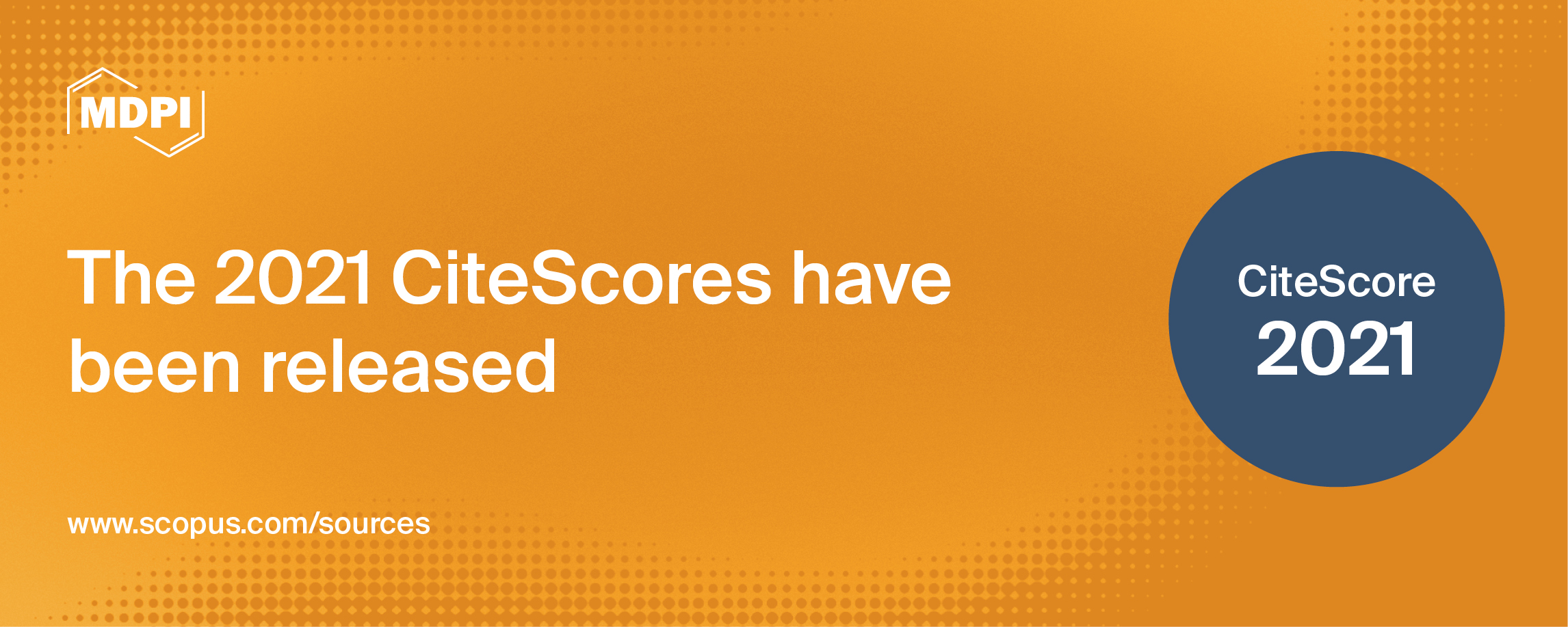
The 2021 citation metrics have been officially released in Scopus!
We are pleased to announce that 182 MDPI journals are included, of which:
● 21 journals received their first CiteScore.
● 85% of journals increased their CiteScore from 2020.
● 155 journals (85%) ranked above average, in at least one category.
The following 65 MDPI journals (36%) ranked among the top 25% of journals, in at least one category:
|
Journal |
CiteScore |
Quartile |
Category |
|
10.1 |
Q1 |
Genetics |
|
|
10.0 |
Q1 |
Biomedical Engineering |
|
|
8.1 |
Q1 |
Pharmacology, Toxicology and Pharmaceutics (miscellaneous) |
|
|
7.9 |
Q1 |
Electrical and Electronic Engineering |
|
|
7.9 |
Q1 |
Nutrition and Dietetics |
|
|
7.4 |
Q1 |
General Earth and Planetary Sciences |
|
|
7.2 |
Q1 |
Computer Science Applications |
|
|
6.9 |
Q1 |
Inorganic Chemistry |
|
|
6.9 |
Q1 |
Computer Networks and Communications |
|
|
6.7 |
Q1 |
General Biochemistry, Genetics and Molecular Biology |
|
|
6.6 |
Q1 |
General Chemical Engineering |
|
|
6.6 |
Q1 |
Health, Toxicology and Mutagenesis |
|
|
6.6 |
Q1 |
Infectious Diseases |
|
|
6.5 |
Q1 |
Food Science |
|
|
6.5 |
Q1 |
Civil and Structural Engineering |
|
|
6.4 |
Q1 |
Nature and Landscape Conservation |
|
|
6.4 |
Q1 |
Instrumentation |
|
|
6.1 |
Q1 |
Management Information Systems |
|
|
5.9 |
Q1 |
Chemistry (miscellaneous) |
|
|
5.7 |
Q1 |
Polymers and Plastics |
|
|
5.6 |
Q1 |
Engineering (miscellaneous) |
|
|
5.5 |
Q1 |
General Environmental Science |
|
|
5.5 |
Q1 |
Urban Studies |
|
|
5.4 |
Q2 |
Computer Networks and Communications |
|
|
5.3 |
Q1 |
Food Science |
|
|
5.3 |
Q1 |
Plant Science |
|
|
5.2 |
Q1 |
Ecology, Evolution, Behavior and Systematics |
|
|
5.2 |
Q1 |
General Engineering |
|
|
Journal of Open Innovation: Technology, Market, and Complexity |
5.1 |
Q1 |
Development |
|
5.0 |
Q1 |
Chemistry (miscellaneous) |
|
|
5.0 |
Q1 |
Control and Optimization |
|
|
5.0 |
Q1 |
Geography, Planning and Development |
|
|
5.0 |
Q1 |
Geography, Planning and Development |
|
|
4.9 |
Q1 |
Forestry |
|
|
4.9 |
Q1 |
Control and Optimization |
|
|
4.9 |
Q1 |
Soil Science |
|
|
4.8 |
Q1 |
General Earth and Planetary Sciences |
|
|
4.8 |
Q1 |
Mechanical Engineering |
|
|
4.8 |
Q1 |
Public Health, Environmental and Occupational Health |
|
|
4.8 |
Q1 |
Geography, Planning and Development |
|
|
International Journal of Environmental Research and Public Health |
4.5 |
Q1 |
Public Health, Environmental and Occupational Health |
|
4.5 |
Q1 |
Physical Therapy, Sports Therapy and Rehabilitation |
|
|
4.4 |
Q1 |
Mathematical Physics |
|
|
4.4 |
Q1 |
General Medicine |
|
|
4.3 |
Q1 |
General Mathematics |
|
|
4.2 |
Q1 |
Surgery |
|
|
4.1 |
Q1 |
Health Professions (miscellaneous) |
|
|
4.1 |
Q1 |
Plant Science |
|
|
4.0 |
Q1 |
General Engineering |
|
|
4.0 |
Q1 |
Forestry |
|
|
4.0 |
Q1 |
Education |
|
|
3.9 |
Q1 |
General Pharmacology, Toxicology and Pharmaceutics |
|
|
3.9 |
Q1 |
Applied Mathematics |
|
|
3.8 |
Q1 |
Development |
|
|
3.8 |
Q1 |
Architecture |
|
|
3.8 |
Q1 |
Metals and Alloys |
|
|
3.5 |
Q1 |
Communication |
|
|
3.4 |
Q1 |
General Social Sciences |
|
|
2.9 |
Q1 |
General Mathematics |
|
|
2.8 |
Q1 |
Analysis |
|
|
2.7 |
Q1 |
General Veterinary |
|
|
2.6 |
Q1 |
Algebra and Number Theory |
|
|
1.8 |
Q1 |
Conservation |
|
|
1.0 |
Q1 |
Religious Studies |
|
|
0.9 |
Q1 |
Philosophy |
Source: 2021 CiteScores™ (Elsevier)
12 April 2022
Prof. Dr. Benjamin Burkhard Appointed Section Editor-in-Chief of the Section “Landscape Ecology” in Land
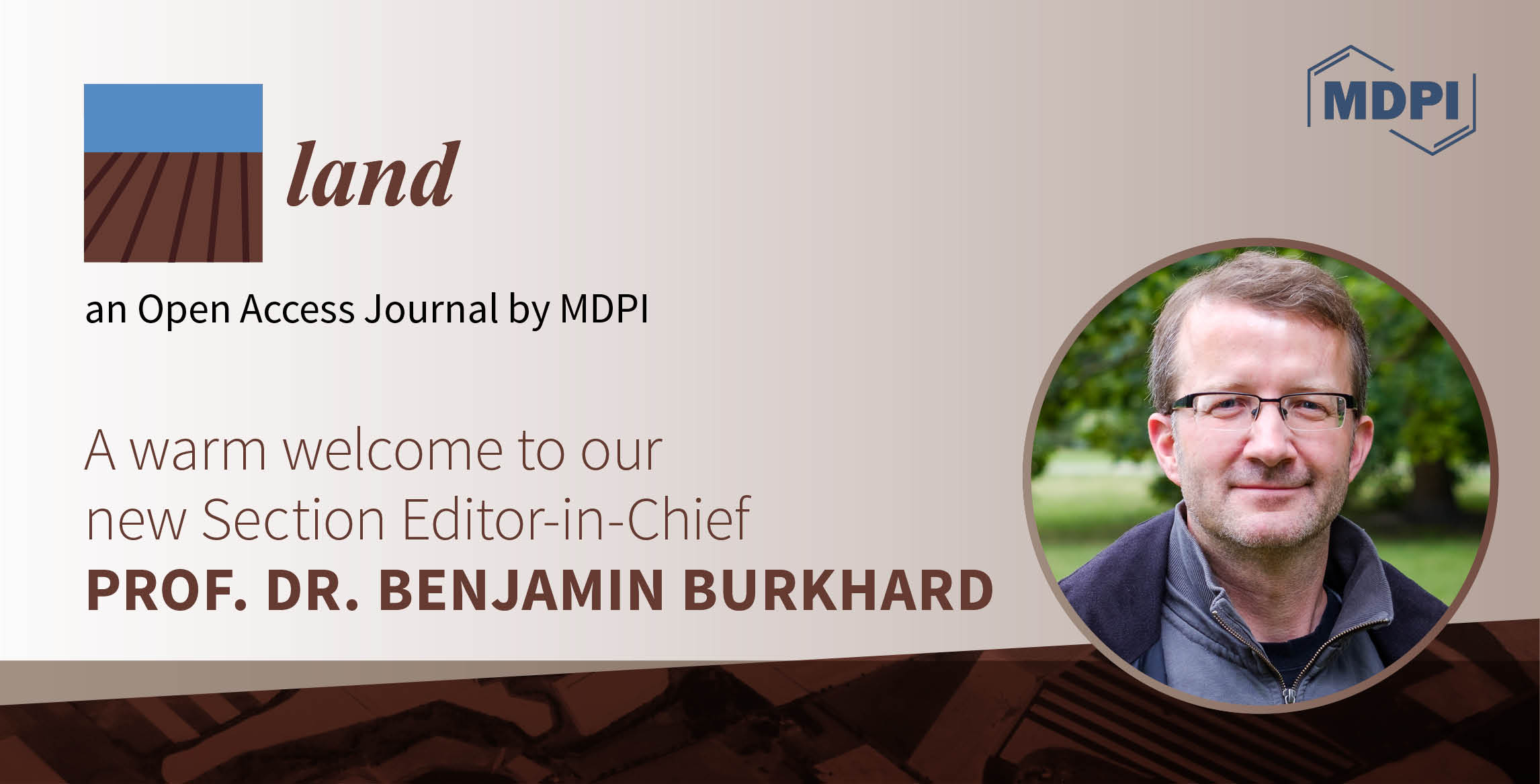
We are pleased to announce that Prof. Dr. Benjamin Burkhard has been appointed Editor-in-Chief of the Section “Landscape Ecology” in Land (ISSN 2073-445X, IF 3.398).
Prof. Dr. Benjamin Burkhard is a Full Professor of Physical Geography and a Director at the Institute of Physical Geography and Landscape Ecology at Leibniz University, Hannover. He is a geographer with a Ph.D. in ecology and is involved in many international and national projects, research initiatives and networks. His main research focus is on landscape ecology, mapping of ecosystem service supply and demand, and applications in environmental management. He is Co-Chair at the Ecosystem Services Partnership ESP and Vice President of the International Association of Landscape Ecology IALE.
The following is a short Q&A with Prof. Dr. Benjamin Burkhard, who shared his vision for the Section with us as well as his views on the research area:
1. What appealed to you about the journal that made you want to take the role as its Section Editor-in-Chief?
I like the open access strategy of the journal, relatively modest pricing and comparably quick article processing times.
2. What is your vision for the Section?
To be attractive for contributions from traditional as well as modern fields of landscape ecological research that deal with urgent questions of human–environmental interactions.
3. What does the future of this field of research look like, in your view?
Landscape ecology is a very traditional field of science, and relevant knowledge on the subject is urgently needed in times of increasing environmental problems and landscape degradation. Here, I think emerging transdisciplinary approaches and modern methods such as modelling, spatial sciences and big data analyses will increasingly push landscape ecology forward.
4. What do you think of the development of Open Access in the publishing field?
Open Access is urgently needed in order to make scientific outcomes available to anyone who is interested. Article Processing Charges need to be affordable for people from all countries while covering the publishers’ expenses.
5. Who should contribute to this Section?
Anyone dealing with landscapes, no matter the scales or types they are interested in.
We warmly welcome Prof. Dr. Benjamin Burkhard as the Section Editor-in-Chief of “Landscape Ecology”, and we look forward to achieving many milestones under his leadership.
18 March 2022
Recruiting Editorial Board Members for the Section “Land Innovations—Data and Machine Learning” of Land
Land (ISSN: 2073-445X) is an international and cross-disciplinary, peer-reviewed, open access journal of land system science, landscape, soil–sediment–water systems, urban study, land–climate interactions, water–energy–land–food (WELF) nexus, biodiversity research and health nexus, land modeling and data processing, ecosystem services, multifunctionality and sustainability, etc., published monthly online by MDPI. It is the only open access journal covering all aspects of land science, indexed within Scopus, SSCI (Web of Science), AGRICOLA, AGRIS, GeoRef, RePEc, and many other databases. Land has received an increased CiteScore (2020 Scopus data) of 3.0, and its 2020 Impact Factor is 3.398.
Land’s new Section “Land Innovations—Data and Machine Learning” (https://www.mdpi.com/journal/land/sections/land_innovations_data_machine_learning) is now recruiting Editorial Board Members.
The main responsibilities of the Section Editorial Board Members are as follows:
- Pre-screening and making decisions on new submissions related to the journal Section;
- Helping to edit a Special Issue on a topic related to the Section (or supervising Special Issues related to your research field);
- Providing input or feedback regarding journal policies;
- Helping to promote the journal among peers or at conferences;
- Attending Board Meetings to suggest journal development strategies;
- Reviewing manuscripts.
This position is open to experts in all aspects of data science related to land. To apply for this position, recommend potential candidates, or request further information, please contact the Land Editorial Office (land@mdpi.com) or Vivi Wang (vivi.wang@mdpi.com).
18 March 2022
Dr. Francesca Cigna Appointed Editor-in-Chief of the New Section “Landscape Archaeology” in Land
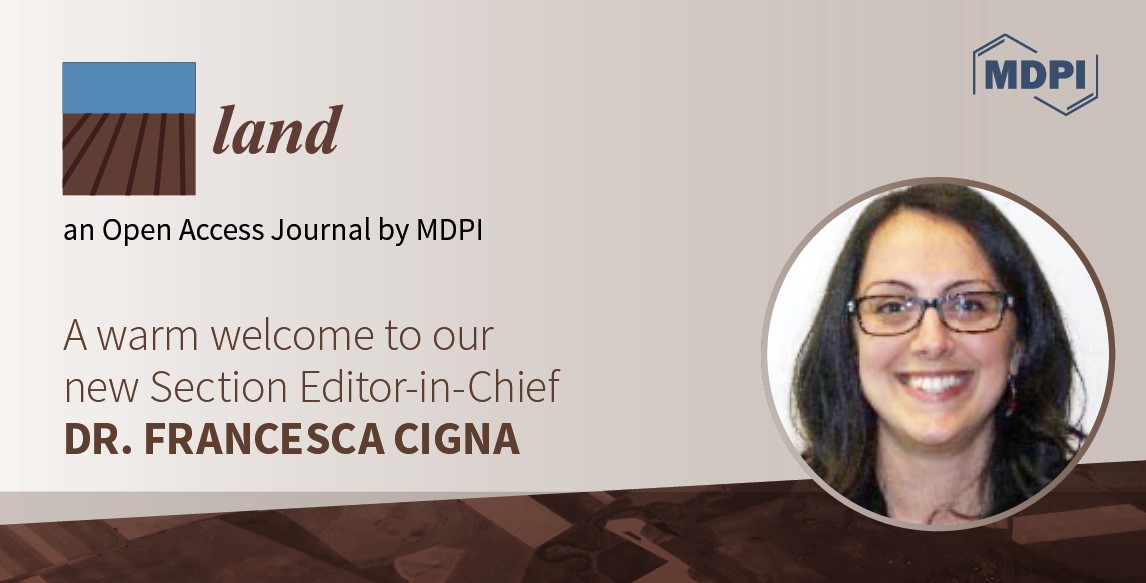
We are pleased to announce that Dr. Francesca Cigna has been appointed Editor-in-Chief of the newly established Section “Landscape Archaeology” in Land (ISSN 2073-445X, IF 3.398).
Dr. Francesca Cigna, an environmental engineer with a Ph.D. in Earth sciences, is a senior researcher in Earth observation at the Institute of Atmospheric Sciences and Climate of the National Research Council of Italy. She has extensive experience in satellite remote sensing, GIS, radar image processing, change detection methods and big data analytics. Her main research areas of investigation are mapping and monitoring natural and anthropogenic hazards in urban and rural environments, ground instability, land changes, landscape archaeology and cultural heritage applications.
The following is a short Q&A with Dr. Francesca Cigna, who shared her vision for the Section with us, as well as her views of the research area:
1. What appealed to you about the journal that made you want to take the role as its Section Editor-in-Chief?
Since its launch in 2012, Land has rapidly demonstrated that there is an active and vibrant research community working on a broad range of topics related to land systems and landscapes, yet not so many international journals offer a valuable outlet to publishing these topics through an efficient peer-reviewing and editorial process. Reputation and impact of Land have grown over the past years, enabling a high positioning of the journal within the Environmental Science subject area. The journal therefore offers a good environment to collect high quality studies and discussions in the field, and there is no doubt that this represents a stimulating opportunity for me to contribute to the journal’s goals and objectives as the Editor-in-Chief of one of its thematic Sections.
2. Can you briefly introduce your current research work in landscape archaeology?
As an Earth observation scientist, I look at the topic from a technical perspective, trying to investigate how remote sensing data, image analysis methodologies and digital technologies can address scientific questions and research goals by providing valuable information on characteristics and evolution of past archaeological landscapes, from the regional to the more local scale. Big data, enhanced imaging resolutions, open access archives and cloud platforms are the resources that I exploit the most in this field, with a look to investigating semi-arid regions and catchments in South America and human-impacted Mediterranean landscapes and sites in the current context of urbanization and anthropogenic site disturbance.
3. What does the future of this field of research look like?
The future of this research field looks like a lot of fun! Whilst we will surely continue to use well-established on-site surveying and investigation methods, technological development will continue to enable an increasing number of new opportunities, in terms of both data acquisition instrumentation types and sensing capabilities, and novel approaches for semi-automated data classification, machine and deep learning, artificial intelligence and advanced digital technologies. Curiosity and research questions will lead the way in the upcoming years, with the community making the best out of novel data and methods to address fundamental and new questions with original, prototyping and pioneering approaches and workflows.
4. What is your vision for the Section?
In my vision, the launch of this new Section of Land, fully dedicated to landscape archaeology, is the first step towards the consolidation of this research field with a body of high-impact literature that will also contribute to an even brighter future for the journal more widely. I am keen to open the doors of the Section to highly motivated early career scientists and young researchers to contribute as authors and/or editors (e.g., through the Special Issue Mentor Program) to enable the development and embedding of novel ideas and the launch of new thematic volumes on “hot topics” and recent discoveries.
5. What do you think of the development of Open Access in the publishing field?
Nowadays, Open Access principles and practices are among the most welcomed features in scientific publishing. As an author, I have experienced a much wider dissemination and often higher impact of my open access research papers across the community, even reaching out to practitioners and specialists outside the university or major research institutions who might not have access to journal subscriptions. Further development of the principles of Open Access in this field will likely stimulate faster and more widespread scientific exchange and development.
We warmly welcome Dr. Francesca Cigna to her new role as Section Editor-in-Chief, and we look forward to her leading Land to many more milestones.
18 March 2022
Urban Land Institute (ULI) Is Now an Affiliated Society Member of Land
In February 2022, the Urban Land Institute (ULI) chose Land (ISSN: 2073-445X) as its preferred journal and became an affiliated society member. As part of this collaboration, all members of ULI will benefit a discount on the article processing charge (APC) when submitting articles to Land.
|
ULI is the oldest and largest network of cross-disciplinary real estate and land use experts in the world. ULI is its members. Through our members’ dedication to the mission and their shared expertise, the institute has been able to set standards of excellence in development practice. The mission of the Urban Land Institute: Shape the future of the built environment for transformative impact in communities worldwide. |
|
The Urban Land Institute (ULI) is a professional organization whose functions are highly relevant to the scope of Land.
We look forward to collaborating with ULI and publishing state-of-the-art research from its members in this field.
3 March 2022
Recruiting Section Editors-in-Chief for Land
Land is currently recruiting Editors-in-Chief for the following sections:
- “Soil–Sediment–Water Systems”;
- “Land Environmental and Policy Impact Assessment”;
- “Water, Energy, Land and Food (WELF) Nexus”;
- “Land—Observation and Monitoring”.
Land (ISSN: 2073-445X, Impact Factor 3.398) is an international and cross-disciplinary, peer-reviewed, open access journal of land system science, landscape, soil–sediment–water systems, urban study, land–climate interactions, water–energy–land–food (WELF) nexus, biodiversity research and health nexus, land modelling and data processing, ecosystem services, and multifunctionality and sustainability etc., published monthly online by MDPI. The International Association for Landscape Ecology (IALE), European Land-use Institute (ELI), Landscape Institute (LI) and Urban Land Institute (ULI) are affiliated with Land, and their members receive a discount on the article processing charge.
The Section Editor-in-Chief is a leader in their particular field of research, and is responsible for maintaining the scientific quality of a particular section of a journal. The Section Editor-in-Chief is expected to oversee the growth and development of the journal Sections and its board members. The initial term is for 2 years, which entails the following:
- Acting as an ambassador for the journal, MDPI and Open Access publishing;
- Making scientific decisions about the scope of their Section;
- Inviting distinguished scientists to join the Editorial Board;
- Suggesting topics for Special Issues;
- Providing support and guidance to Editorial Board Members and editorial staff when required;
- Maintaining oversight of the editorial process for individual manuscripts in their Section (mainly by making the final decision regarding whether or not a paper can be published after peer-review and revisions);
- Understanding, leading and upholding MDPI’s peer review guidelines and ethics guidelines.
To apply for this position (in one of our sections), recommend potential candidates, or request further information, please contact the Land Editorial Office (land@mdpi.com) with the following two files attached:
- A full academic CV;
- A short cover letter that details your interest and enthusiasm for the position.
Land Editorial Office
3 March 2022
Recruiting Editorial Board Members for Land
Land is currently recruiting prestigious scholars from around the world to join our Editorial Board for the following 13 Sections:
- “Land Systems and Global Change”;
- “Landscape Ecology”;
- “Soil–Sediment–Water Systems”;
- “Land Socio-Economic and Political Issues”;
- “Urban Contexts and Urban–Rural Interactions”;
- “Land–Climate Interactions”;
- “Landscape Archaeology”;
- “Land, Biodiversity, and Human Wellbeing”;
- “Land Environmental and Policy Impact Assessment”;
- “Land Innovations—Data and Machine Learning”;
- “Water, Energy, Land and Food (WELF) Nexus”;
- “Land—Observation and Monitoring”;
- “Land Planning and Architecture”.
Land (ISSN: 2073-445X, Impact Factor 3.398) is an international and cross-disciplinary, peer-reviewed, open access journal of land system science, landscape, soil–sediment–water systems, urban study, land–climate interactions, water–energy–land–food (WELF) nexus, biodiversity research and health nexus, land modelling and data processing, ecosystem services, and multifunctionality and sustainability etc., published monthly online by MDPI. The International Association for Landscape Ecology (IALE), European Land-use Institute (ELI), Landscape Institute (LI) and Urban Land Institute (ULI) are affiliated with Land, and their members receive a discount on the article processing charge.
The main responsibilities of Editorial Board Members are as follows:
- Pre-checking and making decisions for several manuscripts, based on your area of expertise;
- Acting as, or recommending, a Guest Editor for a Special Issue on a topic related to your research interests;
- Promoting Land and increasing its visibility on related academic social media.
The benefits of becoming an Editorial Board Member (EBM) include the following:
- The opportunity to publish one paper, free of charge, per year in Land, as well as receiving certain discounts for papers invited from your scientific network;
- A certificate recognizing you as an Editorial Board Member of Land;
- Land may offer sponsorship for conferences organized by you;
- Land may offer travel grants of CHF 300–500 per year for conferences that you attend or organize.
To apply for this position (in one of our sections), recommend potential candidates, or request further information, please contact the Land Editorial Office (land@mdpi.com) with the following two files attached:
- A full academic CV;
- A short cover letter that details your interest and enthusiasm for the position.
Land Editorial Office
23 February 2022
Land | Recruiting Editorial Board Members for Section “Landscape Archaeology”
Land (ISSN: 2073-445X) is an international and cross-disciplinary, peer-reviewed, open access journal of land system science, landscape, soil–sediment–water systems, urban study, land–climate interactions, water–energy–land–food (WELF) nexus, biodiversity research and health nexus, land modelling and data processing, ecosystem services, and multifunctionality and sustainability etc., published monthly online by MDPI. It is the only open access journal covering all aspects of land science, indexed within Scopus, SSCI (Web of Science), AGRICOLA, AGRIS, GeoRef, RePEc, and many other databases. Land has received an increased CiteScore (2020 Scopus data) of 3.0, and its 2020 Impact Factor is 3.398.
Land’s new Section “Landscape Archaeology” (https://www.mdpi.com/journal/land/sections/landscape_archaeology) is now recruiting Editorial Board Members.
The main responsibilities of the Section Editorial Board Members are as follows:
- Supervising the quality of the papers in this Section (reviewing new submissions);
- Acting as a/recommending Guest Editors for a Special Issue on a topic related to your research interests;
- Providing conference/society cooperation recommendations;
- Helping to promote this Section among your peers or at conferences.
Applications for the position should include (i) a brief cover letter and (ii) a short CV outlining the candidate’s track record in publishing, peer reviewing, and editing in scientific journals and links to ORCID, Publons, Scopus, SciProfiles, and/or Google Scholar profiles.
This position is open to experts in any aspect of landscape archaeology. To apply for this position, recommend potential candidates, or request further information, please contact the Land Editorial Office (land@mdpi.com) or Carol Ma (carol.ma@mdpi.com).
22 February 2022
Recruiting Topical Advisory Panel Members for Land
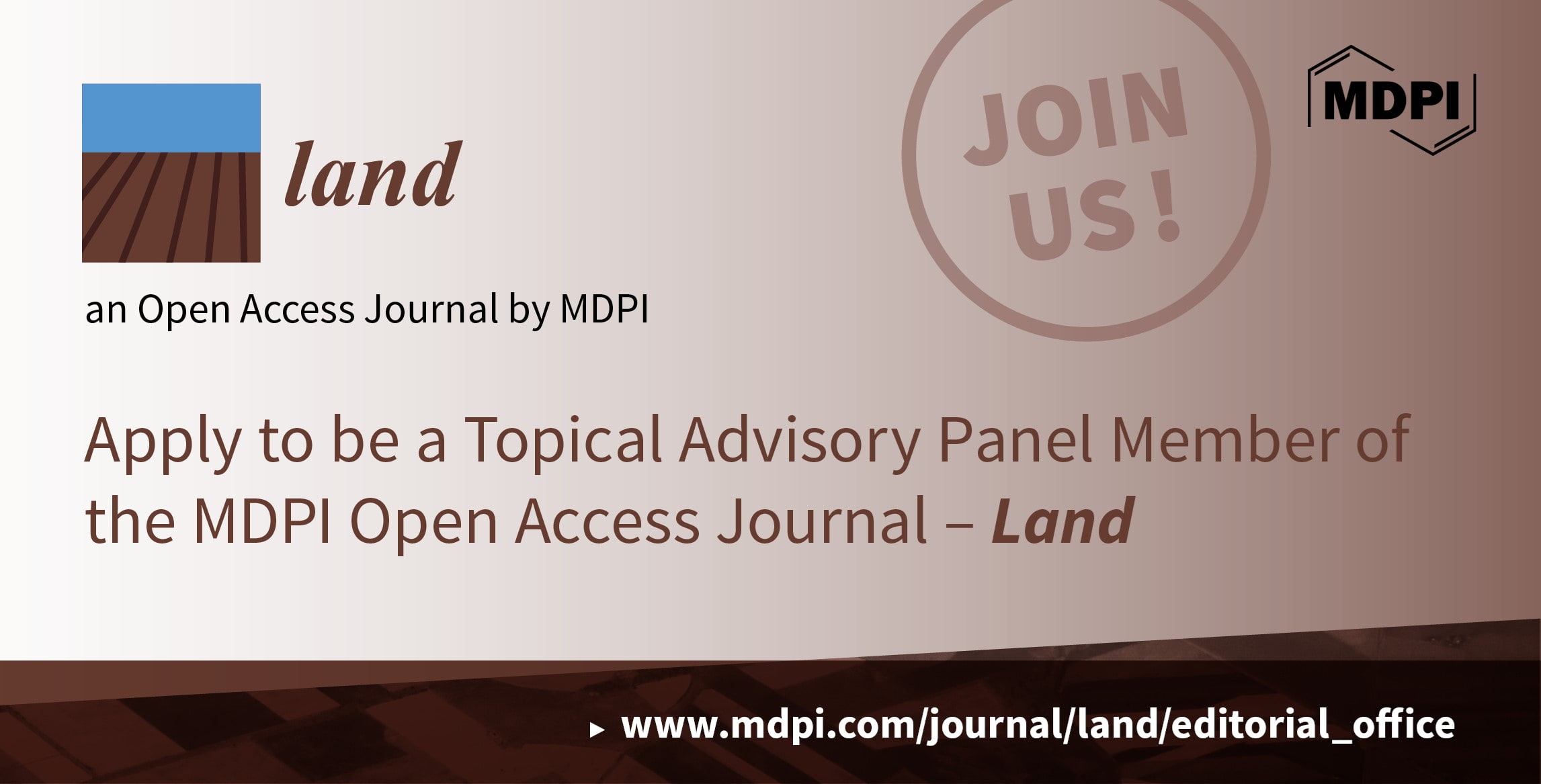
The journal Land (ISSN 2073-445X) is launching a new position: Topical Advisory Panel Member. The main responsibility of the new members of the Topical Advisory Panel is to regularly provide support to Guest Editors, Topic Editors, and Section Board Members. The responsibilities of the Topical Advisory Panel Members are available here: https://www.mdpi.com/editors.
Land is an international and cross-disciplinary, peer-reviewed, open access journal of land system science, landscape, soil–sediment–water systems, urban study, land–climate interactions, water–energy–land–food (WELF) nexus, biodiversity research and health nexus, land modelling and data processing, ecosystem services, and multifunctionality and sustainability, etc., published monthly online by MDPI. The International Association for Landscape Ecology (IALE), European Land-use Institute (ELI), and Landscape Institute (LI) are affiliated with Land. The aims and scope of the journal can be found at the following link: https://www.mdpi.com/journal/land/about.
Each year, the members’ performance is evaluated and outstanding members will be promoted to the Editorial Board by the Editor-in-Chief.
To qualify as a Topical Advisory Panel Member, applicants must:
- Have expertise and experience in the field related to the journal;
- Be within approximately 10 years of receiving a Ph.D.;
- Have at least 6-8 published papers in the last 5 years as first author or corresponding author;
- Currently hold an independent research position in academia or a government institute.
If you are interested in this position, please apply via the following link: https://www.mdpi.com/journal/land/topical_advisory_panel_application, or send an email to land@mdpi.com with your academic CV.
We look forward to hearing from you!
18 February 2022
Land | Recruiting Editorial Board Members for New Section “Land, Biodiversity, and Human Wellbeing”
Land (ISSN: 2073-445X) is an international and cross-disciplinary, peer-reviewed, open access journal of land system science, landscape, soil–sediment–water systems, urban study, land–climate interactions, water–energy–land–food (WELF) nexus, biodiversity research and health nexus, land modelling and data processing, ecosystem services, and multifunctionality and sustainability etc., published monthly online by MDPI. It is the only open access journal covering all aspects of land science, indexed within Scopus, SSCI (Web of Science), AGRICOLA, AGRIS, GeoRef, RePEc, and many other databases. Land has received an increased CiteScore (2020 Scopus data) of 3.0, and its 2020 Impact Factor is 3.398.
Land’s new Section “Land, Biodiversity, and Human Wellbeing” is now recruiting Editorial Board Members. This Section will highlight the land–biodiversity–human wellbeing nexus with respect to its trends, compromises, and controversies. You can find more information on the Section webpage: https://www.mdpi.com/journal/land/sections/land_biodiversity_human_wellbeing.
The main responsibilities of Section Editorial Board Members are as follows:
- Pre-screening and making decisions on new submissions related to the journal Section;
- Assisting in editing a Special Issue on a topic related to the Section (or supervising Special Issues related to your research field);
- Providing input or feedback regarding journal policies;
- Helping to promote the journal among their peers or at conferences;
- Attending board meetings to develop journal development strategies;
- Reviewing manuscripts.
This position is open to active experts who are passionate about this field. To apply for the position, recommend potential candidates, or request further information, please do not hesitate to contact the Land Editorial Office (land@mdpi.com) or Erin Li (erin.li@mdpi.com).
23 December 2021
Dr. Sean Sloan Appointed Editor-in-Chief of the New Section “Land, Biodiversity, and Human Wellbeing” in Land
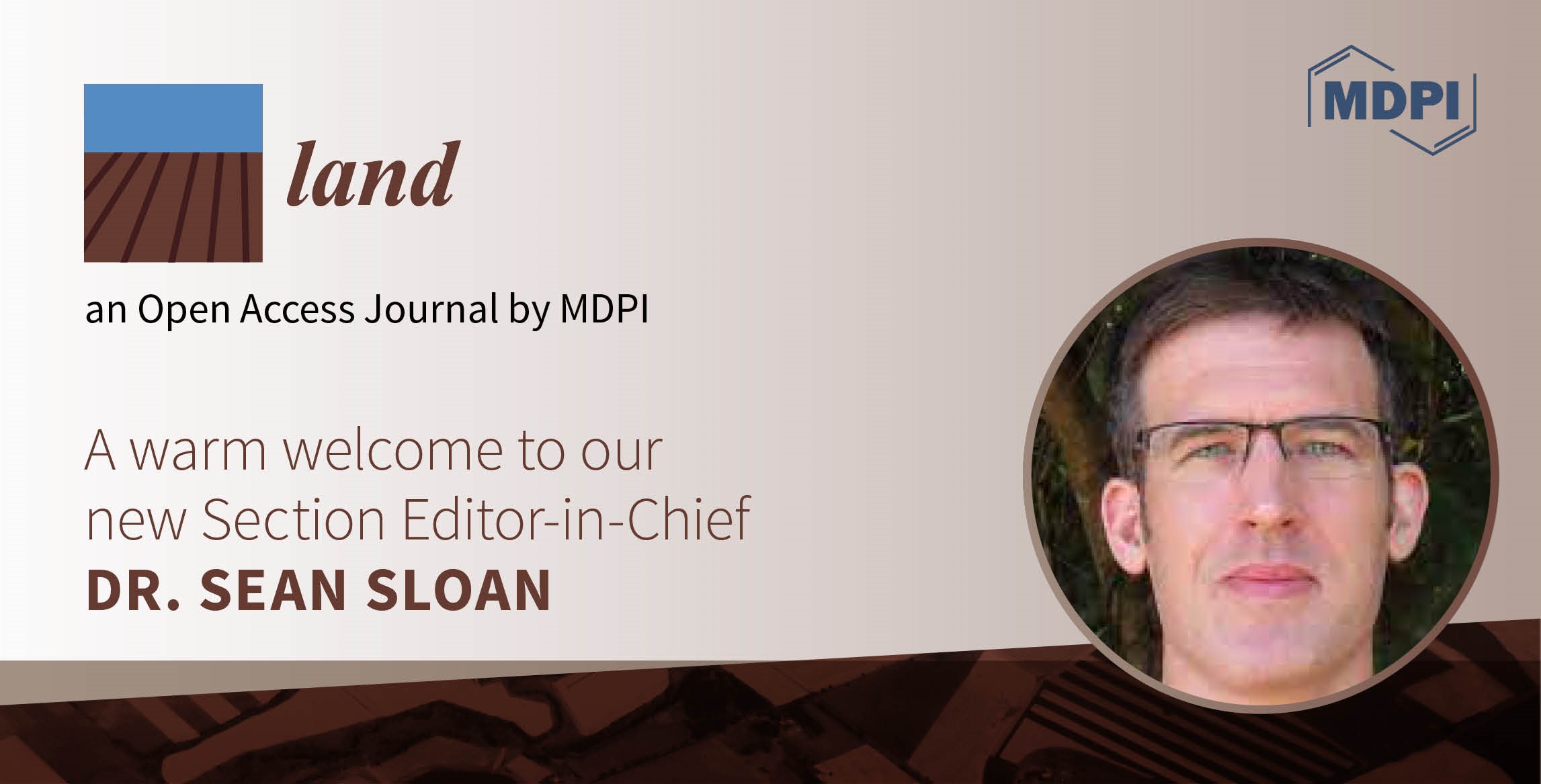
We are pleased to announce that Dr. Sean Sloan has been appointed Editor-in-Chief of the newly established Section “Land, Biodiversity, and Human Wellbeing” in Land (ISSN 2073-445X, IF 3.398).
Dr. Sean Sloan is a Canada Research Chair (Tier 2) in the Human Dimensions of Sustainability and Resilience and Professor of Geography at Vancouver Island University, Canada. His research interests encompass emergent trends to land management/change in the Global South, particularly with respect to the human dimensions of forest change, wildfires, and agriculture. Formally, Dr. Sloan was a Research Fellow at James Cook University, Australia, where his research extended to biological conservation amidst rapid road infrastructure development and related land exploitation.
The following is a short Q&A with Dr. Sean Sloan, who shared his vision for the Section with us, as well as his views of the research area:
1. What appealed to you about the journal that made you want to take the role as its Section Editor-in-Chief?
In my view, Land has served as a niche outlet for exploratory research often produced by emergent scholars, including junior scientists, those in the Global South, and/or other typically under-represented demographics. When carefully vetted and cultivated, studies from such scholars can often be visionary and exciting. I have always enjoyed bringing out the best of such studies. I now look forward to doing so formally as Section Editor-in-Chief.
2. What is your vision for the Section?
While cliché, it is true that we live in unprecedented times in many respects, in degree if not in kind. The impacts of unfolding land-change dynamics are arguably more cumulative than ever, or at least felt more widely in terms of individual and societal wellbeing, broadly defined. This Section, therefore, seeks to compile scientific studies and informed commentaries on the implications of land change and/or related biodiversity fluxes for human wellbeing, as with respect to physical, mental, and spiritual health but also notions of social and environmental security, resilience, prosperity, and peace.
3. What does the future of this field of research look like?
To date, the field has been both piecemeal (e.g., local case studies) or all-encompassing (e.g., global meta-analyses). Each approach has struggled to explicitly highlight and/or generalise the “connective tissue” between actual land management, actual biodiversity change, and actual human wellbeing. The promise of the field, and this Section, is in doing just this.
4. What do you think of the development of Open Access in the publishing field?
I have always held Open Access publication as necessary for a globalized world in which much scientific research is publicly funded, but where access to educational resources including publications remains highly uneven. The Open Access model provides unparalleled access to scientific knowledge amongst scholars and practitioners, particularly in the Global South, where journal subscriptions are very limited. Ultimately, the model contributes to greater knowledge dissemination and related applications, perhaps especially where they are most needed. In short, the model is both scientifically utilitarian and publicly virtuous.
5. Who should contribute to this Section, and what can readers expect?
Contributions are welcome from all keen observers of the nexus of land management, biodiversity, and human wellbeing. These include professional scientists but also informed practitioners of land management, conservation, health, etc., as well as stakeholders dealing with changes to this nexus.
We warmly welcome Dr. Sean Sloan to his new role as Section Editor-in-Chief, and we look forward to his leading Land to many more milestones.
14 December 2021
Prof. Dr. Chuanrong Zhang Appointed Editor-in-Chief of the New Section “Land Innovations – Data and Machine Learning” in Land
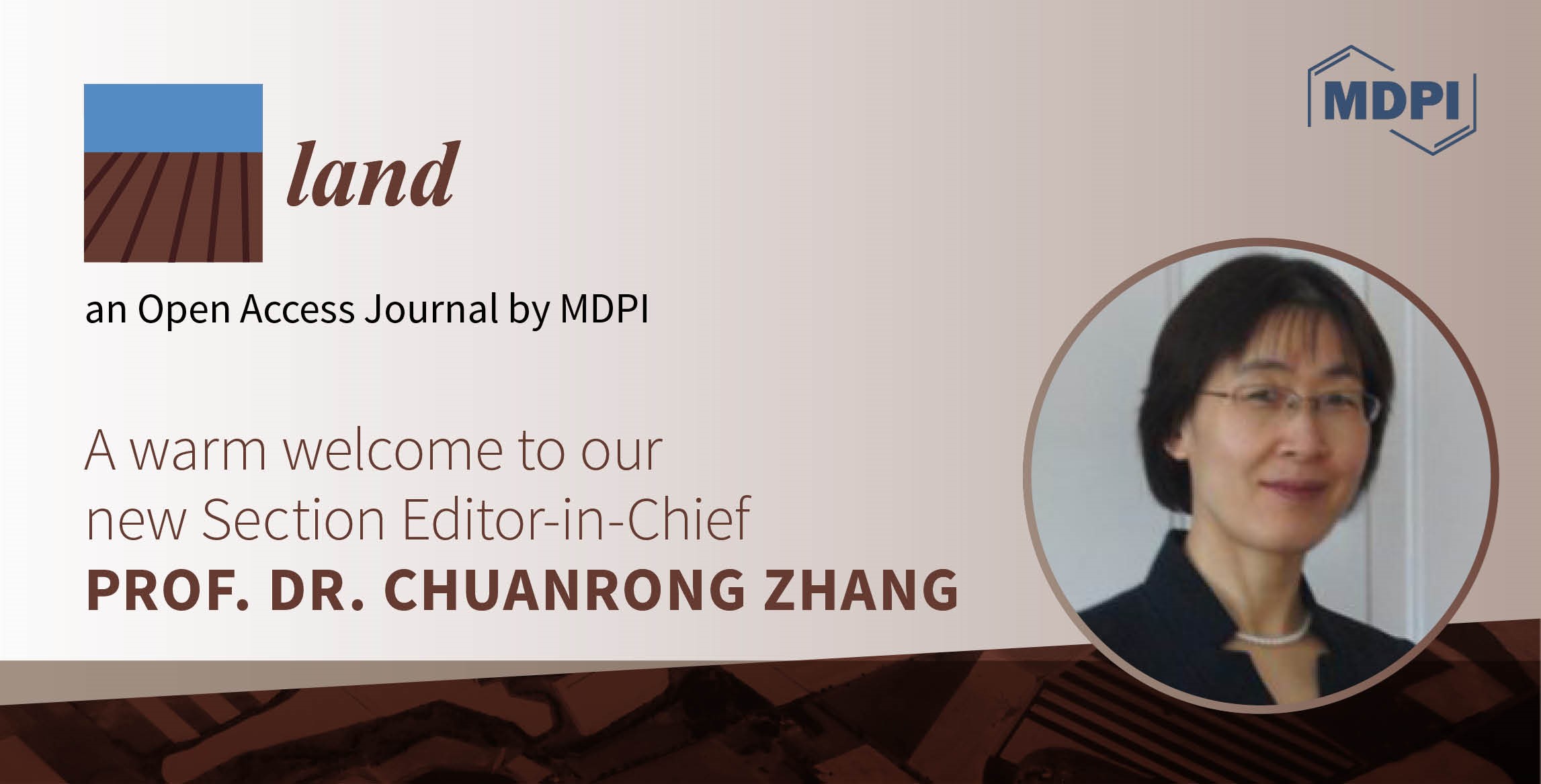
We are pleased to announce that Prof. Dr. Chuanrong (Cindy) Zhang has been appointed Editor-in-Chief of the newly established Section “Land Innovations – Data and Machine Learning” in Land (ISSN 2073-445X, IF 3.398).
Prof. Dr. Chuanrong (Cindy) Zhang received the Ph.D. in geography from the University of Wisconsin, Milwaukee in 2004. She is currently a professor at the Department of Geography & Center of Environmental Sciences and Engineering, University of Connecticut, Storrs. Prof. Dr. Zhang is a broadly trained geographer with substantive interests in geospatial technologies. Her research is interdisciplinary. In particular, her research concentrates on geographical information science (GIS), remote sensing, geo-spatial statistics, geocomputation, GIS cyberinfrastructure, and their applications in land-use/cover studies, climate change, managing disasters and natural resources, landscape ecology, environmental planning, as well as transportation studies. She has published articles in leading journals on GIS, geography, remote sensing, soil, and environmental studies. She has published more than 150 peer-reviewed journal articles, book chapters, and conference proceedings since 2003. She published her monograph titled Geospatial Semantic Web as the first author with Springer in 2015. Her work has been supported by different prestigious agents such as the National Science Foundation and the Department of Energy. She has served as the committee chair or member for several international or national organizations in the geospatial community such as the AAG (Association of American Geographers), CPGIS (The International Association of Chinese Professionals in GIS), and UCGIS (University Consortium for Geographic Information Science). She received the UCGIS/ESRI (University Consortium for Geographic Information Science/Environmental Systems Research Institute) Junior Faculty Award in 2009 and became an NCSA (National Center for Supercomputing Applications) CyberGIS Fellow in 2014.
The following is a short Q&A with Prof. Dr. Chuanrong Zhang, who shared her vision for the Section with us as well as her views of the research area:
1. What appealed to you about the journal that made you want to take on the role as its Section Editor-in-Chief?
Many of the central challenges of the 21st century are tied to our land. For example, receding glaciers, loss of species’ habitats, growing inequalities, resource depletion, population migration, rising disasters, and climate change. Land is the journal in which to publish important interdisciplinary research on land, which has the potential to contribute greatly to efforts to solve these challenges. The journal has gained more attention in various fields and has had a growing impact across the sciences in recent years. As a geographer, I have research interests in common with the journal. My recent research focuses on investigating new technologies in GIS, remote sensing, and spatial statistics to process, analyze, and represent geographical data, which match the aims and scope of the journal well.
2. What is your vision for the Section?
The “Land Innovations – Data and Machine Learning” Section includes, but is not limited to, frontiers of research in spatial data science for obtaining, processing, analyzing, harnessing, and visualizing social, economic, environmental, and other data related to Land. Geospatial artificial intelligence and machine learning techniques for dealing with spatial big data, including remotely sensed data and social media data, are particularly welcome.
3. What does the future of this field of research look like?
The future of research on land data and machine learning is exciting. The future of research will move beyond proof-of-concept demonstrations and applications of big data and machine learning techniques. The future of research may involve investigations that draw on diverse perspectives and different types of data as well as emphasize integrated approaches and model-driven data analytics approaches, which are important in addressing many research problems and may promote large-scale collaborations.
4. What do you think of the development of open access in the publishing field?
As the Internet has enabled low-cost distribution of digital content, the development of open access will probably gain increasing acceptance and become more popular in the future. More and more journals will become open access journals.
We warmly welcome Prof. Dr. Chuanrong Zhang to her new role as Section Editor-in-Chief, and we look forward to her leading Land to many more milestones.
9 December 2021
Land Receives Updated Impact Factor of 3.398
At the end of October 2021, the citation metrics of Journal Citation Reports (JCR, https://jcr.help.clarivate.com/Content/data-updates.htm) were updated, in order to fix the problems associated with missing material, as well as to fix other small errors. Based on the new metrics, Land received a new IF of 3.398, which is a slight increase from the previous IF of 3.395.
The newest journal ranking in the corresponding categories is shown below.

For more journal statistics, please visit https://www.mdpi.com/journal/land/stats.
22 November 2021
722 MDPI Editorial Board Members Receiving "2021 Highly Cited Researchers" Distinction
It is our great honor to congratulate the Editorial Board Members and Editors in MDPI's journals who have been distinguished as 2021 Highly Cited Researchers by Clarivate, according to Web of Science data. We herewith express our gratitude for the immense impact the named researchers continue to make on scientific progress and on our journals' development.
Clarivate's annual list of Highly Cited ResearchersTM identifies the most highly cited scientists for the past decade. Their impactful papers are among the top 1 per cent in the citation distribution of one or more of 22 fields analyzed in the "Essential Science Indicators", distinguishing them as hugely influential among their peers.
| Abate, Antonio Abatzoglou, John T. Abbaszadeh, Mostafa Acharya, U. Rajendra Acharya, Viral V. Agarwal, Ravi P. Ahn, Myung-Ju Airoldi, Laura Ali, Imran Allakhverdiev, Suleyman I. Aluko, Rotimi E. Anasori, Babak Andersson, Dan I. Andes, David Anker, Stefan D. Apergis, Nicholas Ariga, Katsuhiko Arqub, Omar Abu Aschner, Michael Assaraf, Yehuda G. Astruc, Didier Atala, Anthony Atanasov, Atanas G. Atangana, Abdon Bahram, Mohammad Bakris, George L. Balandin, Alexander A. Baleanu, Dumitru Balsamo, Gianpaolo Bando, Yoshio Banks, William A. Bansal-Travers, Maansi Barba, Francisco J. Barros, Lillian Basit, Abdul W. Baskonus, Haci Mehmet Bassetti, Matteo Battino, Maurizio Bell, Jordana T. Bellomo, Nicola Benediktsson, Jon Atli Benelli, Giovanni Benjakul, Soottawat Bhatnagar, Amit Biddle, Stuart J. H. Biondi, Antonio Biondi-Zoccai, Giuseppe Bjarnsholt, Thomas Blaabjerg, Frede Blaschke, Thomas Blay, Jean-Yves Blumwald, Eduardo Blunt, John W. Boffetta, Paolo Bogers, Marcel Bonomo, Robert A. Bowman, David M.J.S. Boyer, Cyrille Brestic, Marian Brevik, Eric C. Buhalis, Dimitrios Burdick, Jason A. Byrd, John C. Cabeza, Luisa F. Cai, Xingjuan Cai, Jianchao Calhoun, Vince D. Calin, George Cao, Jinde Cao, Guozhong Carvalho, Andre F. Castellanos-Gomez, Andres Cerqueira, Miguel Ângelo Parente Ribeiro Chang, Jo-Shu Chang, Chih-Hao Chastin, Sebastien Chau, Kwok-wing Chemat, Farid Chen, Xiaobo Chen, YangQuan Chen, Jianmin Chen, Chaoji Chen, Min Chen, Qi Chen, Jun Chen, Xi Chen, Peng Chen, Yulin Chen, Bo Chen, Chen Chen, Zhi-Gang Chen, Wei-Hsin Chen, Gang Chen, Yongsheng Chen, Xiang Chen, Yimin Chen, Runsheng Chen, Lidong Chen, Shaowei Chen, Qian Chen, Yu Chen, Shuangming Chiclana, Francisco Cho, Sun Young Choi, Wonyong Chowdhary, Anuradha Choyke, Peter L. Cichocki, Andrzej Corella, Dolores Corma, Avelino Cortes, Javier Cortes, Jorge Costanza, Robert Crommie, Michael F. Cui, Yi Cui, Haiying Cui, Qinghua Cummings, Kenneth Michael Dai, Shifeng Dai, Sheng Daiber, Andreas Davis, Steven J. Dawson, Ted M. de la Fuente-Nunez, Cesar Decker, Eric Andrew Dekel, Avishai Demaria, Marco Deng, Yong Deng, Xiangzheng DePinho, Ronald A. Desneux, Nicolas Dimopoulos, Meletios-Athanasios Ding, Aijun Dionysiou, Dionysios D. Dokmeci, Mehmet Remzi Dolgui, Alexandre Dong, Fan Dou, Shi Xue Dou, Letian Du, Qian Du, Bo Dube, Shanta Rishi Dufresne, Alain Dummer, Reinhard Dupont, Didier Edwards, David Elaissari, Abdelhamid Elhoseny, Mohamed Ellahi, Rahmat Ellis, Erle C. ElMasry, Gamal Esteller, Manel Estévez, Mario Fabbro, Doriano Facchetti, Antonio Fan, Zhanxi Fang, Chuanglin Fasano, Alessio Fečkan, Michal Felser, Claudia Feng, Liangzhu Fensholt, Rasmus Ferdinandy, Péter Fernandez-Lafuente, Roberto Ferreira, Isabel C. F. R. Filippi, Massimo Fisher, Helen Fortino, Giancarlo Fosso Wamba, Samuel Franceschi, Claudio Fujita, Hamido Fujita, Masayuki Gai, Francesco Gaisford, Simon Galanakis, Charis M. Galluzzi, Lorenzo Galvano, Fabio Gan, Ren-You Gan, Lihua Gandomi, Amir H. Gao, Bin Gao, Feng Gao, Minrui Gao, Huijun Gao, Wei Gao, Huile Garbe, Claus Garcia, Hermenegildo Gasbarrini, Antonio Gasco, Laura Gautret, Philippe Geng, Yong Gerdts, Gunnar Geschwind, Daniel H. Ghadimi, Noradin Ghaffari, Roozbeh Ghamisi, Pedram Giampieri, Francesca Glick, Bernard R. Gnant, Michael Goel, Ajay Gogotsi, Yury Goldewijk, Kees Klein Gong, Jinlong Gong, Yongji Govindan, Kannan Granato, Daniel Grancini, Giulia Green, Douglas R. Grosso, Giuseppe Gu, Ke Guan, Cao Guastella, Adam J. Guerrero, Josep M. Gui, Guan Guizani, Mohsen Guo, Zaiping Gupta, Rangan Gutzmer, Ralf Haase, Dagmar Habibi-Yangjeh, Aziz Hagemann, Stefan Hagger, Martin Hamblin, Michael R. Hammoudeh, Shawkat Han, Heesup Hanes, Justin Harrison, Roy M. Hartung, Hans-Peter Hasanuzzaman, Mirza He, Jr-Hau He, Hongwen He, Jiaqing He, Debiao Henseler, Jörg Herrera, Francisco Herrera-Viedma, Enrique Hetz, Claudio Ho Kim, Jung Holmes, Elaine Hossain, Ekram Hsueh, Po-Ren Hu, Xiaosong Hu, Wenbin Huang, Jianping Huang, Hongwei Huang, Yu Huang, Jianying Huang, Peng Huang, Baibiao Huang, Shaoming Hubacek, Klaus |
Iqbal, Hafiz M. N. |
Saad, Fred |
The full list of 2021 Highly Cited Researchers can be accessed at the following webpage in the Web of ScienceTM https://recognition.webofscience.com/awards/highly-cited/2021/.
--- Highly Cited Researchers (HCR) is a Clarivate product.
19 November 2021
Join Us for the Landscape Institute Awards 2021 Online Ceremony, 25 November 2021
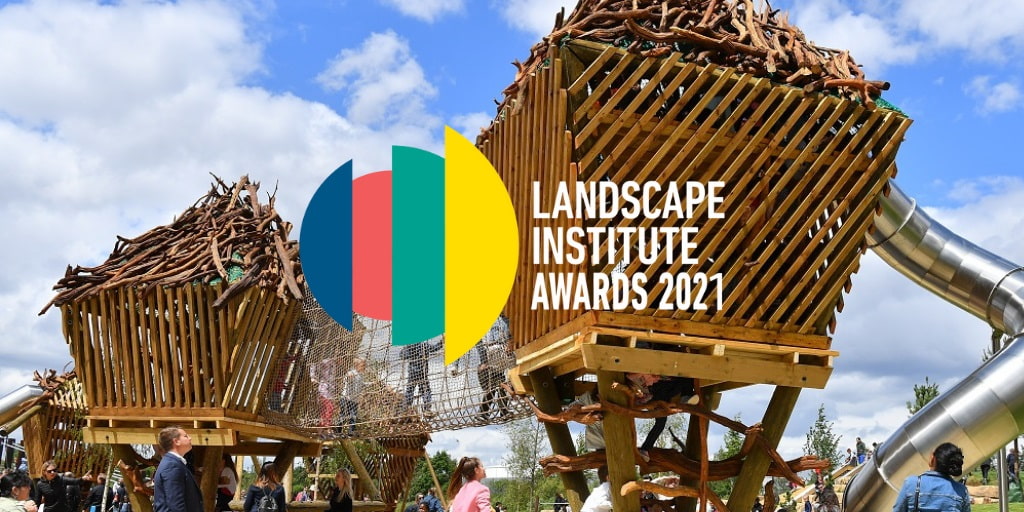
The Landscape Institute (LI) Awards 2021 online ceremony will be held on 25 November 2021, at 12 p.m. GMT.
The transformative power of landscape is extremely important in times of crisis. Following the success of the 2020 Landscape Institute Awards, the LI Awards 2021 will aim to celebrate the exceptional contributions of landscape designers, managers, planners, and researchers across the world.
For more information, please visit https://awards.landscapeinstitute.org/.
16 November 2021
Topical Advisory Panel Established to Support Editorial Board
Academic editors play a crucial role in leading our journals and ensuring that each article undergoes a robust and timely peer-review. With the launch of Topics this year and addition of Topic Editors to our family of academic editors, we decided it would be a good time to restructure our academic boards, thus providing more clarity and support for each role. MDPI is pleased to announce the launch of a new position—Topical Advisory Panel Member, that will replace the previous position of Topics Board Member. The Topical Advisory Panel will be comprised of early career researchers eager to gain experience in editorial work.
The main responsibility of the new members of the Topical Advisory Panel is to regularly provide support to Guest Editors, Topic Editors, and Section Board Members. The responsibilities of the Topical Advisory Panel are available here: https://www.mdpi.com/editors.
Each year, the members’ performances are evaluated, and outstanding members are promoted to the Editorial Board by the Editor-in-Chief.
To qualify as a Topical Advisory Panel Member, applicants must:
- Have expertise and experience in the field related to the journal;
- Have received a Ph.D. in the last 10 years, approximately;
- Have at least 6-8 published papers in the last 5 years as first author or corresponding author;
- Currently hold an independent research position in academia or a government institute.
If you are interested in this role, please contact the editorial office by email.
We look forward to hearing from you soon.
25 October 2021
Open Access Week 2021 | It Matters How We Open Knowledge: Building Structural Equity, 25–31 October

Founded in 1996, MDPI was one of the first fully Open Access publisher. Over 25 years MDPI has grown to become the largest Open Access publisher globally, publishing over 160,000 articles across more than 350 journals in 2020. At the core, MDPI was founded in response to a pressing need of fast publication and inclusion. The scholar was set at the centre of the publication process for the first time. Acting as a service provider, rather than a product provider, MDPI exists to help scientists achive their objective to disseminate research results. At MDPI, we believe scientists deserve a better service from the publishing world.
The International Open Access Week (Open Access Week), founded by the SPARC (the Scholarly Publishing and Academic Resources Coalition) Alliance and student partners in 2008, has been successfully running for 13 years. As an advocate and pioneer of open access publishing, MDPI actively responds to the call of International Open Access Week. This year’s theme of “It Matters How We Open Knowledge: Building Structural Equity” highlights the Recommendation’s call for equitable participation from all authors and readers.
For the last 25 years, MDPI has been committed to disseminating open research. Here is a video showing MDPI’s Commitment to Equity, Inclusion and Diversity for More than 25 Years.
International Open Access Week is an important opportunity to catalyze new conversations, create connections across and between communities that can facilitate this co-design, and advance progress in the building of more equitable foundations for opening knowledge—discussions and actions that need to be continued, year in and year out. MDPI has always aimed to provide professional and efficient publishing services to scholars around the world.
Our mission is to make scientific research accessible to everyone; this year, we interview and hold discussions with open science ambassadors on how to build an equal and inclusive environment for open science. Academic editors help us collaborate with more institutions to advocate for open access ideas.
Besides this, our scientific community is a key driver of our success and MDPI’s remarkable growth. Despite the pandemic, we have prepared online conferences and workshops to gather scholars from different communities.
The Basel Sustainable Publishing online forum provides an equal opportunity for stakeholders and researchers from multi-cultural environments to exchange ideas and eliminate barriers to participation.
Conference date: 25 October 2021, online
Conference website: https://bspf2021.sciforum.net/
Main topics: MDPI discusses the current dilemma of open access science from various perspectives such as governments, libraries, and publishers, and related measures on how to change the status quo of discrimination from a global perspective.
We aim to support equality, inclusion, diversity, and accessibility in scholarly communications. We collaborate with universities and key laboratories and have scholarly communications with researchers, teachers, and students on open access workshops.

- 25 October 2021
Energies journal and Institute of Mechanics, Chinese Academy of Sciences
- 28 October 2021
Machines journal and State Key Laboratory of Traction Power, Southwest Jiaotong University
- 29 October 2021
Processes journal and Beijing Institute of Technology
- 29 October 2021
Coatings journal and Wuhan University of Technology
MDPI is committed to providing open access and high-quality publishing services for scholars and promoting rapid dissemination of academic achievements. We hope to promote the practices and policies of open access publishing and diversify the dissemination of academic achievements.
23 September 2021
2020 MDPI Top Reviewer Award—Winners Announced
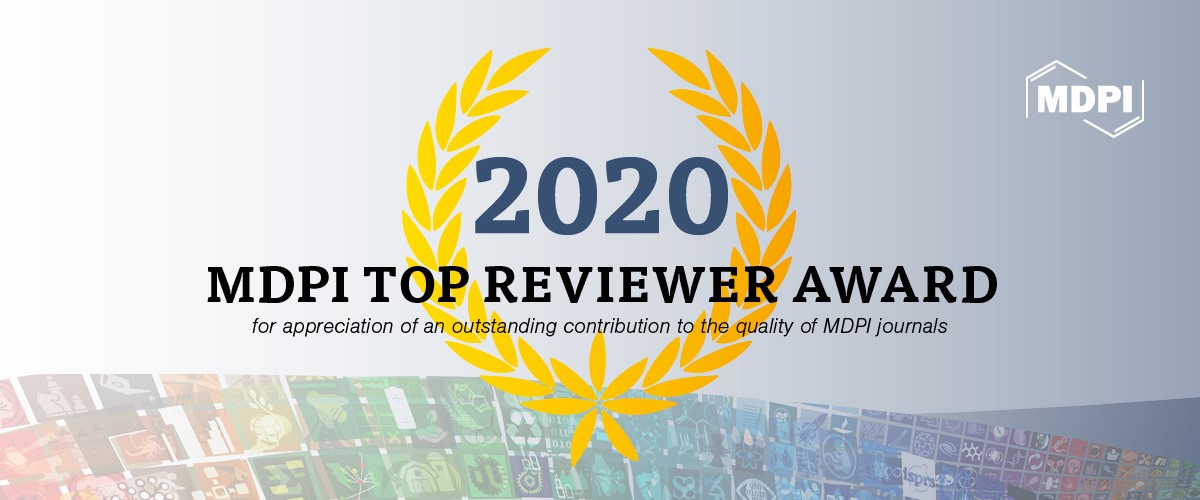
Rigorous peer-review is the cornerstone of high-quality academic publishing. Over 369,916 scholars served as reviewers for MDPI journals in 2020. We are extremely appreciative of all those who made a contribution to the editorial process in this capacity. At the beginning of every year, journal editorial offices publish a list of all reviewers’ names to express our gratitude. In addition, this year, the MDPI Top Reviewer Award was announced, to recognize the very best reviewers for their expertise and dedication, and their high-quality, and timely review reports. We are pleased to announce the following winners of the 2020 MDPI Top Reviewer Award:
- Adriana Burlea-Schiopoiu;
- Alban Kuriqi;
- Álvaro González-Vila;
- Alessandro Alaimo;
- Alexey Beskopylny;
- Alexander Yu Churyumov;
- Alberto Fernández-Isabel;
- Andrea Mastinu;
- Antonios N. Papadopoulos;
- Anton Rassõlkin;
- Antonio Humberto Hamad Minervino;
- Arkadiusz Matwijczuk;
- Artur Słomka;
- Baojie He;
- Bartłomiej Potaniec;
- Bojan Đurin;
- Camilo Arturo Rodriguez Diaz;
- Carmelo Maria Musarella;
- Chiachung Chen;
- Chiman Kwan;
- Cristian Busu;
- Danil Pimenov;
- Dan-Cristian Dabija;
- Delfín Ortega-Sánchez;
- Demetrio Antonio Zema;
- Denis Butusov;
- Elena Lucchi;
- Gaurab Dutta;
- Livia Anastasiu;
- M. R. Safaei.
For more information about how to become a reviewer of MDPI journals, please see: www.mdpi.com/reviewers.
22 September 2021
MDPI Joins SDG Publishers Compact

UN's 17 Sustainable Development Goals (SDGs) are the blueprint to achieve a better and more sustainable future for all. In 2020 the SDG Publishers Compact was launched, aimed to inspire publishers and accelerate progress to achieve the 17 goals by 2030. Members of the programme are committed to support the publication of materials that will promote and inspire actions towards SDGs.
MDPI is an eager advocate of SDGs and has already been supporting the programme by creating Special Issues and publishing a series of books on SDGs prior to joining the Compact in 2021. MDPI's Sustainability Foundation initiated the World Sustainability Awards in 2016. We fully support UN's goals to promote sustainable actions that make the world a better place for all and, as part of its commitment, we will focus our actions on SDG10: Reduced Inequalities whilst promoting all 17 SDGs. For more details, please visit the programme’s website: https://www.un.org/sustainabledevelopment/sdg-publishers-compact/.
Joining this initiative was a unanimous decision. MDPI has in its core values the dissemination of science for all, breaking the wall between research access and under-represented members of the scientific community and the general population. To support this initiative further and continue to support under-represented scientists, MDPI will take a series of actions that will be announced once ready.
The first action MDPI takes is to nominate Dr. Liliane Auwerter as the coordinator of the programme. Dr. Auwerter studied Environmental Process Technology (UTFPR, Brazil), obtained her MSc degree in Water and Environmental Engineering (University of Surrey, UK) and in 2020 completed her PhD in self-healing low-friction materials for water transport (Imperial College London, UK), always focusing on diverse scientific projects that would potentially bring sustainability to industrial processes. As a student in Brazil, she engaged in volunteering activities focused on environmental education and took part in the Millennial Development Goals meetings held at the university.
For more information, please contact:
Dr. Liliane Auwerter
Scientific Officer
liliane.auwerter@mdpi.com
16 September 2021
Prof. Dr. Christine Fürst Appointed Editor-in-Chief of Land
We are pleased to announce that Prof. Dr. Christine Fürst has been appointed Editor-in-Chief of Land (ISSN 2073-445X, IF 3.395, CiteScore 3.0).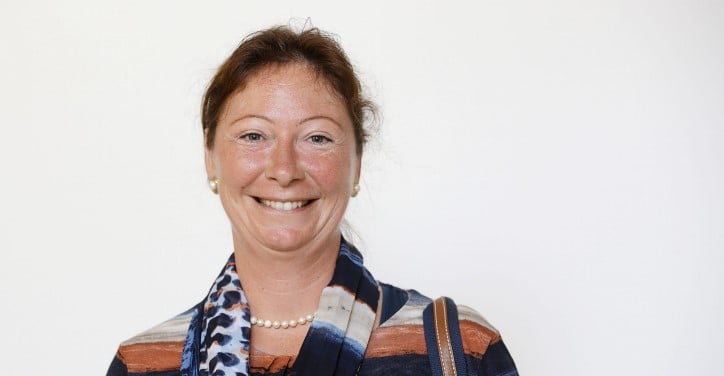
Prof. Dr. Christine Fürst is by training a forest scientist (LMU Munich, 1998) and obtained her Ph.D. as Dr. rer. silv. at TU Dresden in 2010. Since 2005, she has specialized in social–ecological systems research and since 2007, in an interdisciplinary process, she has developed an integrated land use change modeling and impact assessment software platform, GISCAME. In 2013, she passed her habilitation at the University of Bonn with venia legendi in natural resource management. In 2015, she moved to the Karlsruhe Institute of Technology, Institute for Meteorology and Climate Research, Atmospheric Environmental Research; and then, in 2016, moved, first as interim, and later as full professor for Sustainable Landscape Development, to Martin Luther University Halle-Wittenberg. Christine funded the European Land-Use Institute in 2011 and established the European Nodal Office of GLP in 2012. She is currently engaged in the scientific board of the Ecosystem Service Partnership and she is the lead author of the IPBES regional assessments, ECA region for chapters 5 and 6. From 2015 to 2019, she was president of the International Association of Landscape Ecology and is now past-president until 2023. Christine served in the context of Future Earth and in the development team of the Food–Energy–Water Nexus Knowledge Action Network. Her main research interests currently lie in integrative landscape modeling and impact assessment by means of a system of systems and in participatory decision processes in urban and regional spatial planning. Her regional research focus lies beyond Europe, in West Africa and Latin America.
The following is a short Q&A with Prof. Dr. Christine Fürst:
- What do you like about being the Editor-in-Chief of Land? How would you like to develop Land?
It is an opportunity to accompany the community of land system scientists and develop a platform for publications in this field. I have a passion for co-developing the philosophy and concepts of publications so that emerging inter- and transdisciplinary publication trends can find better reflection through innovative publication formats. It is also a good chance to cooperate with all the colleagues, the section editors, and manifold members of the editorial board to exchange and enhance our understanding of the key challenges and future thematic areas where land system sciences can contribute to solving societal and environmental challenges.
- Is Open Access popular among land scientists? What might your response be to Open Access skeptics?
I think Open Access has become more and more the publication model, particularly since the research funders require the accessibility of the publications, which is not given in no-open access models. Accessibility also increases awareness and, thus, the impact of published research, which makes it more rewarding. Additionally, it contributes to fairness toward scientists in developing countries who otherwise would not have access to recent knowledge. As long as publication fees are reasonable for all the publisher's work at the back-end and, if needed, support is provided to young scholars or scholars from developing countries, it is the best model to share knowledge globally.
We warmly welcome Prof. Dr. Christine Fürst as our Editor-in-Chief and look forward to her valuable input for the continued success of Land.
Land Editorial Office
3 August 2021
Announcement on Japanese Consumption Tax (JCT)
This serves to announce to our valued authors based in Japan that value-added tax, or consumption tax will now be imposed on article processing fees and other service fees for all papers submitted, or resubmitted (assigned new paper IDs), effective from 15 August 2021. The change is in accordance with the Japanese "Act for Partial Revision of the Income Tax Act and Other Acts" (Act No. 9 of 2015), which includes a revision of consumption taxation on cross-border supplies of services such as digital content distribution.
For additional information from the National Tax Agency please see here ("Cross-border supplies of electronic services").
Contact: Setsuko Nishihara, MDPI Tokyo
15 July 2021
Recruiting Editorial Board Members for the Section “Landscape Architecture” of Land
Land (ISSN: 2073-445X) is an international and cross-disciplinary, peer-reviewed, open access journal of land use/land change, land management, land system science, landscape, soil–sediment-water systems, urban contexts, urban–rural interactions, land–climate interactions, etc., published monthly online by MDPI. It is the only open access journal covering all aspects of land science, indexed within Scopus, SSCI (Web of Science), AGRICOLA, AGRIS, GeoRef, RePEc, and many other databases. Land has received an increased CiteScore (2020 Scopus data) of 3.0, and its 2020 Impact Factor is 3.395.
Land’s new Section “Landscape Architecture” (https://www.mdpi.com/journal/land/sections/landscape_architecture) is now recruiting Editorial Board Members!
The main responsibilities of the Section Editorial Board Members are as follows:
1) Supervising the quality of the papers in this Section (when we have new submissions to the Section);
2) Acting as a/recommending a Guest Editor for a Special Issue on a topic related to your research interests;
3) Providing conference/society cooperation recommendations.
This position is open to experts in all aspects of landscape architecture. To apply for this position, recommend potential candidates, or request further information, please contact the Land Editorial Office (land@mdpi.com) or Nacy Jiang (nacy.jiang@mdpi.com).
13 July 2021
Landscape Institute (LI) Is Now an Affiliated Society Member of Land
In June 2021, Landscape Institute (LI) chose Land as its preferred journal and became an affiliated society member. As part of this collaboration, all members of LI will enjoy a discount on the article processing charge (APC) when submitting articles to Land.
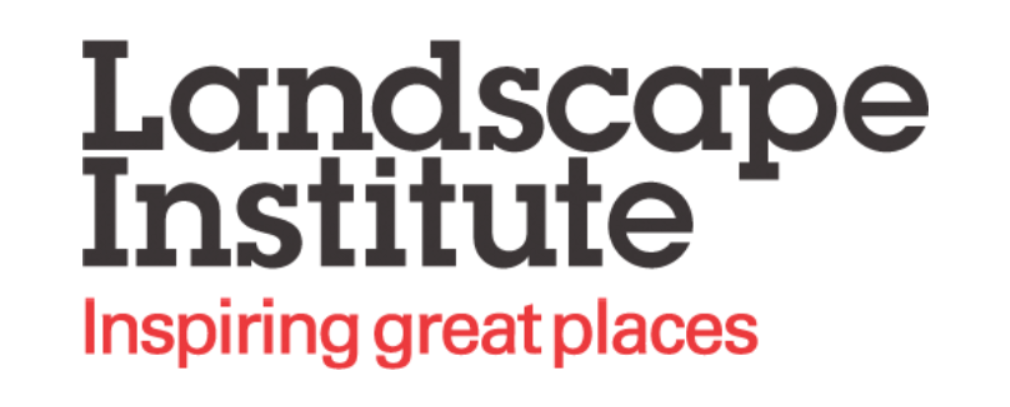
Landscape Institute (LI) is a professional organization whose functions are highly relevant to the scope of Land. We look forward to collaborating with LI and publishing state-of-the-art research from its members in this field.
30 June 2021
2020 Impact Factors - Released
The 2020 citation metrics have been officially released in the Journal Citation Reports (JCR)!
We are pleased to announce that 85 MDPI journals are included, of which:
- 10 journals received their first impact factor
- 96% of journals increased their impact factor from 2019
- 32 journals (38%) ranked among the top 25% of journals, in at least one category
| Journal | Impact Factor | Rank | Category |
| Cancers | 6.639 | Q1 | • Oncology |
| Cells | 6.600 | Q2 | • Cell Biology |
| Pharmaceutics | 6.321 | Q1 | • Pharmacology & Pharmacy |
| Antioxidants | 6.313 | Q1 | • Food Science & Technology |
| • Biochemistry & Molecular Biology | |||
| • Chemistry, Medicinal | |||
| Biomedicines | 6.081 | Q1 | • Medicine, Research & Experimental |
| • Pharmacology & Pharmacy | |||
| • Biochemistry & Molecular Biology | |||
| International Journal of Molecular Sciences | 5.924 | Q1 | • Biochemistry & Molecular Biology |
| Q2 | • Chemistry, Multidisciplinary | ||
| Pharmaceuticals | 5.863 | Q1 | • Pharmacology & Pharmacy |
| • Chemistry, Medicinal | |||
| Journal of Fungi | 5.816 | Q1 | • Mycology |
| • Microbiology | |||
| Nutrients | 5.719 | Q1 | • Nutrition & Dietetics |
| Biosensors | 5.519 | Q1 | • Chemistry, Analytical |
| • Instruments & Instrumentation | |||
| Q2 | • Nanoscience & Nanotechnology | ||
| Marine Drugs | 5.118 | Q1 | • Chemistry, Medicinal |
| • Pharmacology & Pharmacy | |||
| Biology | 5.079 | Q1 | • Biology |
| Nanomaterials | 5.076 | Q1 | • Physics, Applied |
| Q2 | • Chemistry, Multidisciplinary | ||
| • Materials Science, Multidisciplinary | |||
| • Nanoscience & Nanotechnology | |||
| Viruses | 5.048 | Q2 | • Virology |
| Journal of Personalized Medicine | 4.945 | Q1 | • Medicine, General & Internal |
| • Health Care Sciences & Services | |||
| Metabolites | 4.932 | Q2 | • Biochemistry & Molecular Biology |
| Biomolecules | 4.879 | Q2 | • Biochemistry & Molecular Biology |
| Remote Sensing | 4.848 | Q1 | • Geosciences, Multidisciplinary |
| Q2 | • Remote Sensing | ||
| • Imaging Science & Photographic Technology | |||
| • Environmental Sciences | |||
| Gels * | 4.702 | Q1 | • Polymer Science |
| Antibiotics | 4.639 | Q2 | • Infectious Diseases |
| • Pharmacology & Pharmacy | |||
| Toxins | 4.546 | Q1 | • Toxicology |
| • Food Science & Technology | |||
| Vaccines | 4.422 | Q2 | • Immunology |
| • Medicine, Research & Experimental | |||
| Molecules | 4.412 | Q2 | • Chemistry, Multidisciplinary |
| • Biochemistry & Molecular Biology | |||
| Foods | 4.350 | Q2 | • Food Science & Technology |
| Polymers | 4.329 | Q1 | • Polymer Science |
| Journal of Clinical Medicine | 4.242 | Q1 | • Medicine, General & Internal |
| Toxics | 4.146 | Q2 | • Toxicology |
| • Environmental Sciences | |||
| Catalysts | 4.146 | Q2 | • Chemistry, Physical |
| Microorganisms | 4.128 | Q2 | • Microbiology |
| Membranes | 4.106 | Q1 | • Polymer Science |
| Q2 | • Engineering, Chemical | ||
| • Materials Science, Multidisciplinary | |||
| • Chemistry, Physical | |||
| Genes | 4.096 | Q2 | • Genetics & Heredity |
| Fermentation * | 3.975 | Q2 | • Biotechnology & Applied Microbiology |
| Journal of Cardiovascular Development and Disease * | 3.948 | Q2 | • Cardiac & Cardiovascular Systems |
| Plants | 3.935 | Q1 | • Plant Sciences |
| Life | 3.817 | Q2 | • Biology |
| Diagnostics | 3.706 | Q2 | • Medicine, General & Internal |
| Current Oncology | 3.677 | Q3 | • Oncology |
| Materials | 3.623 | Q1 | • Metallurgy & Metallurgical Engineering |
| Q2 | • Materials Science, Multidisciplinary | ||
| • Chemistry, Physical | |||
| • Physics, Applied | |||
| • Physics, Condensed Matter | |||
| Sensors | 3.576 | Q1 | • Instruments & Instrumentation |
| Q2 | • Chemistry, Analytical | ||
| • Engineering, Electrical & Electronic | |||
| Pathogens | 3.492 | Q2 | • Microbiology |
| Agronomy | 3.417 | Q1 | • Agronomy |
| • Plant Sciences | |||
| Chemosensors | 3.398 | Q2 | • Instruments & Instrumentation |
| • Chemistry, Analytical | |||
| Q3 | • Electrochemistry | ||
| Land | 3.398 | Q2 | • Environmental Studies |
| Brain Sciences | 3.394 | Q3 | • Neurosciences |
| International Journal of Environmental Research and Public Health | 3.390 | Q1 | • Public, Environmental & Occupational Health (SSCI) |
| Q2 | • Public, Environmental & Occupational Health (SCIE) | ||
| • Environmental Sciences (SCIE) | |||
| Tomography | 3.358 | Q2 | • Radiology, Nuclear Medicine & Medical Imaging |
| Fractal and Fractional * | 3.313 | Q1 | • Mathematics, Interdisciplinary Applications |
| Sustainability | 3.251 | Q2 | • Environmental Sciences (SCIE) |
| • Environmental Studies (SSCI) | |||
| Q3 | • Green & Sustainable Science & Technology (SCIE) | ||
| • Green & Sustainable Science & Technology (SSCI) | |||
| Water | 3.103 | Q2 | • Water Resources |
| • Environmental Sciences | |||
| Journal of Theoretical and Applied Electronic Commerce Research | 3.049 | Q3 | • Business |
| Energies | 3.004 | Q3 | • Energy & Fuels |
| Agriculture | 2.925 | Q1 | • Agronomy |
| ISPRS International Journal of Geo-Information | 2.899 | Q2 | • Geography, Physical |
| • Computer Science, Information Systems | |||
| Q3 | • Remote Sensing | ||
| Micromachines | 2.891 | Q2 | • Instruments & Instrumentation |
| • Physics, Applied | |||
| Q3 | • Chemistry, Analytical | ||
| • Nanoscience & Nanotechnology | |||
| Coatings | 2.881 | Q2 | • Materials Science, Coatings & Films |
| • Physics, Applied | |||
| Q3 | • Materials Science, Multidisciplinary | ||
| Children | 2.863 | Q2 | • Pediatrics |
| Processes | 2.847 | Q3 | • Engineering, Chemical |
| Separations | 2.777 | Q3 | • Chemistry, Analytical |
| Insects | 2.769 | Q1 | • Entomology |
| Animals | 2.752 | Q1 | • Agriculture, Dairy & Animal Science |
| • Veterinary Sciences | |||
| Symmetry | 2.713 | Q2 | • Multidisciplinary Sciences |
| Atmosphere | 2.686 | Q3 | • Meteorology & Atmospheric Sciences |
| • Environmental Sciences | |||
| Applied Sciences | 2.679 | Q2 | • Engineering, Multidisciplinary |
| • Physics, Applied | |||
| Q3 | • Chemistry, Multidisciplinary | ||
| • Materials Science, Multidisciplinary | |||
| Photonics | 2.676 | Q2 | • Optics |
| Buildings * | 2.648 | Q2 | • Construction & Building Technology |
| • Engineering, Civil | |||
| Healthcare | 2.645 | Q2 | • Health Policy & Services (SSCI) |
| Q3 | • Health Care Sciences & Services (SCIE) | ||
| Minerals | 2.644 | Q2 | • Mining & Mineral Processing |
| • Mineralogy | |||
| • Geochemistry & Geophysics | |||
| Forests | 2.634 | Q1 | • Forestry |
| Crystals | 2.589 | Q2 | • Crystallography |
| Q3 | • Materials Science, Multidisciplinary | ||
| Entropy | 2.524 | Q2 | • Physics, Multidisciplinary |
| Diversity | 2.465 | Q2 | • Biodiversity Conservation |
| Q3 | • Ecology | ||
| Journal of Marine Science and Engineering | 2.458 | Q2 | • Oceanography |
| • Engineering, Marine | |||
| • Engineering, Ocean | |||
| Medicina | 2.430 | Q2 | • Medicine, General & Internal |
| Machines * | 2.428 | Q2 | • Engineering, Mechanical |
| Q3 | • Engineering, Electrical & Electronic | ||
| Electronics | 2.397 | Q3 | • Engineering, Electrical & Electronic |
| • Computer Science, Information Systems | |||
| • Physics, Applied | |||
| Fishes * | 2.385 | Q2 | • Fisheries |
| • Marine & Freshwater Biology | |||
| Metals | 2.351 | Q2 | • Metallurgy & Metallurgical Engineering |
| Q3 | • Materials Science, Multidisciplinary | ||
| Horticulturae * | 2.331 | Q1 | • Horticulture |
| Veterinary Sciences * | 2.304 | Q1 | • Veterinary Sciences |
| Universe | 2.278 | Q3 | • Physics, Particles & Fields |
| • Astronomy & Astrophysics | |||
| Mathematics | 2.258 | Q1 | • Mathematics |
| Magnetochemistry | 2.193 | Q3 | • Chemistry, Inorganic & Nuclear |
| • Chemistry, Physical | |||
| • Materials Science, Multidisciplinary | |||
| Current Issues in Molecular Biology | 2.081 | Q4 | • Biochemistry & Molecular Biology |
| Actuators | 1.994 | Q3 | • Instruments & Instrumentation |
| • Engineering, Mechanical | |||
| Aerospace * | 1.659 | Q2 | • Engineering, Aerospace |
* Journals given their first Impact Factor in 2021
Source: 2020 Journal Impact Factors, Journal Citation Reports ® (Clarivate, 2021)
28 April 2021
Book Builder—Compile a Customized E-Book from Your Favorite MDPI Open Access Content
MDPI Books recently released Book Builder, a new online tool to conveniently arrange, design and produce an eBook from any content published in MDPI journals. Book Builder offers two functions: on the one hand (1) Selections, available to every registered user of MDPI; on the other hand (2) Special Issue Reprints, which can be used exclusively by Guest Editors of Special Issues.
Selections
In just a matter of a few clicks, all users are now able to assemble books from MDPI articles and receive instantaneous feedback in the form of a fully produced and compiled book (PDF), which can be downloaded or ordered as print copy. Selections can include any paper published with MDPI, picking and combining content from different journals and special issues.
This way, the user may for example choose to compile an ebook focusing around a particular topic, or assemble articles from a group of others.
We invite you to make yourself familiar with the new tool! The Book Builder can be found here: https://www.mdpi.com/books/book_builder.
Special Issue Reprints
The Book Builder allows Guest Editors of MDPI journals to create a reprint from a successfully completed Special Issue or Topical Collection in book format. If you are a Guest Editor for an MDPI journal, you can use the new tool to create an PDF document which includes all articles published in the Special Issue as well as a book cover and table of contents.
For Special Issues containing a minimum of 5 articles, the Guest Editor can request its publication on the MDPI Book platform. Published reprints are assigned an ISBN and DOI.
In addition to the PDF copy of the Reprint Book, as a token of our gratitude, MDPI offers every Guest Editor one (1) complimentary print copy (via print-on-demand). All contributors benefit from a discount on orders of any additional print copies, to share with colleagues or libraries or others.
In line with our organization's values, MDPI Books publishes all content in open access, promoting the exchange of ideas and knowledge in a globalized world. MDPI Books encompasses all the benefits of open access—high availability and visibility, as well as wide and rapid dissemination. MDPI Books are distributed under the terms and conditions of the Creative Commons Attribution License, meaning as an author you retain the copyright for your work. In addition, with MDPI Books you can complement the digital version of your work with a high-quality printed counterpart.
If you are interested in editing a book volume or series, or have a monograph manuscript to be considered for publication, please submit your proposal online and look at our Information for Authors.
Contact: Laura Wagner, MDPI Books Manager (email)
15 April 2021
MDPI Celebrates Company Milestone With 25th Anniversary Page
"We exist to help scientists achieve their own objectives"

In June of this year, MDPI will celebrate the 25th anniversary of its foundation. To mark this significant milestone, we have created a 25th Anniversary page on our website that evokes the development of our company over the past quarter-century.
MDPI has been a pioneer of Open Access publishing ever since the concept was first created.
In a wide-ranging interview, our CEO Delia Mihaila reflects on the company’s 25th anniversary and its contribution to the world of scientific publishing.
Delia considers how MDPI has evolved since starting life in 1996 as a visionary ‘project’ run out of an apartment in Basel, Switzerland, by Dr. Shu-Kun Lin. A chemist who was passionate about the long-term preservation of rare chemical sample, Dr. Lin was determined to help scholars publish their findings as quickly as possible and make their research results available to as wide a readership as possible worldwide. That determination remains unchanged 25 years later.
Today, MDPI is an international organization with over 4,000 employees based on three continents and in ten countries, and ranks among the world's top four academic publishers.
MDPI's mission is to accelerate access to new scientific research, delivering insight faster for researchers worldwide. Read more here about the company's remarkable success story and what the Open Access publishing model can offer the global scientific community.
10 March 2021
Journal Selector: Helping to Find the Right MDPI Journal for Your Article
At MDPI, we strive to make your online publication process seamless and efficient. To achieve this, our team is continuously developing tools and features to make the user experience useful and convenient.
As the number of academic papers continues to grow, so does the need to analyze and work with them on a large scale. This prompted us to design a new feature aimed at helping researchers find journals that are relevant to their publication by matching their abstract topic. In this regard, we designed a similarity model that automatically identifies the most suitable academic journals for your paper.
We are pleased to introduce Journal Selector, a new feature that measures similarity in academic contexts. By simply entering the title and/or abstract into our Journal Selector, the author will see a list of the most related scientific journals published by MDPI. This method helps authors select the correct journals for their papers, highlighting the time of publication and citability.
The methodology is known as representation learning, where words are represented as vectors in hyperspace. Representation helps us differentiate between different concepts within articles, and in turn, helps us identify similarities between them.
We used an advanced machine learning model to better capture the semantic meanings of words. This helps the algorithm make better predictions by leveraging scientific text representation. In turn, this ensures high precision, helping authors decide which journal they should submit their paper to.
The goal is to support authors to publish their work in the most suitable journal for their research, as fast as possible, accelerating their career progress.
Contact: Andrea Perlato, Head of Data Analytics, MDPI (email)
28 December 2020
Recruiting Reviewer Board Members for Land
The journal Land is launching a new position—Reviewer Board Member. The main responsibility of the new Members of the Reviewer Board is to regularly provide timely high-quality reports on submitted manuscripts. The responsibilities of reviewers are available here (https://www.mdpi.com/reviewers).
Land (ISSN 2073-445X) is an international and crossdisciplinary peer-reviewed open access journal of land use/land change, land management, land system science, landscape, soil-sediment-water systems, urban contexts and urban-rural interactions, and land–climate interactions, etc., published monthly online by MDPI. International Association for Landscape Ecology (IALE) and European Land-use Institute (ELI) are affiliated with Land and their members receive a discount on the article processing charge.
The benefits of joining the Reviewer Board of Land are as follows:
(1) The Land Editorial Board will acknowledge all Reviewer Board (RB) Members in its annual reviewer list, to be published in the "Acknowledgement to Reviewers of Land This Year” of the journal website;
(2) The board will present special recognition certificates to "Exceptional Reviewer Board Members". Exceptional reviewers are those recommended by editors for special recognition due to their outstanding review work;
(3) Reviewer Board Members will have the chance to be nominated as candidates for our Outstanding Reviewer Award. You can find more details at https://www.mdpi.com/journal/land/awards/927;
(4) Reviewer Board Members may be presented with the possibility to join the Editorial Board of the journal (subject to the approval of the Editor-in-Chief).
If you are interested in this role or if you have any recommendations, please feel free to contact us (land@mdpi.com). We look forward to hearing from you soon.
For more information about the Land, please visit the website: https://www.mdpi.com/journal/land.
15 December 2020
MDPI adopts C4DISC principles to improve diversity and inclusion in scholarly communications
MDPI is proud to adopt the principles of the Coalition for Diversity & Inclusion in Scholarly Communications (C4DISC) to support building equity, inclusion, diversity, and accessibility in scholarly communications.
The C4DISC represents organizations and individuals working in scholarly communications and is focused on addressing issues of diversity and inclusion within the publishing industry.
MDPI’s Managing Editors encourage the Editors-in-Chief and Associate Editors to appoint diverse expert Editorial Boards. This is also reflective in our multi-national and inclusive workplace. We are proud to create equal opportunities without regard to gender, ethnicity, geographic location, sexual orientation, age, disability, political beliefs, religion, or socio-economic status. There is no place for discrimination in our workplace and editors of MDPI journals are to uphold these principles in high regard.
Representatives from C4DISC meet monthly, and have started to implement initiatives to shed light and improve on the lack of diversity in scholarly communications. Some of the initiatives include developing a joint statement of principles; conducting market research; providing training resources, best practices, toolkits, and documentation for our collective memberships; and establishing outreach programs, curricula, events, and publications.
The Coalition is committed to:
- eliminating barriers to participation, extending equitable opportunities across all stakeholders, and ensuring that our practices and policies promote equitable treatment and do not allow, condone, or result in discrimination;
- creating and maintaining an environment that respects diverse traditions, heritages, and experiences;
- promoting diversity in all staff, volunteers, and audiences, including full participation in programs, policy formulation, and decision-making;
- raising awareness about career opportunities in our industries to groups who are currently underrepresented in the workforce;
- supporting our members in achieving diversity and inclusion within their organizations.
14 December 2020
Article Layout and Templates Revised for Future Volumes
At MDPI we have slightly revised the layout for articles to be published in the 2021 Volume, starting at the end of December 2020. As of today, the article templates available for download on ‘Instructions for Authors’ pages have been updated.
The most noticeable change can be found on the first page of the article, where a left-hand column has been created to include the following front matter elements: (i) the recommended citation style for the article, (ii) the publishing history, (iii) as well as the Creative Commons Attribution license used (iv) a standard note regarding affiliations. At the same time, the extra spacing on the left means the authors’ affiliations are now more clearly set apart than before. Other front matter key elements such as journal logo, article type, article title, authors, abstract and keywords remain unchanged.
The blank column on the left runs through all pages in an article; as a result, the main text is slightly more condensed, which improve reader friendliness for smaller screens. Small figures/tables are aligned on the left with standard indenture, while large figures/tables are centered and covering the full width of the page. The revised layout was applied in the article pictured below, to serve as an example:

1) Information is displayed in the left information bar.

2) In the main text, there is a blank column on the left.

3) Small tables/figures are aligned on the left, large tables/figures are centered.
11 December 2020
2020 "Highly Cited Researchers" on MDPI Journal's Editorial Boards
We are pleased to acknowledge that many academic editors who have made an impact on MDPI journals as editorial board members, editors-in-chief, or section editors, are recognized as 2020 Highly Cited Researchers by Clarivate.
Highly Cited Researchers highlights the top 1% of researchers, by citations, in one or more of the 22 fields used in Clarivate Analytics Essential Science Indicators. We offer our congratulations to 279 academic editors of MDPI journals who were recognized as the most influential scholars in their fields in 2020.
Adams, Dave Agarwal, Ravi P. Ahn, Choon Ki Ahn, Myung-Ju Albrecht, Randy A. Andersson, Dan I. Anker, Stefan D. Apergis, Nicholas Ariga, Katsuhiko Artaxo, Paulo Balsamo, Gianpaolo Barba, Francisco J. Benediktsson, Jon Atli Benelli, Giovanni Bhatnagar, Amit Bialystok, Ellen Blaabjerg, Frede Blay, Jean-Yves Bogers, Marcel Bolton, Declan J. Boyer, Cyrille Brocca, Luca Bruix, Jordi Buhalis, Dimitrios Burdick, Jason A. Byrd, John C. Cabeza, Luisa F. Cabrerizo-Lorite, Francisco Javier Cai, Jianchao Calhoun, Vince D. Cantu, Robert C. Cerqueira, Miguel Chang, Jo-Shu Chau, Kwok-wing Chemat, Farid Chen, Jianmin Chen, Jun Chen, Min Chen, Shaowei Chen, Wei Chen, Wei-Hsin Chen, Xiaofeng Chen, Yangkang Chen, Zhi-Gang Chiclana, Francisco Corella, Dolores Cortes, Javier Cortes, Jorge Cummings, Kenneth Michael Dai, Shifeng Decker, Eric A. DePinho, Ronald A. Dimopoulos, Meletios-Athanasios Dincer, Ibrahim Du, Yihong Dupont, Didier Edwards, David Ellahi, Rahmat Ellis, Erle C. ElMasry, Gamal Esteller, Manel Estruch, Ramón Fang, Chuanglin Fasano, Alessio Fernandez-Lafuente, Roberto Ferreira, Isabel Fortino, Giancarlo Galluzzi, Lorenzo Galvano, Fabio Gandomi, Amir H. Gandomi, Amir H. Gao, Bin Gao, Feng Gao, Wei Garbe, Claus García, Hermenegildo Geschwind, Daniel H. Giampieri, Francesca Giralt, Sergio A. Glanz, Karen Goldewijk, Kees Klein Gössling, Stefan Govindan, Kannan Granato, Daniel Grosso, Giuseppe Grosso, Giuseppe Guerrero, Josep M. Haase, Dagmar Hagger, Martin S. Hamblin, Michael R. Han, Heesup Jankovic, Joseph Janotti, Anderson |
Jiang, Hai-Long Kalaji, Hazem M. Kalantar-Zadeh, Kourosh Kaner, Richard B. Karimi, Hamid Reza Kataoka, Kazunori Keesstra, Saskia Kepp, Oliver Kerminen, Veli-Matti Keyzers, Robert A. Khademhosseini, Ali Khan, Nafees A. Kim, Ki-Hyun Klemeš, Jiří Jaromír Klenk, Hans-Peter Konopleva, Marina Y. Krammer, Florian Krebs, Frederik C. Kroemer, Guido Kudo, Masatoshi Kurths, Juergen Kurzrock, Razelle Kuznetsov, Nikolay V. Kyrpides, Nikos C. La Vecchia, Carlo Lai, Yuekun Lam, James Lancellotti, Patrizio Lee, Sangmoon Leung, Victor C. M. Li, Jinghong Li, Yurui Lindahl, José M. Merigó Lip, Gregory Y. H. Loh, Xian Jun Long, Hualou Lund, Henrik Luo, Jingshan Luque, Rafael Lyons, Timothy W. Ma, Jun Ma, Wen-Xiu Ma, Yanming Maeda, Keisuke Makarova, Kira Mantovani, Alberto Martín-Belloso, Olga Martinoia, Enrico Marzband, Mousa Masclaux-Daubresse, Celine Masson, Patrick Mateos, María Victoria Mathiesen, Brian Vad Matyjaszewski, Krzysztof McArthur, Grant A. McCauley, Darren Medlock, Jolyon M. Melero, Ignacio Mezzetti, Bruno Miroshnichenko, Andrey E. Moran, Daniel Mueller, Lukas A. Mueller-Roeber, Bernd Naushad, Mu Nemeroff, Charles B. Nieto, Juan J. O'Donnell, Colm Ogino, Shuji Olabi, Abdul-Ghani O'Regan, Donal Orsini, Nicola Oswald, Isabelle P. Ozcan, Aydogan Pahl-Wostl, Claudia Pang, Huan Payne, James E. Peng, Shushi Perc, Matjaz Perez-Alvarez, Jose Angel Piquero, Alex R. Ploss, Alexander Postolache, Mihai Pradhan, Biswajeet Prinsep, Michele R. Qian, Dong Qu, Xiaogang Reiter, Russel J. Riahi, Keywan Richter, Andreas Rignot, Eric Robert, Caroline Ros, Emilio Rosell, Rafael |
Rosen, Marc A. |
The full list of 2020 Highly Cited Researchers can be accessed on https://recognition.webofsciencegroup.com/awards/highly-cited/2020/
--- Highly Cited Researchers (HCR) is a Clarivate product.
29 July 2020
Call for Special Issue Proposal
As an international and cross-disciplinary peer-reviewed open access journal, Land (ISSN 2073-445X; IF 2.429) provides a platform for the publication of advanced scientific research in the areas of land science, including, but not limit to, land use/land change, land management, land system, landscape and ecosystem (including aquatic and marine systems),urban contexts, land-soil-sediment-water system, land–climate interactions, etc. The Land Editorial Team is pleased to announce this Open Call for Special Issue Proposals, which give a group of authors the possibility to work on an interconnected set of papers on an innovative topic. We would like to solicit high-quality proposals that will be evaluated in a competitive procedure in a rolling basis throughout the year.
Proposals for a Special Issue should have a well-articulated unifying topic and reflect, at an international level, the best work in a particular research area, either a mature area or an important emerging area, in which future investigation may be boosted by the publication of a set of excellent papers. Hence, an international group of guest editors and few high-quality planned papers are always encouraged in the proposals.
Please take into account that Proposals for Special Issues should be sent by 31 December 2020 to the Editorial Office (land@mdpi.com), who will forward them to the Editors of Land for evaluation.
Information to be provided in a proposal
- 300–500 word summary to rationally explain the significance, novelty, technical advancement, and adherence to the scope of the jouranl of the proposed topic.
- A few keywords of the topic.
- A plan for obtaining quality papers or a list of at least 3 planned papers.
- A brief resume of the proposed Guest Editors together with their information (Title, Name, Email, Affiliation, Personal Website, Keywords of interests).
- A proposed submission deadline (we normally run a Special Issue for 6–8 months).
Guest Editor(s)’ Role
- Once the proposal is accepted, the GE will circulate the Call for Papers for the Special Issue and invite submissions.
- Each submission will undergo a formal peer review process, after which we will ask GE, the Editor in Chief, or a suitable Editorial Board Member to decide whether the paper is acceptable for publication in Land.
- If ten or more papers are published in this Special Issue, we can make a Special Issue book and send a hard copy to each Guest Editor.
Editorial Office’s Role
The Editorial Office will take care of setting up the Special Issue website, arranging for promotional material, assisting with invitations to contribute papers, and administrative tasks associated with peer review, including inviting reviewers, collating reports, contacting authors, and professional production before publication.
Please do not hesitate to contact the Editorial Office for further details and clarifications.
We look forward to receiving your creative proposals.
Land Editorial Office
9 July 2020
Open Access Agreement Between Jisc Collections and MDPI
We are delighted to announce the establishment of our Open Access agreement with Jisc Collections, which will allow UK institutions to benefit from access to article processing charge (APC) discounts and streamlined payment workflows.
All institutions participating in the agreement will also gain access to the MDPI online submission system where they can find full article metadata and pricing information for easy identification and additional transparency.
Eligible authors affiliated with the participating institutions are prompted to choose the corresponding Institutional Open Access Program (IOAP) when they submit an article via our online submission system.
About Jisc
Jisc's vision is for the UK to be the most digitally advanced education and research nation in the world. At its heart is the super-fast national research and education network, Janet, with built-in cyber security protection. Jisc also provides technology solutions for its members (colleges, universities and research centres) and customers (public sector bodies), helps members save time and money by negotiating sector-wide deals and provides advice and practical assistance on digital technology. Jisc is funded by the UK higher and further education and research funding bodies and member institutions.
For more information, contact helen.dobson@jisc.ac.uk.
About MDPI
MDPI is a publisher of fully peer-reviewed, Open Access journals with a focus on thorough and rapid editorial processing. Its aim is to ensure that high-quality research is verified and made available to the research community as quickly as possible. MDPI stands at the forefront of the Open Access movement, having launched its first online journal Molecules in 1996. Today, MDPI is a leader in Open Access publishing with over 250 journals across all research disciplines, and all content published under a Creative Commons Attribution License (CC BY).
For any questions about this agreement, please contact the MDPI IOAP team at ioap@mdpi.com.
29 June 2020
Updated Impact Factors Released in the Journal Citation Reports (Clarivate)
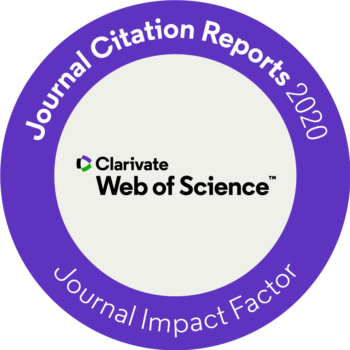
The updated citation metrics have been released in the Journal Citation Reports (JCR), published by Clarivate. The recent release of the JCR includes seventy-one MDPI titles. Out of these, 18 titles are newcomers, receiving a first Journal Impact Factor which is based on citation activity in 2019: Actuators, Agriculture, Biology, Biomedicines, Biosensors, Chemosensors, Children, Healthcare, Journal of Fungi, Journal of Personalized Medicine (JPM), Land, Life, Magnetochemistry, Membranes, Pharmaceuticals, Photonics, Separations and Toxics.
- Out of the previously listed journals, a total of 72 percent boast an increased Impact Factor.
- 25 journals are ranked among the top 25% of journals in at least one of the categories they are ranked for.
- Articles published in 2019 in MDPI journals account for approximately 17 percent of of articles published in gold Open Access journals covered in the Science Citation Index Expanded (SCIE) and Social Sciences Citation Index (SSCI).
First Impact Factors
| Journal | Impact Factor | Rank | Category | Details |
| Actuators | 1.957 | 31/64 (Q2) | • Instruments & Instrumentation | Link |
| Agriculture | 2.072 | 25/91 (Q2) | • Agronomy | Link |
| Biology | 3.796 | 19/93 (Q1) | • Biology | Link |
| Biomedicines | 4.717 | 30/138 (Q1) 36/270 (Q1) |
• Medicine, Research & Experimental • Pharmacology & Pharmacy |
Link |
| Biosensors | 3.240 | 24/86 (Q2) | • Chemistry, Analytical | Link |
| Chemosensors | 3.108 | 16/64 (Q1) 27/86 (Q2) 13/27 (Q2) |
• Instruments & Instrumentation • Chemistry, Analytical • Electrochemistry |
Link |
| Children | 2.078 | 50/128 (Q2) | • Pediatrics | Link |
| Healthcare | 1.916 | 62/102 (Q3) 45/87 (Q3) |
• Health Care Sciences & Services (SCIE) • Health Policy & Services (SSCI) |
Link |
| Journal of Fungi | 4.621 | 5/29 (Q1) 31/135 (Q1) |
• Mycology • Microbiology |
Link |
| Journal of Personalized Medicine | 4.433 | 24/165 (Q1) 10/102 (Q1) |
• Medicine, General & Internal • Health Care Sciences & Services |
Link |
| Land | 2.429 | 58/123 (Q2) | • Environmental Studies (SSCI) | Link |
| Life | 2.991 | 26/93 (Q2) 109/267 (Q2) |
• Biology • Microbiology |
Link |
| Magnetochemistry | 1.947 | 22/45 (Q2) 109/159 (Q3) 201/314 (Q3) |
• Chemistry, Inorganic & Nuclear • Chemistry, Physical • Materials Science, Multidisciplinary |
Link |
| Membranes | 3.094 | 53/143 (Q2) 129/314 (Q2) 23/89 (Q2) |
• Engineering, Chemical • Materials Science, Multidisciplinary • Polymer Science |
Link |
| Pharmaceuticals | 4.286 | 49/270 (Q1) | • Pharmacology & Pharmacy | Link |
| Photonics | 2.140 | 48/97 (Q2) | • Optics | Link |
| Separations | 1.900 | 53/86 (Q3) | • Chemistry, Analytical | Link |
| Toxics | 3.271 | 32/92 (Q2) 92/265 (Q2) |
• Toxicology • Environmental Sciences |
Link |
Updated Impact Factors
| Journal | Impact Factor | Rank | Category | Details |
| Agronomy | 2.603 | 18/91 (Q1) 65/234 (Q2) |
• Agronomy • Plant Sciences |
Link |
| Animals | 2.323 | 10/63 (Q1) 14/142 (Q1) |
• Agriculture, Dairy & Animal Science • Veterinary Sciences |
Link |
| Antibiotics | 3.893 | 23/93 (Q1) 64/270 (Q1) |
• Infectious Diseases • Pharmacology & Pharmacy |
Link |
| Antioxidants | 5.014 | 10/139 (Q1) 56/297 (Q1) 7/61 (Q1) |
• Food Science & Technology • Biochemistry & Molecular Biology • Chemistry, Medicinal |
Link |
| Applied Sciences | 2.474 | 161/314 (Q3) 32/91 (Q2) 88/177 (Q2) 62/154 (Q2) |
• Materials Science, Multidisciplinary • Engineering, Multidisciplinary • Chemistry, Multidisciplinary • Physics, Applied |
Link |
| Atmosphere | 2.397 | 48/93 (Q3) | • Meteorology & Atmospheric Sciences | Link |
| Biomolecules | 4.082 | 98/297 (Q2) | • Biochemistry & Molecular Biology | Link |
| Brain Sciences | 3.332 | 113/271 (Q2) | • Neurosciences | Link |
| Cancers | 6.126 | 37/244 (Q1) | • Oncology | Link |
| Catalysts | 3.520 | 65/159 (Q2) | • Chemistry, Physical | Link |
| Cells | 4.366 | 70/195 (Q2) | • Cell Biology | Link |
| Coatings | 2.436 | 10/21 (Q2) | • Materials Science, Coatings & Films | Link |
| Crystals | 2.404 | 10/26 (Q2) 165/314 (Q3) |
• Crystallography • Materials Science, Multidisciplinary |
Link |
| Diagnostics | 3.110 | 39/165 (Q1) | • Medicine, General & Internal | Link |
| Diversity | 1.402 | 119/168 (Q3) | • Ecology | Link |
| Electronics | 2.412 | 125/266 (Q2) | • Engineering, Electrical & Electronic | Link |
| Energies | 2.702 | 63/112 (Q3) | • Energy & Fuels | Link |
| Entropy | 2.494 | 33/85 (Q2) | • Physics, Multidisciplinary | Link |
| Foods | 4.092 | 27/139 (Q1) | • Food Science & Technology | Link |
| Forests | 2.221 | 17/68 (Q1) | • Forestry | Link |
| Genes | 3.759 | 53/177 (Q2) | • Genetics & Heredity | Link |
| Insects | 2.220 | 18/101 (Q1) | • Entomology | Link |
| International Journal of Environmental Research and Public Health (IJERPH) | 2.849 | 58/193 (Q2) 32/170 (Q1) 105/265 (Q2) |
• Public, Environmental & Occupational Health (SCIE) • Public, Environmental & Occupational Health (SSCI) • Environmental Sciences (SCIE) |
Link |
| International Journal of Molecular Sciences (IJMS) | 4.556 | 74/297 (Q1) 48/177 (Q2) |
• Biochemistry & Molecular Biology • Chemistry, Multidisciplinary |
Link |
| ISPRS International Journal of Geo-Information (IJGI) | 2.239 | 31/50 (Q3) 18/30 (Q3) |
• Geography, Physical • Remote Sensing |
Link |
| Journal of Clinical Medicine | 3.303 | 36/165 (Q1) | • Medicine, General & Internal | Link |
| Journal of Marine Science and Engineering | 2.033 | 31/66 (Q2) | • Oceanography | Link |
| Marine Drugs | 4.073 | 16/61 (Q2) | • Chemistry, Medicinal | Link |
| Materials | 3.057 | 132/314 (Q2) | • Materials Science, Multidisciplinary | Link |
| Mathematics | 1.747 | 28/324 (Q1) | • Mathematics | Link |
| Medicina | 1.205 | 107/165 (Q3) | • Medicine, General & Internal | Link |
| Metabolites | 4.097 | 95/297 (Q2) | • Biochemistry & Molecular Biology | Link |
| Metals | 2.117 | 18/79 (Q1) 185/314 (Q3) |
• Metallurgy & Metallurgical Engineering • Materials Science, Multidisciplinary |
Link |
| Micromachines | 2.523 | 56/92 (Q3) 23/64 (Q2) |
• Nanoscience & Nanotechnology • Instruments & Instrumentation |
Link |
| Microorganisms | 4.152 | 37/135 (Q2) | • Microbiology | Link |
| Minerals | 2.380 | 6/21 (Q2) 11/30 (Q2) |
• Mining & Mineral Processing • Mineralogy |
Link |
| Molecules | 3.267 | 70/177 (Q2) 141/297 (Q2) |
• Chemistry, Multidisciplinary • Biochemistry & Molecular Biology |
Link |
| Nanomaterials | 4.324 | 89/314 (Q2) 42/103 (Q2) |
• Materials Science, Multidisciplinary • Nanoscience & Nanotechnology |
Link |
| Nutrients | 4.546 | 17/89 (Q1) | • Nutrition & Dietetics | Link |
| Pathogens | 3.018 | 65/135 (Q2) | • Microbiology | Link |
| Pharmaceutics | 4.421 | 44/270 (Q1) | • Pharmacology & Pharmacy | Link |
| Plants | 2.762 | 58/234 (Q1) | • Plant Sciences | Link |
| Polymers | 3.426 | 16/89 (Q1) | • Polymer Science | Link |
| Processes | 2.753 | 59/143 (Q2) | • Engineering, Chemical | Link |
| Remote Sensing | 4.509 | 9/30 (Q2) | • Remote Sensing | Link |
| Sensors | 3.275 | 22/86 (Q2) 77/266 (Q2) 15/64 (Q1) |
• Chemistry, Analytical • Engineering, Electrical & Electronic • Instruments & Instrumentation |
Link |
| Sustainability | 2.576 | 120/265 (Q2) 26/41 (Q3) 53/123 (Q2) 6/8 (Q3) |
• Environmental Sciences (SCIE) • Green & Sustainable Science & Technology (SCIE) • Environmental Studies (SSCI) • Green & Sustainable Science & Technology (SSCI) |
Link |
| Symmetry | 2.645 | 29/71 (Q2) | • Multidisciplinary Sciences | Link |
| Toxins | 3.531 | 21/92 (Q1) 34/139 (Q1) |
• Toxicology • Food Science & Technology |
Link |
| Universe | 1.752 | 18/29 (Q3) 42/68 (Q3) |
• Physics, Particles & Fields • Astronomy & Astrophysics |
Link |
| Vaccines | 4.086 | 57/158 (Q2) 50/138 (Q2) |
• Immunology • Medicine, Research & Experimental |
Link |
| Viruses | 3.816 | 12/37 (Q2) | • Virology | Link |
| Water | 2.544 | 31/94 (Q2) | • Water Resources | Link |
Source: Clarivate 2020, InCites Journal Citation Reports®.
29 June 2020
Land Receives First Journal Impact Factor of 2.429
The editors are pleased to inform that Land has received a first Impact Factor of 2.429, as published in the 2019 Edition of the Journal Citation Reports® (Clarivate), released just now. Land ranks 58th out of 123 (Q2) titles in the 'Environmental Studies' SSCI category.
Thank you to the authors, editorial board members and reviewers for their contribution in achieving this milestone for Land.
13 May 2020
COVID-19 Academic Resources Center

Since 1996, MDPI has been committed to supporting the research community by providing the latest research freely available and making relevant and useful research available as quickly as possible. The world is current experiencing a pandemic of COVID-19, and researchers are working extremely hard to understand it and find a cure.
The values MDPI holds strongly are particularly important at the moment, and we will continue to publish relevant, peer-reviewed research as quickly as possible in open access format. This means that it will immediately be available for researchers, health professionals, and the general public to read, distribute, and reuse. We believe that scientific advancements will be crucial to overcoming this pandemic, and will do everything we can to support researchers working looking for solutions.
COVID-19 Academic Resources Center contains a variety of information related to COVID-19 available from MDPI, including journal articles, special issues, and preprints, among others.
For more information, please visit: https://www.mdpi.com/covid-19
15 April 2020
Call for Review for Land
Land (ISSN 2073-445X) is an international and crossdisciplinary open access journal of land use/land change, land management, land system science and landscapes published monthly online by MDPI. It is covered in the Social Science Citation Indexed (SSCI) in Web of Science.
The Editor-in-Chief, Prof. Dr. Andrew Millington, is currently seeking reviews on the following topics:
- All aspects of land use and land cover change
- Land systems science
- Land-related issues in climate, ecology, the environmental sciences, and the geosciences
- Land management, including the application of ecosystem services approaches
- Livelihoods, food security, and supply chains in relation to land issues
- Land tenure, including disputes and land grabs
- Landscape planning, conservation, and management
Submission guidelines can be found at:
https://www.mdpi.com/journal/land/instructions
All reviews will have the opportunity to be selected for the Land 2020 Best Paper Award. For more details, please refer to the following website:
https://www.mdpi.com/journal/land/awards
Please contact land@mdpi.com if you have any questions.
9 April 2020
Free Open Platforms to Support Academics During the COVID-19 Pandemic

As a leading Open Access publisher, MDPI is committed to fostering open scientific exchange in all forms across all disciplines. Due to the outbreak of COVID-19, many researchers have to stay at home and many academic conferences have been cancelled or postponed. In light of these changes, MDPI has adopted numerous initiatives that may help accelerate scientific exchange and provide support to the academics during this period.
Scholarly Community—Encyclopedia
Encyclopedia is an online reference created and curated by active scholars. It aims to highlight the latest research results as well as providing benchmark information for researchers and the general public interested in accurate and advanced knowledge on specific topics.
Comprehensive and Free Literature Database—Scilit
Scilit is a comprehensive, free database for scientists that uses a new method to collate data and index scientific material. Our crawlers extract the latest data from CrossRef and PubMed on a daily basis. This means that newly published articles are immediately added to Scilit.
Display Academic Achievements—SciProfiles
SciProfiles is an innovative social network for researchers and scholars that is developed by MDPI. In line with our broad mission, the purpose of SciProfiles is to accelerate discovery and innovation by facilitating immediate access to research results and providing opportunities for academic networking.
Organize and Participate in Conferences Online—Sciforum
Sciforum is an event planning platform that supports open science by offering the opportunity to host and participate in academic conferences. It provides an environment for scholarly exchange, discussion of topics of current interest, building of networks, and establishing collaborations.
Post Early Versions of Research Outputs—Preprints
Preprints is a platform dedicated to making early versions of research outputs permanently available and citable. We post original research articles and comprehensive reviews, and papers can be updated by authors at any time. Content on Preprints is not peer-reviewed, and feedback can be received from readers.
***
MDPI remains committed to open science and open data and has signed a statement, along with more than thirty scholarly publishers, showing our intention to facilitate sharing of new research findings as early on as possible. The initiative sees publishers collectively removing barriers to new research, in the face of a global healthcare crisis.
25 March 2020
MDPI Comment on the COVID-19 Virus
The world is currently suffering from a global pandemic of the corona virus COVID-19. MDPI expresses its sympathies for all of those affected by the virus and stands in solidarity with medical staff and researchers treating patients and searching for scientific solutions.
MDPI has previously published papers covering corona viruses in addition to new papers on the current outbreak, see all papers here. In particular, Viruses has published a number of Special Issues and papers on the topic (see here, here, and here) as well as a forthcoming Special Issue.
Alongside journal articles, MDPI has been a strong supporter of preprints, which are increasingly being used to rapidly disseminate the latest research, and we run the preprint server Preprints.org. Our database of research articles, Scilit, is free to use and covers all publishers including preprint servers. New papers are often in search results within hours of publication and users can set up alerts for new papers.
Our main priority during this period has been the health and safety of staff, and we continue to allow staff to work at home and closely monitor the situation in all locations in which we work. Despite the restrictions, we continue to provide a full publication service and, by close collaboration with our editorial boards and making use our in-house teams, ensure that there are no unnecessary delays in publishing vital research. Fast and open publication has always been at the core of MDPI values and is now more important than ever.
We hope that a solution to the current situation will emerge soon. In the meantime, we will do our best to continue communicating vital research in all fields.
18 March 2020
MDPI Co-Signed Position Statement on Transformative Agreements
The advantages of the open access model of scientific publishing are being increasingly recognized in the scientific community. It allows new scientific evidence to be accessed from the moment of publication for free by anyone around the globe, boosting the impact of new research. In response, many funders, libraries and universities have been adopting new principles to accelerate the transition to open access.
Recently, “transformative agreements” have been negotiated between traditional publishers and various institutions. While increasing the number of open access papers, these agreements lack binding commitments to a full transition to open access, their conditions vary across different regions, and access is still limited for many users.
MDPI is a co-signatory of the recent position statement raising concerns about potential downsides of transformative agreements and how they may delay a full transition to open access. The statement highlights that these models “risk perpetuating current limitations on access, transparency and market competitiveness, while simultaneously facilitating excessive charges on the public purse”.
As a pioneering open access journal publisher, MDPI is the first to promote the importance of science being made available to everyone. Our peer-reviewed journals, covering diverse academic disciplines, are fully accessible to the public free of charge under a Creative Commons Attribution License (CC BY). This is why, along with other open access publishers, MDPI is a proud signatory of the position paper and is committed to contributing to the replacement of weak transitional agreements with “agreements with publishers that are already fully committed to open science and who offer full, immediate and transparent Open Access”.
Read the position paper here
16 March 2020
Encyclopedia Outstanding Contributor Awards 2020 - Open for Application
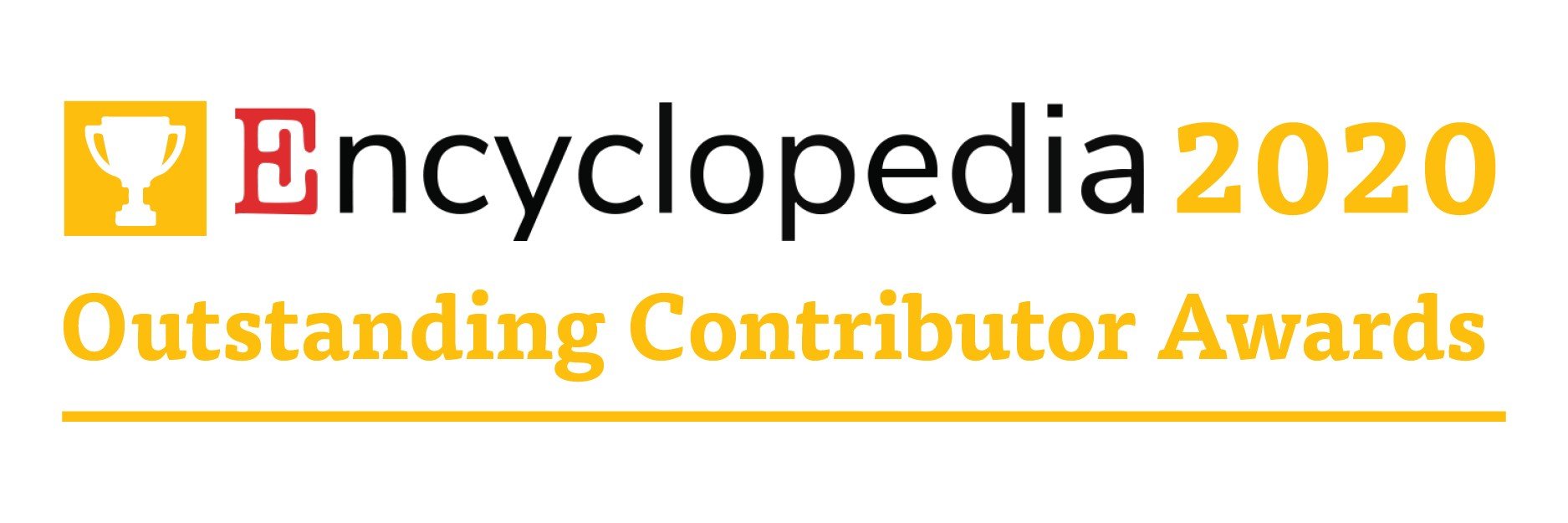
We are pleased to announce that Encyclopedia will be awarding five Outstanding Contributor Awards for researchers in 2020. The nominations and applications will be assessed by an Evaluation Committee consisting of senior scholars from the Encyclopedia Editorial Board.
Prize for Winners
- An official certificate;
- A cash award of 500 CHF or an MDPI discount voucher of 800 CHF.
Application Deadline
31 December, 2020 (Please send your application email with a list of all entries you contributed to our office before the deadline: office@encyclopedia.pub)
Candidate Requirements
- Have a Ph.D. degree;
- Have more than three qualified entries published in Encyclopedia in 2020.
Evaluation Standards
- Number of entries published in Encyclopedia in 2020;
- Quality of entries online (including length, figure quality, and novelty);
- Impact of entries (including the number of likes, discussion contents, views, and downloads).
If you are a researcher and have not yet contribute entries to Encyclopedia, please do not miss this chance to highlight your research results.
9 March 2020
Meet Us at European Geosciences Union (EGU) General Assembly 2020 in Vienna, Austria, 3–8 May
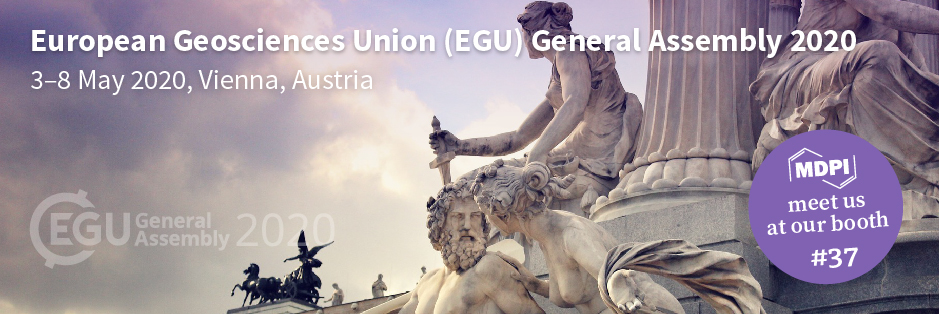
MDPI will be attending EGU in Vienna, Austria on 3–8 May 2020.
The EGU General Assembly 2020 will bring together geoscientists from all over the world to one meeting covering all disciplines of the Earth, planetary and space sciences. The EGU aims to provide a forum where scientists, especially early career researchers, can present their work and discuss their ideas with experts in all fields of geoscience.
The following MDPI journals will be represented:
If you are also attending this conference, please feel free to stop by our booth (#37) at Austria Centre Vienna (ACV). Our delegates look forward to meeting you in person to answer any questions you may have. For more information about the conference, please visit: https://egu2020.eu/
21 January 2020
Meet Us at the 2020 IEEE International Geoscience and Remote Sensing Symposium (IGARSS 2020) in Waikoloa, Hawaii, USA, 19–24 July, 2020
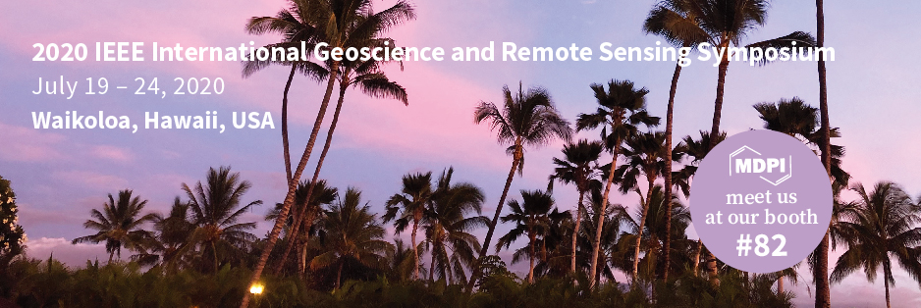
MDPI will be attending the IGARSS 2020, to be held in Hawaii, USA, 19–24 July 2020
Hosted by the IEEE Geoscience and Remote Sensing Society, the 2020 IEEE International Geoscience and Remote Sensing Symposium (IGARSS 2020) will be held Sunday, 19 July through Friday, 24 July, 2020 at the Hilton Waikoloa Village in Waikoloa, Hawaii, USA. The main theme of the 2020 symposium is "Remote Sensing: Global Perspectives for Local Solutions".
GARSS 2020 is offering unique perspectives, discussions, research, solutions, and an opportunity to network in a beautiful environment.
The following MDPI journals will be represented:
If you are also attending this conference, please feel free to stop by our booth (Booth # 82). Our delegates look forward to meeting you in person to answer any questions you may have. For more information about the conference, please visit https://igarss2020.org/default.asp.
21 January 2020
Meet Us at the 2020 Annual Meeting of the American Association of Geographers in Denver, USA

MDPI will be attending the AAG annual meeting, to be held in Denver, USA, from 6–10 April 2020
The AAG 2020 is joined by fellow geographers, GIS specialists, environmental scientists, and other leaders for the latest in research and applications in geography, sustainability, and GIScience. The meeting will be held from Monday, April 6 - Friday, April 10, 2020, and will feature over 6,900 presentations, posters, workshops, and field trips by leading scholars, experts, and researchers.
The Annual Meeting of the AAG is quite possibly the largest geography conference in the world, with over 8,500 geographers converging from the U.S., Canada, and nearly 60 other countries in a typical year. With thousands of different papers and presentations scheduled throughout the conference, you’ll find no shortage of activities that reflect your specific interests within the field of geography.
The 2020 Annual Meeting will be held at the Hyatt Regency – Denver at Colorado Convention Center and the Sheraton Denver Downtown Hotel in Downtown Denver, Colorado. For more information, visit https://www2.aag.org/aagannualmeeting/.
The following MDPI journals will be represented:
ISPRS International Journal of Geo-Information
If you are also attending this conference, please feel free to stop by our booth (Booth #415). Our delegates look forward to meeting you in person to answer any questions you may have. For more information about the conference, please visit https://www2.aag.org/aagannualmeeting/.
25 November 2019
Recruiting Editors for Land
Land is recruiting Editorial Board members for our new sections:
- Land Systems and Global Change
- Landscape Ecology
- Land-Soil-Water-Climate Interactions
- Socio-Economic and Political Aspects of Contemporary and Historical Land Issues
- Urban Contexts and Urban-Rural Interactions
Land (ISSN 2073-445X) is an international and crossdisciplinary open access journal of land use/land change, land management, land system science and landscape, etc, published monthly online by MDPI. It has been covered in the Social Science Citation Indexed (SSCI) in Web of Science.
As an Editorial Board member, you have the following responsibilities:
– To make decisions on whether a manuscript can be accepted or not based on the reports we collect;
– To edit a Special Issue on a topic related to your research interests when it is convenient for you;
– To promote Land and increase its visibility at related academic conferences.
To apply or request further information, please contact the Land Editorial Office (Land@mdpi.com). We look forward to hearing from you soon.
11 October 2019
Introducing SciProfiles, an Academic Social Network
MDPI is pleased to announce the release of SciProfiles, its social network platform for researchers and scholars.
The purpose of SciProfiles is aligned with MDPI’s broad mission to accelerate discovery and innovation by facilitating immediate access to research results and to serve scholars and communities by providing opportunities for academic networking.
SciProfiles also ambitions to serve as a sustainable, transparent and community-driven research evaluation system aligned with the DORA principles (https://sfdora.org/). Through their scientific profiles, academics can highlight their contribution to research communities, and measure their impact on their field, beyond publication numbers and impact factors. SciProfiles is currently a beta version and will enrich to give researchers the possibility to highlight all of their contributions to science and their scientific communities as authors, reviewers, editors, conference organizers, conference panelists, conference keynote speakers, or even as lecturers or student mentors at their University.
The classic components of popular community social networks, including follower/following, classical metrics, endorsements and recommendations (https://www.mdpi.com/about/announcements/1690), comments (https://www.mdpi.com/about/announcements/1397) are or will be very soon highlighted in SciProfiles as open science contributions.
To help increase the impact and visibility of articles and their authors to an appropriate audience, the platform offers a NewsFeed that includes recommendations of relevant content based on interests, publication history, saved searches or colleagues’ recommendations.
SciProfiles’ avatars are now being integrated on several MDPI platforms, meaning that you will directly access researchers’ profiles from any of the MDPI platforms:
MDPI's journal publishing website: www.mdpi.com
MDPI's conference hosting and management website: www.sciforum.net
MDPI's pre-print website : www.preprints.org
MDPI's knowledge sharing website : www.encyclopedia.pub
MDPI's books store: www.mdpi.com/books
MDPI's literature database : www.scilit.net
SciProfiles aims to serve scientific communities at large. It can be embedded into third-party websites and also welcomes integration of data from third-parties.
Dr. Shu-Kun Lin: https://sciprofiles.com/profile/2
Dr. Franck Vazquez: https://sciprofiles.com/profile/FranckVazquez
Dr. Martyn Rittman: https://sciprofiles.com/profile/martynrittman
2 October 2019
Winners of the 2019 MDPI Writing Prize
We are delighted to announce the winners of the 2019 MDPI Writing Prize. Entrants were asked to write on the theme "Judging research: How should research and researchers be evaluated and rewarded?" We received a large number of excellent essays from PhD students and postdocs, and the process of shortlisting and choosing winners was not an easy one. The winners demonstrated excellent writing skills alongside interesting and thought-provoking ideas.
As last year, we will begin the process of collating all entries into a book that will be available in open access format. Alongside promoting good writing skills, we see the prize as a way to promote the voices of early career researchers within broader debates and policy discussions.
Congratulations to all of the participants and especially the winners. The winners are:
1st Prize (500 CHF):
Albin Nilsson (National Centre for Nuclear Research, Warsaw, Poland)
[Read here]
2nd Prize (250 CHF):
Qi Zhang (Shandong University, Jinan, China)
[Read here]
Igor Ogashawara (Indiana University, Indianapolis, US)
[Read here]
3rd Prize (100 CHF):
Margaret Sivapragasam (Universiti Teknologi Petronas, Perak, Malaysia)
[Read here]
Arvind Sharma (The University of Queensland, Gatton, Australia)
[Read here]
Jose Flores-Guerrero (University Medical Center Groningen, Groningen, The Netherlands)
[Read here]
The MDPI Writing Prize is an annual award supported by MDPI Author Services, which provides services including language editing, reformatting, plagiarism checks, and image editing.
20 September 2019
MDPI Now Gives Scholars the Possibility to Endorse and Recommend Articles

MDPI is pleased to announce the release of a new functionality giving the possibility for researchers and scholars to endorse, and formally recommend articles to their colleagues.
MDPI was an early signatory of the San Francisco Declaration on Research Assessment (https://sfdora.org/read/) which calls for improvement in how quality and impact of scholarly research outputs are evaluated, especially in moving beyond journal-based citation metrics (journal Impact Factor, Scopus Citescore, etc.).
MDPI supports the establishment of article-level impact metrics, including citations, views, downloads, and Altmetric scores. These measures serve as an impact indicator for research articles on a case–by-case basis, assessing paper on its own merit. However, these metrics are also subjective and can give a biased picture of the article impact: they do not directly reflect the quality or the intrinsic scientific value of the article.
In our view, community engagement with publications based on community-driven metrics can help to overcome this limitation. We have therefore launched an option for scholars to endorse articles, indicating their own assessment of its content and making a recommendation to their community. This follows our implementation of the open source Hypothesis commenting tool, which has been available for all articles published by MDPI for over a year (https://www.mdpi.com/about/announcements/1397). Both endorsement and commenting are available for all previously published and forthcoming MDPI articles.
In addition to potentially serving as a sustainable solution to article assessment, endorsements will help scientific communities to identify the most relevant articles, independently of the journal in which it was published.
The code for the endorsing functionality, which relies on DOIs and ORCIDs, will be made available on GitHub with an open source license.
Dr. Shu-Kun Lin, President and Founder
Dr. Franck Vazquez, Chief Scientific Officer
Dr. Martyn Rittman, Publishing Director
11 September 2019
Create an Entry in Encyclopedia to Get a 100 CHF Voucher in Publishing in MDPI Journals
Encyclopedia is a free online reference created and curated by active scholars. It aims to highlight the latest research results as well as provide a comprehensive record of scientific development. If you have any suggestions or questions, please feel free to contact us via office@encyclopedia.pub.

6 August 2019
Preprints Reaches 10,000 Posted Articles Milestone
We are pleased to announce that Preprints has passed the milestone of 10,000 posted preprints. We are delighted to have reached this after just over three years of operation. Our congratulations and thanks go to our authors and advisory board who have supported growth of the platform and been crucial to its operation.
You can find further details at https://www.preprints.org/announcement/show/37.
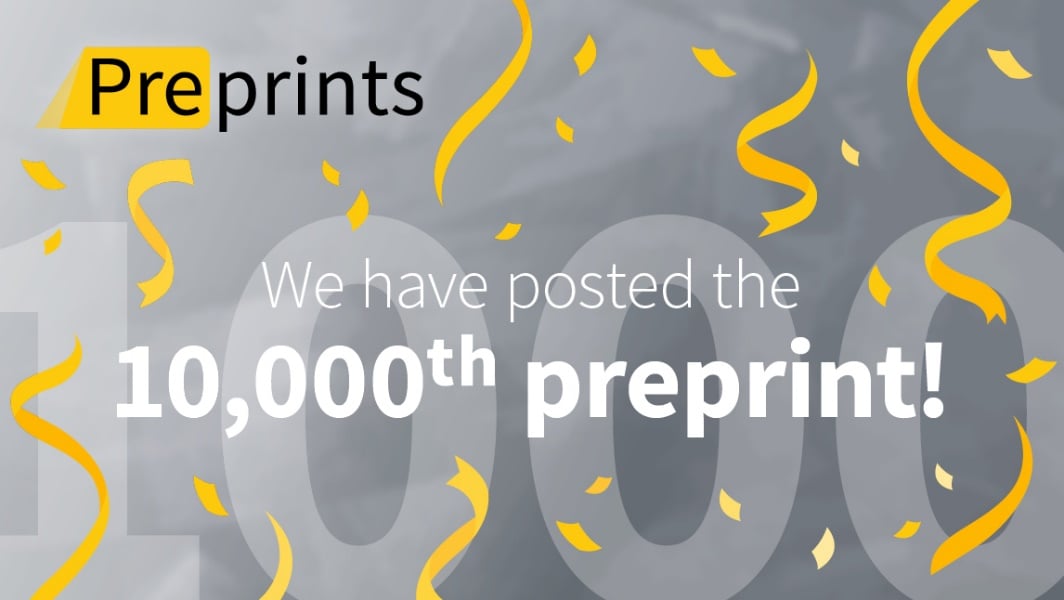
2 August 2019
DeepGreen Partnering with Publishers and Universities in Distributing Open Access Content to Institutional Repositories
Last week, the DeepGreen initiative in Germany started into an advanced test phase with the publishing partners S. Karger AG, SAGE Publishing, MDPI, Frontiers and De Gruyter, as well as 27 universities from all over Germany, from Hamburg University of Applied Sciences to University of Konstanz.
DeepGreen aims at lowering the barriers for open access publishing by automatically delivering metadata and full text publications from participating publishers to authorized repositories at German universities.
In preparation for a later live operation, the advanced test phase serves to gain experience with extensive data deliveries from publishers and also handling different repository software (including OPUS4, DSpace, EPrints, MyCoRe). DeepGreen thereby acts as a sophisticated platform, receiving articles published by authors affiliated with German universities and depositing these articles to respective university repositories, based on the affiliation metadata. For more information about DeepGreen: https://deepgreen.kobv.de
Karger AG has been a close cooperation partner of the DeepGreen consortium since 2016. S. Karger has more than 80 subscription-based and around 20 open access journals covering a wide spectrum in health science. DeepGreen will assign S. Karger articles to authorized institutions on the legal basis of German alliance and national licenses.
SAGE Publishing was founded by Sara Miller McCune in 1965 to support the dissemination of usable knowledge and educate a global community. SAGE publishes more than 1,000 journals and over 600 new books each year, spanning a wide range of subject areas. Our growing selection of library products includes archives, data, case studies and video. SAGE remains majority owned by our founder and after her lifetime will become owned by a charitable trust that secures the company’s continued independence. Principal offices are located in Los Angeles, London, New Delhi, Singapore, Washington DC and Melbourne. SAGE Publishing has been a close cooperation partner of DeepGreen since 2016.
MDPI is a scientific open access publisher and has been a partner of DeepGreen since 2017. MDPI comprises 205 peer-reviewed journals of various disciplines. All articles are published under a CC-BY license and are freely available without embargo period.
Frontiers is a scientific open access publisher with 61 journals of over 600 academic disciplines. All articles are peer-reviewed and published freely available under CC-BY license.
De Gruyter is an academic publisher with more than 700 subscription-based and open access journals of 29 disciplines. Articles provided by De Gruyter will be assigned to institutions with German alliance and national licenses.
There is promising communication with other publishers.
DeepGreen is funded by the German Research Foundation (DFG) and the consortium comprises six institutions: the Cooperative Library Network Berlin-Brandenburg, Bavarian State Library, Bavarian Library Network, University Library of the Technische Universität Berlin, University Library of Erlangen-Nuremberg and the Helmholtz Open Science Coordination Office at the GFZ German Research Centre for Geosciences.
If you would like to know in more detail which institutions take part in the advanced test phase of DeepGreen, you can find more information here.
17 July 2019
First Basel Sustainable Publishing Forum
The University of Basel and the MDPI Sustainability Foundation are organizing the First Basel Sustainable Publishing Forum on 9th September 2019.
The aim of this event is to provide background and perspectives on Plan S to Learned Societies, which have to make well-informed decisions to transition their journals to Open Access (OA).
The BSPF will bring together several representatives of Learned societies, Plan S architects as well as representatives from various publishers and publishing platforms. After getting the big picture from cOAlition S, panel discussions will allow to better understand the diverse challenges that Learned societies are facing to transition their journals to OA as well as to identify sustainable, implementable and scalable solutions for successful Open Access transition.
For program details and registration, please follow the link below:
https://sciforum.net/conference/SustainableSolutionsToOpenAccess
4 April 2019
Meet Us at IGARSS 2019 in Yokohama, Japan, 28 July – 2 August 2019
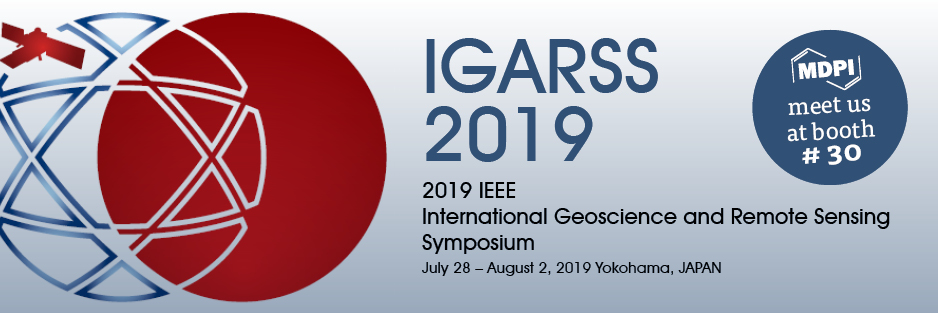
MDPI will be attending the 2019 IEEE International Geoscience and Remote Sensing Symposium, to be held in Yokohama, Japan, 28 July – 2 August 2019.
This conference will be the 39th annual IGARSS symposium and will continue the excellent tradition of gathering world-class scientists, engineers and educators engaged in the fields of geoscience and remote sensing. We believe that the additional scientific themes of this event, focusing on 'Disasters and Environment' will allow the formation of an inspiring technical program.
IGARSS is recognized today as a premier event in remote sensing and provides an ideal forum for obtaining up-to-date information about the latest developments, exchanging ideas, identifying future trends in your research area and making contacts with the international remote sensing community. With intensive and careful planning underway we anticipate a technically outstanding and most pleasant symposium.
The following MDPI journals will be represented:
Remote Sensing
IJGI
Sensors
Water
Geosciences
Atmosphere
Land
Forests
JMSE
Sustainability
If you are also attending this conference, please feel free to stop by our booth (Booth # 30). Our delegates look forward to meeting you in person to answer any questions you may have. For more information about the conference, please visit https://igarss2019.org/CallForSponsorsExhibitors.asp.
20 March 2019
Fostering Open Access Publishing Worldwide: New IOAP Participants in February and March 2019
We are pleased to welcome more universities from Poland, Italy, Germany, Brazil and other parts of the world to MDPI's Institutional Open Access Program (IOAP). A warm welcome to the institutions listed below, who have joined the Program in February and March this year.
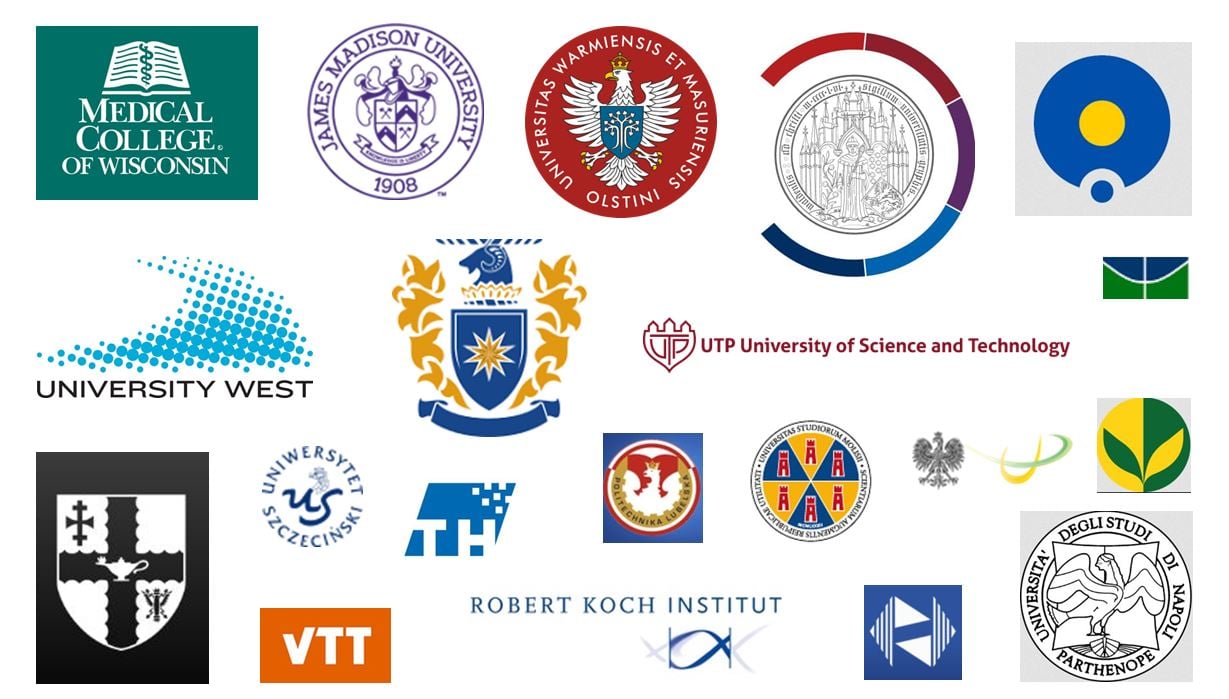
Authors affiliated with these institutions can now enjoy a discount on the APC for papers accepted for publication in any MDPI journal. If you would like to learn more about our program, please visit: https://www.mdpi.com/about/ioap or email us at ioap@mdpi.com.
5 March 2019
MDPI Joins Jisc’s Publications Router Service
We are delighted to announce our participation in Jisc’s Publication Router project, as of March 2019.
Publications Router is a Jisc service that automatically sends notifications about research articles to institutions' systems such as their repositories or CRISs, since May 2015. Through this agreement, MDPI will provide Jisc with daily feeds and information regarding published articles, which will be gathered by their system and delivered to institutions also registered to this service. Nearly all of our articles are published within 15 days of acceptance, so institutions will receive them quite promptly.
The feed will include the full text of the published version of record, with no embargo, so the articles can be exposed immediately for public view. They are accompanied by rich metadata, including confirmation of the immediate CC BY licence, minimising the need for any manual intervention or checking.
For more information about Publications Router, you may contact Jisc’s central helpdesk at help@jisc.ac.uk. For any queries about MDPI’s institutional agreements and collaborations, you may get in touch with MDPI’s Institutional Engagement team at ioap@mdpi.com, which would be very happy to hear from further UK institutions.
1 February 2019
2018 MDPI Top Reviewer Award—Winners Announced
Rigorous peer-review is the cornerstone of high quality academic publishing. Over 97,000 scholars served as reviewers for MDPI journals in 2018. We are extremely appreciative of all those who made a contribution to the editorial process in this capacity. At the beginning of every year, journal editorial offices publish a list all reviewers’ names to express our gratitude. In addition, this year the “MDPI Top Reviewer Awards” are announced, to recognize the very best reviewers for their expertise, dedication, high quality, and timely review reports. We are pleased to announce the following winners of the 2018 MDPI Top Reviewer Awards:
- Ali Behnood
- Andrea Pezzuolo
- Angela Gorgoglione
- Anna D'Auria
- Antonio D'Andrea
- Azhar Abbas
- Bogdan Zagajewski
- Chunhui Chen
- Dominika Głąbska
- Dominika Guzek
- Dragan Pamucar
- Francisco J. G. Silva
- Frank Li
- Gianluca Serafini
- Gyorgy Szekely
- Haozhi Pan
- Helvi Heinonen-Tanski
- José Manuel Gómez-Soberón
- Kathy Lewis
- Klara Kosova
- Luis N. López De Lacalle
- M. Z. Naser
- Malwina Tytła
- Masoume Amirkhani
- Matteo Ghidelli
- Moretti Laura
- Petra Schneider
- Roberto Cerchione
- Spyros Papaefthymiou
- Ştefan Cristian Gherghina
24 January 2019
JAMS Journals: A Low-Cost Publishing Platform

Since 2010, MDPI has run its own online submission system. More recently, we have made the software, with accompanying publishing services, available to other publishers as JAMS (Journal and Article Management System). We are now delighted to announce the launch of JAMS Journals, a standardized platform for operating open access journals at low cost.
JAMS Journals provides a comprehensive service, including a shared submission website, journal websites hosted at a URL provided by the publisher, and a full production service. There is a small setup fee and the cost for each published paper is just a few hundred Swiss francs.
The platform demonstrates that running an open access journal can be straightforward and affordable. The JAMS Journals platform is suitable for
- small publishers or groups of scholars looking to launch their own journal;
- existing publishers or societies seeking to explore open access options;
- publishers looking to convert an existing subscription journal to open access.
JAMS journals launches with two journals from Canadian-based publisher Etcetera Publications:
- Canadian Journal of Pesticides & Pest Management (http://www.cjppm.ca)
- Nanotechnology in Agriculture, Food & Environment (http://www.nanoafe.ca)
Dr AJ Al-Rajab (President of Etcetera Publications) comments:
“In the past few months, we were working on our project to launch new open access scientific journals in the field of agricultural and environmental sciences. We decided to go with JAMS for this venture because of the high quality of their services, reasonable prices, professionalism and easy communication. Our portfolio is expected to grow rapidly during 2019 to include more titles covering different areas in agriculture and environment. MDPI earned already our complete satisfaction and we are looking for a long term cooperation.”
Alongside the new platform, we continue to provide flexible, tailored journal management solutions for existing publishers. For any questions or to request a quotation, contact Dr. Constanze Schelhorn (constanze.schelhorn@mdpi.com).
24 January 2019
Popularity of Preprints Continues to Grow

2018 was a great year for preprints, with increasing numbers of authors looking to make their papers available online before peer review. Along with other preprint servers, our platform Preprints.org saw an increase in the uptake from authors, and more than double the number of announced papers compared to 2017. In fact, we recently passed two important milestones: 8000 preprints online and 30,000 authors.
We believe that the whole research community has the opportunity to benefit from work being available online as early as possible. We thank and congratulate our authors for supporting us to make this goal a reality.
In 2019, we will be looking carefully at how to provide better value for authors, maintain efficiency while growing in size, and make sure we remain well-connected with the research community.
If you want to participate, you can consider screening preprints or joining our advisory board. And, of course, posting your own work.
9 January 2019
Open Access Agreement between the Austrian Academic Library Consortium (KEMÖ), the Austrian Science Fund (FWF), and MDPI

We are delighted to announce the establishment of our national Open Access agreement with the Austrian Academic Library Consortium (KEMÖ) and the Austrian Science Fund (FWF). Through this national agreement, the Austrian institutions listed below as well as FWF will cover the Article Processing Charges (APC) of manuscripts published by eligible corresponding or funded authors in MDPI journals as long as central funds are available.
All participating institutions have gained access to the MDPI online submission system where they can find full article metadata and pricing information as well as Funder and Grant ID details for easy identification and additional transparency. At the same time eligible authors are benefited from an APC discount which comes at no cost for the institutions.
Eligible corresponding authors affiliated with the participating institutions are prompted to choose the corresponding Institutional Open Access Program (IOAP) when they submit an article via our online submission system. The program will be selected automatically if authors submit their papers using their institutional email address. To claim their discount, FWF funded authors should choose the particular funder and add their Grant ID upon online submission of their manuscript. The institutions will then crosscheck the information and confirm the APC funding.
Eligible authors that have their APC covered by their institution or funder are advised to include the following sentence in their acknowledgments: "Open Access Funding by the [name of the institution/funder]".
The full text of the agreement is openly available online at: http://doi.org/10.5281/zenodo.2536007
For any questions about the agreement, please contact the KEMÖ Consortium at emedien@obvsg.at, FWF at Katharina.Rieck@fwf.ac.at, or the MDPI IOAP team at ioap@mdpi.com.
The Austrian institutions participating in this agreement are:
- Austrian Science Fund (FWF)
- University for Continuing Education Krems
- University of Applied Sciences BFI Vienna
- University of Applied Sciences Upper Austria
- University of Applied Sciences Technikum Wien
- Vorarlberg University of Applied Sciences
- International Institute for Applied Systems Analysis (IIASA)
- Institute of Science and Technology Austria
- MCI Management Center Innsbruck
- University of Graz
- University of Linz
- University of Salzburg
- Graz University of Technology
- TU Wien
- University of Veterinary Medicine Vienna
- University of Vienna
This is our first collective agreement with a national library consortium, while the individual institutions around the world participating in our IOAP are now more than 500 - see details here: https://www.mdpi.com/about/ioap. We would be mostly interested in discussing about possible collaborations with other consortia, funders, and institutions in our mutual efforts to accelerate Open Access.
2 January 2019
Encyclopedia—the Scholarly Community Encyclopedia

We are pleased to announce the new platform Encyclopedia, which is an online reference created and curated by active scholars. It aims to highlight the latest research results as well as providing benchmark information for researchers and the general public interested in accurate and advanced knowledge on specific topics.
We encourage authors of review articles to quote and adapt the content of their published papers to create Encyclopedia entries. You can create completely new entries on topics in which you have knowledge and expertise. There is no limit on the topics or research fields. All of science and the humanities are included. Each entry will be published directly after submission.
We also have prepared a DOI application function in Encyclopedia. Once a DOI application is approved, the entry website will announce the DOI number and a pdf version with DOI information will be automatically created.
We look forward to your contributions and hope you will make use of this service. Find more about the service at: https://encyclopedia.pub/
7 December 2018
Meet Us at the 2019 Annual Meeting of the American Association of Geographers in Washington, DC, 3–7 April 2019
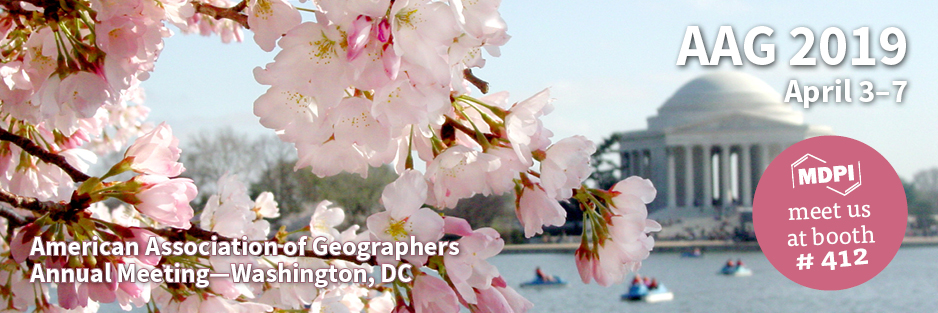
MDPI will be attending the AAG Annual Meeting, to be held in Washington, DC, US, 3–7 April 2019.
Representing an international community of geographers, GIS specialists, and environmental scientists, the Annual Meeting of the American Association of Geographers is an interdisciplinary forum open to anyone interested in geography and related disciplines. The AAG facilitates the exchange of the latest research and applications in geography and GIScience, with over 8,500 annual meeting attendees. Founded in 1904 as a scientific and educational society, the AAG is a growing body of leading scholars, researchers, professionals, and students. The AAG promotes networking and collaboration among its members through events such as its annual meeting, international workshops, specialty conferences, publications, and research programs. For more information, visit annualmeeting.aag.org
The following MDPI journals will be represented:
Remote Sensing
IJGI
Land
Genealogy
Quaternary
If you are also attending this conference, please feel free to stop by our booth (Booth # 412). Our delegates look forward to meeting you in person to answer any questions you may have. For more information about the conference, please visit annualmeeting.aag.org.
31 October 2018
Meet Us at the BES Annual Meeting 2018 in Birmingham, UK, 16–19 December 2018
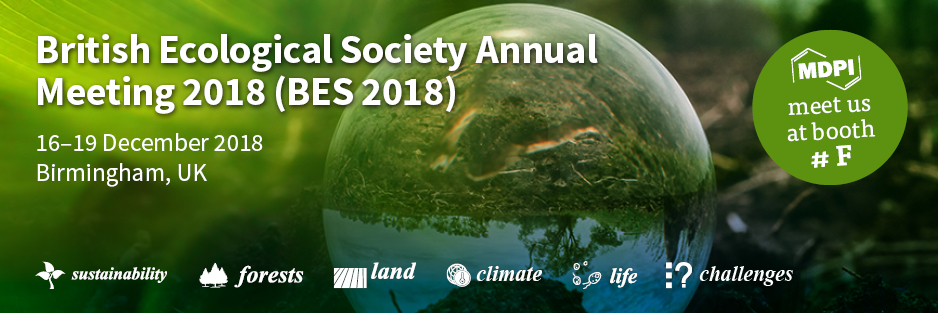
MDPI will be attending the British Ecological Society Annual Meeting 2018, to be held in Birmingham, UK, 16–19 December 2018.
Over the last 40 years, the British Ecological Society Annual Meeting has grown into Europe’s largest and most influential annual event dedicated to ecology. In 2018, the British Ecological Society staging the Annual Meeting at the ICC in the heart of Birmingham. From 16–19 December 2018, 1600 ecologists—many of them world leaders in their field—representing business, academia, professional bodies, and NGOs from across the world, will converge in the United Kingdom’s second largest city for #BES2018.
The following MDPI journals will be represented:
Sustainability
Forests
Land
Climate
Life
Challenges
If you are also attending this conference, please feel free to stop by our booth (Stand #F). Our delegates look forward to meeting you in person to answer any questions you may have. For more information about the conference, please visit: https://www.britishecologicalsociety.org/events/bes2018/.
30 October 2018
Institutional Open Access Agreement between Bill and Melinda Gates Foundation and MDPI
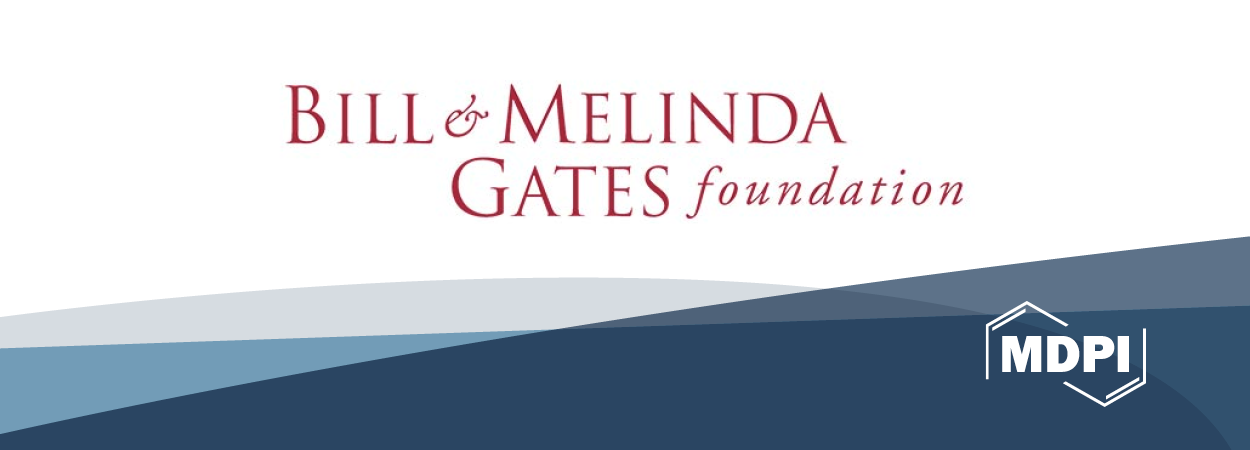
We are delighted to announce that the Bill and Melinda Gates Foundation (BMGF) is now a participant of our Institutional Open Access Program (IOAP). Authors funded by the BMGF can enjoy discounts on the APC, while the funder covers the costs of eligible articles centrally. BMGF also has access to the MDPI online submission system where they can find full article metadata and pricing information as well as Grant ID details for easy identification and additional transparency.
We hope that funded authors find the programme beneficial and we are happy to offer our IOAP to other funders that need a streamlined workflow of compliance checking and APC coverage.
To claim their discount, BMGF funded authors should choose the particular funder and add their Grant ID upon online submission of their manuscript.
For any questions about the BMGF agreement, please contact the funder at support@chronos-oa.com or the MDPI IOAP team at ioap@mdpi.com.
2 October 2018
MDPI Welcomes Plan S
Recently, it was announced that a group of European funders supported 10 principles that will help to expand open access, known as Plan S. MDPI warmly welcomes this move as a step towards achieving more open and accessible communication of research across all disciplines. Some aspects remain to be clarified, however the details given so far match the aims and values that MDPI has held over the past two decades.

We believe that open access publishers should be active participants in discussions around Plan S, particularly regarding potential new business models and practical aspects of implementation. MDPI supports APCs as a transparent unit of payment for article publishing, however we are committed to exploring other measures and recently signed the Jussieu Call. Sustainability is a key value for MDPI, and future funding models should have at their heart the sustainability of knowledge and research dissemination. Plan S provides an opportunity for funders and publishers to directly discuss funding of open access journals in ways that are beneficial to all parties involved.
30 August 2018
MDPI establishes Open Access agreement with Qatar National Library

We are happy to announce the establishment of an Open Access (OA) agreement with Qatar National Library (QNL). QNL is committed to supporting and helping Qatar authors publish OA at no cost. Through this national agreement, QNL will cover the Article Processing Charges (APC) of manuscripts published by Qatar-based corresponding authors in MDPI journals.
Eligible corresponding authors affiliated with Qatar research centers and universities are prompted to choose QNL as part of our Institutional Open Access Program (IOAP) when they submit an article via our online submission system. The program will be selected automatically if authors submit their papers using their institutional email and/or a computer registered with the institution’s IP range. QNL will then crosscheck the information and confirm the APC funding.
Qatar authors that have their APC covered by QNL are advised to include the following sentence in their acknowledgments: "The publication of this article was funded by Qatar National Library".
For more information, please visit Open Access at QNL or email the QNL Open Access team at openaccess@qnl.qa.
19 June 2018
Meet us at the 2018 ASA and CSSA Annual Meeting
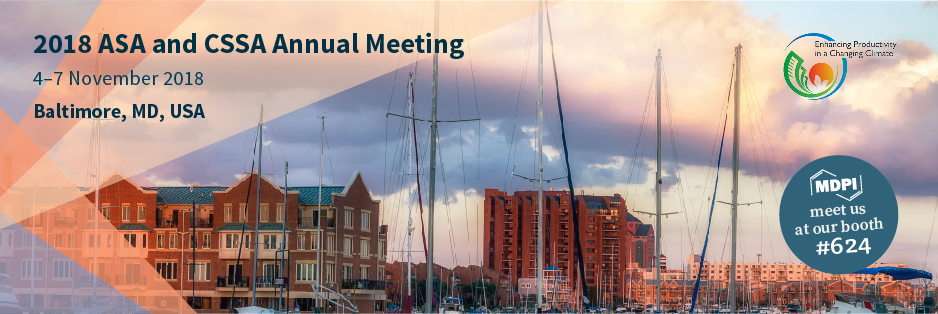
Location: Baltimore, MD, USA
Date: 4–7 November 2018
We will be attending the 2018 ASA and CSSA Annual Meeting in Baltimore, MD, USA, to be held 4–7 November 2018. The American Society of Agronomy, the Crop Science Society of America, and the Canadian Society of Agronomy will host approximately 2,500 scientists, professionals, educators, and students at the 2018 International Annual Meeting, "Enhancing Productivity in a Changing Climate". It’s the premiere opportunity for professionals working in agronomic, crop, soil, and related sciences to hear about the latest research, meet and learn from their peers, expand their knowledge base, and take advantage of an abundance of networking opportunities to enhance their career. This year’s Annual Meeting will feature more than 2,000 technical presentations, along with a host of networking events and award ceremonies. The world-class exhibition displays the latest scientific equipment, supplies, services, and reference materials available. Representatives of the following MDPI open access journals will attend:
If you are attending this conference, please stop by our booth (Booth #624). Our delegates look forward to meeting you in person and answering any questions you may have concerning open access publishing and our journals.For more information about the conference, please visit: https://www.acsmeetings.org/about
1 June 2018
Land 2017 CiteScore™ Announced - 1.44
We are pleased to report theLand received a CiteScore of 1.44 for 2017. The metric reflects citation activity in 2017 in Scopus for papers published in the period 2014‒2016.
For the full details in the current CiteScore release, please see the journal's Source profile. To check the full list of MDPI journals receiving CiteScores, please see here.
31 May 2018
2017 CiteScore™ Metrics Released
The 2017 CiteScore™ data is available now, based on citation data in the Scopus® database. The current CiteScore reflects citation activity in 2017 for articles published in 2014‒2016. Please note that the list below includes journals assigned a CiteScore in this year’s release. For a full list of journals indexed in Scopus, please see our journal list.
Thirteen of our journals received a CiteScore which is in the top 10% of the distribution in at least one of the categories (marked with * in the table below), while a further 32 journals exhibit scores that are in the first quartile of the respective categories.
To access the full data for MDPI journals, please see here. More data can also be found in SJR Scimago Journal & Country Rank.
Unlike CiteScores and the widely used Journal Impact Factors, the Source Normalized Impact per Paper (SNIP) metrics are normalized in order to correct for differences in citation practices between scientific fields. Therefore, the SNIP allows direct comparison between journals specialized in different fields.
According to 2017 data, MDPI publishes six journals with an average citation impact, or SNIP, in excess of 1.500. These journals are Biomolecules, Cancers, Journal of Clinical Medicine (JCM), Marine Drugs, Remote Sensing and Sensors (see the last column in the table below).
CiteScore Data for MDPI Journals
| Journal | Rank (Quartile) |
Category | Link | CiteScore 2017 | 2016 |
2015 |
SNIP 2017 |
| Aerospace | 43/116 (Q2) | • Aerospace Engineering | Link | 1.23 | - | - | 1.152 |
| Agriculture | 69/309 (Q1) 91/398 (Q1) 78/255 (Q2) |
• Agronomy and Crop Science • Plant Science • Food Science |
Link | 1.93 | - | - | 1.133 |
| Agronomy | 46/309 (Q1) | • Agronomy and Crop Science | Link | 2.38 | - | - | 1.115 |
| Algorithms | 22/46 (Q2) 61/125 (Q2) 60/107 (Q3) 64/114 (Q3) |
• Numerical Analysis • Computational Mathematics • Computational Theory and Mathematics • Theoretical Computer Science |
Link | 1.03 | 1.15 | 1.07 | 0.749 |
| Animals | 12/154 (Q1) * 48/367 (Q1) |
• General Veterinary • Animal Science and Zoology |
Link | 2.02 | 1.46 | 1.66 | 1.099 |
| Antibiotics | 6/68 (Q1) * 62/263 (Q1) 55/230 (Q1) 31/108 (Q2) 47/134 (Q2) 139/398 (Q2) |
• General Pharmacology, Toxicology and Pharmaceutics • Infectious Diseases • Pharmacology (medical) • Microbiology (medical) • Microbiology • Biochemistry |
Link | 2.85 | 1.65 | - | 0.975 |
| Antibodies | 43/143 (Q2) 61/164 (Q2) 85/189 (Q2) |
• Drug Discovery • Immunology and Allergy • Immunology |
Link | 2.85 | - | - | 0.844 |
| Antioxidants | 23/119 (Q1) 35/169 (Q2) 100/398 (Q2) 119/367 (Q2) 102/264 (Q2) |
• Clinical Biochemistry • Physiology • Biochemistry • Molecular Biology • Cell Biology |
Link | 3.42 | - | - | 1.361 |
| Applied Sciences | 48/270 (Q1) 15/66 (Q1) 31/116 (Q2) 18/53 (Q2) 151/434 (Q2) 186/535 (Q2) |
• General Engineering • Fluid Flow and Transfer Processes • Instrumentation • Process Chemistry and Technology • General Materials Science • Computer Science Applications |
Link | 1.90 | - | - | 0.801 |
| Biology | 12/177 (Q1)* 32/186 (Q1) 10/40 (Q1) |
• General Agricultural and Biological Sciences • General Biochemistry, Genetics and Molecular Biology • General Immunology and Microbiology |
Link | 3.48 | 3.02 | 2.78 | 0.961 |
| Biomolecules | 31/398 (Q1) * 41/367 (Q1) |
• Biochemistry • Molecular Biology |
Link | 5.72 | 1.67 | 3.08 | 1.542 |
| Biosensors | 20/119 (Q1) | • Clinical Biochemistry | Link | 3.59 | 2.83 | 2.37 | 1.122 |
| Brain Sciences | 47/111 (Q2) | • General Neuroscience | Link | 2.56 | - | - | 0.695 |
| Cancers | 26/323 (Q1) * 23/191 (Q1) |
• Oncology • Cancer Research |
Link | 5.82 | 5.02 | 4.07 | 1.567 |
| Catalysts | 32/151 (Q1) 21/46 (Q2) |
• Physical and Theoretical Chemistry • Catalysis |
Link | 3.23 | 3.44 | 3.45 | 0.954 |
| Crystals | 76/272 (Q2) 140/434 (Q2) 127/398 (Q2) 26/64 (Q2) |
• General Chemical Engineering • General Materials Science • Condensed Matter Physics • Inorganic Chemistry |
Link | 1.97 | 1.89 | 1.47 | 0.745 |
| Diagnostics | 49/119 (Q2) | • Clinical Biochemistry | Link | 2.43 | - | - | 0.788 |
| Diversity | 30/124 (Q1) 14/52 (Q2) 83/306 (Q2) 11/29 (Q2) |
• Nature and Landscape Conservation • Agricultural and Biological Sciences (miscellaneous) • Ecology • Ecological Modelling |
Link | 2.15 | 2.03 | 1.96 | 1.300 |
| Electronics | 109/644 (Q1) 26/148 (Q1) 42/224 (Q1) 50/259 (Q1) 23/96 (Q1) |
• Electrical and Electronic Engineering • Hardware and Architecture • Control and Systems Engineering • Computer Networks and Communications • Signal Processing |
Link | 2.97 | - | - | 1.227 |
| Energies | 6/73 (Q1) * 31/192 (Q1) 103/644 (Q1) 4/16 (Q1) 47/140 (Q2) |
• Control and Optimization • Energy Engineering and Power Technology • Electrical and Electronic Engineering • Energy (miscellaneous) • Renewable Energy, Sustainability and the Environment |
Link | 3.11 | 2.50 | 2.87 | 1.340 |
| Entropy | 35/202 (Q1) | • General Physics and Astronomy | Link | 2.41 | 1.87 | 1.99 | 1.189 |
| Forests | 17/129 (Q1) | • Forestry | Link | 2.31 | 2.06 | 1.76 | 0.990 |
| Future Internet | 132/259 (Q3) | • Computer Networks and Communications | Link | 1.25 | - | - | - |
| Games | 132/187 (Q3) 78/110 (Q3) 305/418 (Q3) |
• Statistics and Probability • Statistics, Probability and Uncertainty • Applied Mathematics |
Link | 0.61 | 0.87 | 0.57 | 1.038 |
| Genes | 21/91 (Q1) 74/311 (Q1) |
• Genetics (clinical) • Genetics |
Link | 3.49 | 3.62 | 3.18 | 0.374 |
| Geosciences | 32/182 (Q1) |
• General Earth and Planetary Sciences | Link | 1.97 | 1.67 | 1.29 | 0.856 |
| Information | 143/251 (Q3) | • Information Systems | Link | 1.16 | 0.78 | 0.94 | 1.146 |
| Insects | 27/135 (Q1) | • Insect Science | Link | 1.85 | 1.81 | 1.38 | 0.719 |
| International Journal of Environmental Research and Public Health (IJERPH) | 80/478 (Q1) 34/106 (Q2) |
• Public Health, Environmental and Occupational Health • Health, Toxicology and Mutagenesis |
Link | 2.41 | 2.38 | 2.42 | 0.931 |
| International Journal of Molecular Sciences (IJMS) | 7/69 (Q1) * 61/535 (Q1) 20/163 (Q1) 9/64 (Q1) 26/151 (Q1) 89/367 (Q2) 17/46 (Q2) |
• Spectroscopy • Computer Science Applications • Organic Chemistry • Inorganic Chemistry • Physical and Theoretical Chemistry • Molecular Biology • Catalysis |
Link | 3.86 | 3.73 | 3.37 | 0.998 |
| ISPRS International Journal of Geo-Information (IJGI) | 79/605 (Q1) 22/82 (Q2) 13/36 (Q2) |
• Geography, Planning and Development • Earth and Planetary Sciences (miscellaneous) • Computers in Earth Sciences |
Link | 2.10 | 1.62 | 1.52 | 1.062 |
| Journal of Clinical Medicine (JCM) | 10/841 (Q1) * | • General Medicine | Link | 7.07 | - | - | 1.535 |
| Journal of Functional Biomaterials (JFB) | 43/199 (Q1) 23/77 (Q2) |
• Biomedical Engineering • Biomaterials |
Link | 3.47 | - | - | 1.344 |
| Journal of Low Po- wer Electronics and Applications (JLPEA) |
301/644 (Q2) | • Electrical and Electronic Engineering | Link | 1.12 | 0.98 | 0.83 | 0.367 |
| Journal of Personalized Medicine (JPM) | 54/189 (Q2) | • Medicine (miscellaneous) | Link | 2.61 | - | - | 0.944 |
| Land | 50/124 (Q2) 129/306 (Q2) 36/65 (Q3) |
• Nature and Landscape Conservation • Ecology • Global and Planetary Change |
Link | 1.44 | - | - | 0.658 |
| Life | 4/94 (Q1) * 70/561 (Q1) 40/186 (Q1) 20/80 (Q2) |
• Palaeontology • Ecology, Evolution, Behavior and Systematics • General Biochemistry, Genetics and Molecular Biology • Space and Planetary Science |
Link | 3.16 | 2.95 | 1.68 | 0.935 |
| Marine Drugs | 17/146 (Q1) | • Drug Discovery | Link | 4.58 | 3.83 | 3.66 | 1.537 |
| Materials | 83/434 (Q1) | • General Materials Science | Link | 3.02 | 3.26 | 3.11 | 1.285 |
| Membranes | 5/18 (Q2) 15/53 (Q2) 4/10 (Q2) |
• Chemical Engineering (miscellaneous) • Process Chemistry and Technology • Filtration and Separation |
Link | 2.69 | 2.19 | 2.95 | 0.880 |
| Metabolites | 47/209 (Q1) 103/398 (Q2) 127/367 (Q2) |
• Endocrinology, Diabetes and Metabolism • Biochemistry • Molecular Biology |
Link | 3.35 | - | - | 0.925 |
| Metals | 155/434 (Q2) | • General Materials Science | Link | 1.87 | - | - | 0.955 |
| Micromachines | 105/554 (Q1) 154/644 (Q1) 64/224 (Q2) |
• Mechanical Engineering • Electrical and Electronic Engineering • Control and Systems Engineering |
Link | 2.31 | 1.83 | 1.78 | 0.987 |
| Minerals | 33/175 (Q1) 45/208 (Q1) |
• Geotechnical Engineering and Engineering Geology • Geology |
Link | 2.21 | 2.13 | 1.77 | 1.149 |
| Molecules | 4/25 (Q1) 25/172 (Q1) 18/104 (Q1) 31/163 (Q1) 30/151 (Q1) 31/146 (Q1) 55/160 (Q2) |
• Chemistry (miscellaneous) • Pharmaceutical Science • Analytical Chemistry • Organic Chemistry • Physical and Theoretical Chemistry • Drug Discovery • Molecular Medicine |
Link | 3.27 | 3.09 | 2.65 | 1.146 |
| Nutrients | 11/255 (Q1) * 9/112 (Q1) * |
• Food Science • Nutrition and Dietetics |
Link | 4.35 | 4.29 | 4.07 | 1.403 |
| Pathogens | 38/263 (Q1) 20/108 (Q1) 9/40 (Q1) 40/164 (Q1) 110/367 (Q2) |
• Infectious Diseases • Microbiology (medical) • General Immunology and Microbiology • Immunology and Allergy • Molecular Biology |
Link | 3.52 | - | - | 1.166 |
| Pharmaceuticals | 14/172 (Q1) * 33/160 (Q1) |
• Pharmaceutical Science • Molecular Medicine |
Link | 4.12 | 4.90 | 3.64 | 1.370 |
| Pharmaceutics | 21/172 (Q1) | • Pharmaceutical Science | Link | 3.68 | 3.83 | 2.68 | 1.092 |
| Photonics | 30/116 (Q1) 80/270 (Q2) 53/160 (Q2) |
• Instrumentation • Radiology Nuclear Medicine and Imaging • Atomic and Molecular Physics, and Optics |
Link | 1.96 | - | - | 0.817 |
| Plants | 73/561 (Q1) 48/389 (Q1) 44/306 (Q1) |
• Ecology, Evolution, Behavior and Systematics • Plant Science • Ecology |
Link | 3.13 | - | - | 0.969 |
| Polymers | 17/142 (Q1) 63/359 (Q1) |
• Polymers and Plastics • General Chemistry |
Link | 3.30 | 3.74 | 3.37 | 1.213 |
| Religions | 26/389 (Q1) * | • Religious Studies | Link | 0.56 | - | - | 0.676 |
| Remote Sensing | 13/182 (Q1) * | • General Earth and Planetary Sciences | Link | 4.03 | 3.56 | 3.76 | 1.559 |
| Resources | 19/142 (Q1) 39/261 (Q1) |
• Nature and Landscape Conservation • Management, Monitoring, Policy and Law |
Link | 2.69 | - | - | 1.387 |
| Scientia Pharmaceutica | 92/172 (Q3) | • Pharmaceutical Science | Link | 0.86 | - | - | 0.513 |
| Sensors | 9/116 (Q1) * 25/160 (Q1) 100/644 (Q1) 19/104 (Q1) 113/398 (Q2) |
• Instrumentation • Atomic and Molecular Physics, and Optics • Electrical and Electronic Engineering • Analytical Chemistry • Biochemistry |
Link | 3.23 | 2.78 | 2.21 | 1.550 |
| Social Sciences | 81/213 (Q2) | • General Social Sciences | Link | 0.60 | - | - | 0.445 |
| Sustainability | 61/605 (Q1) * 55/261 (Q1) 60/140 (Q2) |
• Geography, Planning and Development • Management, Monitoring, Policy and Law • Renewable Energy, Sustainability and the Environment |
Link | 2.37 | 1.96 | 1.78 | 1.030 |
| Symmetry | 44/327 (Q1) 17/45 (Q2) 16/40 (Q2) 14/25 (Q2) |
• General Mathematics • Computer Science (miscellaneous) • Physics and Astronomy (miscellaneous) • Chemistry (miscellaneous) |
Link | 1.32 | 1.12 | 0.95 | 0.802 |
| Toxins | 18/106 (Q1) 21/111 (Q1) |
• Health, Toxicology and Mutagenesis • Toxicology |
Link | 3.32 | 3.34 | 3.76 | 1.136 |
| Vaccines | 5/230 (Q1) * 13/263 (Q1) * 18/302 (Q1) * 11/146 (Q1) * 32/189 (Q1) |
• Pharmacology (medical) • Infectious Diseases • Pharmacology • Drug Discovery • Immunology |
Link | 4.88 | 1.23 | 3.76 | 1.255 |
| Viruses | 29/263 (Q1) 16/68 (Q1) |
• Virology • Infectious Diseases |
Link | 3.88 | 3.60 | 3.74 | 1.130 |
| Water | 66/605 (Q1) 37/191 (Q1) 43/199 (Q1) 193/398 (Q2) |
• Geography, Planning and Development • Water Science and Technology • Aquatic Science • Biochemistry |
Link | 2.29 | 2.05 | 1.96 | 1.007 |
2 May 2018
Meet us at the ESA Annual Meeting 2018 in New Orleans, Louisiana
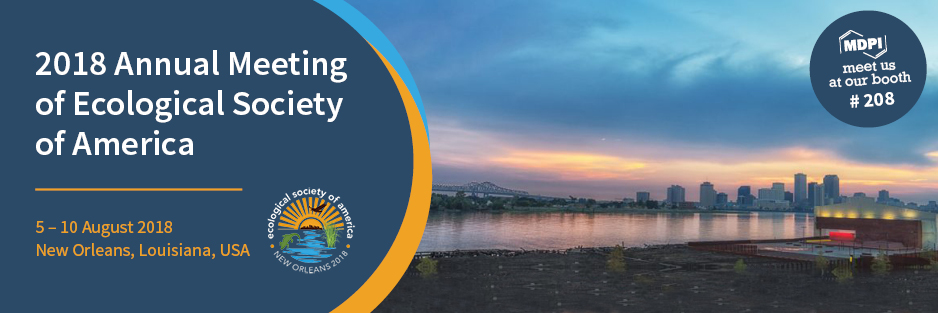
MDPI will be represented at the ESA Annual Meeting 2018 which will be held in New Orleans, Louisiana, 5–10 August 2018.
Extreme events, such as heat waves, droughts, floods, fires and storms, are exacerbated by human activities and challenge populations, communities and ecosystems, as well as our human health and living conditions. The ability of ecosystems to respond to these challenges depends on the integrity of resilience mechanisms that have been severely undermined by land-use practices that increase effects of extreme conditions. Past civilizations, such as the Maya and Mesopotamians, apparently exacerbated the droughts (that caused their demise) through deforestation and agricultural practices similar to our own. Clearly, the sustainability of ecosystem services and human well-being depends on ecosystem resilience to extreme events.
The following MDPI journals will be represented:
If you are also attending this conference, please feel free to stop by our booth (Booth #208). Our delegates look forward to meeting you in person to answer any questions you may have regarding open access publishing or our journals. For more information about the conference, please visit: https://esa.org/neworleans/
30 April 2018
Winners of the First MDPI Writing Prize
We are pleased to announce the results of the first MDPI Writing Prize. We received a large number of entries from across the globe on the theme of “The Global Benefits of Open Research”. It was a pleasure to read so many original, well-researched and well-presented ideas, and the final choice was not an easy one. We are pleased to announce that the winners are as follows:
1st prize (500 CHF, Swiss knife and certificate)
Edmond Sanganyado, Shantou University, China
2nd prizes (250 CHF, Swiss knife and certificate)
Kamala T. Rajahgopal, Asia e University, Malaysia
Yin Zhixuan, Qingdao University of Technology, China
3rd prizes (100 CHF, Swiss knife and certificate)
Alexandra Ticea, Carol Davila University of Medicine and Pharmacy, Romania
Ankur Sarker, University of Virginia, USA
Daniel Attoye, United Arab Emirates University, UAE
Congratulations to all of them! The winning entries can be downloaded by clicking on the names above. A compilation of all entries will soon be available as an open access book.
The writing prize is sponsored by the MDPI English editing service.
23 March 2018
Check for Updates: A New Function in the Article PDF Version

At MDPI, we always want to keep you up to date. Even for already published articles, some corrections or minor changes may occur. To prevent you from missing any updates, from now on you will be able to access the latest version of any manuscript by clicking on the “check for updates” logo that you can find in the PDF file, even if you have saved the file on your computer.
13 March 2018
MDPI Becoming a Member of UKSG
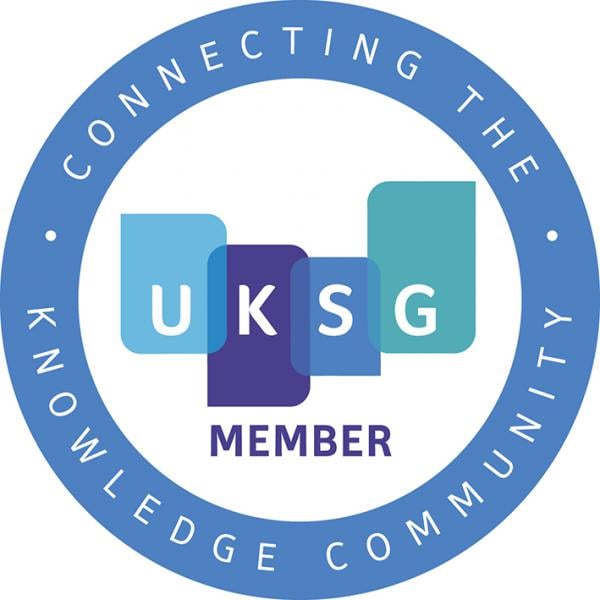
We are proud to announce that MDPI is now a member of UKSG, the UK´s largest scholarly communications community. Through UKSG, different stakeholders share their knowledge and experience in order to improve the knowledge and information environment for researchers. UKSG´s members include universities, publishers, content providers, intermediaries, and other similar organisations. Members participate in discussions and events on issues around scholarly communications.
The UKSG Annual Conference and Exhibition is a flagship initiative from the UKSG and one of the most stimulating events in the scholarly communications calendar. It is held annually and attracts a large number of delegates. More information is available at https://www.uksg.org/events/annualconference
MDPI is delighted to be a part of this active community and we look forward to making our own contribution. We will continue to support organisations and initiatives that boost collaboration and vision within scholarly communication.
More information about UKSG can be found at https://www.uksg.org/. The full membership list is available at: https://www.uksg.org/members.
1 February 2018
MDPI Signed the San Francisco Declaration on Research Assessment (DORA)

The DORA initiative addresses the need for advanced approaches in the evaluation and measurement of the quality of scientific research outputs. It is a worldwide initiative covering all scholarly disciplines. MDPI proudly joins a list of more than 400 organizations around the world which support DORA’s recommendations for improving the way the quality of research results is evaluated.
More info can be found at http://www.ascb.org/dora/
29 December 2017
Meet Us at the EGU General Assembly 2018 in Vienna, 8–13 April 2018
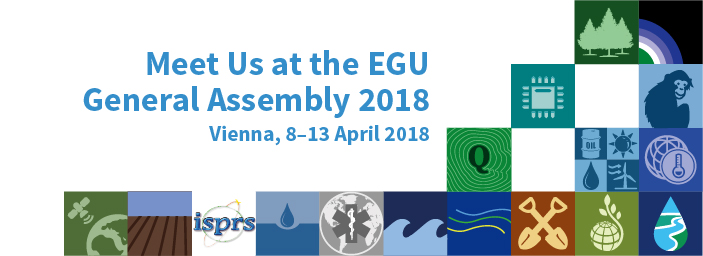
We will be attending the General Assembly 2018 of the European Geosciences Union (EGU) (https://egu2018.eu/home.html). The EGU General Assembly 2018 will bring together geoscientists from all over the world to one meeting covering all disciplines of the Earth, planetary and space sciences. It aims to provide a forum where scientists, especially early career researchers, can present their work and discuss their ideas with experts in all fields of geoscience. Representatives of the following open access journals will attend:
Remote Sensing
Geosciences
ISPRS International Journal of Geo-Information
Water
Animals
Atmosphere
Climate
Environments
Forests
Hydrology
International Journal of Environmental Research and Public Health (IJERPH)
Journal of Marine Science and Engineering
Land
Minerals
Resources
Quaternary
Sensors
If you are also attending this conference, please feel free to stop by our booth (Booth #36). Our delegates look forward to meeting you in person to answer any questions you may have. For more information about the conference, please visit: https://egu2018.eu/home.html.
28 December 2017
Meet Us at the AAG Annual Meeting 2018 in New Orleans
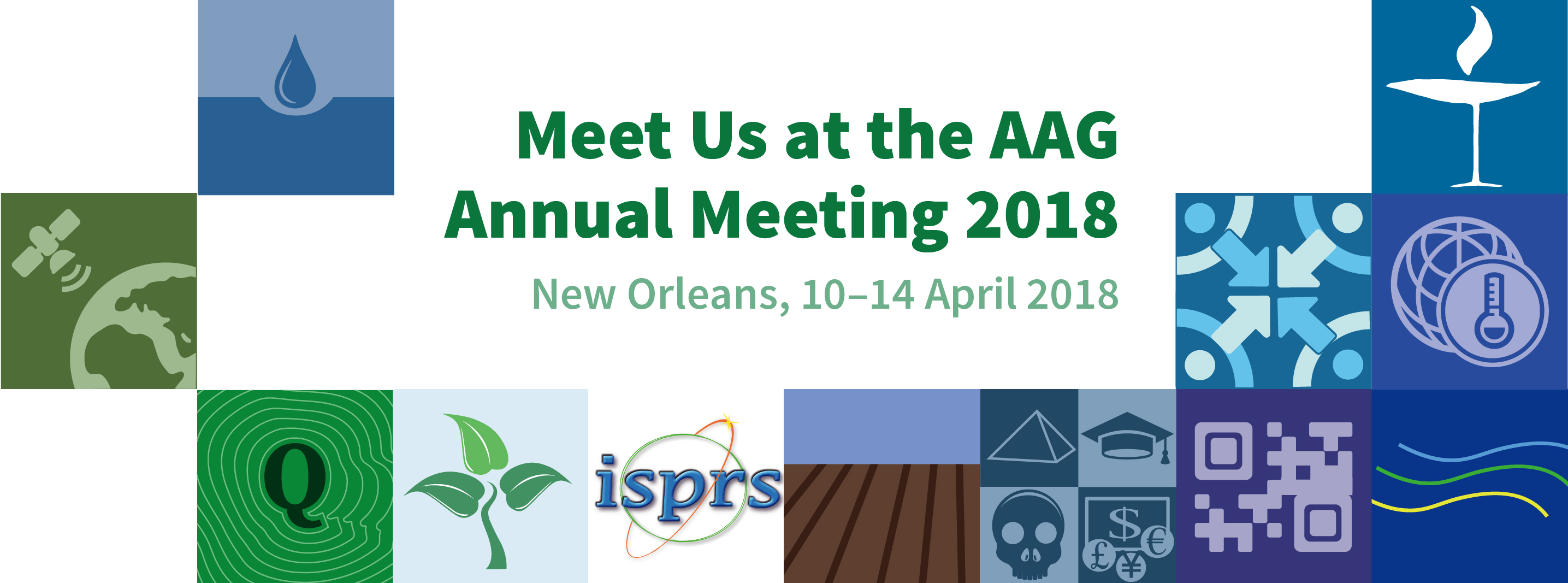
We will be attending the AAG Annual Meeting 2018, which will be held in New Orleans, Louisiana, USA, 10–14 April 2018. The American Association of Geographers' (AAG) Annual Meeting is an interdisciplinary forum open to anyone with an interest in geography and related disciplines. Representatives of the following open access journals will attend:
ISPRS International Journal of Geo-Information (IJGI)
Sustainability
Remote Sensing
Religions
Data
Land
Social Sciences
Climate
Geosciences
Quaternary
Societies
Water
If you are also attending this conference, please stop by our booth (Booth #202). Our delegates look forward to meeting you in person to answer any questions you may have concerning open access publishing and our journals. For more information, please visit www.aag.org/annualmeeting.
Conference address:
Sheraton/Marriott, New Orleans, Louisiana, USA
Conference date:
10–14 April 2018
19 December 2017
Announcing the MDPI English Writing Prize
The competition is still open until end of March! Please check out the banner for more details: https://mdpi-res.com/data/english-prize.pdf
15 December 2017
UCL Press Adopts the MDPI Editorial Platform JAMS
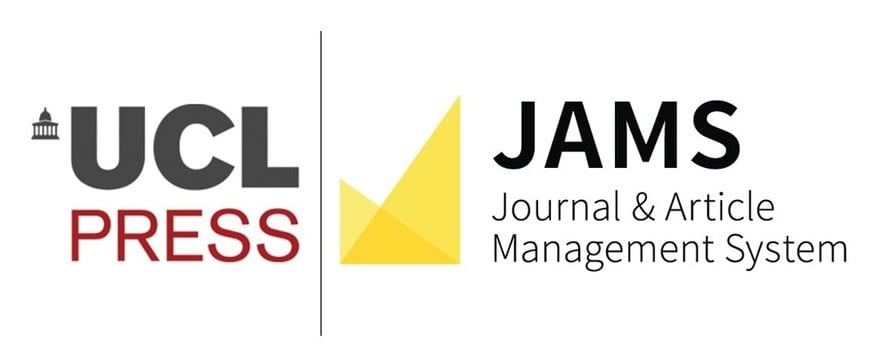
We are delighted to announce that UCL Press has adopted MDPI's Journal Article & Management System, JAMS, including production services. JAMS is a modular, integrated editorial platform for academic publishers. It offers flexibility, ease-of-use, and is a fully integrated solution for the end-to-end management of scholarly journals. JAMS is based on the software used to publish MDPI’s portfolio of journals.
Ian Caswell, UCL Press Journals Manager, says he is "excited to see UCL Press and MDPI partner together to implement the JAMS submission system for all UCL Press journals. The system offered a flexible, efficient and straightforward solution for our processes from author submission to ready for publication. I am grateful for the valuable experience and support MDPI have offered and look forward to developing our programme with an effective submission system in place.” Dr Martyn Rittman, MDPI’s Publishing Services Manager, adds, “We are proud to support one of the UK’s premier university presses in their publishing operation. This is an excellent way for us at MDPI to share our experience and knowledge, and benefit the research community beyond our own journals.”
JAMS combines services that are kept separate for many publishers. The entire editorial process, production and invoicing (e.g. for open access article processing charges) are fully integrated into a single platform. This allows for efficient, fast manuscript processing. For further information about JAMS, see https://www.mdpi.com/publishing_services.
23 November 2017
New Participants in the Institutional Open Access Program (IOAP)
We are pleased to welcome new participants to MDPI's Institutional Open Access Program (IOAP), designed to help institutions manage the transition to the Open Access publishing model. Researchers affiliated with participating universites benefit from a 10% discount on the Article Processing Charges (APC) for any paper published in an MDPI journal, while the participating library or university incurs no basic fee for participating in the program.
The IOAP set of free services, provided by MDPI to institutions that sign up, include:- No fee for participants and no obligation to prolong after the initial 12 months. The participants may withdraw from the programme at any time, and we will also keep it free for the library for as long as they continue in the programme.
- Authors affiliated with the university will receive a 10% discount on the APC.
- The institution is granted free access to the MDPI submission system and can receive free alerts of new submissions to our journals.
- By default, authors from the institution will continue to be invoiced directly unless the institution opts for central billing.
- Auto-archiving of papers into the institutions´ repository as long as it supports SWORD 1.3.
More details about the programme and a list of our current participant institutions can be found at: https://www.mdpi.com/about/ioap
Institutions which are interested to participate may do so online at: https://www.mdpi.com/ioap-form
The following North American universities have signed up to the IOAP program recently:
Connecticut College, USA
Emory University, USA
Florida International University, USA
Johns Hopkins University, USA
Mississippi State University, USA
Northeastern University, USA
Rice University, USA
University of Ontario Institute of Technology, Canada
University of Rhode Island, USA
University of Texas Southwestern Medical Center, USA
University of Toronto, Canada
University of Windsor, Canada
University of Wisconsin–Madison, USA
Wellesley College, USA
West Virginia University, USA
Many prestigious institutions from Europe and Asia have joined as well:
Asia Pacific University of Technology & Innovation, Malaysia
Czech Technical University in Prague, Czech Republic
Gdansk University of Technology, Poland
Martin-Luther-Universität Halle-Wittenberg, Germany
National Chung Hsing University, Taiwan
Newcastle University, UK
Northumbria University, UK
Southwest University, China
Technical University of Crete, Greece
University Malaya, Malaysia
University of Antwerp, Belgium
University of Cyprus, Cyprus
University of Manchester, UK
University of Reading, UK
University of Sussex, UK
University of Warwick, UK
West Pomeranian University of Technology Szczecin, Poland
We offer a warm welcome to the new participants!
10 November 2017
Available Journal Awards at MDPI
In order to reward the academic community, especially young researchers, and enhance communication among scientists, MDPI journals regularly offer various awards to researchers in specific fields, for example, Young Investigator Awards, Travel Awards, Best Paper Awards, and Best Poster Awards, etc. The awardees range from PhD students to junior scientists.
Currently, the following 44 awards given by MDPI journals are accepting applications. Please click on the award title below to check whether you are eligible for it and start the application process.
|
Subject |
Journal |
Award |
Intended Awardee |
|
Biology & Life Sciences |
Animals |
PhD students or postdoctoral researchers |
|
|
Antioxidants |
Postdoctoral researchers or PhD students |
||
|
Biology |
PhD or postdoctoral fellows |
||
|
Forests |
Postdocs or PhD students |
||
|
International Journal of Molecular Sciences (IJMS) |
Ground-breaking contribution in the fields of Molecular Biology, and Molecular Pathology |
||
|
Journal of Fungi (JoF) |
Travel Awards 2018 |
PhD graduate students, and postdoctoral fellows |
|
|
Life |
Travel Award 2018 |
PhD students or postdoctoral fellows |
|
|
Metabolites |
PhD students |
||
|
Pharmaceuticals |
PhD students |
||
|
Toxins |
Postdoctoral fellows |
||
|
Viruses |
Viruses 2018 participants |
||
|
Viruses |
Viruses 2018 participants |
||
|
Water |
2018 Young Investigator Award |
Young investigators |
|
|
Chemistry & Materials Science |
Biomimetics
|
Graduate Student or Postdoctoral Trainee / Research Associate |
|
|
Catalysts |
PhD students |
||
|
Chemosensors |
PhD or postdoctoral fellows |
||
|
Entropy |
Young investigators |
||
|
Fibers |
2018 Travel award |
Postdocs or PhD students |
|
|
Magnetochemistry |
Postdocs |
||
|
Materials |
PhD or postdoctoral fellows |
||
|
Metals |
PhD or postdoctoral fellows |
||
|
Minerals |
PhD or postdoctoral fellows |
||
|
Sensors |
Travel Award 2018 |
PhD or postdoctoral fellows |
|
|
Sensors |
Sensors' reviewers in 2017 |
||
|
Sensors |
Young investigators |
||
|
Technologies |
PhD students |
||
|
Computer Science & Mathematics |
Multimodal Technologies and Interaction (MTI) |
Postdoctoral researchers or PhD students |
|
|
ISPRS International Journal of Geo-Information(IJGI) |
Postdocs |
||
|
Journal of Sensor and Actuator Networks (JSAN) |
Postdoctoral fellows and PhD students |
||
|
Journal of Imaging |
Postdoctoral fellows and PhD students |
||
|
Engineering |
Actuators |
PhD or postdoctoral fellows |
|
|
Remote Sensing |
Authors |
||
|
Machines |
PhD or postdoctoral fellows |
||
|
Micromachines |
PhD or postdoctoral fellows |
||
|
Fluids |
Postdoctoral fellows and PhD students |
||
|
ChemEngineering |
Postdoctoral researchers and PhD students |
||
|
Environmental & Earth Sciences |
Diversity |
Travel Awards 2018 |
Postdoctoral fellows |
|
International Journal of Environmental Research and Public Health (IJERPH) |
Authors who submit from 1 Nov 2017 to 31 Oct 2018 |
||
|
Resources |
Postdocs or PhD students |
||
|
Geosciences |
Postdoctoral fellows and PhD students |
||
|
Physical Sciences & Astronomy |
Galaxies |
Ph.D. students, postdoctoral fellows, or lecturers in cosmology or galaxies physics |
|
|
Applied Science |
Postdocs |
||
|
Medicine & Pharmacology; Public Health & Healthcare |
Journal of Clinical Medicine (JCM) |
PhD or postdoctoral fellows |
|
|
Medicines |
Postdocs |
7 November 2017
MDPI has signed the Jussieu Call for Open Science and Bibliodiversity
The Jussieu Call aims to develop and implement alternative models to meet the aims of open science while promoting bibliodiversity. In particular it wishes to promote new business models for funding open access publication. It was drafted on the Jussieu campus in Paris by a group of French researchers and scientific publishing professionals.
MDPI supports scholarly communities and initiatives that innovate and further promote Open Access publishing. There is a need to explore different frameworks to fund open access in ways that ensure that excessive funds are not diverted from research towards publishing. Many fair funding models already exist, and they can be further developed and extended. These include institutional support, library contributions or subsidies, premium services, participatory funding, etc. For this reason, MDPI has signed up to the Jussieu call and welcomes its aims.
More information can be found at http://jussieucall.org/ (archived here)
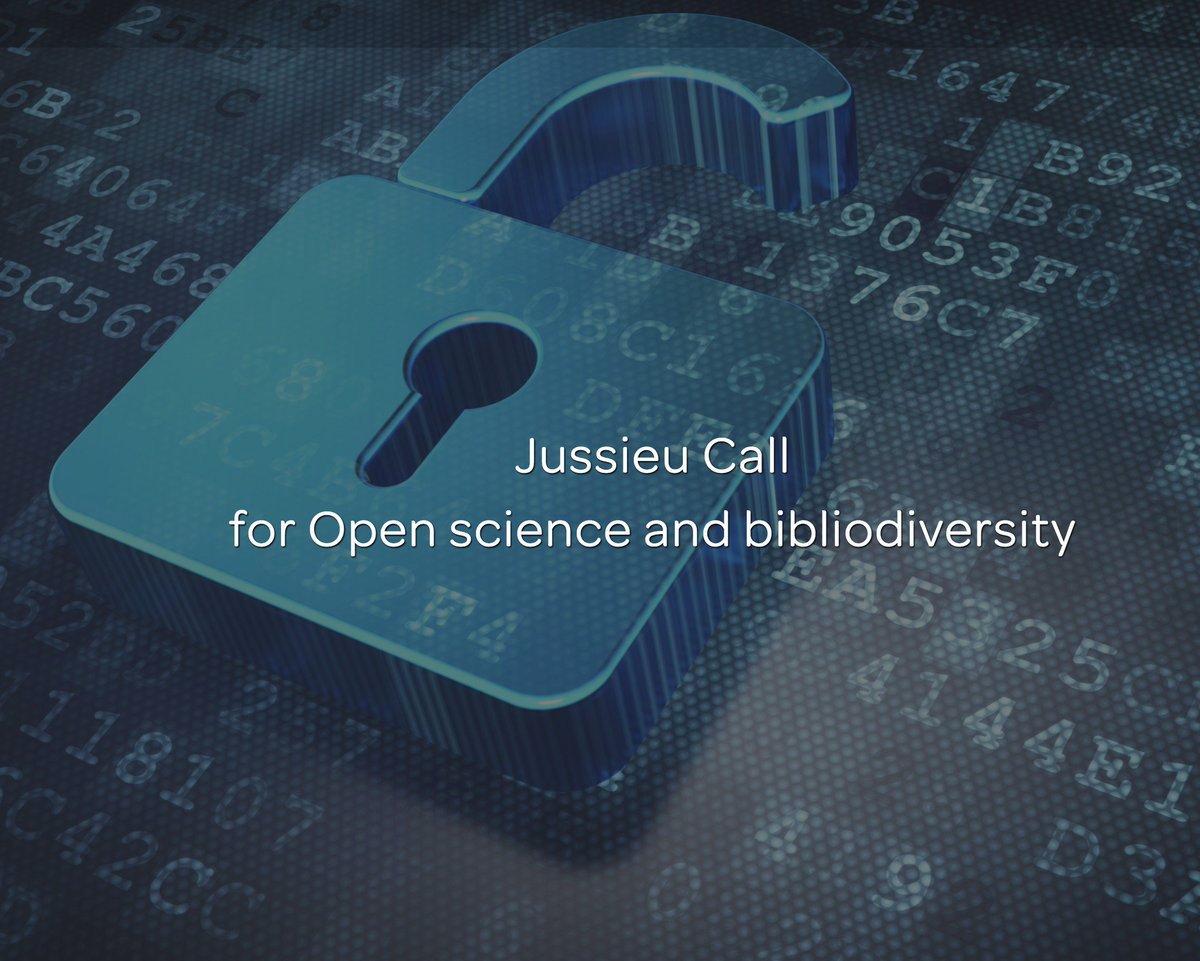
6 October 2017
Dr. Franck Vazquez, MDPI CEO, Interviewed by Scholarly Kitchen
The Society for Scholarly Publishing’s popular blog about topics in academic publishing, Scholarly Kitchen, recently interviewed MDPI’s CEO, Dr. Franck Vazquez. He shared some thoughts and information on the past and future of MDPI and open access publishing in general:
“In the long run, we aim to anchor MDPI in research communities. We recently developed and launched the preprint platform Preprints, revamped our free-to-use conference hosting platform Sciforum, and are working on other projects, such as Scilit, our bibliographic database.”
Read the full interview here.
29 September 2017
Meet Us at ASA CSSA SSSA Annual Meeting 2017 in Tampa
We will be attending the ASA CSSA SSSA Annual Meeting 2017, which will be held at Tampa Convention Center, October 22–25, 2017, representing the following open access journals:
Agronomy
Forests
Agriculture
Foods
Plants
Land
Horticulturae
Sustainability
Please come visit our stand to chat with our delegates about our journals and travel awards that you might be interested in. The Editorial Board Member of Agronomy, Professor Jerry L. Hatfield, section leader of Global Agronomy, will also be there to answer your questions about the journal and publishing. We look forward to meeting you in person to answer any questions you may have.
Conference address:
2017 ASA CSSA SSSA Annual Meeting
Tampa Convention Center, Tampa, FL, USA
Conference date:
October 22–25 2017
For more information on the conference, please visit:
https://www.acsmeetings.org/home
19 September 2017
A Warm Welcome to the New IOAP Participants
We are delighted to have welcomed 24 new participants to our Institutional Open Access Programme (IOAP) since the beginning of September this year. These are University libraries and Research Institutions located around the world; from the USA and Canada to the UK, and from Norway and Spain to Greece. Well respected Universities, such as the University of Denver, the University of Colorado Boulder, and the University of Arizona in the US, have signed up, while their researchers can now benefit from a 10% discount on the Article Processing Charges (APC) for any papers they publish in MDPI journals, at no cost for the library or the University.
We are more than happy to see the Open Access movement growing stronger and wider every day and we appreciate the vital role which librarians, repository managers, and other scholarly communications professionals play in the field. Our communication with and service to this community is, therefore, one of our principal priorities. The IOAP is our way to support academic and scientific Institutions as well as their scholars in managing, administrating, and publishing research in an Open Access world.
The IOAP set of free services, provided by MDPI to institutions that sign up, include:
- No fee for participants and no obligation to prolong after the initial 12 months. The participants may withdraw from the programme at any time, and we will also keep it free for the library for as long as they continue in the programme.
- Authors affiliated with the university will receive a discount on the article processing charge (APC).
- The institution is granted free access to the MDPI submission system and can receive free alerts of new submissions to our journals.
- By default, authors from the institution will continue to be invoiced directly unless the institution opts for central billing.
- Auto-archiving of papers into the institutions´ repository as long as it supports SWORD 1.3.
More details about the programme and a list of our current participant institutions can be found at: https://www.mdpi.com/about/ioap
Institutions which are interested to participate may do so online at: https://www.mdpi.com/ioap-form
The full list of the Institutions that signed up in September is as follows:
- University of Denver, USA
- University of Colorado Boulder, USA
- University of Arizona, USA
- Institute of Metrology of Bosnia and Herzegovina, Bosnia and Herzegovina
- Middlebury College, USA
- Touro College, USA
- University of New Orleans, USA
- University of Leicester, UK
- Indiana University-Purdue University Indianapolis, USA
- University of Strathclyde, UK
- Cranfield University, UK
- Hope College, USA
- Oregon State University, USA
- Drew University, USA
- Swansea University, UK
- University of South Florida, USA
- University of Georgia, USA
- Arizona State University, USA
- University of Southern Mississippi, USA
- Université du Québec à Chicoutimi, Canada
- Grinnell College, USA
- Norwegian University of Science and Technology, Norway
- University of Patras, Greece
- Public University of Navarre, Spain
23 June 2017
Congratulations for Publishing the 100,000th Peer-Reviewed Article
Congratulations to the authors Javier Monroy and Javier Gonzalez-Jimenez from Universidad de Malaga, Spain, Victor Hernandez-Bennets, Han Fan and Achim Lilienthal from Örebro University, Sweden for publishing the 100,000th peer-reviewed article.
The article is published in the Chemical Sensors section of Sensors.
GADEN: A 3D Gas Dispersion Simulator for Mobile Robot Olfaction in Realistic Environments
Evermore pressing environmental concerns have led global actors and decision-makers to search for stricter emission monitoring approaches. As part of novel monitoring systems, robots with gas and environmental sensors are a promising solution. However, validation of such robotic inspectors is expensive, time consuming, and plagued by repeatability issues. In this article, we present GADEN (the short form for Gas Dispersion Simulator for Mobile Robot Olfaction in Realistic Environments), which combines gas dispersion and robotics simulation in a common framework. Developed under the widely used Robot Operating System (ROS), GADEN enables validation of sensing strategies with gas dispersion being simulated using computational fluid dynamics and filament dispersion theory. GADEN allows simulating complex, realistic, 3D environments for reproducible testing of robotic gas sensing algorithms. Through qualitative and quantitative evaluations, we show that GADEN is a versatile and user-friendly evaluation tool and emphasize its enormous potential for the mobile robot olfaction community.
Read the full article here: https://www.mdpi.com/1424-8220/17/7/1479/htm
6 June 2017
CiteScore™ Metrics Released for Scopus Journals
The CiteScore, the new citation metric for journals covered in the Scopus® database, was released on 1 June 2017, reflecting the citation activity in 2016 for articles published during the three previous years. Please note that the list below does not contain all MDPI journals covered in Scopus. For the CiteScore to serve as a reliable metric at least three volumes of articles need to be indexed in Scopus; journals which have not met this criterion have been omitted here.
Ten MDPI journals received a CiteScore which is in the Top 10% of scores in at least one of the categories, while a further 21 journals exhibit scores that are in the first quartile of the respective categories.
CiteScore Data for MDPI Journals
| Journal | Rank | Category | Link | CiteScore 2016 | 2015 |
2014 |
| Algorithms | 44/112 (Q2) 49/111 (Q2) 19/42 (Q2) 52/113 (Q2) |
• Numerical Analysis • Computational Mathematics • Computational Theory and Mathematics • Theoretical Computer Science |
Link | 1.15 | 1.07 | 1.06 |
| Animals | 69/343 (Q1) 21/146 (Q1) |
• Animal Science and Zoology • General Veterinary |
Link | 1.46 | 1.66 | 0.74 |
| Biology | 13/92 (Q1) 34/81 (Q1) 10/75 (Q1) |
• General Agricultural and Biological Sciences • General Biochemistry, Gene- tics and Molecular Biology • General Immunology and Microbiology |
Link | 3.02 | 2.78 | 1.74 |
| Biomolecules | 234/382 (Q3) 260/353 (Q3) |
• Biochemistry • Molecular Biology |
Link | 1.67 | 3.08 | 1.00 |
| Biosensors | 36/118 (Q2) 209/2156 (Q1) |
• Clinical Biochemistry • General Medicine |
Link | 2.83 | 2.37 | 2.04 |
| Cancers | 29/196 (Q1) 27/321 (Q1) |
• Cancer Research • Oncology |
Link | 5.02 | 4.07 | 2.31 |
| Catalysts | 18/44 (Q2) 27/144 (Q1) |
• Catalysis • Physical and Theoretical Chemistry |
Link | 3.44 | 3.45 | 2.17 |
| Crystals | 70/270 (Q2) 25/64 (Q2) 118/398 (Q2) 131/424 (Q2) |
• General Chemical Engineering • Inorganic Chemistry • Condensed Matter Physics • General Materials Science |
Link | 1.89 | 1.47 | 1.03 |
| Diversity | 10/41 (Q1) 9/25 (Q2) 76/291 (Q2) 24/109 (Q1) |
• Agricultural and Biological Sciences (miscellaneous) • Ecological Modelling • Ecology • Nature and Landscape Conservation |
Link | 2.03 | 1.96 | 1.82 |
| Energies | - | - | Link | 2.50 | 2.87 | 2.66 |
| Entropy | 51/198 (Q2) | • General Physics and Astronomy | Link | 1.87 | 1.99 | 1.69 |
| Forests | 17/127 (Q1) | • Forestry | Link | 2.06 | 1.76 | 1.84 |
| Games | 204/398 (Q3) 83/181 (Q2) 48/105 (Q2) |
• Applied Mathematics • Statistics and Probability • Statistics, Probability and Uncertainty |
Link | 0.87 | 0.57 | 0.64 |
| Genes | 62/300 (Q1) 18/90 (Q1) |
• Genetics • Genetics (clinical) |
Link | 3.62 | 3.18 | 1.33 |
| Geosciences | 36/169 (Q1) |
• General Earth and Planetary Sciences | Link | 1.67 | 1.29 | 1.13 |
| Information | 156/237 (Q3) | • Information Systems | Link | 0.78 | 0.94 | 0.74 |
| Insects | 28/131 (Q1) | • Insect Science | Link | 1.81 | 1.38 | 1.23 |
| International Journal of Environmental Research and Public Health (IJERPH) | 67/446 (Q1) 31/102 (Q2) |
• Public Health, Environmental and Occupational Health • Health, Toxicology and Mutagenesis |
Link | 2.38 | 2.42 | 2.47 |
| International Journal of Molecular Sciences (IJMS) | 23/157 (Q1) 8/64 (Q1) 90/353 (Q1) 22/144 (Q1) 16/44 (Q1) 8/62 (Q1) |
• Organic Chemistry • Inorganic Chemistry • Molecular Biology • Physical and Theoretical Chemistry • Catalysis • Spectroscopy |
Link | 3.73 | 3.37 | 3.06 |
| ISPRS International Journal of Geo-Information | 12/29 (Q2) 28/79 (Q2) 96/587 (Q1) |
• Computers in Earth Sciences • Earth and Planetary Sciences (miscellaneous) • Geography, Planning and Development |
Link | 1.62 | 1.52 | - |
| Journal of Low Power Electronic Applications (JLPEA) | 301/645 (Q2) | • Electrical and Electronic Engineering | Link | 0.98 | 0.83 | 0.83 |
| Life | 65/525 (Q1) 36/186 (Q1) 5/92 (Q1) 20/80 (Q2) |
• Ecology, Evolution, Behavior and Systematics • General Biochemistry, Gene- tics and Molecular Biology • Palaeontology • Space and Planetary Science |
Link | 2.95 | 1.68 | 1.20 |
| Marine Drugs | 18/145 (Q1) | • Drug Discovery | Link | 3.83 | 3.66 | 3.59 |
| Materials | 63/424 (Q1) | • General Materials Science | Link | 3.26 | 3.11 | 2.69 |
| Membranes | 103/424 (Q1) | • Materials Science | Link | 2.19 | 2.95 | 2.42 |
| Micromachines | 173/645 (Q2) 69/211 (Q2) 113/526 (Q1) |
• Electrical and Electronic Engineering • Control and Systems Engineering • Mechanical Engineering |
Link | 1.83 | 1.78 | 2.10 |
| Minerals | 45/206 (Q1) 29/167 (Q1) |
• Geology • Geotechnical Engineering and Engineering Geology |
Link | 2.13 | 1.77 | - |
| Molecules | 32/157 (Q1) | • Organic Chemistry | Link | 3.09 | 2.65 | 2.62 |
| Nutrients | 12/247 (Q1) | • Food Science | Link | 4.29 | 4.07 | 3.78 |
| Pharmaceuticals | 8/168 (Q1) 21/158 (Q1) |
• Pharmaceutical Science • Molecular Medicine |
Link | 4.90 | 3.64 | 1.92 |
| Pharmaceutics | 19/168 (Q1) | • Pharmaceutical Science | Link | 3.83 | 2.68 | 2.46 |
| Polymers | 13/138 (Q1) 44/354 (Q1) |
• Polymers and Plastics • General Chemistry |
Link | 3.74 | 3.37 | 4.10 |
| Remote Sensing | 13/169 (Q1) | • General Earth and Planetary Sciences | Link | 3.56 | 3.76 | 3.23 |
| Sensors | 25/96 (Q2) 25/159 (Q1) 124/382 (Q2) 103/645 (Q1) |
• Analytical Chemistry • Atomic and Molecular Physics, and Optics • Biochemistry • Electrical and Electronic Engineering |
Link | 2.78 | 2.21 | 2.40 |
| Sustainability | 49/129 (Q2) 68/587 (Q1) 56/236 (Q1) |
• Renewable Energy, Sustai-nability and the Environment • Geography, Planning and Development • Management, Monitoring, Policy and Law |
Link | 1.96 | 1.78 | 1.52 |
| Symmetry | 17/42 (Q2) 49/111 (Q2) |
• Numerical Analysis • Computational Mathematics |
Link | 1.12 | 0.95 | 1.02 |
| Toxins | 16/102 (Q1) 16/108 (Q1) |
• Health, Toxicology and Mutagenesis • Toxicology |
Link | 3.34 | 3.76 | 2.85 |
| Vaccines | 146/184 (Q4) 151/250 (Q3) 93/145 (Q3) 186/299 (Q3) 130/232 (Q3) |
• Immunology • Infectious Diseases • Drug Discovery • Pharmacology • Pharmacology (medical) |
Link | 1.23 | 3.76 | 2.85 |
| Viruses | 15/68 (Q1) 34/250 (Q1) |
• Virology • Infectious Diseases |
Link | 3.60 | 3.74 | 3.80 |
| Water | 33/184 (Q1) 48/195 (Q1) 62/587 (Q1) 198/382 (Q3) |
• Water Science and Technology • Aquatic Science • Geography, Planning and Development • Biochemistry |
Link | 2.05 | 1.96 | 1.45 |
17 May 2017
Three New Institutional Memberships Established
We are pleased to announce that the Goethe University of Frankfurt, the Technical University of Hamburg (TU Hamburg-Harburg), as well as the Humboldt University of Berlin, in Germany, have joined MDPI's institutional membership program: Primary authors from these instititions will benefit from a 10% discount on the article processing charges.
Additional details can be found on our institutional membership page.
4 May 2017
MDPI Supports the Initiative for Open Citations (I4OC)
As an open access publisher, we are keen to support openness and transparency in the research process. Citation data is very important for assessing the value of individual papers and the contribution of researchers. As such, we support the recently launched Initiative for Open Citations (I4OC). The initiative recognizes that citations should be freely available and machine-readable. By doing so, authors gain the maximum benefit from having their work cited.
MDPI now uploads citation data with metadata uploaded to Crossref when registering digital object identifiers (DOIs) for published papers. We are delighted to take this step to support a truly open research environment.
2 May 2017
Publons Peer Review Academy Goes Live
Getting high quality review reports is critical for any journal’s editorial process. At MDPI we have put in place several measures to motivate reviewers and reward them for their work. We are proud of the quality of reviewer reports we receive and grateful for the hours put in by active researchers from across the globe.
Reviewers of MDPI’s largest journals can get recognition via Publons, a website dedicated to rewarding peer reviewers. They have now taken this one step further and launched the Publons Reviewer Academy to help train reviewers to provide useful feedback. Through the academy, researchers can be trained and tutored in various aspects of how to provide structured feedback that will be of genuine help to editors and authors. We support this initiative and recommend it to potential MDPI reviewers, especially early career researchers. See the Publons announcement for further information.
More information on reviewing for MDPI, including how to volunteer as a reviewer, can be found here.
24 April 2017
Two New Institutional Memberships Established
We are pleased to announce that the following universities have joined MDPI's institutional membership program: Trinity University, San Antonio, Texas, USA and the University of New South Wales (UNSW), Sydney, Australia. Primary authors from these instititions will benefit from a 10% discount on the article processing charges.
Additional details can be found on our institutional membership page.
30 March 2017
Credit for Preprints Comments via Publons
Preprints.org is a platform run by MDPI that allows authors to make early versions of manuscripts available before peer review has been completed.
One of the major benefits of putting a preprint online is to get feedback before journal submission. Until now, however, the feedback has been on a voluntary basis. Preprints is delighted to be the first preprint server to collaborate with Publons to acknowledge substantial comments as reviews and give commentators the opportunity to receive credit for their efforts.
When you add a comment to any article, there is a check box to click for it to appear on Publons. If you have already linked your account it will be passed on automatically. If you don't already have a Publons account, you will be contacted soon afterwards with instructions on how to create one.
We appreciate the enthusiasm and cooperation of Publons in this project and expect it to be of great benefit to authors and commenters alike.
20 March 2017
MDPI 2016 Annual Report Released
We are pleased to announce that our annual report for the year 2016 has now been published.
It contains information regarding company and journal performance, conferences and other publishing services that we provided throughout 2016.
To read the report in full or download a copy, please click here.
15 March 2017
Our 100,000th Article Could be Yours!
After the 20th anniversary of MDPI in 2016, we will reach another milestone this year and will publish the 100,000th peer-reviewed article in one of our 170+ open access journals.
We would like you to be part of this great achievement and so are offering to publish the 100,000th accepted paper free of charge.
To be in with a chance, select a journal in one of our 10 scientific subject areas and submit your paper.
Access the live tracker on published articles here.
![]()
3 March 2017
1000 Preprints Online
We are delighted that Preprints now has 1000 papers online since its launch on 3 May 2016.
For more information, see the editorial here.
9 February 2017
MDPI is Attending the 2017 AAG Annual Meeting
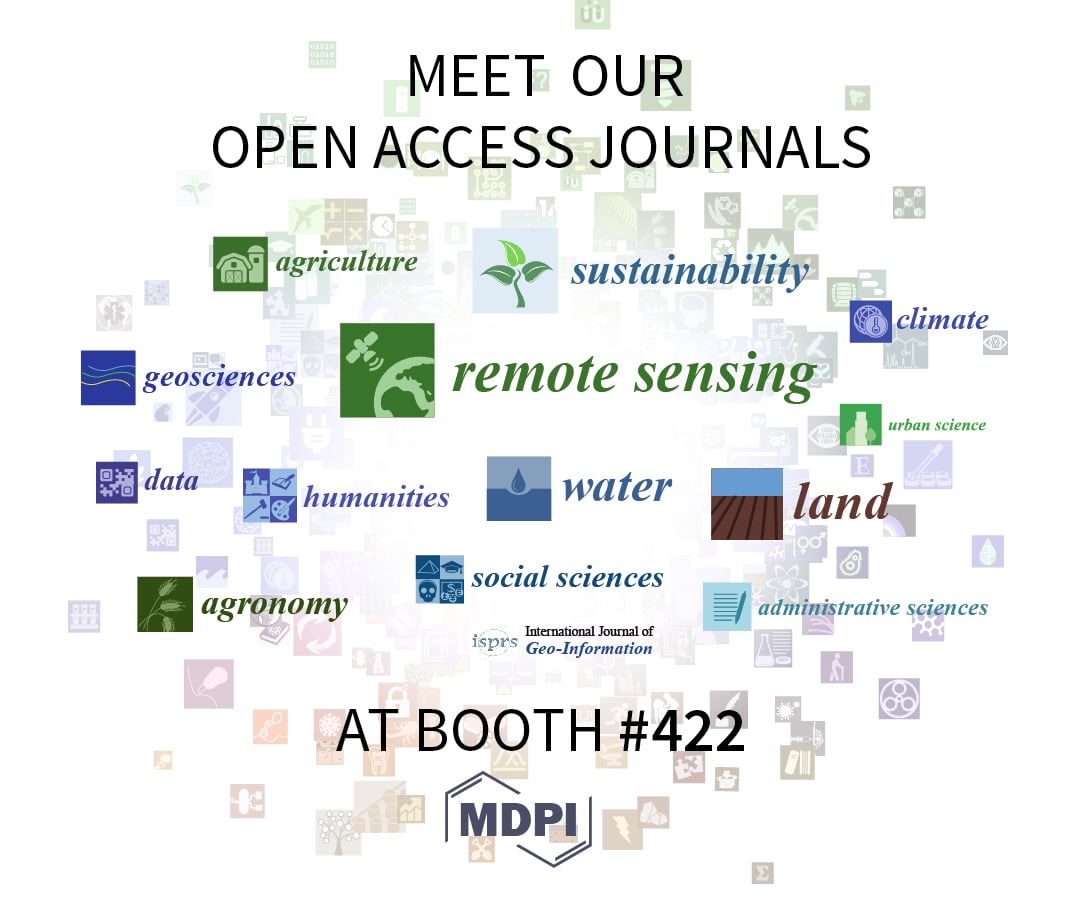 We are pleased to announce that MDPI will be attending the 2017 AAG Annual Meeting (5-9 April 2017) and representing the following open access journals:
We are pleased to announce that MDPI will be attending the 2017 AAG Annual Meeting (5-9 April 2017) and representing the following open access journals:
Remote Sensing
Sustainability
Land
Water
Humanities
Agriculture
Geosciences
Agronomy
Social Sciences
Administrative Sciences
Data
Climate
ISPRS International Journal of Geo-Information
Urban Science
If you are also attending this conference, please feel free to stop by our booth (Booth #422) and meet the representative editors.
Conference details:
2017 AAG Annual Meeting
5-9 April 2017
Hynes Convention Center
Boston, MA, USA
http://www.aag.org/annualmeeting
9 February 2017
Minister and State Secretaries Visit MDPI Office at STP, Belgrade, Serbia
Earlier this week the Science Technology Park in Belgrade, Serbia was visited by Swiss Secretary of State Dr. Mauro Dell’Ambrogio, as well as Serbian Minister of Public Administration and Local Self-Government Ana Brnabic, State Secretary Dr. Vladimir Popovic and Mayor of Belgrade Mr. Siniša Mali.
During the visit to the STP they had a short presentation from MDPI’s CEO Dr. Franck Vazquez and IT Manager Mr. Miloš Čučulović, and further discussed important issues such as Open Access and Open education. Dr. Dell'Ambrogio said he was impressed with the potential for development and ideas for business.
For more information please see:
http://bit.ly/2kpIu7k and http://bit.ly/2kpUQfz
7 February 2017
The 6th World Sustainability Forum: Final Press Release
Basel, 29 January 2017
The 6th World Sustainability Forum #WSF2017SA: African universities critical to achieving the Sustainable Development Goals
Jeffrey and Sonia Sachs win first World Sustainability Award.
Universities need to take the lead in solving the greatest challenges the world faces today, particularly in Africa. They need to do this not only through education – teaching the next generation to think critically and creatively to find sustainable solutions – but also through research that cuts across a range of disciplines. To ensure these solutions are implemented, they need to partner with the private sector and with government.
This was the key message from the 6th World Sustainability Forum (WSF2017), which took place in Cape Town on 27 and 28 January 2017. Sponsored by MDPI and the journal Sustainability under the patronage of the Universities of the Western Cape (UWC), Cape Town (UCT), University of Basel and the National Research Foundation (NRF) of South Africa, the conference was attended by key national and international speakers, including world-leading economist Professor Jeffrey D. Sachs, senior United Nations (UN) advisor and director of the Earth Institute at Columbia University.
The WSF is an annual sustainability conference which addresses research in a range of areas related to sustainable development and sustainability globally. This was the first WSF to take place on the African continent. Discussions at the 2017 conference were driven by the 17 sustainable development goals (SDGs) adopted as part of the 2030 Agenda for Sustainable Development by the UN in September 2015.
Achieving the SDGs “is the moonshot for our generation,” said Sachs. “Like the moonshot [moon landing] of the 1960s, these are tough, bold and achievable objectives.”
“This is a nasty, tough world we live in, and our world agrees on very little. So when 193 governments agree on something, that is important. And when they agree on something as important as sustainable development, that is really something for us to grab hold of – that is a lifeline.”
There was agreement at the WSF that the SDGs are particularly important for Africa, and that African universities in particular have a role to play in achieving them.
Said Professor Tyrone Pretorius, vice-chancellor of UWC: “The quest for sustainable development can only be met through education. Universities today are the oil that fuels the knowledge economy.”
As part of the drive to develop academic capacity to provide the knowledge needed to meet the SDGs, WSF2017 was preceded by the 1st Postgraduate Forum on Sustainability. “A series of workshops for postgraduate education linked to WSF are important, in order to equip postgraduates with the skills necessary to promote sustainability,” said Professor Thandi Mgwebi, director for research at UWC. A second postgraduate forum will take place alongside the WSF2018 in Beijing.
This capacity development is particularly critical to Africa. Said Sachs: “African universities need to do research to find solutions to Africa’s development challenges, because no other university will.”
The UN set a target of achieving the SDGs by 2030: “I regard this as the breakthrough period to end extreme poverty on the continent,” said Sachs, “and for Africa to become one of the most dynamic centres of the world economy.”
It is a critical time for South African universities, said Professor Mamokgethi Phakeng, deputy vice-chancellor for research and internationalisation at UCT: “Higher education is at a crossroads, and there is much polarisation. We need to think carefully about how this sustainable development agenda is owned by all so that it is inclusionary.”
There was also strong emphasis on public–private partnerships – for universities, business and government to work together to achieve the goals.
Said Professor Francis Petersen, deputy vice-chancellor at UCT and vice-chancellor designate at the University of the Free State: “Business sustainability has become critical, because there is increasing demand and complexity of demand on business from the natural, social and economic environment. Sustainability cannot be a standalone issue, divorced from business as usual. Sustainability needs to be embedded into business.”
Environmental crises and climate change was also high on the WSF agenda. In his keynote address, Sachs noted the irreversibility of the climate- and environmental-related challenges.
“If we don’t get our act together, we lose the chance of safety,” he said.
Said Professor Mark New, pro vice-chancellor and director of the African Climate and Development Initiative at UCT: “We have a fundamental challenge in responding to climate change, and we must go further than just putting a plaster on a wound. We need to address the deep structural issues, to move from our current model of development into climate-compatible development.”
“This requires researchers to find the evidence for the correct development pathways to take, and then support the ability of policymakers at all levels to enable the shift to climate-compatible development planning.”
Said Dr. Aldo Stroebel, executive director of international relations and cooperation at the NRF, in closing: “We have seen over the past two days an urgency towards the next step of thinking, that critical type of framework that we all must engage with, not only from an academic perspective, but further up into the policy environment and into rural-based environments where one can clearly see the links and effectiveness of the work.”
World Sustainability Awards
The first World Sustainability Award and the first Emerging Sustainability Leader Awards were presented by Prof. Thandi Mgwebi, Director of Research at UWC, and Dr. Franck Vazquez, CEO of MDPI, during the ceremony on 27 January 2017 as part of the gala dinner of the 6th World Sustainability Forum in South Africa.after day one of proceedings of the 2017 World Sustainability Forum South Africa.
Professor Jeffrey D. Sachs and Dr. Sonia Ehrlich Sachs are the joint recipients of the first World Sustainability Award. Jeffrey Sachs is a world-renowned economist and senior United Nations (UN) advisor and director of the Earth Institute at Columbia University. Sonia Sachs is a paediatrician and public health specialist, and director of the Health Centre at the Centre for Sustainable Development, also at Columbia University.
The joint recipients of the first Emerging Sustainability Leader Award are Dr. Esther Ngumbi and Dr. Xiaosong Hu. Esther Ngumbi is a postdoctoral researcher at Auburn University in Alabama USA and serves as a 2015 Clinton Global University Mentor for agriculture. Xiaosong Hu is a professor at the Chongqing University in China and specialises in automotive control systems and mechanical engineering.
The World Sustainability Award and the Emerging Sustainability Leader Awards are funded to encourage new initiatives and developments in sustainability with the ultimate aim of fostering the transition to sustainable practices and societies.
The World Sustainability Award is funded by the MDPI Sustainability Foundation, and included a monetary prize of USD 100,000 to Jeffrey and Sonia Sachs. The Emerging Sustainability Leader Award is funded by the journal Sustainability, awarded to researchers under 40, and included a monetary prize of USD10,000.
Issued jointly by: UCT Global Strategy and Visibility, Research Office, UWC Communications & Media and MDPI AG
Conference photos are free available at: https://sciforum.net/conference/wsf-6/page/175 Photo credit: Matthias Burkhalter
|
Carla Bernardo |
Luthando Tyhalibongo |
Matthias Burkhalter |
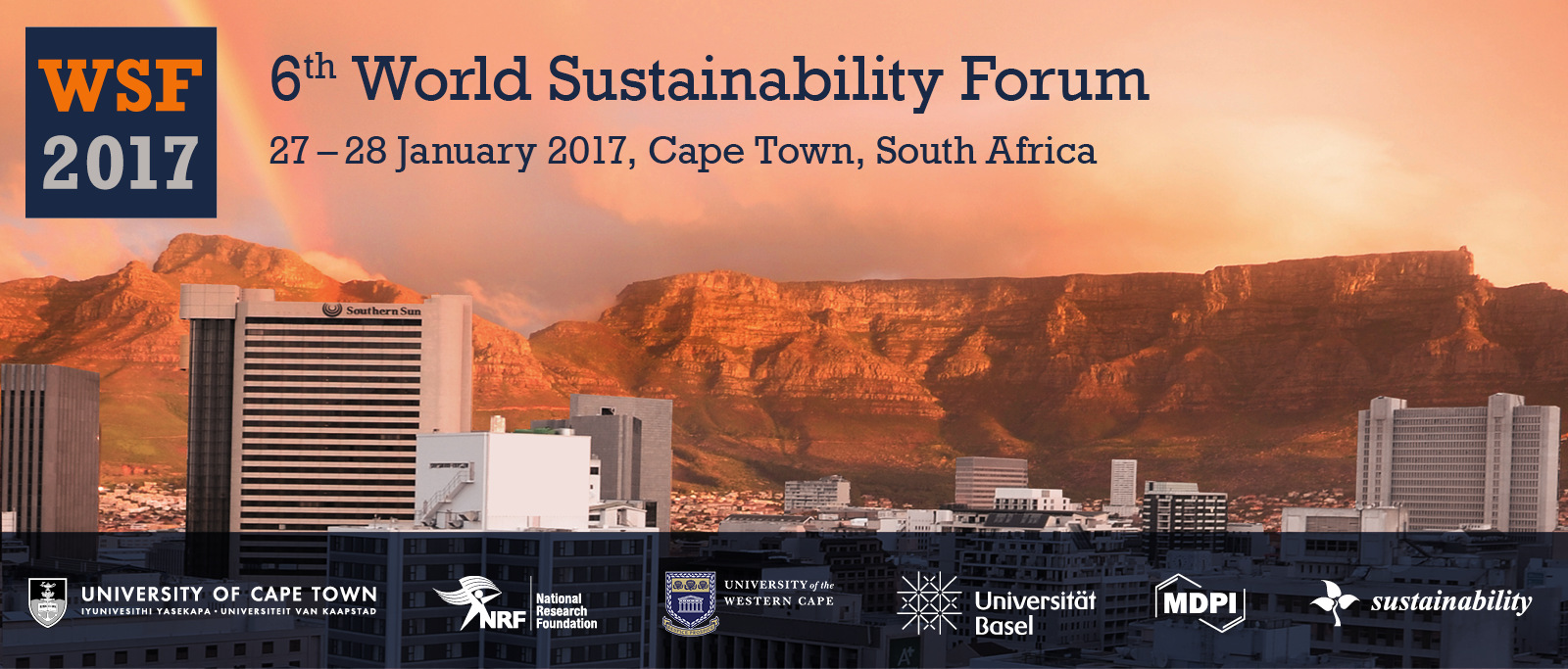
31 January 2017
Three New Institutional Memberships Established
We are pleased to announce that the Chalmers University of Technology, Sweden, the University of Manitoba, Canada and the Technical University of Cartagena, Spain, have joined MDPI's institutional membership program: Primary authors from these institutions will benefit from a 10% discount on the article processing charges.
Additional details can be found on our institutional membership page.
27 January 2017
6th World Sustainability Forum under way in South Africa
The 6th World Sustainability Forum is currently being held at the Cape Sun Hotel until 28 January 2017.
The Forum will showcase the work of internationally renowned researchers and include more than 150 presentations. During the conference dinner, the World Sustainability Award, associated with a US$ 100,000 prize, will be announced, as well as the Emerging Sustainability Leader Award, associated with a US$ 10,000 prize. The prizes are sponsored by the MDPI Sustainability Foundation and Sustainability, an academic open access journal by MDPI.
Here are some pictures from the forum so far:
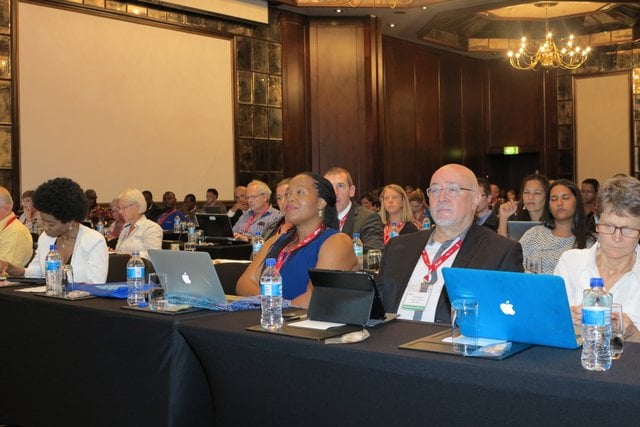
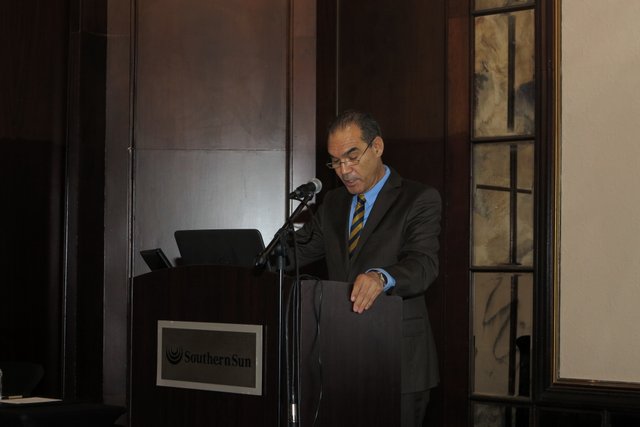
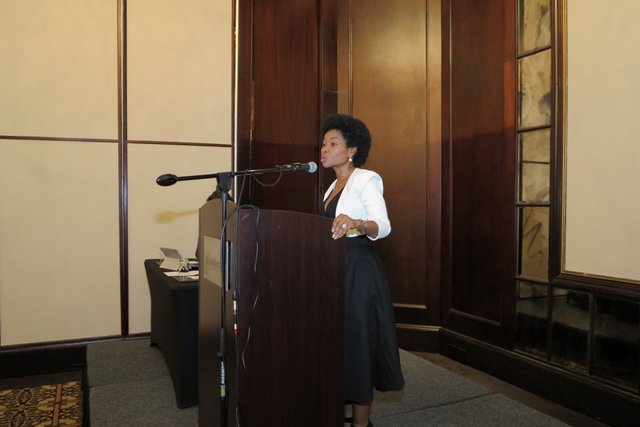
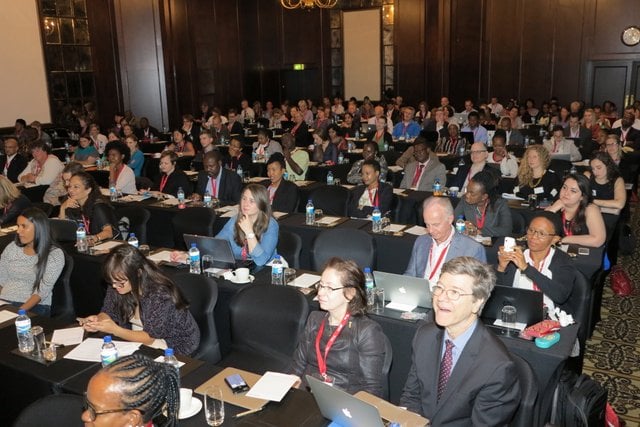
To see the full WSF2017 program and schedule, please see here: https://sciforum.net/conference/wsf-6/page/schedule
19 January 2017
Cape Town to Host the 6th World Sustainability Forum
Cape Town will host the 6th World Sustainability Forum at the Cape Sun Hotel on 27 and 28 January 2017. This prominent event, held for the first time in Africa, will include many illustrious South African and international experts, such as Her Excellency Graça Machel (Sustainable Development Advocate for the United Nations, Mozambique), Joyene Isaacs (HoD Agriculture Western Cape Government), Jeffrey Sachs (Columbia University, USA), Max Bergman (SRaM, University of Basel), Mark New (Pro Vice-Chancellor, University of Cape Town), Frans Swanepoel (FutureAfrica, University of Pretoria) and Francis Petersen (Vice-Chancellor-designate, University of the Free State). The Forum will provide a stage for national and international debates on sustainability in South Africa, the African continent, and about international perspectives on sustainability. It brings together researchers and representatives from government and the business sector to discuss a wide-ranging set of issues associated with sustainability, including food security, water and energy scarcity, mining, poverty reduction, climate change, and urbanisation.
The next few decades will be marked by profound changes in the relationships between global economics, national societies, and the environment. We have entered what some call the Anthropocene, an age in which human activity dominates the climate and the environment. These changes will have numerous consequences on societies around the globe. South Africa and Africa will play a central role, for better or worse, in creating opportunities and risks during these changing times as Africa is profoundly influencing and being influenced by global developments.
The adoption of the 17 United Nations Sustainable Development Goals and the 2030 Agenda for Sustainable Development in September 2015 was accompanied by what insiders considered an optimism they have not experienced in relation to UN resolutions before. The relative efficiency in the drafting, the lack of trenches between East and West, or between North and South, and the unanimity of support of the 193 countries speak volumes. In stark contrast, sustainability seems to go against a changing economic and political tide, where waves of nationalism and protectionism from some of the most powerful countries risk the wellbeing of the rest of the world. The 6th World Sustainability Forum will enable fruitful exchanges, which sensitise South African and international communities to the global urgency and specifics of sustainability.
The Forum will showcase the work of internationally renowned researchers and include more than 150 presentations. During the conference dinner, the World Sustainability Award, associated with a US$ 100 000 prize, will be announced, as well as the Emerging Sustainability Leader Award, associated with a US$ 10 000 prize. The prizes are sponsored by the MDPI Sustainability Foundation and Sustainability, an academic open access journal by MDPI. The World Sustainability Forum is preceded by the Postgraduate Forum on Sustainability, which will introduce more than 100 young scholars from South Africa and the African continent to sustainability research. Both events are organized and sponsored by the University of Cape Town, the University of the Western Cape, the University of Basel, MDPI, and by the National Research Foundation of South Africa.
Contacts:
Scientific Matters: Prof Manfred Max Bergman, Social Research and Methodology Group (SRaM), University of Basel, Switzerland; Email: max.bergman@unibas.ch
Press Accreditation and General Enquiries: Mr Matthias Burkhalter, MDPI AG, Basel, Switzerland; Email: burkhalter@mdpi.com; Tel. +41 61 683 77 34
Follow us on Twitter
#WSF2017SA
6 January 2017
MDPI Supports the OA2020 Initiative
MDPI is now a proud supporter of the OA2020 Initiative.
Open Access 2020 is an international initiative that aims to induce the swift, smooth and scholarly-oriented transformation of today’s scholarly journals from subscription to open access publishing.
MDPI is participating in the upcoming Berlin13 conference in March 2017, where we are contributing to the initiative by aiding in the design of the roadmap which will make OA the default publishing model.
For more information please see here.
5 January 2017
Three New Institutional Memberships Established
We are pleased to announce that the University of Texas at Arlington, USA, the Harbin Institute of Technology, China and TU Darmstadt, Germany, have joined MDPI's institutional membership program: Primary authors from these institutions will benefit from a 10% discount on the article processing charges.
Additional details can be found on our institutional membership page.
22 December 2016
Two New Institutional Memberships Established
We are pleased to announce that the Otto-von-Guericke-Universität Magdeburg, Germany and the University of California, Berkeley, USA, have joined MDPI's institutional membership program: Primary authors from these instititions will benefit from a 10% discount on the article processing charges.
Additional details can be found on our institutional membership page.
19 December 2016
MDPI and Wellcome Trust Compliance
The Wellcome Trust has, for a number of years, required that the results of its funded projects are published in open access format. Recently it announced criteria that publishers must fulfil for publication fees to be paid by the Trust. MDPI is pleased to have been added to the list of compliant publishers.
Only publishers who have confirmed their compliance by 16 December 2016 will be eligible to receive payment of APCs by the Wellcome Trust as of 1 April 2017. For more information on the criteria and a full list of publishers that meet them, see here.
13 December 2016
Meet MDPI at the 2016 AGU Fall Meeting
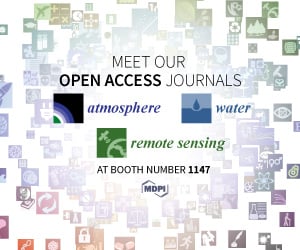 MDPI is currently attending the 2016 AGU Fall Meeting (12–16 December, 2016)
MDPI is currently attending the 2016 AGU Fall Meeting (12–16 December, 2016)
If you are also attending the conference, please feel free to stop by our booth (Booth #1147) and meet the representative editors.
Conference details:
2016 AGU Fall Meeting
12–16 December 2016
Moscone Center
747 Howard St
San Francisco, CA 94103, USA
8 December 2016
Three New Institutional Memberships Established
We are pleased to announce that Purdue University, USA, the Universitat Politécnica de Valencia, Spain and the Queensland University of Technology, Australia, have joined MDPI's institutional membership program: Primary authors from these instititions will benefit from a 10% discount on the article processing charges.
Additional details can be found on our institutional membership page.
16 November 2016
World Sustainability Award - Final Extension
The deadline for the World Sustainability Award has been extended for one last time! You now have one more month to nominate an individual researcher, group or project! The final deadline for nominations will be December 15, 2016.
For full details, please visit here.
11 November 2016
Three New Institutional Memberships Established
We are pleased to announce that the University of Minnesota, USA, the Universidad Politécnica de Madrid, Spain and Shanghai Jiao Tong University, China, have joined MDPI's institutional membership program: Primary authors from these instititions will benefit from a 10% discount on the article processing charges.
Additional details can be found on our institutional membership page.
10 November 2016
MDPI is Participating in the 2016 AGU Fall Meeting
We are pleased to announce that MDPI will be attending the 2016 AGU Fall Meeting (12–16 December, 2016) and representing the following open access journals:
Atmosphere
Water
Remote Sensing
Minerals
Sustainability
Climate
Land
Geosciences
Hydrology
Infrastructures
Resources
Entropy
Environments
Aerospace
If you are also attending this conference, please feel free to stop by our booth (Booth #1147) and meet the representative editors.
Conference details:
2016 AGU Fall Meeting
12–16 December 2016
Moscone Center
747 Howard St
San Francisco, CA 94103, USA
4 November 2016
MDPI Joins the United Nations Global Compact
MDPI has become a member of the United Nations Global Compact to support corporate sustainability and have committed ourselves to the ten principles associated with the Compact.
Sustainability has always been at the core of MDPI’s values, starting with the collection and preservation of rare chemical samples that started in 1996 and led to the first journal, Molecules. Sustainability has become one of our flagship journals and we have supported and organized several conferences and events based on Sustainability, including the upcoming 6th World Sustainability Forum. As a global enterprise, we see it as our duty to promote responsible practices that will ensure a bright future for our planet. Given this, the choice to join the Global Compact was an easy one and we will do our utmost to fully implement it.
3 November 2016
MDPI Now a Member of SPARC Europe
We are delighted to announce that MDPI has become a member of SPARC Europe, an organization that works for open scholarship in Europe, including support of open access publication.
As one of the few publishers to join SPARC Europe to date, MDPI looks forward to making a contribution that puts open scholarship on a positive and sustainable path. We fully support the goals of open scholarship that allow the largest number of people possible to benefit from work of researchers in all disciplines. We hope that our membership will enable us to work with other stakeholders to find the best possible solution.
2 November 2016
World Sustainability Award Deadline Extension
The deadline for the World Sustainability Award has been extended! You now have until November 15, 2016 to nominate an individual researcher, group or project!
For full details, please visit here.
26 October 2016
Four New Institutional Memberships Established
We are pleased to announce that the Wuppertal Institut, Germany, the University of Girona, Spain and Central South University and Huazhong University of Science and Technology, China, have joined MDPI's institutional membership program: Primary authors from these instititions will benefit from a 10% discount on the article processing charges.
Additional details can be found on our institutional membership page.
24 October 2016
International Open Access Week 2016
Meet us during International Open Access Week 2016! We will be presenting at various locations in Europe and China.
To get involved and for full details see the complete list of events organised by MDPI here.
18 October 2016
Institutional Membership established with Universitat Pompeu Fabra, Spain and Aalto University, Finland
We are pleased to announce that the Universitat Pompeu Fabra, Spain and Aalto University, Finland, have joined MDPI's institutional membership program: Primary authors from these universities will benefit from a 10% discount on the article processing charges.
Additional details can be found on our institutional membership page.
12 October 2016
Institutional Membership Established with Iowa State University and the University of North Texas, USA
We are pleased to announce that the Iowa State University and the University of North Texas, USA, have joined MDPI's institutional membership program: Primary authors from these universities will benefit from a 10% discount on the article processing charges.
Additional details can be found on our institutional membership page.
7 October 2016
MDPI at Open Access Days in Munich, 10-11 October 2016
Meet MDPI during the Open Access Days held from 10-11 October 2016 at Ludwig Maximilian University of Munich, Germany.
The two-day event will feature experts from the open access sector, scientists from all disciplines, publishing representatives and supporters of scientific research and communication from libraries as well as research institutes and funding institutions. Join us!
For more information about the event and to see the program, visit the event webpage.
7 October 2016
Institutional Membership Established with the University of Sevilla and the University of Alicante, Spain
We are pleased to announce that the University of Sevilla and the University of Alicante, Spain have joined MDPI's institutional membership program: Primary authors from these universities will benefit from a 10% discount on the article processing charges.
Additional details can be found on our institutional membership page.
29 September 2016
Institutional Membership Established with the University of Delaware
We are pleased to announce that the University of Delaware, USA, has joined MDPI's institutional membership program: Primary authors from this university will benefit from a 10% discount on the article processing charges.
Additional details can be found on our institutional membership page.
19 September 2016
Peer Review Week 2016
As an open access publisher indebted to the work of our peer reviewers, we are proud to support Peer Review Week 2016. As part of the week's activities and to celebrate this year's theme "Recognition for Review", MDPI will host two webinars that anyone can join.
These webinars will explore the role and value of reviewers and the recognition they receive from a publishers perspective, with examples from MDPI's experience in publishing nearly 80,000 peer reviewed papers, along with evidence from reviewer surveys. It will also touch upon potential changes in how review is carried out and tips for early career researchers who want to be involved in the review process.
Details and links to join can be found below:
Wednesday September 21, 08:00 (CEST)
Friday September 23, 16:00 (CEST)
For more information about all the activites taking place, please visit the Peer Review Week website.
6 September 2016
Institutional Membership established with Kansas State University and Northwestern University, USA
We are pleased to announce that Kansas State University and Northwestern Universty, USE, have joined MDPI's institutional membership program: Primary authors from these universities will benefit from a 10% discount on the article processing charges.
Additional details can be found on our institutional membership page.
5 September 2016
Institutional Membership Established with University College Cork
We are pleased to announce that University College Cork, Ireland, has joined MDPI's institutional membership program: Primary authors from this university will benefit from a 10% discount on the article processing charges.
Additional details can be found on our institutional membership page.
22 August 2016
MDPI New Office Location
We are pleased to announce that MDPI has now moved to a new permanent address:
MDPI AG
St. Alban Anlage 66
CH-4052 Basel
Postfach, CH-4020 Basel
Switzerland
Telephone and fax numbers remain unchanged.
22 August 2016
New Book: Nature in the City: Bengaluru in the Past, Present and Future, by our Editorial Board member, Prof. Dr. Harini Nagendra
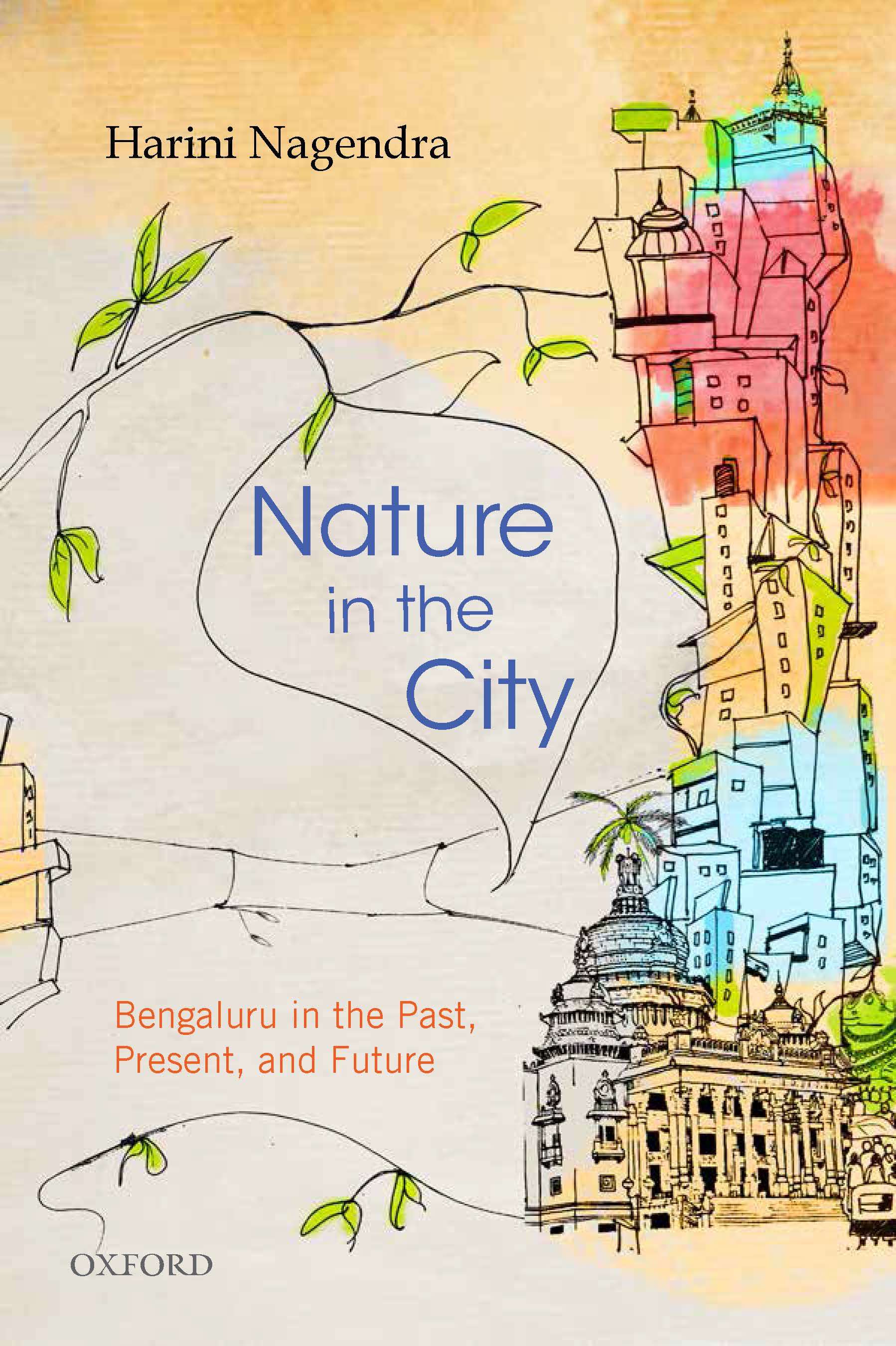
We are pleased to announce the new book, entitled, Nature in the City: Bengaluru in the Past, Present and Future, by our Editorial Board member, Prof. Dr. Harini Nagendra.
Nature in the City describes changes in nature in the landscape of Bengaluru using a deep historical dive from the 6th century CE to now. The book examines changes in the way people perceive nature, charts a trend towards simplification of biodiversity and ecosystem services over time, and identifies at pockets of resilience where multifunctional nature still thrives in the midst of urban chaos. Illustrated with stories of people and places, this is a compelling account of the ecological history of one of the world's fastest growing cities, and adds to our limited knowledge of urban change in the global South.https://global.oup.com/academic/product/nature-in-the-city-9780199465927?cc=in&lang=enx%x%
10 August 2016
Institutional Membership established with the University of Texas at Austin, USA, the Wroclaw University of Science and Technology, Poland and the University of Granada and the Compultense University of Madrid, Spain
We are pleased to announce that the following institutions have joined MDPI's institutional membership program in August 2016:
- University of Texas at Austin, USA
- Wroclaw University of Science and Technology, Poland
- University of Granada, Spain
- Compultense University of Madrid, Spain
Authors affiliated with these institutions will benefit from a 10% discount on the article processing charges.
Additional details can be found on our institutional membership page.
18 July 2016
Institutional Membership established with Louisiana State University and Florida State University, USA, Royal College of Surgeons, Ireland, University of Rostock, Germany, AGH University of Science and Technology, Poland and Southeast University, China
We are pleased to announce that the following institutions have joined MDPI's institutional membership program in July 2016:
- Louisiana State University, USA
- Florida State University, USA
- Royal College of Surgeons, Ireland
- University of Rostock, Germany
- AGH University of Science and Technology, Poland
- Southeast University, China
Authors affiliated with these institutions will benefit from a 10% discount on the article processing charges.
Additional details can be found on our institutional membership page.
12 July 2016
MDPI Moving to New Office Location in Basel (Switzerland) in August 2016
As of 20 August 2016, MDPI's new address in Basel will be:
MDPI AG
St. Alban-Anlage 66
CH-4052 Basel
Switzerland
Telephone and fax numbers remain unchanged.
St. Alban-Anlage 66 was built from 1947 to 1948 and initially the home of the "Bühler AG", a book printing business.
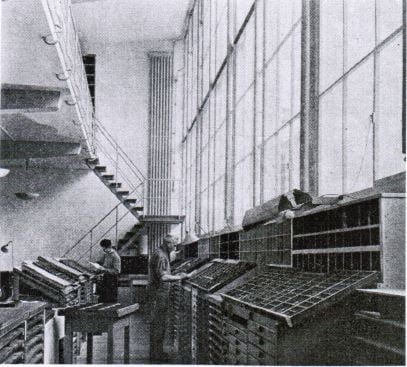
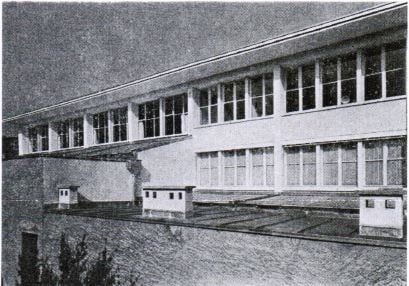
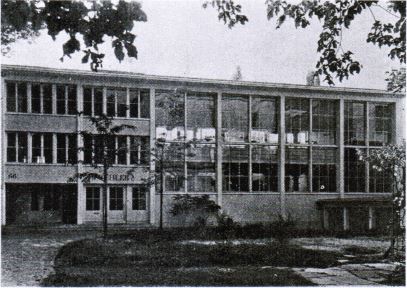
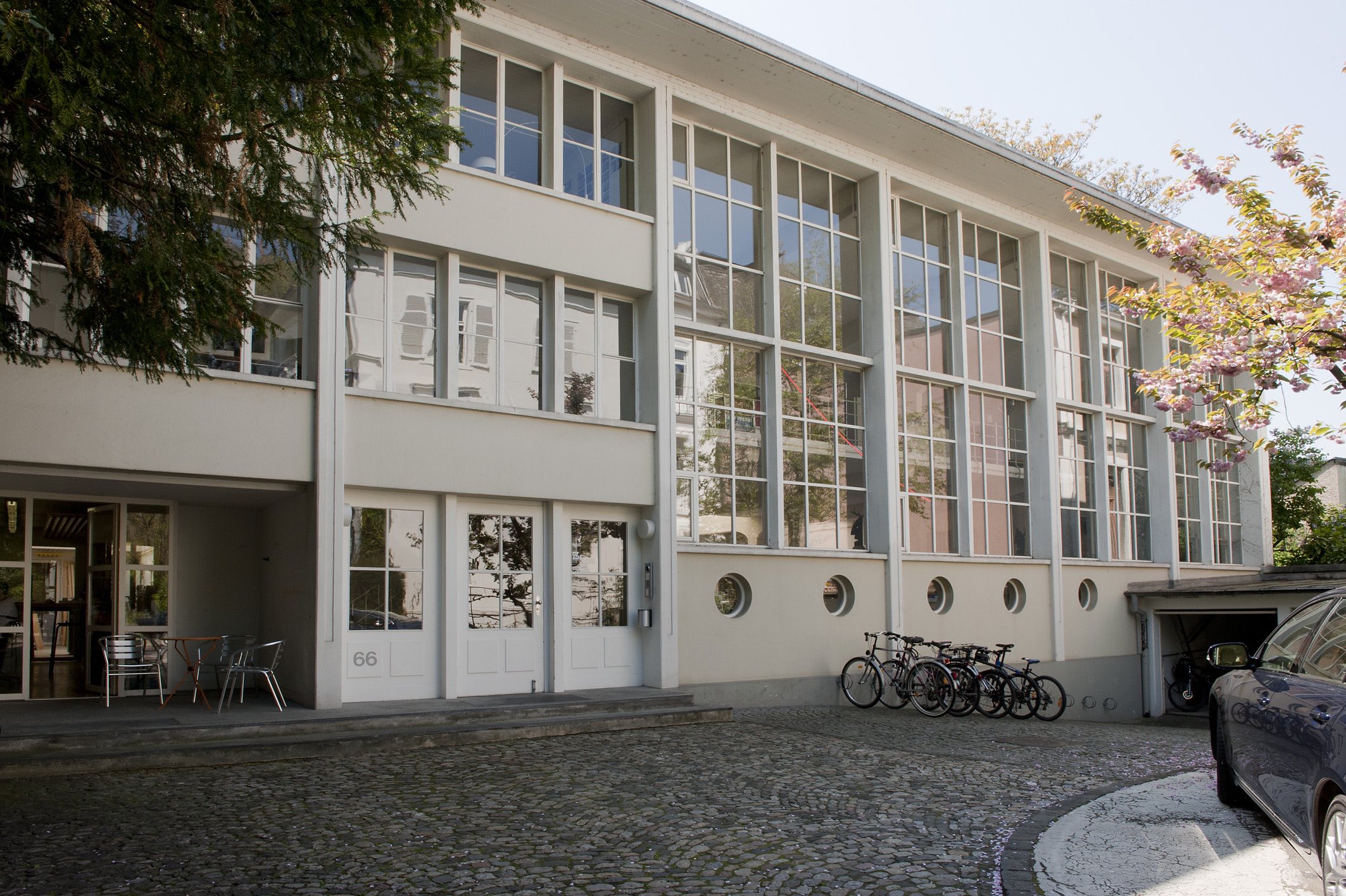
For more information about this building, see: https://www.mdpi.com/about/headquarters
21 June 2016
"Behind the Scenes of Academic Publishing—A Publisher's Perspective" - MDPI's Lecture at the University of Basel
From the 15-16 September, 2016, MDPI will run a course on Academic Publishing at the University of Basel.
In this two day workshop, MDPI will look in detail at the role performed by academic journal publishers and how they interact with academics. Ethical dimensions, what happens when problems occur and how the publisher coordinates all aspects of the submission process will also be covered.
For more detailed information about the program, trainers and registration please visit the course webpage.
14 June 2016
2015 Impact Factors Released
We are pleased to report the 2015 Journal Impact Factors in the latest Journal Citation Reports® Science Edition, published by Thomson Reuters in June 2016. Twenty out of 25 journals have seen an increase in their Impact Factor and two journals (Crystals and IJGI) received a first Impact Factor. Coatings was recently added to SCIE and will receive its first Impact Factor in next year’s JCR.
Updated Impact Factors for Journals in the Science Citation Index Expanded (SCIE)
| Journal | 2015 Impact Factor | Details | Category Rank |
| Applied Sciences | 1.726 | Link | 83/163 (Q3) in ‘Chemistry, Multidisciplinary’; 129/271 (Q2) in ‘Materials Science, Multidisciplinary’; 64/145 (Q2) in ‘Physics, Applied’ |
| Atmosphere | 1.221 | Link | 66/84 (Q4) in ‘Meteorology & Atmospheric Sciences’ |
| Catalysts | 2.964 | Link | 53/144 (Q2) in ‘Chemistry, Physical’ |
| Energies | 2.077 | Link | 43/88 (Q2) in ‘Energy & Fuels’ |
| Entropy | 1.743 | Link | 25/79 (Q2) in ‘Physics, Multidisciplinary’ |
| Forests | 1.583 | Link | 19/66 (Q2) in ‘Forestry’ |
| Genes | 3.242 | Link | 60/165 (Q2) in ‘Genetics & Heredity’ |
| International Journal of Environmental Research and Public Health (IJERPH) | 2.035 | Link | 101/225 (Q2) in ‘Environmental Sciences’ |
| International Journal of Molecular Sciences (IJMS) | 3.257 | Link | 110/289 (Q2) in ‘Biochemistry & Molecular Biology’; 51/163 (Q2) in ‘Chemistry, Multidisciplinary’ |
| Marine Drugs | 3.345 | Link | 13/59 (Q1) in ‘Chemistry, Medicinal’ |
| Materials | 2.728 | Link | 63/271 (Q1) in ‘Materials Science, Multidisciplinary’ |
| Metals | 1.574 | Link | 18/73 (Q1) in ‘Metallurgy & Metallurgical Engineering’; 145/271 (Q3) in ‘Materials Science, Multidisciplinary’ |
| Micromachines | 1.295 | Link | 30/56 (Q3) in ‘Instruments & Instrumentation’ 63/83 (Q4) in ‘Nanoscience & Nanotechnology’ |
| Minerals | 1.468 | Link | 9/21 (Q2) in ‘Mining & Mineral Processing; 14/29 (Q2) in ‘Mineralogy’ |
| Molecules | 2.465 | Link | 24/59 (Q2) in ‘Chemistry, Organic’ |
| Nanomaterials | 2.690 | Link | 64/271 (Q1) in ‘Materials Science, Multidisciplinary’; 36/83 (Q2) in ‘Nanoscience & Nanotechnology’ |
| Nutrients | 3.759 | Link | 16/78 (Q1) in ‘Nutrition & Dietetics’ |
| Polymers | 2.944 | Link | 20/85 (Q1) in ‘Polymer Science’ |
| Remote Sensing | 3.036 | Link | 5/28 (Q1) in ‘Remote Sensing’ |
| Sensors | 2.033 | Link | 36/75 (Q2) in ‘Chemistry, Analytical’; 16/27 (Q3) in ‘Electrochemistry’; 12/56 (Q1) in ‘Instruments & Instrumentation’ |
| Sustainability | 1.343 | Link | 146/225 (Q3) in ‘Environmental Sciences’; 22/29 (Q4) in ‘Green & Sustainable Science & Technology’ |
| Symmetry | 0.841 | Link | 31/63 (Q2) in ‘Multidisciplinary Sciences’ |
| Toxins | 3.571 | Link | 16/89 (Q1) in ‘Toxicology’ |
| Viruses | 3.042 | Link | 14/33 (Q2) in ‘Virology’ |
| Water | 1.687 | Link | 33/85 (Q2) in ‘Water Resources’ |
Journals with First Impact Factors
| Journal | 2015 Impact Factor | Details | Category Rank |
| Crystals | 2.075 | Link | 13/26 (Q2) in ‘Crystallography’ |
| ISPRS International Journal of Geo-Information | 0.651 | Link | 45/49 (Q4) in ‘Geography, Physical’; 26/28 (Q4) in ‘Remote Sensing’. |
26 May 2016
Institutional Membership established with University of Bremen, Germany, Koç University, Turkey, IIASA, Austria and Jilin University and Kunming Institute of Botany, CAS, China
We are pleased to announce that the following institutions have joined MDPI's institutional membership program in May 2016:
- Unversity of Bremen, Germany
- Koç University, Turkey
- International Institute for Applied Systems Analysis (IIASA), Austria
- Jilin University, China
- Kunming Institute of Botany, Chinese Academy of Sciences, China
Authors affiliated with these institutions will benefit from a 10% discount on the article processing charges.
Additional details can be found on our institutional membership page.
23 May 2016
Institutional Membership Established with the KTH Royal Institute of Technology, Sweden and the South China University of Technology, Beijing University of Technology and Southern Medical University, China
We are pleased to announce that the following institutions have joined MDPI's institutional membership program in April and May 2016:
- KTH Royal Institute of Technology, Sweden
- South China University of Technology, China
- Beijing University of Technology, China
- Southern Medical University, China
Authors affiliated with these institutions will benefit from a 10% discount on the article processing charges.
Additional details can be found on our institutional membership page.
26 April 2016
New Section on www.mdpi.com - Latest Books
You may have noticed a new section that is now visible on our home page. This section is called "Latest Books" and showcases recent publications from MDPI Books, our book publishing service.
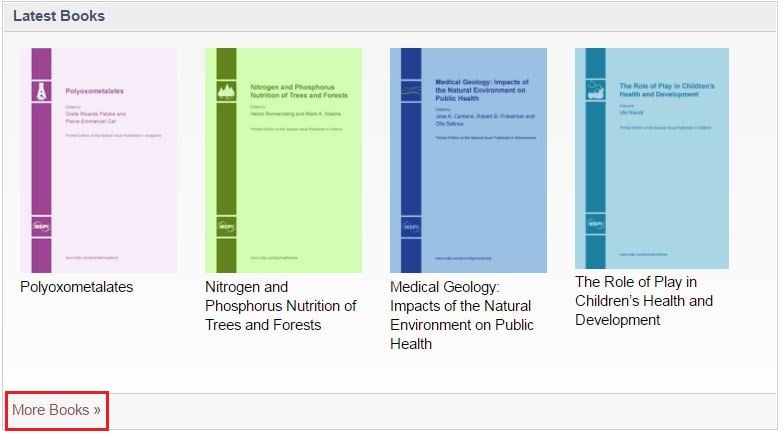
By clicking on the hyperlink "More Books" you will be taken to the MDPI Books Home Page. There you will find more information about the service, as well as the "Recent Publications" list.
Clicking on any of the book images in this list will take you to detailed information about that book (shown below). Here you can also download a PDF version of the book, or order a hardcover printed copy.
For further information about the MDPI Books service, please visit the webpage or contact books@mdpi.com.
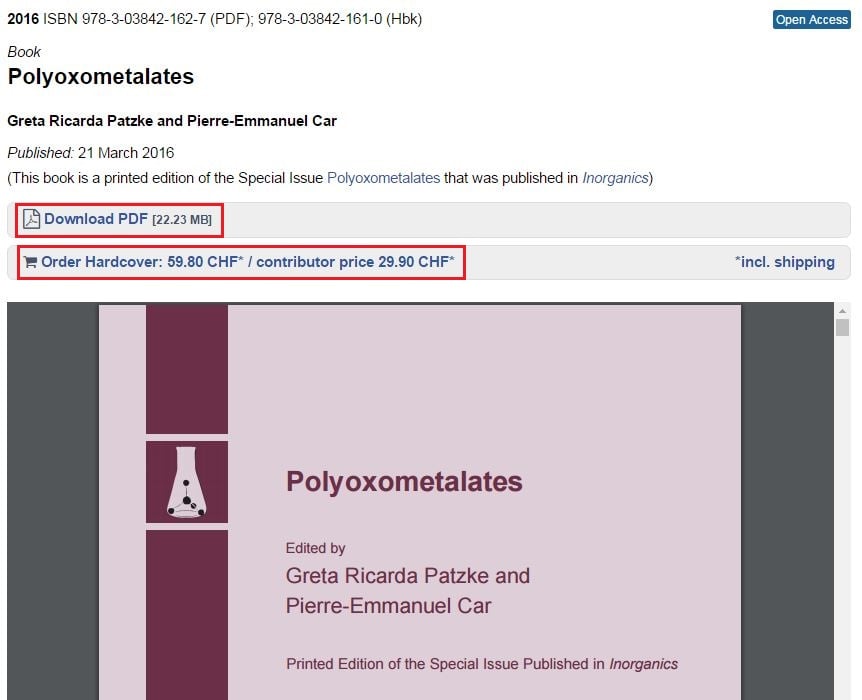
31 March 2016
Axioms, Behavioral Sciences, Photonics, Separations and Toxics added to the Emerging Sources Citation Index in Web of Science
We are pleased to announce that the journals Axioms, Behavioral Sciences, Photonics, Separations and Toxics were recently accepted for inclusion in the newly launched Emerging Sources Citation Index (ESCI) in Web of Science.
ESCI serves to highlight promising journals which are still under consideration for the Science Citation Index Expanded (SCIE) or the Social Sciences Citation Index (SSCI).
The Emerging Sources Citation Index (ESCI), Science Citation Index Expanded (SCIE), Social Sciences Citation Index
(SSCI), and Web of Science™ (WoS) are Thomson Reuters products.
30 March 2016
Institutional Membership established with the University of Winchester, UK, Silesian University of Technology, Poland and Beijing Jiaotong University and Zhejiang University, China
We are pleased to announce that the University of Winchester, UK, the Silesian University of Technology, Poland and Beijing Jiaotong University and Zhejiang University, China, have joined our Institutional Membership program. Primary authors from these universities will benefit from a 10% discount on article processing charges.
Additional details can be found on our institutional membership page.
24 March 2016
New Editorial Office in Barcelona, Spain
We are excited to announce the opening of our new editorial office in Barcelona, Spain. The launch team is led by a Senior Editor and comprises further staff holding doctoral degrees with several years of research experience. The new editorial team will help us to get closer to European research communities and progress Sciforum, the platform to support the scientific community via conference hosting and other functions. They will also help spread the word about Open Access and meet academics at scientific events.
We are in the process of hiring more doctoral and masters graduates to join the editorial team and welcome applications via jobs@mdpi.com. For contact details about the office, see our contact page.

22 February 2016
Membership Established with the Max Planck Society
We are pleased to announce that the Max Planck Digital Library (MPDL) has signed an agreement with MDPI to support authors associated with the Max Planck Society (Max-Planck-Gesellschaft). As of 22 February 2016, corresponding authors will receive full funding from the MPDL for articles published in MDPI journals, with a 10% discount applied to the Article Processing Charges. Additional details can be found at our institutional membership page.
Founded in 1948, The Max Planck Society is one of Germany’s leading research organizations, and is currently made up of 83 institutes conducting basic research in natural sciences, life sciences, social sciences and humanities. 18 Nobel laureates have emerged from its ranks of scientists and the society has more than 15,000 publications in scientific journals each year.
5 February 2016
Institutional Membership Extension: Wageningen University, CSIC, University of Zürich, ETH Zürich, University of Tübingen and Osnabrück University
We are pleased to announce that Wageningen University, the Netherlands, the Spanish National Research Council (CSIC), Spain, the University of Zürich and ETH Zürich, Switzerland, and the University of Tübingen and Osnabrück University, Germany, have not only renewed their institutional memberships with MDPI after two years of successful cooperation, but have also increased the reduction of the article processing charges (APCs) for affiliated authors to 25%.
Additional details can be found on our institutional membership page.
5 February 2016
Institutional Membership established with Brock University, Canada and the University of Pisa, Italy
We are pleased to announce that Brock University, Cananda, and the University of Pisa, Italy, have joined MDPI's institutional membership program: Primary authors from these universities will benefit from a 10% discount on the article processing charges as of 01 February 2016.
Additional details can be found on our institutional membership page.
25 January 2016
MDPI Sponsors diss:kurs with the University of Basel
MDPI is pleased to announce its newly established sponsorship of diss:kurs, an event coordinated by the University of Basel to support their doctorate program. For more information about the event and how to register, please visit the diss:kurs webpage.
7 January 2016
New Institutional Memberships Established with Tsinghua University, the Chinese Society of Micro-Nano Technology, Ruhr University Bochum and the University of Ulm
We are pleased to announce that the following institutions have joined MDPI's institutional membership program as of 1 January 2016:
- Tsinghua University, China
- Chinese Society of Micro-Nano Technology (CSMNT)
- Ruhr University Bochum, Germany
- University of Ulm, Germany
Authors affiliated with these institutions will benefit from a 10% discount on the article processing charges.
Additional details can be found on our institutional membership page.
5 January 2016
Safety, Fermentation, C-Journal of Carbon Research, Magnetochemistry, Batteries and Horticulturae Released Their First Issue in December 2015
We are pleased to announce that MDPI's open access journals Safety, Journal of Imaging, Fermentation, C-Journal of Carbon Research, Magnetochemistry, Batteries and Horticulturae released their first issue at the end of December 2015.
21 December 2015
Land added to the Emerging Sources Citation Index in Web of Science
We are pleased to announce that the journal Land was recently accepted for inclusion in the newly launched Emerging Sources Citation Index (ESCI) in Web of Science.
ESCI serves to highlight promising journals which are still under consideration for the Science Citation Index Expanded (SCIE) or the Social Sciences Citation Index (SSCI).
The Emerging Sources Citation Index (ESCI), Science Citation Index Expanded (SCIE), Social Sciences Citation Index
(SSCI), and Web of Science™ (WoS) are Thomson Reuters products.
17 December 2015
Institutional Membership Extension: University of Bern, Switzerland
We are pleased to announce that the University of Bern, Switzerland has not only renewed their institutional membership with MDPI after two years of successful cooperation, but also increased the reduction of the article processing charges (APCs) for affiliated authors to 25%.
17 December 2015
Institutional Membership with the University of Ulm and Helmholtz Zentrum Munich
We are pleased to announce that University of Ulm, Germany and Helmholtz Zentrum Munich, Germany has joined MDPI's institutional membership program:
Primary authors from the University of Ulm and Helmholtz Zentrum Munich will benefit from a 10% discount on the article processing charges as of 1 January 2016. Additional details can be found on our institutional membership page.
9 December 2015
Membership Established with the Virginia Polytechnic Institute and State University (Virginia Tech)
We are pleased to announce that Virginia Tech has joined MDPI's institutional membership program. Authors from Virginia Tech will benefit from a 10% discount on the article processing charges as of 1 December 2015. Additional details can be found on our institutional membership page.
1 December 2015
Membership Established with the Technical University of Denmark and the University of North Florida
We are pleased to announce that the following universities have joined MDPI's institutional membership program:
- Technical University of Denmark (as of 1 November 2015)
- University of North Florida, USA (as of 15 November 2015)
Primary authors from the Technical University of Denmark and the University of North Florida will benefit from a 10% discount on the article processing charges.
Additional details can be found on our institutional membership page.
2 October 2015
Membership Established with the University of Freiburg and the University of Regensburg
We are pleased to announce that the following universities have joined MDPI's institutional membership program:
University of Freiburg, Germany
University of Regensburg, Germany
Primary authors from the University of Freiburg and the University of Regensburg will benefit from a 10% discount on the article processing charges as of 1 October 2015 and 1 November 2015.
Additional details can be found on our institutional membership page.
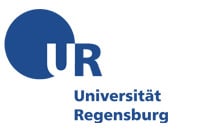






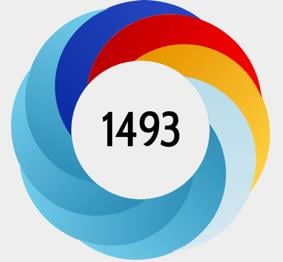
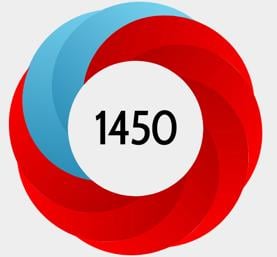
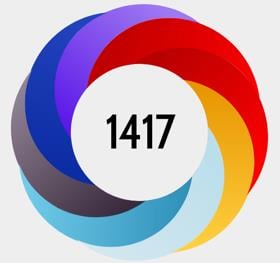
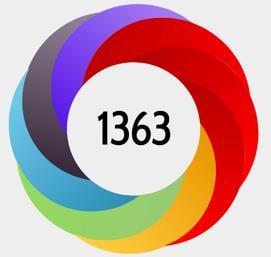
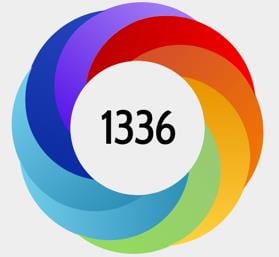
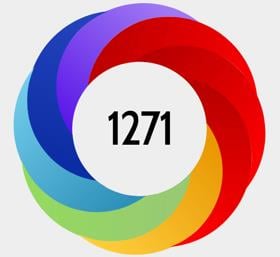
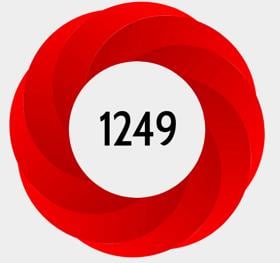







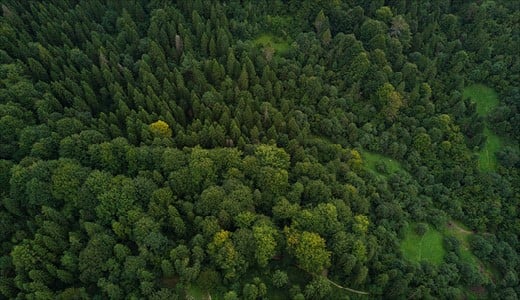
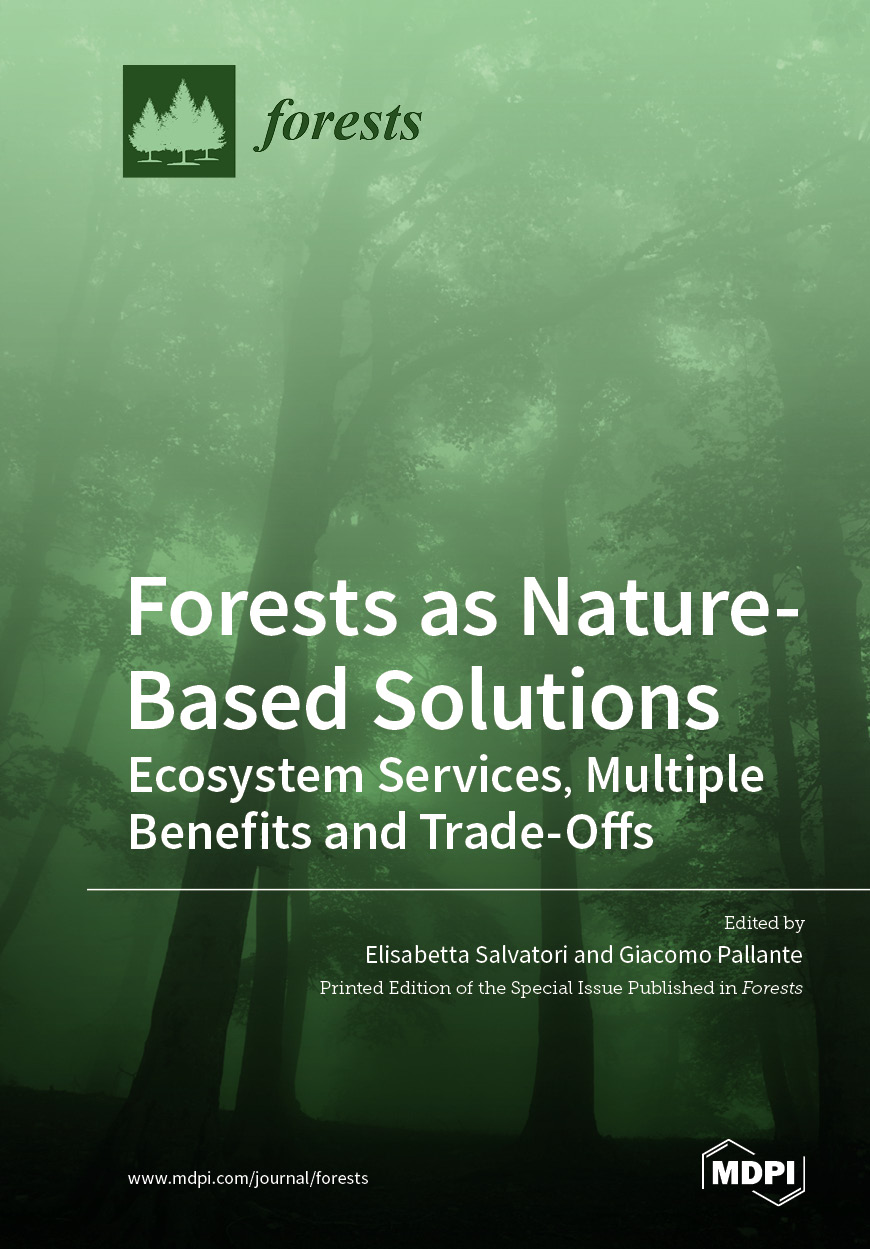
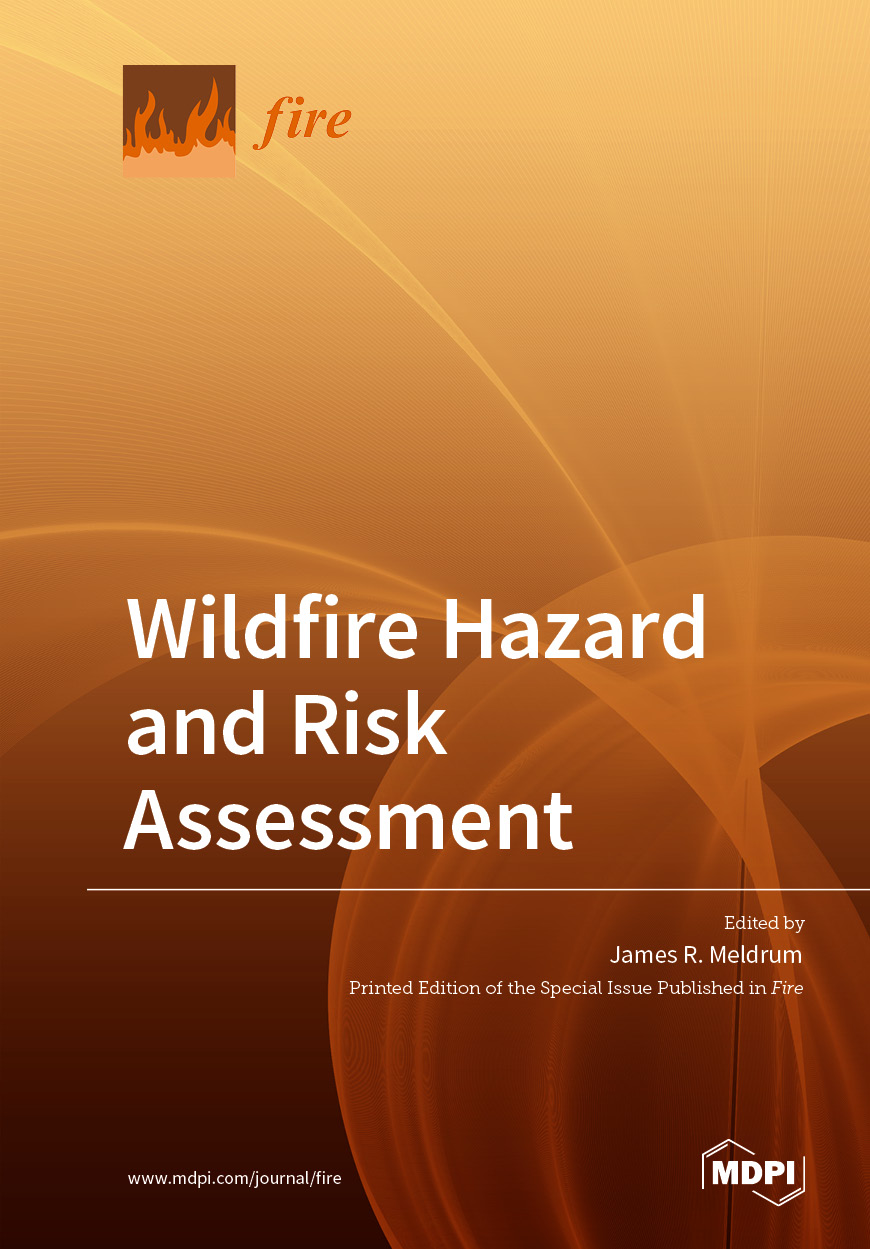
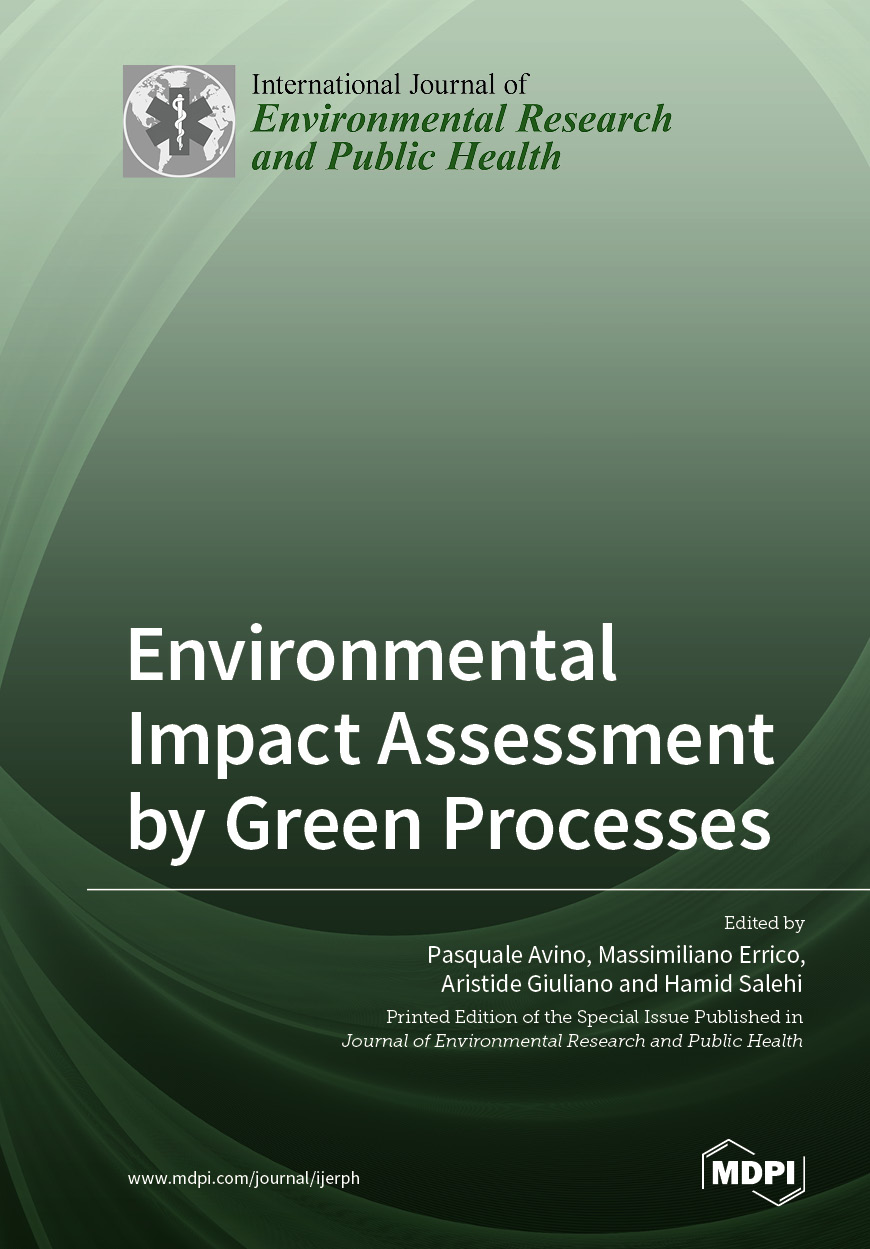
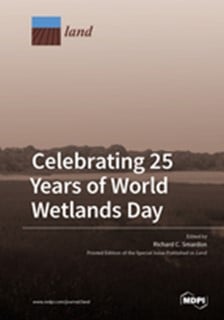
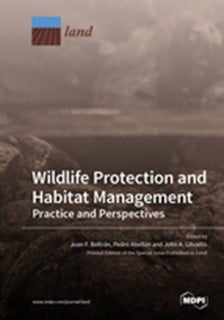
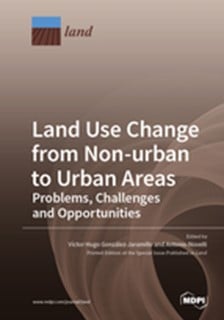
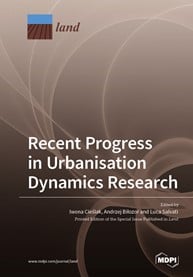
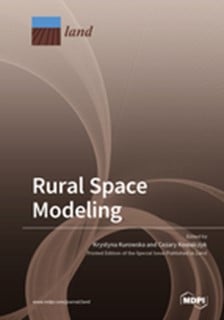
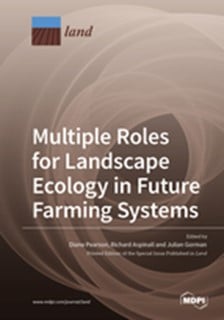
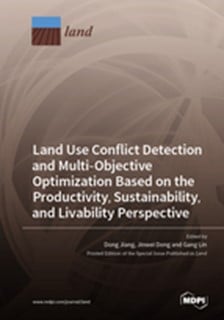

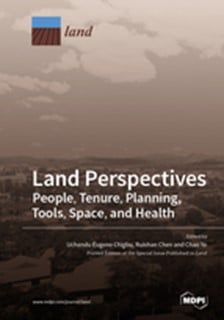


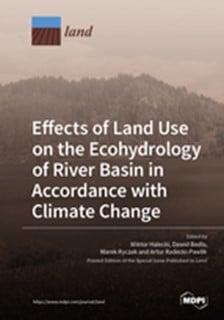
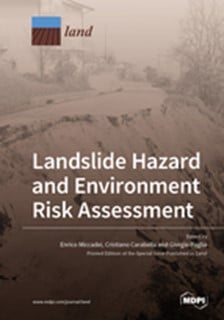
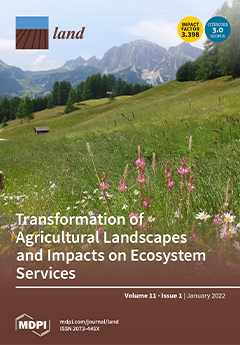
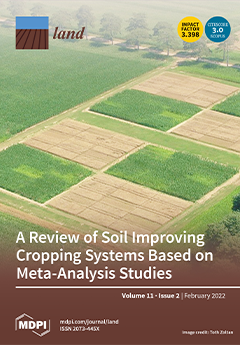
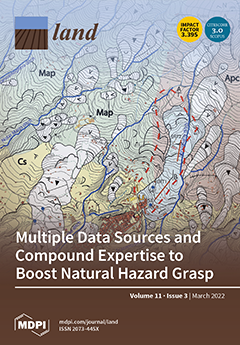
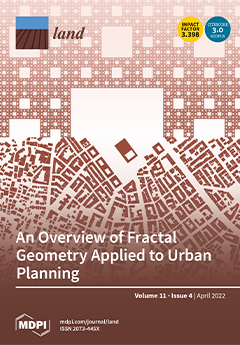
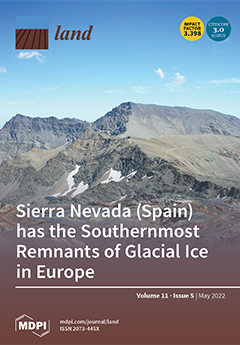
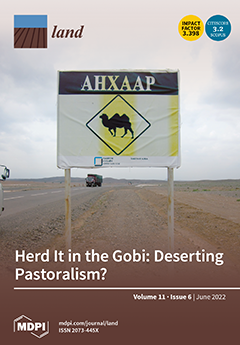
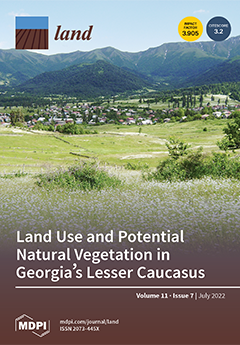
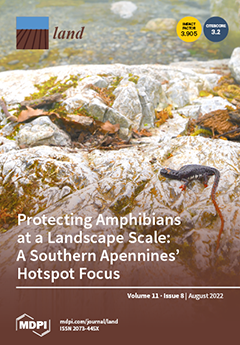
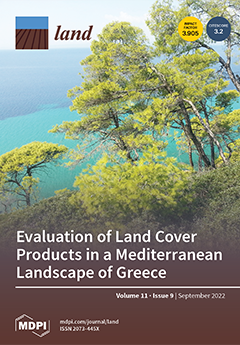
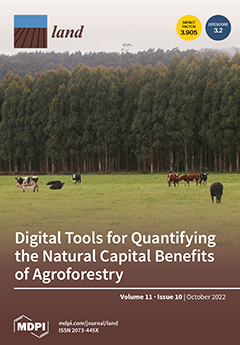
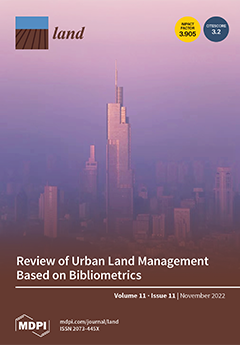
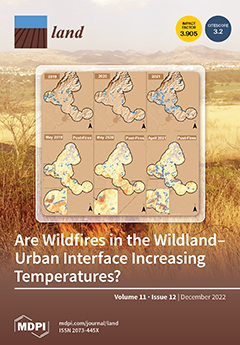






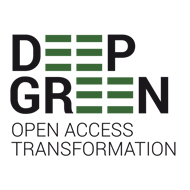


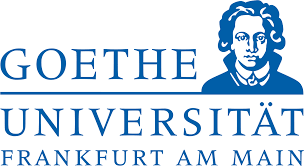
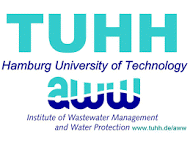




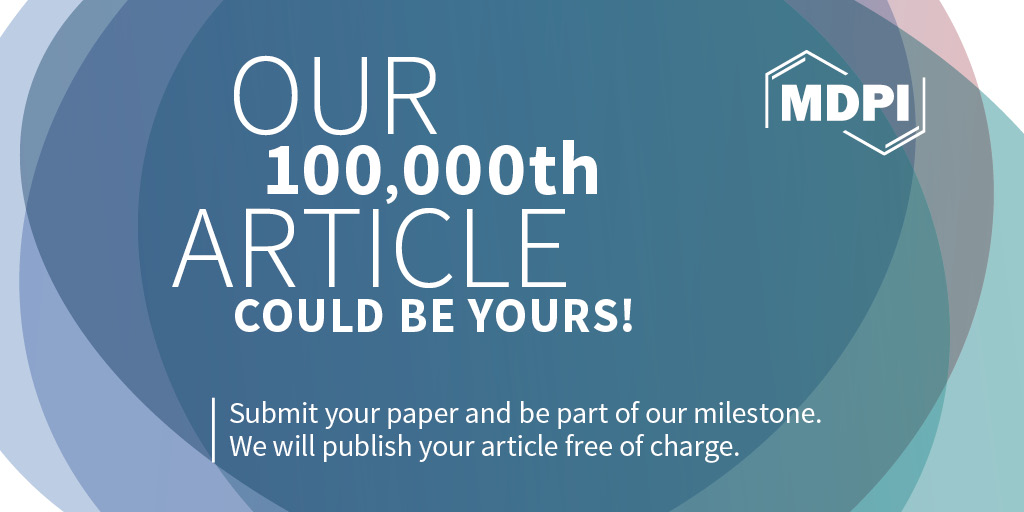
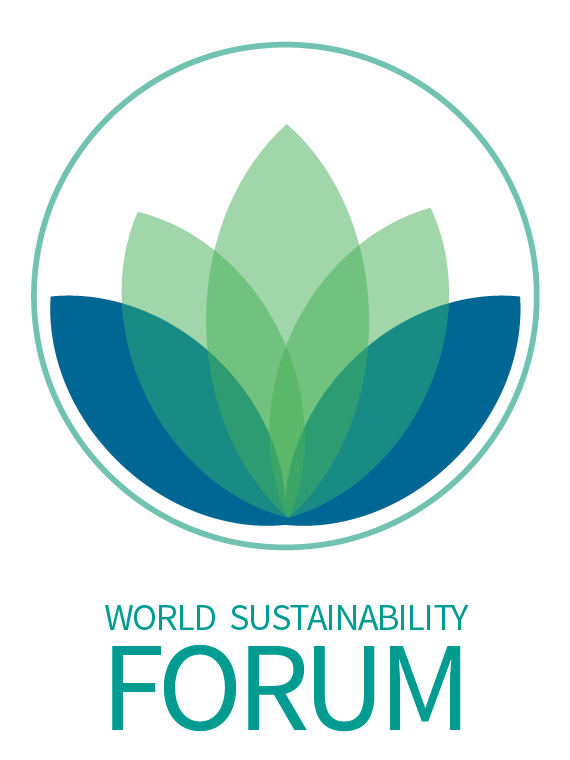
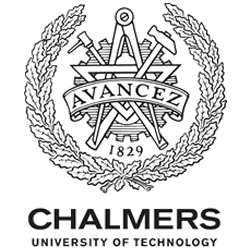

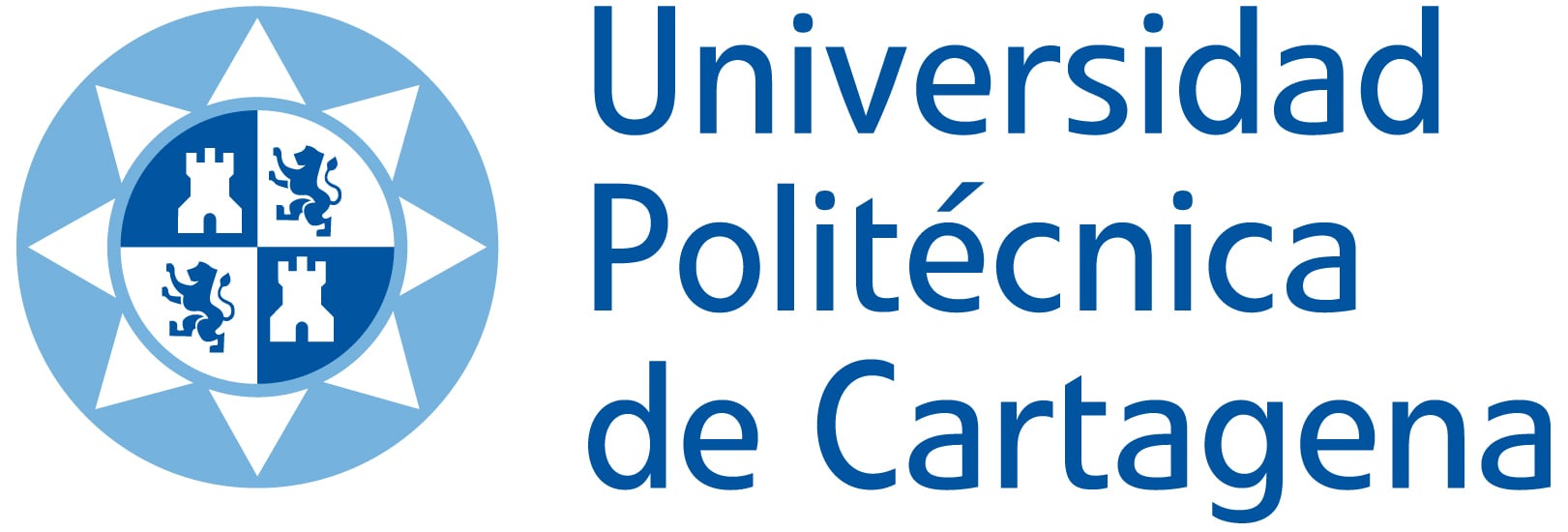
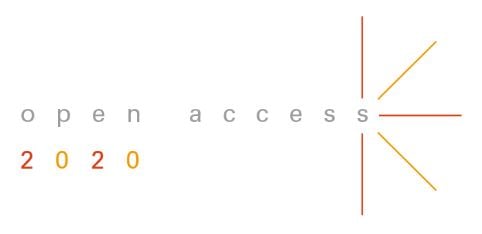



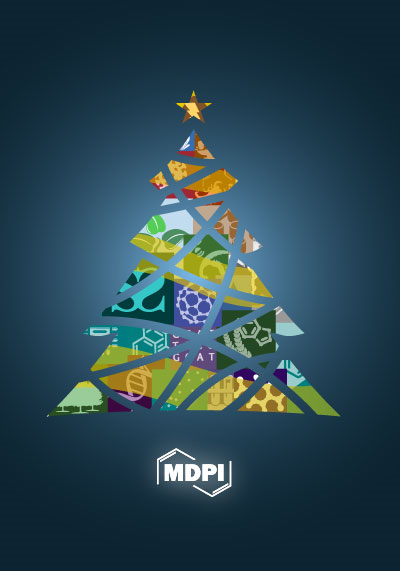





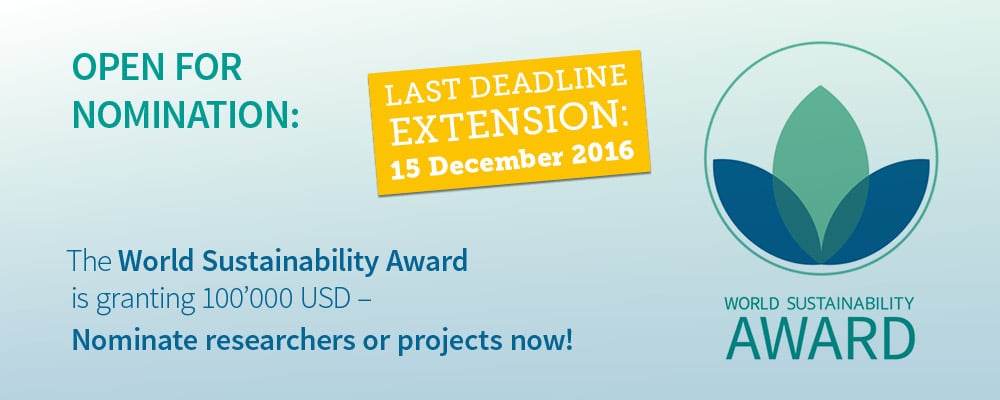



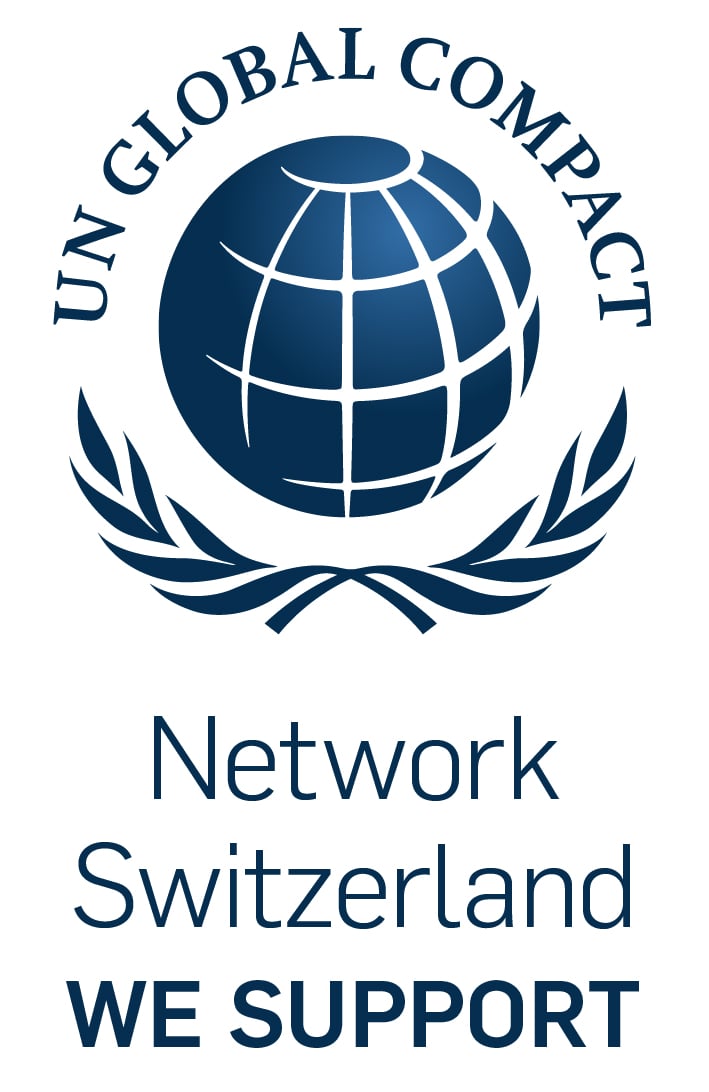
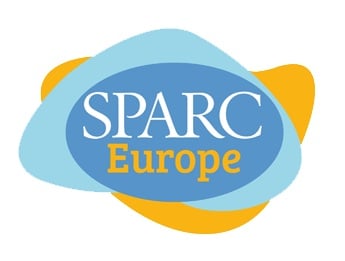
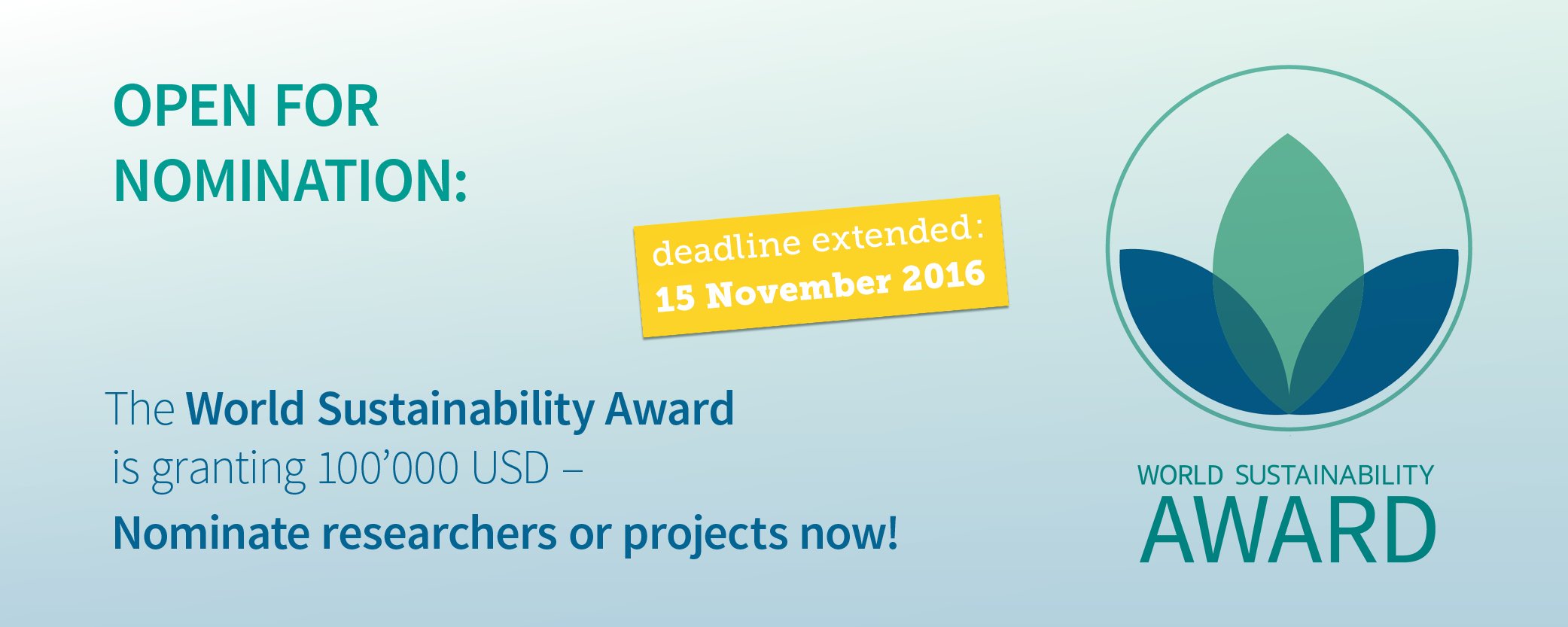 .
.